Camp Pendleton Community Service Fund, by David Hensler
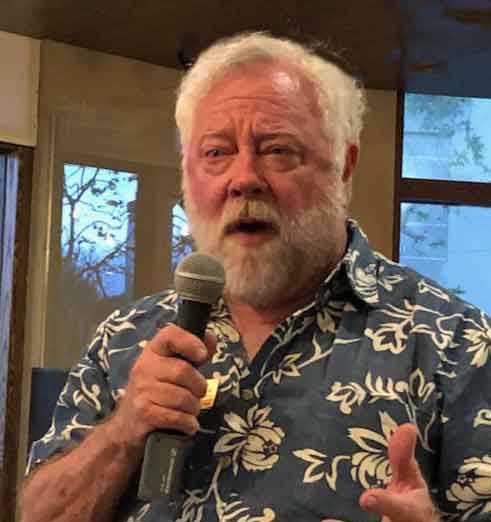
Camp Pendleton Community Service Fund, by David Hensler (Apr 23, 2024) David Henseler, Past-President of South Bay Sunrise Rotary Club, has led community service projects for many years. He has been promoting the Camp Pendleton Community Service Fund (collecting baby products and household items for Marine families on the base). He and Karen Greenberg collect these donated supplies from District 5280 Rotarians at their home in Torrance several times a year to ship to Camp Pendleton. (Watch for announcements about the next collection date.) The Pendleton Community Service Fund (https://cpcsf.org/) was started in 2004 by a new Rotary Club in Camp Pendleton, to help military families there. Donations are stored in the Warrior Warehouse at the North end of Camp Pendleton. Every Friday morning, the warehouse is opened so that young military families can select from goods such as baby products, glassware, linens, pots and pans, and lightly-used furniture, at no charge. The Rotarians also built and inscribed a Memorial Wall with names of over 1,600 Marines and Sailors who passed through Camp Pendleton and died in Iraq and Afghanistan. David is trying to recruit more Rotary Clubs in Orange County to support this ongoing project. |
Rolling Robots, Chase Thacker(Apr 9, 2024) Our Past-President Chase Thacker presented the latest information on his work with “Rolling Robots”, a group of age-appropriate robotics-design educational programs for children. Their students have done well on VEX Robotics international competitions. The major age-groups are:
The students learn coding by moving labeled colored blocks on a screen to assemble a program, rather than writing long lists of traditional complex coding commands: 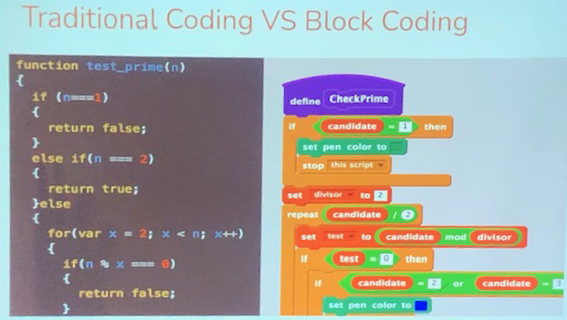 Competitions are like athletic contests, with robots throwing & catching objects:  The winners:  |
Artificial Intelligence, by Tony Self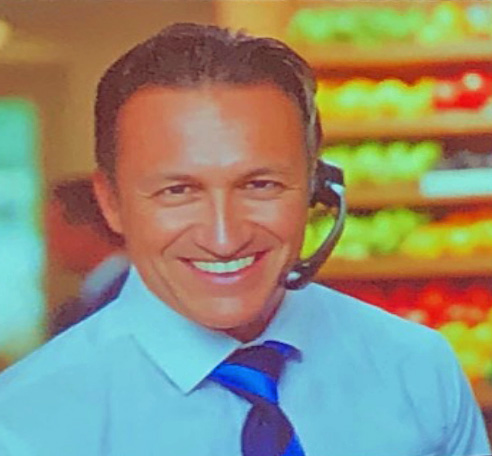 (Mar 26, 2024) Tony Self is an REO broker in California & Nevada with over 6000 sales. He launched Realtor.com & ZipForms. (His email address is tony@huntermason.com.) He discussed the development of Artificial Intelligence (AI), which is expanding rapidly. Some people fear it may “destroy humanity” because of its potential power for good and evil. Tony showed a video of a life-size human-like android walking and using its hands with tools. He reviewed how AI tools can be used, including “marketing on steroids” and “glamour shots” with modified images. AI can generate text, books, videos, pictures, software, songs, androids, and “deep fakes” (already showing up in social media and politics). Over half of people can’t tell that AI generated its content. Major AI players include ChatGPT (OpenAI, https://chat.openai.com), Microsoft Bing AI (with a $13 billion investment in OpenAI), and Google Bard (80% of Google’s revenue is from advertising). ChatGPT gained 1 million users in its first 5 days and gets 1 billion website visits per month. Other major AI tools include Canva (https://www.canva.com), Leonardo (https://app.leonardo.ai), and Artflow (https://app.artflow.ai). |
Try-Outs for District Pageant of the ArtsWe had a very good turnout to see our candidates for the District Pageant of the Arts (scheduled for April 13): 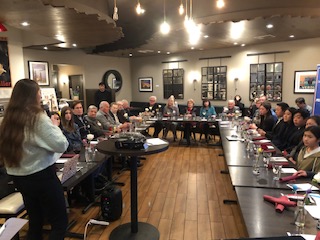 Sophie Sun, 1st Place in Speech: 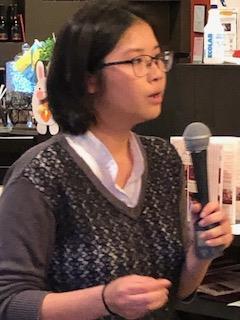 The Quartet of Iris Shia, Justin Back, Allison Yu, & Richard Zheng, 1st Place in Music: 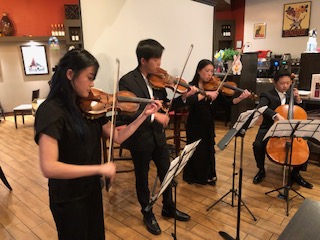 Ola Bojorquez & Michael Wam, 2nd Place in Music: 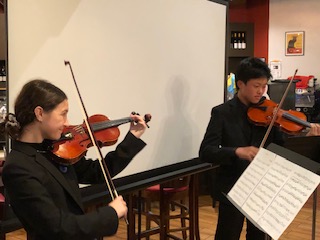 Nation Dixon, 3rd Place in Music: 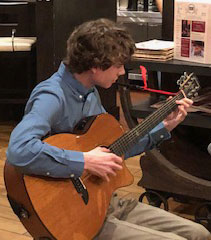 Gia Anna Wynne, 1st Place in Voice: 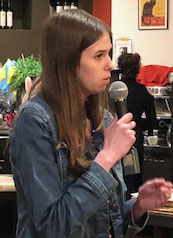 Avery Tyajaska, 1st Place in Dance (from video presentation):  The District's 2024 Pageant of the Arts will be on Sat, April 13, at the 1st United Methodist Church of Glendale. The 1st Place in each contest will receive $1,000; 2nd Place $500; 3rd Place $250. (See https://rotary5280.org/ for details.) |
Palos Verdes Kelp Forest, Michael Friedman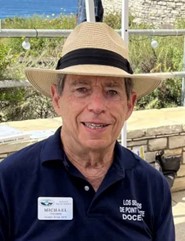 (Feb 27, 2024) Michael Friedman is Chair of the Speakers Bureau of Los Serenos de Point Vicente (https://losserenosrpv.org/), a volunteer organization founded in 1984 by the city of Rancho Palos Verdes. It provides community interpretive and educational services about the natural and cultural history of the PV Peninsula and coastal waters. Kelp is not a plant, because it has no roots. It is a multicellular form of algae that needs a rock surface to attach to, so that it can get nutrition from ocean currents. The Giant Kelp in our coastal waters can grow 2 feet per day, up to 200 feet, with the top floating on the ocean surface as a canopy. A multibillion-dollar industry uses it in food, cosmetics, industrial and medical products, foam on beer, toothpaste, humidifiers and lubricants. Only the top is harvested. Abalone mollusks eat it, and many fish shelter and breed there. The fishing industry complained about sea otters catching fish there, so the otters were removed in many areas, resulting in sea urchins multiplying and destroying the kelp beds by chewing through the kelp holdfasts. 75% of kelp beds have been lost. DDT dumping offshore is a huge problem here. The Montrose company in the LA Harbor area produced half of the world supply of DDT from 1947-1982. Then the plant was closed, the area was designated as a US Superfund hazardous waste site, and the company was sold in 1987 to a foreign company (which has escaped liability). At least 27,000 barrels (thousands of tons) have been dumped off the coast. The DDT is leaking and poisoning ocean plant and animal life here. (Sea lions are now developing cancer, and brown pelicans’ eggs for years became too fragile for survival because of DDT contamination of their food.) DDT is a known carcinogen that was banned in the US in 1972. DDT also disrupts the hormone system and promotes diabetes, obesity and nervous system hypersensitivity. In the body, DDT binds to fat and bio-accumulates because it cannot be metabolized. It is transmitted in the placenta and breast milk. There is no available method to detoxify vast areas of ocean water. |
Friends of Cabrillo Marine Aquarium, Caroline Brady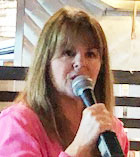 (Feb 13, 2024) Caroline Brady is Executive Director of the Friends of the Cabrillo Marine Aquarium in San Pedro, which supports the Aquarium’s mission to promote exploration, respect and conservation of Southern California Marine life. It provides funding for many education and outreach programs and special events, and allows free admission to the aquarium. The Aquarium was founded in 1935 as a collection of shells & ocean specimens at the Cabrillo Beach bathhouse. Its current building opened in 1981 and now has an Exploration Center, Aquatic Nursery Research Lab and a Research Library. In 2007, a Young Scientists Program was established. Among its many programs are grunion events, outdoor classroom and ocean outreach, as well as school programs and field trips. The Young Scientists Program, supported by the Honda USA Foundation, educates students about the ocean environment with research projects, and teaches them research skills and potential STEM career pathways. They learn data collection, record-keeping, and knowledge of animal diets, aquatic chemistry and water sampling techniques. Local colleges & universities help to identify a diverse group of students for paid internships. |
Our Future is Blue, by Robin Aube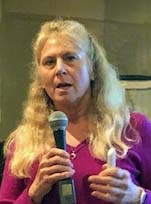 (Jan 23, 2024) Robin Aube is Director of Advancement at AltaSea in the Port of Los Angeles. AltaSea was founded in 2014 as a nonprofit ocean-focused science, business and education center at the Port of Los Angeles. Its purpose is to coordinate scientific collaboration, business innovation and education and job creation. The Blue Economy refers to the sustainable use of ocean resources for economic growth while preserving the health of the ocean. Its educational function prepares today’s students for future jobs in science, technology, engineering, business and the ocean. The business hub provides assistance and support for innovators and entrepreneurs in this area, connecting them with several world-class research institutions and government regulators. Education activities include K-12 learning in class, field trips, and an ocean research barge, teacher development and training workshops, and public open house and exhibition programs. There are high school mentorships, post-secondary internships, and aquaculture and marine energy-development programs. $28 million has been raised so far for renovation of Berths 58, 59 & 60, planned for opening in May 2024, including wharf renovation. A master planning process is planned for expansion to Berths 70-71. A center of education is planned in Berth 57 by summer 2026. The facility is self-sustaining and operating at a net profit since the end of 2023, with over 140 partners including 30 universities, 40 business partners, and 15 community organizations. |
Club Assembly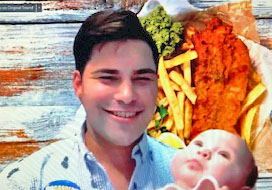 (Jan 9, 2024) (Jan 9, 2024)Chase Thacker reviewed our Club’s projects & activities over the past year. Our biggest project was the Model UN Conference at Peninsula HS last year, supported by a Rotary Global Grant. We had a successful July 4th beer & wine booth fundraiser at RPV City Hall, supported by good “beer weather”. We sponsored our young member Mark Szilagyi to the RYLA (Rotary Youth Leadership Assembly) in September at Running Springs. We participated in the decorated-vehicle “Trunk or Treat” Halloween event for children at RPV City Hall (a tyrannosaurus rex roamed the grounds but kept a safe distance from us). We packed food supplies for “RISE Against Hunger” (https://www.riseagainsthunger.org/), a global movement to end hunger by empowering communities, nourishing lives and responding to hunger emergencies. We had a Bird-Feeder construction project (ending bird-hunger?). Echo Lee generously hosted our Prospective-Member Reception at her home. We participated in the nation-wide “Be a Santa to a Senior” program (https://www.beasantatoasenior.com/), by providing practical gifts to brighten a local senior’s holiday season. Our Club Treasurer Charley Ferraro presented our projected and actual budget figures for monthly and annual income and expenses. We are within budget limits and have adequate reserves for planned activities. |
Holiday Celebration (Crème de la Crêpe Restaurant)(Dec 12, 2023) We enjoyed holiday fellowship with our members & guests. 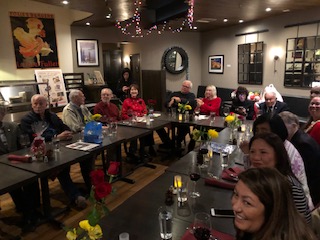  We were serenaded by our talented singing quartet. 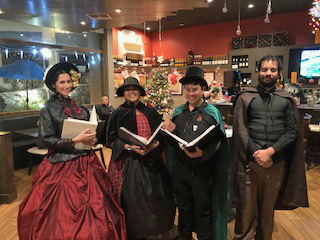   “Merry Christmas to all, and to all a Good Night!” |
Diets & Dieting, by Dr Wes Bradford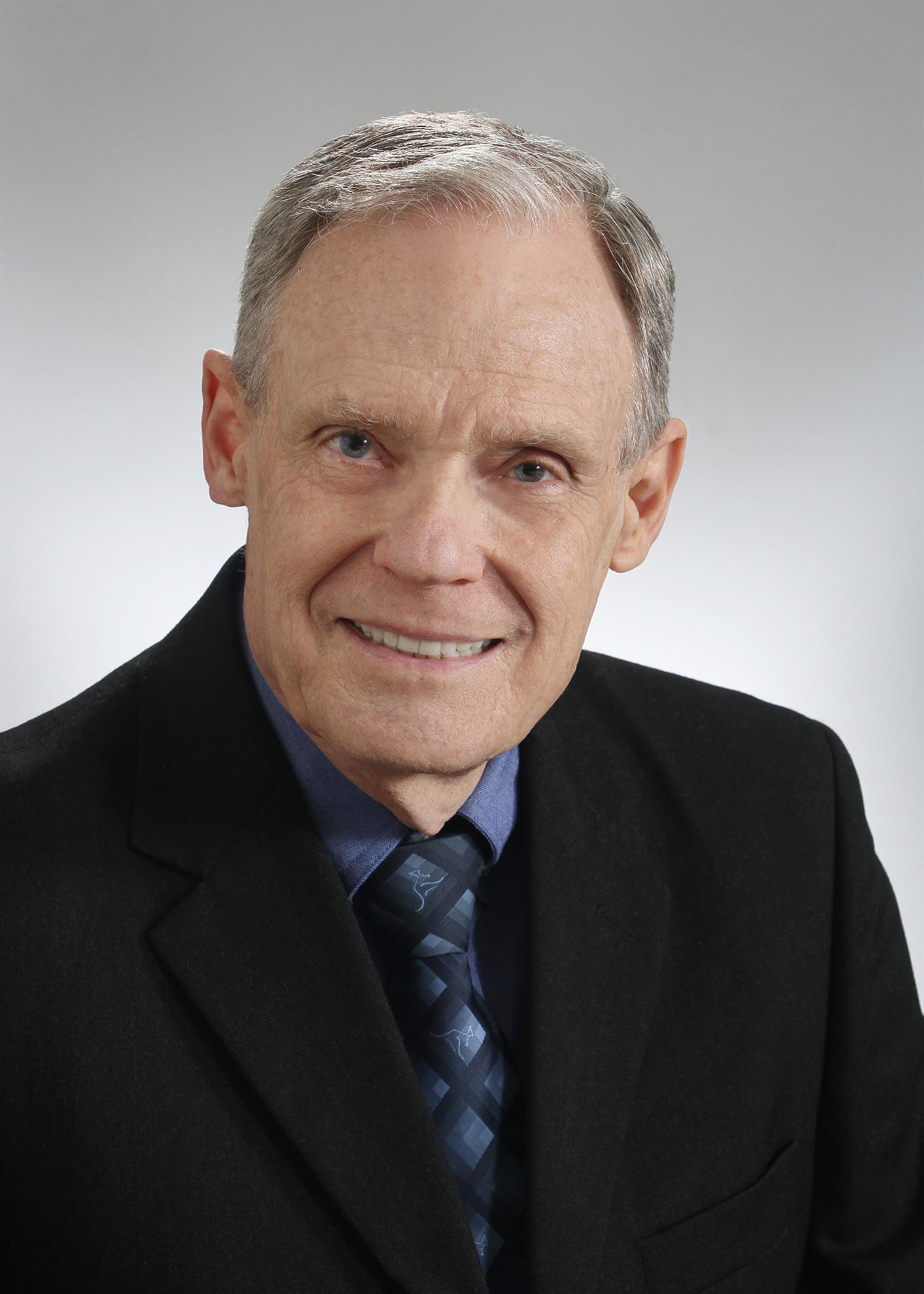 (Nov 28, 2023) 1/3 of Americans are dieting at any time, and typical dieters try again 4 times/year! 80% start on their own, but some try groups or organizations like Weight Watchers, with special foods or menus, or healthful choices at restaurants, shopping and cooking. The US government publishes revised Dietary Guidelines for Americans every 5 years (they can’t make up their minds either!). The current 2020-2025 guideline has been criticized by whistleblowers for ignoring newer scientific evidence and for restricting communication between its members. It also recommends much lower sodium intake than 95% of the world population, without evidence of health benefits except in certain specified diseases. Why such confusion? Many weight-loss trials are limited by small samples, limited generalizability (“the devil is in the details”), lack of blinded determination of outcome, lack of diet-adherence data, and large loss to follow-up. A hidden factor in government studies is lobbyists from fast food chains, food factory companies, manufacturers of additives, preservatives, pesticides & herbicides, & corporate agriculture (most family farmers are gone). Many popularized diets have come and gone, like the Zone diet & South Beach diet, with variable proportions of the major food groups — carbs, protein, & fats. They tend to agree on the importance of eating healthful-sourced foods, including organic & free-range or wild-caught. What about vegan diets? They avoid all use of animal products (not just diet, as in vegetarianism), including animal-tested products, and are concerned about animal welfare & environmental costs. They are lower-cost, more environmentally friendly, and potentially less chemically-toxic. Among their problems are vitamin B12-deficiency & vegan protein’s tendency to be more inflammatory on the immune system. Common plant-food sensitivities include GLUTEN (wheat, rye, barley), corn, soy & other legumes (bean family), & nightshades (tomatoes, potatoes). (Paleolithic people didn’t eat grass seeds or beans, so our biology is not well-adapted to these foods; they can trigger auto-immune diseases and other chronic health problems that are seldom suspected as food-related.) Ketogenic (low-carb high-fat) diets promote weight loss by suppressing appetite (Obes Rev. 2015 Jan;16(1):64-76). This may help explain the increasing rate of obesity that has more than tripled since the early 1960s, when the “Low-Fat Diet” recommendation was introduced. The different weight-response to dietary fat content seems to relate to the insulin hormone, which stores excess glucose (from digested carbs) in the form of body weight for “the next famine”. Without enough insulin, the blood sugar would go too high, which damages body tissues, but having enough insulin to control the blood sugar by storing it promotes weight gain (as diabetics know). However, the body can’t store excess dietary fat (because there is no insulin-equivalent for it), so the appetite shuts off instead. This seems to be why high-fat diets lead to more weight loss than low-fat diets (Lancet Diabetes Endocrinol. 2015 Dec;3(12):968-79). (Weight-loss also reduces coronary risk & diabetes.) |
Prospective Member Night (at Home of Echo Lee)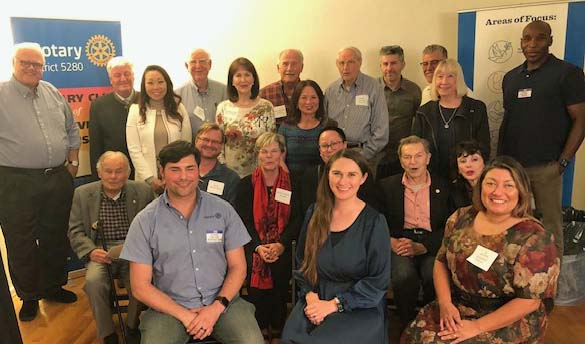 (Nov 14, 2023) Our Club members met with several prospective members at the beautiful home of our member Echo Lee. After enjoying a bountiful selection of “heavy hors d’oeuvres” and personal mixing, we had presentations of Rotary’s 7 areas of focus, our local and international programs, and personal accounts of how some of our members became active in Rotary. We welcomed our new prospective members attending, including Monica Varely Snyder, Rachel Castilla, Angel Estrada, Scott Schoenfeld, & Jacky Yoo. (Did we miss anyone?) Having more members can help us to expand our service projects and fellowship opportunities. |
Halloween Game & Costume Night (Oct 24, 2023) We had a Halloween-themed “Answer Battle” with attendees on 2 teams. Then the best Halloween costumes were lined up for judging: 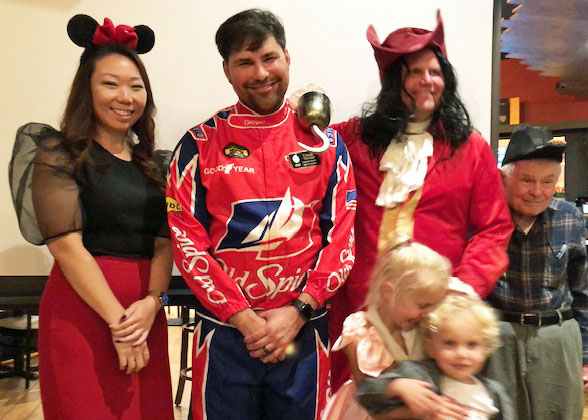 |
LA County Solid Waste Management, Danielle Thomas(Oct 10, 2023) Danielle Thomas works with the Energy Recovery Section of Solid Waste Management for LA County sanitation districts. Their mission is to protect public health and the environment with cost-effective wastewater and solid waste management to produce recycled water, energy and recycled materials. Effective sanitation is considered to have been the most important health milestone in the past century, with improved sewage disposal and clean water supply to reduce epidemic infections such as cholera. Los Angeles County has many separate sanitation facilities. For the South Bay area, she showed a map of active and closed landfills (such as the former Palos Verdes landfill under the Botanic Garden, and the Puente Hills landfill closed in 2013), energy facility, recycle and transfer stations, and compost facilities. There is a transfer station in Southgate, recycling and transfer facility in Downey, and a materials recovery facility in Puente Hills. Some plastics and metals can be recycled for materials resale. Waste is transferred on the Union Pacific Railroad from LA into Imperial County, past the Salton Sea to the Mesquite Landfill near the Mexican and Arizona borders. (This will also eventually fill up). The Tulare Lake Compost Facility takes biosolids and amendments, mixes and covers them into aerated piles, then screens the output to produce high-quality compost. solid and water waste and refuse are digested to produce 23 MW for district facilities and 52 MW for electrical power sales. Danielle showed photos of energy recovery facilities, including the Calabasas and Puente Hills Landfills gas-to-energy facilities. Processed and unprocessed food waste goes through anaerobic (oxygen-free) digestion to produce methane biogas for electricity, heating, and vehicular fuels. Post-treatment solid waste becomes compost for fertilizer. |
Palos Verdes Real Estate Market, PDG Dave Moyers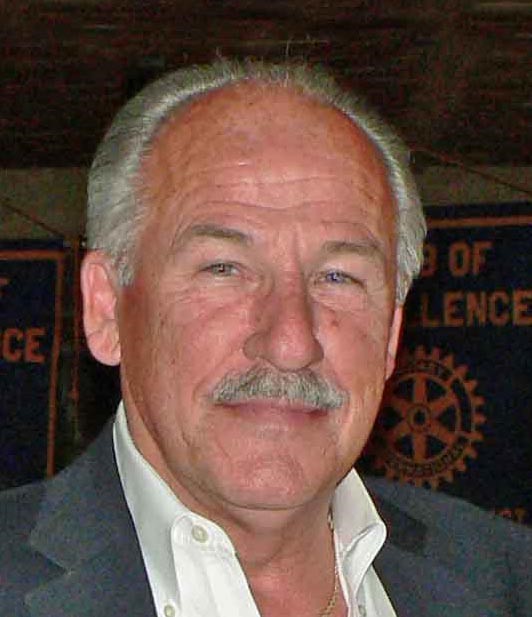 (Sept 26, 2023) PDG Dave Moyers is a Past President of our Club and was District Governor of District 5280 in 2007-2008. He is a real estate broker who started his career in August 1973, now completing 50 years in real estate (www.MoyersAndBradleyHomes.com). Residential real estate is popular in Palos Verdes because of its fine school system and community attractiveness. With the recent trend of working more from home, buyers often want a bigger home with more workspace. Dave reviewed the current residential real estate market in the Palos Verdes Peninsula area. He passed out a packet of fact sheets on local trends for the most recent 12 months. This included monthly totals of single-family homes and condos/townhomes for sale, sold, or pended. Homes were on the market for an average of about 30 days, ranging from 20 to 66 days. Current 30-year mortgage rates can be viewed on www.Bankrate.com (after answering questions about income, credit rating, etc). The average rate was 5.53% for 2022. The lowest recent rate was 3.15% in 2021, and the highest in the recent past was 16.64% in 1981. Average selling prices were about $2.6 million for single-family homes, and over $1 million for condos and townhomes. The average price per square foot was about $920 for single-family homes and about $630 for condos and townhomes. |
Mark Szilagyi, Craft Talk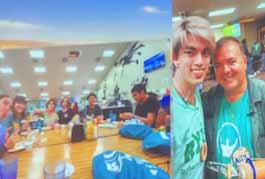 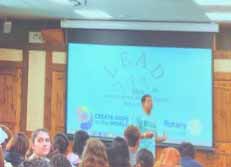 (Sept 12, 2023) Mark Szilagyi is one of our new members, and has helped us with setting up communications equipment at our Club meetings. He grew up in Redondo Beach and graduated from Torrance South High, where he took AP Computer Science courses. He is now pursuing these interests at El Camino College, while also working over the past year with Chase Thacker at the Palos Verdes center of Rolling Robots, helping to teach children about design and use of robots. The children are in several age groups, starting by learning basic computer logic and commands, and gradually progressing to electronics and building and programming hardware. He has a busy schedule balancing work and school. Mark attended the recent District RYLA (Rotary Youth Leadership Assembly) Sept 8-10 at Running Springs in the San Bernardino Mountains. (See photos.) Mark discussed his hobby of the past several years, picking & opening locks, which he learned from his father’s interests. He displayed several intricate tools and discussed how they work. He showed us transparent models of locks to show how different tools work on various parts of the lock mechanism. |
World Youth Day, Daisy Dominguez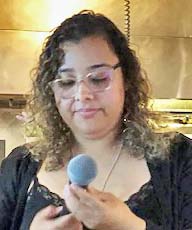 (Aug 22, 2023) Daisy Dominguez is a “youth activist” who grew up in Long Beach, where she enjoys family activities with her parents and 2 sisters and a brother. She works as a care associate at a cancer center in Long Beach, and helps to educate poor families in the community on how to save money. She has weekly church Bible study, teaches teens on Confirmation studies, and sings at 5:30 PM Mass on Sundays. Daisy attended World Youth Day (WYD), an inspiring Catholic religious retreat Aug 1-6 in Lisbon, Portugal. She could never afford to go to big religious retreats previously, but this year she managed to raise $500 in March for her registration by selling cookies and coffee (in the rain!). She showed us many photos of her experiences there. World Youth Day is a week-long Catholic gathering of young people from all over the world to promote ethical values and charity. It was founded by Pope John Paul II in Rome in 1986, and is repeated every several years in different host countries. The last one was in Panama in 2019, and the next one is planned for South Korea in 2027. Before each gathering begins, these young people are integrated into nearby dioceses in the host country to become better acquainted with the region’s culture, some of them staying in local family homes. |
Humanitarian Trip to Ecuador April 2024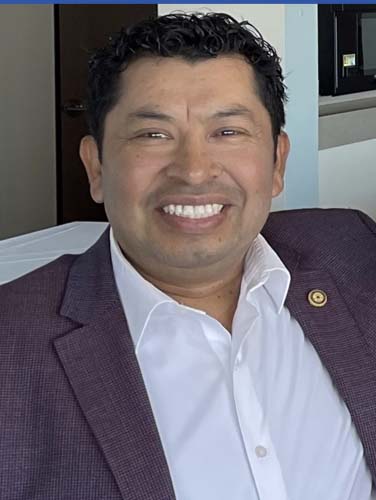 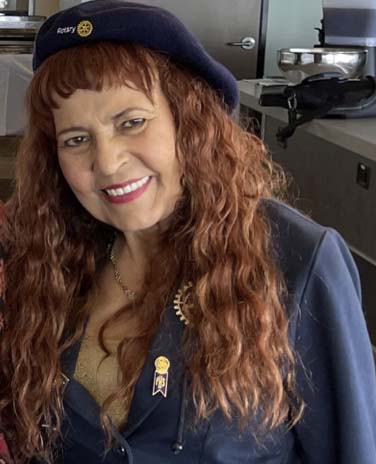 (Aug 8, 2023) René Mejia is a past president of the Bellflower Rotary Club and helps with the Camp Pendleton donation collection. He is the founder of California Exchange Insurance Center, a health-insurance exchange for physicians, insurance agents and the public. He has participated in 3 past District humanitarian trips. Dr Zoraida Suarez-Grossman grew up in Venezuela and came to the US in 1981 for medical training. She is a Neurologist in Encino and was married to the late PDG Leslie Grossman (who passed away in 2021). She is a past president of the Greater Van Nuys Rotary Club. She is a cochair with René Mejia of the District Humanitarian Trip to Ecuador in April 2024. 7 Global Grant Projects are planned for the Ecuador trip: environmental multimedia education, potable water for Andean communities and 8 water-treatment systems, educating teachers for Down Syndrome students, self-confidence training for adolescent girls, pacemakers for low-income cardiac patients, and Operation Smile (cleft palate repair). There are 4 other projects: instruments for youth orchestra, toilets for impoverished families in the city of Manta on the Pacific Coast, a peace garden in Quito, and oral hygiene training. These projects are sponsored by local Rotary Clubs and supported by District 5280 Rotarians and the Rotary Foundation. (Interested Rotarians can sign up for this trip on the District 5280 website.) Environmental education for the San Pedro River will include promoting clean environmental practices and active engagement of schools and communities for participating in cleanup and restoration of the river. A side trip will be available to the Galapagos Islands, which are on the equator 600 miles west of Ecuador. The Galápagos have a large number of unique species including the giant tortoise (Galápagos in Spanish), tropical birds & iguanas, sea lions, and the world’s only tropical penguins. These unique species and their potential relationships with other species elsewhere were studied by Charles Darwin in the 1830s and inspired his theory of evolution of species by natural selection. Most of the islands’ territory is protected as a National Park and Marine Reserve. |
District Governor Makiko Nakasone Club Visit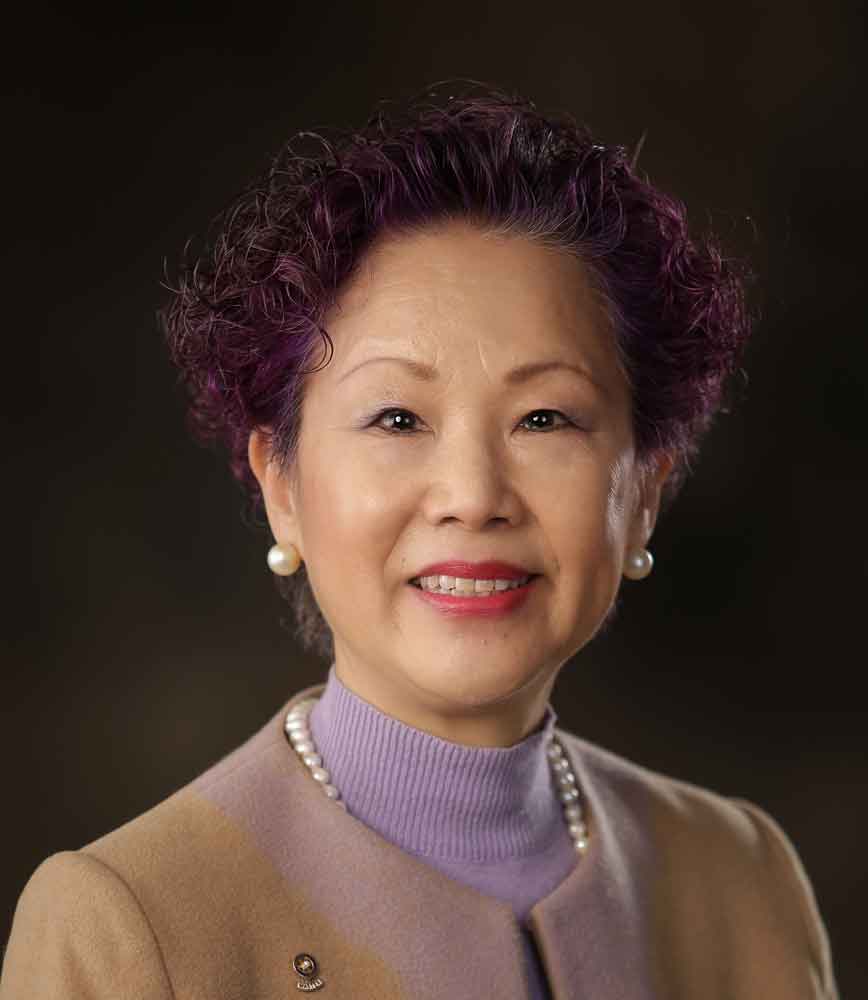 (July 25, 2023) Our 2023-2024 DG Makiko Nakasone has been a Rotarian since 2004 and is a member of the Glendale Noon Rotary Club. She showed us her childhood photos growing up in Japan near Mt Fuji. From there, she became an American Field Service exchange student to South Dakota in 1975-76, and a Rotary Ambassadorial Scholar to Germany in 1982-83. She majored in German at the Tokyo University of Foreign Studies and did graduate studies in Journalism at UC Santa Cruz. She has been a free-lance writer, financial news reporter, and a Japan Readers Digest Editor. She currently owns an educational services consulting company. DG Makiko’s Rotarian interests have included Rotary’s Peace Initiatives and New Club Development. We remember her promotion of the Rotary Model UN Peace Conference at Palos Verdes Peninsula High School on Oct 22, 2022, where a Hiroshima ginkgo tree offshoot was planted at the High School as a memorial to the 1945 Hiroshima bombing victims. A survivor of that attack near Ground Zero spoke to the attendees, and we also heard 2 Ukrainian War refugees and an Afghanistan War refugee speaking of their wartime experiences. DG Makiko’s 3 goals are:
Important coming Rotary events:
DG Makiko and Pres Victoria conducted the Induction of our newest member Evanswinda Valverde into our Club! 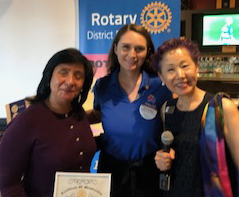 Pres Victoria presented a check for $200 from our Club to the Rotary Foundation! 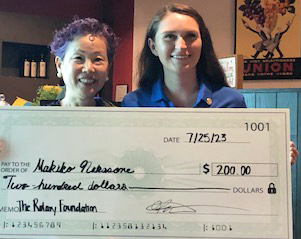 |
Long-COVID, Wes Bradford (July 11, 2023) Long-COVID is a group of health problems that either persist or begin after a typical COVID recovery period (3 months after onset), and is long-term, multi-system, and often severe. CDC COVID statistics say over 6 million Americans have been hospitalized from it and over 1 million have died (almost 400 times the deaths from the “9-11” attacks). Unvaccinated status has 6 times the risk of developing COVID and 14 times the risk of dying from it. (Most severe cases are spread from contact with someone with mild or minimal symptoms.) The most common Long-COVID symptoms are fatigue, shortness of breath, and memory problems (with possible increased future dementia risk). Every body system can be affected (to different degrees depending on previous health status, with poor health such as diabetes dramatically increasing risk of severity). These symptoms impact daily functioning, resulting in increased numbers of people staying off work or leaving their jobs, often due to chronic fatigue and low energy. So many parts of the body are affected because of immune system malfunction; Long-COVID starts to act like an autoimmune disease in arteries, damaging everything else, including the immune system’s “memory function” which we depend on to protect against future recurrences. Long-COVID prevalence is estimated at 5-50% (tens of millions of Americans), depending on definition of diagnosis and severity. There are no standard lab tests for diagnosis, and no drug treatments for it. (You can’t repair biological damage with drug molecules that don’t exist in nature, because the body is made from nutrient molecules that do exist in nature.) Although Long-COVID is less likely if the initial infection was milder, it can occur even after non-apparent initial cases. It overlaps with Chronic Fatigue Syndrome, and both can involve reactivation of old Epstein-Barr Virus (in the Herpes family of viruses, which hibernate lifelong in the nervous system). Health factors with increased risk include diabetes, overweight, insulin resistance, hypertension, and lung disease, which are all mediated by biochemical inflammation. Lifestyle factors include poor nutrition, smoking, stress, and poor sleep (under 8 hours). (Sugar & high-carb diets increase risk even without diabetes.) The best lifestyle defense is to stay healthy (healthful “organic diet”, exercise, low stress, don’t smoke, low alcohol, and good-quality sleep). People often ask about COVID nutritional supplements. Studies show help from antioxidants such as Vitamin C up to 2000 mg daily spread throughout the day, and Astaxanthin 1 gelcap daily (a potent oil-soluble antioxidant that penetrates cell membranes). Oil of oregano mobilizes the immune system quicker (take one gelcap immediately at onset of any viral symptoms; available at Sprouts Market; keep refrigerated for freshness). Other supportive nutrients (buy good quality) include vitamin D3 (keep blood levels of 25-OH D3 up to 50s or 60s), Magnesium, Zinc, and Selenium. (Minerals should be in chelated form for bioavailability, not as “oxide”. Anti-acid drugs interfere with absorption.) |
Club End-of-Year Celebration(June 27, 2023) We celebrated the very successful year of our Club President Victoria Perez-Thacker at the Crème de la Crêpe Restaurant with our family members and friends. We enjoyed conversation, great food and cool music from a 4-member band, while the kids entertained themselves (mostly). Victoria thanked the Club officers & members for their support, and gave out service awards. Victoria will be continuing as our President for 2023-24, and most of our officers will also continue. The Rotary Theme for 2023-2024 is “Create Hope in the World”. 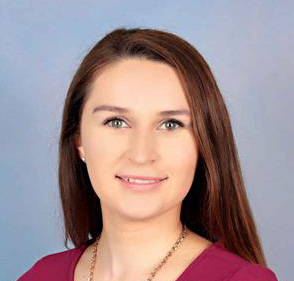 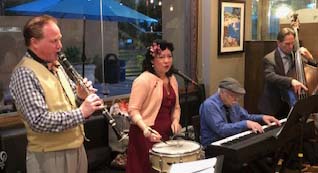 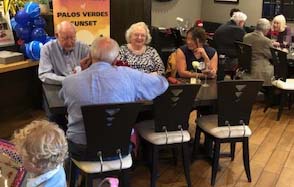 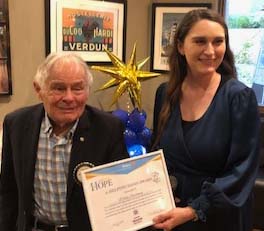 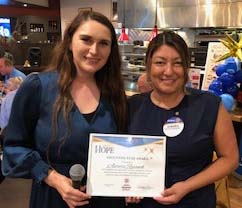 |
Marketing in Palos Verdes, Branding Strategist Vince Olivieri(June 13, 2023) Vince Olivieri moved to California from Miami, Florida, 10 years ago. He and his wife are expecting birth of a baby girl soon. He has been in marketing/sales management for 8 years. He has now become a branding strategist and publisher for “Neighbors of Rolling Hills & Estates”, a “Best Version Media” production expected to launch in Sept 2023. This will be a no-cost monthly magazine distributed to “high-value homeowners” in the South Bay area, as well as a digital version, and will be supported by advertising by local businesses and non-profit organizations. The magazine will feature a new family each month and share their stories with thousands of local readers. His goal is to bring neighbors closer together and to support local businesses and nonprofit organizations. Vince is looking for interested organizations who need publicity. He displayed samples of several magazine covers published by Best Version Media in other market areas. BVM provides the resources and training for individuals like Vince to develop their own business to become a local monthly community magazine publisher. These local publications can help to build brand awareness and make both print and digital advertising easy for community business owners by placing and managing local targeted ad campaigns on Facebook and Google as well as in print. It provides monthly reports to advertisers on how many people are seeing their brand every month. Digital advertising is a time-consuming task, so he wants to make this experience easy and cost-effective for businesses to build their brand-awareness in their local community. |
Aurora Rysanek, Craft Talk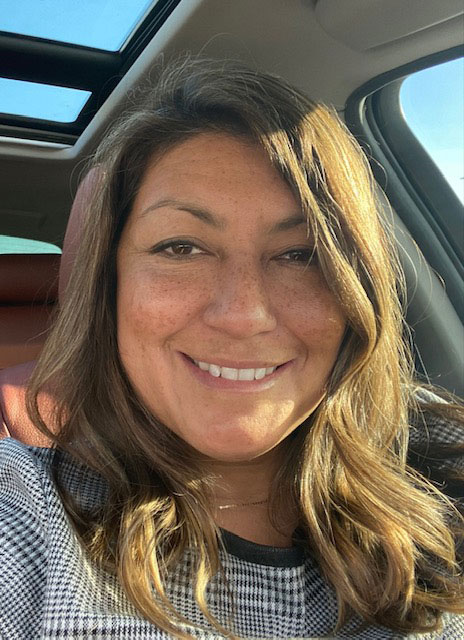 (May 23, 2023) Aurora was sponsored into our Club by Past President Victoria Perez-Thacker. She is a marketing director and lives in Rolling Hills Estates with her husband, Miki. Her father had an MBA degree, so she grew up in a business-oriented family. She enjoyed art, music, and sports, and got her first job as a dog-walker. She was a Girl Scout and was active in sports such as track and tennis. After graduating from Torrance HS, she majored in Art History at El Camino College and received a BA in Graphic Design from the Art Institute of LA in 2001. Aurora has had a number of positions in graphic design and marketing for companies such as Staples Center, the Bay Animal Hospital in Manhattan Beach, and SCORE Sports in Wilmington, manufacturer of sports uniforms and equipment. She enjoys creativity, communication, and problem-solving. When not at work, she enjoys books, hiking in wilderness areas, snowboarding, yoga, soccer, surfing, sailing, and spearfishing. (Did we miss anything?) Now she has her new Rotary family to give of herself in service to others. |
Club Assembly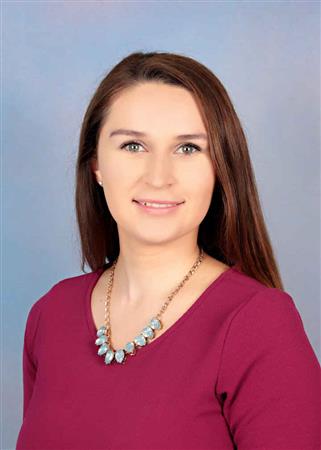 (May 9, 2023) Pres Victoria opened the meeting with announcements, including the coming District Assembly Sat, May 20, to prepare for the new Rotary Year. Treasurer Charley Ferraro reviewed our Club budget for the year so far. Income is ahead of expenses. Our charity fundraisers on July 4, PV Concerts, and Whale of a Day, brought in a net $6705. Our Siany Orphanage & School project in Kisumu, Kenya, has been completed, with $8000 from our Club including generous help from our late member Astrid Naviaux. They sent us photos of the construction in progress. Coming Club Service volunteer opportunities (sign up!):
Our District Grant Project, the Lomita Sheriff’s Memorial Center, has been completed and will have its opening Ribbon-Cutting Ceremony & Dinner Tue, June 13. We have openings for next Rotary year for:
Rotary Growth Opportunities for all of us:
|
District Humanitarian Trip to Belize, Wes Bradford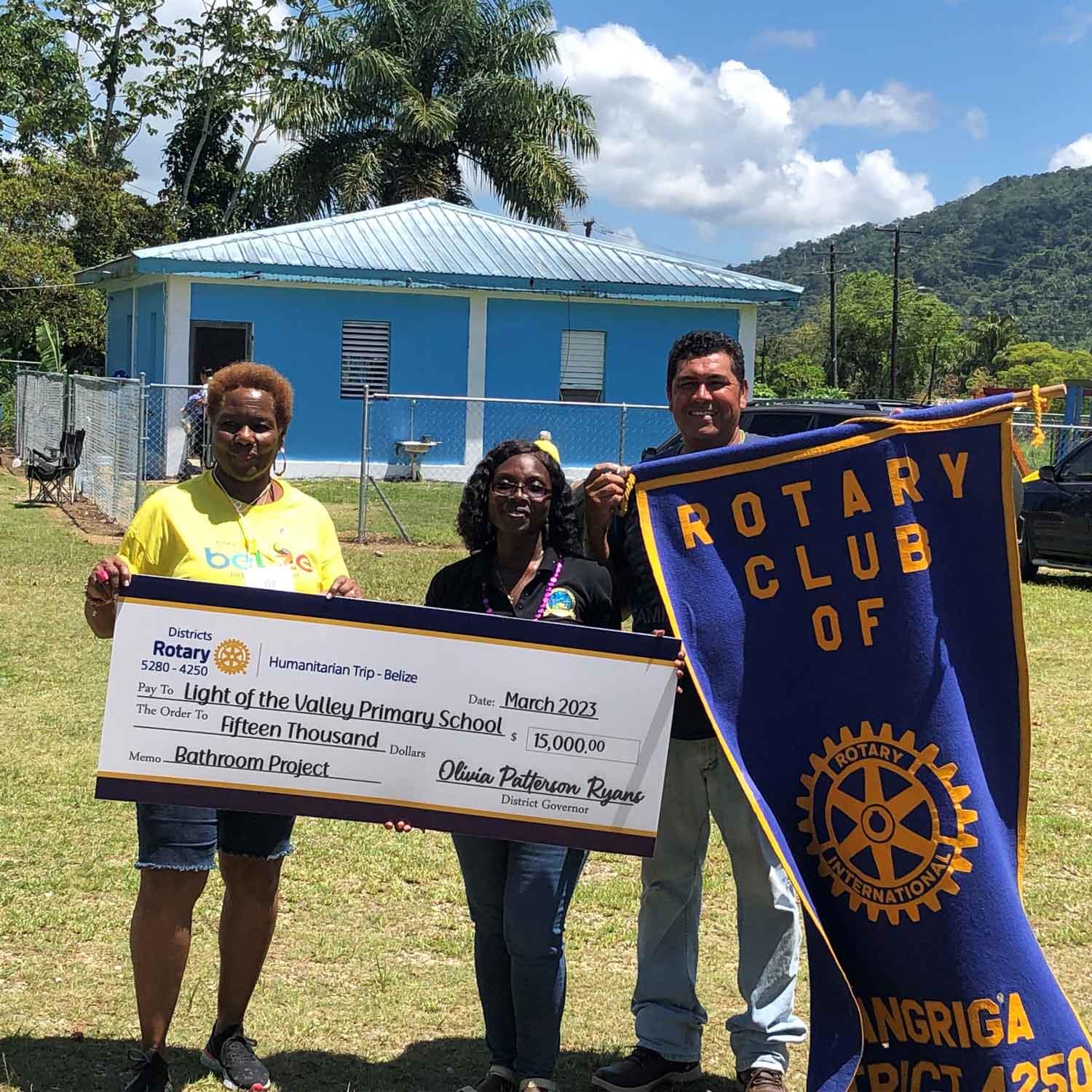 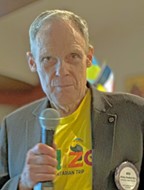 District Gov Ryans presenting a check for restroom upgrade to a primary school (Apr 25, 2023) Wes Bradford presented his photos and experiences on the District 5280 Humanitarian Trip to Belize on March 23-28, 2023. About 100 Rotarians from our District participated with the Rotarians of District 4250 in Belize, for 15 life-changing service projects to improve the lives of their people, while enjoying international Rotary fellowship and unforgettable memories. Funding of about $215,000 was provided by both Districts and by Global Grants, and the projects were coordinated by local Rotary Clubs. This trip provided an opportunity for our Rotarians to visit the projects in progress and to do some hands-on work on-site with local Rotarians and students. The projects included upgrades for school facilities, scholarships, tree-planting, and mentoring for youth at risk. Adolescent girls often miss several days of school every month because of lack of privacy for their sanitary needs, so upgraded private restroom facilities help girls in low-income families to stay in school, complete their educations, and enable them to contribute financially to their families and communities as adults. The government is unable to pay for education after primary school, so some high school scholarships are being provided to enable children from poor families to fulfill their educational potential. The female Rotarians met one-on-one with adolescent girls from poor families, to show them as adult female role models how to work through stress and trauma and to show them that women can achieve educational and economic success beyond society’s traditional “homemaker” roles. The male Rotarians met one-on-one with adolescent boys who had gotten into conflict with the law enforcement system (for minor infractions), to discuss with them how forgiveness and focus on future goals and self-development can help them turn their lives around and become successful adults. |
David Mach, Torrance Transit Planning(Apr 11, 2023) David Mach is senior business manager for transit planning for the City of Torrance. LA Metro is planning an extension of the Metro C (Green) Line from the Redondo Beach (Marine Ave) Station to the Torrance Transit Center Station, and has prepared a Draft Environmental Impact Report. The Green Line will soon link to the LAX Connector system. Compared to many other urban areas, the South Bay area has been deficient in public transportation options, because it was built for an era of freeways with assumed universal auto ownership. The Torrance City Council unanimously supports the option of keeping the light rail line on Metro’s existing Elevated/At Grade Right-of-Way, not on Hawthorne Blvd where construction would be disruptive. This Right-of-Way heads south between Hawthorne & Inglewood boulevards in North Torrance, then goes diagonally southeast, crossing overhead at Hawthorne & 190th St, and continuing southeast to the Torrance Park & Ride Transit Center at 465 Crenshaw Blvd. This option is shown as the blue line on the accompanying map (see https://www.metro.net/projects/green-line-extension/ for details). It could be completed by fall 2033 at a cost of $1.96 billion. (This could be prioritized for the 2028 LA Olympics, for an additional ~$1 billion.) 2 other options under consideration, shown as green and orange lines on the map, would result in higher cost and later completion dates. The Trench option would follow the existing Metro Right-of-Way with major construction to create below-grade trenches, for $2.84 billion and completion in early 2036. The Hawthorne Blvd option would be an elevated train along the center of Hawthorne Blvd, for $2.96 billion and completion in fall 2035. Construction of either of these other 2 options would result in additional impacts to local businesses and residences. 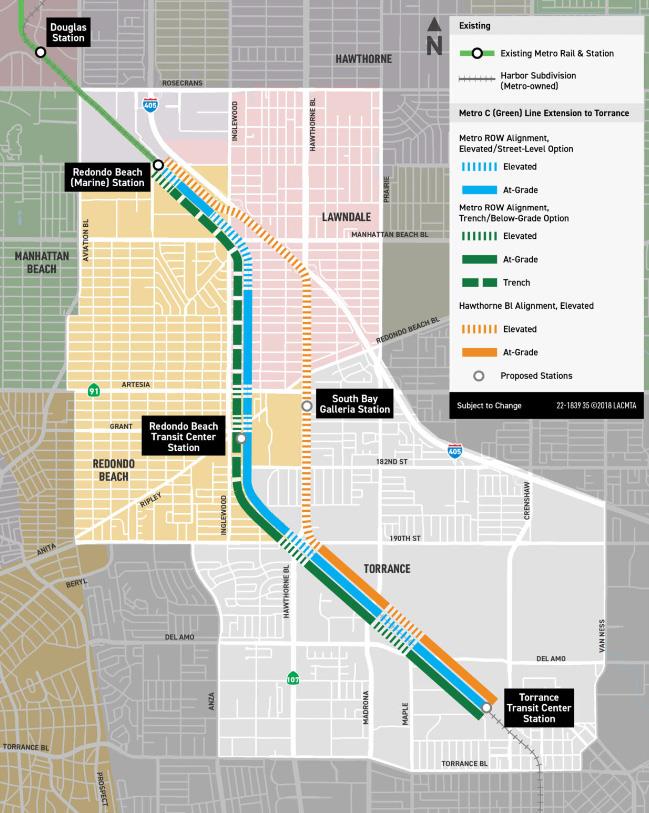 |
Daisy Dominguez, Youth Activist(Mar 28, 2023) Daisy Dominguez was born and raised in Long Beach. She lives with her parents and 2 older sisters and younger brother. She enjoys watching movies and games with them, and visiting other family members. Her extracurricular activities include serving and educating community members. She works as a care associate at a cancer center in Long Beach, and educating families in the community on how to save money. Mondays she has Bible study with the young adult group at St Margaret Mary’s, and on alternate Fridays they have “events”! On Wednesdays, she teaches Confirmation with Life Teens at the Holy Trinity parish, and sings at the Life Teen Mass at 5:30pm on Sundays. She could never afford to go to “big retreats”; her community retreats were in the cafeteria. She is inspired as the first person in her generation to do this. She also wants to meet more of her “brothers and sisters” all around the world and exchange testimonies with them. When she’s “called to go”, she goes! A quick story: She had a bake sale on March 4th, but had no money for registration, $500 due the following Tuesday. She sold cookies and coffee in the rain, and made it to registration by the end of the last morning Masses! (Then sang at the 5:30 PM Mass, feeling peace!) |
Palos Verdes Peninsula History, Michael Friedman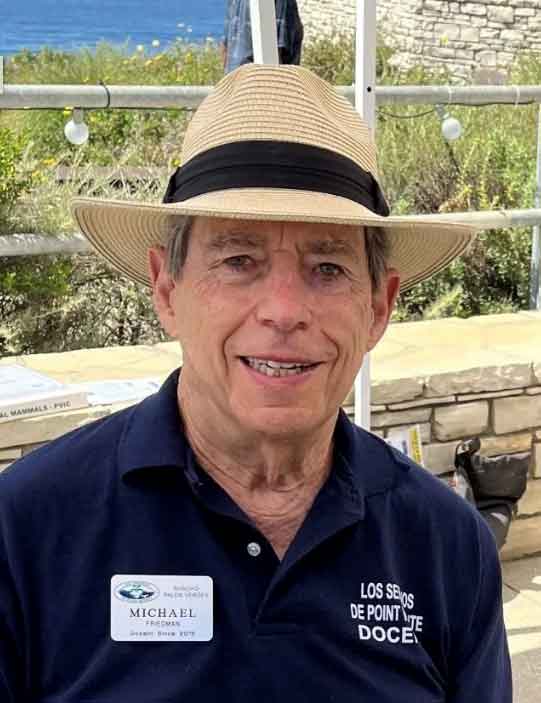 (Mar 14, 2023) Michael Friedman is a docent at the Point Vicente Interpretive Center, and a retired attorney and long-time Palos Verdes resident. The Interpretive Center is located on the cliffs adjacent to the Point Vicente Lighthouse in RPV. It features exhibits on the natural and cultural history of the Peninsula, and on the Pacific gray whale whose annual migration can be observed from the Center. The Palos Verdes Peninsula is an elevated area on the southwest corner of Los Angeles County. It was one of the Channel Islands in prehistoric times before the Los Angeles basin emerged from the Pacific Ocean. It was occupied for thousands of years by the Tongva-Gabrieliño Native Americans. Spanish explorer Juan Cabrillo made the first European contact in 1542, and it became part of “New Spain”. Franciscan priests led by Father Junípero Serra established 21 missions between 1769 and 1833 to “spread Christianity” among the local Native Americans. Missions were situated about 30 miles apart, one day’s journey on horseback, along the coastal El Camino Real (Royal Highway). Native Americans were settled around these missions with military assistance to perform construction, to raise crops and livestock to support the missions, and to learn Spanish and Christianity (a sometimes-brutal cultural conversion). Abuse, malnourishment, infectious diseases and overwork were common, and children were taken away from their parents to suppress Indigenous culture. Spain was unable to maintain its colonies due to conflict with France, and Mexico achieved independence in 1821. In 1833, Mexico emancipated native people from the missions, and granted land to settlers, soldiers and some indigenous people. Some of these settlements eventually grew into cities that retained the mission names. In 1846, José Sepulveda and José Loreto received a Mexican land grant named Rancho de los Palos Verdes (“Green Sticks Ranch”), which was used for a cattle ranch, and also briefly as a whaling station on its southern coastline in the mid-19th century. US rule came in 1846, followed by the Gold Rush. Ownership of the Peninsula passed to Jotham Bixby, who leased the land to Japanese farmers. Wall Street banker Frank Vanderlip purchased 25 mi² of the Peninsula in 1913, impressed by its beautiful scenery. He planned an Italian-style development to be designed by the Olmsted Brothers. Although delayed by World War I and then the Great Depression, eventual improvements included many sewers, water mains, roads, landscaping, parks, and a golf course. 1/4 of the land area was devoted to permanent undeveloped space. Palos Verdes was opened for public inspection in 1923, and the city of Palos Verdes Estates was established in 1939. Rolling Hills Estates and Rolling Hills were established in 1957, and Rancho Palos Verdes was established with most of the remaining Peninsula land in 1973. |
Joseph Nwabuzor, Craft Talk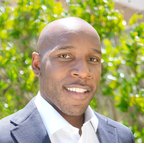 (Feb 28, 2023) Joseph Nwabuzor was born in Los Angeles and has 3 sisters and 1 brother. His parents immigrated from Nigeria. His family moved from Carson to Rancho Palos Verdes when he finished 5th grade. He attended Miraleste Intermediate School and Peninsula High School and loved playing basketball there. He transferred to Mira Costa High School in his junior year to play under a coach he admired there, and graduated in 2003. Then he attended Orange Coast Community College, played basketball and football there, and obtained an associate degree in Business Administration. With an athletic scholarship, he attended Acadia University in Nova Scotia, but left after 2 years to make money playing basketball in Norway, where he lived for 8 years. |
Social Hour & Peninsula Symphony Concert (Feb 19, 2023) We met at the Maderos Cocina Mexican Restaurant on PCH in Redondo Beach for a Social Hour and dinner at 4 PM, prior to attending the Peninsula Symphony’s 2nd concert of its 2022-2023 season, in the Redondo Union HS Auditorium at 222 N PCH in Redondo Beach. The Pre-Concert Lecture was presented by new Conductor David Cubek at 6:15 PM, to discuss the evening’s performance starting at 7 PM. (Thanks to Chuck Klaus for the notes on the program.) The concert theme was “French Rêveries”, with Claude Debussy’s “Prelude à L’après-midi d’un faune”, followed by Maurice Ravel’s “Ma mère l’oye” (Mother Goose), and Georges Bizet’s “Carmen Suites Nos 1 and 2”. Concert admission is free. Coming concerts will include April 23 (works by Mendelssohn, Mozart, & Schuman) and June 25 (works by Coleridge-Taylor, Dvorak, Ginastera, Piazzolla, & Márquez). The Peninsula Symphony is a non-profit community organization that presents 4 admission-free concerts per year, supported in part by memberships starting at $75/year. For more information and to support this organization, go to http://www.pensym.org/. |
Renewable Energy, Electric Vehicles, and Enabling Laws, Yuko Saito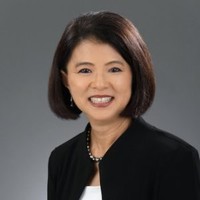 (Jan 24, 2023) Yuko Saito-Rodriguez is Regional Manager for Velur Enterprises (https://velurii.com/), a leading land-investment firm in Woodland Hills that offers a safe investment vehicle in land for solar and wind energy production, for cash and retirement plans. She has been a land investment consultant for private fund managers and has spoken at many Rotary clubs in Southern California. She is a member of South Bay Sunrise Rotary. California is the most populous US state, with 40 million people in 2018 and estimated 50 million in 2055. If it were an independent country, California’s GDP would be the 5th largest in the world, and Southern California’s GDP would be 12th largest, ahead of the Russian Federation. California’s GDP is almost as large as Germany’s, the world’s #4 economy. Los Angeles is the “economic capital” of California, with 60% of its population, $60 billion in alternative energy installation, over half of its largest companies, and 67% of California’s international trade, with the 3rd busiest port in the world. Although fossil fuels have caused an economic miracle over the past century, burning fossil carbon is promoting global warming. Saudi Arabia, the world’s largest oil producer, is selling off petroleum assets and preparing for a world beyond oil. Ford and other auto companies are chasing Tesla for electric vehicles sales. Los Angeles announced the largest E-bus order in history, and a $1 billion California EV charging project has been approved, mostly for trucks. The recent US “Inflation Reduction Act” includes money for the “green economy”. Many land parcels of various sizes are being bought by solar companies in California, which has 7 of the 10 largest US solar farms. 100% of California’s electric power is planned to be renewable by 2035, and solar is the cleanest and most abundant energy source, now less expensive than from fossil fuels. The LA Department of Water and Power is planning a large battery electric storage system and switching station. Land in Kern County that sold for $24,000 per 2.5 acres in 2015 is now selling for $65,000. For utility scale solar & wind development, professional land consolidators and site selectors are allowing investment land ownership by individuals. Money can be made by owning land for transmission lines, easements, and purchase or lease. The Clean Power Alliance purchases clean power for delivery by Southern California Edison. New buildings in California will increasingly be required to use clean renewable energy sources. Energy storage, such as in batteries, and renewable energy for transportation technology are also increasing. Sale of new gasoline-powered cars will be phased out in California over the next 13 years. Electric cars’ miles per gasoline equivalent (MPGe) are about 5 times as large as for comparable gasoline cars. The Redwood company is creating a supply chain for lithium-ion batteries across collection, refurbishment, recycling, refining and re-manufacturing of sustainable battery materials, with the goal of recycling 100% of EV batteries. The scale of renewable energy investments now is much greater than investments in the original Industrial Revolution. (“The best investment on EARTH is EARTH.”) |
Club Planning Meeting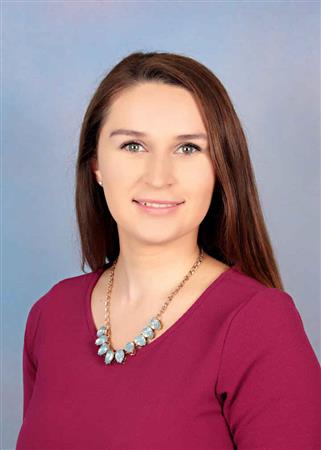 (Jan 10, 2023) Pres Victoria asked us for our ideas & preferences for speakers for our meetings, and for what types of service projects we are interested in doing. A Club Questionnaire was passed out for written ideas. (Also, notify her if you are interested in serving in a Board position.) We received the sad news that our long-time member Larry Andrews passed away on Jan 8, 2023. Our meeting attendees signed a condolence card, and took turns relating our memories of him. He was active in the community as well as in Rotary. He served as group leader of the Tuesday Writing Group at the Peninsula Center Library, while writing several novels (starting with “A Space Oddity”, available on Amazon). Many of us also remember him as an enthusiastic supporter of the Peninsula Symphony. President Victoria discussed humanitarian issues related to the war in Ukraine. Many people of Ukraine have fled their homes and/or have family members lost or separated. What they need most is safety, and Rotary has been working with other organizations for humanitarian needs. Clubs have been providing food, water, medical equipment, and other supplies. |
Holiday Brunch @ The Original Red Onion Restaurant(Dec 11, 2022) We assembled at The Original Red Onion Restaurant at 11:30 AM Sun, Dec 11, for our Holiday Brunch. Our buffet line served roast beef, sausages, scrambled eggs, French toast with maple syrup, a beautiful fruit salad, and champaign & orange juice (plus the usual taco chips & salsa on the tables). We brought our gifts for the Salvation Army Angel Trees program, that brings children and their incarcerated parent together on Christmas. We had picked up the children’s name tags at a previous Club meeting, with the individual child’s name, clothing sizes, and requests. (Joseph Nwabuzor brought a big pink bicycle!) After the Brunch, Pres Victoria & Chase Thacker loaded these gifts into their vehicles to take to the Salvation Army. During the meal, we were serenaded by a holiday quartet (dressed like 1800s London!), with Christmas carols, and ending up with Mexican music accompanied by guitar (by Alberto, on the right in the photo).
|
Game Night: “Thanksgiving Answer-Battle!”
(Nov 22, 2022) Pres Victoria set a Holiday mood by conducting a brain-teasing computer game, “Thanksgiving Answer-Battle!” Dividing the attendees into 2 teams, she had 4 events, with multiple answers in each event awarded points from 50 to 100 (accompanied by contest music). The 4 events were: 1. “Name a dish served at Thanksgiving besides Turkey” 2. “What kind of pants are best to wear when you’re planning to overeat at Thanksgiving?” 3. “Name a Thanksgiving craft children make at school” 4. “Name a farm animal a turkey might imitate to escape being eaten at Thanksgiving” One final Holiday reminder: Don’t forget to set your bathroom scale back 15 pounds the previous night at 1 AM! |
Operation Blankets of Love, Eileen Smulson  (Nov 8, 2022, by Zoom) Eileen Smulson has worked in education, private entrepreneurship, and nonprofit development, with over 30 years of experience in fundraising, community building, business management, and strategic planning experience. She won top fundraiser awards as Director for 14 years of Corporate and Community Development for the Anti-Defamation League (the largest human relations agency in the US). She was also Associate Development Director for the American Cancer Society and Regional Director for the Western States for Magen David Adom (a relief/rescue service), increasing donorship by 400% and doubling financial goals. In 2008, Eileen Smulson saw puppies shivering on a hard cold floor in cages at an animal shelter. She learned that animal rescue groups needed not only blankets and towels, but other comfort and care items such as leashes, collars, carriers, and crates. In several months, she had established 20 drop-off locations and collected over 3,000 items. She founded Operation Blankets of Love, a service organization with innovative solutions for both supporting and adopting these vulnerable shelter animals. OBOL’s mission is to inspire people nationwide to prevent animal cruelty and help these animals. Her efforts have been featured on national TV, radio animal shows, magazines, and news stations, and have been widely copied locally and nationwide. She showed 2 videos, one a feature of OBOL, and the other a recent ABC Channel 2 presentation:
OBOL information and contact (Eileen Smulson, Executive Director, Granada Hills, CA):
|
Offsite @ Cabrillo Marine Aquarium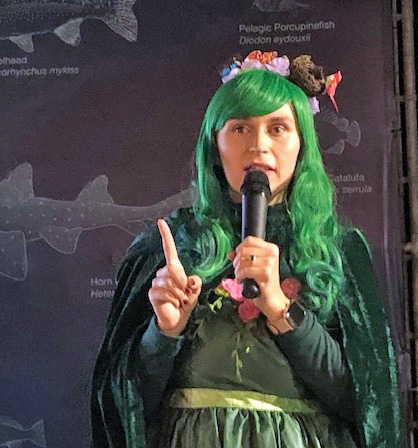 (Oct 25, 2022) We had a joint meeting at the Cabrillo Marine Aquarium in San Pedro, with the Carson-Gardena-Wilmington, San Pedro, & Wilmington Rotary Clubs. Our President Victoria Perez-Thacker presided (in her best Halloween finery). After fellowship among the Club members, we went through the food line for chicken with mushroom gravy, pasta, and green salad, and choice of red or white wines at our tables in the patio area. Those who were brave enough to come in Halloween-themed costumes (including the kids) were voted on for the best (3 trophies were awarded). Past-President Steve Johnson provided security in his knight costume (he took off his helmet to avoid frightening anyone). |
Model UN Peace Conference(Oct 22, 2022) Jon Caplan organized our Club’s participation in the Model UN Peace Conference at Palos Verdes Peninsula High School, 9-4:30 on Oct 22. This was a Rotary Global Grant Peace Educational Project promoted by District Governor-Elect Makiko Nakasone (Glendale Noon Rotary Club) and supported by 9 Rotary Clubs in our District 5280 and District 2750 in Japan. Student participants came from 6 High Schools in the South Bay area, as future peacebuilders to learn about conflict resolution and the importance of nuclear disarmament to prevent a future disastrous global catastrophe from miscalculation and misunderstandings. They listened to inspiring presentations from a Hiroshima Atomic Bomb survivor, fugitives from the war in Ukraine, and (by Zoom) an Afghanistan inhabitant, and they learned how Peer Mediation can work to avoid conflict. There was a tree-planting ceremony on the High School grounds of a ginkgo sapling, grown from seeds of a tree in Hiroshima that had been blackened by the bomb radiation, but began leafing out again the next year as an inspiring illustration of new growth and renewal; these are being planted all over the world now as a symbol of peace and reconciliation. 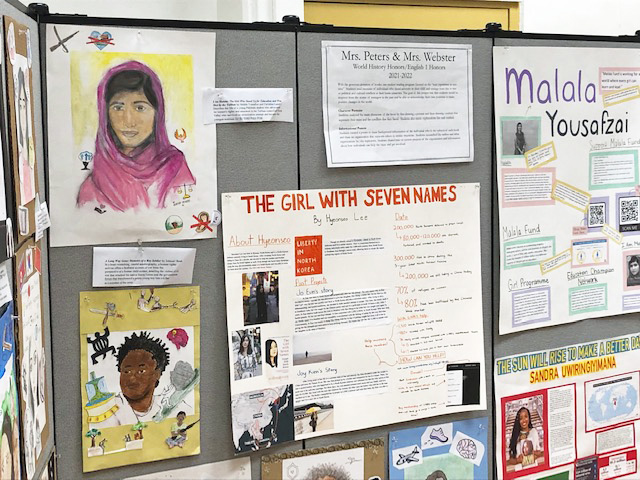 High School display of youth who have survived brutal conflict in the world 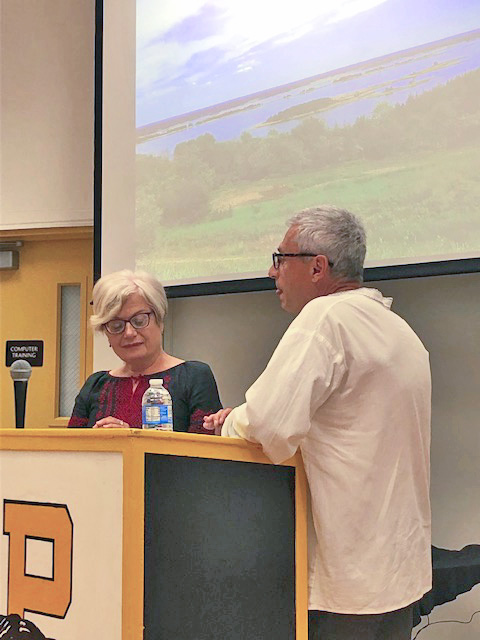 Ukraine refugees Oksana Zayachkivska and Ihor Kukhlevsky 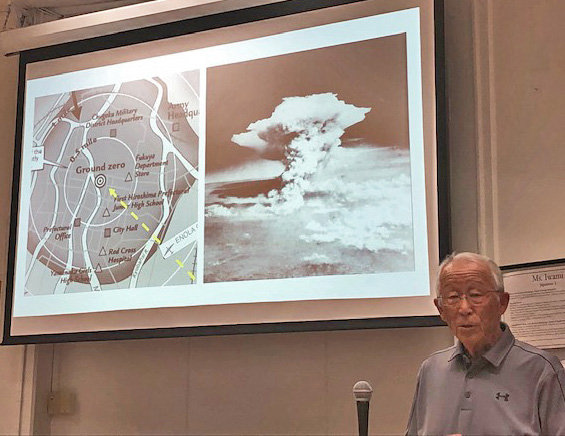 Howard Kakita, 90-year-old Hiroshima A-Bomb survivor (near ground zero) 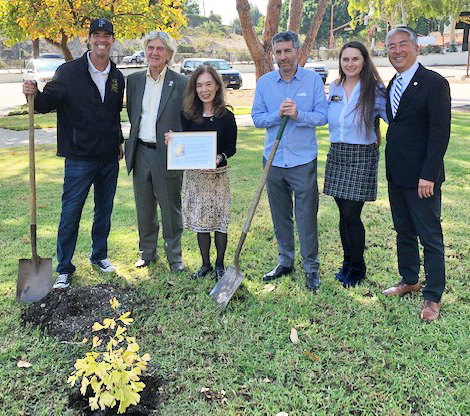 Tree-planting of Hiroshima Survivor ginkgo tree descendant at PV Peninsula HS, with Japanese Rotarian, PV Sunsetters Jon Caplan & Victoria Perez-Thacker, and Assemblyman Al Muratsuchi |
Sustainable Swaps, Bailey Duarte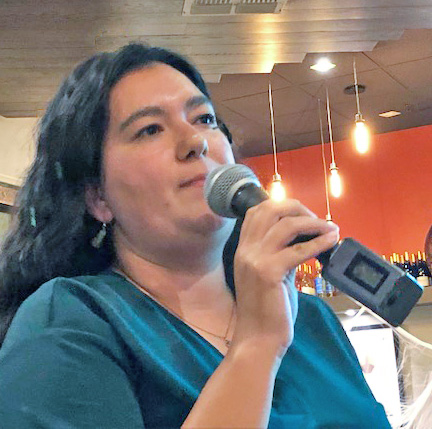 (Oct 11) Recycling is needed to minimize the increasing accumulation of trash, chemicals and micro-plastics in the environment. The disposables that we deposit in our curbside color-coded bins have important but unseen impact on the environment of all of us. Landfills release methane gas, which is 25 times more potent than CO2 at trapping heat and promoting climate change. Micro-plastics enter the soil, water and food supply, and are infiltrating every living thing on the planet. Landfill space is becoming increasingly limited. Climate change is driven by excess release of greenhouse gases, including CO2, methane, CFCs (chemicals), NOx & SOx (nitrogen & sulfur oxides). Southern California is in the 3rd year of La Niña with unprecedented drought & wildfires. We are getting stronger storm systems and rising sea levels threatening coastal structures and transportation systems. Disposed plastics in the environment including the ocean are breaking down by solar energy into microscopic particles that are now found in the bloodstreams of all of us, spread by storm water, litter, gigantic trash gyres in the ocean, and defective recycling efforts. We can all contribute to reducing this accumulating burden by demanding less plastics when shopping for consumer goods. Bailey reviewed the trash & recycling guidelines for the local cities. RPV uses EDCO, Rolling Hills uses Republic Services, and PVE uses Athens Services. Different companies have access to different types of facilities. Trash companies take recyclables to resell to the materials market. “Wishcycling” is putting in things you “hope” are recyclable, but inappropriate items have to be separated later, impairing recycling efficiency. The blue bin takes aluminum, glass, cardboard & paper, but not soiled paper plates or grocery bags. Plastics #1 are easiest to recycle; #2 & #5 can be processed by Athens; Styrofoam can now be processed by EDCO. The green bin takes organics under the new statewide organic recycling program, to break down food waste and other organic materials into fertilizer. This includes food and compostables and food-soiled paper, but not plastics, glass, metal, gloves, pet waste or Styrofoam. This helps avoid outgassing methane into the atmosphere from rotting organics. |
DG Olivia Ryans, Club Visit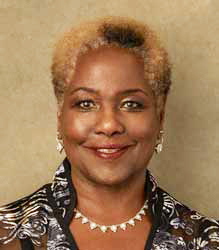 (Sept 27) Our District 5280 Governor Olivia Patterson Ryans received a BS degree in math and psychology and a Master’s degree in Administration and Management of Schools from Pepperdine University. She taught high school algebra and geometry and became a school administrator with LAUSD. Then she became a manager in the auto industry and Executive Director of a nonprofit real estate agency. She now specializes in the commercial sector. She was President of the Inglewood Rotary Club and has served in District positions and on the board of directors of Music Mends Minds. She has participated in our District’s Humanitarian Trips and observed Rotary Foundation donations at work. She and her husband support the Rotary Foundation and Rotarians Inspiring Hope. She spoke about the aspirations and goals for our District, the Soul of Rotary 2022 Foundation Celebration at The Novo at LA Live on Sunday, Nov 20, and the District 5280 Humanitarian Trip to Belize Mar 23-31. She welcomed our new members: Aurora Rysanek, Joseph Nwabuza, and Mark Szilagyi (our new audiovisual technologist). She presented PDG David Moyers with a Diamond pin for his generous support of the Rotary Foundation. |
Rotary in Ukraine, Ihor Kukhlevskyy, DDS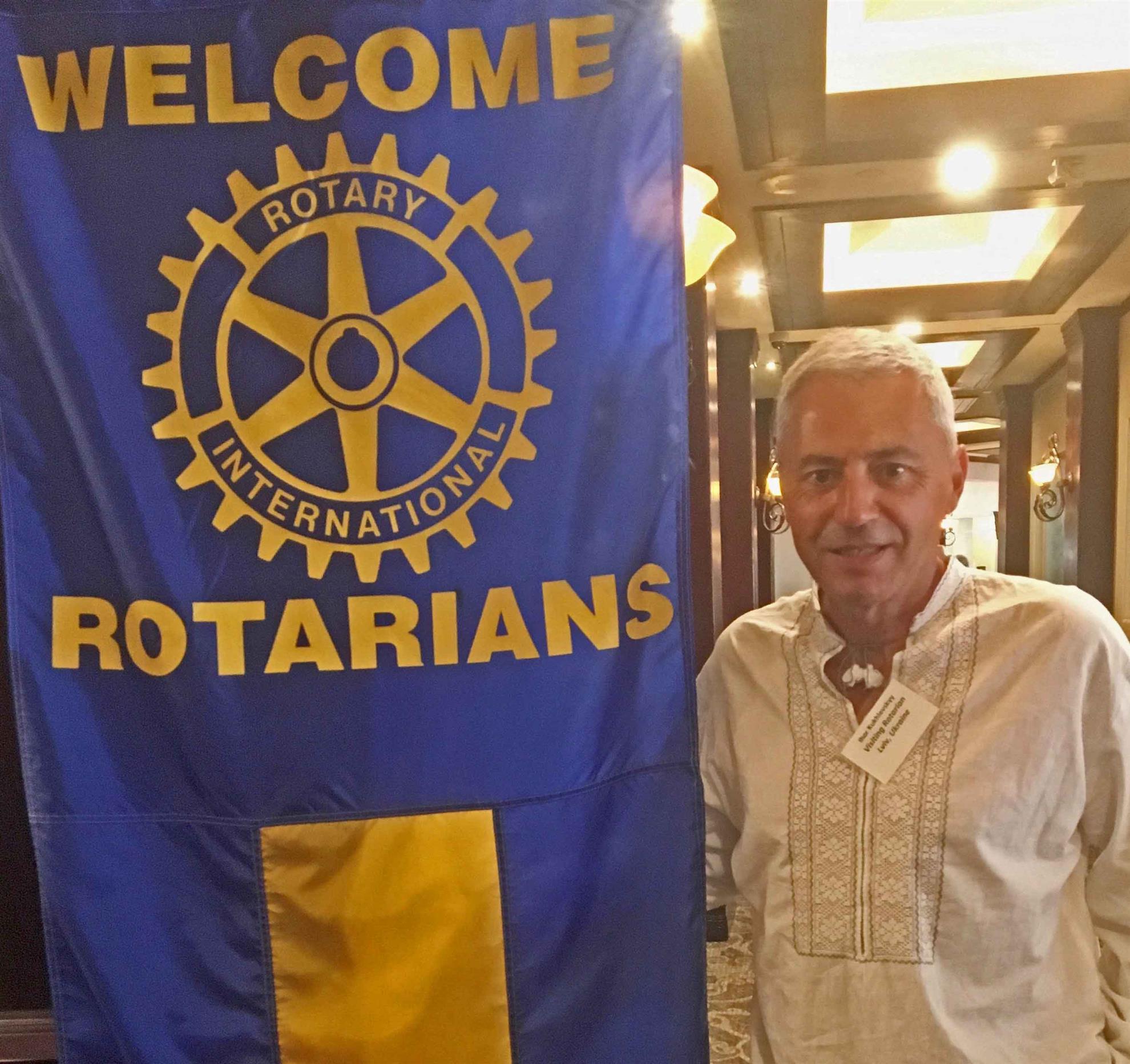 (Sept 13, 2022) Ihor Kukhlevskyy, DDS, has been a Member of the Rotary Club of Ratusha Lviv (Ukraine) since 2010, & cashier (Treasurer) of the Club since 2019. He has been in Dental Practice in Lviv, Ukraine, from 1997-2022. (He is now in the US.) Lviv is a city in western Ukraine (a “doorway” to western Europe). Rotary has been in Ukraine since 1930, and the Lviv Club was founded in 1936. As of 2021, there were 1100 Rotarians in Ukraine with 66 Clubs, including 9 in Lviv & 8 in Kyiv. His Club has 25 members and meets Mondays at 7 PM. Among their Rotary Matching and Global Grant projects were incubators for newborns, a portable ultrasound diagnostic system, beds for tuberculosis treatment, a minivan for a family-type orphanage, an operating microscope for a regional burn center, a cardiology hospital procedural lighting system, water supply for a school & small community, a laparoscope for gynecological procedures, and preserving the Lviv University Library collection. They have had 8 grants since 2010 with partners from 5 countries including the US, and helping an estimated 10,000 people. Their latest project, with RC Edmonton (Canada), is equipment for the Lviv Blood Station in August 2022. Their next project is for a quick-freezing system for blood plasma in Lviv. It is amazing what dedicated Rotarians can accomplish in the midst of war. Their example is an inspiration for all of us! |
Cardboard Boat Race!Cardboard Boat Race results at the District Picnic on Sept 3 at the Seaside Lagoon in Redondo Beach: Our Club got 2nd in the first heat and 4th in the final. Thanks to our volunteers who constructed, painted, & paddled! 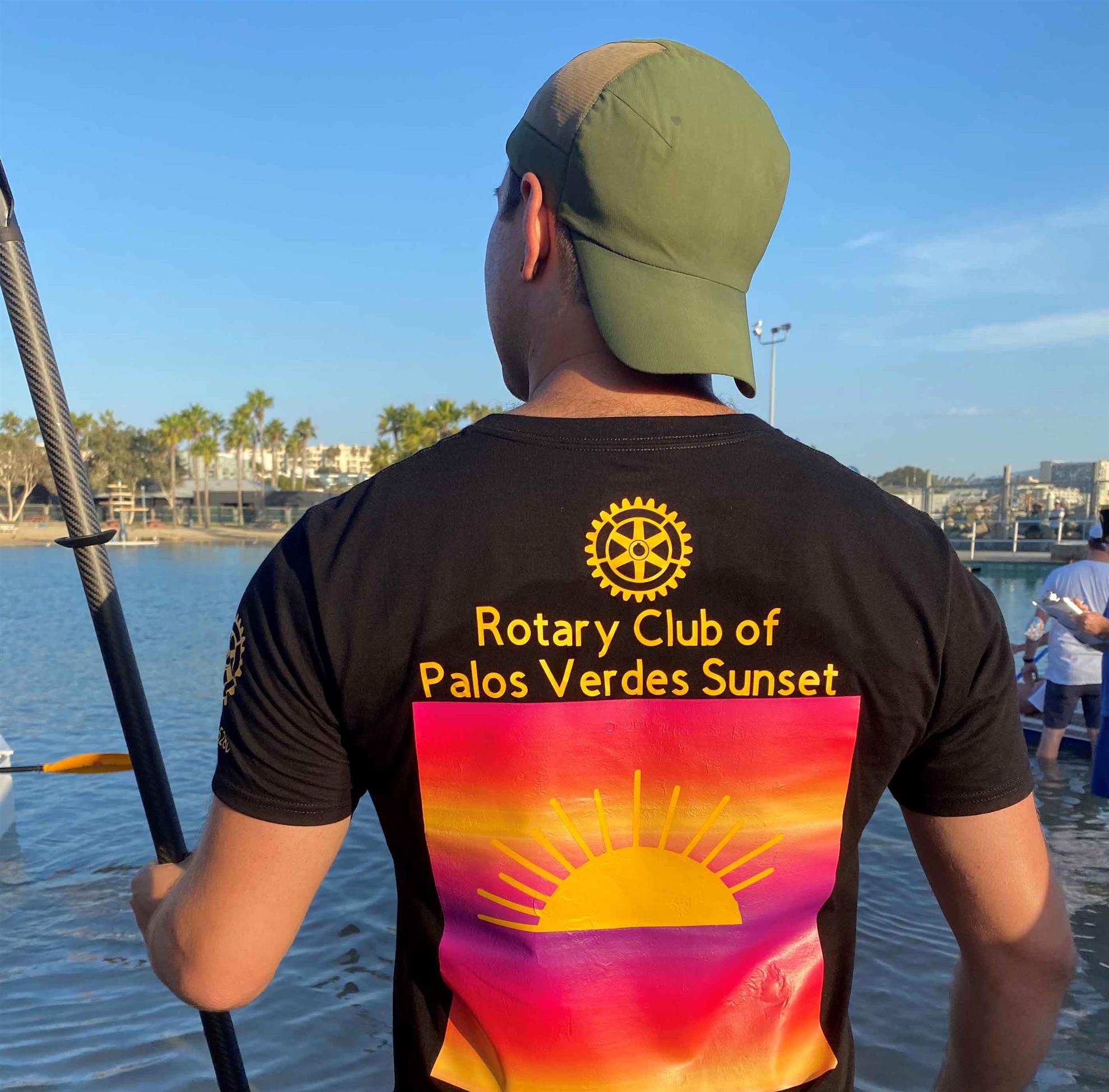 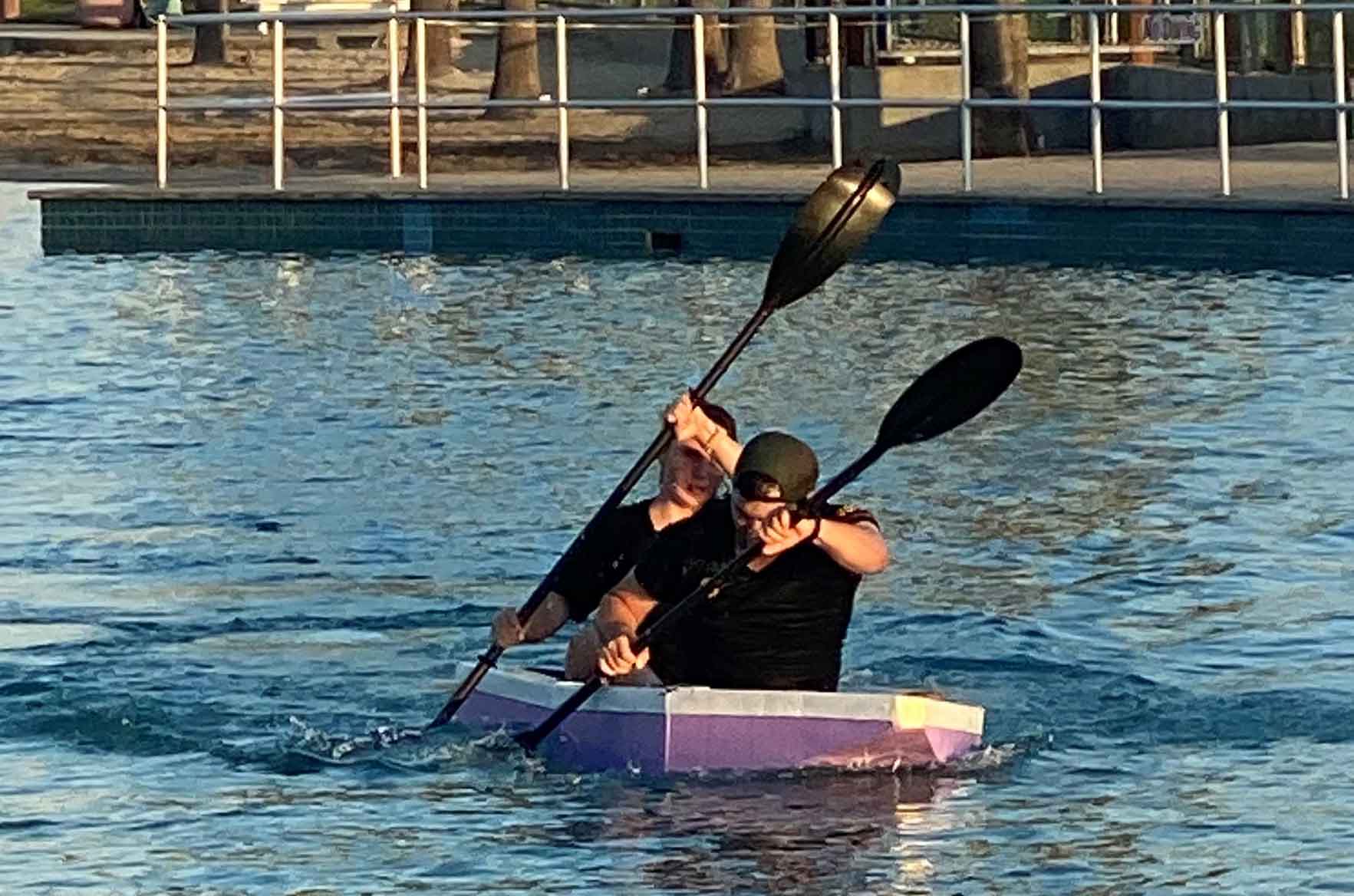 |
Project Amigo, Dora E Zúñiga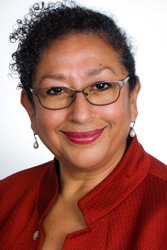 (Aug 23) Dora E Zúñiga is the Donor Guidance Director for Project Amigo, a US charitable organization founded in 1996 by California businessman Ted Rose and his wife Susan Hill, after seeing the extreme poverty in the village of Cofradia de Suchitlan in the state of Colima in west-central Mexico. Project Amigo’s mission is to provide educational access to disadvantaged children there, with material support, enrichment activities and healthcare services otherwise unavailable to them. Project Amigo provides service opportunities for volunteers from developed countries to provide humanitarian service there and to become friends with these disadvantaged children to broaden their horizons. Many of these rural children in Mexico have been able to continue their formal schooling up to and including college level and professional schools. (Our member Marylyn Klaus has sponsored children there annually for many years.) Sponsor a Child (K-6th) and establish a relationship as that child grows into adulthood. Sponsors receive a photo of the child and annual updates, and you can visit your sponsored child there. Sponsorships fund their Christmas Fiesta and an annual field trip, and purchase a new set of clothes and a pair of shoes. The children participate in an annual Community and Culture Work Week. Educational Scholarship (7-12th) ($600/year) provides junior high and high school, without which their education would end at sixth grade, and they would begin working in menial, low-paying jobs. A $600 scholarship provides school uniform, bus transportation, nutritional lunch, books & supplies. The student must maintain a high GPA, provide 10 hours of monthly community service and a letter to the sponsor, and attend a weekly homework club. University Scholarships ($4,000 per year) are for recipients who successfully complete high school. It provides tuition, bus transportation, books & supplies, and room and board in Casa Amiga for those whose homes are far from the city. Students must maintain a high GPA, provide 10 hours of monthly community service and a letter to the sponsor, and attend a weekly homework club. Project Amigo graduates have become doctors, lawyers, teachers, engineers, and community leaders, breaking the cycle of poverty that has imprisoned their family for generations. (Sponsorship funds are pooled to assure that every child and higher education student in their program receives the same benefits whether or not they have a sponsor.) President Victoria presented a $2000 check from our Club to Dora Zúñiga for Project Amigo. She is available at 608-345-6769 or dora@projectamigo.org. Donors can become involved through https://www.projectamigo.org/get-involved. |
Food-Waste Collection (EDCO), Matthew Botello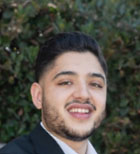 (Aug 9) Matthew Botello (mbotello@edcodisposal.com) is the Commercial Service Field Representative for EDCO, which is contracted by Rancho Palos Verdes for curbside trash and recyclables pickup and dumpster service. He described SB 1383, a new California law requiring separating organics waste such as leftover food and kitchen scraps from trash and placing it into their green waste bins for pickup. Its purpose is to reduce methane emissions by diverting organics waste from landfills to other uses like compost, mulch and renewable energy. Organics recycling began for Rancho Palos Verdes residential customers on April 1, 2022, and will be implemented for nonresidential customers on October 1. EDCO has expanded source-separated green waste collection to include recyclable food waste, so customers place food scraps in the same container. Cans, plastic containers or kitchen caddies can be used, but no plastic bags because they contaminate compost; paper bags are acceptable. All organic material must be placed loosely inside the green cart for collection. Green waste, in addition to yard waste, can now include food scraps, cooked or raw meat including bones, dairy products, fruits, vegetables, grains, teabags, leftovers and spoiled food. Food-soiled paper goods can be included, but no plastic or wax coating or metal parts. Residents can request a free 1.5 gallon sealable plastic kitchen caddie to conveniently transfer food scraps from the kitchen to their green cart or compost pile. Everything that grows, goes! As before, other recyclables (plastics 1-7, glass, aluminum, cardboard and paper go into the blue recycling cart, and trash goes into the gray cart. |
Solid Waste Management, Basil Hewitt(July 26) Basil Hewitt is a Supervisor in the Public Information Office of the Los Angeles County Sanitation Districts, the agency that provides wastewater and solid waste management services for 5.5 million people in Los Angeles County. He has a Civil Engineering Degree from Rutgers University and a Masters in Civil and Environmental Engineering from Loyola Marymount University. His professional experience includes solid waste research and monitoring, preparation of environmental documents, and public outreach. Now his focus is in the Public Information Office, informing the public about the services and programs offered by the Sanitation Districts, where he has worked since 1987. The LA Sanitation District was created in 1923, and solid waste management was added in 1949 because people were burning trash in their backyards, contributing to severe smog problems in Los Angeles. Now the District processes 390 million gallons/day of sewage, and 1/5 of Los Angeles County’s trash collection. Trash & recyclables are picked up from the community by outside companies, such as EDCO. The Puente Hills MRF recycles some of it, and the rest goes to landfills. He showed video illustration of an automated sorting line separating categories of recyclable items. Community Collection Events are more efficient and productive because the items are collected together at one time. Recyclables are bailed and sold. Most recyclables (such as paper, metals and plastics) are shipped overseas, although some countries including China have toughened their criteria for cleanliness, so we can’t just dump it anymore. |
LA Sanitation Department, Wendy Wert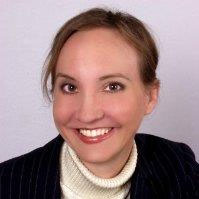 (July 12) Wendy Wert is a registered civil engineer and a Manager for Consumer Education in the Los Angeles Sanitation District. She has a BS degree in Environmental Engineering and an MS degree in Water Resources Engineering. She works on advanced planning, design and upgrading of process treatment to integrate water supply and reuse, water conservation, storm-water management and wastewater facilities planning in the Los Angeles Sanitation Department. She evaluates long term costs in wastewater and solid waste management and energy recovery, and has published numerous technical papers. Wendy presented an overview of the department’s current facilities and programs. She showed how human technological carbon dioxide production has diverged dramatically since the 1960s from the natural biogenic background production. She illustrated how Los Angeles recycling activities have progressed since the year 2000, producing recycled water, energy and recycled materials from wastewater and solid waste from garbage and sewage. Recycling food waste goes through processing and anaerobic digestion into biogas, to produce electricity, heat/steam, vehicle fuel, and biomethane (natural gas). Anaerobic digestion also can produce fertilizers and compost. One biogas power plant produces 20 MW of energy, enough for 20,000 homes, and total production is enough for 78,000 homes. Recycled natural gas is supplying an existing filling station. There are 11 plants in the Los Angeles area treating about 400 million gallons/day and serving 5.5 million people. LA County generates 21 million tons of waste per year, including 4000 tons of food thrown out daily. Decaying food waste in landfills can release methane into the environment, a significant contributor to accelerating climate change. State laws now mandate recycling commercial organics (composting or anaerobic digestion to captured biofuels). The department’s goal is to process 600 tons/day of food waste slurry, equivalent to 5700 gallons of gasoline daily. Wastewater and stormwater recycling are essential for combating the increasing drought and climate heating in the Western states. Wendy discussed what we can do in our local communities to reduce waste and excess CO2 production. She responded to questions afterward, and invites further inquiries to her at wwert@lacsd.org. |
Demotion Dinner(June 28) Chase Thacker unfurled our new Club banner and new Rotary banner displaying essential Rotarian Areas of Focus (Literacy, Maternal & Child Health, Peace & Conflict-Prevention, Disease Prevention, Water & Sanitation, Economic Development, Environment). Highlight photos of our Club’s Rotary Year were displayed on screen. Our projects including literacy & books, District 5280 Humanitarian Trip to Puerto Rico, and our participation in the District Conference were shown. Incoming President and Board members were sworn in by PDG Dave Moyers. Board members of the past year were presented with bottles of wine by outgoing President Steve Johnson. Departing member Karla Munguia was presented a bouquet. We welcomed prospective member Aurora Rysanek and look forward to seeing her in the future. 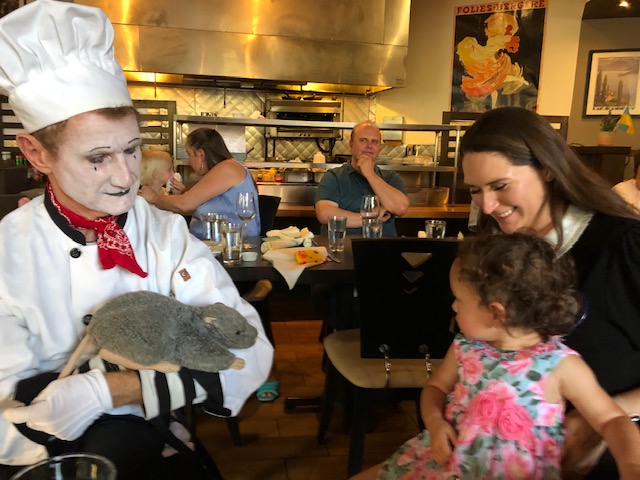 Incoming President Victoria Perez & apprehensive Viviana contemplate French mime Marcel Marceau’s "pet rodent". 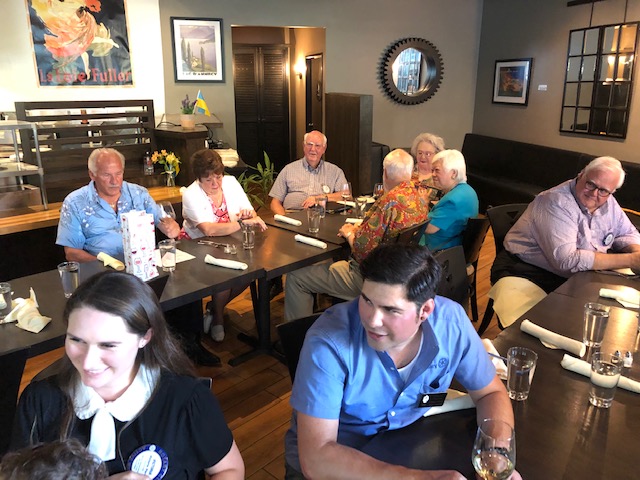 Incoming President Victoria Perez, AG for Club Service Chase Thacker, and other members enjoying the camaraderie (and the antics of Marcel Marceau). 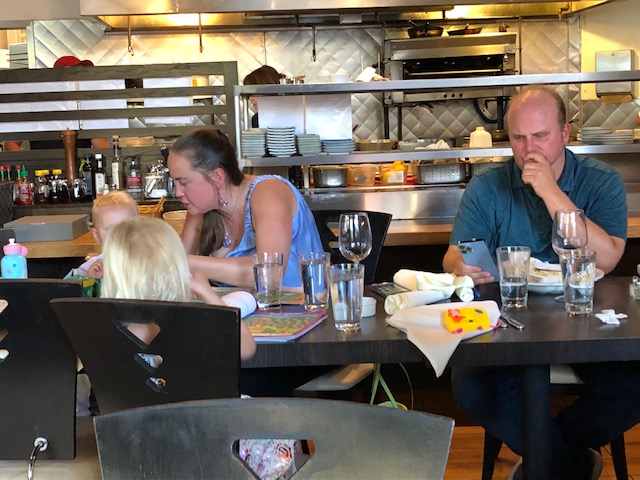 Outgoing President Steve Johnson and his family enjoying our French dinner (while keeping up on Rotary text messages). |
Environmental Tree-Planting Project, Larry Johnson (June 14) (June 14)Larry Johnson and the Manhattan Beach Rotary Club, in collaboration with District 5280 and World Vision, are planning a $1 million environmental tree planting project in Niger, one of the poorest countries in Africa. (Larry and his Club have previously worked with a clean-water project there.) Niger (not Nigeria) is a landlocked country in West Africa with 24 million people, more than 10 million in extreme poverty. The encroaching Sahel (Sahara Desert) is moving farther south every year due to climate change. Wind, sand, dust, soil degradation, water scarcity, and drought make it hard for farmers to provide for their families. The situation is worsening due to food insecurity and COVID-19. In their agriculture-dominated economy, farming is practically impossible without trees. Trees slow the wind, which otherwise dries and removes the topsoil. They cool the ground, and provide for shade for animals who “fertilize” the ground through their droppings. Trees provide habitat for birds that eat insects, and for bees that pollinate crops. Trees slow the precious rain when it comes, allowing water to soak deeply into the soil and hopefully restore critical aquifers which are becoming depleted by well-pumping. Getting more trees into the landscape is critical for slowing desert expansion. One way to get trees back into the landscape is to manage trees that have been cut down to regenerate themselves, which works well, but takes time. The fastest way to get trees growing is by planting appropriate tree varieties, which can work, but only if they are cared for in the first 1 or 2 years after planting, until their roots are established. Most tree planting projects fail because of the assumption that trees can simply be left alone after planting. Tree planting succeeds when people are incentivized to care for the trees, especially by watering them while they are vulnerable. This project will be managed by the host Rotary Club of Niamey Gaweye with the professional local World Vision staff. World Vision will match Rotary funds up to $500,000. World Vision works in nearly 100 countries with over 34,000 staff, in the world's poorest and most vulnerable countries. Rotary Clubs and World Vision have been collaborating on projects since 2005 and invested $25 million in project funding, for 3 million people worldwide. The project area is in the Commune of Chadacori, which is semi-arid and seriously affected by land degradation and deforestation (cutting trees for cooking fuel and building materials). Rotarians and World Vision staff plan to restore 7,413 acres of land by planting at least 650,000 trees, which can transform the lives of 18,000 people. We can help by supporting Manhattan Beach Rotary’s contribution of $500,000. Contact Larry Johnson at ljohnsonmb@outlook.com or 310-200-2091. |
2022 D5280 Humanitarian Trip to Puerto Rico, PDG Dave Moyers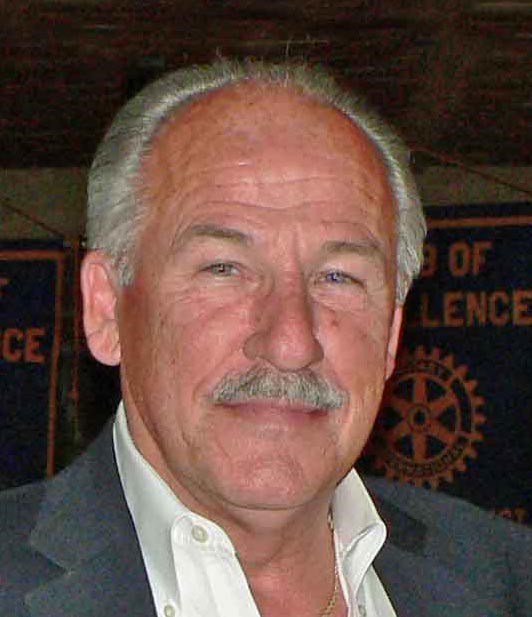 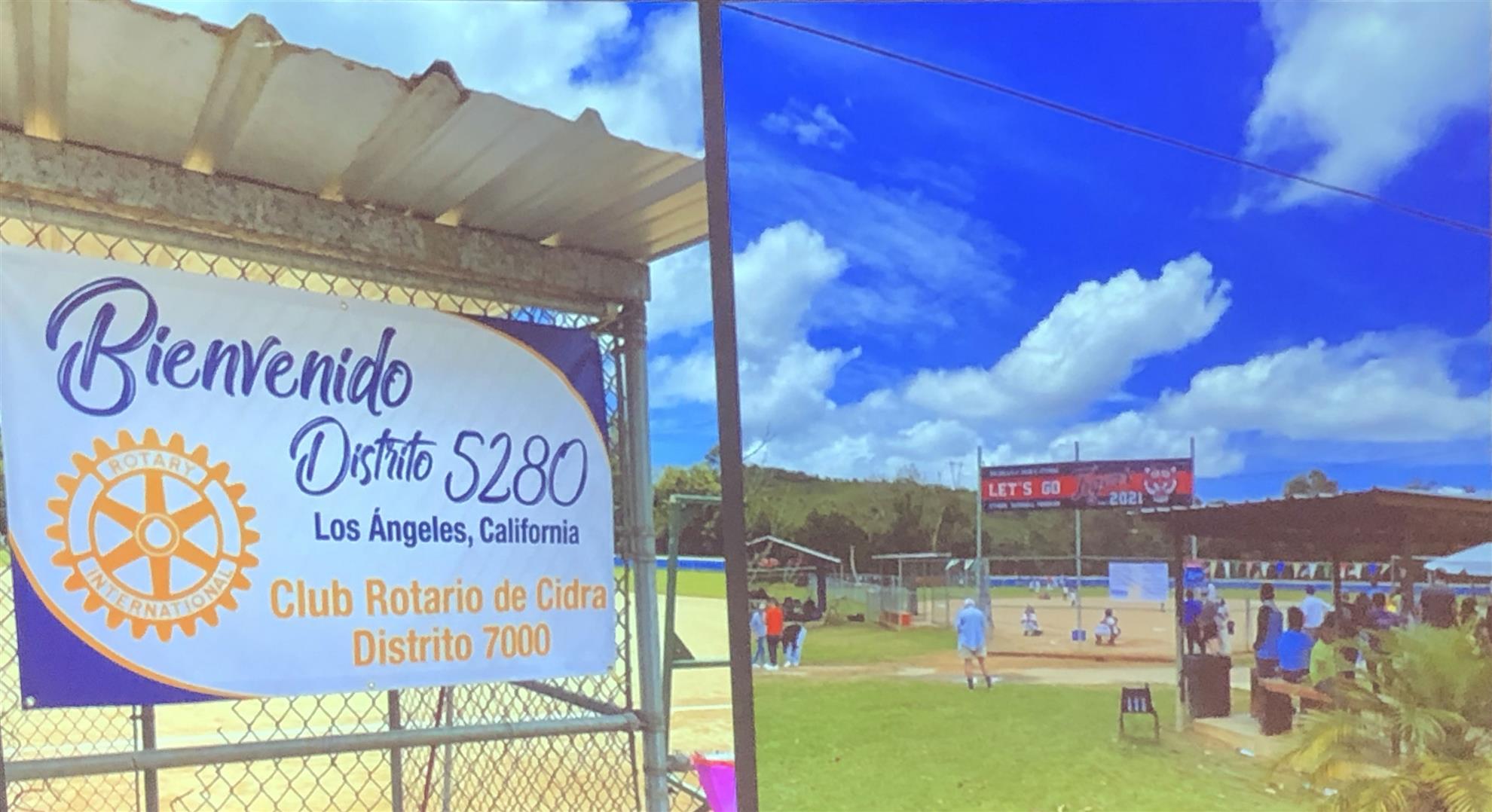 (May 24, 2022) Dave and Rita Moyers participated with District Rotarians in the Humanitarian Trip to Puerto Rico, April 21-23. He showed photos of the many projects there. They stayed in a hotel (former convent) in San Juan, and were bussed to various Rotary projects in participation with local Rotarians. Among the many projects were an irrigation system for a halfway house for its 10-25 members’ agricultural work on ~5-10 acres to raise food and produce income. One of the schools needed “everything”, where many people are still struggling to recover from damage from tropical storms. The Rotarians created a baseball field for students so that lack of family income would not prevent them from developing their sports skills. (Puerto Rico is renowned for developing many professional baseball athletes.) Rotarian backpacks with school supplies were brought from LA by District 5280 Rotarians to distribute to needy students. An agricultural center was developed for an orphanage, and a school was supported for an underprivileged community. Notebook computers were contributed to a school for low income children, but they discovered that the school had no Wi-Fi for Internet connection; the Rotarians donated adequate funds on the spot to cover the school’s Wi-Fi subscription for the next 3 years! |
Chase Thacker, Rolling Robots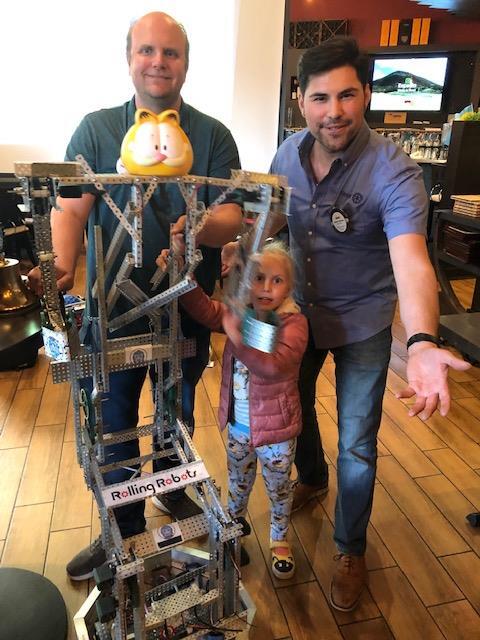 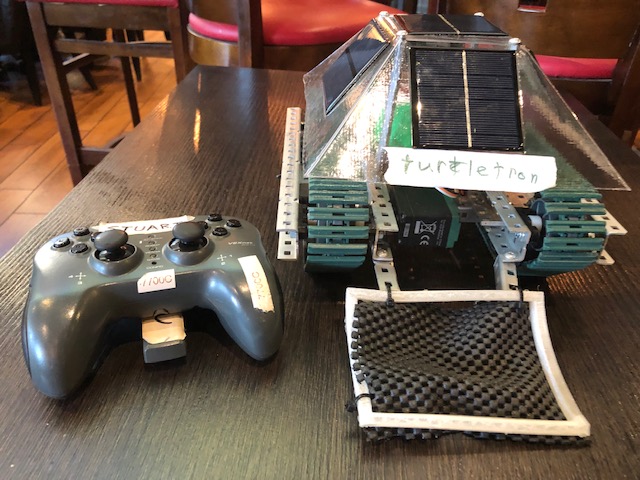 (May 10, 2022) In January 2022, our Club's Past President Chase Thacker became a manager for the Palos Verdes center of Rolling Robots at 704 Bart Earle Way (http://rollingrobots.com). He displayed 4 robots of variable sophistication (assisted by our Club President Steve Johnson & daughter) made by their students, and demonstrated the robots' operation. Rolling Robots was founded by aerospace engineers to teach children an interesting approach to learning STEM (Science, Technology, Engineering & Math) by designing and building their own robots. There are several centers in Southern California. They have 6 age groups from Pre-K through College, using hardware kits and other materials produced by VEXRobotics (https://www.vexrobotics.com/), a brand of Information International. The beginning group (ages 4-5) starts by learning basic knowledge of computer logic and commands. Programming commands are taught by choosing and moving multiple colored blocks on a screen. Eventually they learn different coding languages, electronics, circuit building and then programming hardware with Micro:Bit. They learn to combine the power of coding with circuitry and sensors to make games and gadgets, with progressive levels of sophistication including various types of robots, either driving them or programming them to move on their own (such as making them toss a ball into a container). They design robots with specified characteristics to engage in robotics game competitions, some of which have been featured on television programs. |
History of National Public Broadcasting, by Chuck Klaus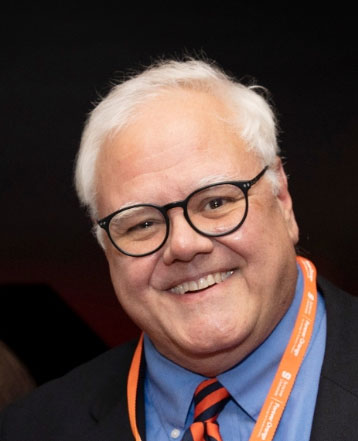 (April 26, 2022) Our member Chuck Klaus majored in speech communications in college. He produced music programs for a radio station in Syracuse, New York, taught at the University there, and was a Drama and Music critic for the newspaper. He met his wife, Marylyn, at a concert there. When they married, he moved to California to be with her, and she brought him into our Rotary Club. He spoke of his long hours working on live programming from 5 to 10, and then arranging the programming for the remainder of the day. Chuck began by playing a variety of old black and white TV program clips (YouTube version). There was concern in the 1960s about corporate control of broadcasting in the US, because the broadcasting frequencies were considered to belong to the people. Early public stations were operated by state colleges and universities to promote educational broadcasts. A 1950s TV program to promote children’s education was “Ding Dong School”. A later popular program was “Mister Rogers Neighborhood”. Conservative commentator William F Buckley hosted a weekly PBS public affairs show, “Firing Line”, for over 30 years. The Corporation for Public Broadcasting (CPB) was established by the Congress in 1967 to support programming diversity among public broadcasters, promote noncommercial broadcasting, and provide federal funds to local stations for program creation, but it does not control their programming. Public radio and television stations often produce their own programs as well as purchase additional programming from national producers and program distributors such as the Public Broadcasting Service (PBS) and National Public Radio (NPR), which operate as technically separate entities. PBS provides educational and arts programming that is otherwise minimally available on American television. Cable television and online streaming have led to the development of limited similar content, including to viewers in rural areas that do not have access to arts education, and where educational funding is even lower than in urbanized areas. Chuck compared PBS to the comprehensive services of the British Broadcasting Corporation (BBC), the world’s oldest and largest national broadcaster, most of whose employees are in public-sector broadcasting. There are hundreds of individual public radio and public television stations licensed to various non-profit organizations, municipal or state governments, or universities (like KUSC). Government funding has been reduced over the years by pressure from politicians who object to the broadcasting of documentaries on social issues. Most of the financial support for public broadcasting comes from community organizations, foundations, business contributions and audience pledge drives (you’ve probably heard these periodically). |
James Webb Space Telescope, Debbie Simmons(April 12, 2022) Debbie Simmons is the System Engineering Lead for the James Webb Space Telescope (JWST) program. She has a BS in Aerospace Engineering from San Diego State U and MS in Electrical Engineering from USC, and has worked for Northrop Grumman for many years. She has been active in encouraging young women to enter engineering careers. The JWST weighs 7 tons and was developed by Northrop Grumman for NASA and the Canadian & European Space Agencies, with contributions from a number of academic, government, and industrial partners. It was launched on an Ariane 5 rocket from French Guiana on the northern coast of South America on Dec 25, 2021. It has a 21-foot primary mirror consisting of 18 gold-coated beryllium mirrors accurate to 20 nanometers and weighing 44 lb each, which were folded to fit into the launch rocket. It has 6 major subsystems: Electrical Power with solar panels, Attitude Control, Communication, Command and Data Management, Propulsion, and Thermal Control.   The JWST was placed in the L2 LaGrange point, ~1 million miles from Earth in a stable gravitational point that always stays on the midnight side of the Earth, so that the light and heat from the Sun, Earth and Moon are always in the same direction. It has a tennis-court-sized sunshield to separate the observatory into a hot Sun-facing side and a very cold anti-Sun side, to keep the Sun’s heat away from the delicate mirrors & electronics whose operating temperature has to be kept under minus 370 degrees F (90 degrees F above absolute zero). The sunshield has 5 separate layers for heat-shielding and to minimize deterioration from meteor damage (it’s a dangerous neighborhood).  After finishing calibration maneuvers, JWST will become operational in June 2022. It will observe red-shifted light from the early history of the universe, to 180 million years after the “Big Bang” singularity of ~13.8 billion years ago (considered the “age of the universe”, based on detailed measurements of universe expansion). High-redshift (very old and distant) objects have their visible emissions shifted into the infrared. JWST can see objects 400 times fainter than from large ground-based telescopes or current space-based infrared telescopes. Its instruments will operate in the near- and mid-infra-red spectrum, which is mostly blocked by the atmosphere and is best observed from space. These observations will help understand the shape and chemical composition of the universe, and the evolution of galaxies, stars and planets. |
Melting Ice at the North Pole, Tom Day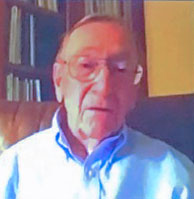 (3/22/2022) Tom Day is an experienced public speaker who spoke with us by Zoom from his home in Stevenson Ranch, north of Los Angeles. He described scientific studies on the melting polar ice caps. The ice cap on the Arctic Ocean is always frozen during the winter when there is no sunlight, but in summer its area and thickness have been decreasing in recent decades according to satellite photos. Arctic surface air temperatures have warmed about twice as fast as the global rate, caused not only by rising greenhouse gas concentrations, but also by deposition of black soot (which absorbs solar energy) on the ice, from increasing wildfire smoke and industrial sources.   Tom showed how the melting Arctic Ocean ice does not change the water level, because it is already in the water. He compared that effect to Greenland and the Antarctic continent, where most of the ice is in glaciers above sea level. As they melt and shrink in size, they pour their water down into the ocean, which does increase the sea level, which is rising along shorelines around the world. As the average size of the Arctic summer ice cap has been shrinking rapidly in recent decades, the dark sea water in summer absorbs much more solar energy than the white ice which reflects it off into space. A summertime ice-free Arctic has not existed in the last 700,000 years, but projections show progression to complete summer ice loss within the next ~15-45 years, causing increased solar energy absorption in the Arctic Ocean. 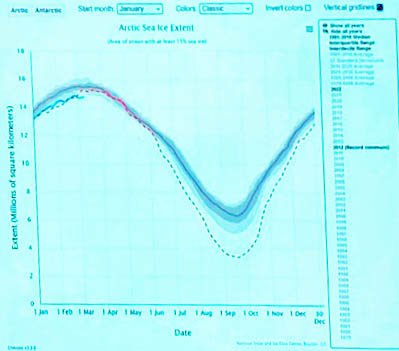 Thousands of square miles of melting permafrost are putting out massive amounts of methane, a potent greenhouse gas. (Permafrost melting is also destabilizing roads and buildings built on what was formerly solid ground in the Arctic.) Global seawater, which has been absorbing some of the carbon dioxide from the Industrial Revolution, is now absorbing less and spewing out more of its carbon dioxide into the atmosphere as it warms, like warming carbonated water does. All of these mechanisms are positive feedback loops which accelerate the speed of global warming and climate change, so the rate of change keeps increasing. These changes are compounded by environmental contribution by the increasing global population. 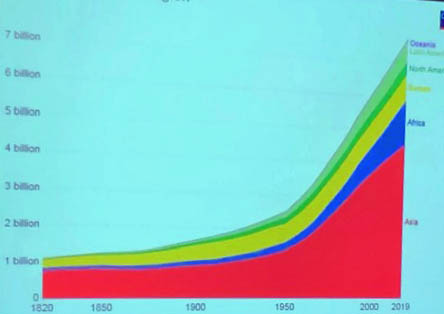 |
The West LA Port Harbor Development, Michael Cham
|
Jalalabad Rotary Club in Afghanistan, Stephan Brown (Past RI Foundation Trustee)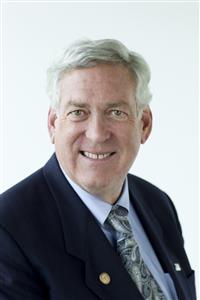 (Feb 22, 2022) Steve Brown is a Past Rotary International Trustee. Motivated by the tragedy of 9/11/2001, he has traveled to Afghanistan 12 times in the last 19 years, working with various programs of the Rotary Foundation and other partnering organizations. He helped establish educational and humanitarian programs in the city of Jalalabad, the capital of Nangarhar province in the eastern part of Afghanistan, near the Pakistan border and 80 miles east of the capital, Kabul. Steve spoke to us by Zoom, reviewing successes in working with local Afghans to establish a Rotary Club in Jalalabad and a Sister Cities relationship with his hometown of San Diego. He discussed programs including building schools, establishing Internet-connected computer labs for boys and girls in public high schools, and working with the Nangarhar University to facilitate English language training for Rotary’s polio eradication efforts. With support from the local Rotary Club there, Jalalabad Rotary School has graduated over 8000 students since 2004, 30% of them girls, a big social change in a society where traditionally only boys could be educated. There were over 27,000 high school graduates since 2008 from 7 girls’ high schools and 9 boys’ high schools in Jalalabad. Over 7000 students have graduated from Nangarhar University in IT and ESL since 2012. The La Jolla Golden Triangle Rotary Foundation is supporting 26 educational programs up through the Nangarhar University level. The list of donors to Rotary programs there includes the World Bank, USAID, Rotary Foundation, NATO, US Department of State, Canadian International Development Agency, San Diego-Jalalabad Sister Cities Foundation, and private donors and individuals. The total number of new polio cases in 2021 was 43 in Afghanistan and 8 in Pakistan, the only 2 countries where polio is still endemic. |
Port of LA Update, Eric Caris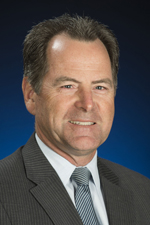 (Feb 8, 2022) Eric Caris is Director of Cargo Marketing for the Port of Los Angeles. He coordinates shipping activities at the Port, including negotiating container terminal leases, coordinating with supply chain stakeholders, and promoting technology to reduce ship emissions by plugging in to onshore electrical power while berthed instead of burning diesel fuel. He was born and educated in Antwerp, Belgium, and has worked in the US for 38 years. The Port of Los Angeles is the busiest container port in the US, slightly more than the Port of Long Beach. Each Port is a department of its respective city government. POLA can handle the biggest cargo ships, and processed over 10 million container units in 2021. The Port covers 7,500 acres of land and water along 43 miles of waterfront. It has more than 200 leaseholders, generating its revenues from leasing and shipping service fees with no support from city taxes. Mr Caris reviewed the major shipping terminals and cruise lines in the port area. The Board of Harbor Commissioners manages the Harbor District, including San Pedro, Wilmington, and Terminal Island. Port operations promote maritime, commerce, navigation, fisheries, and public access to the waterfront. The Port has been involved in revitalization of the LA Waterfront, improving public access, developing visitor-friendly infrastructure, and transforming the area into a major visitor destination. Its operations are oriented towards environmentally and fiscally responsible development, with community engagement. |
Barbara Ferraro, RPV Mayor Pro Tem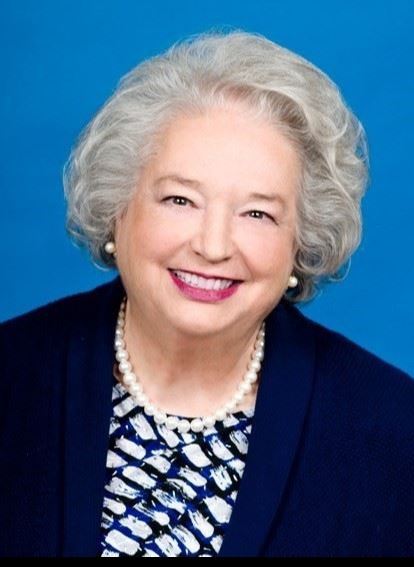 Mayor Pro Tem Barbara Ferraro, our member Charley Ferraro’s spouse, has served in the Rancho Palos Verdes City Council since 2019, and previously served from 1995 through 2003. She has lived in RPV since 1976 and is a high school Spanish teacher in Palos Verdes. Barbara Ferraro spoke to us by Zoom about the new state legislation on housing zoning, SB 9 & SB 10. The intent is to increase housing density throughout the state to help ameliorate the growing homeless population, with the additional housing density distributed throughout existing communities by building up rather than out. Local zoning decisions would be required to allow subdividing lots, without consideration for the increased needs for parking, schools, emergency vehicles access, and other community services. Barbara states that developers are planning to build denser housing for moderate income rather than lower income residents (“more luxury housing that most people can’t afford”). The legislation does not require the housing to be affordable or for homeless people. Impacts on funding for services, transportation access, housing-jobs imbalances, and infrastructure maintenance would be the responsibility of local communities. She said that every community has different needs in its environment, transportation access, topography, and parks and recreation facilities. |
C5 Youth Foundation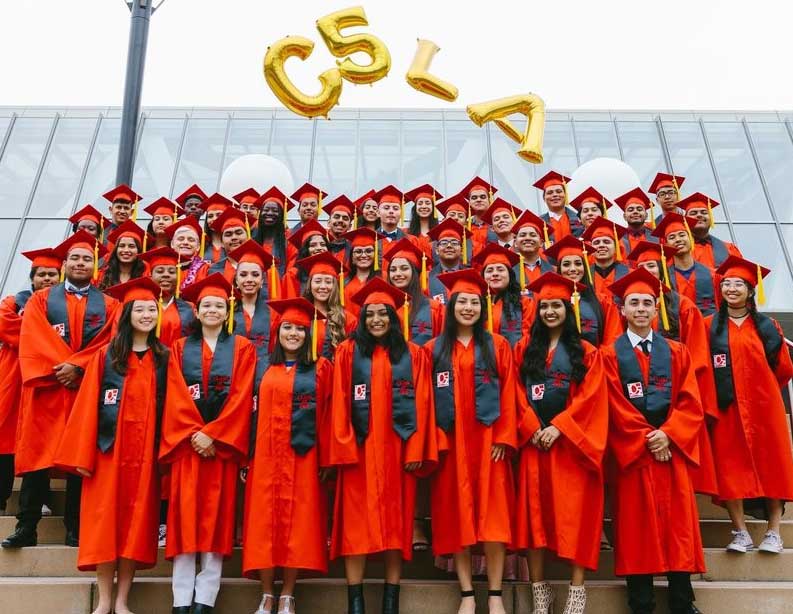 (Jan 11, 2022) Jessica Valdez (C5LA Program Director) & Miguel presented by Zoom. C5LA (“College in 5 years”, LA) was founded in 1999 by John Alm, former CEO of Coca-Cola Enterprises (a major Coca-Cola distributor). Seeing the impact of summer camp on his own children by helping them develop personal skills, confidence, and improved self-esteem, he & his wife determined to extend these benefits to deserving children whose families could not afford these experiences. C5LA has grown from a 4-week summer camp to a year-round 5-year Leadership Development and College Preparatory Program, and inspired others to expand C5 to 4 other US cities. The public education system cannot address what is happening outside of the classroom, for the many young people who fail to graduate and become productive citizens. Too many of our youth are adversely impacted by everything that is missing from their lives, growing up in environments with limited support and few opportunities, unable to develop a positive vision for their future. A child raised in neglect or extreme adversity carries a lifelong risk of chronic illness and mental health struggles. C5LA is dedicated to promoting generational transformations to build stronger communities. The C5 philosophy includes:
C5LA recruits 8th graders from 25 Middle School partners in the LA area, who show high potential and 3.0 GPA, but are under-resourced and potential 1st-generation college students, who can adjust to camp & being away from home, and are not distracted by other interests. Teachers nominate 8th grade students in October, who then complete their application forms. C5LA holds student/parent informational meetings. Then, selected students are interviewed, and acceptances are sent in April. Its mission is to inspire high-potential under-resourced teens to pursue personal success and prepare for leadership roles in school, college, work and their communities. The program is year-around, with 5 summer experiences: Leadership Camp before 9th grade, backpacking before 10th, tour of colleges before 11th, week-long college stay before 12th, and 4-day “college boot camp” before starting college. There are ~72 students each year, with case management at each stage, college application coach, and scholarship funds to help with education expenses. The program is now extended through college to support graduation & career mentorship. |
Holiday Dinner at Crème de la Crêpe Restaurant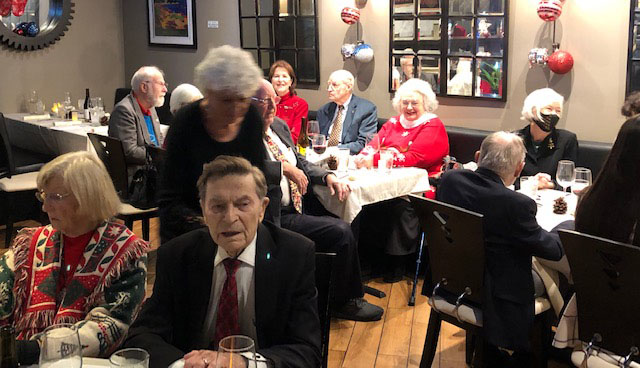 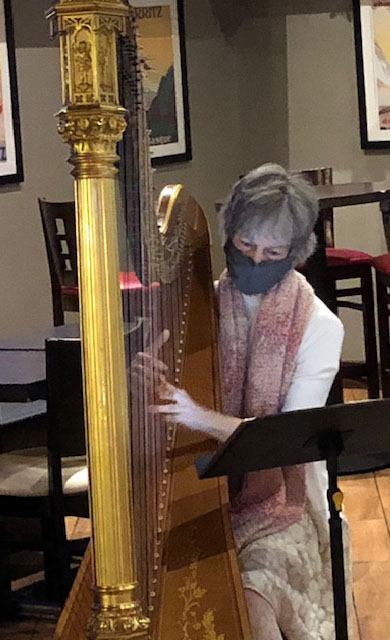 (Dec 14, 2021) We had a delicious Holiday Dinner with French cuisine, entertained by a harpist arranged by Pres Steve (a heavenly touch!). Remember, our next Club Meeting is Jan 11, 2022. Until then, stay safe and calm. The best of Holiday Cheer to all!  Some Limericks for the Season: (Mensa Bulletin, Nov/Dec 2021) You’re getting forgetful, my dear. Some memories aren’t too clear. That gift on the tree That you gave to me? I gave it to you just last year! Each Christmas I’m now so perplexed, I wonder just what’s coming next. Yule letters so sweet Are now obsolete. You’re lucky to get a group text! Conspiracy nut for a brother? A guilt-trip-distributing mother? The big Christmas “do” Is merry if you Survive without killing each other! |
South Bay Cities Council of Governments, Jacki Bacharach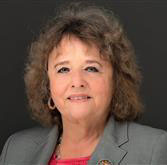 (Dec 7, 2021)
Jacki Bacharach was born in Chicago, grew up in the San Fernando Valley, and graduated from UCLA in 1966. She served on the RPV City Council 1980-1993, including as Mayor in 1981-82, 1983-84, and 1988-89. She served for 12 years on the LA County Transportation Commission (LACTC) until 1993. She helped organize the Southern California Regional Rail Authority (the Metrolink commuter rail system), the Los Angeles-San Diego Rail Corridor Agency (LA-San Diego Amtrak service), and the Alameda Corridor Transportation Authority (landside access to the Ports of LA and Long Beach). She served on the Transportation and Communications Committee for the League of California Cities. She also worked on the National Commission on Intermodal Transportation. Jacki is the Executive Director of the South Bay Cities Council of Governments (SBCCOG). Her duties include oversight of the South Bay Environmental Services Center, pilot projects for fleet conversion to electric vehicles, and the South Bay’s Measure R and Measure M transportation programs. Special initiatives include services for homeless and seniors, regional broadband service, and climate action implementation. She also directs policy development, city outreach, and working with state and regional agencies. She is also the Chair of the LA County Quality and Productivity Commission. The current major SBCCOG programs include Energy Efficiency, Outreach (presentations at events & classes), Water Conservation (Cash for Kitchens, Change and Save, Rain Barrel giveaway), Sustainability (promoting greenhouse gas reduction), Transportation (EV infrastructure, Local Travel Network, Vanpool, Metro Express Lane), South Bay Fiber Network (a regional broadband network to municipal sites), Homeless, and Seniors (Resource Sharing, Senior Services Working Group, Age-Friendly Network). Energy efficiency programs to cities, school districts, businesses and homes provides information on energy & water usage and waste disposal with incentives and rebate programs. Low-flow shower heads, faucet aerators, and rain barrel giveaways help reduce water usage in our long-term drought conditions. A seniors’ home-share program helps elderly residents to continue living in their own homes. The South Bay Fiber Network won a national award in 2020 based on uniqueness and short- and long-term value to the community. Ballot-approved sales tax measures are providing funding for projects to reduce traffic delays, improve safety, and promote ridesharing, telecommuting, and bike/pedestrian “slow” local transportation. A planning grant is studying a 243-mile network of local streets for slow local travel 25 mph or less (70% of South Bay trips are less than 3 miles). This would help to connect local destinations, reduce congestion, and increase safety and sustainability. Micro-mobility vehicles include many new models of small electric cars, electric bicycles and scooters for rent or purchase. |
Founding Fathers: 6 Great Men, by Ara Norwood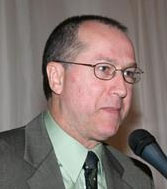 (Nov 23, 2021) Ara Norwood (http://aranorwood.com/) is Managing Partner of Leadership Development Systems. He promotes the principles of Leadership, which he believes is essential for a sustainable and progressive USA. He presents these concepts to groups, using as examples “Six Great Men” among the US Founding Fathers. These Six are Benjamin Franklin, George Washington, John Adams, Thomas Jefferson, James Madison and Alexander Hamilton. Ara spoke about their relationships with their parents, their intellectual acumen (five were geniuses and Washington was more a people person), and their views on slavery: Northerner Adams opposed it from the beginning and the others opposed it eventually. Washington, Jefferson and Madison were slave-owning plantation owners; Washington eventually released all of his slaves, although Jefferson and Madison did not. In occupational background, Franklin was a printer, scientist and diplomat. Washington was a surveyor and planter and Army officer. Adams was a lawyer. Jefferson was a planter, lawyer and teacher. Madison was a planter. Hamilton was a military officer, lawyer and financier. In political views, Franklin and Washington were nonpartisan, Adams and Hamilton were Federalists (promoting the proposed Constitution), and Jefferson and Madison were Democratic-Republicans (a later group opposing the centralizing policies of Alexander Hamilton). Franklin was greatly influenced by the Enlightenment philosophy in Europe at that time. He was pragmatic and tolerant of others. Washington was dignified, punctual, disciplined and a good listener (who turned down an offer to become “King George I” of the new nation, because he opposed the concept of monarchy). Adams was well educated but egotistical and defensive. Jefferson was very intellectual, charming, a poor speaker but brilliant writer. Madison was indecisive, shy and an awkward conversationalist. Hamilton was bold and confrontational. Hamilton was the first secretary of the treasury, where he promoted federal funding of the states’ Revolutionary war debts and creation of the Bank of the United States. His vehement political rivalry against Aaron Burr resulted in Burr killing him in a dual. These 6 world-class leaders came from a US population of 2 million in 1776. With the same proportions, today’s US population of 331 million would produce 993 world-class leaders. Ara Norwood believes such potential leaders are out there and need to be developed for the future well-being of our country. |
Holocaust Survivor Aron Gross, by his son Paul Gross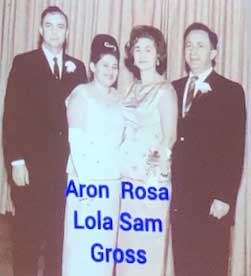 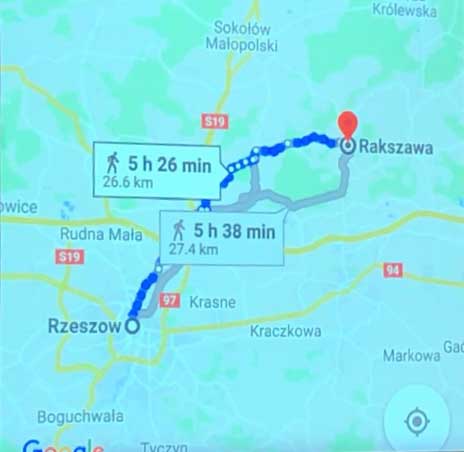 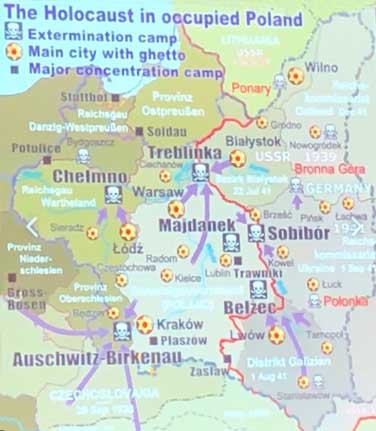 (Nov 9, 2021) Paul Gross works for the Malibu Canyon Wealth Management company. He spoke to us by Zoom about his father, Aron Gross, a Jewish Holocaust survivor who was interviewed in 1996 for the Visual History Archive of the USC Shoah Foundation Institute, an inspiring story of the resilience of the human spirit. Aron Gross was born in 1921 in Rakszawa, Poland. When the Nazis invaded Poland and began destroying Jewish Ghettos, the Jewish population tried to conceal their Jewish identity. Many tried to hide on farms, in bunkers, and in forests but most of them were eventually executed. Paul spoke of Amon Göth, a Nazi officer who was involved in the destruction of Jewish Ghettos and deporting the inhabitants to death camps. He personally killed many children in the Ghettos. |
David Moyers, Residential Real Estate Market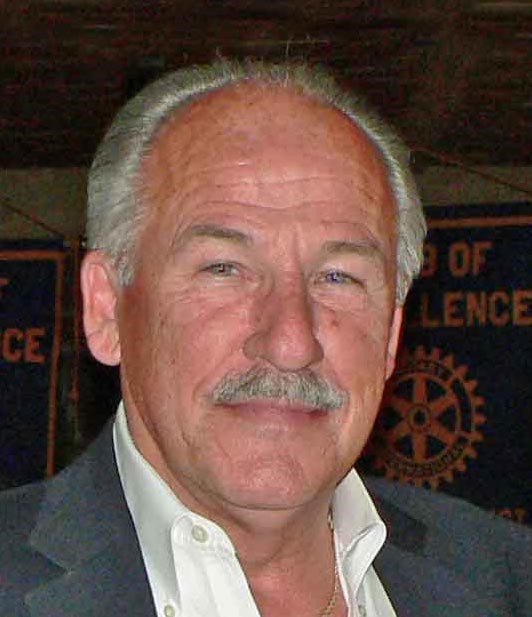 (Oct 26, 2021) (Oct 26, 2021)PDG Dave Moyers, a local realtor with RE/MAX at 450 Silver Spur Rd in Rancho Palos Verdes, spoke to us about changes in the current California housing market. In summary, from 2015 through 2021, the Median Price of homes has increased from $476,000 to $793,000, while buyer Affordability has decreased from 31% to 26% of the population. Mortgage rates have changed from 3.90% to 3.00%. The number of Single Family Home Resales has increased from 409,000 to 440,000. In spite of (or because of) the COVID pandemic, 20 cities in California grew by over 40% last year (with mobile professionals moving to less-congested areas to work virtually). The average size of homes purchased also jumped from 1745 ft2 to 1800 ft2. First-time buyers have also been making higher down-payments, and 6.6% of home purchases are now for 2nd/vacation homes (showing increasing income disparity). Coastal areas are increasingly unaffordable for first-time working-class buyers, so more buyers are moving farther away (to rural areas and/or out-of-state) to find more-affordable real estate prices. |
District 2022 Humanitarian Trip to Puerto Rico, Jose Vera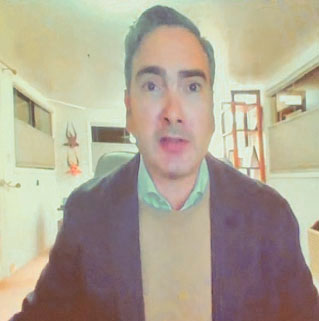 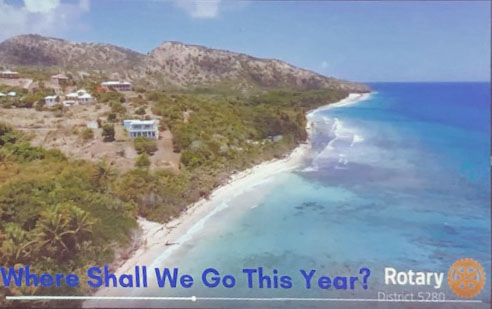 Jose Vera, LA5 Rotary Club, is a Co-Chair (with Albert Hernandez, Burbank Rotary Club) of the District 5280 Puerto Rico Humanitarian Trip, April 14-18, 2022. He spoke to us by Zoom about the 12 projects with Puerto Rico’s District 7000. The 61 Clubs in our District need to raise over $100,000 to combine with Rotary Global Matching Grants. Over 120 Rotarians from our District are expected to go. Our DG Guity Javid has noted that Puerto Rico is still in a humanitarian crisis with the aftermath of Hurricane María in Sept 2017, when 95% of the people lost their electricity and half lost access to running water; 3 months later 45% (1.5 million people) still had no electric power. Then 3 powerful earthquakes hit in Jan 2020, followed by the COVID pandemic. Among our planned projects are an agricultural training program at a homeless shelter, a recycling center to fund addict treatment, a sewing training project for underserved women, a Rotary Peace Park to be maintained by local Clubs, retrofitting a used 40-foot container for physical & ocupational therapy services for disabled students, computer training for students & parents, a sports training facility for troubled children, a secure school for domestic violence victims, a school photocopying center, furnishings for a children’s shelter, and playground equipment to replace hurricane-destroyed equipment. |
Jon Caplan, Cyber Security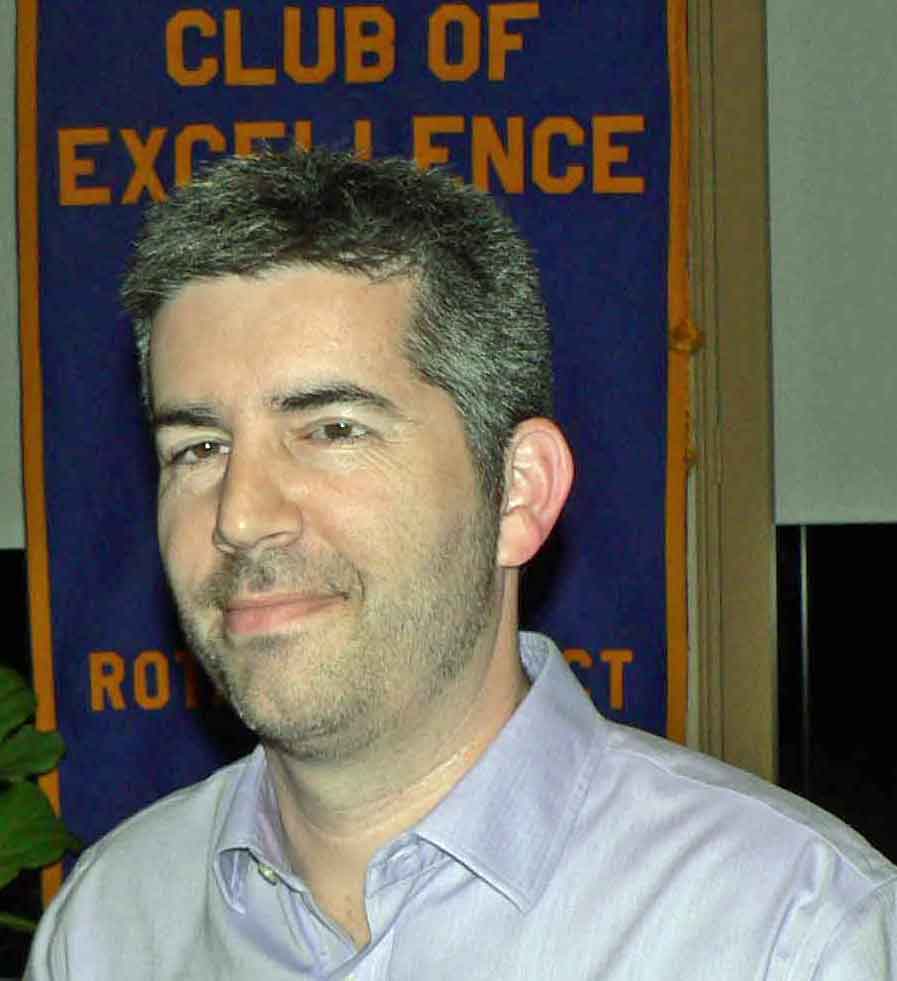 Jon Caplan, a Past-President of our Rotary Club, described categories of Internet hacking: Obtaining your bank account access, placing Ransomware (crippling your data access and extorting payment from you to get it back), and Botnets (placing hidden Internet-connected malware on your computer to remotely steal your data, send spam, or perform Distributed Denial-Of-Service (DDoS) attacks, using thousands of captured malware-infected computers to flood and overload the resources of an Internet target). (It’s a nasty world out there!) These attacks are becoming more sophisticated every year. Jon recommends the following steps to protect yourself:
|
LAX Modernization Project Update, Stephanie Sampson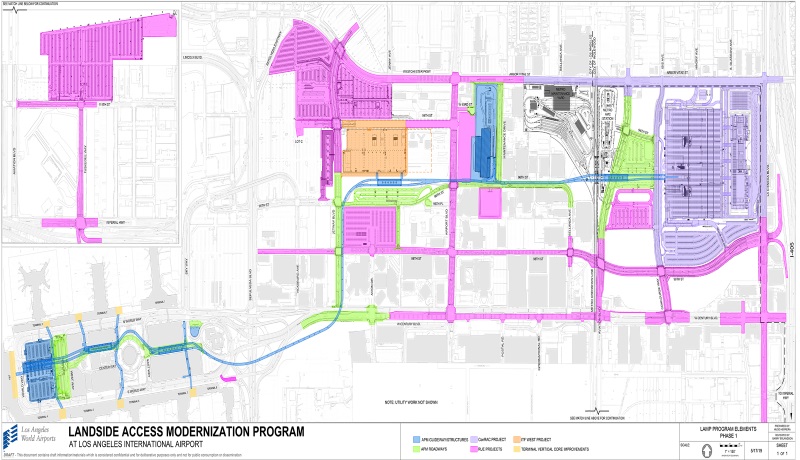 Stephanie Sampson is the Director of Communications for LAX Development Projects (see https://www.lawa.org/connectinglax for up-to-date details). To help remedy surface traffic congestion, Los Angeles World Airports (LAWA) is building a Landside Access Modernization Program (LAMP) at Los Angeles International Airport (LAX), the 2nd busiest airport in the US and 4th busiest in the world. The Landside Access Modernization Program (LAMP) consists of 3 new terminal extensions in the airport, and 3 new facilities outside the airport near the 405 Freeway: a Consolidated Rent-A-Car Facility and a public parking structure with 405 Freeway access, and a Metro transit station at 96th Street & Aviation Blvd connecting to the LAX/Crenshaw and Green Lines. These will be connected by an Automated People Mover (APM) train system on a 2.25-mile elevated guideway. By 2023, the APM will run 9 trains with 4 cars each, carrying up to 200 passengers and their luggage, with top speed of 47 MPH. During peak hours (9 AM to 11 PM), trains will be available at each station every 2 minutes, with 10 minutes total travel time end-to-end. Passengers will be able to view real-time flight information. Escalators & elevated walkways to and from the nearest APM stations will be in the terminals. (See map above, with the Airport on the left and the other facilities on the right.) |
Warner Grand Theatre Annex (Arts Non-Profit), Liz Schindler Johnson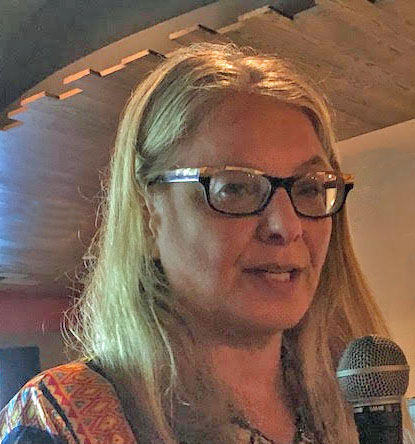 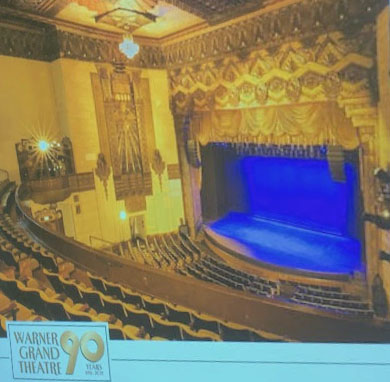 Liz Schindler Johnson is the Executive Director of the Grand Vision Foundation, a non-profit 501(c)(3) organization that supports the Warner Grand Theatre (which is now owned by the City of Los Angeles). The Foundation has a paid staff of 6, and over 30 volunteers. It produces concerts, film screening and other events at the historic art deco Warner Grand Theatre in San Pedro, and at the Grand Annex next door, a 150 seat cabaret theater opened in 2008. The Foundation promotes culturally inclusive arts and educational experiences, with events for youth, schools and community. The Friends of the Warner Grand was formed to save and reactivate the Warner Grand Theatre in 2004-2008, which had changed ownership and focus several times since its founding 90 years ago. An adjacent storefront was converted into the Grand Annex, a community resource that can be rented for theatrical production by local colleges and theatre companies. Meet the Music (MTM) is the Foundation's youth education program, serving 1600 students annually in high-poverty San Pedro and Wilmington public elementary schools, providing music education and an introduction to opera with the LA Opera. Team Taiko promotes Japanese Taiko drum instruction and Japanese language learning. |
DG Guity Javid’s Club Visit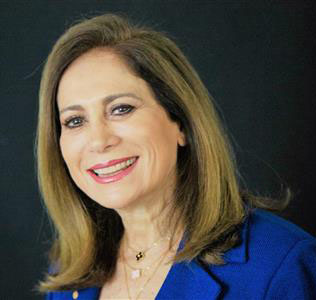 DG Guity Javid has been a member of the Rancho Park Rotary Club since January 1991. She served as Club President and other positions in her Club and District 5280, including Assistant Governor, District Disaster Relief Chair, Interact Advisor, Humanitarian Trip Co-Chair, District Charitable Foundation Board, and chartering a new Club. She has advocated for women’s causes, mentoring women managers in Women Unlimited, and investing in an angel organization on women-owned businesses. She co-chaired the first American Cancer Society’s “Relay for Life” in Beverly Hills, and has served on various not-for-profit boards. DG Guity graduated from the University of California at Berkeley in Business Administration, and has worked in banking, investments, and structured finance for many years. DG Guity attended our Board Meeting prior to our Club meeting, with her Chief of Staff Valeria Velasco & Club Service AG Elaine Thompson. We reviewed our Club Projects, including Project Amigo for farmworkers’ children in Colima, Mexico, and the status of projects on hold including the Kenya school, our local High School Peace Project, and the Marymount Rotaract Club, which should be able to resume soon with “normal” classes. |
Project Amigo, Alma Bayardo & Amaranta Hernández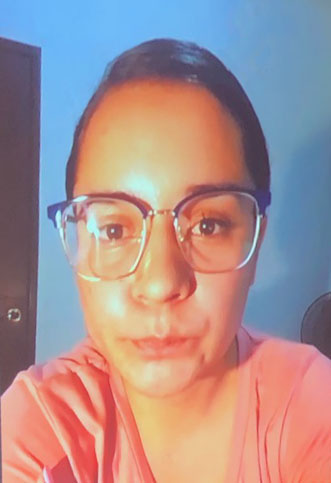 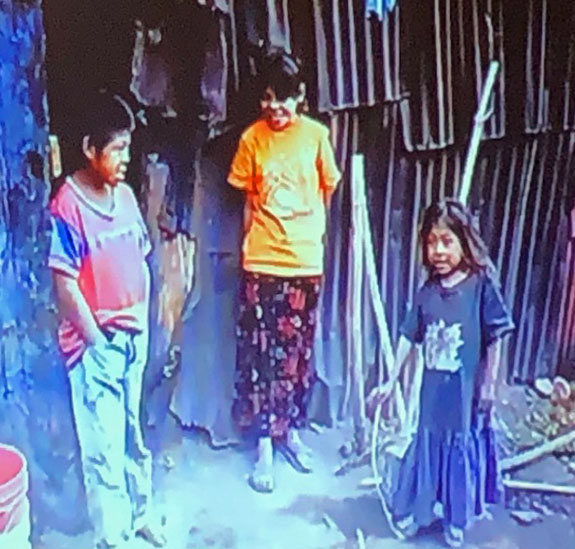 Project Amigo was established in 1984 as a donor-funded scholarship program for bright but impoverished students in the farmworkers community of Colima, Mexico, to attend primary school through university (which they are otherwise unable to afford). Applicant requirements include recommendation by a teacher based on academic achievement and financial need. These students get a Christmas Fiesta, a trip to the beach, picnics with visiting volunteers, and assistance with some vision and dental problems. They must maintain high grades, participate in weekly homework clubs, mentor younger students, provide 10 hours of community service monthly, and write a monthly letter to their sponsors. Past graduates have included teachers, lawyers, architects, engineers and doctors. One of them is Amaranta Hernández (pictured) who received a bachelors degree last year and has been sponsored by our PV Sunset Rotarian Marilyn Klaus. Amaranta and leader Alma Bayardo spoke to us by Zoom from Mexico. During the COVID Pandemic, some classes in Colima are being broadcast on TV. High school students are using their smart phones and laptops for classes, and elementary students have been coming to computers at the cyber center. Scholarship families have been receiving monthly food box distributions. |
Photowalks (How to Take Great Pictures), Jefferson Graham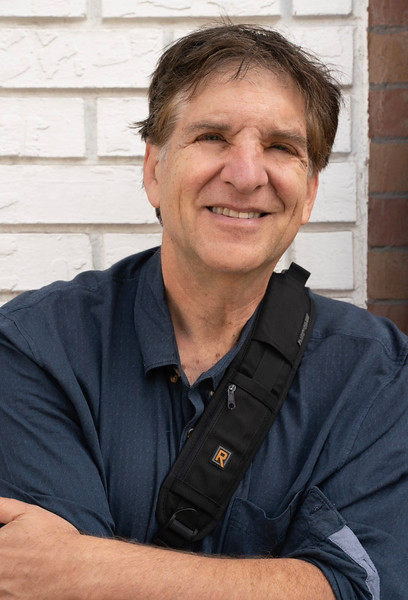 Jefferson Graham is a photographer and host of the travel photography series “Photowalks with Jefferson Graham” (streaming on Tubi). He is a portrait photographer, video maker, and jazz guitarist. He covered consumer tech for USA TODAY, and has written and/or photographed for many publications. He is the author of nine books, including the recent “Video Nation, a DIY Guide to Planning, Shooting and Sharing great Video”. He has done photo works on Aaron Spelling and on “Sin City, Vegas: Live and In Person”. Watch his Photo Walks on Los Angeles and Catalina on Tubi, the free TV streaming app: https://tubitv.com/series/300006532/photowalks-with-jefferson-graham?utm_campaign=web-sharing. See many of his photos on his website: https://www.jeffersongraham.net/. He presented numerous examples of his photography, to illustrate his tips for taking better smart phone photos:
|
SoFi Stadium Tour & Demotion Dinner (June 22)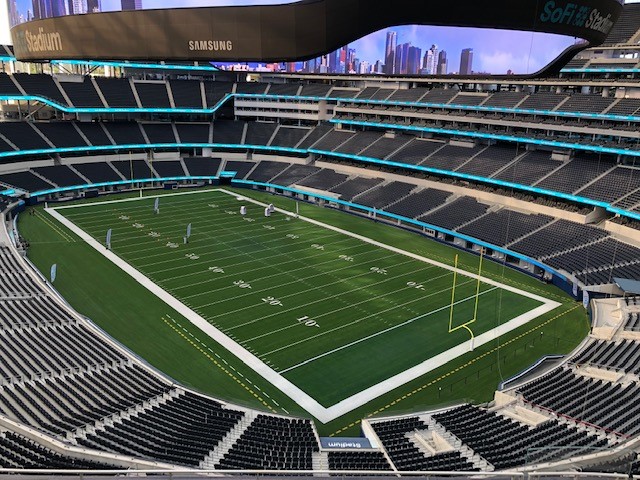 The SoFi Stadium is the new home of the Rams and Chargers on a site previously home to Hollywood Park in Inglewood. It was bought by Rams owner Stan Kroenke, and was built for a reported $5.5 billion. The personal finance company SoFi acquired the naming rights for over $30 million per year. It is scheduled to host Super Bowl LVI in February 2022, the College Football National Championship Playoff in January 2023, and part of the 2028 Summer Olympics. The stadium seats 70,000, and can expand by 30,000 more for larger events. A translucent roof is a separate column-supported structure over the stadium, the pedestrian plaza, and the attached performance venue. There is an oval double-sided 1000-ton video board with 80 million pixels over the field (pictured above showing the LA City skyline, without the smog). The roof can project images visible from airplanes flying into LAX. Our Club attendees were given a tour through the various venues, bars, luxury suites, and the playing field where there were opportunities to throw a football through a target, kick a field goal, and run a 50-yard dash (although none of our members was observed participating in these activities). Afterwards, we migrated to the Lido Di Manhattan Restaurant in Manhattan Beach for outgoing President Chase Thacker’s last hurrah. He brought his whole family, as did incoming President Steve Johnson, not to be outdone. The food and wine and socializing were superb, and we are now charged up for a great new Rotary Year under President Steve.  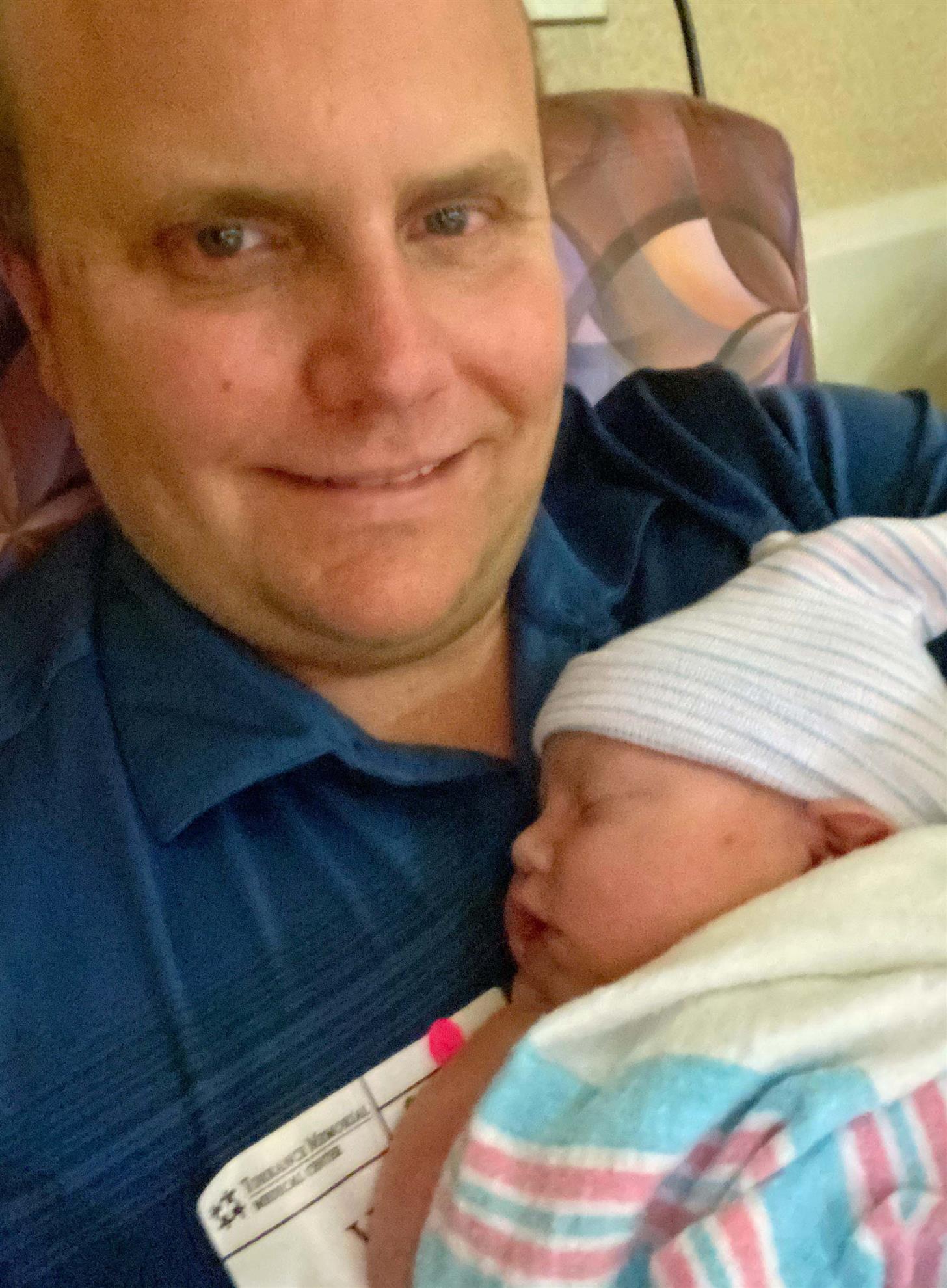 |
Farmers’ Market, Tom Brewer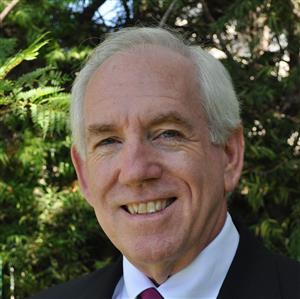 Tom Brewer is a member of the Torrance/Del Amo Rotary Club. He has been a shopper at the Torrance Certified Farmers Market for almost 30 years and a volunteer there for the last 2½ years. He presented helpful advice to “novice” farmers’-market shoppers, and offered new insights for veteran market shoppers. He hopes to give us a new appreciation for our local farmer’s market. The Torrance Certified Farmers’ Market is located at Wilson Park on Crenshaw between Sepulveda & Carson, on Tuesday & Saturday mornings from 8 to 1. It started on Tuesdays in 1985 and on Saturdays in 1992. Each market has about 65 growers. This event has become a community meeting place for neighbors and friends to greet, chat and sample. (The Palos Verdes Farmers’ Market is now located at Peninsula High School, Sunday mornings from 9-1.) Farmers’ markets offer safe nutritious vine- & tree-ripened fruit and vegetables grown in California and certified by the State of California. They eliminate the costs of packing, shipping and wholesale distributing, saving money for both farmers and consumers. Quality produce is brought in each week direct from the farms, with a year-round selection of California-grown fruits, nuts, vegetables, eggs, honey, baked goods, fish, cut flowers and nursery stock. Certified Farmers’ Markets are certified by the County Agricultural Commissioner. Farmers must have a Certified Producer Certificate on site, and can sell only California-grown produce grown on their own farm. The LA County agricultural Commission inspectors visit participating farms and markets. Produce can be called organic if it was grown on soil with no prohibited substances applied for 3 years prior. The Torrance Farmers’ Market website (https://www.torranceca.gov/our-city/cultural-services/farmers-market) has links to useful information on:
|
Operation Smile Club, Ella Bjerre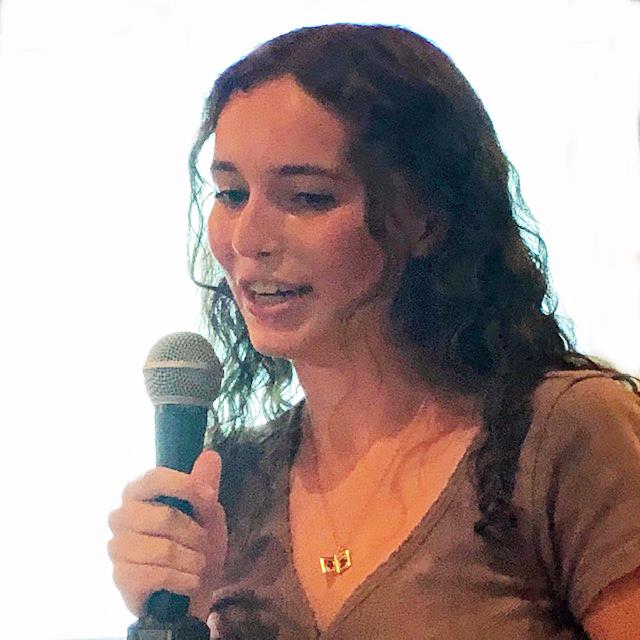 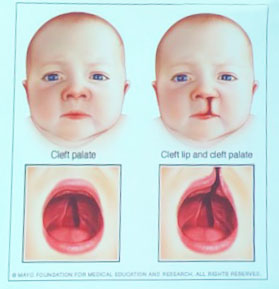 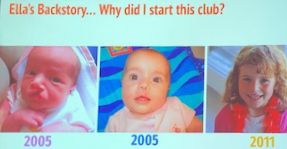 Ella Bjerre is a dynamic 16-year-old who runs Operation Smile Club at Chadwick School in Palos Verdes. Her club is dedicated to spreading awareness and fundraising for the surgeries needed for children born with cleft lips and/or palates. They will be starting a project to create individual “smile bags” full of fun games and essentials for children who receive surgery through Operation Smile. Every 10 minutes, a child is born with a cleft lip or palate, which can cause speech problems, malnutrition and social difficulties. Ella showed photos of her own history, in infancy before and after surgery, and 6 years later as a smiling child. |
The Power of PIE (Positive Interactive Experience), Derek J Gable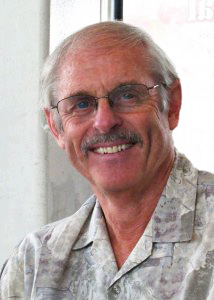 Derek Gable was born in England and worked on many interesting projects in invention and creative fields, including jet engines, projectors, robotic manufacturing and chocolate-making machines (Willy Wonka). He was brought to the US in 1968 by Mattel and worked on projects for Barbie, Hot Wheels and other toys and games. He invented the Real Estate Lock Box system in 1979 and formed a company to market these devices. He formed an invention and market development company (West Coast Innovations) for helping inventors take their concepts to production. He has been a teacher and mentor for many years, running a class called, “I have this great idea but don’t know what to do with it”. He has made presentations to service clubs and other organizations on subject creativity and how it can enhance one’s life. Mr Gable says, “Look at your whole life, and make it more fun. Find out what you have a passion for and make it your work. Get creative.” As an example, he formed a “Cheapskate Club” for inexpensive fun, such as going out to dinner and theater for $18 by looking for discounts and eating earlier during “Happy Hour”. He found GoldStar on the web for buying tickets at half-price, and Ports O’ Call Restaurant which has Happy Hour from 5-7 PM with food. The members meet in their homes and share their ideas about cheap food and entertainment, movies, etc, and discuss their experiences afterward. |
Paint & Wine Night, Malin Rigby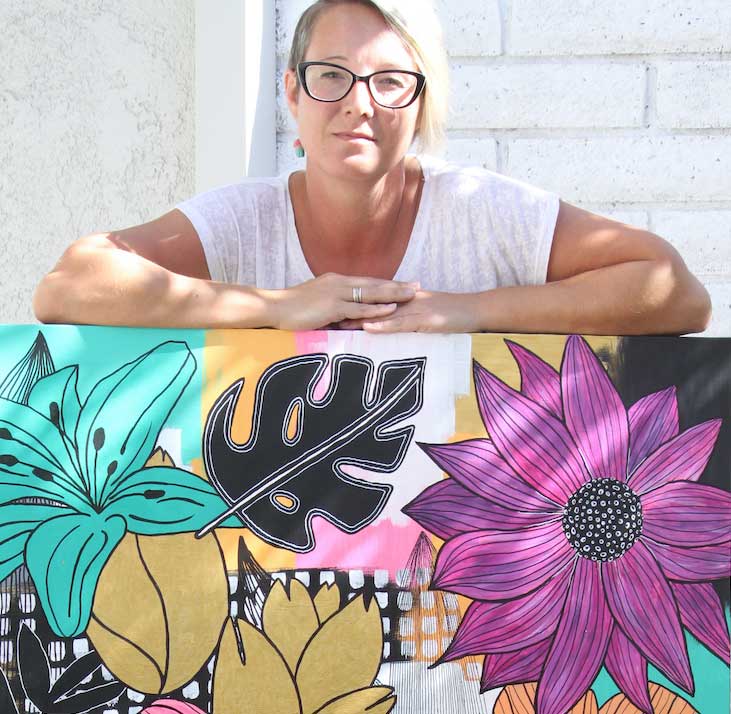   Malin Rigby’s art has been featured at the Palos Verdes Library, and she has hosted Paint & Wine nights at the Malaga Cove library. She was born in Sweden, studied graphic design in high school, and graduated with a BA in Computer Graphics from CSU San Jose. She uses her artistic skills creating websites for e-commerce and Amazon storefronts, as well as teaching painting. Her Swedish background promotes a clean and minimalistic design style. In Malin’s words: “Let me tell you what kind of art I create. I love to paint! I also love to teach art, host art parties, create digital art, so basically All Things Art! I create what represents happiness and emotions in my life, places I have been, feelings I have felt and objects I have connected with. Lively colors and subtle messages are always in focus when I create. There is no stronger inspiration than life itself and as an artist I live for the hours spent in my studio; it’s my sanity, sanctuary and passion.” |
Stop Recruiting, Start Attracting! Dr Bill Wittich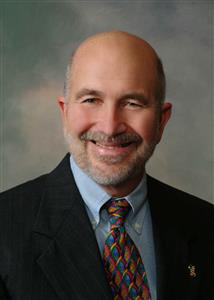 Dr Bill Wittich is a Past President of the Laguna Sunrise Rotary Club, Past District 5180 Assistant Governor, and has been an instructor for Far West PETS. His doctorate is from the University of Southern California. He has written books on non-profit associations. His most recent book is “Stop Recruiting/Start Attracting” (Amazon.com). He discussed how to attract new members by:
In Recruiting, we find them; in Attracting, they want to find us. Why do we want new members? More ideas, help with projects, social connections. Why do they want us? To network with community “Movers & Shakers”, social environment, interesting speakers each week, having fun, doing service (many of them are already doing community service in other contexts). Some prospective members go shopping for Clubs to see which one is the best “fit” for them. They need to have a business attitude, service attitude, and time to come to meetings. Rotary especially needs young (20s-40’s) professionals & more women & ethnic diversity. Talk about what we do, invite them & spouse and children to help in our projects. |
Search for Life in the Universe, Dr John S Mulchaey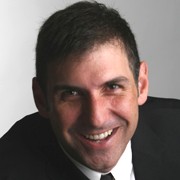 Dr John Mulchaey is Division Director & Science Deputy at Carnegie Observatories in Pasadena. He received a PhD in 1994 from the University of Maryland, where he helped discover that galaxies (such as our “Milky Way”) are bright X-ray sources. He studies galaxies with imaging from space-based X-ray and optical telescopes, to understand the processes that affect most galaxies during their lifetimes. Some of these X-ray sources are in a low-density 10-million-degree gas that should quickly disperse at these temperatures, but does not. Astronomers believe that intense gravity from invisible dark matter there is binding it in place. X-ray images alone are not sufficient to uncover the nature of galaxy groups. Follow-up observations with large-aperture optical telescopes, such as the new giant Magellan telescope, are necessary to determine galaxy types and redshift, or distance. These large telescopes have allowed him to study distant galaxy groups for the first time, correlating images with these intense X–ray sources. Distance from us (as measured by “redshift” of the frequencies of light bands associated with certain elements) correlates with time in the past in astronomical observations, due to limitation of the speed of light. Studying these galaxy groups at a variety of distances — and therefore development-stage times — he can directly trace how the galaxy-group environment typically affects the properties of its individual galaxies. These observations suggest that galaxy-to-galaxy merging is very common in these groups. For some groups, the galaxies may continue merging until they form a single massive galaxy. In recent years, he has uncovered several of these “fossil group” systems. Studying them provides important clues into the likely end-state of most groups, including the “Local Group” where our Milky Way galaxy resides. (The “End-Times”?) 4324 “exoplanets” (outside our solar system) have been discovered in our galaxy so far, often by measuring the perturbations of the expected orbits of the associated stars to determine size/mass and orbital diameter of its associated planet. These planets range from hot or cold gas giants (like Jupiter) to ocean worlds, ice giants, lava worlds, and rocky planets like Earth & Mars. With an average of 5 planets around each star, and 200 billion stars in a typical galaxy like our Milky Way, astronomers calculate 1 trillion planets in our galaxy, including several hundred thousand planets potentially capable of hosting life. Current estimates suggest that the universe has about 10 trillion galaxies. For communicating with other planets, radio signals from earth have reached out to about 110 light-years (from the time since we began broadcasting signals on earth), still a minuscule fraction of the volume of our galaxy. Also, radio waves decrease in power by the inverse-square law of distance, so they could be detected only within several light-years from earth. Signals from aliens would need to be focused directly at earth for detection here, and would take a long time getting here. Atmospheres of “earth-like” planets can potentially be observed with the new Magellan telescope. Potentially life-supporting planets in our own solar system might include Mars, Venus, and the planetary moons Europa, Ganymede, Enceladus, and Titan. (Don’t expect any balmy Southern California weather there.) The next several decades may answer the question whether some primitive life, such as bacteria, could be living in such harsh conditions. |
Update on COVID-19, by Dr Wes Bradford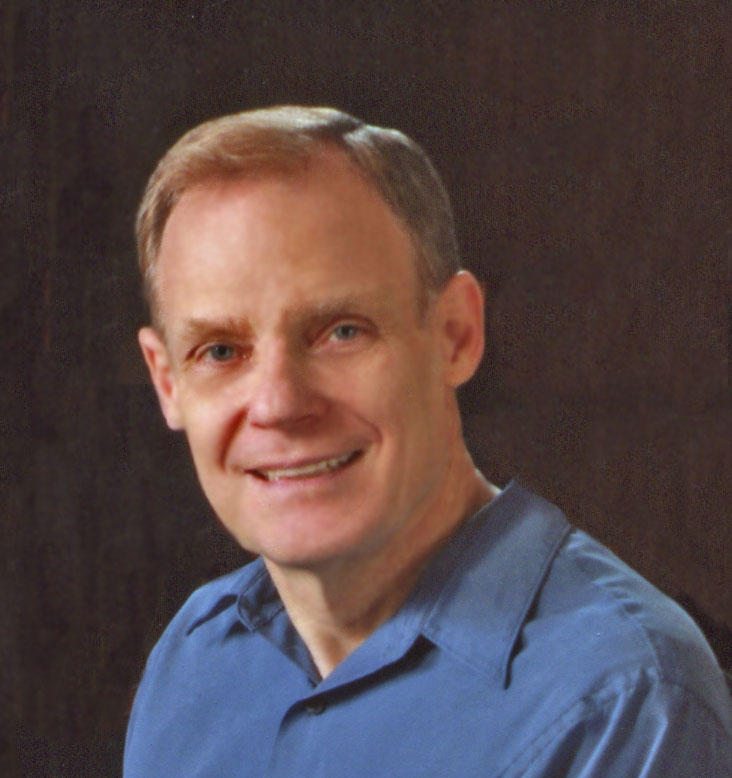 Wes Bradford is a family physician in Torrance and a member of the Family Medicine Department Faculty at Harbor-UCLA Medical Center. He spoke of the rapidly-changing COVID-19 pandemic and how it affects us. The Pandemic started when an unusual cluster of respiratory infections was seen in China at the end of 2019. After several weeks, a high death rate was noted, and by March 2020, the WHO declared a worldwide pandemic. One year later there are 120 million cases with 2.7 million deaths, and more-contagious variants are starting to be seen. (The first US cases came from Italy!) Health risk factors include chronic lung or heart disease, diabetes, poor nutrition and high stress. Testing for viral antigens (presence of infection) and for antibodies (immunity to infection) are helpful for assessment but are not fool-proof. Some patients, even with mild initial illness, become “Long-Haulers” (prolonged illness beyond 1 month), with ongoing symptoms such as fatigue, digestive problems, brain fog, depression, anxiety, insomnia, and/or impaired lung function. New symptoms can develop later, from mild to incapacitating. It is not known yet how long these conditions may last or how many cases will become permanent. Many new types of vaccine are under development, with differing advantages and disadvantages for each. At least 70% of the population must be immune to blunt the pandemic (“herd immunity”). If this were to occur without vaccination, the US could expect ~5 million deaths and ~30+ million chronically ill. Hospitals would be overwhelmed and couldn’t manage other acute cases. The risks of vaccination are not zero (the subject of much political debate), but are much lower than this. This virus has peculiarities, including spread to multiple organs (lungs, heart, kidneys, digestive system, and brain, with blood clots circulating everywhere). It also damages the immune system’s ability to build long-term immunity (some recovered people have gotten the same infection again!). In severely ill patients, the infection looks more like an autoimmune disease out of control. |
Story of Holocaust Survivor Avraham Perlmutter, by Dr Keren Perlmutter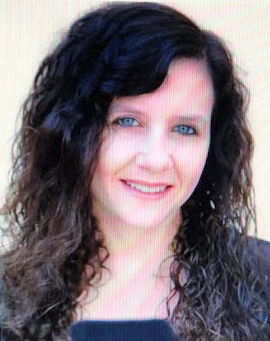 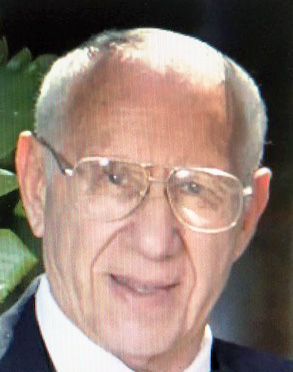 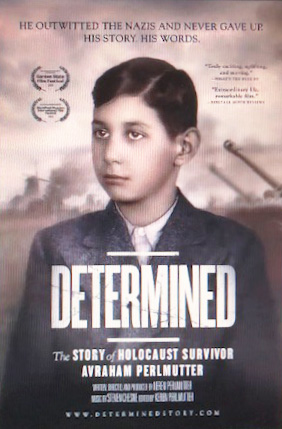 Keren Perlmutter has a PhD in Electrical Engineering and lives in Pacific Palisades. She spoke of her father, Avraham Perlmutter, who was born in Vienna, Austria, in 1927 and was swept up in the Holocaust at age 10. She spoke of his autobiography, “Determined”, detailing his amazing escapes and survival. When the Nazis arrived in Vienna, his parents sent him to the Netherlands, but the invading German army caught up with him there. He never saw his mother again. He was sheltered by sympathetic Dutch families and a heroic Catholic priest (who provided Christian names and identity-protection to Jewish refugees at great danger to himself, and survived for only about a year). During this time, most of Avraham’s relatives were captured or disappeared, and most of them perished in concentration camps. He was on his own as a teenager, living in multiple places staying ahead of the Nazi authorities. Several times he narrowly escaped, hiding in a hidden compartment in a house, and once running down the street to knock on the door of a stranger and saying, “I’m Jewish, can you help me?” (He did.) When stopped by a German army officer on the street, he responded in Dutch, “I don’t speak German” (his native language), and was not captured. Once he was caught on the front lines between the British and German armies, with shells exploding around him. He survived and was befriended by the British. After World War II ended, he emigrated to the pending new state of Israel. He joined the Israeli army during their war against the neighboring countries, and was wounded. He had learned to speak several languages by this time, and decided to continue his education in the United States, where he went on to earn a PhD in Aeronautical Engineering. He became a successful businessman and earned numerous patents. Now in his 90s, he lives in Santa Monica with his wife, Ruth. |
Galora-Sharing (of surplus fruit), Ryan Xavier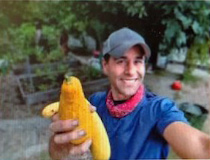 Ryan Xavier was born in Mexico City but grew up in the Westchester area of Los Angeles. He works in International Real Estate and founded Cobblestone Paris Rentals, an apartment rental agency in Paris, France. The COVID pandemic impacted his business. He dreamed of returning to a simpler time of community connections, neighborhood sharing, and real food from real people, and was inspired by his grandmother’s backyard with a lemon tree and raised-bed garden with local, organic and seasonal food. The surplus falls and rots, while millions more people now are having food insecurity in food deserts, and social connections are being lost. He sees us as an urban village, with growers, bakers, makers (of handicrafts, etc), and everyone contributing what they have in exchange for what they need. He tested an idea of a website for these exchanges in May 2020. 900 people participated in the first 2 weeks, with pickers and/or growers for fruits and vegetables. His cofounder and website manager is Christopher Chin in Seattle. They launched a new website in July, adding many other items such as eggs, honey, bakery, and homemade cooking. 8000 people are participating with 1800 listings (all free) in 32 cities and 7 countries. People can trade or sell (negotiating their own terms), or give away to those in need. Website features includes “Search Near Me”, “Invite Friends”, “Get App” (for iOS or Android devices), and a Spanish language version. Ryan is looking for more publicity in newspapers and TV, for promoting this social-connecting network for sharing, searching, browsing and connecting with other people to satisfy their mutual needs. Check out the website at https://gogalora.com/. He can be reached at ryan@gogalora.com for ideas or volunteering. If you have new website ideas or new feature requests for Galora, email his cofounder Chris Chin at chris@gogalora.com. |
The Best Investment on Earth is Earth! Yuko Saito-Rodriguez is a Past-President of the South Bay Sunrise Rotary Club. She is a Land Investment Advisor and Sales Director of Velur Enterprises in Van Nuys, and spoke of the investment opportunities related to new technologies. Major fossil fuels companies are now diversifying and moving into alternative renewable energy. The former Saudi Oil Minister is investing in alternative energy: “The Stone Age came to an end not for lack of stones, and the Oil Age will come to an end not for lack of oil.” Saudi Arabia is planning a major investment in alternative energy and is planning for a world beyond oil. The fastest growing jobs in the United States today are Solar Panel Technician and Wind Turbine Technician. This is a natural evolution. The US is a technology leader and has great economic opportunities. Southern California is the 5th largest economy in the world and the biggest economic powerhouse in the United States, with technology companies & international trade. The Inland Empire area has a large area of land that is being bought or leased to use for energy production, especially solar farms. All-electric cars are increasing market-share. The Clean Power Alliance (CPA, https://cleanpoweralliance.org/) offers customers in some communities of Los Angeles & Ventura Counties the option of buying some of their electric energy and capacity from renewable-source generators and suppliers. CPA is buying a 400 Megawatt-Hour lithium battery storage facility in Lancaster, which will help enable the closure of some gas-fired power plants. |
Holiday Message to PV Sunset Rotarians!  Merry Christmask & Happy Holidays, and a Zooming New Year to PV Sunset Rotarians! |
New Tidal Pool at Cabrillo Marine Museum, Caroline Brady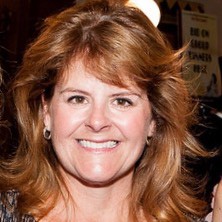 Caroline Brady is Executive Director of the Friends of the Cabrillo Marine Aquarium (FCMA) in San Pedro. The Aquarium is operated by the Los Angeles City Department of Recreation and Parks. It began in 1935 as a collection of marine specimens stored in the Cabrillo Beach Bathhouse. In 1949, the late John Olguin, captain of the Cabrillo Beach lifeguards, was appointed director of the museum. He popularized it by giving tours to visiting school groups and starting the popular evening program of viewing the grunion mating practices on the beach. COVID-19 forced the indefinite closure of the Cabrillo Marine Aquarium in March 2020, but all of the marine animals still need daily care, including the 40-year-old moray eel, doing well after a tumor removal. The staff are still working hard, cleaning, repairing and improving exhibits. There is a new Entrance and Exhibit Hall, and the Marine Animal Interaction Center is improved. Conservation projects continue, including the upcoming release of Aquarium-raised Giant Sea Bass babies that will be tracked in a research project. The Aquarium’s educational efforts continue, online by Zoom now instead of face-to-face, up to 2,000 students some days. 30,000 students from 1000 schools visit the Aquarium every year. Volunteers donate 31,000 hours per year. The Discovery Lecture Series continues with experts on a wide variety of topics. Check the website at https://www.cabrillomarineaquarium.org/. The Gift Shop is still open. You can shop for ocean-themed holiday gifts including books, T-shirts, and upscale home décor, and help the Friends of Cabrillo Marine Aquarium survive. Friends of Cabrillo Marine Aquarium exists solely to support the Cabrillo Marine Aquarium, to inspire exploration, respect and conservation of Southern California marine life. FCMA raises $1.1 to $1.2M per year through its Gift Shop, membership program, the annual Grand Grunion Gala, a Corporate Circle program and by securing grants from foundations and other charitable organizations. The City of Los Angeles and FCMA would like to raise $21M in a capital campaign to dramatically redo the front entrance, upgrade the exhibits, rework the touch tank, the life support system, office space, and provide for a cafeteria space. An extended online auction was held Nov 29 – Dec 7, instead of the Artisan Market. To donate or to become a member, visit: https://tinyurl.com/supportFCMA. It needs our help more than ever. |
Kuna Village Clean Water Project (Kenya), Peter Lattey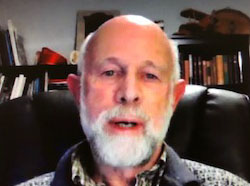 Peter Lattey is the International Service Chair of Downtown Los Angeles (LA5) Rotary Club. He is supervising the Kuna Village Clean Water Project in Kenya, with funding by a 2020 Global Grant. About 3,000 children die every day from diarrheal diseases caused by unsafe water. Some people need to dip their drinking and cooking water from dirty ditches. Some children, especially girls, are unable to attend school because of the amount of time they are required to carry water from distant sources to their families. Providing clean water, sanitation & hygiene is one of Rotary's causes to build international relationships and create a better world. (Other Rotarian causes include promoting peace, fighting disease, saving mothers & children, supporting education, growing local economies, and protecting the environment.) Peter presented an 8-minute video presentation about the water projects in Kenya. They provide water pumps, pipes, storage tanks and hand-washing facilities for schools and communities. They have completed 2 projects so far and are beginning their 4th and 5th projects. Most funds come from District 5280. Their planned next project is rainwater collection and micropore filters for school water supplies, with fund-raising to be completed by June-July 2021. Funds are more difficult to obtain now due to the worldwide COVID pandemic. Our Club could participate in this project. The RI Water Projects website is https://www.rotary.org/en/our-causes/providing-clean-water. |
Education in the Post-Pandemic Era, Dr Gudiel Crosthwaite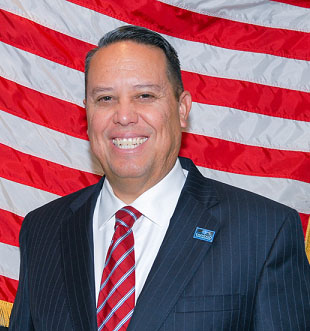 Dr Gudiel Crosthwaite is the Superintendent of the Lynwood Unified School District and Immediate Past-President of the Lynwood Rotary Club. He discussed how school districts are planning to address educational, health, and safety concerns and a severe budget impact as classrooms start to re-open in a post-COVID-19 world. Many US school leaders are sharing ideas on operating schools in a hybrid model of part distance-learning and part social-distancing in classrooms. Lynwood Unified has 15,000 students in 12 elementary schools, 3 middle schools, 3 high schools, & preschool & adult programs. Starting in elementary schools, they start to focus students’ attention on potential career pathways, including science, technology, engineering and mathematics (STEM) subjects, and getting younger students involved in computer coding through games and robots, including an iPad initiative. Many families are having food insecurity as a result of layoffs, unemployment, homelessness, and illness. Lynwood Rotary and other organizations are operating a food pantry with 600 meals/week, and some of them are delivered to homes by volunteers to minimize the risk of pandemic viral spread. |
2021 Humanitarian Trip to Costa Rica, Alex Parajon & Jewel Price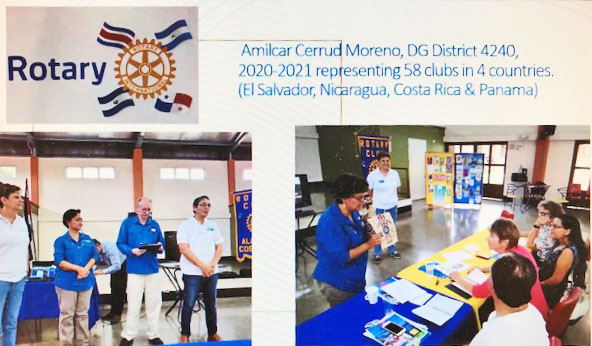 Jewel Price is Chair & Alex Parajon is Co-Chair of the District 5280 Humanitarian Trip to Costa Rica (District 4240, 58 Clubs in 4 countries), scheduled April 17-22, 2020 (Post-Trip April 22-26). They are members of the Glendale Sunrise Club. (Pres Chase had an enjoyable encounter with Alex at the RI Convention in Hamburg, June 2019.) For more information or to sign up for the Costa Rica trip, go to https://rotary5280.org/Event/costa-rica-humanitarian-trip and send a message to Jewel Price. Proposed Matching Grant Projects ($252,624):
Proposed Direct-Funded Projects:
Proposed Special Project Club Partnerships:
Alex & Jewel encourage us to participate by allocating funds in our Club budget, &/or joining the trip (https://rotary5280.org/Event/costa-rica-humanitarian-trip). |
Diverse Endeavors, by Raquel Watts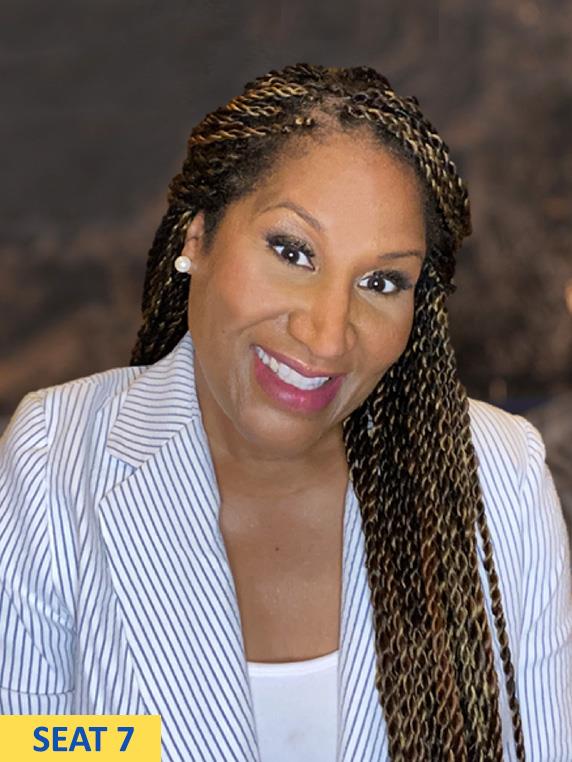 Raquel Watts is a candidate for Seat 7 on the Los Angeles Community College District (LACCD) Board of Trustees. She wants to promote multicultural availability of educational programs, from trade certification to advanced degrees. She grew up in Los Angeles and attended USC, where she served underrepresented students with activity in Troy Camp (a summer camp for underprivileged elementary-school students in Idyllwild) and on the Student Committee on Admissions and Recruitment. She also has degrees in Biblical Counseling from Friend’s University in Merced, and attended the University of LaVerne School of Law. She works for Mitchell Law Corporation as a Senior Legal Hearing Representative on Workers Compensation cases. She is also a volunteer for the Crenshaw Christian Center at the Faithdome. |
Palos Verdes Community Preparedness, Marcelle Herrera, PVE PD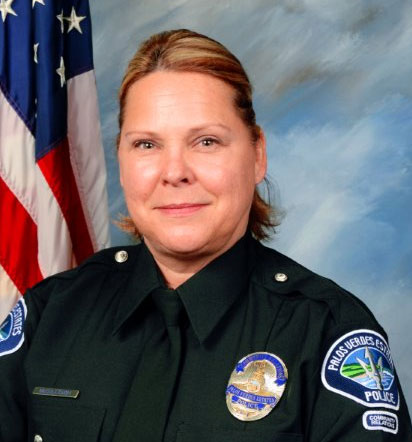 Marcelle Herrera is the Community Relations Officer of the Palos Verdes Estates Police Department, as well as a service officer. She supervises Neighborhood Watch, the Disaster District Program (DDP), and PVE-CARES Senior Program by conducting meetings, coordinate trainings, and being a resource of information to organizations and citizen’s groups Neighborhood Watch encourages residents to increase awareness of the community's responsibility to help in crime awareness and prevention, by promptly reporting suspicious activities and situations. People in each neighborhood should become acquainted with each other, to improve emergency preparedness and help with any unexpected problems, such as medical, security, or other community related issues. The Disaster District Program (DDP) provides disaster preparedness training and supports regional programs such as the Palos Verdes Peninsula Community Emergency Response Training (PVPCERT) which teaches disaster preparedness, response and recovery to residents. It has stockpiled emergency supplies for 6 designated areas of the city. PVE-CARES helps senior residents of PVE to connect with police and the community with special events and senior registry. It includes community volunteers delivering groceries and doing other needed services for elderly residents, and COVID testing and flu vaccines. Volunteers have completed a thorough background check and passed the PVE Police Department-sponsored training. Community events include presentations of topics of interest, a Doctors’ Panel Talk, and a Senior Health & Wellness Fair. |
District Governor Bette Hall’s Visit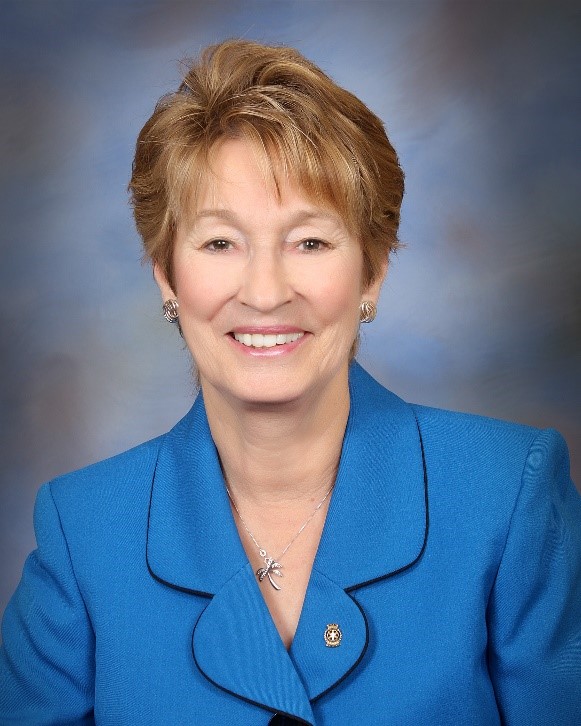 DG Bette Hall came from London, England, and had a long career in Human Resources for large companies and then her own HR consulting company, until retiring several years ago. (Sounds like a good background for Rotary leadership.) She has been a member of the Calabasas Rotary Club since 2007, and has held many Rotary leadership positions. Her most passionate area in Rotary is the Rotary Youth Programs, including developing and providing training for the Youth Protection Program. She enjoys being retired and having more time to volunteer with Rotary and spending more time with her family and grandchildren. DG Bette presented “DoGooderie” awards for years of Rotarian service to Marylyn Klaus, Chuck Klaus, and Wes Bradford, and a “Fresh Face in Rotary” award to Steve Johnson for most-active service as a new member. Bette reviewed Rotary International & District 5280 projects, activities and goals for the coming year. We are remaining active in spite of the challenging pandemic difficulties this year requiring social distancing & wearing masks. Rotary’s 6 Areas of Focus include:
Rotary’s Avenues of Service include:
Our newest member, Former Rotaractor Shauna McGinnis, who was sponsored for membership by Steve Johnson, was inducted into the Palos Verdes Sunset Rotary Club by DG Bette Hall. Welcome to the Club, Shauna! 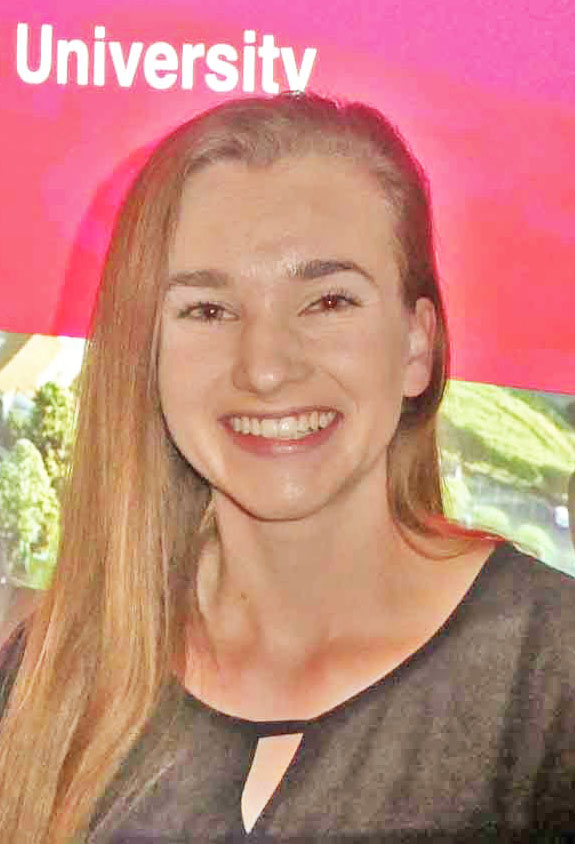 Pres Chase & Steve Johnson showed their up-to-date infant photos (“Future Rotarians”):  |
Domestic Abuse and Human Trafficking, Denese Lopez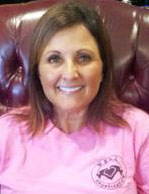  Denese Lopez grew up in Pico Rivera, California, with a single mother. She became a mother at 16, and struggled to continue her education. Now, she is a wife, mother and grandmother, and a retired police officer. She volunteered in domestic violence shelters and saw these victims’ pain after escaping their abusers. She listened to them anguishing over how they could start over again after having left everything behind. Denese entered a domestic violence education program to learn about the lives these women and children who were forced to start life in a new environment. She also became involved in organizations that help women and children who have survived sexual abuse and sex trafficking. She wanted to find a way to restore their dignity, self-worth and security. Having been a single mother herself for many years, Denese understood the hardships of financial stress, living in a home depending on other people’s miscellaneous donated items. While appreciating everything she had been given, she longed to have a home furnished with her own personal choices rather than from donations. After finally achieving this, she wanted other women and children to experience that same feeling of dignity. Denese formed a non-profit organization to implement this vision, Women Empowered by Labors of Love (W.E.L.L.) in Whittier, to decorate and furnish the homes or rooms of survivors of domestic abuse and human trafficking. See https://www.empoweredlaborsoflove.org/ for information, donating, and to subscribe to its emails. |
Blue, Black, Invisible: David Thomas David Thomas is President of the Inglewood Rotary Club, a businessman, and former law enforcement officer. He grew up in Compton as one of 3 siblings in the 1940s & 50s when it was a thriving middle class city. He attended high school in Long Beach where his associates were mostly white people. He was able to relate to people as individuals with minimal racial innuendo. He studied communications at Long Beach City College, and then earned a BA degree in Theology. He was always interested in aviation, but was hired by the Inglewood Police Department in 1989, and served 27 years in patrol & community affairs, and 12 years as a robbery detective. He discussed the Black Lives Matter movement. He has mixed feelings, relating to both his experiences of usually-subtle racial discrimination (even by other law enforcement officers) and his professional career in law enforcement. Some members of the Black community called him an “Uncle Tom” for wearing the police uniform. Reviewing both sides of these demonstrations, he sees a small proportion of trouble-makers taking advantage of turmoil to vandalize buildings and provoke conflict, while the vast majority of demonstrators are peacefully expressing their protest and demands for constructive social and political change. He is impressed by the large proportion of non-black demonstrators, showing that many people care and were stunned by the infamous 9-minute suffocation video of George Floyd by police in Minneapolis. Most previous abusive incidents were invisible to most of society. |
Teaching Technology through Gamification, Ruslan Shkolnykh Ruslan Shkolnykh is a member of the San Pedro Rotary Club. He has developed a non-profit organization, the Power Level Foundation, to help prepare underserved students for careers in technology through “Gamification”. The new technological revolution, that uses Artificial Intelligence (AI) algorithms to access “big data” and better hardware-processing capabilities, may cost 25M jobs (compared to 8.7M in the “Great Recession”), with some occupations becoming much more impacted than others. He believes that the solution is to provide free Gamified IT training to help transition at-risk workers and students, providing them with paid work experience and accelerated career paths. Gamification applies the elements of game-playing (like scoring points, competing, and playing by the rules) to other areas of activity, in this case, helping workers to adapt to technological changes in the nature of blue- and white-collar jobs. |
Vision for PV Sunset Rotary, Pres Chase Thacker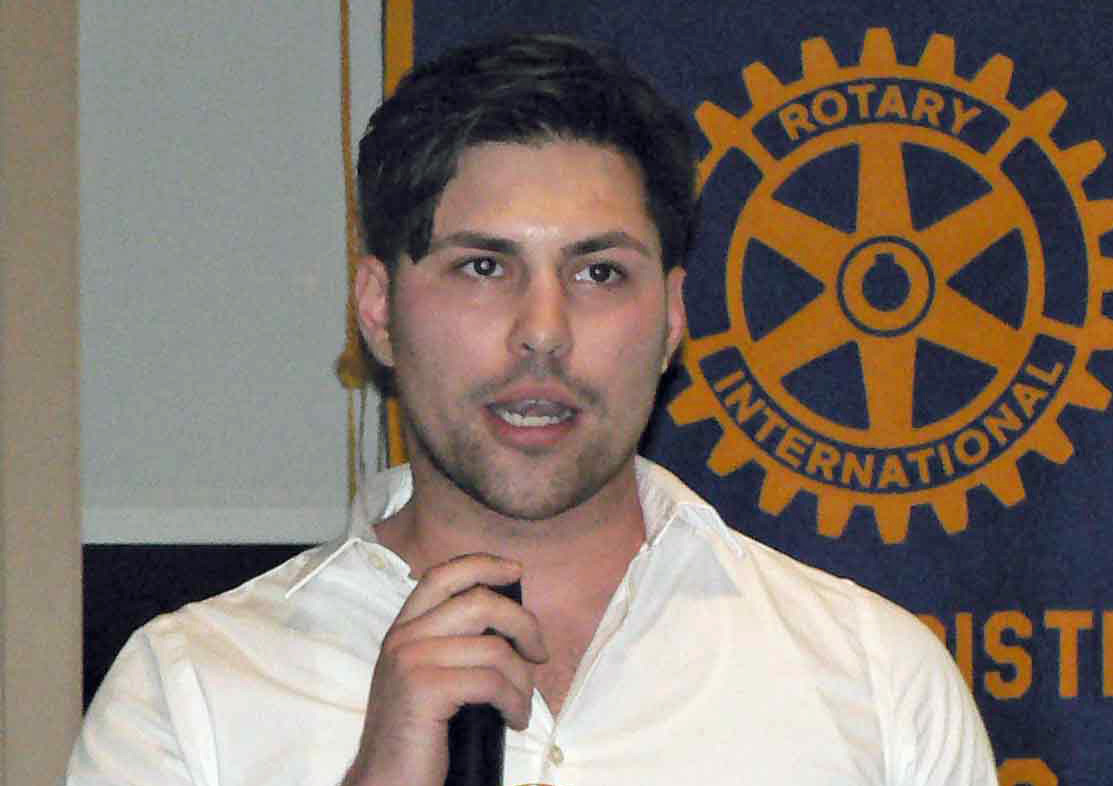 New President Chase Thacker discussed how & when we might be able to resume onsite meetings, possibly outside for “distancing”. He discussed the members’ survey of preferences for future Club activities. The survey on meeting preferences asked: If required to wear a mask or to have temperature taken; meeting outdoors; effectiveness of our Zoom meetings; continuing bimonthly Zoom meetings. In these trying times, we will invent our future by working together. Club projects:
Fundraising:
Treasurer Charley Ferraro reminds us to taking advantage of the tax deduction offered by the Club by accepting donations to the Charities Account in lieu of Club dues. |
Demotion Party for President Karla Munguia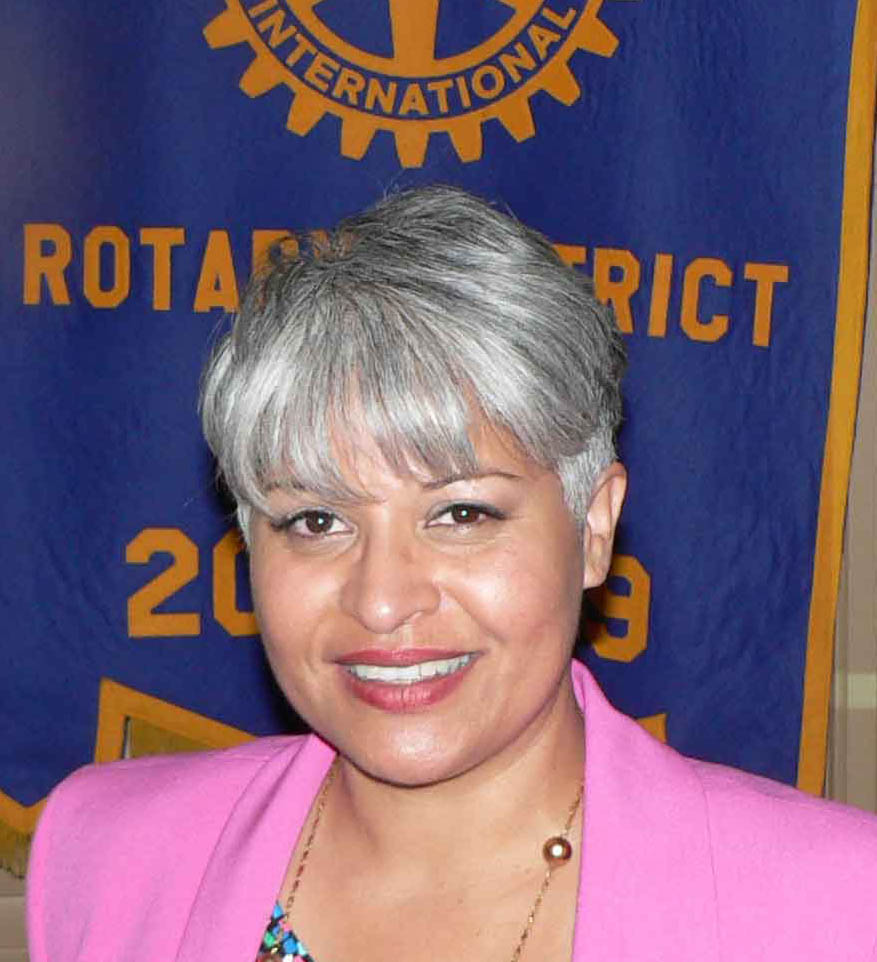  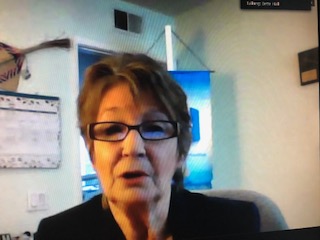 We all express our appreciation to Karla for pulling us through the challenging and unpredictable 2nd half of this Rotary year! We picked up our take-out dinners & “Munguia Margarita” cocktails at the Original Red Onion Restaurant before our virtual Zoom meeting. Past President Victoria Perez reviewed the year’s meetings (& meeting places). Gabriel Iglesias provided virtual entertainment (from South Florida). 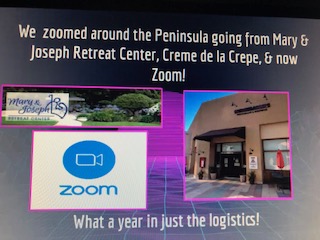 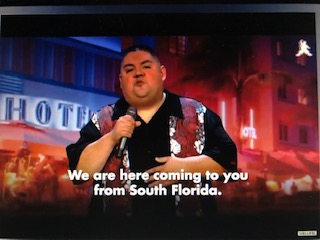 We raised our virtual glasses to toast Karla on a job well done! She was presented with flowers and a gift card at Armstrong Nursery. We viewed our 3 young future Rotarians. 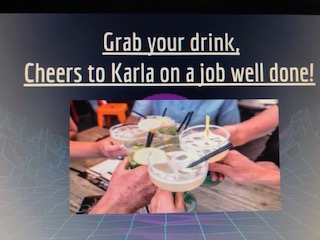 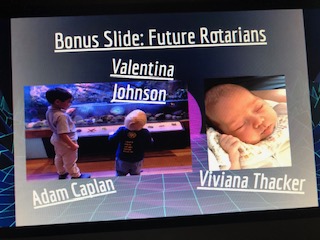 PDG Dave Moyers reminded us to look at the video on our Club website. |
Councilmember Barbara Ferraro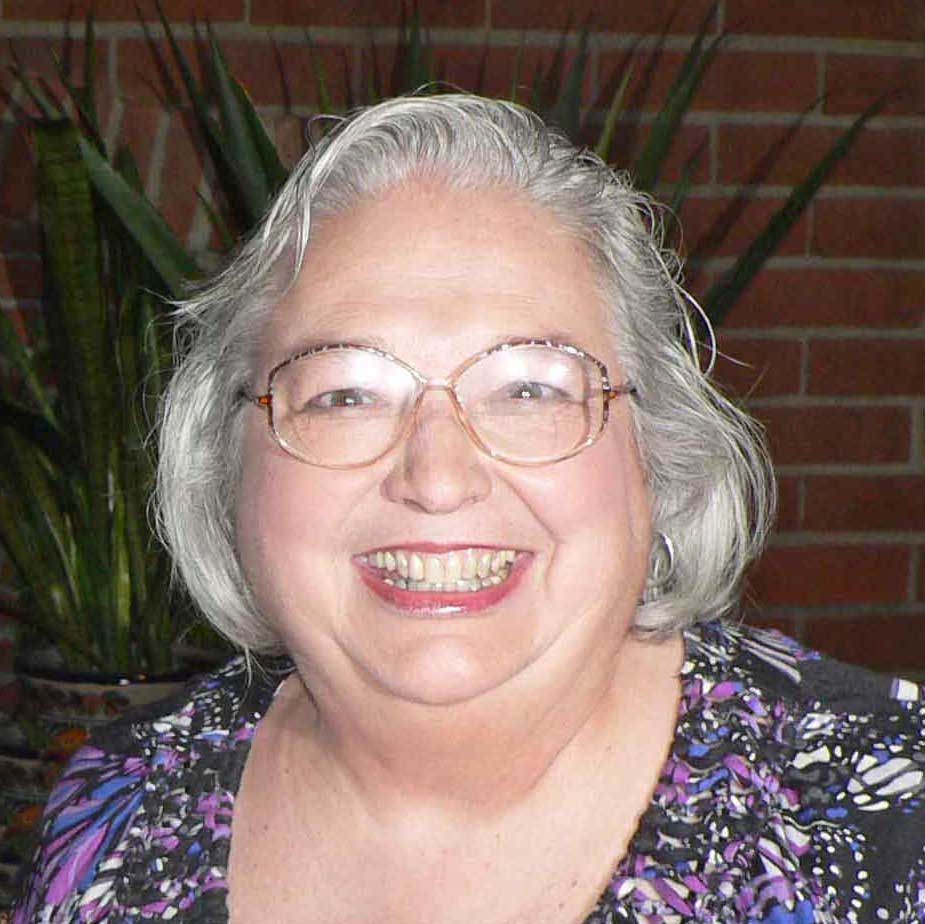 Barbara Ferraro, our Club Treasurer Charley’s spouse, was elected to the Rancho Palos Verdes City Council last November. She had previously been on the City Council, and is a long-time high school Spanish teacher in Palos Verdes. She spoke of the new challenges to the City, including impact of the Pandemic that began early this year. The City had to hire a new City Manager this year, and she says he is very organized and capable. There have been peaceful demonstrations at the Trump National Golf Club in our City (no tear gas or National Guard troops). The City implemented a program of taking food to first responders (Fire & Sherriff’s Depts, etc). City parks were reopened on May 7, and City Hall is also open now. The City is trying to support local businesses as they begin to reopen. They can request a refund of their business license fees this year. “RPV Together” encourages citizens to shop locally for a while. There are some vacancies on the City staff, which will not be filled soon. RPV will still have a budget surplus at the end of its fiscal year June 30. The Terranea Resort in RPV closed in March but may reopen by the end of June, which would help the City budget, and Trump may reopen soon for dining. |
Project EGO Awards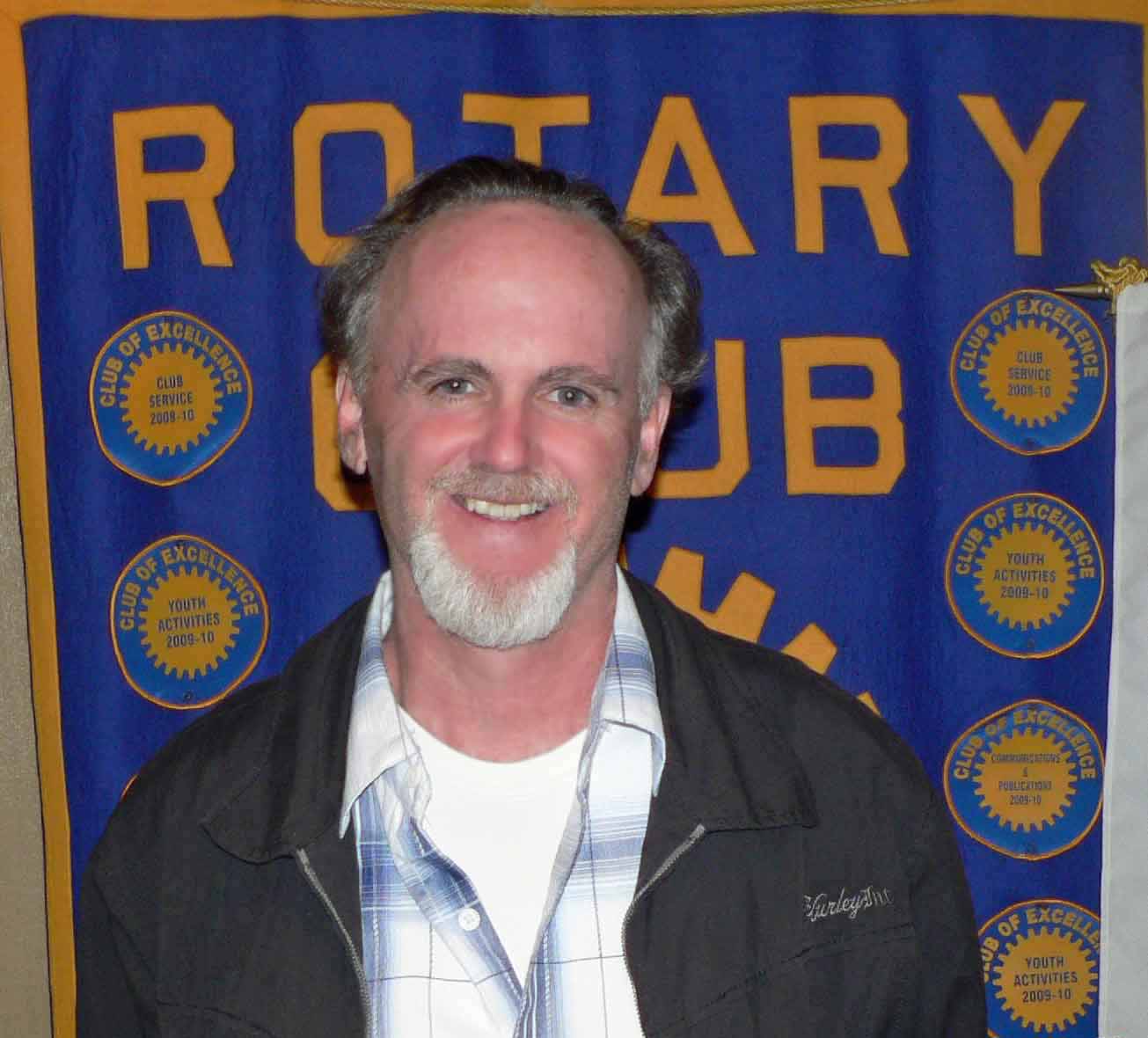 The Project EGO Program (“Exploring Growth Opportunities”) is an annual Palos Verdes school-based and community-supported intervention program sponsored by the Palos Verdes Sunset Rotary Club to help at-risk seniors to develop life-skills needed for future success. Students with personal, family or financial challenges are recommended into the Project EGO program by school counselors for their potential of success. See https://pvphs.pvpusd.net/apps/pages/Academics/ProjectEGO for program details. Project EGO is led by Robert Babb, MFT. It has twice-monthly meetings with community speakers on important topics such as goal-setting, teamwork, resumes, job interviews, community service, healthy lifestyle choices, vocational options, financial planning, and grant applications. Parent meetings help to coordinate student development. A group Wilderness Challenge helps build self-confidence, self-esteem, teamwork, leadership and problem solving skills. For successful participants, there is a year-end Banquet celebration and special recognition for each student’s successes (done "virtually" this year). Robert Babb introduced each of the 16 successful student finalists, summarized his/her background and accomplishments, and announced the scholarship amount awarded (to be paid directly to the school of the student’s choice upon attendance). We congratulate them and wish them the best success in their future plans: $100 – Faris Kawar $500 – Shawnee Prieto $750 – Alia Barakat $750 – Charlize Diaz $750 – Arian Razaghpanah $750 – Dean Abdelnaby $1000 – Nickon Maher $1000 – Koby Segura $1000 – Ashton Aungst $1250 – Audrey Breon $1250 – Nick Sanacore $1250 – Marilyn Cortez $1500 – Imaan Ali $1500 – Soroush Shahriari $1500 – Kelaiah Bradford $1500 – Emily Desplancke |
Automated External Defibrillators (AEDs), Bo Gapas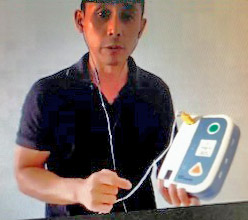 (We had 13 online attendees for our May 12 “Zoom” meeting.) Bo Gapas is an American Heart Association-Certified CPR & First Aid Instructor who can provide on-site First Aid & CPR/AED training (Phone 808-779-8033. Having an on-site AED can enable emergency cardiac assistance for business, non-profit organizations, and home before paramedics arrive, when every second counts. He recommends the Phillips AED (~$1275), which weighs 3.3 lb with a carrying handle and mounts in a storage cabinet attached to a convenient wall. When a cardiac arrest occurs and before paramedics arrive, CPR chest compression is always started ASAP (but breathing into the mouth is no longer done). If not successful, defibrillation should be started within 10 seconds of stopping CPR (this requires careful coordination between 2 rescuers). The victim’s upper clothing is removed or cut, and significant chest hair is shaved off at the defibrillator electrode pad placement sites (not the whole chest). (These tools are in the kit.) He demonstrated pad placement on a manikin, on the skin of the R shoulder & L lateral chest. After attaching the lead wires and pulling the green handle, the defibrillator activates and voice instructions automatically begin while the device analyzes the heart rhythm. It will say whether and when to deliver a shock (while not touching the victim to avoid shocking oneself!). This is a self-testing defibrillator that does a performance check-up in its wall storage cabinet with daily, weekly, and monthly testing of its internal circuitry and lithium battery. A blinking green Ready light says it’s ready for use. When there is a problem, the Ready light turns off and a chirp alert sounds. Pressing a blue Information button gives a verbal prompt with details. The disposable Smart Pads have a 2-year life span, and must be replaced after every rescue attempt. |
Rotary Youth Exchange Student, Samantha Steman We had 14 online attendees for our April 28 “Zoom” meeting (including 3 welcome Guests: Makiko Nakasone (Little Tokyo Club); Warren Bobrow (Westchester Club), District Rotary Youth Exchange, & Samantha Steman, tonight’s speaker. Samantha Steman is a Senior at PV High School and is participating in the Rotary Youth Exchange (RYE). (Her father was her Rotarian contact.) She discussed the application process, requiring a $500 deposit. They start their year abroad in August with a tour of the host country to become acclimated, stay with an average of 3 host families during the year, near the school to be attended, and end the following summer. (This year is more difficult and unpredictable due to the COVID-19 pandemic.) Students participate in family and school activities and sports, and make many new friends, quickly becoming fluent in the language. Rotary International requires specified youth protection precautions for students. The students arrange their own airfare and personal expenses. Youth Exchange students are sponsored by a Rotary Club in their own country, which is responsible for providing a jacket, pins and banners. The student needs to know Rotary by being involved in Club activities before leaving. |
Dave Moyers, District Humanitarian Trip, Oaxaca, Mexico |
Hunter Thacker, Art & STEM Curriculum for StudentsWe had 15 online attendees for our March 31 meeting, and could see and hear each other with our “Zoom” apps. Our Club leaders discussed our current “social distancing” responses to the virus, answered questions from members, and encouraged bringing past members into our virtual meetings. In our evening program, Hunter Thacker (Chase Thacker’s brother) discussed the preschool programs at the “Leap and Bound Academy” in Torrance. He began with a slide show, and then demonstrated how to teach scientific principles using simple everyday objects that children are familiar with. STEM is “Science, Technology, Engineering, and Mathematics”, into which he integrates “Art” to improve these meaningful experiences (“STEAM”). Their hands-on experiments promote critical thinking & problem-solving skills about how the world around us works. He showed how they can connect acid fruits (lemons) with electrodes to make a battery in a circuit that can light an LED bulb. They can learn how lenses can make a microscope to explore microorganisms. He discussed examples of catapults and pulleys and electromagnetics (Physics). Art can relate to geometry and spatial relationships, and help to understand Math concepts such as how far, near or often, and less than, greater than, or equal to. With a piano keyboard on the screen, they can play along by pressing the bottom keys on their keyboards (“z” through “/”). He also showed a Microsoft program (Circuit Playground Express) to introduce students to electronics and programming, by moving components around on the screen to make connections. |
Scheduling Future PV Sunset Meetings With the uncertainties caused by the unprecedented coronavirus health crisis, we Rotarians need to remain in close contact with “social distancing”. To comply with recommendations for health safety, our Board has decided to have Palos Verdes Sunset Rotary “Virtual Meetings” every 2 weeks until further notice, connecting with the “Zoom” app, starting on Tuesday, Mar 31. (See instructions below for downloading to your computer or smartphone, and signing in for a meeting.) Our monthly dues will be temporarily lower to reflect the cost of meals. See our Club Calendar in newsletters or Club website (https://pvsunsetrotary.org/events/calendar) for up-to-date schedule. Rotary District 5280 is postponing any large District gatherings for the near future, including Pageant of the Arts and District Breakfast. District events scheduled on later dates are being monitored, with potential electronic options for virtual attendance. (The RI convention in Honolulu has been cancelled.) Stay in touch with our Club & District websites & newsletters. Some other Clubs will also have online meetings that you can attend (see District website for their times & dates & login IDs, at https://rotary5280.org/page/online-club-meetings/, at bottom of page). Sign up free for Zoom at https://zoom.us/. Download an app to your computer or smartphone. Then, to join a meeting at the scheduled time, go to https://zoom.us/join, type in the meeting ID, and you should be connected to the host of the meeting. You should have both audio and video connection (although if your computer does not have a video camera, you can still connect by audio). You will be able to see and hear the other attendees. Try it, and with a little practice, you can feel as comfortable as with a phone conversation. Welcome to the brave new world! |
Corona Virus, by Dr Wes Bradford The official name of the new Corona virus is SARS-CoV-2, and the illness is called COVID-19. The median age for documented infection is about 50 years old, with men at slightly higher risk (more smoking history?). Children seem less vulnerable and usually have milder symptoms, with no reports of deaths in children under 9. A small study of infected infants under 1 year old found that none had severe illness or complications. Pregnant women’s risk does not seem higher. Most infected people appear to have mild upper respiratory infections, and some reports of non-symptomatic carriers. Most people with symptoms have:
A small percent get more severe symptoms, such as:
High-risk factors: Lung disease (asthma, emphysema); SMOKERS! 2nd–HAND SMOKE! Immune-system diseases:
Environmental toxicity:
Poor nutrition (you’re only as strong as what you give your body to fight with). Alcoholism. By mid-March 2020, about 2,800 cases of Corona virus were reported in the US, with 59 deaths. By comparison, 45 million people in the US have gotten flu this season, from October 2019 through February 2020, with up to 45,000 deaths. The 1918 world-wide flu epidemic (when it was a new infection) infected 500 million people around the world, including up to 50 million in the US with 500,000 deaths. My favorite treatment for new-onset viral symptoms (any type) is taking an Oil of Oregano capsule at the onset (don’t wait). They can be repeated every 6 hours if the symptoms are not improving by then. (Available locally at Sprouts & Lindberg Nutrition. Keep refrigerated, but you can carry a few with you in a pill-box in your pocket or purse.) Hand sanitizer: Try Isopropyl Alcohol (the active ingredient) in a spray bottle. Repeated hand-scrubbing increases skin bacterial colonies (old surgical studies), so I prefer sanitizer as the mainstay. Avoid touching nose or eyes (viruses spread primarily from nasal secretions.) Do not hoard! This is an unprecedented public health concern (for recent times), so stay calm and follow the latest perspectives from public health experts (tune out self-serving political noise). Let us all support and care for each other for whatever the duration may be. We are stronger together. -- My personal perspective. Dr Wes Bradford |
“See It-End It” Film & Arts Festival, Patrick Erlandson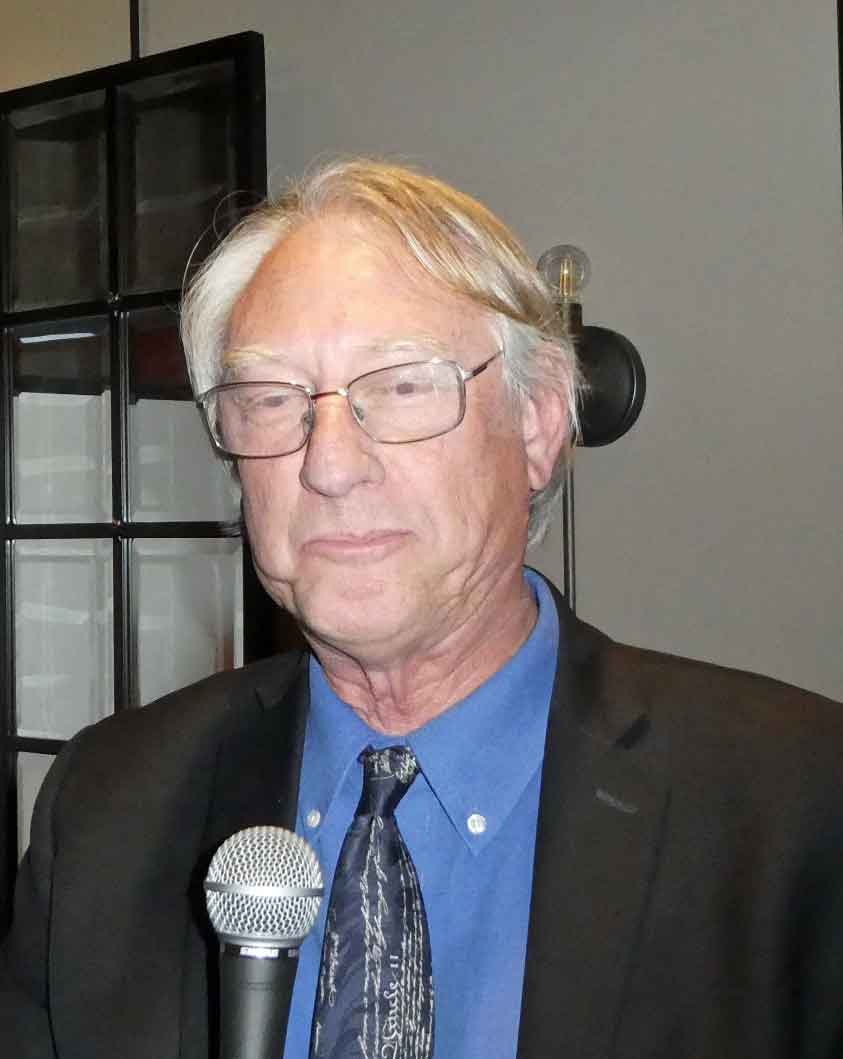 Patrick Erlandson described the “See It — End It” Film & Arts Festival at the Warner Grand Theatre, Friday evening & Saturday, April 3-4. This is a partnership with the YWCA Harbor Area and South Bay, showing the disturbing link between foster care and human trafficking. This is the 2nd year of this community event including film screenings, visual and performing arts and music. Families are invited to participate in a free “Kids Zone” in the Grand Vision Annex on Saturday, to experience educational fun including internet safety tips with Officer McGruff. Many displaced people around the world are vulnerable to this exploitation, especially when they go to another country looking for jobs. They are recruited by smart phones & social media. Teens are especially susceptible, and they often blame themselves when they are trapped in a situation. He showed a video of “Lost Girls, Angie’s Story”, presented by Artists for Change and Men Against Trafficking. |
Member badge presentation to Jim Boyd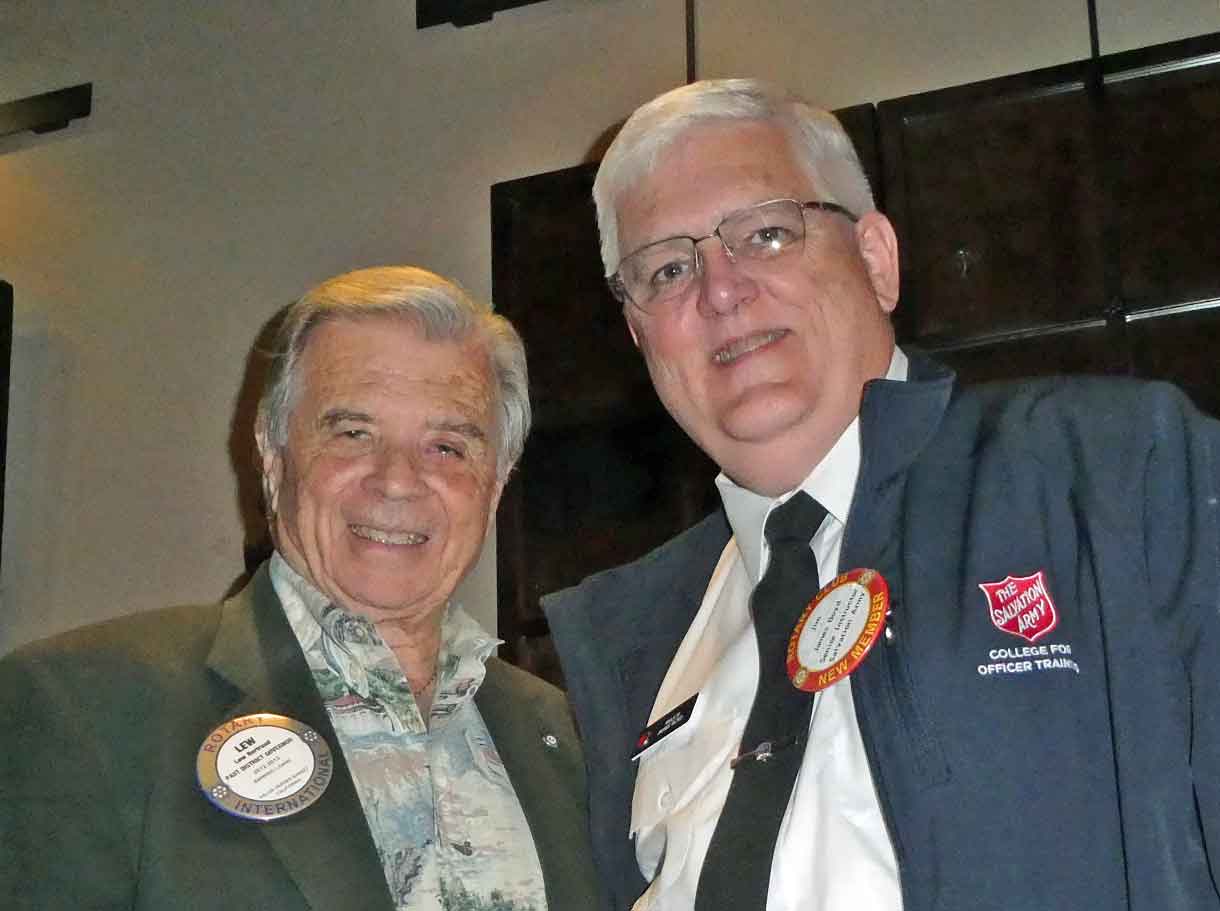 Maj Jim Boyd, Salvation Army, was presented his member badge by PDG Lew Bertrand. Jim Boyd was recently transferred to the Salvation Army School in Rancho Palos Verdes. He has served in 3 previous Rotary Clubs during his previous duty stations. Welcome to our Club! |
Induction of Maj Jim Boyd, Salvation Army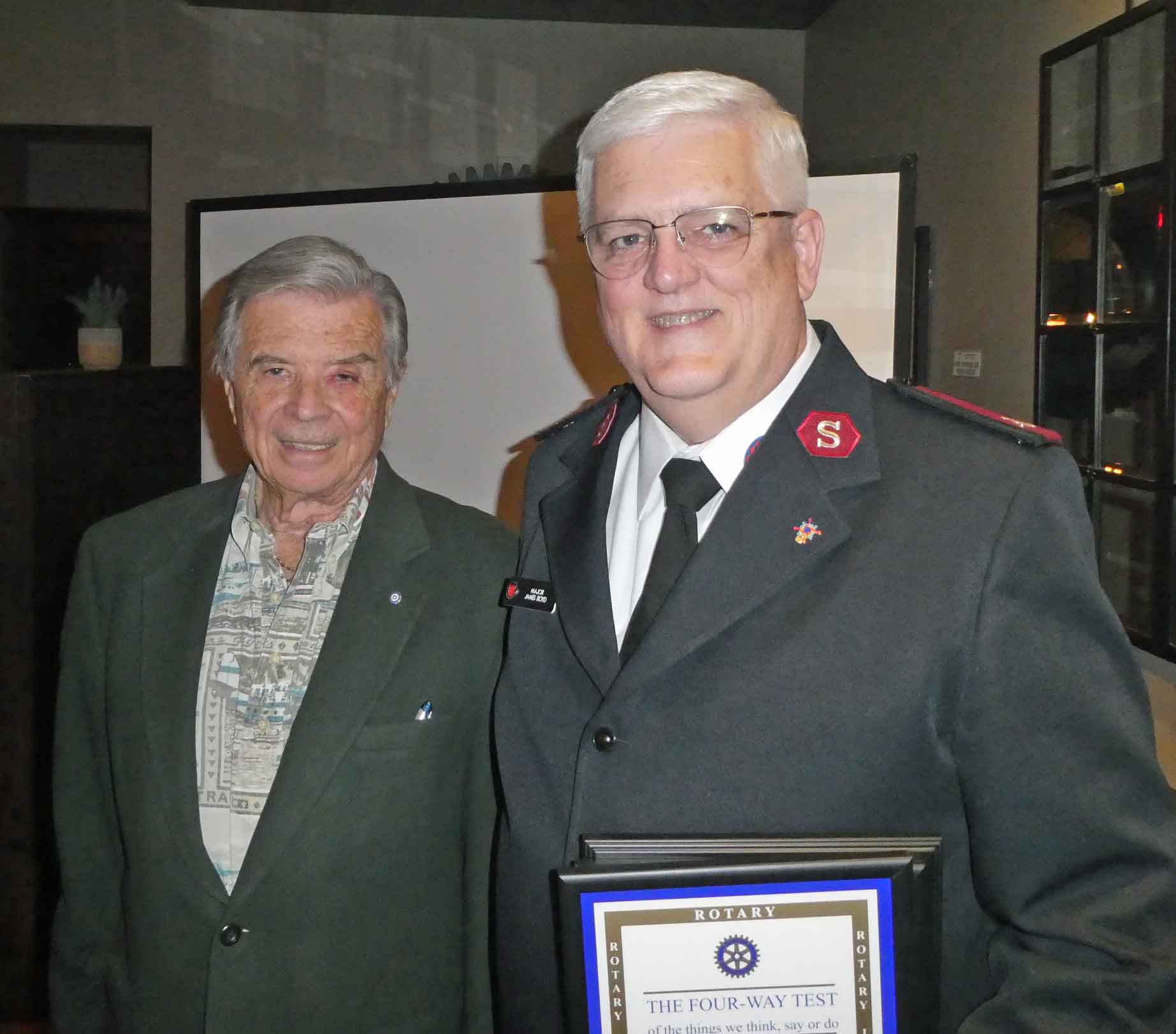 Maj Jim Boyd, Salvation Army, was inducted by PDG Lew Bertrand. Jim Boyd, recently transferred to the Salvation Army School in Rancho Palos Verdes, has served in 3 previous Rotary Clubs during his previous duty stations. Welcome to our Club! |
Future of Genetics, Gene Dotson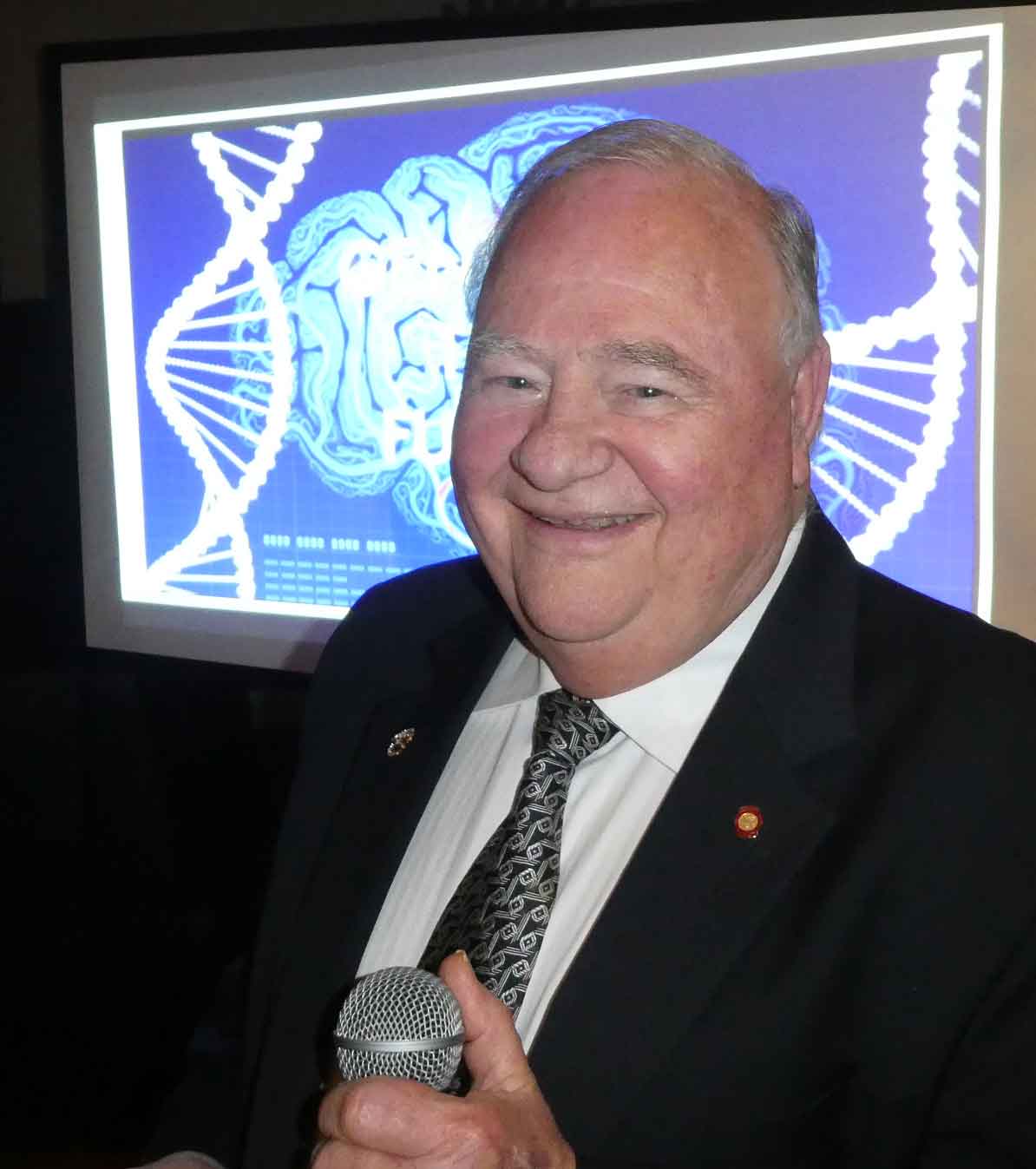 Gene spoke on the business applications of scientific genetic advances, which he believes will advance greatly in the next 10 years, using genetic tests and family health history to guide clinical and public health interventions. He reviewed the structure & function of genes and chromosomes, and how information there is transferred to the cell’s molecular machinery. Genes are templates for making proteins for cellular structure, function, regulation, and energy production. Many new tools have been developed in the last 10 years for new therapies with stem cells & nano-bots (microscopic robots that can be programmed), for repair of injuries, identifying and fighting cancer cells, anti-aging treatments, and gene therapies (excising & replacing an unwanted form of a gene). |
Japanese Peace Program at Pen High, Sachiko Iwami Mrs Sachiko Iwami is head Japanese language teacher at Peninsula High School. She graduated from Tsuda College in Tokyo, and was a Rotary Ambassador Scholar in 1992-3 in Asian-American studies at UCLA. She is also a curriculum advisor at the Orange Coast Gakuen Saturday Language School. She has helped to bring the Rotary-sponsored Global Peace Educational Project to her high school in coordination with Rotarian Makiko Nakasone of Little Tokyo and Rotary Clubs in Japan & District 5280 including PV Sunset. Language and cultural studies integrate language with concepts of personal identities, families, communities, contemporary life, and modern technologies. The program has a Japanese Honor Society pledging to serve as a bridge of international understanding and an ambassador to promote friendship between countries. |
San Pedro Toastmasters, Alliance with Rotary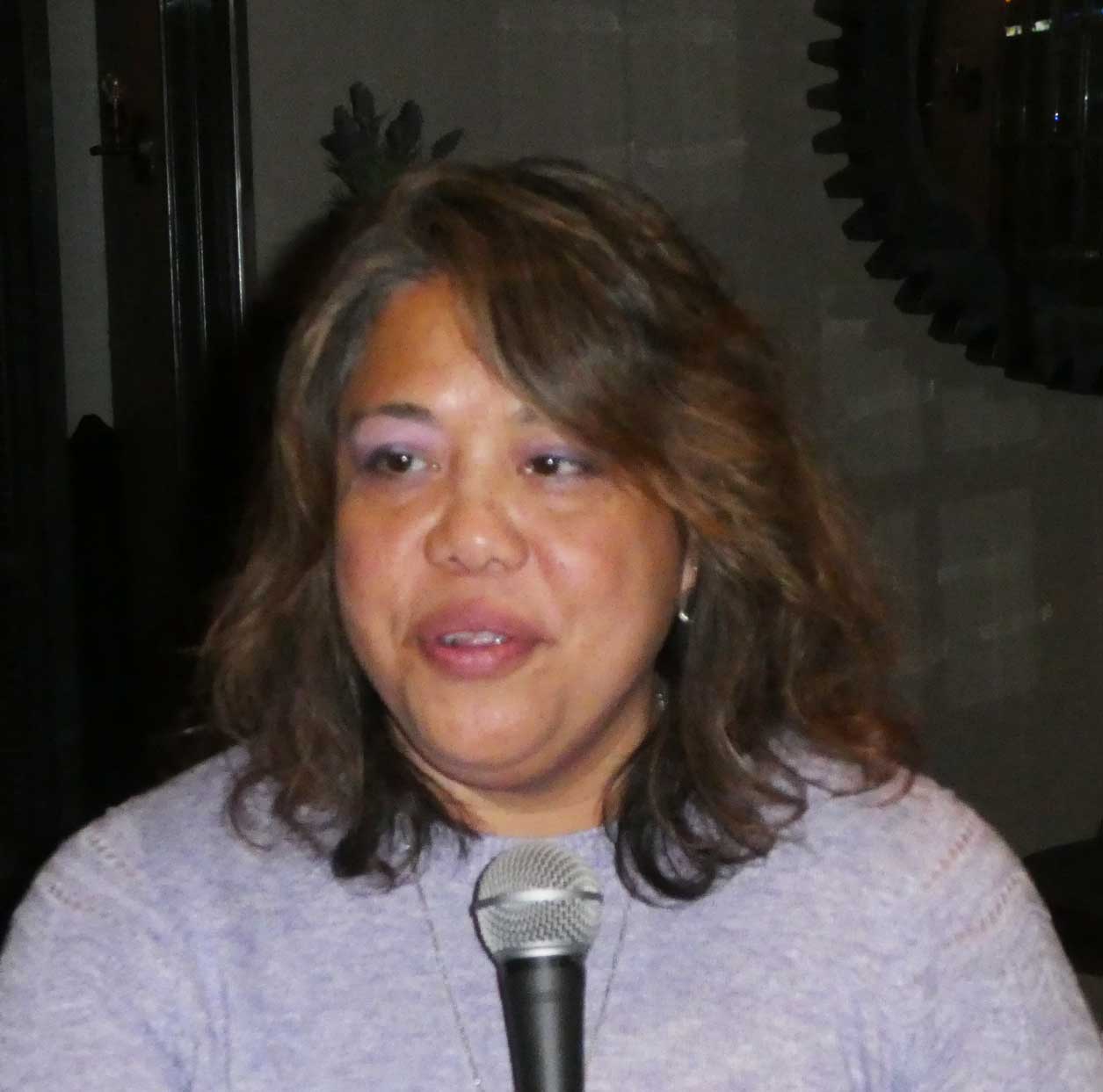 Grace Weltman has a Master’s degree in Public Policy from USC and is President of Communities in Motion, a public policy consulting firm for nonprofit and public agencies. She presented the benefits of Toastmasters membership in improving speaking skills and confidence, in a supportive Club environment. Toastmasters Alisa Manjarrez & Ana Razo also spoke briefly. Toastmasters’ members learn by speaking to their group of about 20 who meet once a week. They learn how to plan & conduct meetings, give 1 to 2 minute impromptu speeches, present prepared speeches, and offer constructive evaluation of each other’s performance. Grace asked some of our Rotary Club members to speak momentarily, to demonstrate how we can learn to speak briefly and effectively. Members can begin building their public speaking and communication skills with the Competent Communication manual, which has 10 speech projects to help develop speaking skills, and become eligible for the Competent Communicator award. Then more advanced speaking and communication skills are available through a choice of 15 Advanced Communication Series manuals, each containing 5 speech projects, many of them career-oriented. |
Food for Homeless College Students, Dave Henseler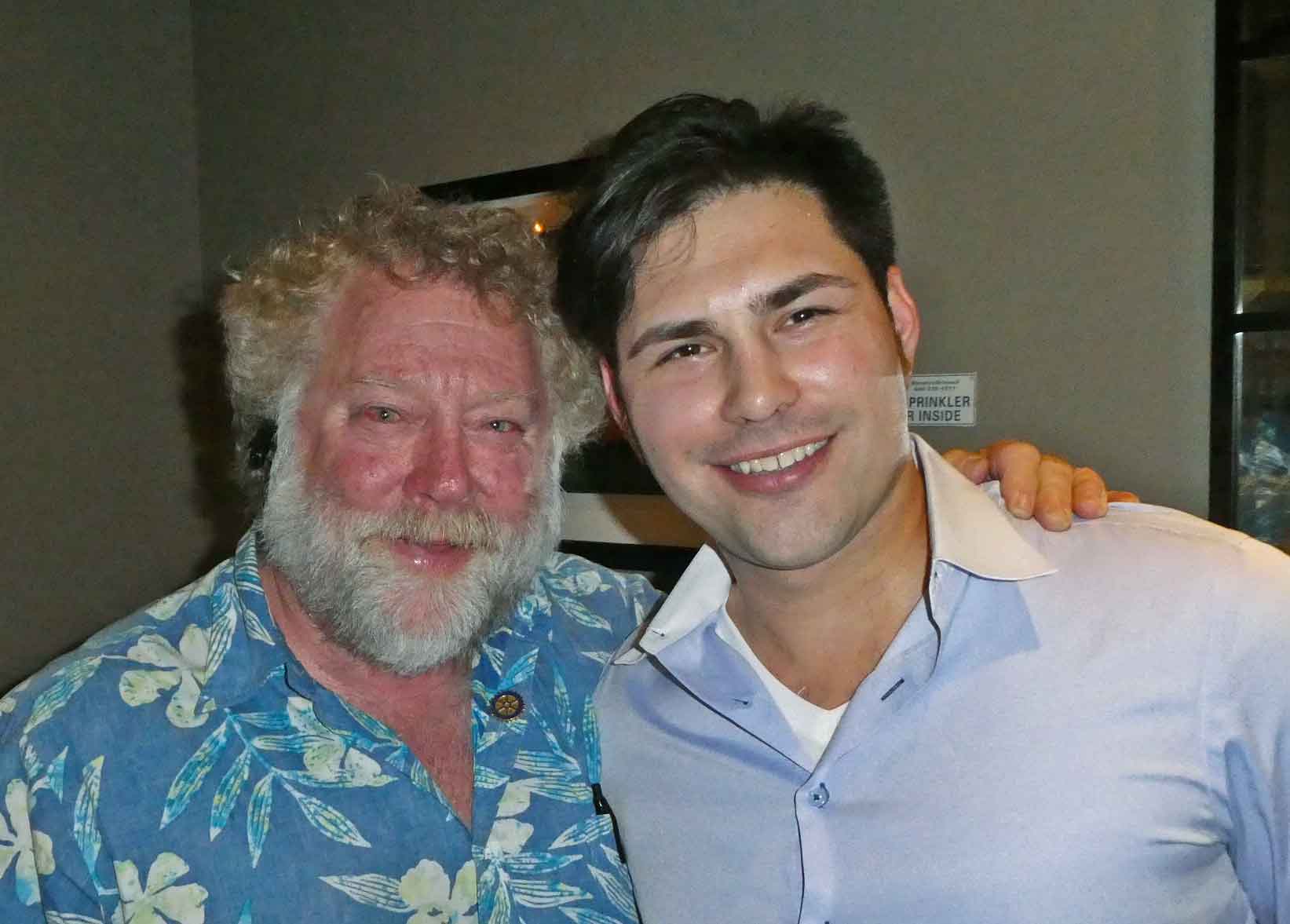 Dave Henseler (pictured with Chase Thacker) is a member of the South Bay Sunrise Rotary Club and is active in the international Rise Against Hunger project. Hunger is also present in our community, including among homeless students at El Camino Community College, 8% of whom are homeless, some living on the parking lots, and many more are food-insecure and come from stressed families. These students are struggling to better themselves, and deserve our support. A “Warrior Pantry” was established on the El Camino campus in autumn 2019 in the Physics 116 room, open Mon 9-12, Tues 1-4, Wed 3-6, and Thurs 1-4. This function helps to avoid the stigma of poverty and helps students to focus on their academic goals and career preparations. It also connects them to resources for social services. |
Service Clubs Joint Meeting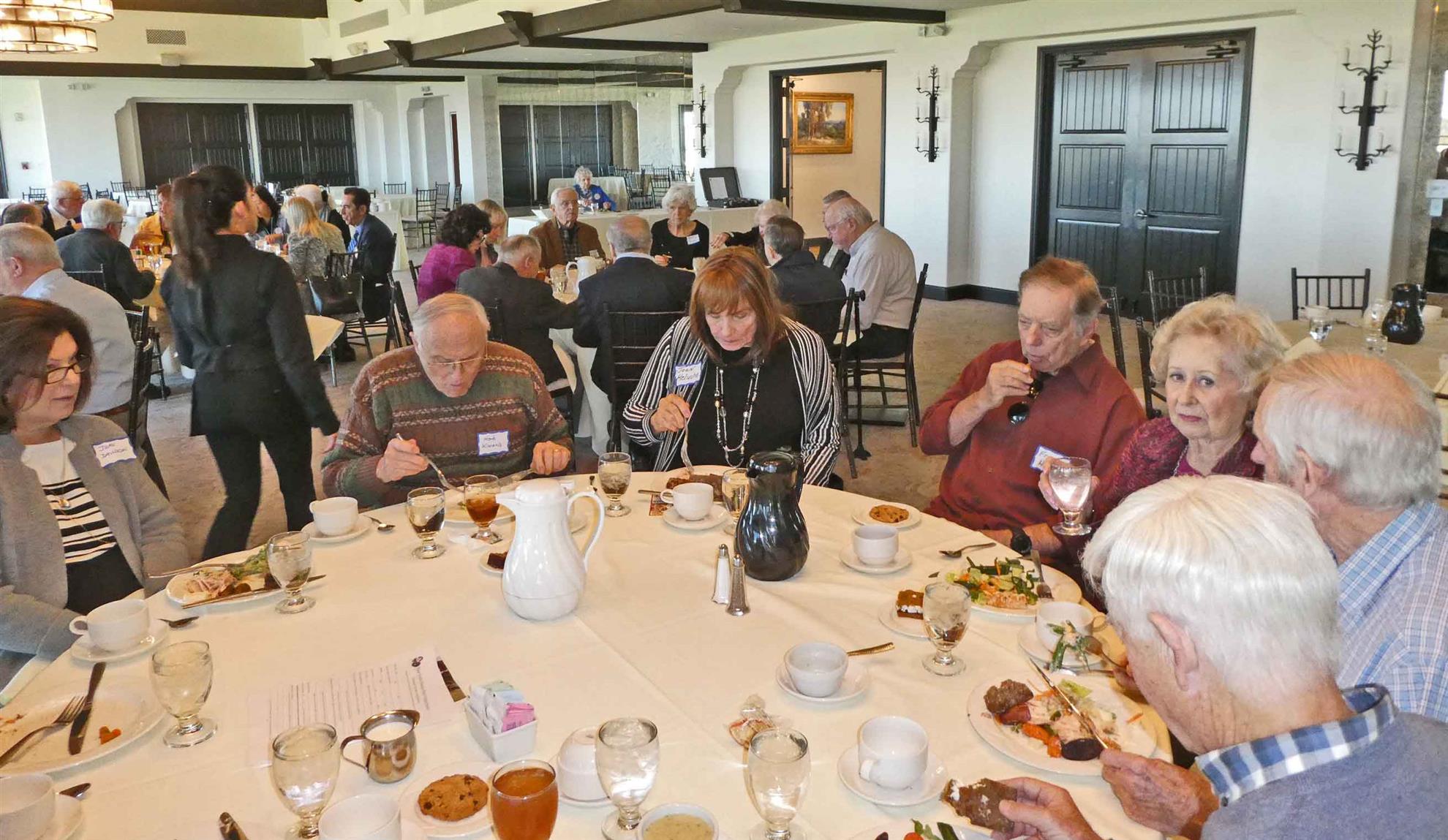 The 4 Palos Verdes Service Clubs met together at the Palos Verdes Golf Club for lunch, and each reviewed their service activities: The RHE Kiwanis Club awarded 25 student scholarships, gave out student back-packs, sponsored a Children’s Christmas party at the Boys & Girls Club, sponsored the PV Half-Marathon, and participated in the Food Bank. The PV Lions Club had a golf tournament fundraiser, “Swing for Sight”, and collected glasses for needy people. They read to elementary school children to encourage reading skills, and sponsored a runners’ Turkey Trot fundraiser. PV Sunset Rotary Club: President Karla Munguia reviewed our youth activities including scholarships, Project EGO to help high school students in danger of not graduating, and the international Japanese Peace Program at Peninsula High School for preventing future conflict. |
Rotary Youth-Protection Training, Kevin MacDonald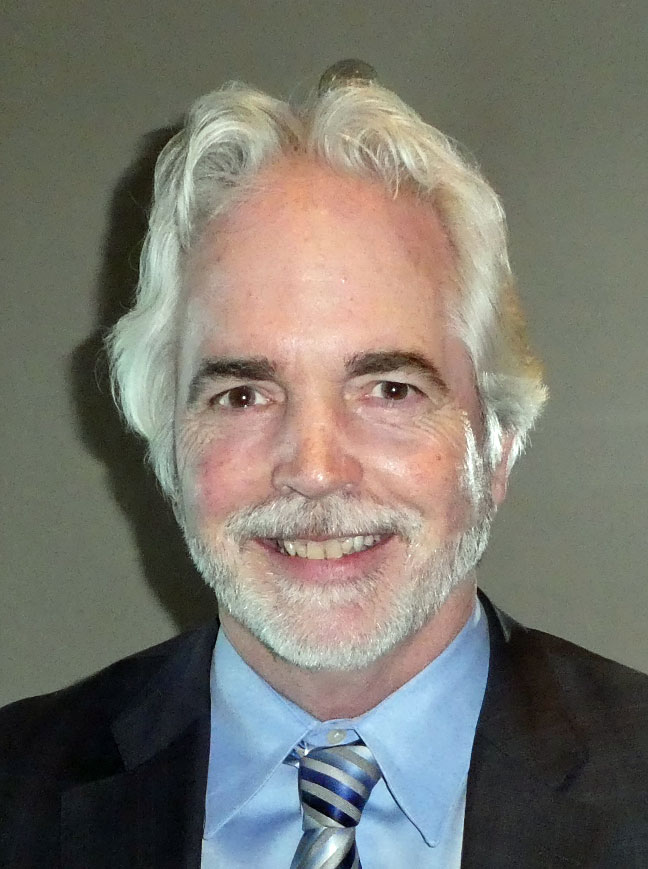 Kevin MacDonald, of the Santa Clarita Valley Rotary Club, is the District 5280 Senior Assistant Governor for Risk Management. To protect Rotary and youth from risks of potential abuse or perceived/alleged abuse of minors in Rotary programs, and because of publicized cases in other organizations, Rotary now requires a risk management training program and background check for every Rotarian who works with youth in Rotary programs. This process is required every 2 years for any Rotarian involved in any outside activities with youth present, other than in a formal Rotary meeting. (For Youth Exchange people, this is required every year.) Rotarians can register online and do a 45 minutes online course at www.surveymonkey.com/s/D5280YouthApp2015, & can arrange a background check at https://RYEd5280.volunteerportal.net (do not use “www”). Kevin handed out print-outs of his slides as educational material for the Rotarians present. A “Live Course” presentation in a Club meeting can also qualify. The purpose is to protect youth by preventing all forms of physical, sexual, or emotional abuse, neglect, or harassment of children, and to recognize it and properly report it (without accusing anyone). Any adult with an allegation must be removed from all contact with youth until resolved, and all allegations (without making accusations) must be reported to law enforcement authorities to determine validity. Any member with confirmed allegations must be terminated from Rotary membership. |
Club Assembly, Pres Karla Munguia President Karla urged all members to contribute time and effort to make our projects more successful. (This is the last Club Assembly of this Rotary Year.) Makiko Nakasone reviewed the Global Peace Project Teacher Orientation at PV Peninsula High School (600 Cloyden Rd in PVE) on Wed, Jan 29, 7:45-9 AM, with assistance and Club representation by PV Sunset members. Signed up so far are Jackie Crowley, Audrey Dahlgren, Charley Ferraro, David Moyers, Chase Thacker, and Sue Tyree. Sign up to attend the Joint Meeting of the PV Sunset and PVP Peninsula Rotary Clubs, the PV Lions & PV Kiwanis Clubs will be at the PV Golf Club at noon on Friday, Feb 7. (Our Feb 4 Tues evening meeting will be DARK.) This is an opportunity to coordinate community service activities with other Clubs. Chase Thatcher reviewed the focus of Club projects for the 2020-2021 Rotary Year. Selection of PV Sunset Board Members for the 2020-2021 Rotary Year was discussed. Charlie Ferraro solicited and received contributions for $100 for our Club Charity Account. Steve Johnson, Jackie Crowley, and Sue Tyree spoke on Club activities. |
YMCA, Jennifer Sullivan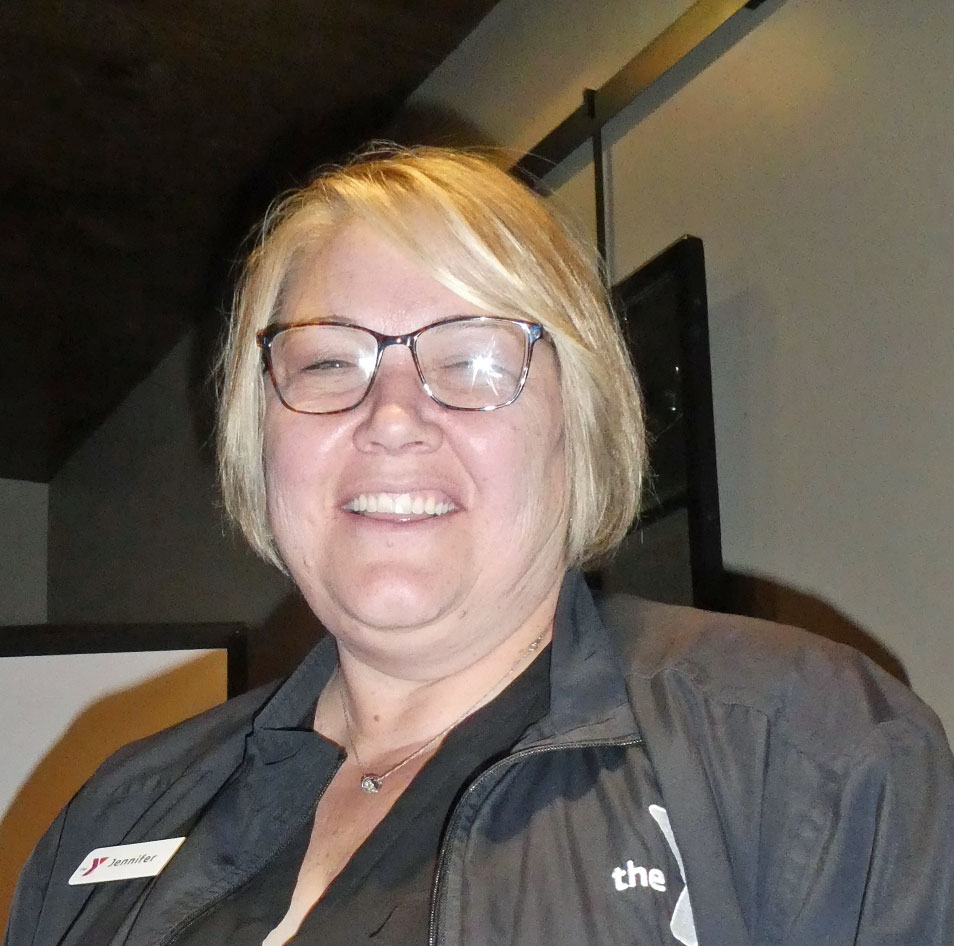 Jennifer Sullivan is the Treasurer of the Palos Verdes Peninsula Rotary Club and lives in Huntington Beach. She is Executive Director of the San Pedro & Peninsula YMCA (310 Bandini St in San Pedro; www.ymcaLA.org/san-pedro-peninsula ), one of 30 YMCA centers in the Greater Los Angeles Area. She reviewed the many programs of the “Y”, and showed a video of YMCA activities. A major program is the Model United Nations (MUN) for 6th-8th graders to gain leadership experience, learn about global issues, and meet new friends. The MUN program includes meetings Wednesdays 6-7:30 PM at the local YMCA plus a weekend training conference and a 4-day MUN summit. Other programs include summer day camp, youth & child activities, after-school programs, mentorship, health and exercise classes (from junior swimming to arthritis, balance & mobility), family activities & camps, basketball, soccer, volleyball & other sports. A new program guide for this year is being published. The YMCA has completed recent facility improvements including swimming pool & exercise machines in its 64,000 ft2 San Pedro health & wellness facility. Its strategic plan includes promoting child & youth development, healthful lifestyles, and social responsibility (volunteerism, financial support, & National Clean-Up Day). Its values include demonstrating honesty, respect, responsibility, & caring. Volunteers and donations are always welcome and needed. |
Bernie Stafford, Warfighter Advance Program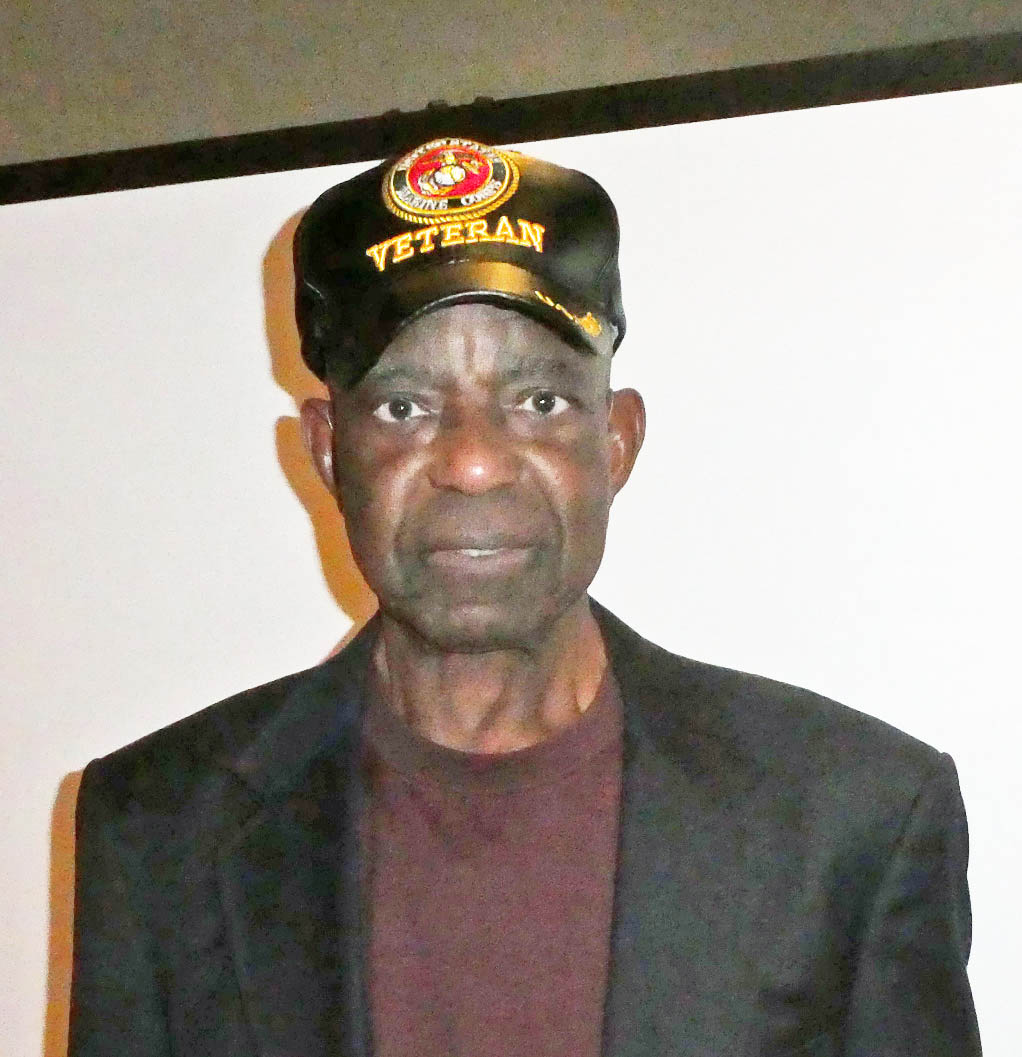 Bernie Stafford and his wife Chris are past members of our Rotary Club. Bernie has been active in the Warfighter Advance program, founded in 2003 to help traumatized combat veterans to re-adjust to civilian life. Many of them returned with “invisible injuries” such as toxic chemical exposures, Post-Traumatic Stress Disorder (PTSD) and Traumatic Brain Injury (TBI). They can become trapped in an endless cycle of mental illness diagnoses and medications, medical appointments, and frustrations, sometimes ending in suicide. Warfighter Advance is led by a diverse core team of professionals. It welcomes Warfighters who are struggling to reintegrate successfully back into society, regardless of service branch or dates or combat theater served. Warfighter Advance raises 100% of participant costs through 501 (c) (3) donations. The organization rejects “mental illness” labels and the use of psychiatric medications, which can have devastating implications. The International Society for Ethical Psychology and Psychiatry (ISEPP) is a strategic partner of Warfighter Advance, advocating against conventional overuse of psychiatric medications and institutions. The book Mental Health Inc, (c) 2017 by Art Levine discusses this issue, and Bernie points particularly to Chapter 8. |
Holiday Party, Dec 17, 2019Christmas Party: 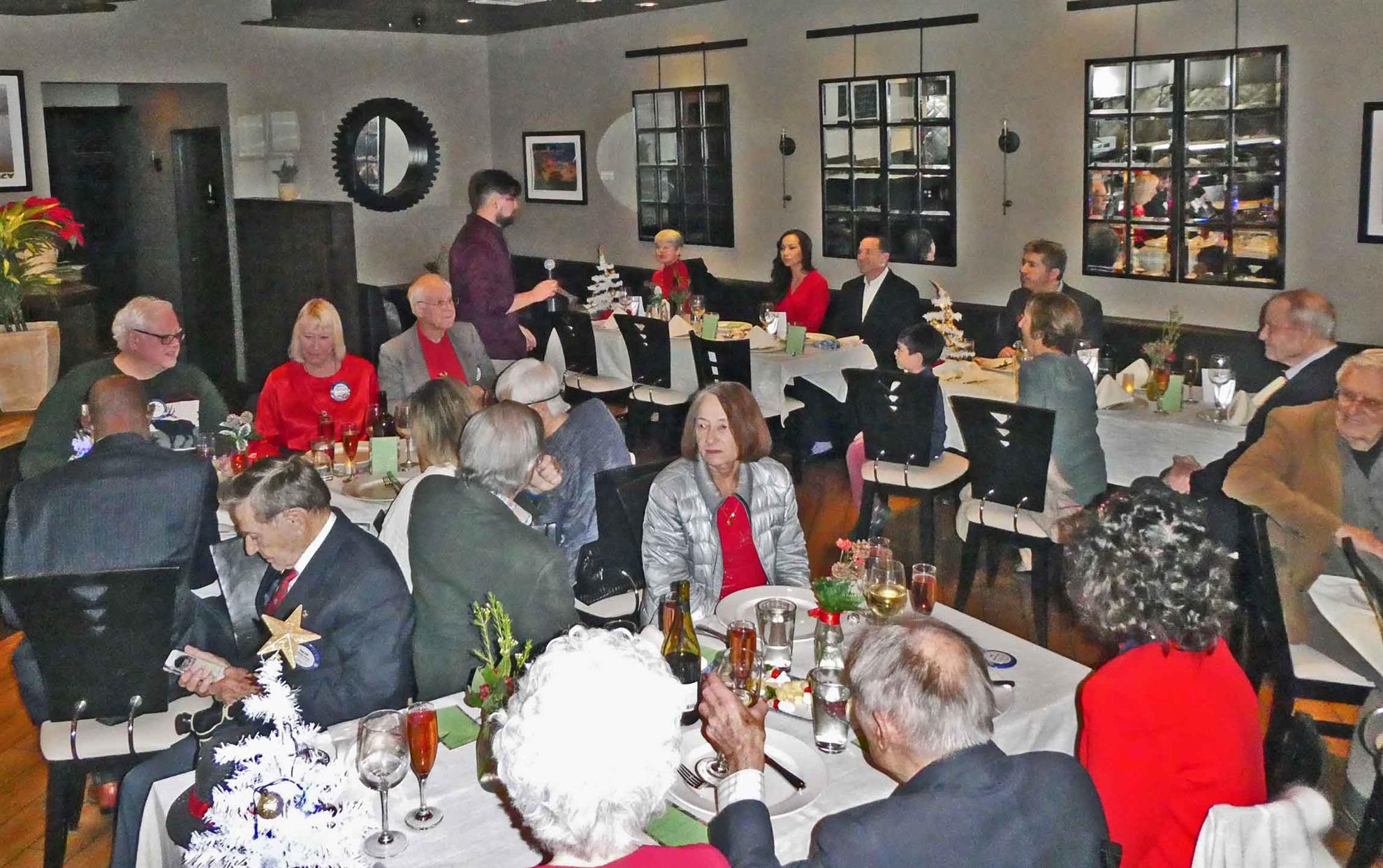 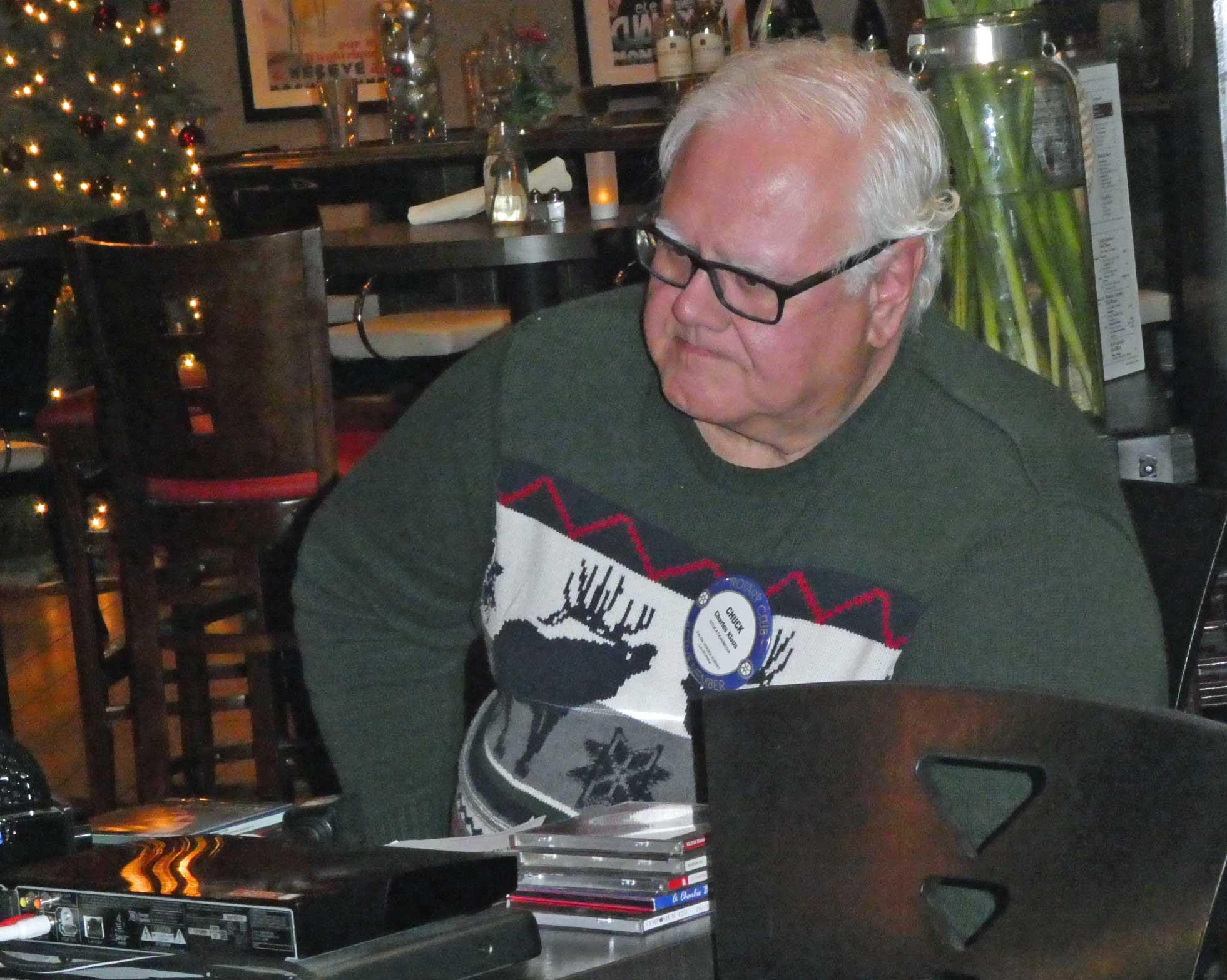 We had our annual Holiday Party at the Crème de la Crepe Restaurant on Dec 17. Our resident "DJ" and music connoiseur, Chuck Klaus, provided appropriate background music.
|
South Coast Botanic Garden’s Current Projects, Danielle Brown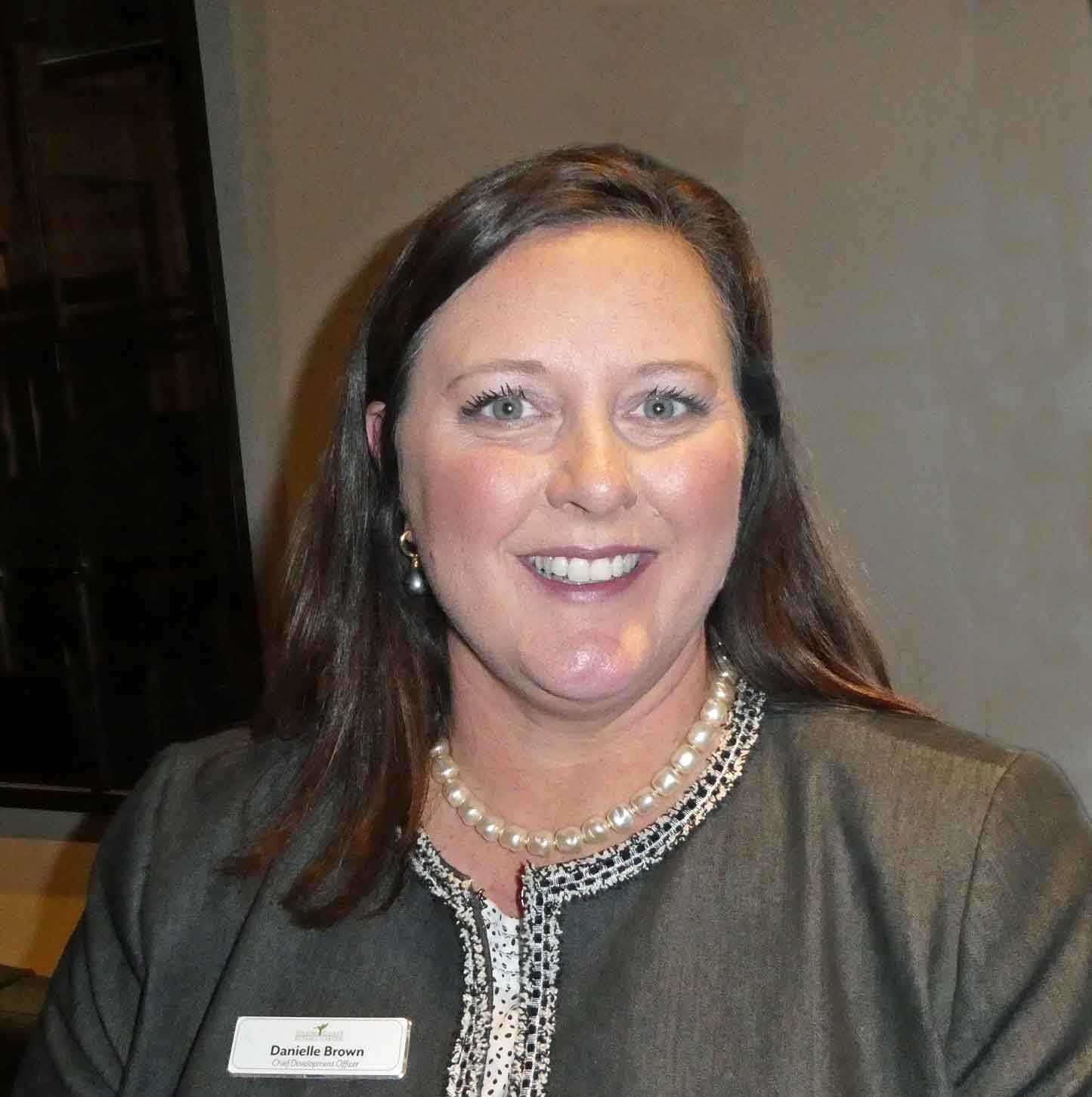 Danielle Brown joined the South Coast Botanic Garden in 2017. She is the Chief Development Officer, in charge of fundraising, marketing, guest services, programs, education and special events. The Botanic Garden is supported by the South Coast Botanic Garden Foundation, which operates the Guest Services Center and manages educational programs, venue rentals, and on-site filming coordination. In the early 1900s, this area was mined for diatomaceous earth, and then bought by Los Angeles County for a garbage landfill. When it was full, it was capped and converted into the South Coast Botanic Garden. The Botanic Garden has an ongoing Vision Plan for further development. Danielle encourages visiting to see the new changes and activities. She described the new features, such as the new 2-acre Rose Garden area which will reopen in March when the roses start to bloom. Improving the children’s garden and the native plants garden are pending. Many new activities are scheduled in the Botanic Garden. An Art Festival was hosted in April 2019, and a series of art classes will be presented in Jan & Feb 2020. Danielle showed where new donated sculptures have been placed in natural settings throughout the Garden (supported by the Long Family Foundation, Marylyn & Chuck Klaus, and other donors). |
Student Music ContestThanks again to Audrey Dahlgren for recruiting this fine group of music contestants. Each was introduced, along with attending family members, and each presented his musical history. All contestants demonstrated outstanding musical talent. The Judging Committee, led by Chuck Klaus, carefully considered the merits of each player, and decided on the following order of awards:
Congratulations to our First-Place winner, Sean Wilson, who will represent PV Sunset Rotary Club at the District 5280 Pageant of the Arts Contest at Loyola Marymount University on March 14. The District winner will be invited to perform at the District Conference Apr 30-May 3. Our thanks to all .jpg) of these fine students and their families for their hard work in preparing for and presenting at this event! of these fine students and their families for their hard work in preparing for and presenting at this event!Contestants: Sean Wilson, Anthony Yoon, Yaseen El-Magharbel, Charley Kim |
Future of LAX, Stephanie SampsonStephanie Sampson is Director of Communications for LAX “Landside Access Modernization Program”, for .jpg) improvement of passenger access to the Los Angeles Airport. LAX had almost 90 million passengers in 2018 and is in a $14 billion capital improvement program including $5.5 billion for reducing traffic congestion and improving passenger experience and regional transportation interconnections. improvement of passenger access to the Los Angeles Airport. LAX had almost 90 million passengers in 2018 and is in a $14 billion capital improvement program including $5.5 billion for reducing traffic congestion and improving passenger experience and regional transportation interconnections.There will be an elevated 2.25-mile Automated People Mover (APM) train in the center of the airport from the International Terminal eastward (see diagram), connecting by walkways to the other terminals. Then it will continue eastward to the Intermodal Transportation Facility-West (ITF-West) at W 96th Street (with short- & long-term parking), then to the Airport-Metro Connector (AMC) Station at 96th and Aviation Boulevard, and finally to the Consolidated Rent-A-Car Facility between Aviation and La Cienega Blvd. The APM system will have train maintenance and storage facilities with 24/7 staffing. The ride duration will be 10 minutes end-to-end, with 200 passengers per train with luggage, and frequency every 2 minutes during peak hours (9 AM-11 PM). There will be no cost to passengers. This contract is a public-private partnership for design, building, finance, operation and maintenance. The airport terminals will have 6 “Vertical Cores” for connecting passengers at the different levels to ticketing, baggage claim, security and the APM trains. Construction completion is expected by the end of 2021. The Consolidated Rent-A-Car Facility will have direct connections to the APM and the 405 freeway. The Metro connections are expected by 2023, and the Crenshaw/LAX & Green Lines will connect to LAX by shuttle from Aviation and Century Blvd in 2020 until the Metro connections are complete. .jpg) |
Palos Verdes Peninsula Land Conservancy, by Susan Wilcox.jpg) Susan Wilcox is the Director of Development at the Palos Verdes Peninsula Land Conservancy, founded in 1988. Its mission is to preserve lands as open space and to restore habitat for historical, educational, ecological, recreational and scenic purposes. It has successfully preserved 1,600 acres of open space on the Palos Verdes Peninsula, and restores and maintains 25 additional acres every year, in coordination with the city of Rancho Palos Verdes. It operates 2 Nature Centers, at George F Canyon and at White Point, and brings 3000 children from local schools each year for science education. A set of Native Bird Greeting Cards is available for $20. Palos Verdes is a global hotspot of “Mediterranean climate zones” for some species found nowhere else. These include coastal sage scrub (more than 85% already lost), Cactus Wrens and Palos Verdes Blue butterflies. Conservation is challenged by competition from invasive non-native species brought in by humans, such as ice plant, mustard, acacia, tumbleweed, castor bean and fennel. Acacia trees are adapted to desert environments and remove water needed by native plants, and 90% of the plant is dry with many seeds which explode when burning (a hazard in fire season). The Land Conservancy grows 50,000 plants each year, and plants 20,000 per year in restoration projects. She showed before-&-after views of degraded, damaged or destroyed ecosystem land that has been recovered. These areas are monitored annually to document habitat and rare species recovery. Goats are now used in appropriate areas to clear unwanted vegetation (they will eat almost anything!). You can sponsor a goat for $100. There is a monthly Nature Walk every 2nd Saturday (RSVP at pvplc.org or 310-541-7613. Volunteers are always needed. New trail signage is being installed for interpretive and regulatory information for visitors (watch for it on your next visit). She cautions against using trails after rain (which helps plants but damages trails and promotes erosion from foot traffic — watch for restrictive notices). Dogs must be leashed to avoid accidentally destroying sensitive wildlife and birds’ nesting sites. |
Ports O’ Call Project, Mike Galvin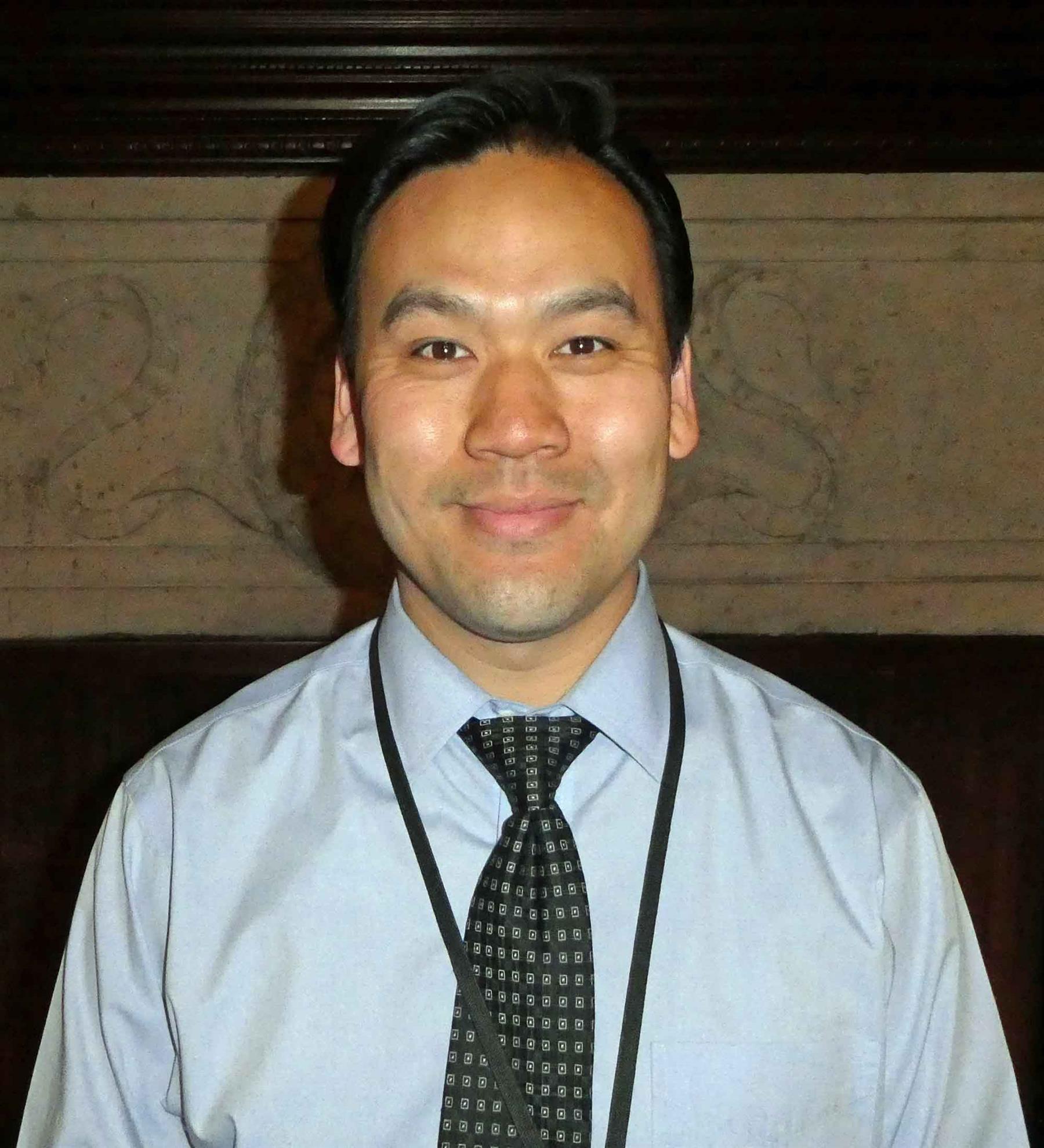 Mike Galvin grew up in Montebello and Pasadena, went to college in San Diego, and then started working for the City of Los Angeles where he is the Director of Waterfront and Commercial Real Estate in the Ports O’ Call area. (His father was a Rotarian.) He reviewed the status and controversies of this ongoing development. Smaller shop owners in the Ports O’ Call area were cleared out by early this year, and the larger restaurants were ordered to be out by March 1. Much of the demolition has been completed, leaving the 2-story Ports O’ Call Restaurant still standing and open for business. At a public meeting March 20 at the Warner Grand Theater, some business owners questioned why they were not offered relocation fees to move into the downtown business district. The popular Ports O’ Call Restaurant fought its eviction and demolition, but lost recently in Los Angeles Superior Court. Mike presented a video of the 3-phase LA Waterfront development process. He showed architectural depictions of the various areas along the waterfront including pedestrian and vehicular traffic and anticipated businesses. The design is intended to attract investors, businesses and visitors. $600 million has been invested, with $400 million more by 2025. Harbor Boulevard is being realigned. Phase 1 will open in 2020. |
Project EGO, Lew Bertrand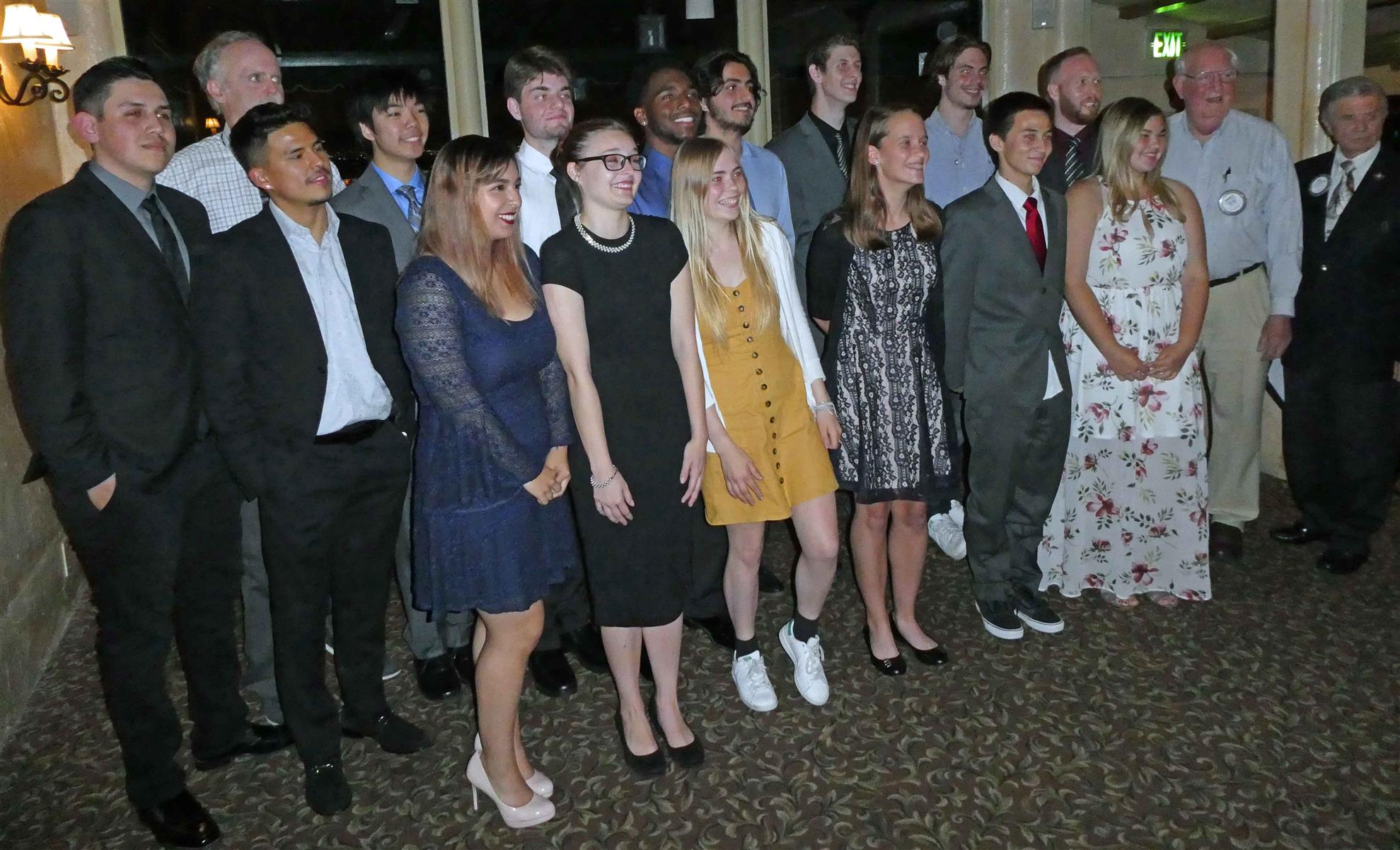 Our Project EGO Director, Lew Bertrand, updated us on this year’s Project EGO class, and the Leadership Training exercises on cable. The students learn to trust each other’s support on this physically demanding course at the end of their year. He introduced the attending school officials, and Robert Babb who is managing the program. Robert Babb described the struggles and progress and maturation made by the students during this year, growing in confidence and social skills. Then he introduced each of the 14 students, describing their struggles and accomplishments, and announced their scholarship award amounts, ranging from $500-$2800. |
Students of the Year Awards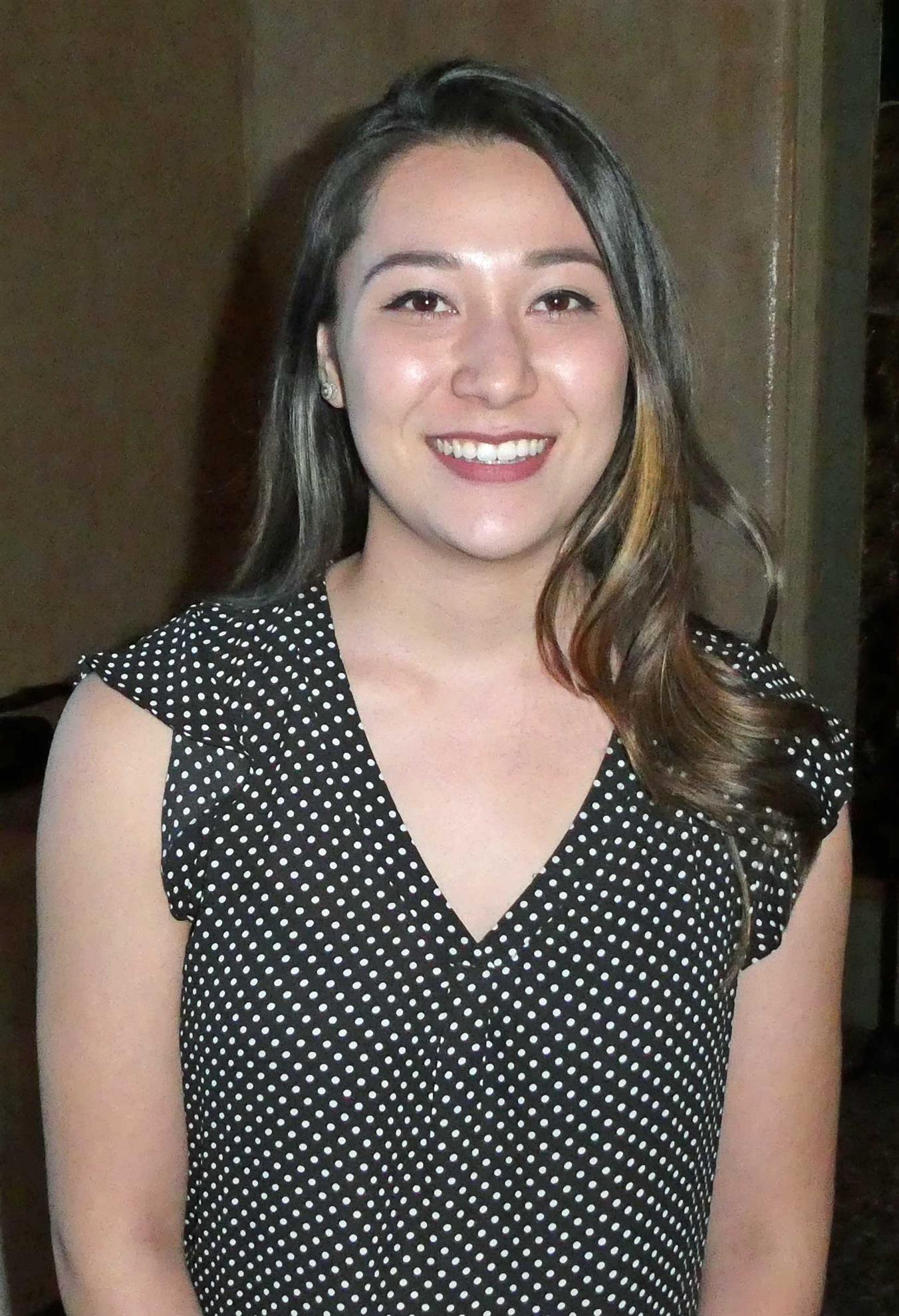 Dominique Alvarez, Senior & Rotaract President at Marymount, was awarded a $1000 check from our Club. Her leadership in Rotaract activities this academic year was commended by our President Jon Caplan. Teresa Hoffman, PVHS Liaison for Financial Aid & Scholarships, and Joanne Lewis, PVHS Director of College & Careers, described the academic and activities achievements of Palos Verdes High School Student of the Year Austin Nash (who was unable to be present but was represented by his parents, William Nash & Irene Powell). He plans to attend the University of Colorado at Boulder. Austin’s parents, Irene Powell & William Nash, read a statement from him expressing appreciation for his award. He was awarded a $1000 check from our Club, to be presented to him at the PVHS Awards Ceremony. |
Ten Tips for Better Photography, Jon Caplan.jpg) President Jon's Safari business in East Africa has resulted in many good wildlife photos by himself and his clients. He reviewed his favorite principles on improving photo results: 1. Take a picture of “something” (an intended object of interest to the viewer, to attract the viewer's focus). 2. Rule of thirds: divide picture into thirds both horizontally and vertically, and position the object of interest on the dividing lines or at their intersections. 3. Control your frame, avoiding distracting background objects; look at the entire framed area. 4. Get multiple shots, for better selection afterward (avoid bad facial expressions or other distractions that may spoil picture quality). 5. Choose your lighting: bright light at high noon causes washed out bright areas and dark shadows in shady areas, losing detail. Softer lighting occurs during the “golden light”, in the first hour after sunrise and in the last hour before sunset. Look for even lighting, often in open shadow during daytime so the camera adapts to the shadow lighting and not to a bright background. 6. Avoid backlight (brighter lighting in the background that causes underexposure in the subject of interest in the foreground), unless using fill-in flash to light up the foreground (if close enough to the camera for effective flash lighting). 7. Keep subject in sharp focus, including avoiding motion blur (flash can stop motion if close enough to the camera). 8. Delete poorer quality photos (from multiple shots to provide good selection). 9. Crop photos to remove distracting and irrelevant clutter around the point of interest; photograph a large enough frame to be able to crop without cutting off the original image. 10. Consider a DSLR camera for good control of a variety of photographic situations. |
Uganda Global Grant Project, Marsha Hunt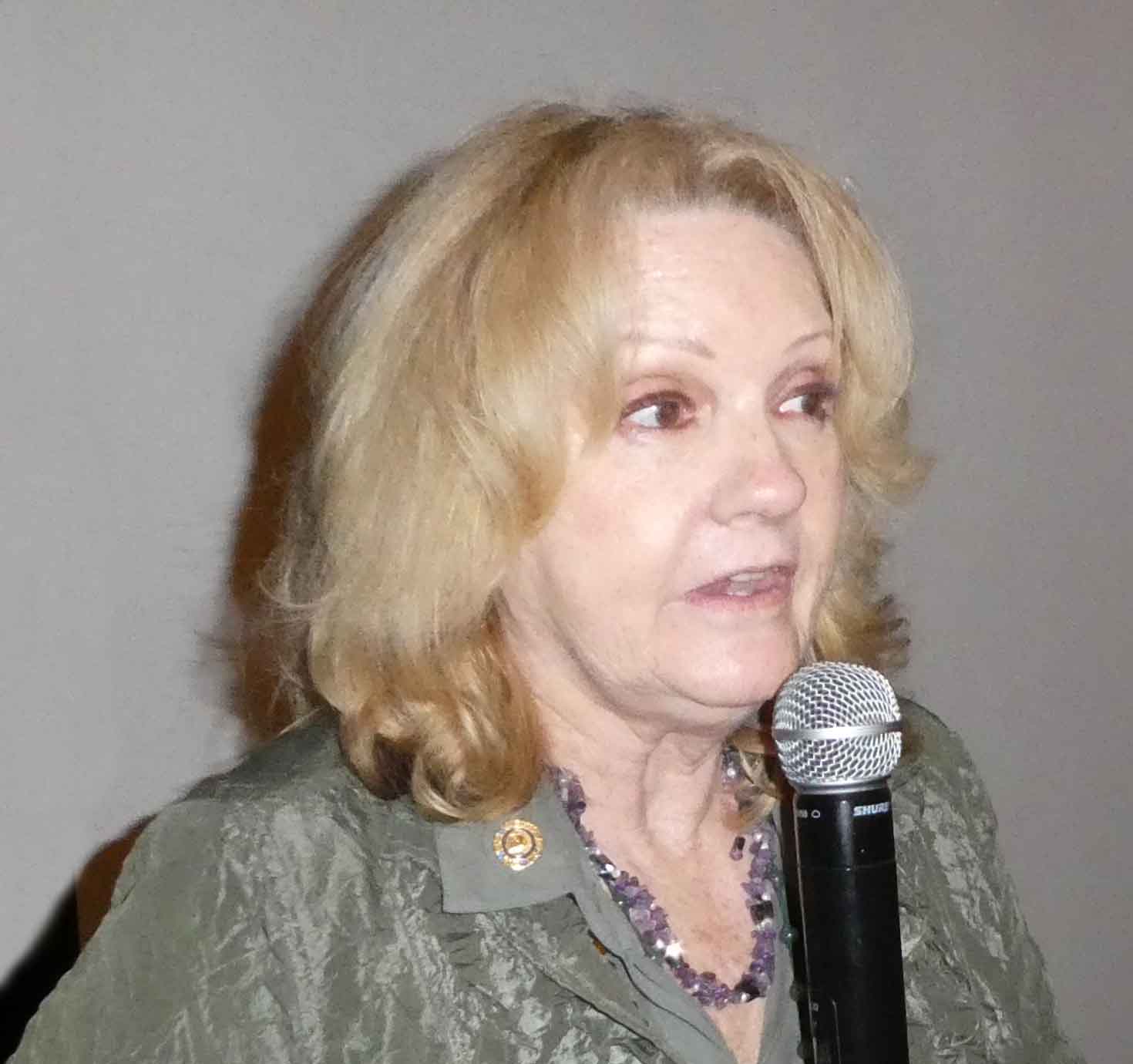 Marsha Hunt is a member of the Westwood Village Rotary Club. Her Club is in partnership with the host Kabale Rotary Club in Uganda to promote Maternal and Child Health facilities in a remote area damaged by war and flooded with refugees from the violent “Lord’s Resistance Army” (LRA). The LRA leader, who proclaims himself the “spokesperson” of God, has been waging a guerrilla campaign since 1987 to overthrow the Ugandan government and establish a theocratic state based on the "Ten Commandments and Acholi tribal tradition". The LRA has been accused of widespread human rights violations, including mutilation, torture, slavery, rape, kidnappings, use of child soldiers, and massacres. There is still low-level LRA activity in Uganda and neighboring countries. Rotarians have been helping since 2004 to build and upgrade school buildings, restrooms, sports facilities and safe water projects as part of the Uganda Development Initiative (www.UDIworks.org) in Los Angeles. They have been buying goats and promoting self-sustaining farming for refugee families, growing coffee, tea and fruit trees for food and income. Many of the buildings were built of dried mud held together on sticks, which crumble when it rains. Rotarians are sponsoring children for school expenses and building a clinic and small medical center. They are working with Project Cure in Colorado to evaluate the medical needs and ship a container of medical equipment including an ultrasound machine. Doctors from the Rotary Club of Memmingen in Germany are completing a new surgery center there. Solar power generation is also being installed. |
District 5280 Humanitarian Projects in Colombia (Wes Bradford) 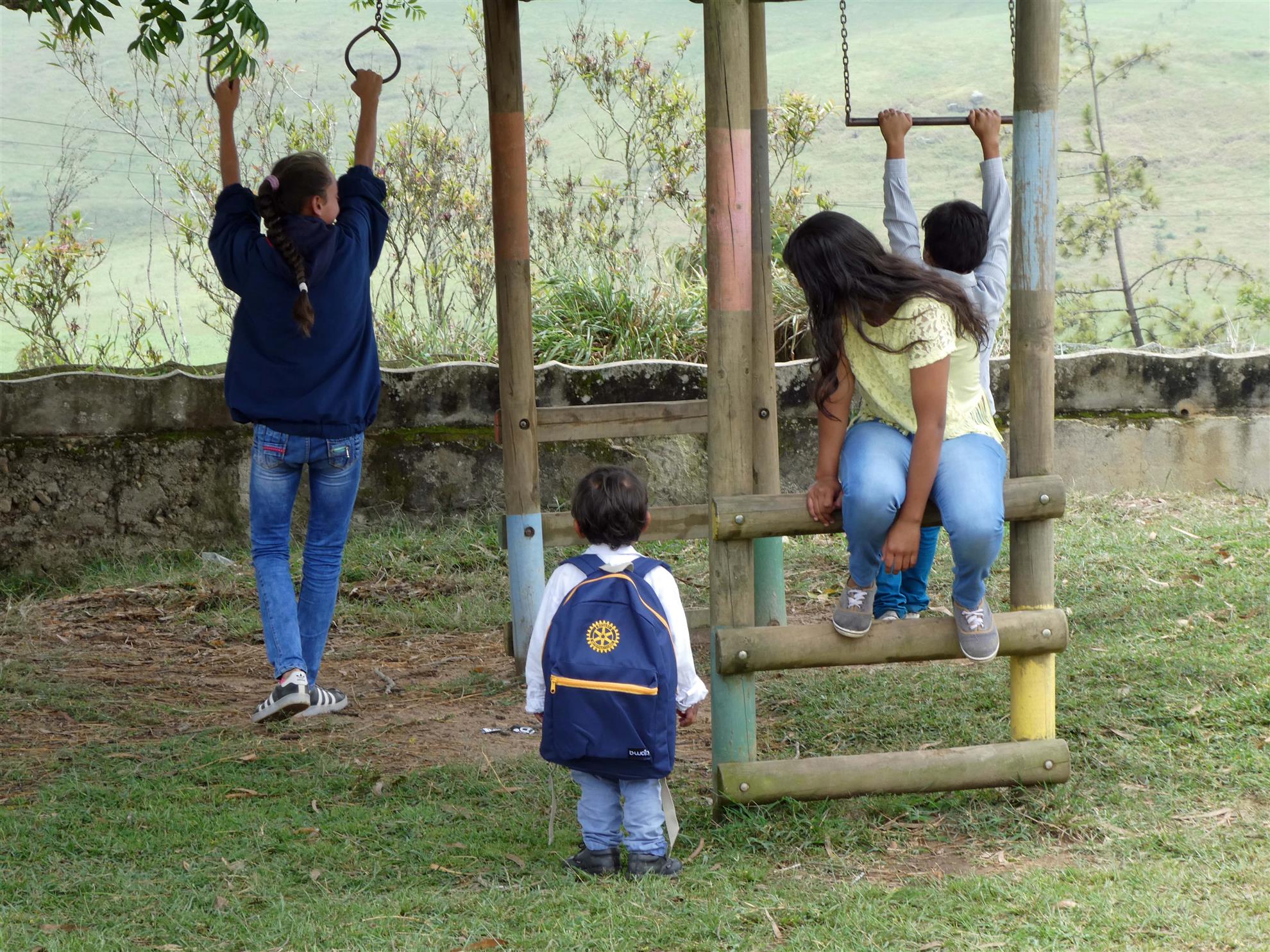 Wes Bradford showed photos from the 2018 District 5280 Humanitarian Trip to Columbia. They visited projects in Bucaramanga (March 21-26) and in the capital, Bogotá, March 26-30, hosted by Colombian Rotarians. The projects were widely dispersed, especially those with Global grants, so they visited those with short driving distance while other projects were presented to them in the city by the local Rotarians. Bucaramanga is in the northeastern part of the country. The Rotarian projects there included water purification, sanitation, organic farming, painting and upgrading schools, providing school supplies and backpacks, providing soccer balls and athletic shoes, and oral hygiene self-care instruction. 450 backpacks, most of them funded by our Rotaractors, were provided to children in several schools. The children presented singing and dancing performances for the visiting and local Rotarians. The visitors enjoyed interacting with these children and with the local Rotarians who are very active in leading these projects. Safe water and sanitation are vitally important for reducing preventable infectious diseases in impoverished populations. The Rotarians visited a settlement of refugees from the Pacific coast drug wars area. These people often fled the violence on foot through the mountains, with their families and what little possessions they could carry on their backs. Thousands of them arrived with no food, jobs, housing or school facilities. Many of the coastal farm areas have been devastated by aerial spraying of coca fields with pesticide poisons, which persist on the land for years and increase the rate of cancer and birth defects. Starting over in a clean environment with organic farming practices is important for minimizing future health effects in these people. |
Disaster Aid USA, Tore Knos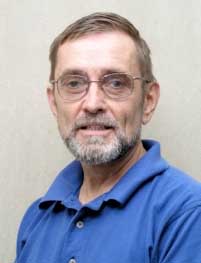 Tore Knos (rotarytore@gmail.com), of the Playa Venice Sunrise Rotary Club, is a board member of Disaster Aid USA, a Rotary project. He is a Past President of the North Atlanta Rotary Club. He has a PhD in Public Administration from the University of Georgia, and is also a certified master plumber (practical hands-on experience). He has traveled in Asia, Panama, Mexico, Sweden and Costa Rica, and speaks English, Swedish and Spanish. In 2013 he hiked the 2178 mile Appalachian Trail through 14 states over 5½ months as a Rotary fundraiser. Disaster Aid USA is a non-profit corporation established in 2010 in Washington, DC, by the former Central Maryland/Washington DC ShelterBox USA team. Its Board of Directors are all active Rotarians representing every Rotarian Zone in the US, 1/3 of them standing for reelection each year. Tore Knos represents Rotary Zone 26, as well as being a Disaster Aid Response Team member. Tore presented photos from his personal experience as a member of the Response Team in disaster aid work in South Sudan (refugees from ethnic cleansing warfare), Philippines (typhoon), and Malaysia (catastrophic flooding), illustrating the disaster conditions there and the Rotarian response delivering aid to these affected people. They provided Rotarian-designed disaster tents large enough for 10 people, plus water filtration and other emergency equipment and supplies to prevent infectious diseases and starvation where local infrastructure had been destroyed. Tore showed “Sawyer Point One” water filter bucket-adapter kit, packaged in a plastic envelope. These kits allow converting a bucket (not included) into a water filter with a 0.1 µm hollow-fiber membrane that can remove infectious viruses, bacteria and parasites (although not chemicals). The kit includes a drill to make a hole near the bottom of the bucket (allowing space beneath for sedimentation), and a water-tight adapter to fit a small hose from this opening to the filter. The filter is turned on by holding it below the bucket so that filtered water pours out, and turned off by hanging it onto the upper edge of the bucket. This bucket filter can be set up in minutes and can supply a household with safe clean drinking water, which is in scarce supply after a disaster. |
Tom Wynne, Craft Talk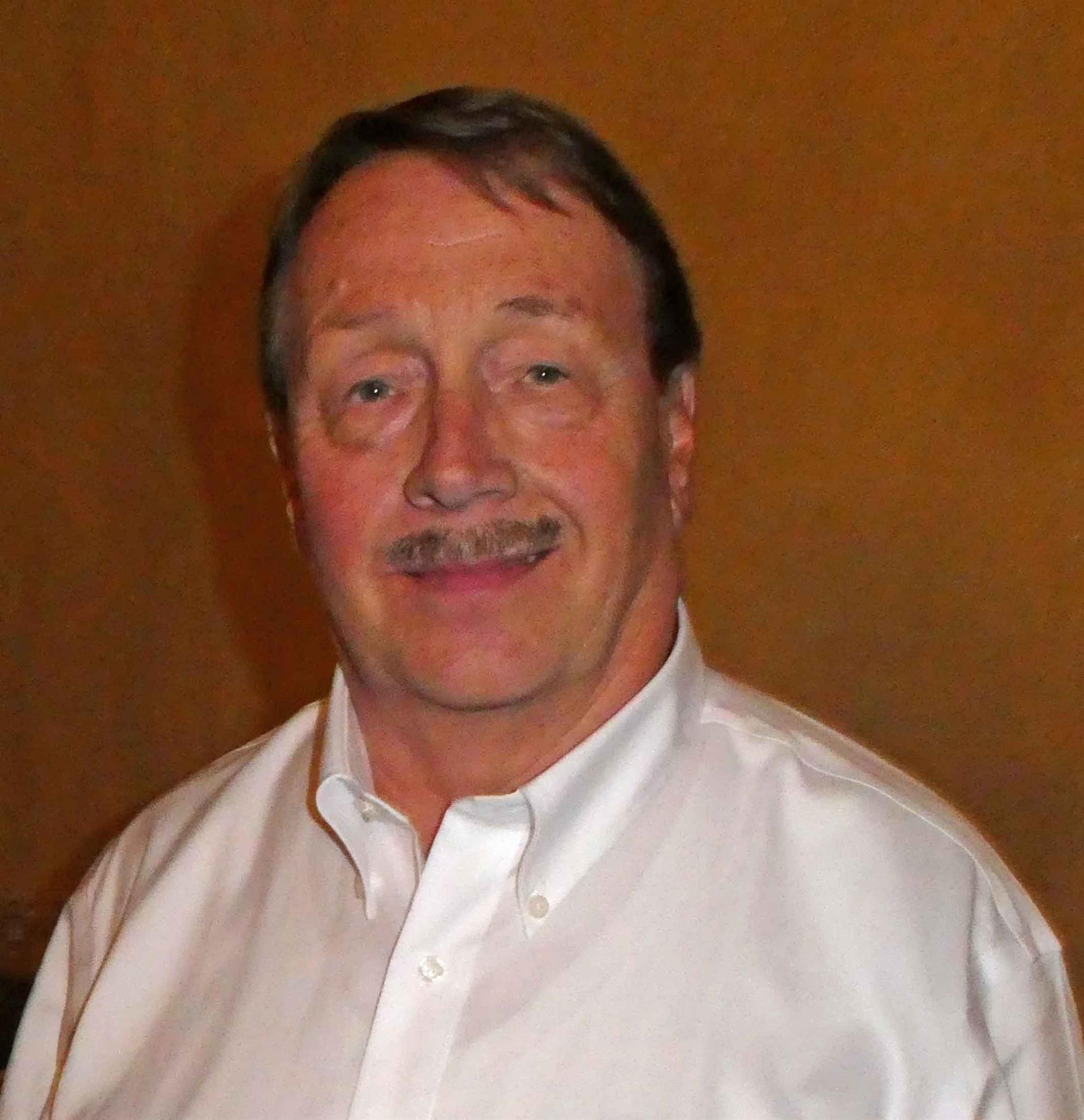 Tom Wynne, our newest member, works for the Torrance office of NAI Capital in commercial real estate sales and leasing. He and his wife, Cathy, have 3 children and 5 grandchildren. He remembers working in his father’s appliance store with his siblings, where they learned the importance of honesty, working hard, and respecting people. He attended an integrated high school in the turbulent early 1960s where they learned how to get along with each other. He worked through  college, learning to be self-sufficient, and graduated from Notre Dame majoring in Marketing Management and Finance. college, learning to be self-sufficient, and graduated from Notre Dame majoring in Marketing Management and Finance. |
Global Polio Eradication – Shirley Giltzow.jpg) Shirley Giltzow is the District PolioPlus Chair. She reviewed the progress of the Global Polio Eradication Initiative. In 1979, Rotarians began a multi-year polio immunization program in the Philippines, immunizing 6 million children there. In 1985, Rotary International President Carlos Canseco announced the PolioPlus program to control polio worldwide. Since then, the Rotary polio-immunization program has been joined by the World Health Organization, UNICEF, and the US Centers for Disease Control and Prevention. In 2007, the Bill & Melinda Gates Foundation offered Rotary a fund-raising challenge grant which has now grown to a 2-for-1 matching grant for polio. Nigeria has had no new cases in 2 years. The only remaining polio-endemic countries are Afghanistan & Pakistan (due to conflict), and only 5 cases have been reported there so far this year. Only Type 1 polio is still in circulation, with Type 2 eradicated in 1999 and Type 3 in 2014. 450 million children have been immunized by 150,000 workers, and $1.2 billion has been pledged. More funds are still needed to make the poliovirus extinct, so it doesn’t flare up and spread to millions again as in the past. Money is needed to survey people isolated in remote areas including in dangerous conflict zones, to detect new cases in persisting pockets for planning intensive focused immunization efforts, and to educate people there and promote vaccinations of vulnerable children. Maintaining continuing political commitment and financial resources to distribute vaccine is necessary to prevent worldwide spread by travelers including people crossing borders to escape conflict. |
The “Skunk Works” ‒ Designing Advanced Aircraft, by Tapio Kartiala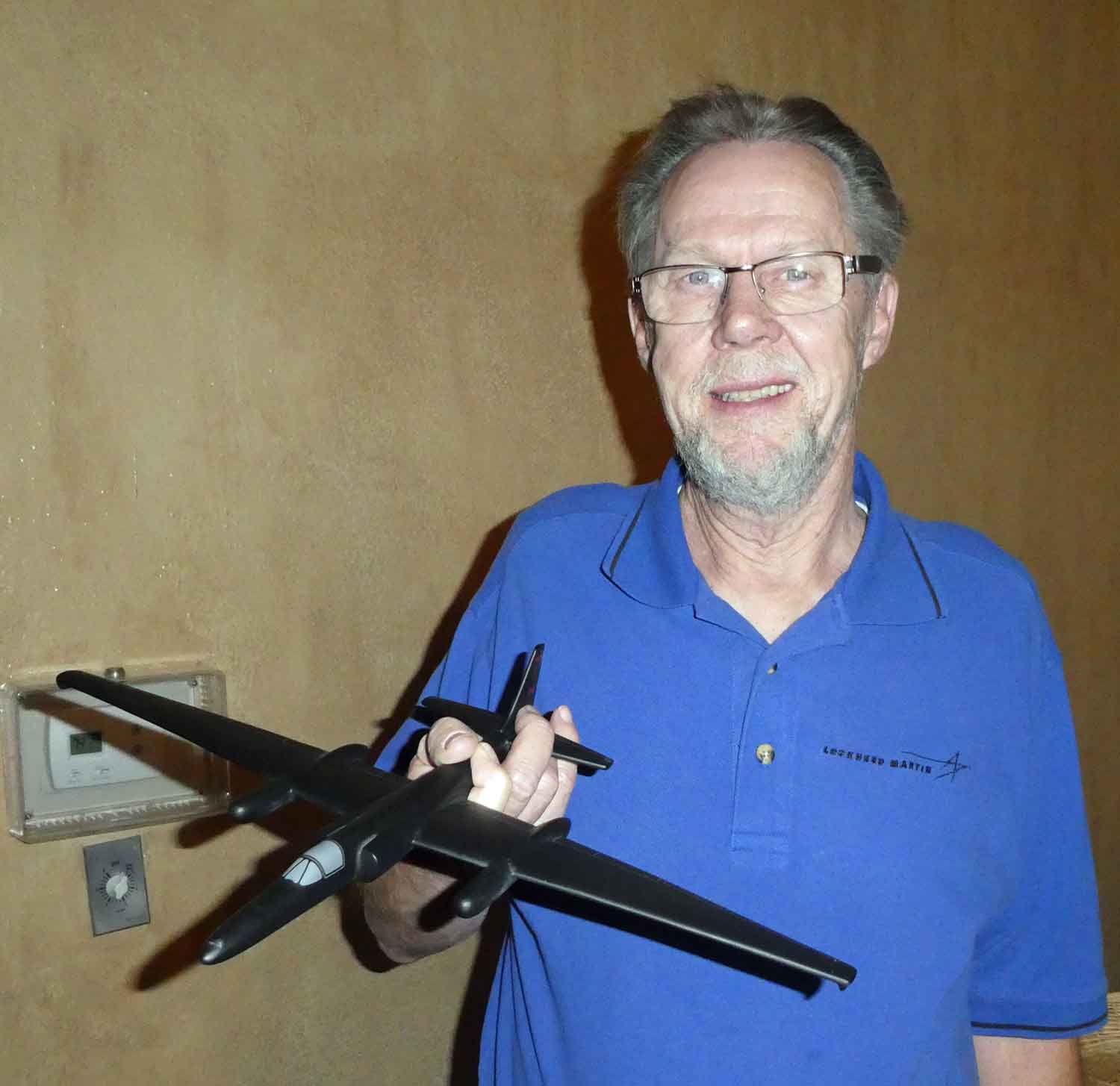 Tapio Kartiala is retired after over 45 years experience as an aerospace structural engineer. He presented his experiences in advanced aircraft design at the Lockheed “Skunk Works”. It was started in 1943 by Lockheed engineer Kelly Johnson when his company was asked to design a jet fighter to counter a rapidly growing German jet threat in World War II. One month later he hand-delivered a proposal and began work “on a handshake” (the formal contract arrived 4 months after the work had begun). His team designed and built the first XP-80 Shooting Star in 143 days, by “breaking the rules and challenging the bureaucracy”. The effort was top-secret and operated in a rented circus tent near a malodorous manufacturing area, so one of the engineers answered the phone as “Skonk Works” (from the “Li’l Abner” comic strip). The name “Skunk Works” was adopted as its trademarked designation for the advanced aircraft design unit, and it is still an active team of Lockheed Martin. Tapio outlined the process of new aircraft design, through the conceptual, preliminary, and detailed phases. The engineering constraints include the aircraft’s purpose, regulations, financial availability, and environmental and safety requirements. The work is divided into wing design, fuselage, propulsion, weight limitations, and structural strength. While a bridge is typically designed to sustain 5 times its expected maximum load, an aircraft is allowed only 1½ times its maximum expected aerodynamic loading, due to weight limitations. Tapio reviewed 3 aircraft. The U-2 spy plane was flown at 70,000 feet and could fly for 14 hours. At that altitude, a major design problem was preventing fuel evaporation from the low pressure at near-vacuum. It could fly higher than Soviet missiles could reach, until a newer missile design shot one down over the Soviet Union, with the pilot Gary Powers being held as prisoner until exchanged for a Soviet prisoner from the US 3 years later. The SR-71 Blackbird can fly at 80,000 feet and 2100 mph (almost 3 times the speed of a rifle bullet). It has never been hit by hostile fire because of its speed. It is made of titanium to sustain high surface temperatures (up to 400-1200°F during flight). It takes on most of its fuel in mid-air refueling because a full fuel load makes it too heavy for takeoff. (Engineers were still using slide rules when its design began.) The F-117 Stealth fighter has many flat surfaces at odd angles to confuse radar imaging, and also a special chemical coating to absorb radar signals. It is the stealthiest aircraft ever built. |
Mediators Without Borders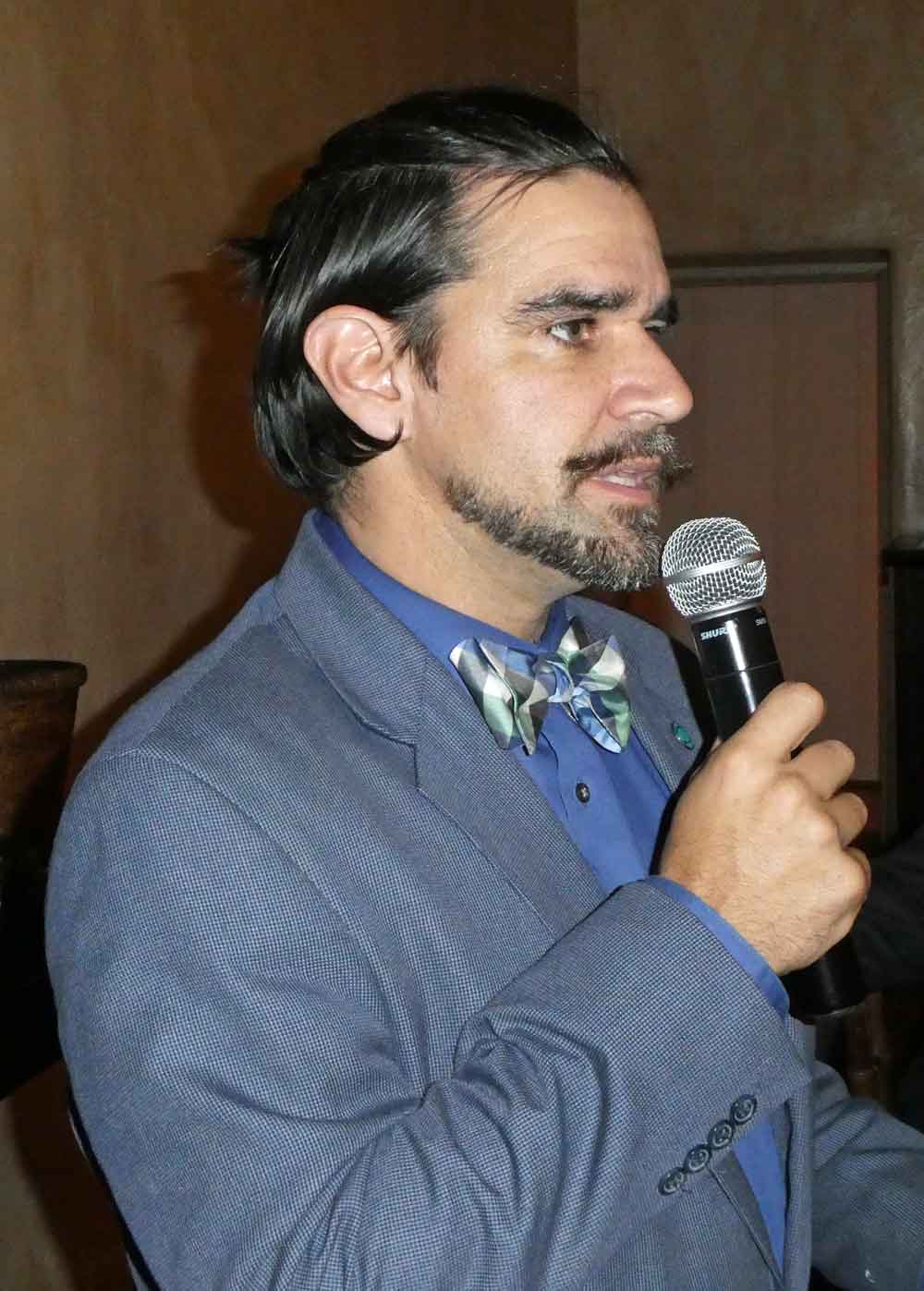 After a brief introduction by Rotarian Steve Goldsmith (Hawthorne Club), Mediators Without Borders Lead Facilitator Scott Martin began the presentation. He is a former landscape architect who is now working to mediate conflict (this is related to the biannual District Peace Conference). Tonight’s discussion was primarily about Human Trafficking, a cause promoted by District Governor Cozette Vergari. He reviewed how to have a peace conversation or dialogue. He compared dialogue to debate; debate is oppositional, with a goal to win, listening only to find flaws and refute arguments of the other side, reaffirming each side’s own point of view, and rarely resulting in apology or introspection. Dialogue is collaborative, working to develop a common understanding and working towards better solutions, enlarging and transforming both sides’ point of view, and encouraging apology and ongoing communication. The ground rules include respectful speech, approaching the problem rather than attacking the person, agreeing on conversation rules regarding how long to speak and how to be interrupted, and using first-person accounting. We don’t need to agree in order to listen. We need to listen for what we don’t know, not just confirmation of what we already believe. Separate the person from the problem, and bring service to the solution rather than listening and waiting to give advice. After this review, the meeting broke up into a separate group at each table, each with a facilitator and a notetaker. Human Trafficking was discussed, specifically about the problem of prostitution. Poverty and social stress often create potential victims who are often in their teens. They are tricked into working for someone and then find it difficult to get out as they are exploited, while the customers are typically unappreciative of the social implications, enabling the abuse. At the end, a report was provided from each table on the points discussed, followed by a conclusion and increased awareness of the problems and what Rotarians can do to help provide solutions. |
Chuck Klaus, Soundtracks in Movies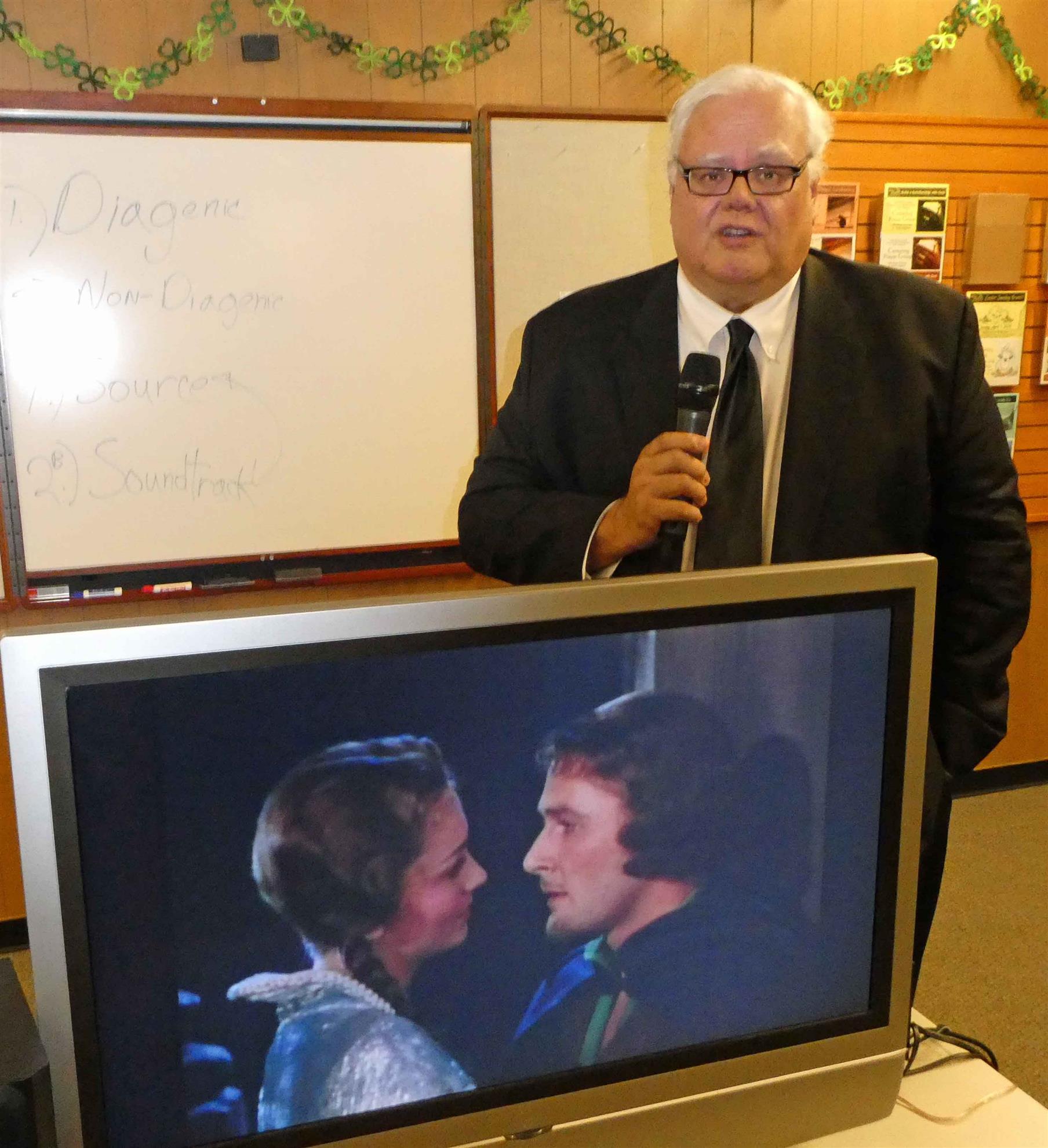 Our member Chuck Klaus majored in speech communications in college. He produced music programs for a radio station in Syracuse, New York, taught at the University there, and was a Drama and Music critic for the newspaper. He met his wife, Marylyn, at a concert there. When they married, he moved to California to be with her, and she brought him into our Rotary Club. Chuck described brain function as having separate storage areas for images and sound, which need to connect their pathways for association in memory. Original silent films were accompanied by live music in the theater, with music and instruments specified for each movie, using a theater organ or a small orchestra. In 1927, the sound of recorded dialogue and singing was first synchronized with the film action, and soon most movies were talkies. David Selznick made fancier films with more action and drama, producing “King Kong” in 1933 and “Gone with the Wind” in 1939. The sounds were recorded on the set with the action, and music scores were written while watching the film. Music for dramatic scenes was timed with the screen action, as Chuck illustrated with a sword-fighting video clip. In 1941, Orson Welles produced “Citizen Kane” (reportedly based in part on newspaper publisher William Randolph Hearst), which won many Academy Awards. (Welles had become famous for his dramatic 1938 radio broadcast of “The War of the Worlds”.) He was very difficult to get along with, and quickly “exiled” anyone who disagreed with him. Alfred Hitchcock, an English producer, produced “Psycho”, an American psychological horror film, in 1960, pushing the film boundaries for violence and sexuality. He reluctantly put music into his film. Separate film score albums became popular in the LP records era for marketing their movies, which were getting competition from television. Although separate movie soundtracks are just music, the actual soundtrack in the movie also includes the voice and sound effects. |
Juan Viteri, Craft Talk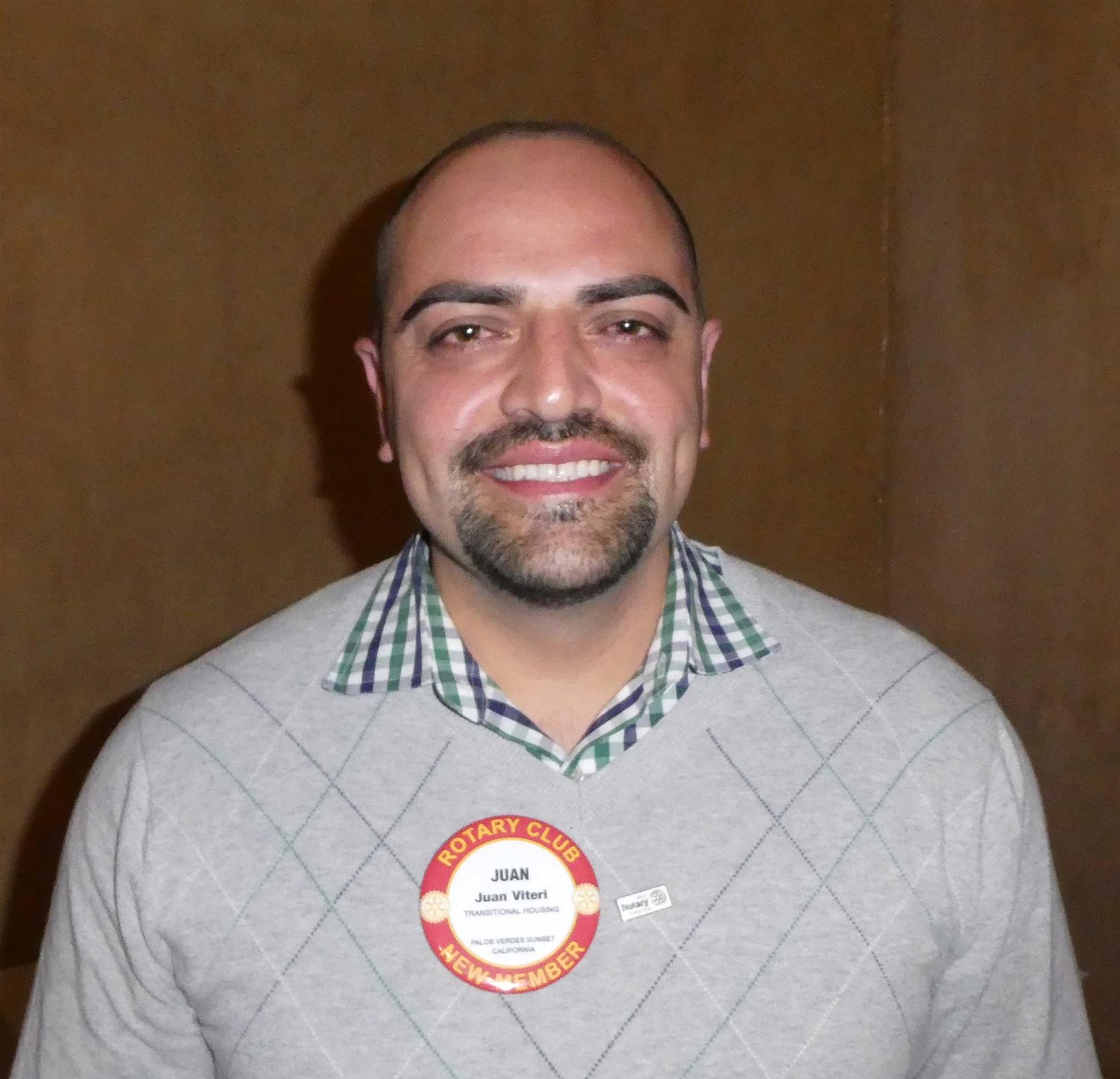 Juan Viteri, one of our Club’s newest members, was born in Quito, Ecuador. He described how encountering challenging circumstances in his early life changed his perspectives. At age 13, he had severe seizures, and was brought to the hospital, where neurologic studies showed 2 brain tumors. He was transferred to a military hospital for specialized care, and there he was told that he should go to the United States for the kind of surgical treatment that he needed. He came to the US at age 14, where he was helped by sponsors and underwent neurosurgery at Kaiser. Although he has surgical scars on his head, he survived the ordeal and recovered successfully. He and his sisters live in Long Beach. His father is deceased, and the family had to move repeatedly due to housing costs, finally moving into a mobile home. He began working in real estate, and was able to accumulate some housing properties, where he started helping other housing-affordability-stressed people in the community. With the help of some investors, he now has 35 housing clients in 3 homes in Long Beach. He wants to continue making a positive difference in the community, giving to others as had been provided to him at his time of greatest vulnerability. He heard about Rotary’s role in service to others, and began looking for an evening Rotary Club that he could attend after work. Palos Verdes Sunset provided what he was looking for, and we welcome his participation in our service projects! |
4-H Youth Development Program, Dee Keese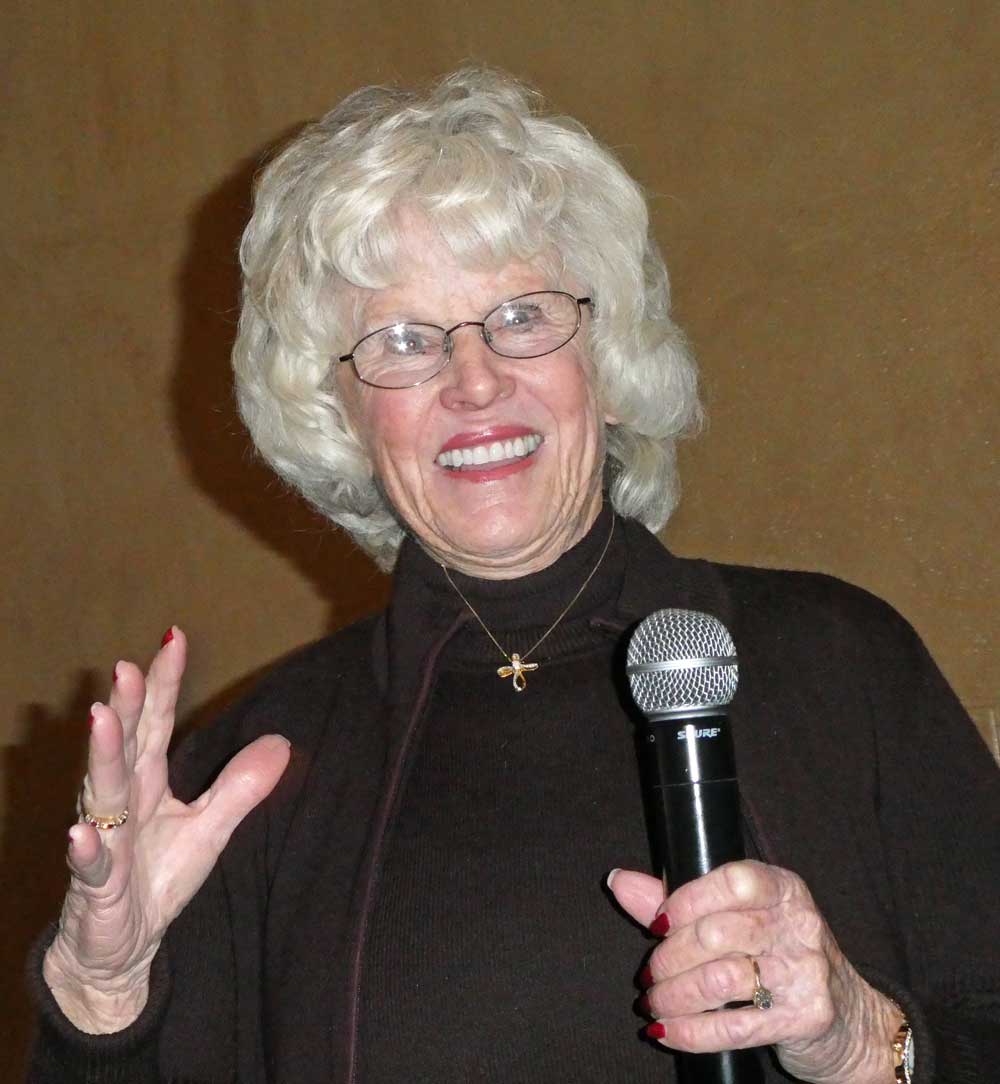 The 4H Youth Development Program is sponsored by the University of California Division of Agriculture and Natural Resources (www.ca4h.org). 4H focuses on helping youth to reach their potential in citizenship, leadership and life skills, and giving back to their communities, supported by adult volunteers. Boys and girls from ages 9-19 can join, and in some areas they can join as early as age 5. The ratio of youth to adult volunteers is 6:1. Dee Keese reviewed the Palos Verdes Peninsula 4H Club programs. Young people can make friends and share interests in virtually any subject, now in 37 local projects including computers, automotive, etc. Girls as well as boys are now members. She has a variety of animals in her backyard, including llamas and pigs, providing unique experiences for local children.. The leaders are volunteers. Volunteering is a good opportunity for older people to teach their skills to children. Many retired people have important experiences to pass on to the younger generation. If a child has an interest in any activity, the Club tries to organize a project for that interest if there are enough for a small group. In addition to building positive relationships with each other and with adults, the children gain experience at a young age in volunteering service. Local donation and volunteering information is available at www.pvp4hclub.com, or call Dee Keese at 310-377-9773. |
Mario Santoyo, Craft Talk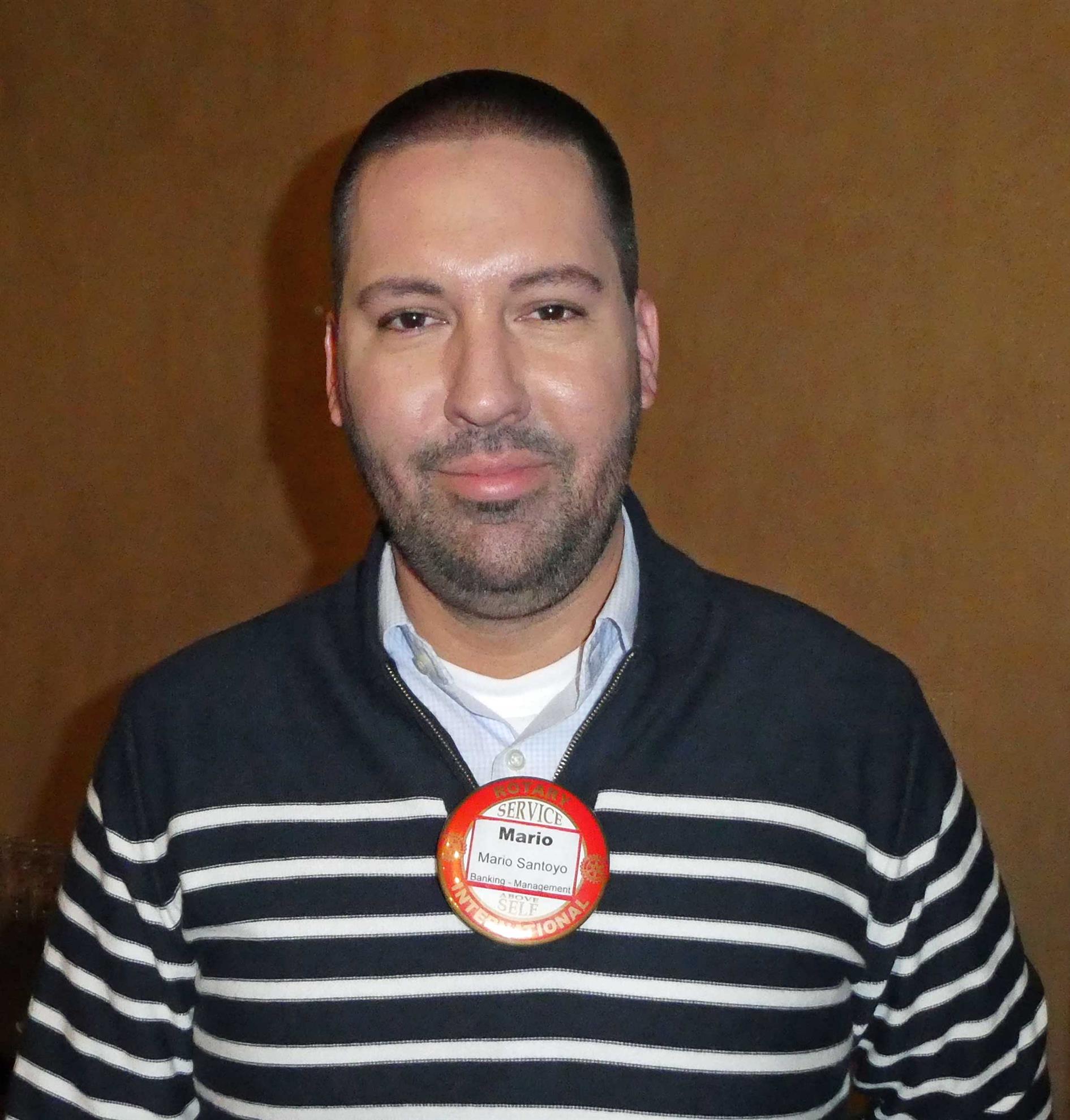 Our new member Mario Santoyo was born in West Covina in the East Los Angeles area. He attended Catholic schools and was an altar boy. He participated in track and cross-country in high school. His parents came from Spain where his grandfather had a construction company, a business inspiration for Mario. He is single and lives with 2 older sisters. While in college at California State University in Fullerton majoring in liberal arts, he worked at a Robinson’s store. Then he got a job with a Wells Fargo Bank in Compton. He worked his way up in supervisory positions. 2 years ago he transferred to Palos Verdes with the Premier Business Bank in Malaga Cove as Vice President and Branch Manager. (Our Rotary Club’s new meeting place will be handy for him after work.) |
Discussion & Voting on Permanent Meeting VenueWe have tested a number of potential Club meeting sites over the last couple of months after losing our previous location at Rolling Hills Country Club late last year due to its demolition and remodeling project. In addition to location of a new meeting place, we considered quality of food and service, acoustics, size and comfort of room, and cost. (All of the current possibilities cost somewhat more than the previous venue, which we have known would end with the onset of its long-anticipated construction project.) President Jon Caplan led the discussion of the pros and cons of each place and receiving input from members (including email input from those unable to attend tonight). After much discussion, we filled out paper ballots ranking our top 3 choices. The top choice by a wide margin was La Venta Inn. It is a beautiful facility with a great view of nightlights in the winter and daylight coastline in the summer. We hope our members and visitors will not have difficulty finding this facility on Via Del Monte. |
Student Dance Contest
|
Marymount Rotaract Service Projects, Dominique Alvarez Dominique Alvarez is the president of the Marymount California University Rotaract Club. She reviewed her Club’s activities and service projects over the last year. (Dave Tomblin of the LA5 Rotary Club is the faculty advisor.) The Marymount Club has been very active with multiple service projects. District 5280 Rotaractors are selling T-shirts for $20 to honor Rotaract’s 50th Anniversary.
They attended the Big West Rotaract Conference at CSU Long Beach in October. It is a multi-District organization founded in 2015 and registered with RI, to collaborate projects and leadership training for Rotaractors in Districts across the US West Coast including Alaska. Their Club helped with the District 5280 Youth Conference in Hawthorne in October, helping Interactors become better leaders and public speakers, and developing skills to make their Clubs stronger. Los Angeles Rotaractors from Marymount, UCLA, USC, San Fernando Valley, and Angel City Clubs participated in a District-wide community service project in November at the Downtown Women’s Center. It provides services for homeless women including promoting safe housing, health care and community support services. The Rotaractors hope to expand future participation in District-level service projects, including Interactors. They are participating in Fundraising for the District St Patrick’s Day 5K Color Run To End Polio on Saturday, March 17, at Griffith Park. (Participants will have a “non-toxic” multi-colored powder tossed on them during the run, so they will finish looking tie-dyed!) Another Club project, with Interactors, will provide water-pasteurization indicators to verify safe water, to Migori, Kenya, on February 18. |
Student Speech Contest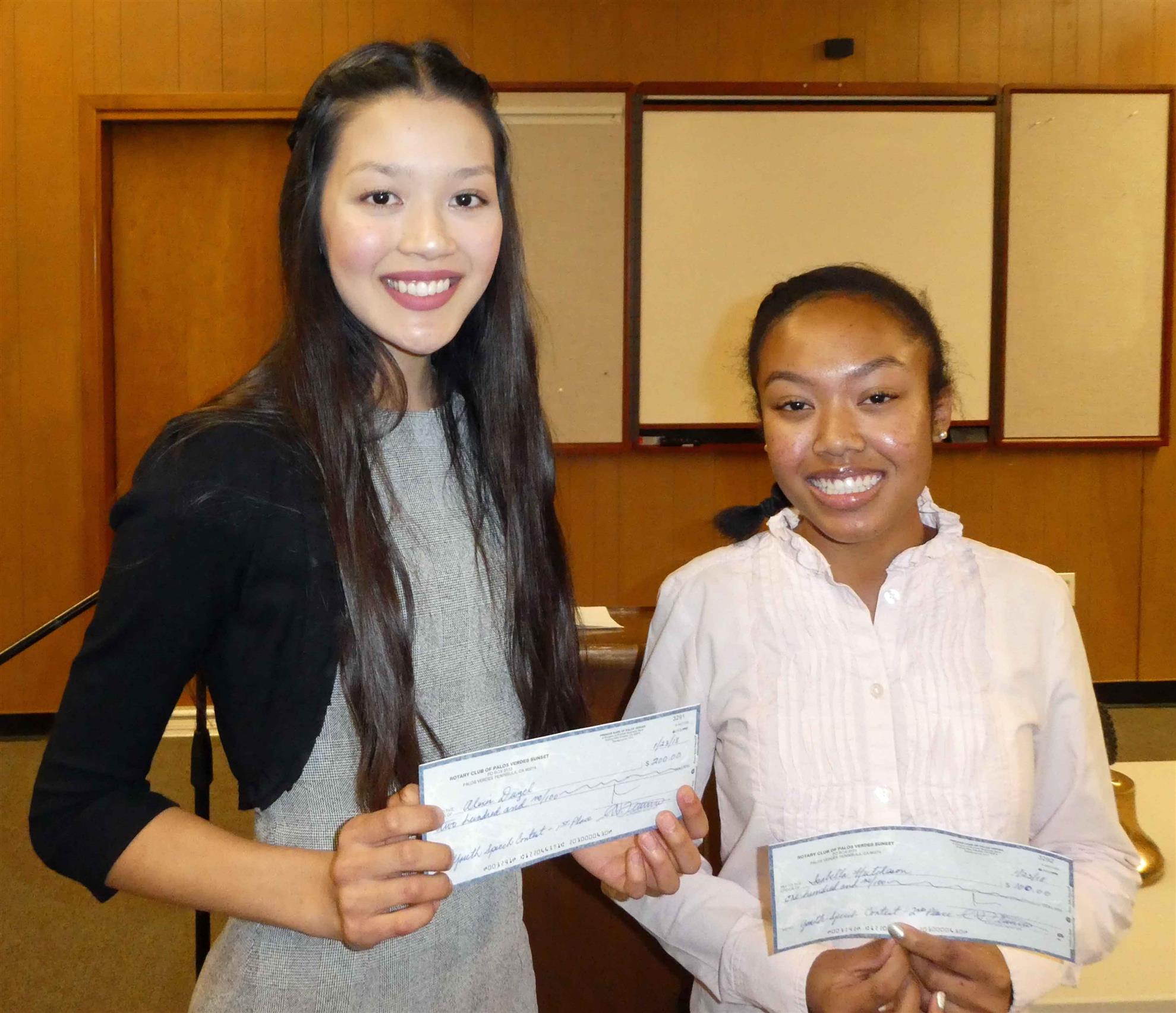 Our 2 Student Speech contestants are both from Palos Verdes High School. After introductions by Lodel Caplan, each gave a brief speech on the theme of “Making a Difference". Isabella Hutcheson (on right) was the first speaker. She reviewed the history of bus riders in Birmingham, Alabama, trying to integrate the segregated transportation system there (Rosa Parks making a difference by refusing to give up her seat), and the events leading up to the Supreme Court’s schools desegregation decision. She also spoke of volunteering at a hospital and helping the homeless, showing how one person can make a difference. Alexis Dugel spoke next, on making a difference by focusing on improving childhood literacy. 1 in 4 children in the US do not learn to read sufficiently for future job applications and workplace functions. 250 million people in the world are functionally illiterate. Alexis wrote and published a paperback children’s book, “The Sky’s the Limit”, encouraging children to reach for their potential. She organized an online writing contest, to which 500 children responded. After careful deliberation, the judging committee designated Alexis Dugel the winner; she received a check for $200 from our Club, and will represent our Club in our Rotary District Pageant of the Arts on March 10 at LMU. The runner-up, Isabella Hutcheson, received $100. Our Club expressed thanks to both of the contestants and to their family members for participating in the contest. |
History of Rotary, PDG Dave Moyers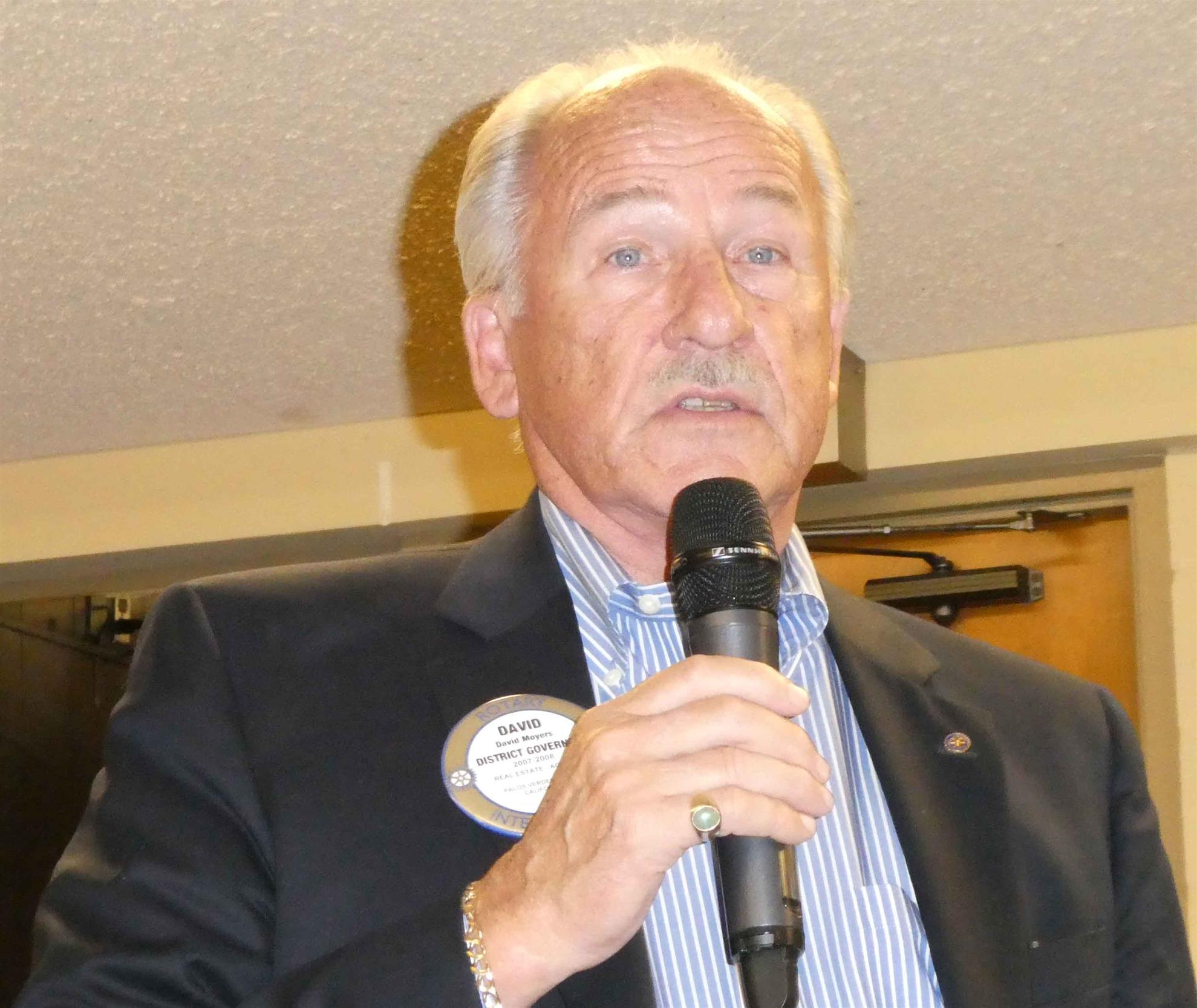 Dave Moyers presented a history of Rotary, started by attorney Paul Harris with the first Club of 4 business and professional members in Chicago in 1905. They began meeting weekly (rotating their meetings among the members’ offices) and decided to organize service projects in the community.  The San Francisco earthquake occurred the next year. A Chicago member transferred to San Francisco and organized business and professional people into a new Rotary Club there for service to the devastated community. Soon there were also Rotary Clubs in Oakland, Seattle and Los Angeles. In 1910 a Rotary Club was founded in Winnipeg, Manitoba in Canada, and then in Dublin and London. Many more Clubs were founded during World War I. The San Francisco earthquake occurred the next year. A Chicago member transferred to San Francisco and organized business and professional people into a new Rotary Club there for service to the devastated community. Soon there were also Rotary Clubs in Oakland, Seattle and Los Angeles. In 1910 a Rotary Club was founded in Winnipeg, Manitoba in Canada, and then in Dublin and London. Many more Clubs were founded during World War I.In 1945 after the end of World War II, almost 50 Rotarians were among the participants in the UN Charter Conference in San Francisco that founded the United Nations. They focused on maintaining international peace, developing friendly international relations, solving economic, social and humanitarian problems, and promoting human rights, which had already been Rotarian objectives for many years. In 1985, building on a polio vaccination program in the Philippines sponsored by Los Angeles Rotarians, Rotary launched its worldwide PolioPlus program to eradicate polio, a disease that had crippled millions of children. The World Health Organization and the Bill and Melinda Gates Foundation are now partners with Rotary in polio eradication, which is almost complete worldwide except for a handful of new cases in war-torn areas of Afghanistan and Pakistan. Rotary’s motto is “Service Above Self”. The Rotary Foundation was founded in 1917; its motto is “Doing Good in the World”. Rotary has raised $3.5 billion for humanitarian projects around the world. Rotary International has 1.2 million members in 34,000 Clubs. |
Student Art Contest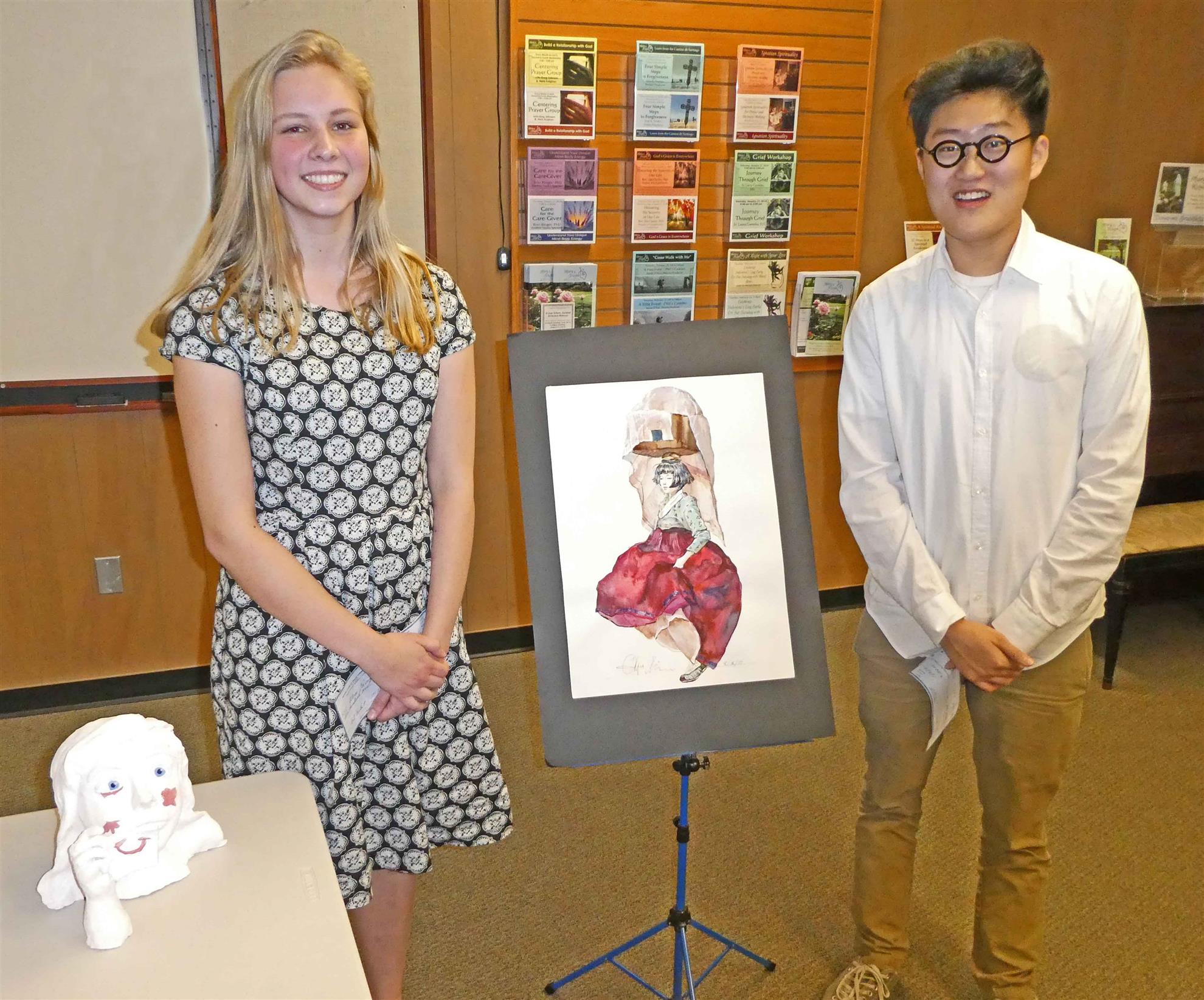 Our 2 student art contestants were Alexa Quigley and Hyun Kim, both of Palos Verdes High School. Alexa presented a sculpture representing “how we see ourselves”, describing how her hands mold the wet clay and relating the result to the 4-Way Test. Hyun presented a watercolor of a Korean woman in traditional dress and carrying a basket on her head, showing how people work hard in daily life. He is colorblind, but described how he chooses colors for his artwork in spite of his vision limitation. The judging committee met to consider the artistic merits and relationship to the Rotary 4-Way Test of each art entry. 1st place was awarded to Alexa Quigley, who received a prize of $200, and 2nd place was awarded to Hyun Kim, who received a prize of $100. Alexa Quigley will be our Club’s sponsored entry into the District Pageant of the Arts contest at Loyola Marymount University on Saturday, March 10 (Sat). (If she cannot attend, Hyun Kim will be entered instead.)
|
Christmas Party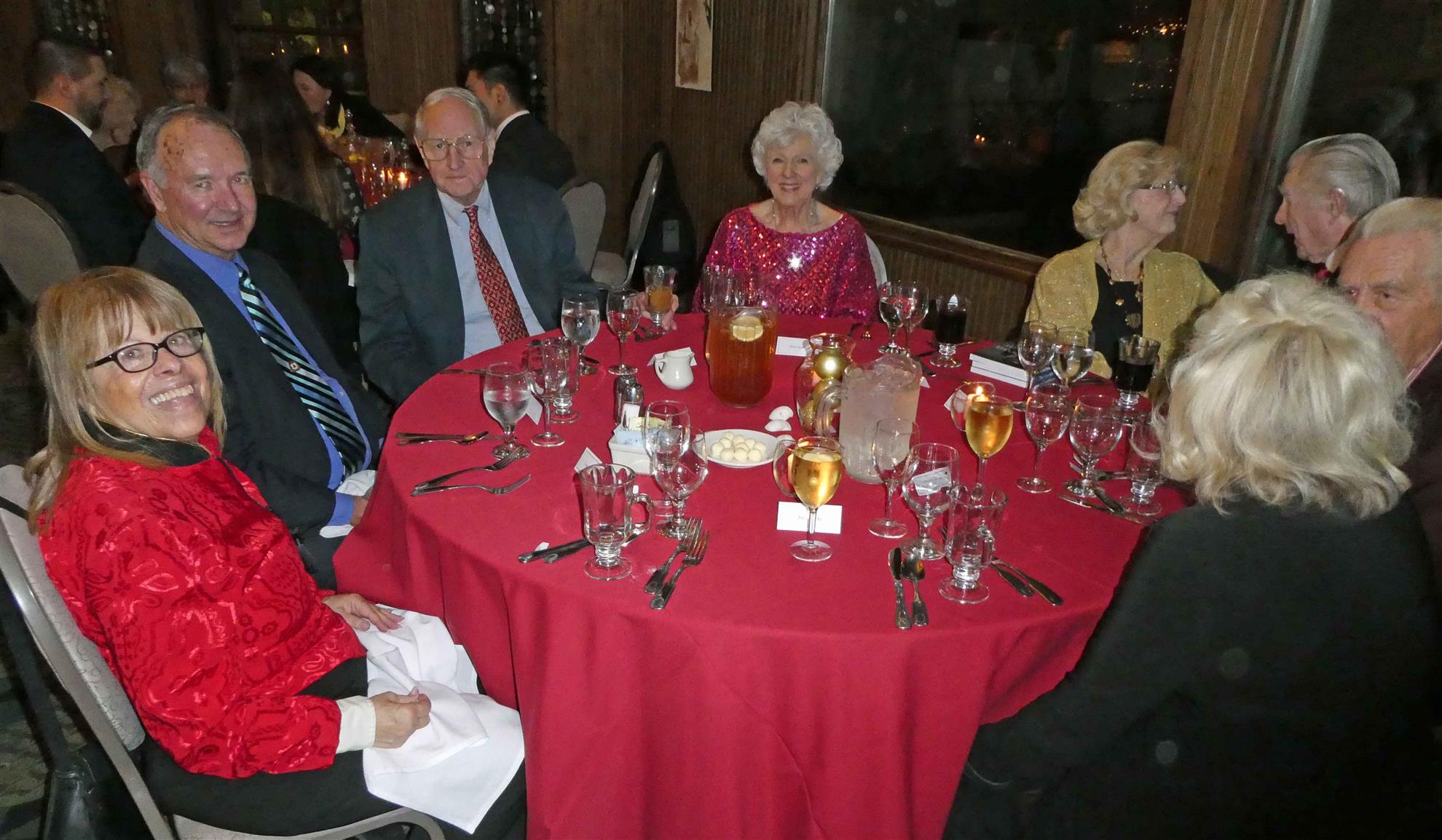 |
“Journey Out”, Cherise Charleswell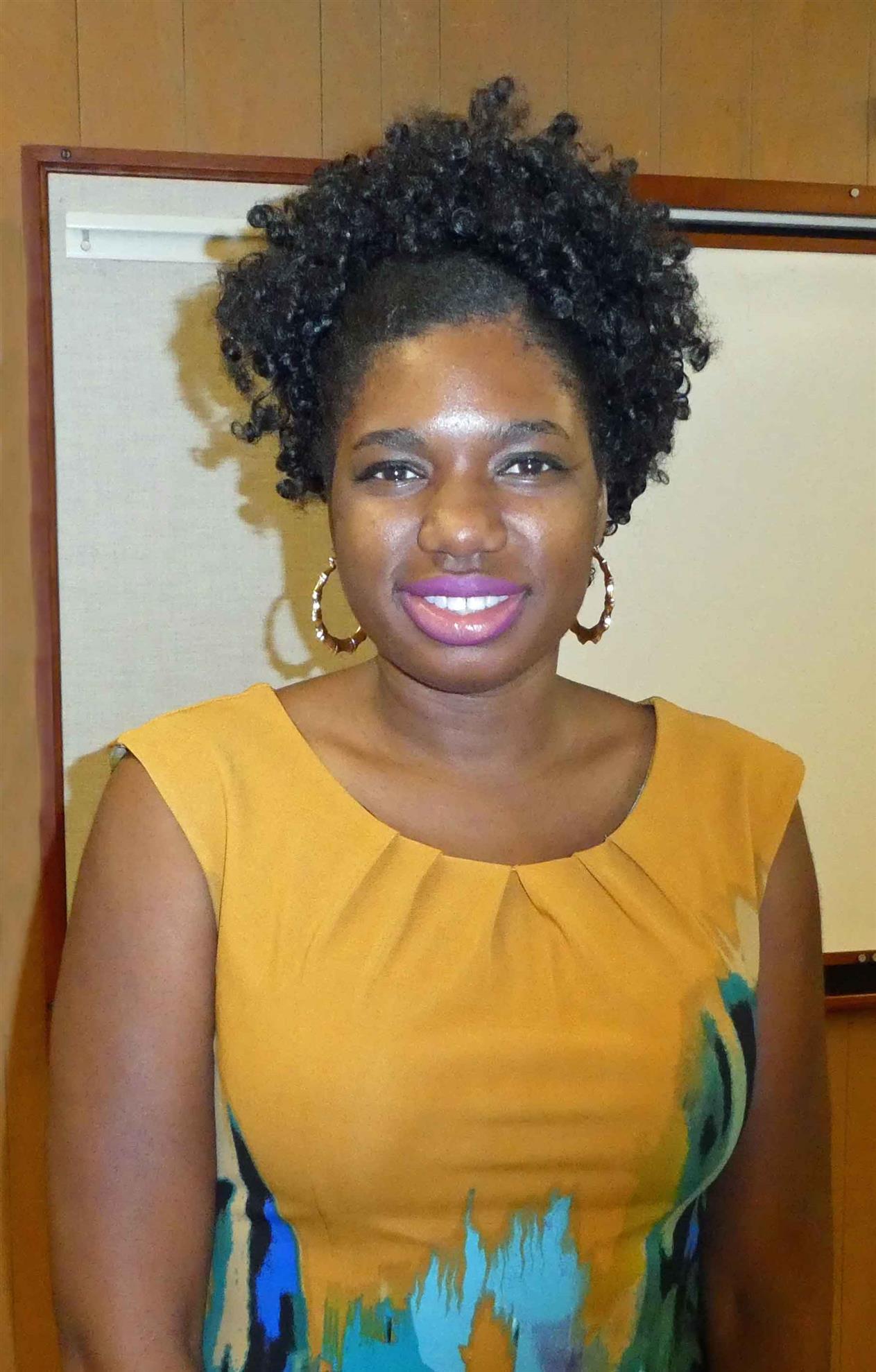 Cherise Charleswell, MPH, is the Development & Outreach Manager for Journey Out in Van Nuys, which she joined in 2016. Cherise has degrees in Biological Sciences and Anthropology, and a Master of Public Health, and is a Past President of the Southern California Public Health Association. Journey Out (formerly The Mary Magdalene Project) was created by a Sunset Boulevard Presbyterian church grant in 1980, where prostituted women were working the streets outside the church. A safe haven residence was established in the San Fernando Valley to hide women from their pimps and predators for up to 6 months. These victims have been intensely manipulated and coerced, and they have difficulty returning to society. The 3 necessary steps are Survival, Hope & Freedom. (See www.journeyout.org for more information, involvement, and donations. District Governor Cozette Vergari is also promoting this effort.) The average age of entrance into prostitution is 12-14 years old. Victims are lured and coerced in by pimps and traffickers who then control their lives and subject them to physical and emotional abuse. >50% are runaway or throwaway youth, and 85% are victims of childhood sexual molestation and incest. 84% are US citizens. They suffer from anxiety, depression and post-traumatic stress disorder, and are vulnerable to homelessness, mental health problems, substance abuse, rape and domestic abuse. Journey Out’s programs include: Direct Street Outreach, monitoring prostitution areas in Los Angeles and handing out discrete information packets. Drop-In Center, a safe place to discuss issues of exiting from a life of abuse, violence and poverty. Prostitution Diversion Program (PDP) works with the LA City Attorney & Police as victim advocates. Sex Trafficking Prevention includes "Ending The Game" (to guide victims to recovery), and "My Life, My Choice" and "Word On The Street" curricula (to educate and warn girls on the tactics used to recruit victims). |
Club Social Hour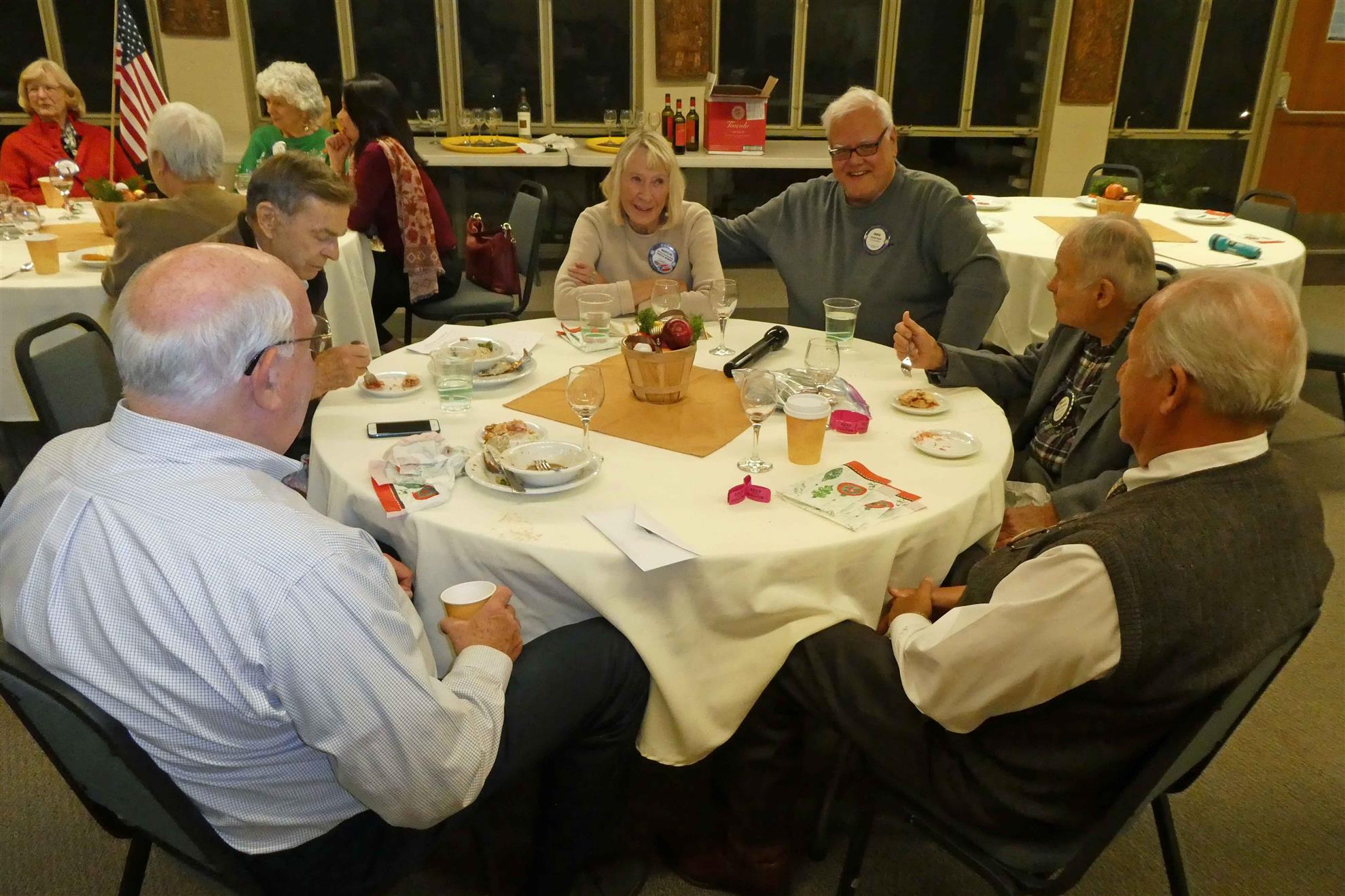 We met offsite at the Mary & Joseph Retreat Center in Rancho Palos Verdes for a December Social Hour, and welcomed 2 Guests.
|
Security in Palos Verdes, Capt Beringer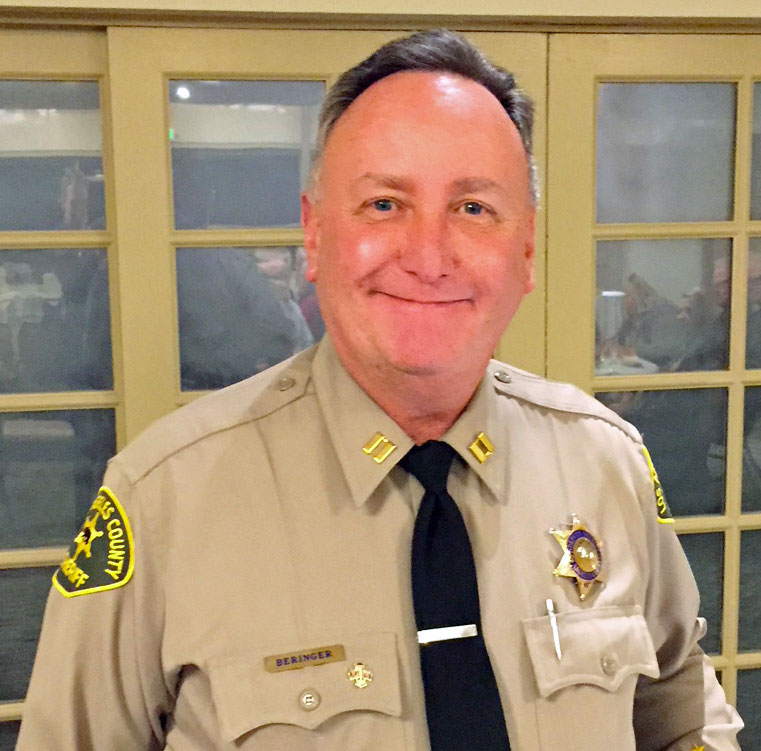 Capt Daniel Beringer, of the Los Angeles County Sheriff’s Department, was promoted to Captain in 2016 and assigned to the Lomita Sheriff’s Station. He joined the Sheriff’s Department in 1986 after graduation from CSU Long Beach, and served at Lomita Sheriff’s Station, followed by several other assignments in the Sheriff’s Department. The Lomita Sheriff’s Station provides law enforcement services to the cities of Lomita, Rancho Palos Verdes, Rolling Hills, Rolling Hills Estates, and adjacent unincorporated communities . At any one time there are 4-7 officers on patrol in the area. California criminal law changed in 2014 to allow early release of state prisoners to city/county jails (to alleviate overcrowding in prisons). Many felonies such as drug crimes were reduced to misdemeanors. Little support was provided for homelessness and mental illness. Confinement became a revolving door with less penalties, and property crimes such as shoplifting and theft from vehicles increased. Crime spiked and then leveled off, but is now increasing again, although the Lomita Sheriff’s Station has the 3rd lowest crime rate in Los Angeles County. License plate cameras help to detect stolen cars and wanted suspects. Surveillance cameras also help identify suspects. More helicopters are used now, and a team of detectives works undercover to solve and prevent crimes. Capt Beringer spoke about preventive measures for property crimes (burglars like easy targets). Simple precautions include clearing overgrown shrubs near the home, and verifying that windows and doors are secure and that external lighting works and is sufficient. Motion detector lighting is helpful in detecting intruders. Don’t keep tempting items visible in parked vehicles, and always lock vehicles when parked outside. Stop newspaper delivery when absent, and coordinate with trusted neighbors to watch the home. House numbers should be clearly visible from the street for emergency responders. Motion-detection cameras can connect to a Wi-Fi router for easy installation. Two-way sound communication helps when a visitor is at the door. Night vision video can help identify people and vehicles. Cameras can have features allowing the view to move and zoom. Active camera systems can send alerts to smart phones and can even be viewed remotely. Capt Beringer passed out a homeowners guide brochure for better home and neighborhood security, and a home security assessment checklist. |
Habitat for Humanity, Helen Dosta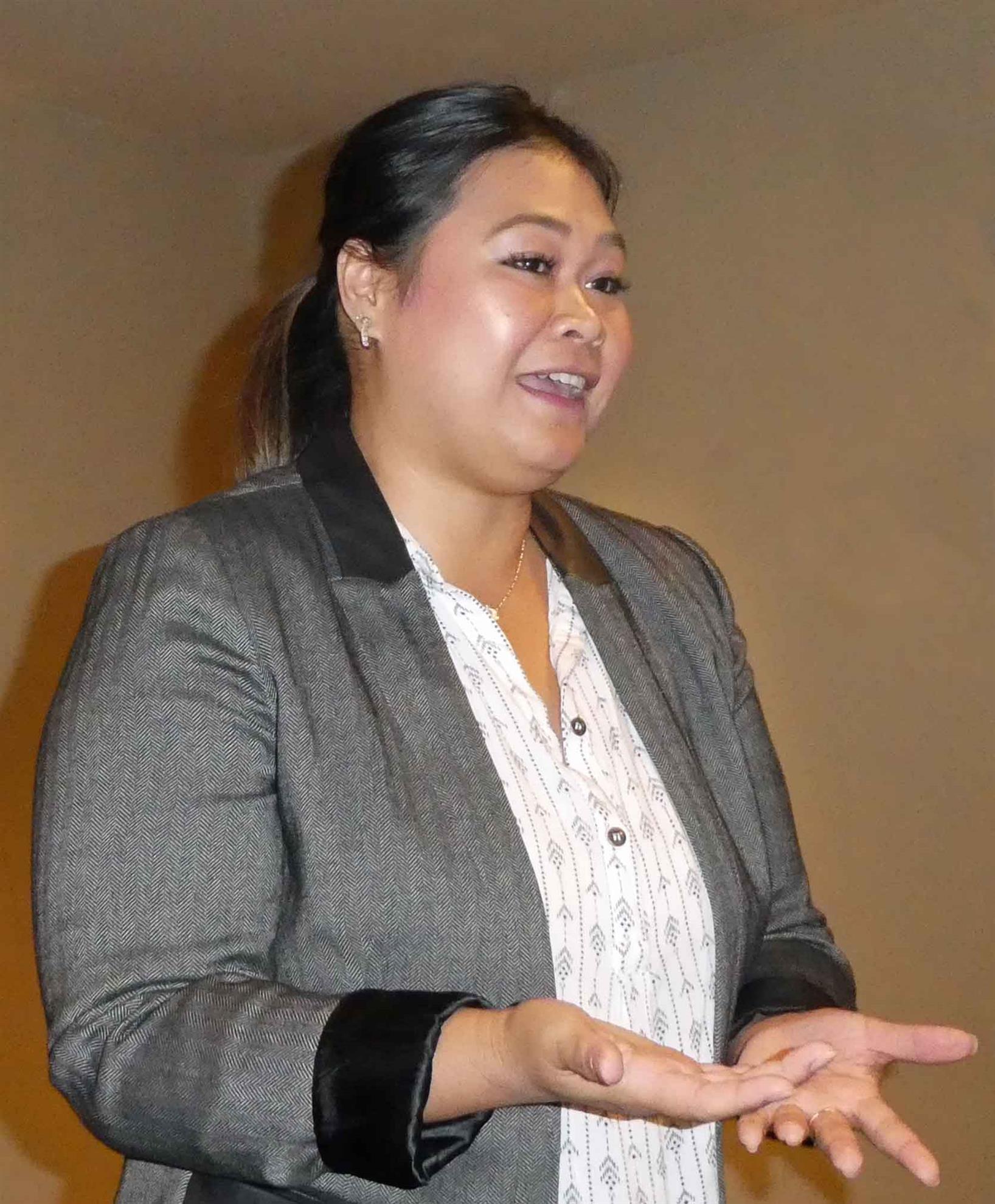 Helen Dosta has been the Director of Habitat for Humanity in Los Angeles for 6 years. 800 homes have been built by Habitat LA in the last 25 years. Habitat is building 10 houses in the 405/Sepulveda area in Culver City, with the help of 5 participating Rotary clubs including PV Sunset. Los Angeles is one of the least affordable housing areas in the US, with high costs and overcrowding. Habitat's goal is eliminating substandard housing and providing decent sustainable and affordable housing for everyone. Habitat for Humanity provides affordable home ownership programs for families earning 30-80% of the median family income. Habitat coordinates volunteers, participating families, corporations, congregations and donors to enable home ownership for hard-working low-income families. Habitat LA renovates as well as builds homes. Homeowners must provide down payment and monthly mortgage payments and invest "sweat equity" hours working on their future home and homes of other Habitat home buyers. Habitat homes are sold at no profit and financed with affordable loans. Educational resources help to promote financial independence. “Green building” principles are used to promote environmental and health sustainability. Many community organizations and individuals donate time, skills, materials and household items. The “ReStore” sells donated household items from contractors, companies, movie & television studios and individuals, and is open 7 days a week. Volunteers are needed for sorting, selling and computer work. Habitat LA needs volunteers on its construction sites, in the offices, for special events, and in the ReStores. Signing up and confirming your volunteer date can be done on the website at http://www.habitatla.org/get-involved/volunteer/. |
Ingrid Hempell, Life in East Berlin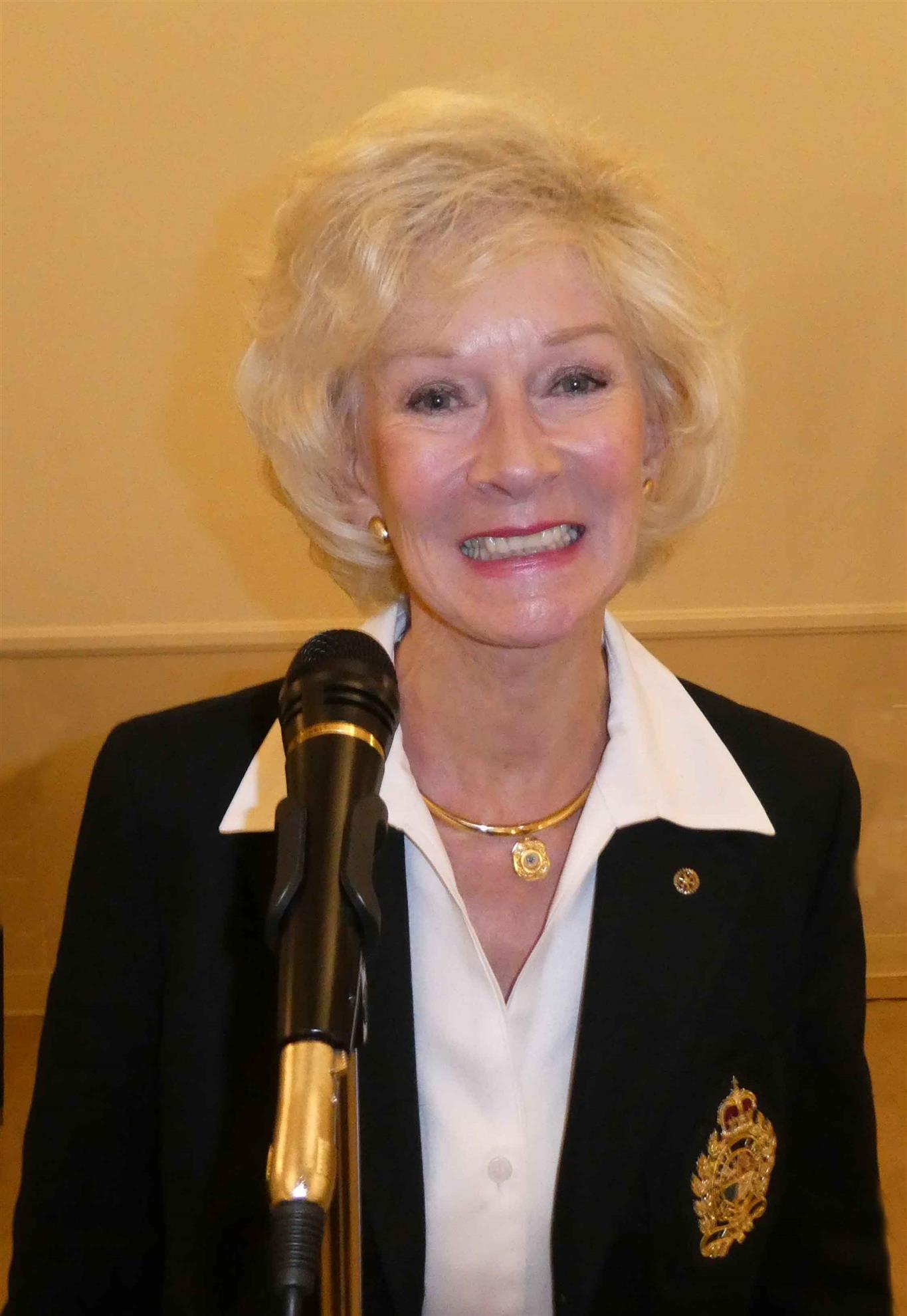 Ingrid Hempell, Concord (CA) Club, is a frequent visitor to our Club (with Volker Schäferbarthold of the Minden Rotary Club in Germany). She grew up in East Berlin during the Soviet occupation after World War II. She remembers a very difficult life with hunger and deprivation, and the lack of basic consumer goods that we take for granted. At the end of World War II, Germany was divided into 4 occupation zones by the US, UK, France and the Soviet Union. The capital, Berlin, was in the Soviet zone but had a corridor connecting it to the 3 other zones to the west. In June 1948, Soviet authorities blocked access into Berlin from the west. The Allies blocked shipments into the Soviet zone of coal and steel, hindering industrial development there. The Soviets stopped food shipments and electricity to the non-Soviet sectors of Berlin, which was surrounded by Soviet military forces. In response, the Allies began a Berlin Airlift with urgently needed supplies on unarmed humanitarian cargo aircraft into West Berlin in July 1948, gambling that the Soviets would not shoot them down and risk World War III. This aerial conveyor belt unloaded 5000 tons per day around-the-clock with the help of German civilians. Some aircraft, on approaching the airport, dropped candy bars with little handmade parachutes to eager children waiting below, a major propaganda success to a beleaguered population. The Soviet blockade of Berlin was lifted in May 1949. The 3 Western zones merged into West Germany with its capital in Bonn. A Communist East German government was formed with its capital in East Berlin. Marshall Plan assistance from the US helped West Germany recover from the War, while reparations to the Soviet Union from East Germany slowed economic recovery there. Soon, large numbers of impoverished East Germans were escaping to West Berlin, and in 1961 the East German government built the Berlin Wall to stop them from crossing. In 1990, the East German government collapsed, Germany was reunited, and the Berlin wall was torn down in jubilation. The German government spent large amounts of money helping the East revitalize its economy. In 1991, still recovering from poverty, Ingrid collapsed in illness, and her mother was able to take her to West Berlin for help, where there were now more and much better supplies of basic necessities and services. Ingrid had a difficult life during those years of deprivation, but started working in 1967 and ended up in Northern California as a thankful survivor. |
Volker Schäferbarthold, “My Childhood in Nazi Germany”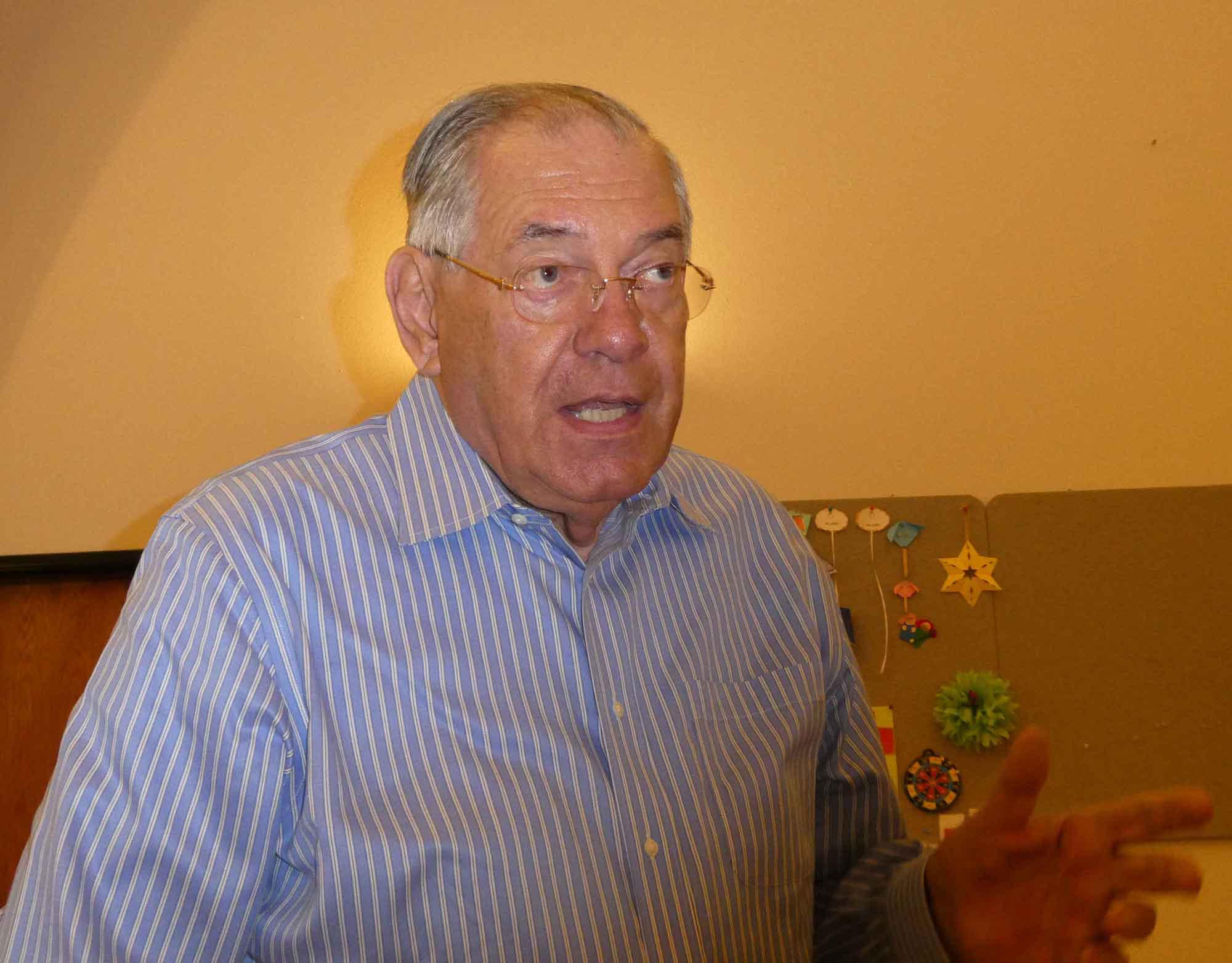 Volker Schäferbarthold is a member of the Rotary Club of Minden in Germany, and is a frequent visitor to PV Sunset Rotary Club due to his international business activities in San Pedro. He was born in 1937 in Germany and experienced Nazi rule during his early childhood. Hitler came to power in 1933 during the great worldwide Depression, which was worse in Germany because it was still required to pay reparations to the Allies after its loss in World War I. With 6 million Germans out of work and increasing hopelessness, and with the 2 major political parties unable to turn the economy around, Hitler promised relief and his minority party was allowed to form a government. Then the Reichstag (Parliament building) “mysteriously” burned down, Hitler flew into a rage and blamed the Communists, and declared a state of emergency to rule by decree. With no parliamentary meeting place, he was now the absolute dictator. In 1938, Hitler ordered the end of Jewish institutions and businesses, beginning with the Kristallnacht (night of broken windows, when Nazi thugs vandalized Jewish businesses who were blamed for Germany’s problems). This was the beginning of the Holocaust. There were no independent courts or freedom of speech or the press. In September 1939, Hitler began World War II by invading Poland with Nazi propaganda being the only news available. Volker was born into a Christian family and went to church every Sunday. In school the children were required to greet their teacher with the right stiff-armed Nazi salute and saying “Heil Hitler”. Volker’s older brother and sister were in the Hitlerjugend (“Hitler Youth”) and in uniform. In 1944, a high-ranking German officer attempted to kill Hitler with a bomb at a meeting in his office, and the radio news urged everyone to pray for the life of their “beloved Führer”. Nazi propaganda reported the bright side about “heroism” in the war, especially on the German defeat in the battle of Stalingrad in the Soviet Union. Volker’s father could not serve in the Army due to an old arm injury. Volker’s older brother on the Belgian Front watched a battle with a friend, who suddenly collapsed and died from a bullet; his brother vowed never to touch a weapon again. Air raids with systematic bombing of German cities became an almost daily experience with sirens and bomb explosions, endured in bomb shelters by a population of mostly elderly, women and children. Electric lights would go out in the shelters until after the raid, and were lit by candlelight. When Volker later asked his mother about the Jews, she said, “Yes, they gradually disappeared, but nobody knew exactly what had happened to them.” When she finally learned the truth, she could not believe how misled and ignorant she had been. His parents had thought of their beloved country as the land of poets and philosophers (Gutenberg, Goethe and Beethoven). |
District Humanitarian Trip to Colombia, Guity Javid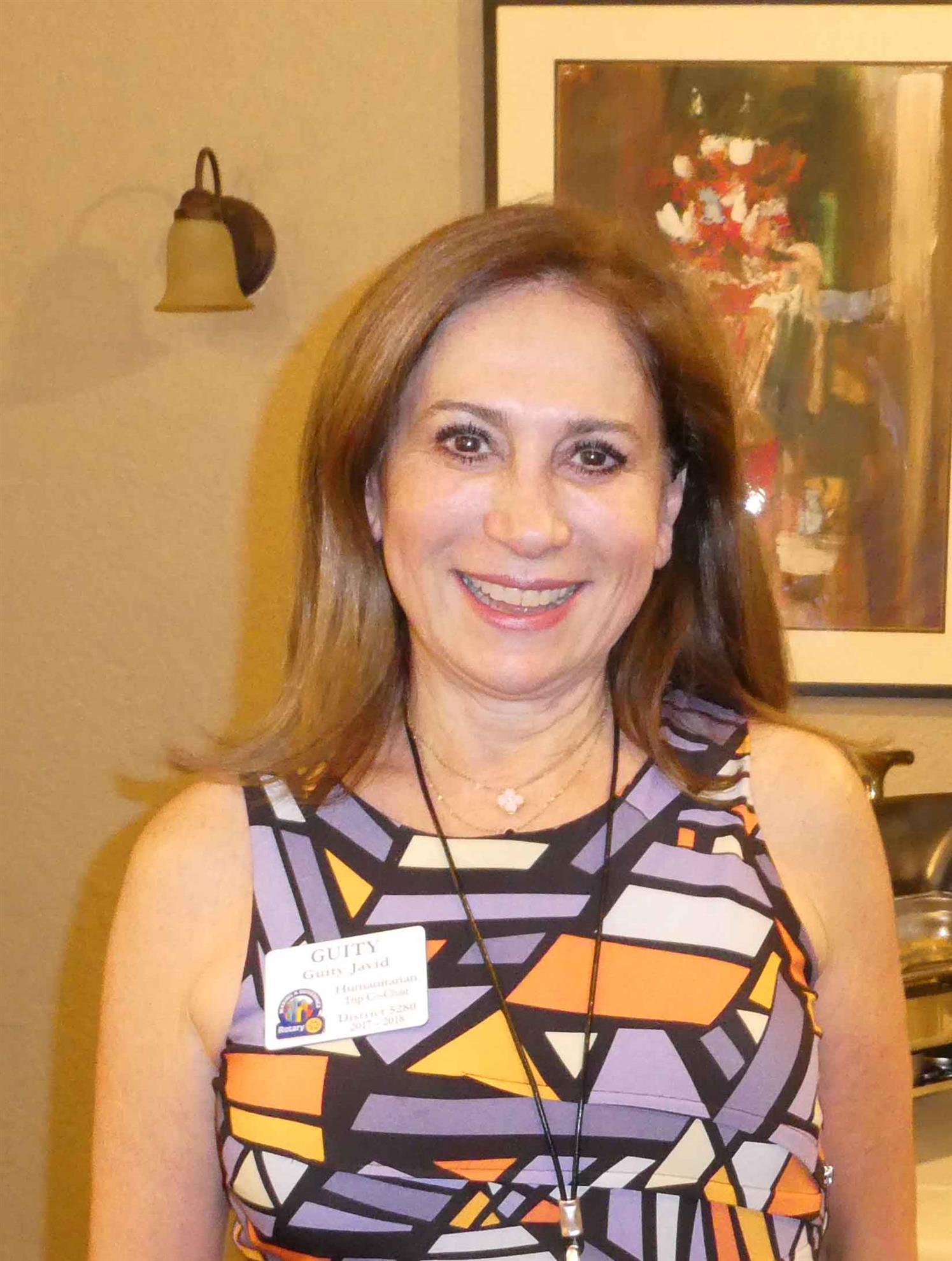 Guity Javid, Co-Chair of our District’s Humanitarian Trip to Colombia in March 2018, is a member of the Rancho Park Rotary Club. (The other Co-Chair, Mark Ameli, is also in the Rancho Park Club.) Our District is partnering with 2 Districts in Colombia for 2 sets of projects for our 2018 Humanitarian Trip, to Bucaramanga March 21-26, and to Bogotá March 26-30. Volunteers can choose either one or combine both. Bucaramanga in northern Colombia will have 6 projects, 4 of them Global Grants, 3 in water & sanitation and the other in organic farming. The other 2 are local projects — an after school project for painting & upgrading schools, oral hygiene teaching, school supplies & backpacks, & teaching organic farming; and a community project for providing soccer balls & athletic shoes. Bogotá in central Colombia will have 7 projects, 4 of them Global Grants — water and sanitation, malaria diagnosis & prevention, technology training & audiovisual equipment, and Operation Smile (surgical correction of cleft lip & cleft palate deformities). The other 3 are local projects – providing shoe-making machinery & equipment to rural women for self-support, providing farming supplies & educational materials for vocational skills for improved self-support, and providing bicycles to schools to lend to students for encouraging attendance. Guity encouraged interested Rotarians to apply. For info & Registration Form, go to https://portal.clubrunner.ca/50010/SitePage/2018-colombia-humanitarian-trip. |
Membership (“Creating a Stronger and More Vibrant Club”), Kathleen Terry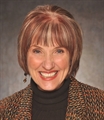 Kathleen Terry, District SAG for Membership, is Past President of Manhattan Beach Rotary Club 2013-14. She is a founder of Participative Management Systems and has presented many programs on business teambuilding, customer relations, and working with today’s diverse high-speed workplaces, and has also facilitated community leadership programs. Even small Clubs can be strong. Looking at our Club: small-medium-size (growing or shrinking), fun, exciting, dynamic, serving the community, and gender and race mix (think of the future). Look for sustainable growth over time. The challenges are recruitment, retention, and attracting younger members to maintain a good age distribution. Find them and bring them in, but don’t just follow old habits (“But we’ve always done it this way!”). Retention begins before induction — why did you join Rotary? (Friendship, helping community, networking, etc.) What Creates the First Impression? 3 steps: Asking, Website, & First Meeting. (You only have one chance to make a first impression.) Who invited you to join Rotary? Each one reach one (customers, associates, friends, etc.). Think of someone you could invite. Attracting younger members — 90% of Rotarians are over 40 years old. Younger members may be concerned about inconvenience of meetings, time, cost, “hanging” with friends, different ways of communication (social media). Compare this to cost of gym membership and pop music concerts. Rotary District & International dues are actually $135/year. Is our cost structure prohibitive? Younger members look for fellowship, service, fun meetings, family-friendly, flexible schedules, low cost. Do service projects involve family members? Are “traditions” a turnoff? Are younger members offered leadership positions? Our website has been updated. Our Facebook page needs more photos. What do people experience in their first meeting? (How do we treat our guests?) In 2016, RI suggested more flexibility, relaxed attendance & meeting types, and inviting Rotaractors to be members. Retention: ~50% leave within 3 years of membership. They stay for friendship and serving the community. How to keep them: everyone knows your name and is glad you came. Identify, inform, and engage. Be willing to change and adapt, with commitment of the entire Club. (We need to get our photos and biographies on our website, and get an up-to-date group photo. |
District Governor Cozette Vergari's Visit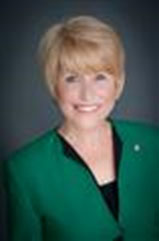 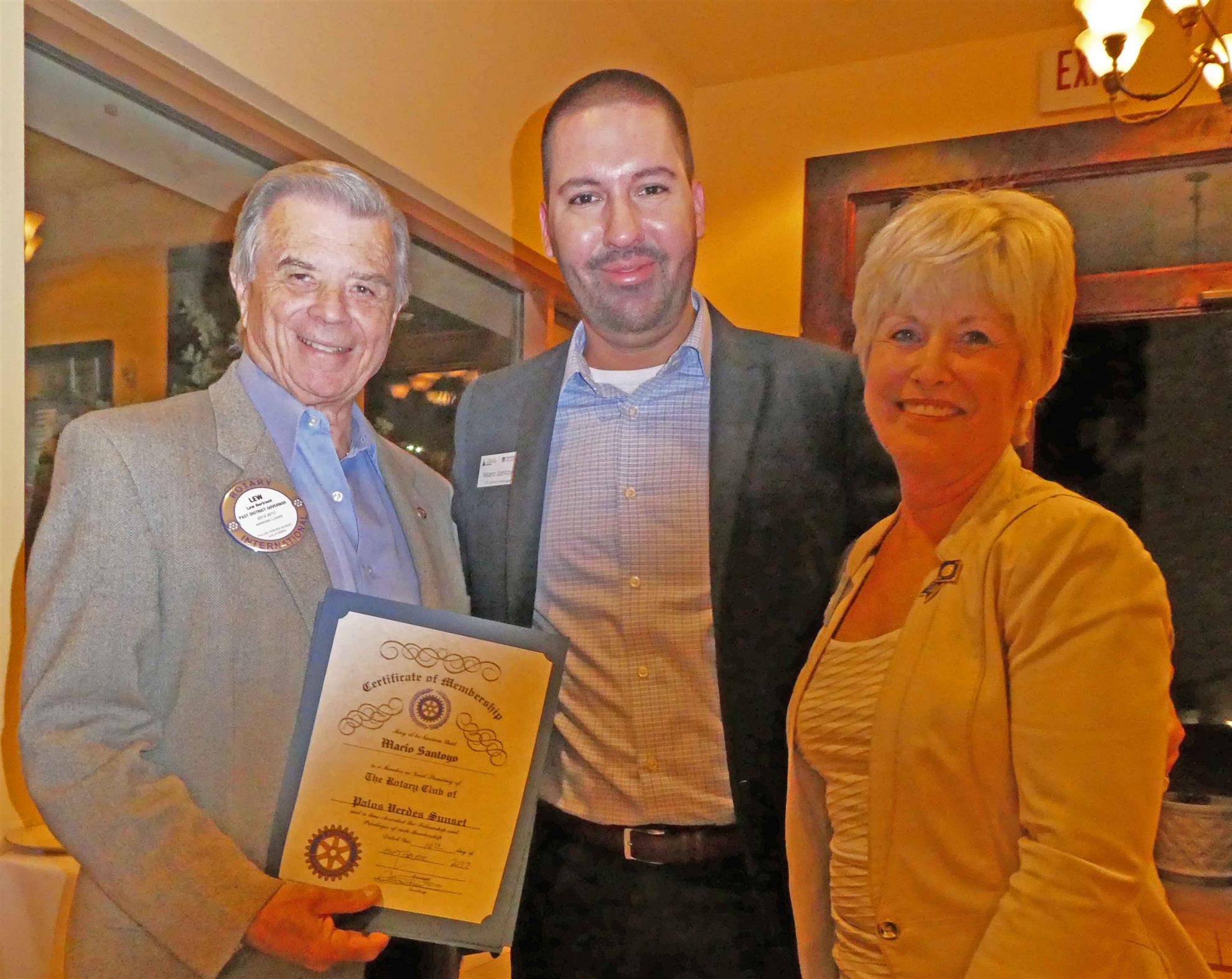 Induction of Mario Santoyo (Premier Bank), by DG Vergari & PDG Lew Bertrand District Governor Cozette Vergari has her own law firm in Family Law and Trust & Estates. She has served as legal counsel for minor children in high-conflict custody battles. She graduated from USC in Dance and a Master's in Education. She taught high school and college dance, operated dance studios and retail dancewear, and was a professional choreographer, before her legal career. She joined the Westchester Rotary Club in 1995 and chaired the opening-night event at the 2008 RI Convention in Los Angeles. She is also on the Board of Directors for 1736 Family Crisis Center and the US Selective Service System. Her husband is also a Rotarian. She has a grandson, and a new granddaughter is on the way in several days. DG Vergari's theme this year is “Make Dreams Come True”. She reviewed the types of District support resources for the Clubs, including the District leaders, the office staff, and the District newsletters and website. She also reviewed her goals for this Rotary Year. The goal of $18.20/member raised for polio has been exceeded. Rob DeCou's (Playa Venice Sunrise) Run To End Polio, from Death Valley 232 feet below sea level to Mt Whitney 14,494 feet above sea level over 3 days in August raised an amount to be revealed at our annual Rotary Foundation Celebration on October 28. (Our Club still has 6 spaces to the Celebration available.) The District Humanitarian Trip to Colombia March 21-30, 2018, will have 130 Rotarians from our District (10 spaces are still available). The trip will be split between Bucaramanga and Bogotá; participants can choose either or both. Our District sponsored a Child Sex Trafficking Forum in March at Loyola Marymount, with presenters from Homeland Security, the FBI, LAPD, and the LA County Sheriff’s Department. Court representatives explained how it deals with child victims of commercial sexual exploitation. Elected officials, mental health professionals and nonprofit organizations were also represented. Our District is creating a Human Trafficking Task Force as a model for Rotary Districts in California, Nevada, and Arizona; Cozette will be the state coordinator for California. (RI is also looking into this kind of project.) Our Club donated $100 tonight to the Rotary Foundation in DG Vergari's honor. |
Social Hour at Offsite Venue, Luna Rossa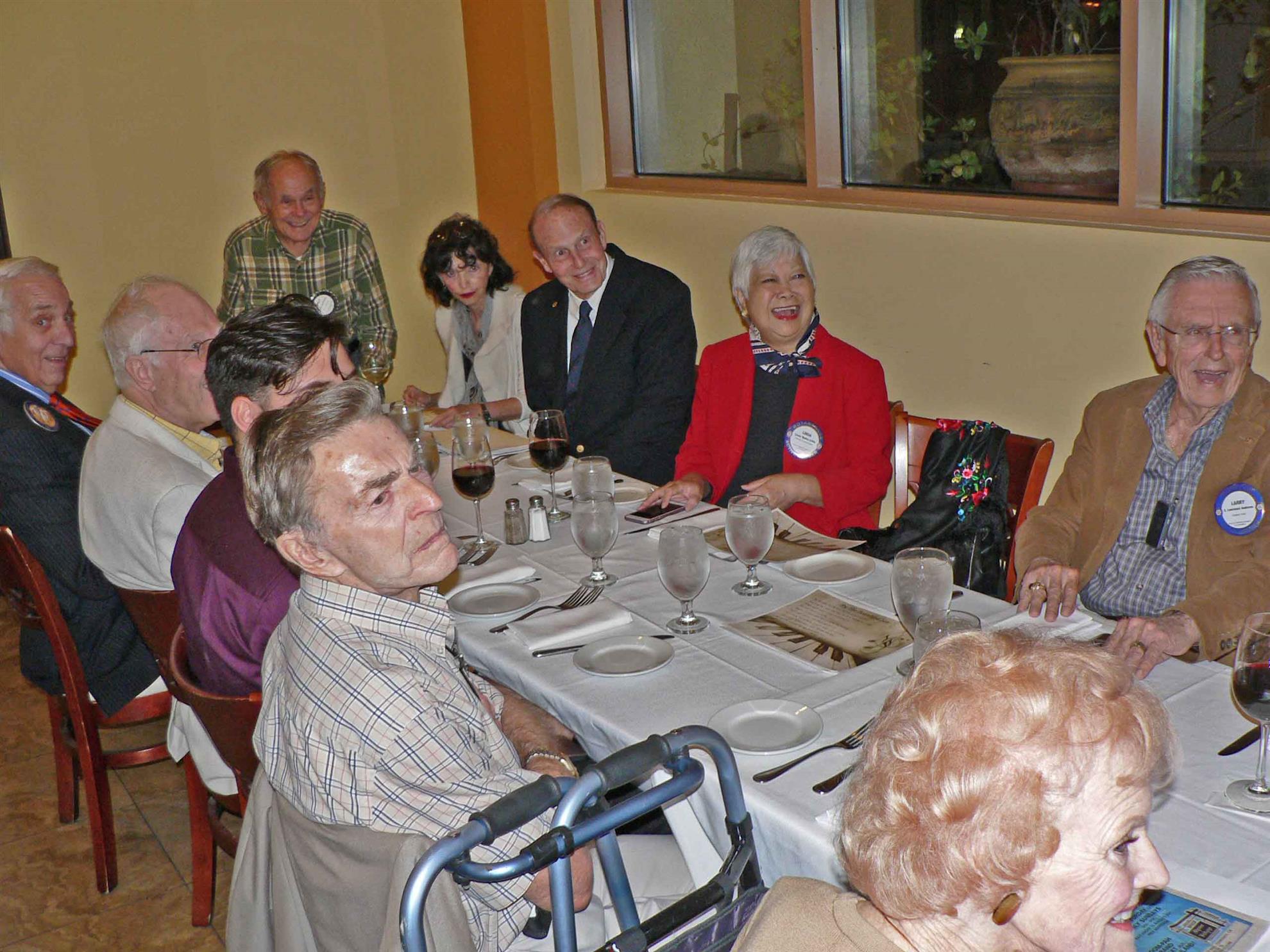 We enjoyed an offsite meeting at the Luna Rossa Restaurant in the Peninsula Center.
|
“The Caribbean Endeavor” (Larry Andrews’s 2nd Novel)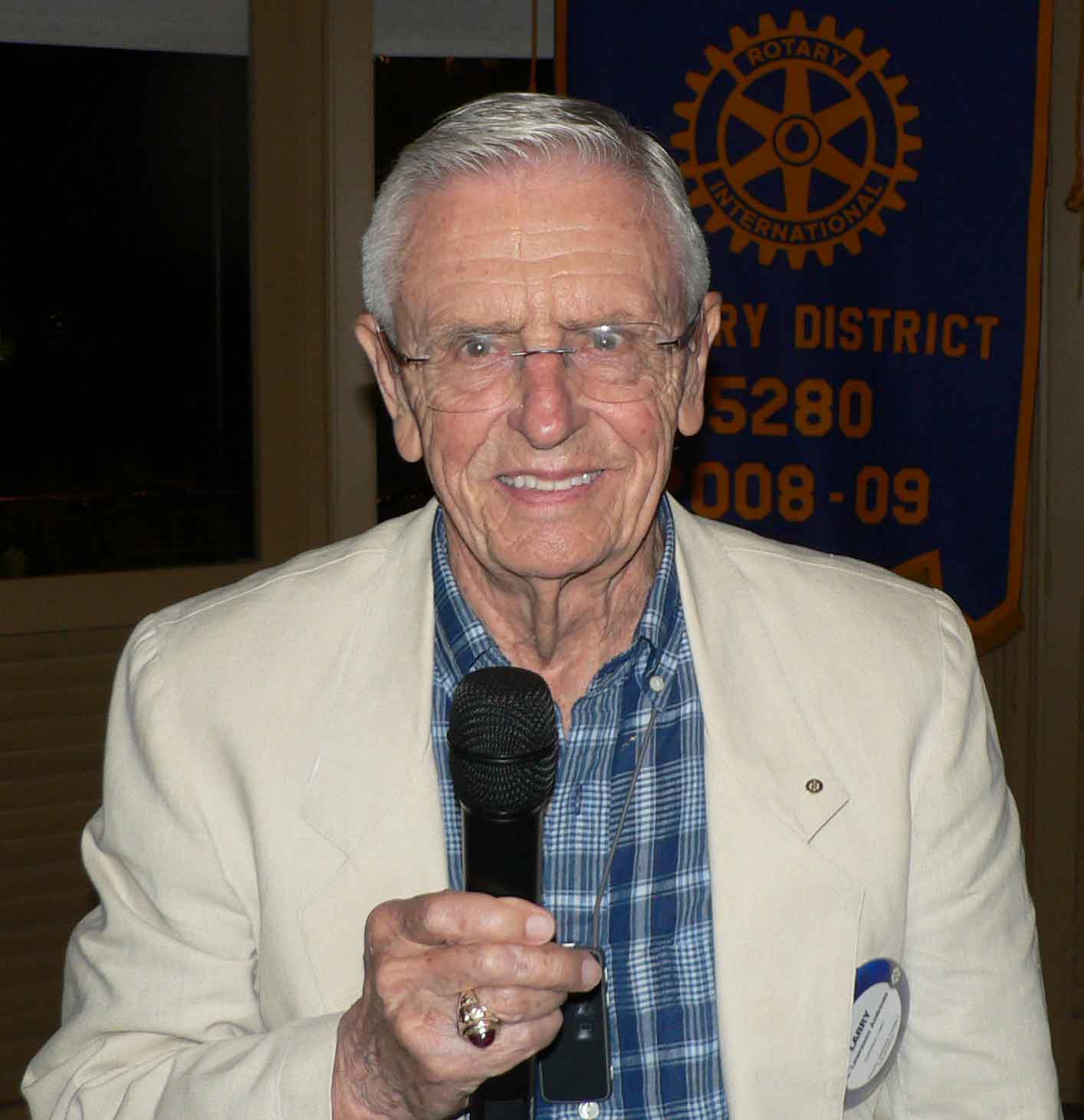 Our long-time Club member Larry Andrews describes himself as an engineer, “watchmaker”, rocket scientist, program manager, and reader, with interests in the arts, travel, people and other cultures. He published his first novel, “A Space Oddity”, but the publisher went bankrupt (Larry denies any responsibility for that), so he had to republish it himself to keep it in circulation. Larry writes about places he’s been, in situations he is familiar with and/or can imagine. He has just published his 2nd novel, which he self-published with the help of Amazon. He had to edit and design the book himself (including front and back cover and layout), but he hired a designer for help. Amazon publishes ~1000 books/week, so social media marketing is essential for successful writing and publishing today. Writers need to read others in order to write well. He meets with a writer’s group at the Library, writing ~2000 words/week and getting feedback on each section from other writers. His book starts with a collection of scenes, outline of characters and environment (places he has been, in this case 12 days on a Caribbean cruise ship), with mystery, murder & suspense. His characters include 2 young CIA agents (undercover as newlyweds), a NY Mafia boss with an attractive daughter and a security guard (a boyhood friend of the male CIA agent), and an attractive Italian female Interpol agent. They observe a partnership forming between the Mafia family and a Colombian drug cartel, but a competing cartel complicates the action. See website for more information, https://www.larryandrewsnovelist.com/. |
PV Chamber of Commerce, Eileen Hupp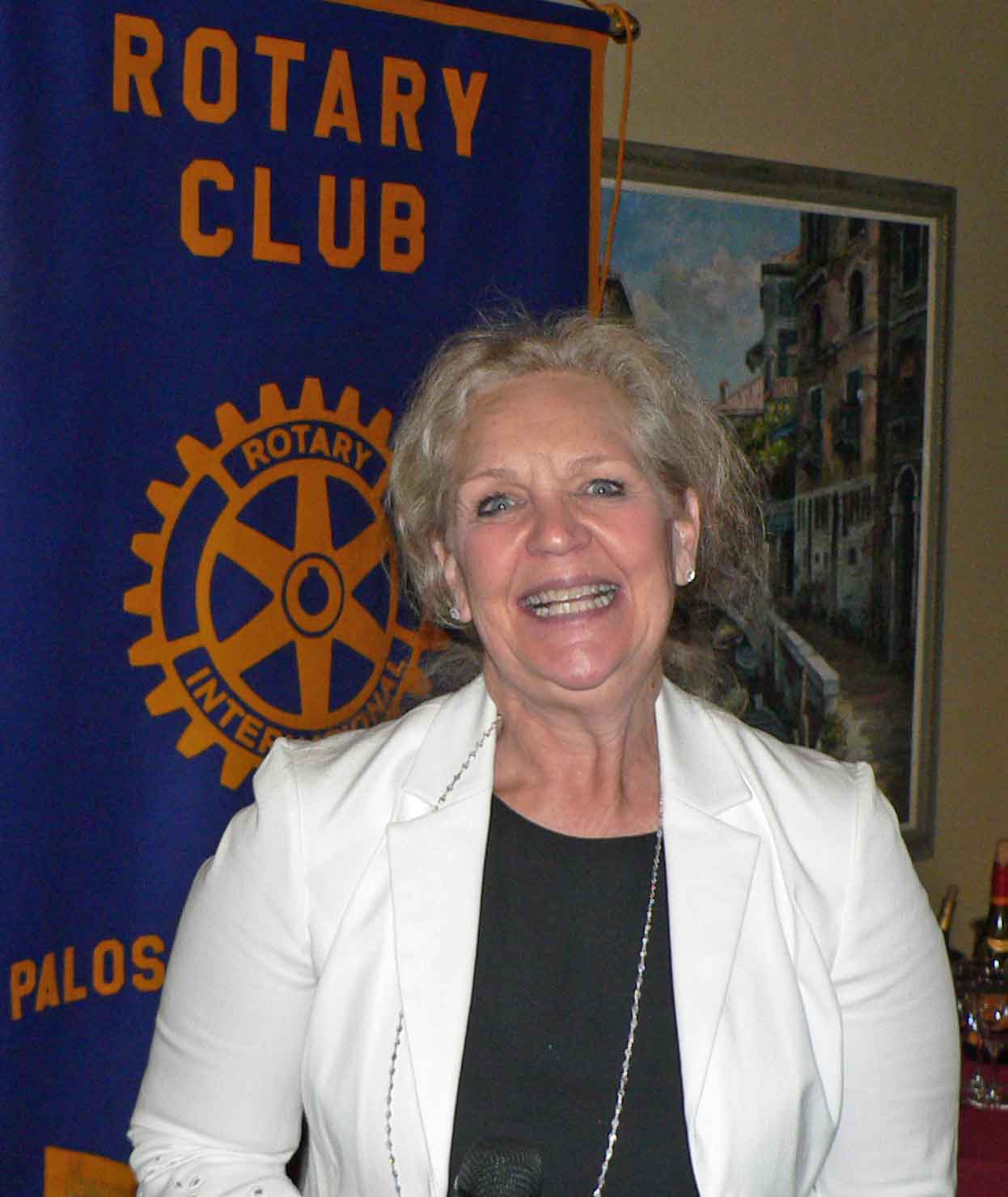 Eileen Hupp, a member of the Palos Verdes Peninsula Rotary Club, has been President & CEO of the Palos Verdes Peninsula Chamber of Commerce for 6 years. Previously, she was a consultant for business development strategies, and has worked with national retailers for mergers and acquisitions, strategic planning, marketing, advertising and finance. She has Bachelor’s and Master’s degrees from Johns Hopkins and an MBA from The University of Chicago. The Palos Verdes Peninsula Chamber of Commerce was founded in 1956 and has over 400 business members. Its new office address is 4040 Palos Verdes Drive North, Suite 205, in Rolling Hills Estates. Its economic programs include the Local First Campaign (shop, dine and do business locally), Community Showcase, Palos Verdes Street Fair and Music Festival, the Salute to Business Award, and economic forecasting. When businesses thrive, quality of life improves in the community. Business promotion includes discounted advertising, business ribbon cuttings, social media, displaying members’ business literature in the Chamber’s lobby, Human Resources consulting, and Office Depot discounts. The Chamber’s website lists businesses with maps, and it sends emails on monthly nonprofit events. (All employees & individual members of member organizations, including our Club, are also members.) Business members can advertise on the Chamber website. There are morning and evening mixers for young professionals. Chamber members can receive business referrals and serve on committees to build business relationships. The Chamber advocates for business interests with local, state and national government officials, holds Legislative Forums for candidates for public office (without endorsement of candidates), and holds an Annual Legislative Lunch. It partners with other local, state and US Chambers of Commerce on areas of common interest. The chamber sponsors educational activities such as high school seminars and the Young Entrepreneurs Academy (a 3-hour weekly students’ program for learning how to start a business; volunteers are needed). Eileen invited us to a Chamber event on Friday, September 8, honoring first responders in commemoration of 9/11. They will also deliver cookies & coffee to them on Monday, 9/11 (volunteers are welcome). Our Rotarian Jackie Crowley was the 2014 Volunteer of the Year. Our Palos Verdes Sunset Rotary Club was recognized as an Outstanding Community Service Organization during the year that Sandy Farrell was our President. Eileen recommends that we send photos documenting our community service projects. The website is https://www.palosverdeschamber.com/, phone (310) 377-8111. |
Rotaract, Dominique Alvarez & Ray Godoy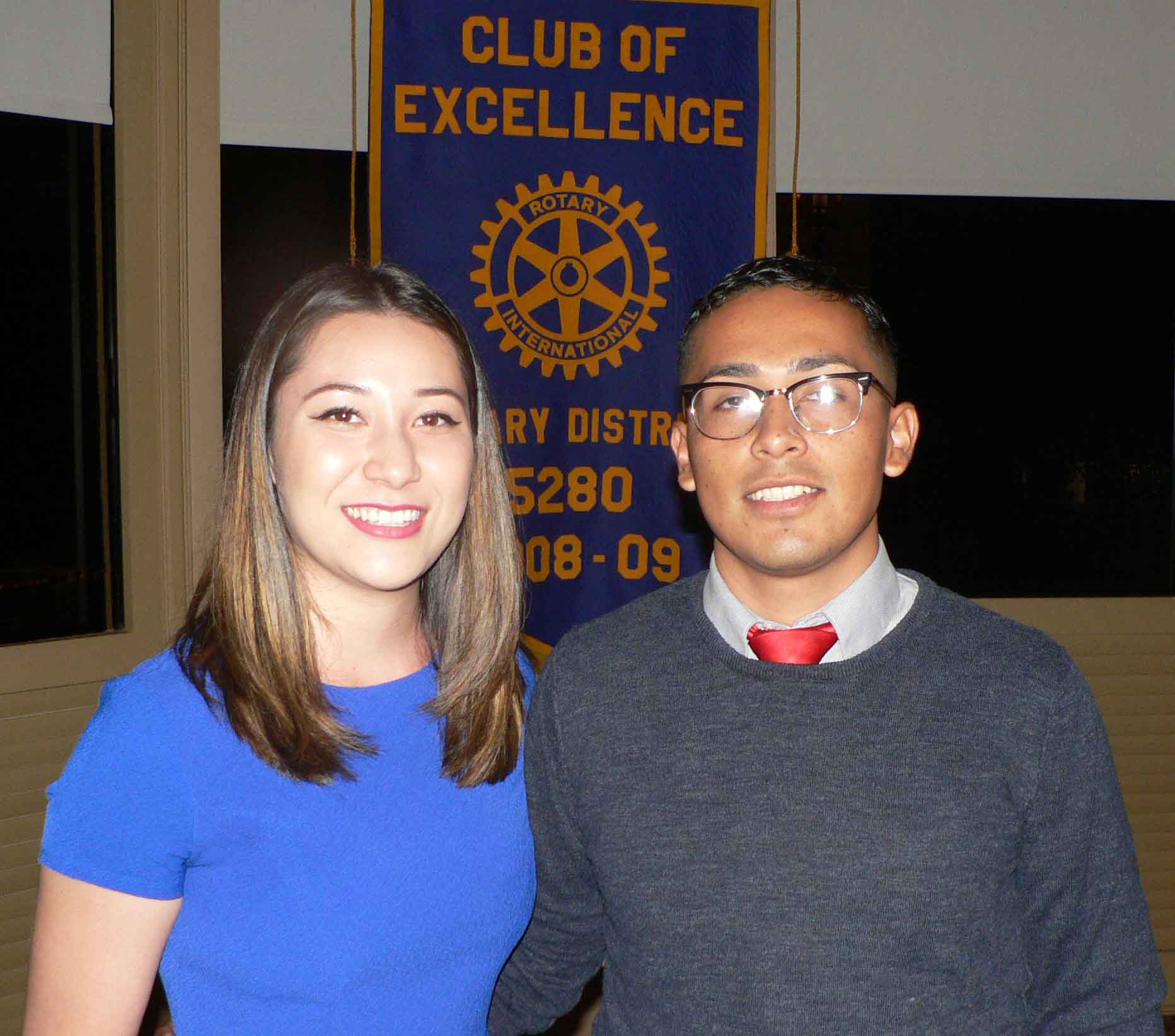 Dominique & Raymond described their experiences at the 2017 Big West Rotaract Institute, representing Rotaract Clubs from many universities. The keynote speakers were Richard King and Brad Howard. The attendees divided into separate groups (called Lions, Golden Retrievers, Beavers, & Otters), writing about their individual characteristics and personalities and how they translate into leadership principles. Among the issues discussed were membership recruitment & engagement, leadership, delegation, and shared experiences, reinforced by group exercises to build experience and confidence. They studied the process of goal-setting, such as “active members by end of semester”, then evaluating at the end of the interval for feedback. They reviewed social events, projects, (such as Boys & Girls Clubs), and Club T-shirts. (It sounds like what we do in leadership training.) |
Jacques and Astrid Naviaux Memorial, Arlington National Cemetery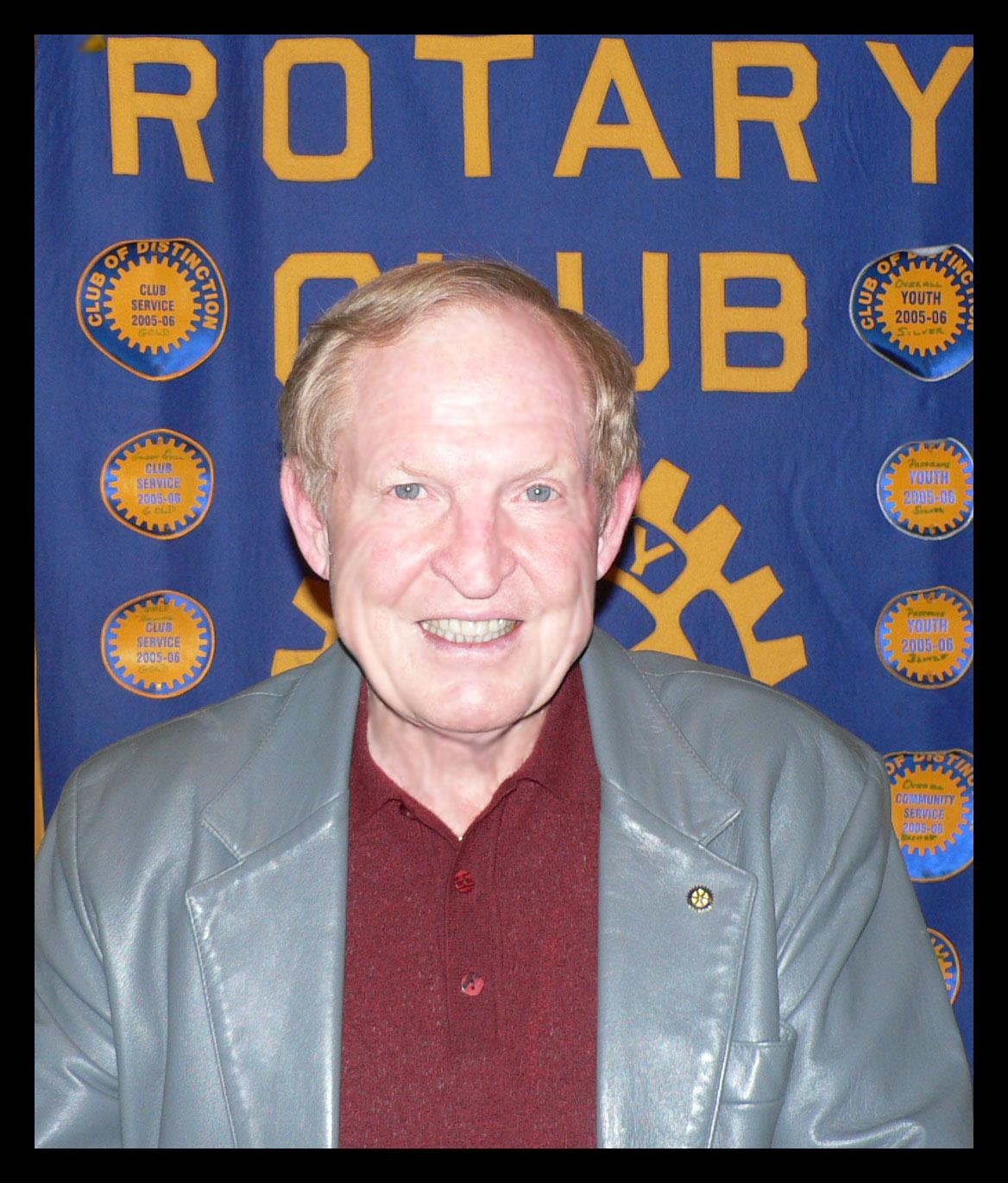 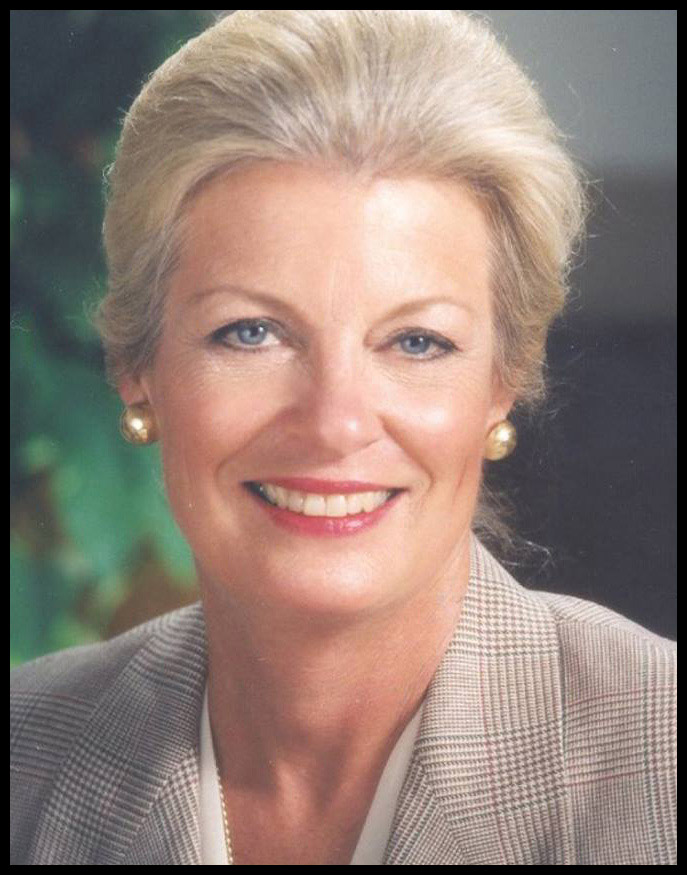 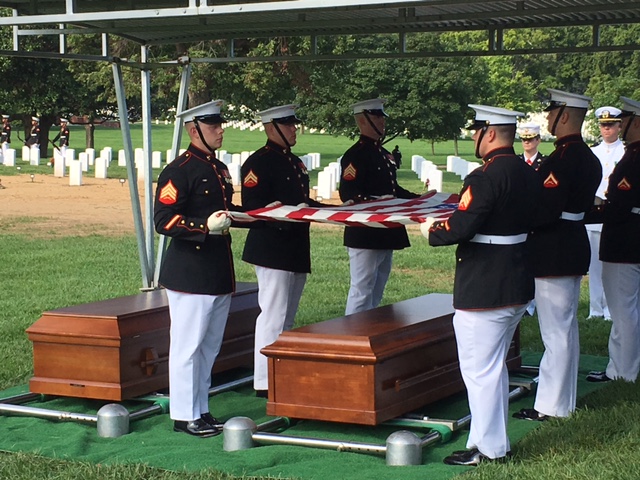 Arlington National Cemetery, Aug 21, 2017 (Arlington Photo by Norman Wong) Jacques Naviaux [LtCol USMC (Ret)] was our Club President in 2010-11. Astrid Naviaux was our Club President in 2005-06. Semper Fi, Jacques & Astrid! |
Wally Christmas, Duty in Cambodia (Part 2)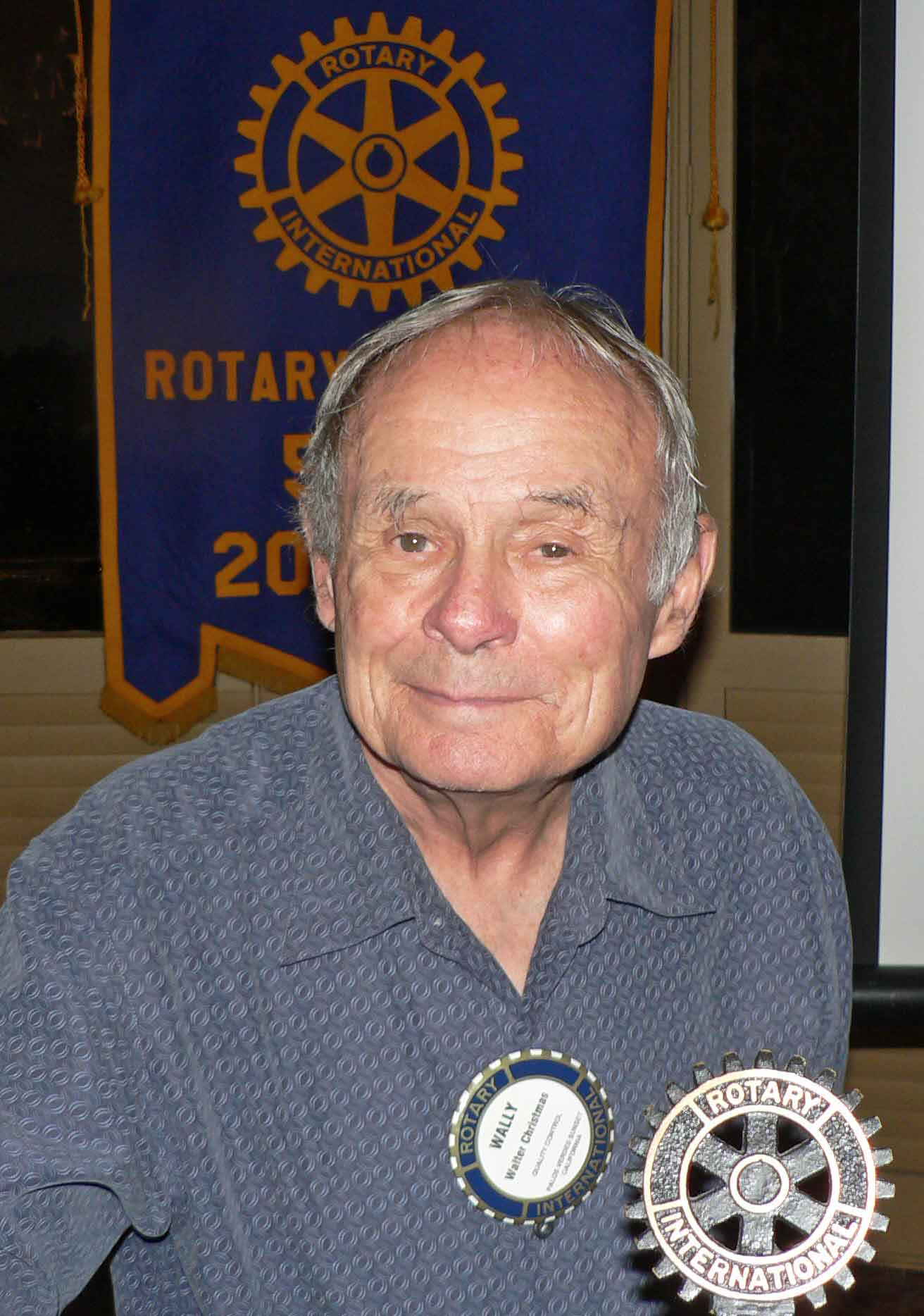 Wally Christmas (RAdm, USN Ret) was stationed in Phnom Penh, Cambodia, from June 1974 to April 1975 while the Vietnam War was winding down. Wally was stationed with the Military Equipment Delivery Team assigned to support the Cambodian military and government against the Khmer Rouge which had taken over the countryside and was closing in on the capital city. (The insurgents were mostly illiterate farmers who resented the educated “westernized” city people.) On April 3, 1975, air evacuation began (Operation “Pull Eagle”) of US and other foreign personnel and selected Cambodians. Wally was on this flight (to Thailand) after his in-country duties had been terminated. By April 10, the road to the airport was cut off, and helicopter evacuation began on April 12 with the closure of the US Embassy. On April 17, the Khmer Rouge forces entered the city, greeted by cheering crowds (possibly hoping to avoid harm to themselves). By the end of the same day, the Khmer Rouge began force-marching the city inhabitants into the countryside to “live off the land” with no other assistance. Other foreigners left behind described these chaotic events; they took refuge in the French Embassy until they could be evacuated. (A video clip from the “Killing Fields” film was shown of this day’s events; the film was about a New York Times reporter who had stayed behind.) The Khmer Rouge under Pol Pot were ultra-Maoists who wanted to return their country to an agrarian Marxist “past”. They summarily executed anyone who showed signs of education, literacy, or foreign influence. An estimated 1.8 million lives were lost, a massive genocide of their own people. |
Tree Planting, Elizabeth Skrzat
Elizabeth Skrzat, a member of the LA5 Rotary Club, has been working with the environmental importance of trees since 2012, and has helped raise $19 million for tree planting in Los Angeles. (RI President Risely has challenged us to plant a tree for every Rotarian.) The tree canopy in the Los Angeles area is in crisis, with aging trees, uneven distribution, and heat-related diseases and pests. The shot hole borer drills into the bark of distressed trees and grows a “fungus farm” inside for its food, which kills the tree. Many trees including 90% of California sycamores are expected to die from this over the next decade. Xylella is a worldwide insect-born bacterium that kills trees from the top down (the San Fernando Valley has an epidemic of this). The City-Plants Partnership includes several organizations such as the LA Conservation Corps, the LA DWP and the LA Sanitation Department. 40,000 trees are planned for planting in low-canopy neighborhoods in the next 2 years. Partnership activities include providing residence trees, street trees, tree “adoption” to families and organizations, and volunteer tree-planting events. Providing a tree-adoption to the care of a family costs $80, and planting a tree along a sidewalk with 3 years of watering costs ~$2000. Elizabeth urges us to create a tree-adoption event, and to reach out to schools and parks departments. We need to determine who would like to have a tree and who would take care of it, and a watering plan until it is established. A study is determining which varieties of trees have improved drought- & pest-resistance. Palms are “nice for photos”, but not very practical for shade and CO2 sequestration. |
Lodel Caplan, Craft Talk
Lodel was born in Mindanao, the southern main island of the Philippines, at a time when there was political unrest on that island due to conflicts between the government and the Muslim minority there. She has 2 younger brothers. The family soon moved to the central islands (Visayas), where her father established a dental office. She describes her early life there as “good”, but her father died when she was age 5. Her mother moved the family to Manila in the northern island of Luzon with relatives, where they could live in an apartment building built by her grandparents. They moved to California when she was 14. Her mother found a job working for a Catholic Church, so Lodel was in the choir and enrolled in the church school. She joined the Toastmasters to improve her confidence and speaking ability, where she met her future husband, Jon Caplan. She works for the administration of the Molina Medical Group, which provides care for Medi-Cal & indigent patients (which has business uncertainty now due to threatened cutbacks in government healthcare support). She feels honored to be a part of Rotary. |
Wally Christmas, Duty in Cambodia (Part 1)
Wally Christmas (RAdm, USN Ret) was stationed in Phnom Penh, Cambodia, from June 1974 to April 1975 while the Vietnam War was winding down. Communist insurgencies in neighboring countries were a US concern, and the US wanted to keep Cambodia a buffer state with a “friendly” government, while the US Congress cut off most funds for military activities. Wally was stationed with the Military Equipment Delivery Team assigned to support the Cambodian military and government against the Khmer Rouge which had taken over the countryside and was threatening the city. (The insurgents were mostly illiterate farmers who resented the educated “westernized” city people.) The capital city was supplied by riverboats up the Mekong River from Vietnam, which soon became impossible because of Khmer Rouge fire from the riverbanks. US C-130 supply planes maintained an airlift, soon replaced by the Bird Airways (a “clandestine” airline). Wally was one of 6 US Naval Officers assigned to work with their Cambodian counterparts for logistics, including supplying parts for the riverboats. He spoke of isolated life in the capital with danger of terrorist acts and rocket-propelled grenades, although his life was comfortable. On April 3, the US government began evacuating US personnel, and Wally was on the first flight out. He mentioned relief agencies, including Catholic Relief Services and World Vision, who were very dedicated but overwhelmed. When the city fell in April 1975, some of them took Cambodian infants out with them for later adoption. (Wally’s 2nd installment talk will cover the “exciting” 2 weeks after his departure.) |
Palos Verdes Sunset Goals for 2017-18
Incoming President Jon Caplan & other board members outlined our Club’s goals and challenges for the coming year. To help implement our Club’s programs, we would like to achieve a net gain of 5 members, and develop a more formal orientation process for new members as well as improve our outreach to past members and guests. We want to continue our 100% Club participation in the Paul Harris Dinner drawing ticket book purchases. We are working on our Kisumu Siany Child Development Global Grant project in East Africa. (This is depending on coordination by the African host Club.) We would like at least one of our Club members to participate in the upcoming District humanitarian trip to Bogotá, Colombia. We want to offer a Rotary Moment presentation once a month on notable activities and programs, to review what we are accomplishing in Rotary. We are working on adopting a community school for a community project, and would also like to participate in or partner with another Club on a project. We need to develop a fundraiser for this year to support our Club projects, and are looking for creative ideas from our members. Please contact Jon. We want to involve our Rotaractors and Interactors as volunteers in our projects. We will continue to support Project EGO and hope to secure a grant from the Norris Foundation. We are working on updating our Facebook page and website to provide more information about upcoming programs. We are creating Club website bios for each member, so Jon needs your input on “who you are”. We also want to create a website page for each of our projects, so project leaders should write up a short description and submit any relevant photos. We are looking for suggestions for speakers for our programs. |
Demotion Dinner for President John Jaacks
Guests and members were welcomed by Master of Ceremonies PDG Dave Moyers. After dinner with mellow background music, John Jaacks was “introduced”. Outgoing Officers and Board Members were thanked for their service during the Rotary Year. Our recently departed member Past-President Astrid Naviaux was remembered for her service including planning this Demotion Dinner. DG Cozette Vergari presided over the Demotion and presentation of Past-President pin to John Jaacks. Jon Caplan was installed as Incoming President. The incoming 2017-18 Board of Officers was sworn in. After President Jon Caplan’s acceptance remarks, PDG Dave Moyers gave closing remarks, and the meeting was adjourned. |
America’s Great Loop (on a Yacht).png) Steve and Meredith Shaw retired in October 2012, and bought a 45-foot boat in the Miami area to navigate the Great Loop (see map). With rivers and connecting canals, the eastern 1/3 of the US can be circumnavigated like an island. Their year-long trip of a lifetime covered ~7000 miles, passing through ~140 locks and under many bridges, illustrated for us with a series of travelogue photos. They met many other “Loopers” and friends along the way. They started from Key Largo and Key West in Florida, going up the East Coast. They showed photos of manatees, Cape Canaveral rockets on display, container ships, and occasional biking into a town for supplies. They saw Staten Island 8 months after hurricane Sandy, and New York Harbor. They went up the Hudson River past West Point and took the Erie Canal to Canada, where they passed through the Trent Severn Waterway to Georgian Bay (northern Lake Huron). They reentered the US and visited Mackinac Island in Michigan, then along the east coast of Lake Michigan to Chicago. They entered the Chicago River and then the Illinois River, where invasive Asian carp were seen characteristically jumping out of the water (when they hear the boat motor). From there they went down the Mississippi River with its many horseshoe bends, to the Tennessee and Tombigbee Rivers and to the Gulf Coast. They ended up at Fort Myers in Florida, where they were greeted by a large school of dolphins in celebration. (If you have a year of spare time and a boat on your hands, it sounds like an interesting experience.) |
US-Mexico Relations, Eddie Varón Levy.png) Eddie Varón Levy was introduced by Bob Welbourn, a defense attorney who has worked with him for many years. Eddie Varón was educated at Torrance West High School, El Camino College and CSU Long Beach. He received his law degree in Mexico City. He has offices in Mexico City and in Torrance, managing international criminal & civil litigation (“Justice Knows No Borders”). The US-Mexico border spans ~3000 miles, some of which is in the center of the Rio Grande River, making the recently-promoted concept of building a border wall there problematic. He reviewed the long history of US-Mexico relations and the many areas of mutual cultural & economic interdependence. Political controversies on the international drug trade rage on both sides of the border. There are many cross-border families and cultural relationships. Eddie Varón’s legal services deal with unique border-related criminal issues, advocating for constitutional rights of defendants. Other areas include administrative law, personal injury claims, and corporate and business law. He has helped clients accused of crimes in Mexico and the United States, and clients facing extradition, and has arranged prisoner exchanges with these governments. He has participated in international arbitration proceedings and discovery, administrative hearings for Social Security and Workers’ Compensation, and arbitration before regulatory agencies of the North American Free Trade Agreement (NAFTA). He has pursued compensation for injuries from negligence, product liability, auto accidents and wrongful death. He helps clients with business formation and setup in the US and Mexico, international business disputes and regulatory hurdles. |
Lew Bertrand, Craft Talk.png) Lew Bertrand graduated from Loyola University in 1965, during the Vietnam War build up. (He was rejected by the US Army draft due to a high school knee injury.) He started working for the Credit Department at Uniroyal, which he found was 2 years behind in its billing. After cleaning up a mess there, he was transferred to the Pacific Northwest area. Then he began working for the Pacific National Bank on Manchester Avenue. He did every job in the bank as a management trainee. About this time, he married Kathy. Then he transferred to Malaga Cove. He described his adventures in bank management (never a dull moment). He moved up the management ladder and worked in San Pedro. He was sponsored to Rotary by Sylvia Benko & Marilyn Klaus. He became President of our Club in 2007-2008, and District Governor in 2012-2013. In 2015-2016 he became our Club President again (environmentally-friendly recycling program). He has also held many District positions as well as Club offices. |
High Schools Students of the Year (Audrey Dahlgren).png) Club Vocational Co-Chair Audrey Dahlgren introduced the 2 Students of the Year, Dean Dellovade (Palos Verdes High School) and Max La Forest (Peninsula High School), their parents, and their school counselors, Teresa Hoffman, Joanne Lewis, and Julie Arico. Their counselors reviewed the students’ high school contributions, including good grades, initiative, leadership, and extracurricular activities. Each received a $1000 Scholarship and a plaque from our Club. Dean has been admitted to the University of Washington where he plans to major in business. Max has been admitted to California State University at Long Beach where he plans to major in microbiology. We extend our congratulations to these outstanding students and wish them the best in their future careers! Thanks to Audrey Dahlgren for her work in planning and coordinating these awards, and to the school counselors for nurturing our future generation. |
Salvation Army, Dr Jim Hartman.png) Jim Hartman is a member of the Palos Verdes Peninsula Rotary Club and twice Past-President. He grew up in Ohio and completed his education at Ohio University with MEd in Counseling and Student Personnel Services, MA in Sociology, and PhD in Higher Education Administration and Counselor Education. After moving to California, he became Director of Institutional Planning & Accreditation at The Salvation Army College for Officer Training at Crestmont, on Hawthorne Blvd in Rancho Palos Verdes. (This campus was formerly the Loyola Marymount College, which moved to the Miraleste area of Rancho Palos Verdes.) The Salvation Army was formed in London in 1865 by Rev William Booth, who left his ministry in the Methodist Church to minister to the poor in the East End of London, England. To further its religious commitment for meeting the needs of the disadvantaged, it became a military-like organization with military ranks and uniforms. It spread to other countries, and helped provide important community services to victims of the devastating 1906 San Francisco earthquake. Since then, it has grown into one of the world’s largest charitable organizations in 107 countries. It has 4 administrative Territories in the US, including the Western Territory (13 states), providing hundreds of centers for feeding seniors and homeless, low cost senior housing, day care centers, energy assistance programs, addiction treatment services, vocational training, youth centers, residential and day camps, and education and tutoring programs. The College for Officer Training in Rancho Palos Verdes trains officers to give leadership to these programs and services. There are 4 such colleges in the US, offering a 2-year program for ministry, Bible study, social studies and supervised field-work. Families can live on campus, and spouses who work together are given equal ranks. Graduation is Friday this week. Jim Hartman showed photos of the beautiful campus. |
Project EGO Awards Banquet.png) Dinner was served, while award recipient Gabriel Lamas played his guitar and sang. Robert Babb, MFT, introduced the 18 graduates and reviewed their progress and educational/career goals. Project EGO Chair John Turner presented checks from the PV Sunset Rotary Club, and PVPUSD Coordinator Kelly Baranick assisted. Congratulations to the 18 graduates of the 2016-17 Project EGO Program, who received the following awards (totaling $26,500 from our Club) toward their educational and career goals: $2000 Jenevieve Ghaly $1250 Manal Gill $2000 Christopher Vallejo $1250 Austin Jacks $2000 Rhiannon Prine $1250 Gabriel Lamas $2000 Muneeb Khan $1250 Sally Ishizawa $2000 Jeffrey Jimena $1000 Kevin Dill $1500 Joshua Sanchez $1000 Maverick Marcellana $1500 Natalia Moreno $1000 Mia Martinez $1500 Cameron Hosmer $1000 Eric Hauschildt $1500 Courtlyn Foster $1500 Brianna Garcia |
Gang Report, Martín Flores.png) Martín Flores was introduced by Bob Welbourn, a defense attorney who has known him as a consultant for many years. Martín graduated from Roosevelt High School and grew up in a gang-influenced neighborhood in Boyle Heights, where 88% of the students perform below grade average. Many of them have single parents and lack role models. However, he received a Rotary scholarship, and attended UC Berkeley and UCLA. While in college, his 17-year-old brother was killed by gang activity. After college, Martín worked for the city of Inglewood, organizing youth activities. He did community relations work in Watts. He discussed how providing educational opportunities for incarcerated people provides better opportunities for them when they return to their community after release, and reduces recidivism. Building leadership skills and self-esteem help provide viable alternatives to criminal activities. Martín has been a gang expert for 10 years, and has served as an expert witness in court cases for homicides and capital offenses. Being familiar with different gangs in the Los Angeles area and their territories, tattoos, “signs”, graffiti, and vandalism, he has been able to provide expert testimony when the penalty depends on whether a defendant is a participating gang member. He gave the example of riding in a car with associates when someone else in the car pulls out a gun and shoots a victim. Prosecutors usually allege that all individuals present are in the gang, but this is not necessarily true. Associates, friends and relatives of gang members are not necessarily gang members themselves. He works to assess these relationships and testify about this information to the court. |
Student of the Year (Rancho Del Mar and Marymount)
|
Karla Munguia, Craft Talk Karla, our newest member, works in Lien Resolution Service. She was born in León, near the Pacific coast in Nicaragua, where her father was a Rotarian. She attended school there (K-12) at the Colegio Pureza de María. The Nicaraguan Civil War was going on, and she wanted to see the world. She came to the US in 1981 and attended CSU Los Angeles while working part-time. (Her son was born here in 1986.) She works on resolving liens for denied claims in the California Worker’s Compensation System, for medical providers and interpreters. (Enforcement and collectability of judgments depends on the debtors’ assets.) She joined the Calvary Chapel in Downey and began studying the Bible. She went on a short mission trip to Cebu in The Philippines in 2013. To promote good financial stewardship, she believes in pursuing ethical work as one’s mission field (“Preaching without words”). She was influenced by Rabbi Lappin who had been interviewed on a religious program. He promoted the virtues of character, integrity and service; cultivate these, and you will prosper. Living by these principles, Karla believes in serving without expectation of reward, which is what led her to join Rotary. Welcome to our Club, Karla! (We have service projects waiting for you!) |
Sharefest, Christopher Yco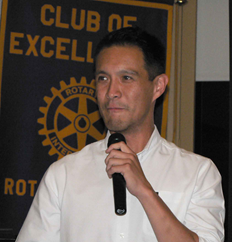 Christopher Yco, formerly of the Lomita-Torrance-Airport Rotary Club, joined Sharefest to work full-time changing the learning environment of at-risk students. (He met Todd Doram, a Sharefest guest here tonight, in Rotaract.) Chris presented a video of a workday last year showing volunteers renovating school classrooms, gardens, playgrounds and athletic fields. (This is similar to our Club’s workday scheduled at Wilmington Intermediate School on April 29.) Among Sharefest’s projects is the Summer Youth Development Academy in partnership with CSU Dominguez Hills, providing youth with opportunities to expand their potential and experience hope as they identify needs in their communities and discover leadership skills. This programming includes daily instruction and leadership development, mentoring, academic enrichment, swimming and athletics for at-risk students. A 4-week high school program is scheduled for July 10-August 4, 8-1 PM M-F, and a similar middle school program is scheduled for the same time. They are served breakfast and lunch, and are bussed in if necessary. These programs have demonstrated higher graduation rates and test scores, and decreased gang activity. Chris invites us to come to CSU Dominguez Hills during this program to see what they do there (see www.yda.sharefestinc.org). Other Sharefest projects include activities at 4 LAUSD Continuation Schools, a year-round Youth Leadership Council, and a Youth Development Center. Funding comes from community organizations and corporate donations, and depends on volunteers like us to do the work. Those who volunteer for the service projects (such as our project at Wilmington Intermediate School) experience the gratification of making a meaningful difference in the lives of youth who are struggling to transition to productive adult lives. |
Rotaract Club (Marymount California U)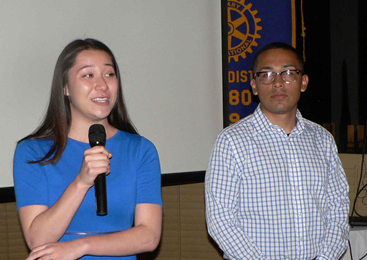 Victoria Perez, who helped lead the MCU Rotaract Club while she was a student there, introduced our Rotaract speakers, Dominique Alvarez and Raymond Godoy. Their Faculty Advisor is Dave Tomblin, an Associate Professor of Business Administration there, and also our Area AG for Club Service and a member of the LA5 Rotary Club. (He proposed that our Club fund a scholarship for Marymount California students.) Dominique Alvarez is a Junior in Media Studies (Broadcasting and Journalism) at CMU. She was awarded Student of the Year by our Rotary Club in April 2016 for her activities in the award-winning Rotaract Club, including fundraising to End Polio. Among recent Rotaract activities is a fundraiser selling Rotaract Club “Mariner” t-shirts ($15), with proceeds going towards the Club’s future service projects. Raymond Godoy is a Senior in Business Administration at CMU. He served an internship in the Vernon Police Department and now has a part-time job there. He plans to continue working part time while studying for an MBA, and is interested in City Administration. The Marymount Rotaract Club has won awards at the District level as well as on campus for its many outstanding activities and events. These have included End Polio Now fundraising, organizing a Backpacks & School Supplies collection for the District’s Panama Humanitarian Project (2016), Cabrillo Beach cleanup, collecting baby supplies for Camp Pendleton military families, elementary school service, District 5280 Youth Leadership Conference, Palos Verdes Land Conservancy, and Holiday Toy Drive. |
AirTech Advanced Materials, Brian Grossheim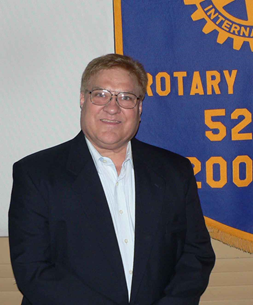 Brian Grossheim is a technical specialist for AirTech International, a global advanced materials company owned by Bill Dahlgren, Audrey’s spouse. The company was started in 1973 in San Bernardino, and has expanded to many facilities in foreign countries with ~850 employees. Brian described various materials and fabrication techniques used for customers, including military. The company designs and produces vacuum bagging, composite materials tooling, fiberglass & other auxiliary materials, films, tapes, and sealants for tubes. The company tries to be a 1-stop shop for complex materials used in panels, aircraft, boats, racecar carbon fiber chassis, wind-energy blades, and circuit boards. Photos of construction processes and finished products were shown. |
Bob Welbourn, Unusual Legal Cases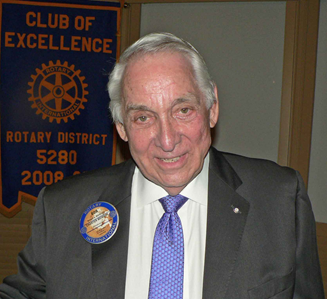 Bob Welbourn was the Founding President of our Rotary Club. He formerly participated in scuba diving with other Rotarians, and still wears his rusty Rotary badge from the days when he took it on seawater dives (“Surface Above Self!”). Bob is a criminal defense attorney in Los Angeles. He described 4 of his most unusual legal defense cases. The home of a marijuana legalization advocate was raided ~10 years ago by the LAPD, who pulled up 200 pounds of marijuana plants there. The defendant had been medically discharged from the US Air Force for sickle cell anemia, which causes recurring attacks of severe pain in the bones and internal organs. Her only pain relief was morphine and marijuana, and the marijuana worked better. She was managed by a UCLA physician who testified that he had prescribed marijuana for her pain relief. There were community demonstrations on her behalf, and a sensational trial resulted in her acquittal. A double homicide was committed by a hotheaded defendant, one of 2 men in his car, who shot and killed 2 people in an adjacent vehicle in apparent road rage, and escaped. The trail went cold until 1 year later when one of the 2 was arrested on a parole violation; a gun was recovered from him, and ballistics studies linked it to the earlier murder. He was convicted and imprisoned. A 16-year-old boy in Compton, trying to join a gang, engaged in initiation activity when a tagger was seen painting over the gang’s graffiti, a disrespectful act. One of the gang members went up and shot the tagger dead. A girl who witnessed the shooting later saw this client on Facebook and identified him to the police. When he was arrested, he admitted the crime to the police. The court sentenced him to 25 years to life in prison. An eccentric Manhattan Beach resident (who claimed to have an MD & PhD from Canada) was repairing his roof. Another person came and offered to help in exchange for a room there, which he accepted. However, soon several of this person’s “friends” were also moving in. A woman in that group accused this resident of abusing her (battery). Police officers came to the house, arrested the man and beat him badly (their body cameras had been turned backward so they recorded only blank video). A restraining order was taken out forbidding him from coming within 100 yards from his own home. (The outcome is still pending.) |
Victoria Perez, Craft Talk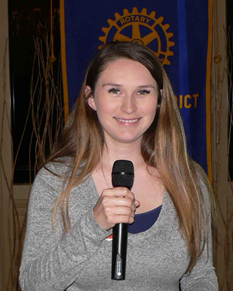 Victoria Perez attended the Port of LA High School, where she was Yearbook Editor and Sailing Team Captain. She attended Marymount California University majoring in Business & Global Studies and joined the Rotaract Club there, becoming its President. Her big leadership year was 2015-16 as the District 5280 Rotaract Representative, and Student Government President responsible for managing the budget, running meetings, managing campus events and overseeing student organizations. Her Rotaract Club was the Outstanding Club on Campus and was recognized in District 5280 for its outstanding successful projects. Victoria’s first job was at age 16 as Assistant Events Coordinator for vendors providing gifts to celebrities for marketing purposes. She worked for Bon Appétit Management Company, catering at Terranea Resort. She is now Project Manager at Leap & Bound Academy (www.leapandbound.net), managing customer service, events, teacher training activities, holidays, and summer programs. Victoria’s hobbies include design, card making and candy making. She was exposed to Rotary in high school by receiving a scholarship from the San Pedro Rotary Club, and values the leadership experiences, serving others, and networking with interesting people. |
Jason Agcaoili, Craft Talk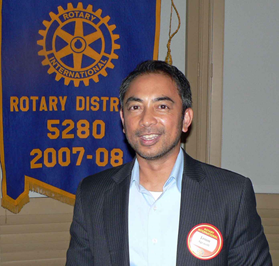 Our new member Jason Agcaoili was born in the Philippines where his father was in the military. He joined the US Air Force as an intelligence analyst. He left the Air Force in 2001, but after the World Trade Center attack on 9/11/2001 in New York, he worked for the Defense Intelligence Agency for 9 years. He worked in marketing for Boeing in 2013-16, and then became a realtor for Coldwell Banker in Palos Verdes. He is married and has 2 children, age 4 & 2. Jason has been active in Veterans Affairs and belongs to the American Legion Post 184 in Redondo Beach. He showed photos of villagers & poverty in Afghanistan during his duty there. These experiences motivated him to the ideals of service and community involvement. He also wants to be a good role model for his children and provide the benefits of his past experiences. |
Chase Thacker, Craft Talk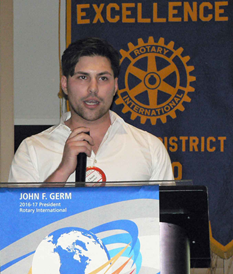 Our new member Chase Thacker started his first job at age 13, helping his father with maintenance at a preschool. He had dyslexia in school, but thrived in the Boy Scouts in North Redondo Beach and then in South Redondo Beach, attaining Eagle rank at age 14. Exercising leadership skills, he started an Adventure Crew. The Venturing program is for Scouts over age 14 (now including young women) to focus more on career exploration and less on advanced outdoor activities. After graduating from Redondo Union High School, he attended community college while working for his family. He loved climbing and backpacking in Colorado, and attended the University of Colorado at Boulder for a business economics degree. Chase helped his father in business from an early age and started a Gymboree franchise, eventually expanding to 9 centers in Los Angeles. He became frustrated that the franchise contract wouldn’t allow “innovative business development”, and lost a lawsuit on that issue. He started Tumble Camp for preschool children, but it struggled due to not being a full-day program. Now his Leap & Bound Academy (LBA) owns 3 preschools in Torrance, Redondo Beach, and The Medical Center (2 Blocks North of PCH in Torrance). Chase works as Operations Manager with many roles, never boring. His future plans include improvements in the website, marketing, teacher morale and employee perquisites, training, customer database, and maintenance department. He also wants to open an infant care center with bus transportation. |
End Polio Now Campaign, Shirley Giltzow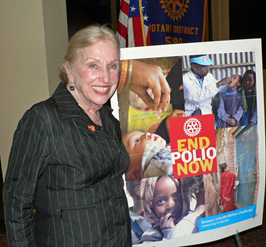
Shirley Giltzow is our District 5280 PolioPlus Chair. She is pleased to report that only 3 polio cases have been reported in the world so far this year, in Afghanistan & Pakistan (where there is still military conflict and misunderstandings). The number of cases has steadily decreased from 350,000 annually over the last 3 decades, and we are “This Close” to eradicating polio. She showed photos of polio vaccination drops being given. This activity has come at a high price, with 65 polio service workers killed in the last 3 years in this war-torn area. This year is the 100th anniversary of the Rotary Foundation, started by Archie Klumpf with $26.50. Last year our District achieved its fundraising goal of 100% of members contributing $26.50/member, the first District in the world of Rotary to accomplish this challenge. Our District goal for fundraising this Rotary year is the same. Bring in your checks (made out to the Rotary Foundation for PolioPlus), which our Club Treasurer can forward to the District. John Jaacks related his family member experience with polio many years ago. Ralph Black described his medical school experience with the polio epidemic, and Wes Bradford described his participation in the multi-District Polio-Corrective Surgery Project to Uganda in 1998 and to India in 2000. |
Dan Dreiling, Chief of Police (ret), PV Estates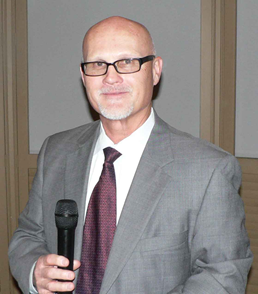
Dan Dreiling was born and raised in Los Angeles. He graduated from the FBI Academy, and joined the Palos Verdes Estates Police Department in 1981. He became Chief, and retired in 2013. Because of political turmoil on the City Council and loss of the City Manager, he was appointed interim City Manager, from which he is now also retired. He discussed the stresses in law enforcement today related to effects of political partisanship, public policy changes and social trends. Sensational publicized police shootings of black men have led to calls for quick justice, although a thorough investigation by a neighboring law enforcement agency, prosecutors, local politicians (for city liability), and sometimes federal civil rights investigators may take up to 6 months to ensure reliable documentation of the facts for an unambiguous judgment of fault. Bystanders may have conflicting interpretations of what occurred, and delay in announcing conclusions is often interpreted as “cover-up” or delaying to allow the controversy to fade. He is concerned about the consequences of California legislation releasing prisoners early (ostensibly those without violent tendencies), to relieve prison crowding (in response to a federal court ruling and constrained by chronic budget problems). Also, some crimes previously classified as felonies were reclassified as misdemeanors. Some state prisoners have been reassigned to local jails for at least part of their sentences, increasing jail crowding and inmate stresses. Of 50,000 statewide releases, about 18,000 are in the Los Angeles area. Many cases are settled with reduced charges to minimize costs and court congestion. He reviewed his experiences stemming from a meeting of law enforcement officers at the Holiday Inn Hotel (now DoubleTree) in Torrance on February 14, 1994. They were mostly unarmed and not in uniform in a room, when a gunman barged in and ordered them to put their hands on top of their heads. Chief Dreiling recalled raising his hands cautiously with a gun at the back of his head. The gunman went to another officer who was not cooperating, and shot him dead. Another officer was also shot, when Chief Dreiling and other officers wrestled the gunman to the floor and held him immobilized while trying to retrieve the gun. Chief Dreiling held his knee on the gunman’s neck to help keep him immobilized until help arrived. The District Attorney’s investigation of alleged “lethal force” by Chief Dreiling against the gunman on the floor became a stressful 6-month nightmare for him, with investigators who had not been there questioning whether the force he used was excessive in severity or duration to immobilize the gunman before handcuffs were made available. News media coverage about the tactics used was questioning and unfavorable. (The Chief survived the controversy, and is still here. He seems relieved to be retired.) |
Rolling Hills Country Club Project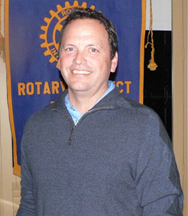
Greg Sullivan is the General Manager at Rolling Hills Country Club. He graduated from Oklahoma State University in 1988, and then worked for La Quinta and for La Canada-Flintridge Country Club before coming to Rolling Hills CC in 1994. The Rolling Hills Country Club golf course closed in 2015 for a major remodeling project. The club’s lease with Chandler Sand & Gravel was expiring and the gravel pit with its heavy truck traffic had closed. Major earthmoving (6 million yds³) was required for contouring the hills and deep holes. A developer is building 114 houses on 1/3-acre lots on the edge of the property, and additional land was obtained from Torrance requiring a complicated border exchange with Rolling Hills Estates. Planning for a new golf course and facilities for family activities started in 2002, but was stopped by the 2007 stock market crash. Planning resumed again several years ago with the improving economy. There is a 7000 ft² clubhouse plus family amenities such as swimming pools and exercise facilities on 220 acres, with a view of city lights. The expectation is to appeal to many more families in the broader South Bay area. There will be an Open House around October 2017 (delayed somewhat by recent rains). In the meantime, the 465 active members have had exchange privileges at other area golf clubs. There are 100 new employees (some of whom were laid off 2 years ago). The current building (where our Rotary Club meets) will be sold and probably torn down. The 6th and 7th holes of the course will be on this side of Narbonne, and the other holes and clubhouse are on the other side through the golf cart tunnel. |
David Moyers, 2017 District Mexico Humanitarian Trip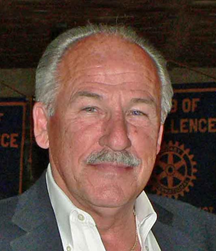 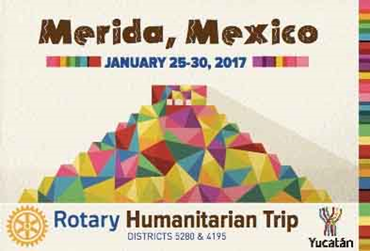 Dave Moyers spoke about the 2017 District 5280 International Humanitarian Trip to Merida, the capital of Yucatán state in southeastern Mexico, January 25-30, 2017, with Mexican District 4195. The following projects were implemented: · Emmanuel Day Care (Play area & kitchen equipment) · ADN After-school Program (Musical equipment and art supplies) · Merida Living with Diabetes (Furniture, computer devices, medical devices, A/C and promotional materials) · Ticul (Sewing machines for economic growth) · Muaro Environmental Museum (Planting trees) · Merida Montejo (Water filtration for families) · Tizimin (Special needs school, baking table and kitchen equipment) The post-trip was to the Punta Cana Resort and Tulum (with ancient Mayan ruins) on the Caribbean coastline. |
OFFSITE Dinner at the Whale & Ale, San Pedro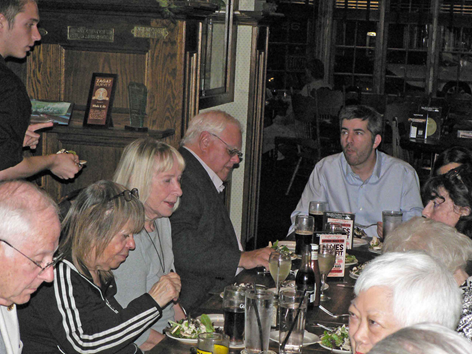 Our Club meeting was offsite at the Whale & Ale on 7th St in San Pedro, with “authentic English pub grub”. We socialized and enjoyed the camaraderie and food (Fish & Chips seemed to be the most popular menu choice). Before and after the dinner hour, Marylyn and Chuck Klaus hosted shoppers at their Grand Emporium (Music, Books, Movies) next door (323 W 7th St).
|
Chris Albert, Palos Verdes Performing Arts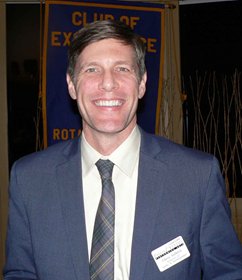
Chris Gilbert performed at the Norris Theatre while attending Rolling Hills High School. After receiving a BA in Communications and MFA in Theater, he has performed on stage and as a host for benefits and galas at PVPA. He has also written plays and appeared in films, television and commercials. After sales and marketing experience elsewhere, he is now producing the professional stage productions at the Norris Theatre. His father was a Rotarian in Michigan, so he reviewed the Rotary Four-Way Test on the role of the Norris. PVPA produces its own professional plays and musicals, including directors, technical crew, casting, and designing and building of sets. It also presents high-quality stage productions from throughout the country. It brings well-known musicians and ensembles for Cabaret-style performances, with reserved table seating, catered meals, bar and dance floor. The Chamber Orchestra of the South Bay presents classical concerts. Rock, pop and country performers are scheduled. The Norris is also a multipurpose venue for community events. The PVPA is involved in community outreach to introduce students to the fine arts, develop children’s appreciation and enrichment in dance, singing, music and acting, and recruit future performing talent. A new building is planned for young people. Attending performances, buying season subscriptions and/or joining one of the support groups helps to sustain this valuable community resource. As a nonprofit organization, it also depends on the caring and generosity of businesses and community members to maintain its tradition of excellence. The Palos Verdes Performing Arts 2016-17 Season brochure can be downloaded at http://palosverdesperformingarts.com/1617BrochureNOCROP.pdf. |
Chuck Klaus: History of Recorded Music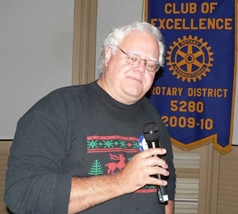
Our Club member and music collector/connoisseur Chuck Klaus has been involved in music presentation for many years, including for NPR & PBS stations and also teaching at Syracuse University. He started collecting records at the age of 5, and hasn’t stopped since. He presented his “Highways and Byways of Recorded Music”, as a DJ playing and discussing interesting samples of his recordings representing the history of recorded music. He reviewed basic recording milestones rather than a full professional history. The first music recording was in the 1860s. Among the prominent historical recordings were original soundtracks from Sousa conducting “Stars & Stripes Forever” (1929, mellower than today), Brahms playing “Hungarian Dance #5” with voiced intro (1889, recorded in wax), Grieg playing Wedding Day at Trollhaugen” (1903), Strauss conducting “Ein Heldenleben” (1944), Elgar conducting “Oh God, Our Help in Ages Past” (1928, organ & choir with early stereo effects), and Stravinsky conducting “Rite of Spring” (1960). American music history included Gershwin playing “Rhapsody in Blue” (1927), and Copland performing “I Bought Me a Cat” (1951, composed for children). Recordings of great voices included Tamagno singing Verdi’s “Othello: Esultate!” (1903). He ended up with Horowitz playing Sousa’s “Stars & Stripes Forever” (1951, piano). |
John Jaacks, Air Force Experience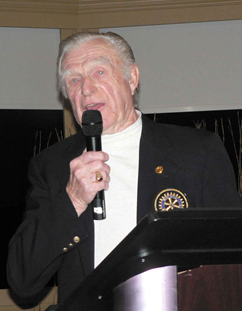
John Jaacks grew up on a farm in Des Plaines, Illinois, where he remembers as a 16-year-old watching a small airplane practicing landings nearby in 1943 during WWII. He became determined to fly. He attended the University of Illinois at Urbana in chemical engineering and AF-ROTC, hoping to become a pilot after graduation. However, the military was downsizing after the war and there was no room for young pilots. When the Korean War started in 1950, he enlisted in the Air Force in hopes of flying, but again no luck. (His father tried to convince him to leave for a business near home.) Eventually, however, he managed to get into an Aviation Cadet program resulting in a commission as a Radar Intercept Officer. He was stationed in Western Alaska flying fighter jets on patrol to intercept any intruding Soviet bombers. He passed around photos of planes he had flown, including the F-86 D, which had been modified for additional radar and other electronic equipment, making it a less maneuverable aircraft. He found his life ambition in aviation, after having been told so many times that he couldn’t do that. “You can’t always succeed in challenges, but never give up.” Many years later he took a master’s degree program in Professional Writing at USC, and with encouragement of his instructor he wrote a book about his military experience, “Contrails: Memoirs of a Cold Warrior”, which required 3 years to write but is now available on www.amazon.com. He read excerpts from this book discussing his early years. |
Holiday Party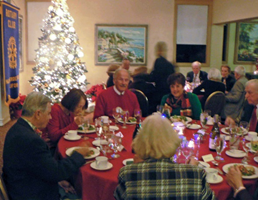 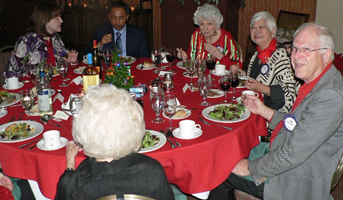 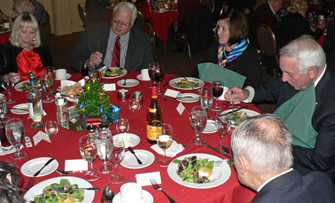 |
Audrey Dahlgren, Student Dance Contest
Audrey Dahlgren introduced 5 outstanding Dance Contestants: Mary Sweetnam, Samantha Liu & Matthew Kim from Peninsula High School, and Hannah Granger & Miranda Kim from Palos Verdes High School. They showed videos of their selected performances. Then the judges (Sue Tyree, Chuck Klaus, Jackie Crowley & Betty Reider) deliberated on their ranking to choose a representative from our Club for the District 5280 Student Dance Contest March 8 at Loyola Marymount University. After careful consideration, Miranda Kim (photo) was chosen as the winner to represent our Club on March 8, and awarded $200. In 2nd place was Samantha Liu ($100), and 3rd Place was Mary Sweetnam ($50). We thank all of the contestants and their family members for their hard work and talent. Special thanks again to Audrey Dahlgren for her work in recruiting such fine contestants from the local high schools. |
"C Nile Sound” Barbershop Quartet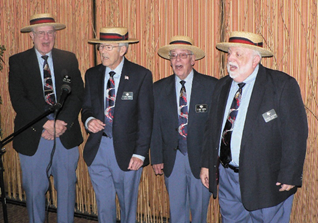
The “C Nile Sound” Senior Barbershop Quartet performed for us (won by Betty Reider in a raffle!). The Quartet members include Bruce Beyne, tenor, Denny Lawrence, lead, Karl Jacobs, baritone, and Rick Llewellyn, bass. They formed their group in 1998 as experienced members of the South Bay Coast Liners Barbershop Chorus. They have 75 years’ combined barbershop singing experience. They have performed for many community and church groups and clubs, and are registered with the Barbershop Harmony International Society. They sang traditional Barbershop Quartet songs, and then donned Santa hats to sing barbershop Quartet adaptations of several Christmas carols. It was a very delightful performance enjoyed by all. Our thanks to them for presenting this event, and especially to Betty Reider for donating her raffle prize and for supporting whatever charitable event she bought her raffle ticket for! |
South Coast Botanic Garden, Peter Olpe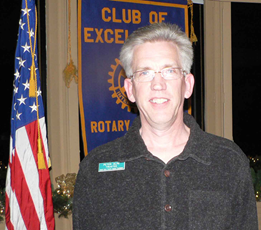
Peter Olpe, an electrical engineer, has been on the Board of Trustees of South Coast Botanic Garden for 6 years and is currently President. He reviewed the history of the Botanic Garden and the ongoing project for its redesign and upgrade. 25 million years ago this area was underwater, and many ocean fossils are still present, including microscopic diatoms whose remains have been mined for abrasives and other industrial and commercial uses. The Spanish explorer Cabrillo first arrived at the Bay of Smokes (now San Pedro) in 1542 and observed the inversion layer in the Los Angeles basin where cooler ocean air is trapped below a warmer layer of air above. Land in the South Bay area was owned by the Sepulveda family since 1809, and bought by developer Bixby in 1880, who leased farmland to Japanese farmers. Frank Vanderlip, President of National City Bank of New York, bought 16,000 acres and leased some land to Great Lakes Carbon for open-pit mining of diatomaceous earth. In 1953 he sold the last of his land to the company, which stopped mining and converted to real estate development and a landfill, including the area under the Botanic Garden which is still settling. In the 1950s, severe smog was building up in Los Angeles under the inversion layer, contributed in part by trash-burning in people’s backyards. The City of Los Angeles bought the open pit mine in 1956 as a dump to replace burning. As it was filling up, Frances Young convinced the City to create a botanic garden over the landfill. Soil was put on top and 400 volunteers began planting. The South Coast Botanic Garden was founded in 1962, and the lake in the center was formed in 1970. Mr Olpe showed a video of a boy with cerebral palsy who found peace and a sense of fulfillment in the Botanic Garden. There are many children’s activities, garden lectures and demonstrations, specialized garden club and floral societies, Audubon Society, holiday displays, weddings and concerts. He reviewed plans for the ongoing upgrades, for which fundraising is in progress. The parking area has settled and needs to be re-leveled. The lake has been drained and is being cleared and cleaned. The 87-acre Botanic Garden has 2500 species of plants from Australia, Mediterranean, southern Africa and California, with wildlife and 200 bird species. Popular features include the Mediterranean Garden, Rose Garden, Water-Wise Garden, Garden for the Senses, Cactus Garden, Children’s Garden, Fuchsia Garden, Dahlia Garden, Herb Garden and Japanese Garden. The Garden is open 9-5 daily. Admission is $9 ($6 for seniors, FREE for Foundation Members). Annual membership starts at $45 for individuals & $65 for families. Donations and assistance with fundraising are welcome. The Garden’s location is 26300 Crenshaw Boulevard on Palos Verdes Peninsula. Further information is available at http://southcoastbotanicgarden.org/ or (310) 544-1948. |
Audrey Dahlgren, Student Speech Contest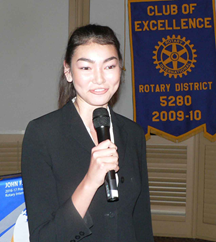
Audrey Dahlgren introduced our 2 Student Speech Contestants, both Juniors at Peninsula High School: Jessica Brunnenmeyer (above), and Sonali Loomba. Jessica Brunnenmeyer spoke without notes, on the application of the Rotary Four-Way Test. Sonali Loomba spoke on Women’s Right to Education in relation to the Four-Way Test. The judging committee included Charley Ferrero, Chuck Klaus and Ralph Black. After careful consideration of both contestants, Jessica Brunnenmeyer was awarded first place and $200, and will represent our Club in the District Speech Contest in March at LMU. Sonali Loomba was awarded $100 for 2nd place. Congratulations to both contestants for their talent and hard work in preparation! |
District Governor Greg O’Brien’s Visit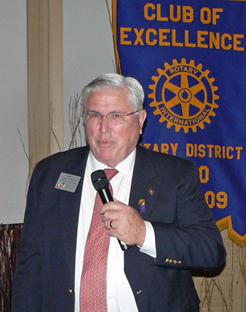 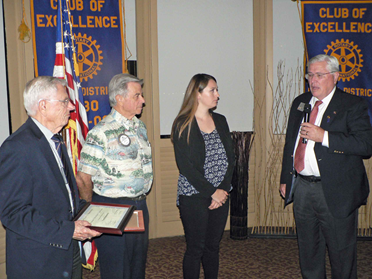 DG Greg O’Brien is a member of the Palos Verdes Peninsula Rotary Club. He retired from his judgeship at the Los Angeles Superior Court in 2005. He graduated from USC and the Whittier Law school. He is a Past President of the Rotary Clubs of West Covina and Palos Verdes Peninsula. In 2013, he led the Vocational Training Team in Peace & Conflict Resolution in Istanbul, Turkey, at the Congress of Mediators Beyond Borders. (Sounds like what he used to do in the courtroom.)
He inducted our newest Young Professional member, Victoria Perez, who was sponsored by Lew Bertrand. She was President of the Marymount Rotaract Club and active in District 5280 activities, and attended the Rotary International Convention in Korea this year, as well as the recent Rotarian project in Colombia. She has become a well-respected leader, and we look forward to her future contributions to our Rotary club!
DG O’Brien presented awards to our following Club members:
• Lew Bertrand, for sponsoring the most new Club members this year; • Astrid Naviaux, for the most participation in District & Club activities this year; • Dave Moyers, for the largest contribution to the Rotary Foundation; • Bob Welbourn (not present tonight), the longest-term member of our Club; DG O’Brien presented Paul Harris Fellow awards tonight to John Turner, for Paul Harris Fellow level 1, and Varda Lancaster, for Paul Harris Fellow level 5. Thanks and congratulations!
DG O’Brien, who has already visited 60 Rotary Clubs in District 5280 so far this year, described how he had been inspired by even the smallest Clubs who are doing so much with their limited resources. He discussed the early history of Rotary, including the origin of the 4-Way Test. Herbert J Taylor was a business and civic leader, and President of Rotary International in 1954-55. In the Great Depression in the 1930s, wanting to save his 250-employee distribution company, the Club Aluminium Products, from bankruptcy, Herbert Taylor devised a set of high ethical principles as a Four-Way Test for his employees in all of their business interactions: 1. Is it the truth? 2. Is it fair to all concerned? 3. Will it build goodwill and better friendships? 4. Will it be beneficial to all concerned? His company soon became very successful during the Depression. In the 1940s, as an International Director of Rotary, he offered this Four-Way Test to Rotary, which adopted it as a standard of behavior by Rotarians.
|
15th Street School, Jennifer Mak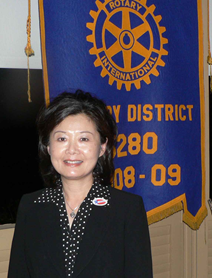
Jennifer Mak has been the Principal at 15th St School (at Mesa St) in San Pedro for 8 years. (Her 3 children are all in college now, one in medical school, so she is feeling that “empty nest” syndrome.) Her students are from a broken community, with single parents, stress, 87% poverty, and many English-language learners. Her school’s scores for grades 2-5 on the Proficient & Advanced English assessment were 34% in 2007-8, but increased to 59% by 2012, and it is now a California Gold Ribbon School. She accomplished these improvements with the California Goals Model Program “Ready, Set, Read” starting in 2009. This was based on a program developed at Columbia University Teachers College, in which each student reads books at his/her chosen level of comfort. Teachers lead small groups at each level, and students’ reading skills are reassessed after 4-6 weeks. The School’s Reading Lab has sections of books available and identified for each level. It’s important to start early — 2nd grade is already too late for optimal results. There are monthly Parent Workshops to help parents learn how to help their children at home, because many parents are nearly illiterate themselves. Volunteers help with reading instruction, and fiscal support is obtained from outside sources including the San Pedro & Palos Verdes Sunset Rotary Clubs. A running record is kept of each student to assess growth over time and evaluate the effectiveness of individual learning. Struggling students are identified, and they are assessed on fluency, ability to retell what they read, and comprehension, not just how fast they can read. Monthly assessments and goals are assessed at the end of the school year for each grade level. They have enough books for reading now, but they still need technology, especially laptop computers of which the school has only one. They would welcome donations of technology as well as financial assistance. |
Audrey Dahlgren, Student Art Contest 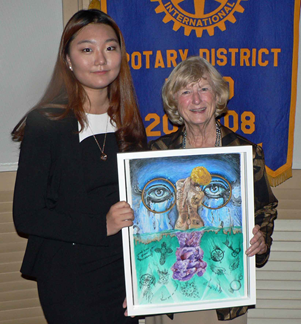 Audrey Dahlgren introduced the Student Art Contestants, whom she had recruited from our 2 local high schools. The artwork was on display for our Club members. The judging committee members were Larry Andrews, Jackie Crowley and Marilyn Klaus. The winner was Ariel Noh (PVHS), who was awarded $200 and will represent our Club in the District 5280 Student Art Contest. Jena Hyun was judged 2nd and awarded $100. Hyun Kim was 3rd, awarded $50.
Congratulations to the winner, and thanks to all of these talented contestants for their work preparing for this event! Thanks also the the judging committee, and special appreciation to Audrey Dahlgren for her time and effort! |
Audrey Dahlgren, Student Music Contest
Audrey Dahlgren introduced the student music contestants, whom she had recruited from our 2 local high schools. The contestants were: Ashley Hong, Peninsula High School, played the violin. Violet Gao, Peninsula High School, singing Cindy Shim, Peninsula High School, singing Kristina Amiridis, Palos Verdes High School, singing Gaylyn Walsh, Palos Verdes High School, singing (accompanied by guitarist Jesse) Winning 1st place was Kristina Amiridis, awarded $200; she will represent our Club in the District Music Contest. Ashley Hong won 2nd place and $100. Gaylyn Walsh won 3rd place and $50. Congratulations to all of our talented hard-working contestants! Thanks to our judging committee members, and special appreciation to Audrey Dahlgren for recruiting these contestants and organizing this event! |
Cabrillo Marine Aquarium (Offsite), Mike Schaadt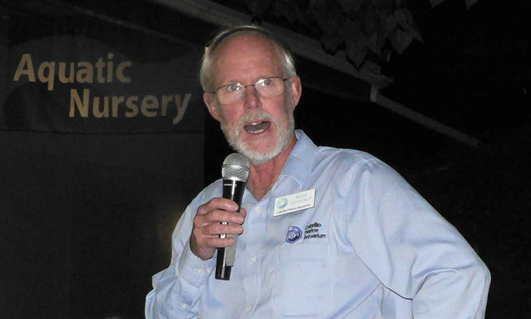
Charlie Ferrero, a longtime board member of the Cabrillo Marine Aquarium, organized this event at Cabrillo. He introduced Executive Director and Marine Biologist Mike Schaadt, who reviewed the Aquarium’s history and then led the tour of the frequently-updated exhibits (see Jon Caplan’s photo album on our Club website above). The Aquarium, which belongs to the City of Los Angeles, began 81 years ago as a card table at the beach nearby at the lifeguard shack, displaying marine specimens collected in the area. The original public bathhouse was converted to a museum building, where Dr William Lloyd developed a Southern California marine life collection. The Aquarium’s mission is to engage people in learning about Southern California ocean life, which is unique because it is the mixing zone at the northern limit of southern sea life and the southern limit of northern sea life. It now hosts about 1000 schoolchildren per day, many of whom have never seen the ocean before. The Aquarium has a staff of 100, assisted by 500 volunteers. (The Aquarium would benefit from the pending Los Angeles Measure A, which would fund parks and $7 million for the Aquarium’s master plan to redo exhibits and add a new building, assisted by $3 million from Friends of the Cabrillo Aquarium. The current building was designed by architect Frank Gehry.) See http://www.cabrillomarineaquarium.org/ for information on exhibits and how you can help this important community resource by volunteering or donations. |
Boys and Girls Club of Los Angeles Harbor, Mike Lansing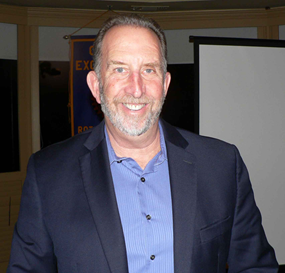
Mike Lansing grew up in San Pedro and started going to the San Pedro Boys Club in 1966. Back then, it was safe to play in the streets in the evenings. Later he returned to the community as a teacher and coach, for 17 years. In 1994, the Boys Club added Girls and began broadening its services and expanding the population served. The BGCLAH provides services for at-risk youth in 14 locations in San Pedro and Wilmington. 30% of the children are living in poverty, so 600 hot evening meals are served daily. 500 members are bussed daily after school to the 3 main Club sites. After-school programs are sponsored at 10 LAUSD schools, and college counseling is provided at 6 high schools (where there is little or no other career counseling). The Saturday Arts Academy provides instruction in fine arts, music, dance, digital arts, film production, audio recording, 3D modeling, game design, and animation, to 1300 annually. BGCLAH has grown from 125 youth/day in 1995 (budgeted at $270,000) to a planned 2500/day by 2020, with a budget of $8 million. The 5 priority service areas are: teens, education, arts, good character & leadership development, and healthy lifestyles. The College-Bound program has pushed graduation rates to 95% (compared to 68% at LAUSD), and students are helped to apply for scholarships and financial aid. 438 youth began college in 2015. Academic case management is provided to 500 other youth at 5 high schools. None of this would be possible without the support of the community, corporate and individual donors, volunteers and dedicated staff. (Misty Copeland, Principal Dancer of the American Ballet Theater, began her ballet lessons at BGCLAH.) You can learn more about the programs and how to volunteer or donate at http://www.bgclaharbor.org/. |
|
|
|
|
|
|
|
|
Greater Los Angeles Area Council, Boy Scouts – Hannibol Sullivan & Dave Salzman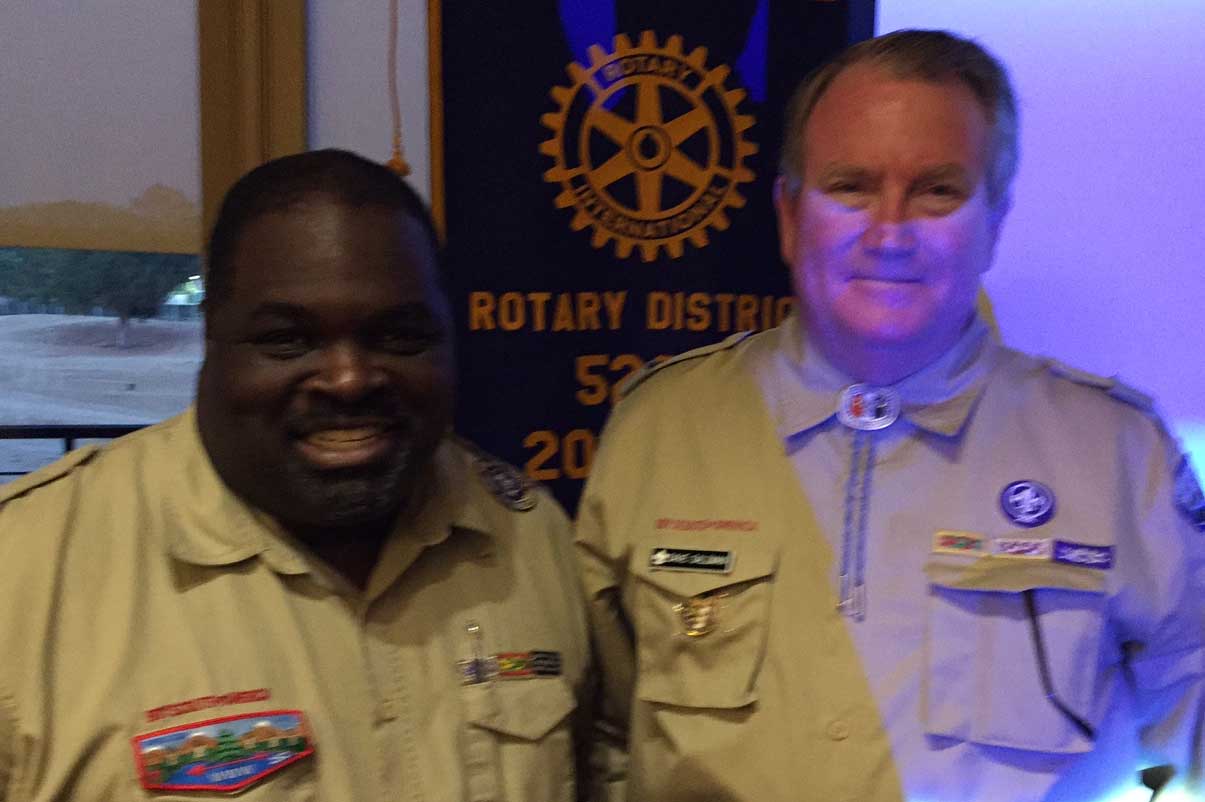
Hannibol Sullivan is a full-time Director of Field Services for Boy Scouts in the Pacifica District (the South Bay area, south of the 405 Freeway), one of 10 Districts in the Greater Los Angeles Council, and has been in Scouting for 20 years. He was an Eagle Scout and is a member of the Inglewood Rotary Club. Dave Salzman, a Manhattan Beach Real Estate Broker, is a volunteer Scout leader. The Boy Scouts of America was founded in 1910 to help boys to build character, learn responsible citizenship, and develop physical fitness. The Los Angeles Area Council was founded in 1915, and currently has 10 Districts including the Pacifica District (the South Bay area south of the 405 Freeway) with 4,800 boys in 200 Scout units. In addition to the traditional camping and hiking, they do cycling, backpacking, rock climbing, skiing, snowboarding, horseback riding, and water sports. Scouts learn through enjoyable interactive activities emphasizing age-related teamwork and leadership skills. Many new activities keep up with modern youth social trends, such as Internet skills and smart phones, as well as family relationships, strong values, life skills and career preparation. Lions is a new Scouting program for kindergarten-age boys, led by parents (“Lion Guides”). They meet as dens of 6-8 kindergarten-age boys and occasionally attend a Cub Pack meeting. Lion Adventures assist Lion families in conducting enjoyable age-appropriate activities, exploring the world around them while developing citizenship and social skills. As they complete the requirements for each adventure, Lions earn an adventure sticker to be placed in their Lion Adventure Book. Their uniform is a Lion t-shirt. At the end of their kindergarten year, Lions “graduate” into Cub Scouting as a Tiger. Cub Scouts are now ages 6-10 and are taught new skills such as using a microwave, GPS, dailing 911, CPR, sports, and the traditional swimming and fishing skills. Boy Scouts, ages 11-18, earn merit badges in traditional and new areas such as swimming, fishing, cooking, camping, chess, welding, search and rescue, skateboarding, first aid, climbing, back packing, archery, family relationships, and finance (budgeting and bill paying). Explorers/Venturers, ages 14 to 20, are Coed (if you can’t beat’em, join’em). They may specialize in potential career pathways such as law enforcement, fire-fighting, small business management, or healthcare, as well as sailing, cheer-leading, chemistry and horseback riding. The Boy Scouts are funded by private donations, fund raisers and fees to scouts. Uniforms cost $100, 6-day camp is $345, and annual fees are $250. These expenses and obtaining adult volunteer leaders (5 adults are needed to start a Troop) are challenges, especially for lower socioeconomic boys who need these opportunities the most. Volunteers are needed for many different skills and expanding learning opportunities. Check the Pacifica District website at www.pacificabsa.org to see scheduled activities and how you can get involved. |
RI Conference, Seoul — Tori Hettinger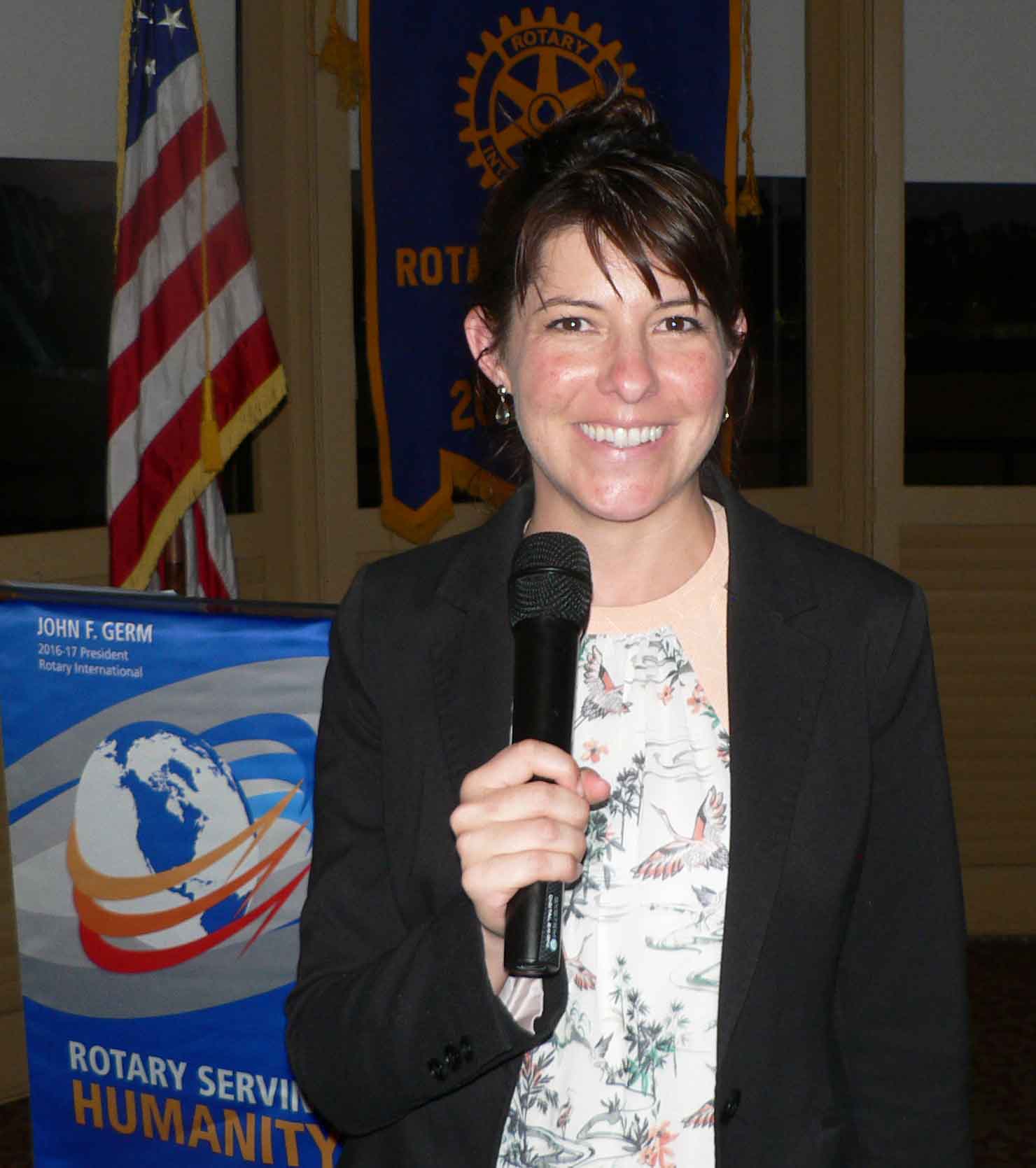
Tori Hettinger graduated from UCLA in Art History, and studied Interior Design. At the District Office, she manages daily operations, coordinates social media and events, writes the newsletter, manages the website and financial operations, and coordinates District group travel arrangements. She is a Young Professional Rotarian, and had been in Interact, RYLA, and UCLA Rotaract. Her best Rotary Moment was on our District trip to Guatemala in February 2015, seeing children at a rural school who presented a program to the visiting Rotarians. She attended the Rotary International Convention in Seoul, Korea, May 27-June 1, which had 50,000 attendees. Our District Gov DJ Sun helped to introduce our District visitors to Korean culture. Before the Convention, she attended the Young Leaders Summit (which included Victoria Perez with 600 Rotaractors and Young Professionals). UN Secretary-General Ban Ki-Moon opened the convention. Among the Convention speakers were the US Ambassador and the EU Ambassador to South Korea, UCLA Robotics Professor Dr Hong, and a South Korean child whose heart defect surgery was supported by Nancy Reagan several years ago. There were Rotary Action Groups focused on AIDS Prevention. There was a 3K Walk for Peace. Tori helped with volunteers at the convention. Afterward, Tori went with a group to the DMZ, the tense border zone with North Korea (where wildlife grows relatively undisturbed). She showed photos of Korean culture and dress, scenery, a small village and Temple, and K-Pop (modern Korean popular culture and music). |
|
Club Assembly, President John Jaacks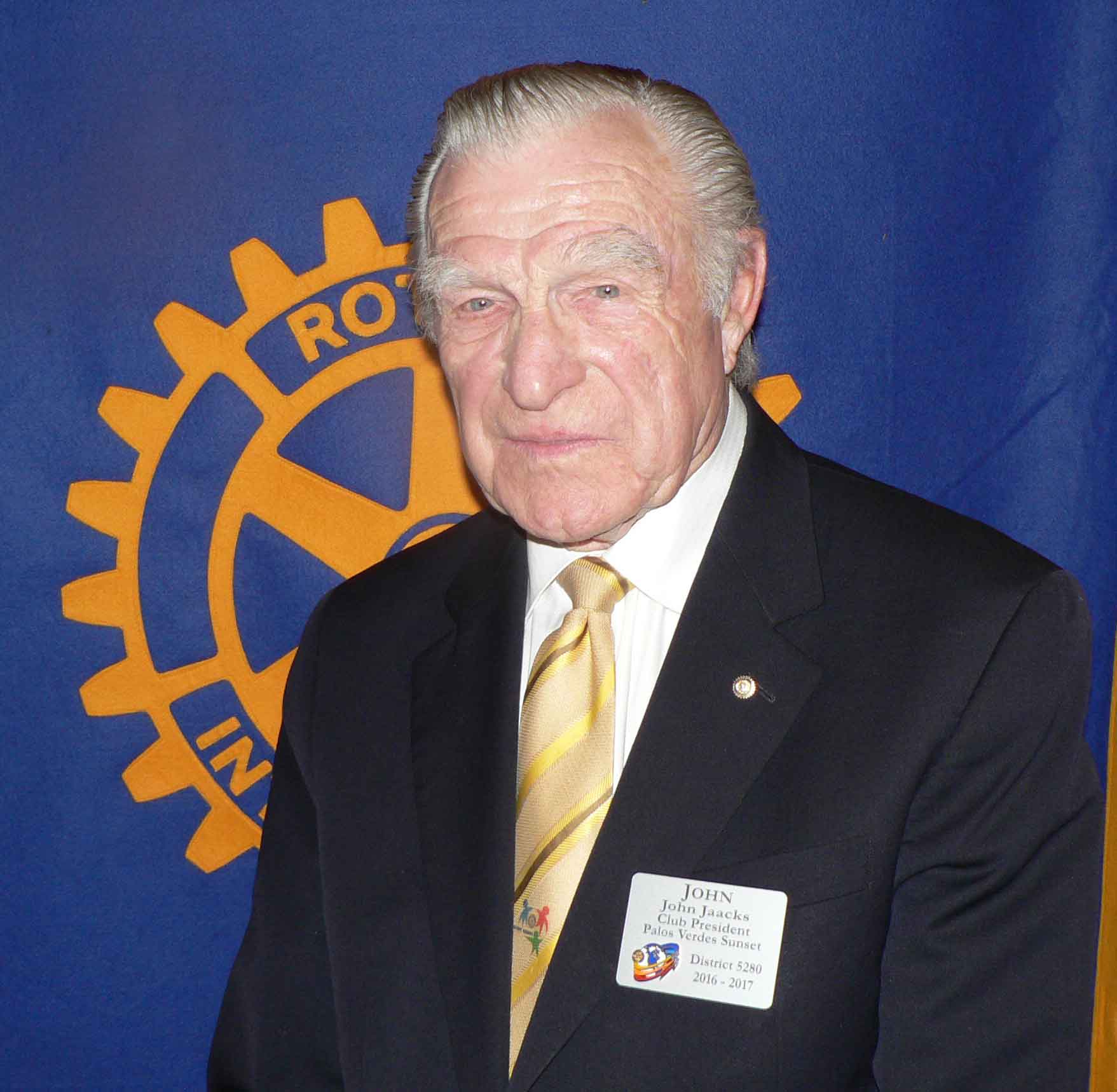
President John Jaacks began the Club Assembly with introductory remarks. He urges each of us to bring a guest to Rotary this year.
Our President-Elect, Jon Caplan, said we need more projects, and more members to perform them. We need to decide which projects to focus on, including some that we have done in the past. Mark Pepys mentioned that the 15th St School in San Pedro was a successful project in the past with participation of many Rotary family members, Interactors and Rotaractors. We are planning for an international project in Africa. Marilyn Klaus reviewed Project Amigo school sponsorships in Mexico, which is continuing.
Jon Caplan wants each past and present project manager in our Club to write a description of each project, to place on our Club website to attract more publicity. The website already shows a list of our projects, but we need to present an eyeball-engaging word picture.
Linda Little, in the Filipino books business, suggested collecting and sending children’s books to the Philippines. Dave Moyers said that Jackie is working on the 15th St School project. Hands-on projects work best, rather than just check-writing and fundraising. $35-$40,000 is a typical size Rotary Global Grant which we can do with other Clubs and matching funds. Lew Bertrand mentioned our ongoing Project EGO for at-risk local high school students, and our Interact and Rotaract Clubs.
Sandy Farrell, who plans to move to Colorado soon with her husband, Jerry, to be near grandchildren, emphasized the value of our Club friendships and doing good for others. She said she will never forget her wonderful experiences here, and plans to return periodically to see us again. We will miss Sandy and Jerry.
|
Lomita Sheriff Station, Capt Dan Beringer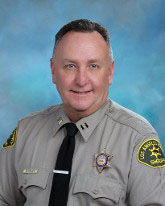
Capt Dan Beringer, a 30-year veteran of the Los Angeles County Sheriff’s Department, was recently promoted to Captain and assigned to the Lomita Station, which provides law enforcement services to Rancho Palos Verdes, Rolling Hills, Rolling Hills Estates, Lomita and adjacent unincorporated communities. He worked at the Lomita Station early in his career before other assignments in the Department. He has a BS in Criminal Justice from CSU Long Beach. He lives in Orange County with his wife (who grew up in Palos Verdes).
 Capt Beringer reviewed recent nationally-publicized confrontations between law enforcement officers and citizens, including safety risks felt by officers in the field and the need for better communication between community activists and law enforcement. Crime rates have increased in the last 2 years, which he believes is related to the effects of Prop 47, which was designed to save money by releasing low-level criminals. The money saved was to be spent on drug rehab and other services to reduce crime, but this money has not been seen yet. The mentally ill population in jails has increased 46% in the last 2 years, and confinement with early release has become a revolving door for repeat offenders who have little to lose.
Cameras for license plate surveillance are being implemented in Palos Verdes, providing quick electronic notice when a stolen or wanted vehicle is identified. Local city contracts for law enforcement are more cost-effective than each city having its own individual police department. The Sheriff’s Department works with neighborhoods to improve home and business security precautions and reporting of suspected criminal activity. If you see anything suspicious, call 911.
|
Demotion Party (Los Angeles Yacht Club)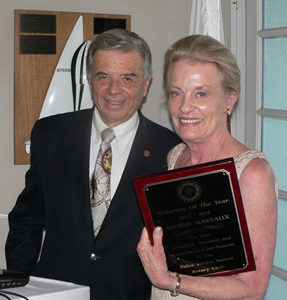 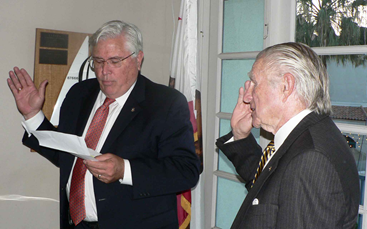 PDG Dave Moyers opened the program with welcome remarks and introduction of Special Guests. He gave special thanks to Jacques Naviaux and Sandy Farrell for organizing the program.
 Outgoing President Lew Bertrand awarded a plaque to Astrid Naviaux as Rotarian of the Year, in recognition for her continuing work on International Service and other club activities (such as the Wine Donation Schedule). Congratulations and thanks from all of us! Outgoing President Lew Bertrand awarded a plaque to Astrid Naviaux as Rotarian of the Year, in recognition for her continuing work on International Service and other club activities (such as the Wine Donation Schedule). Congratulations and thanks from all of us! DGE Greg O’Brien recognized the services of the outgoing Board Members and the many Rotary contributions of outgoing President Lew Bertrand (PDG 2012-13). Then he introduced and installed the incoming Board Members. DGE O’Brien installed our new President John Jaacks for 2016-17. John addressed the Club members on his plans and expectations for the coming Rotary Year. DGE Greg O’Brien recognized the services of the outgoing Board Members and the many Rotary contributions of outgoing President Lew Bertrand (PDG 2012-13). Then he introduced and installed the incoming Board Members. DGE O’Brien installed our new President John Jaacks for 2016-17. John addressed the Club members on his plans and expectations for the coming Rotary Year.Lew Bertrand presented a boat “bumper sticker” to our perennial guest and Madelyn Creighton’s spouse, “Commodore” Daryl Creighton (of the PV Sunset Navy). PDG Dave Moyers introduced a Review/”Roast” of now-Past President Lew Bertrand. Discussing Lew’s distinguished Rotary career in turn were Past President John Turner, DGN Joe Vasquez, PDG Pat Cashin, and PDG Dave Moyers.
|
Ocean Water Desalination Program, Harold Williams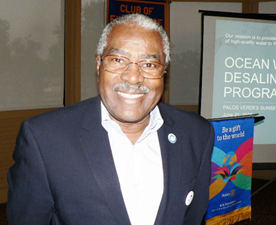
Harold Williams is Vice President of the Board of Directors of the West Basin Municipal Water District (which serves 1 million people) and Chair of West Basin’s Water Resources Committee. He represents the Palos Verdes cities, Carson, and portions of San Pedro. He is a California Registered Civil Engineer, doing infrastructure-consultations for cities and districts. The West Basin District was formed by vote in 1947, when there was a drought and groundwater was being over-pumped, causing seawater intrusion into the water table. Not enough water was available through the Aqueduct from Northern California. New water was brought to Los Angeles from the Colorado River for the growing urban area. The Ocean Water Desalination Program has been initiated to help ensure a reliable future quality water supply to the Water District, now in our fifth year of drought. Gov Brown has ordered a ban on wasteful water practices. Besides improved conservation, multiple sources of water are needed in addition to the Colorado River (which is over-subscribed). These include aqueduct water from Northern California (more limited now due to decreasing snowpack), groundwater (which must not be over-pumped to avoid seawater intrusion), recycling of waste-water (now beginning), and the new Ocean Water Desalination Program. The location for the Desalination Program has not yet been determined, possibly in El Segundo or Redondo Beach. An Environmental Impact Report (EIR) is being drafted, and is expected to be finalized by winter 2016-17. A major concern is how to protect marine life from being sucked into the ocean water intake, and how to safely dispose of the output brine (concentrated saltwater) which is toxic to marine life if not adequately diluted before exposure. Another concern is how much energy will be needed to remove salt from the water; the goal is for the process to become carbon-neutral. The cost is estimated to be about ½ cent/gallon (bottled water costs ~$1.22/gallon), and capacity will be about 20 million gallons/day. Other existing or planned desalination plants in California include Santa Barbara (5 million gallons/day), Carlsbad (50 million gallons/day), Monterey (5-7 million gallons/day, pending), and Huntington Beach. The West Basin Municipal Water District is asking for public understanding, comment and support for this Program. The website is www.westbasin.org. |
Brian Campbell, RPV City Councilman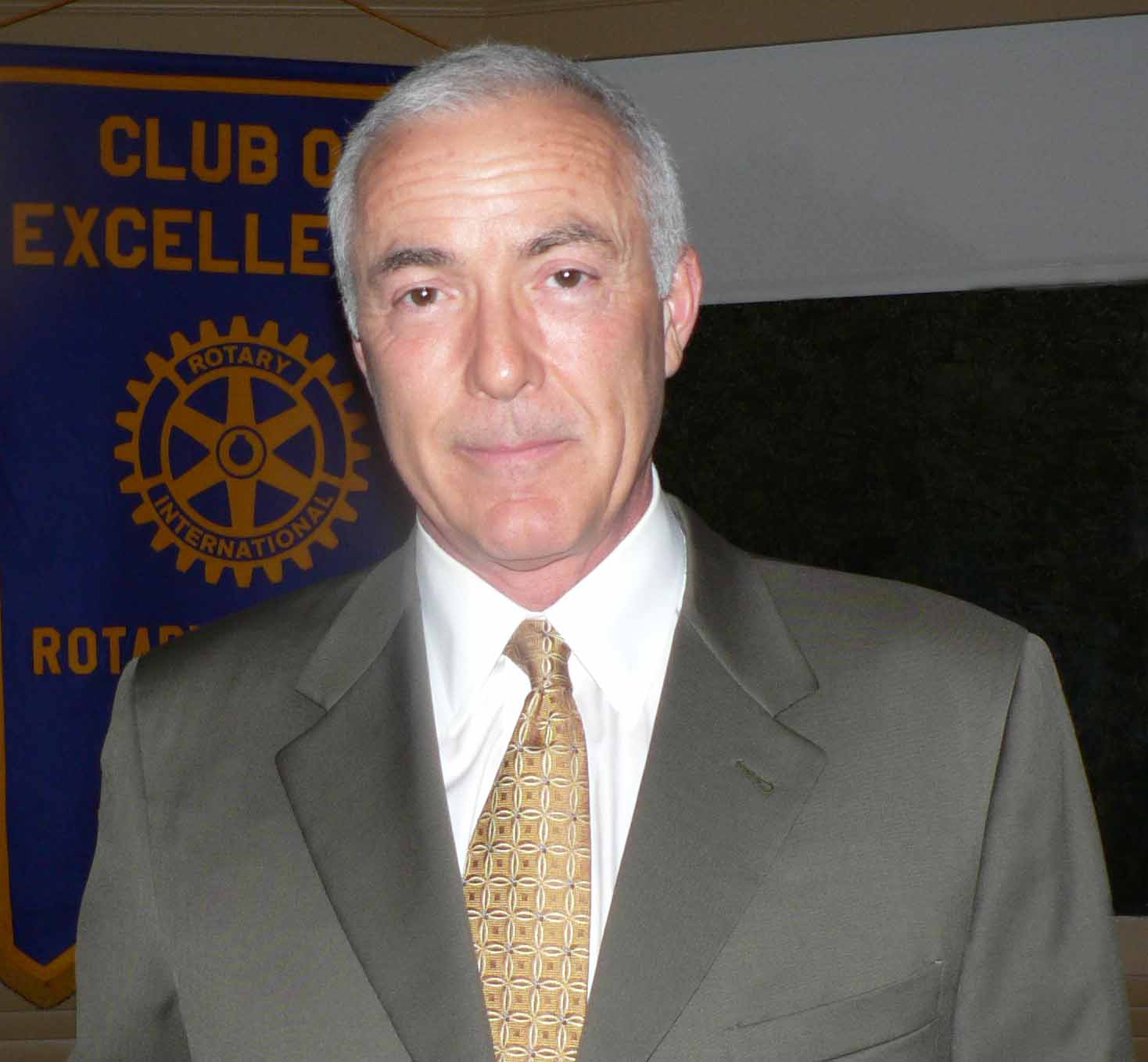
Councilman Brian Campbell is in his second term now on the Rancho Palos Verdes City Council. He graduated from the University of Colorado, served in the US Army Airborne, and then became a commercial real estate broker. He is married and has two young sons. He wants to promote community safety, responsible budget management with strong financial reserves, maintaining infrastructure & storm drains, and government transparency. Rancho Palos Verdes has 43,000 population, the largest in the Palos Verdes Peninsula. He discussed major issues including crime, which is low but still an ongoing concern. He reviewed the controversial Green Hills Mausoleum Project and code violations. Traffic on Western Avenue is complicated because the boundary is shared with the City of Los Angeles, with whom we need to maintain good working relations. Marymount California University has become a full University including graduate studies. There are traffic safety problems from speeding on the steep switchbacks on Palos Verdes Drive East. Relations with the Trump Golf Course have improved. Rancho Palos Verdes has a budget surplus now, which he believes should be partly used to lower property taxes. There is a new master plan for the City Hall (a World War II building), which some people want to replace with a new modern building, but that would be expensive. The city needs more recreation fields, but he would like to increase the use of existing school grounds for this purpose. The city has a Cell-Tower Master Plan with more cell towers now, and they are to be camouflaged better. Some chain-link fencing on Hawthorne Boulevard is falling down and needs replacement or landscaping coverage. The chronic landslide area in Portuguese Bend requires $1 million per year for maintenance; dewatering wells (to minimize lubricating the ground layers underneath) and frequent road repairs are the least expensive approach. |
Peninsula Shopping Center Changes – Jeff Axtell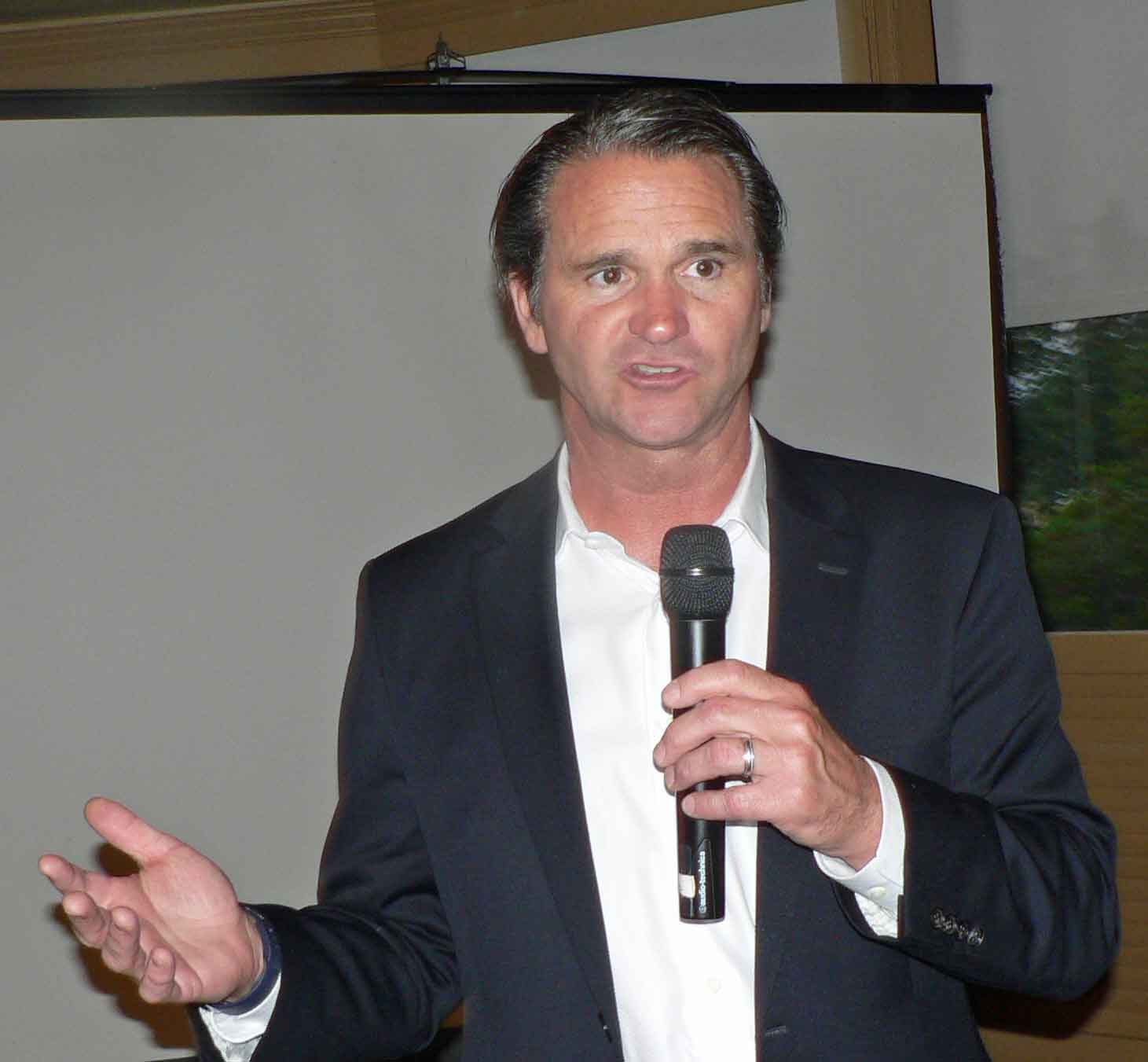
Jeff Axtell overseas Vestar’s retail shopping center acquisition and development strategies in the Western states. He has helped develop several retail centers in Tustin, Long Beach, Cerritos and Orange, and is now responsible for the Peninsula Center in Rolling Hills Estates. He graduated from UCLA in Economics and has been active in local youth sports programs. The Peninsula Shopping Center is on the southwest corner of Silver Spur Road & Hawthorne Boulevard in Rolling Hills Estates (see map). Jeff says the previous owner was an investment company that did not do much to develop the shopping center’s potential, rather than a real estate management company. He sees new opportunities there now with some leases expiring. The Center has 300,000 leasable square feet and is anchored by Pavilions, Rite Aid, T.J. Maxx, OSH, Sports Authority and Ulta, surrounded by signalized corners in the principal commercial district of the Palos Verdes Peninsula. Daily vehicular traffic is 21,000 on Silver Spur Road and 35,000 on Hawthorne Boulevard, with 86,000 population within a 3-mile radius, having $138,000 average household income. Although the Sports Authority company has gone bankrupt, its local store here has done well. An Orchard Supply Hardware store will open in early 2017. He is looking for more upscale full-service restaurants and some missing retail stores to complete a well-coordinated neighborhood shopping center. Different parts of the Center are being combined with some stores relocated, opening it up for more street-visibility and better parking lot access. (The Center is not big enough to accommodate a major chain department store, which would require 100-140,000 ft².) |
RI Council on Legislation, PDG Drew Froehlich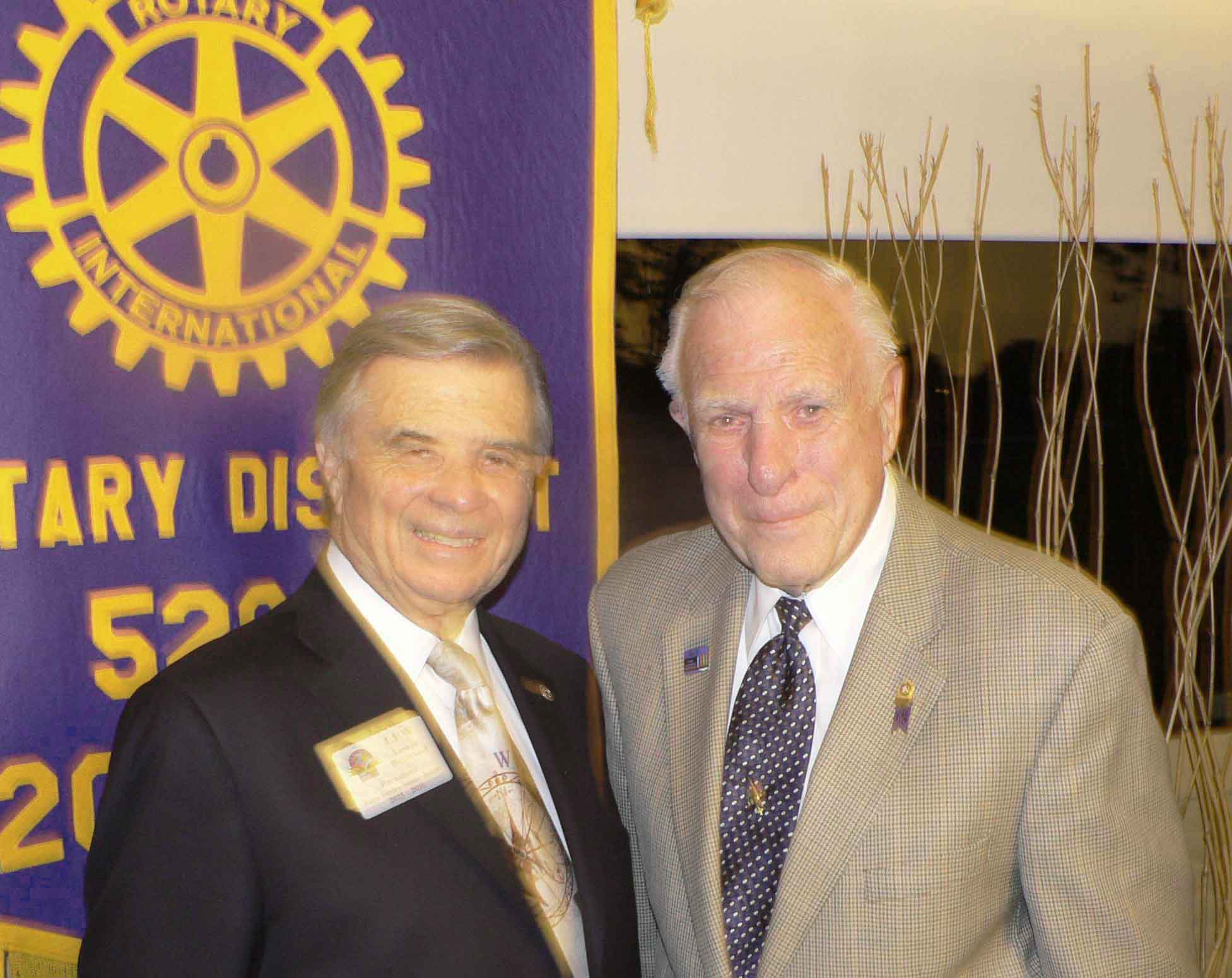
PDG Drew Froehlich (2010-11, District 5260) is past President of the Granada Hills Club and has been active in Rotary activities for many years, including the Zone Training Team for District Governors-Elect. His wife, Rahla, is also a long time Rotarian and Past President of the Glendale Noon Club. He is a retired US Navy Captain and has worked in the aerospace industry where he is currently a “semi retired” consultant. PDG Froehlich was our District 5280’s Delegate to Rotary’s 2016 Council on Legislation, held for one week in Chicago every 3 years. Each of the 531 RI Districts sends one delegate (71 languages are represented). They meet to review, organize and enact legislative proposals submitted to committees over the previous 2 years, and to make recommendations to the RI Board of Directors. This year there were 117 enactments and 64 resolutions, which were published in the RI Manual of Procedure and will take effect July 1. Among the new changes approved is to allow Clubs more flexibility to make their own rules on procedures, membership and attendance, to allow for cultural differences in the many countries represented in Rotary. Due to decreased investment returns during the global economic downturn of the last several years while costs continue to increase, there will be a dues increase of $4/year for the next 4 years to maintain financial stability. |
Eastern Sierra Wounded Warrior Project - Jacques Naviaux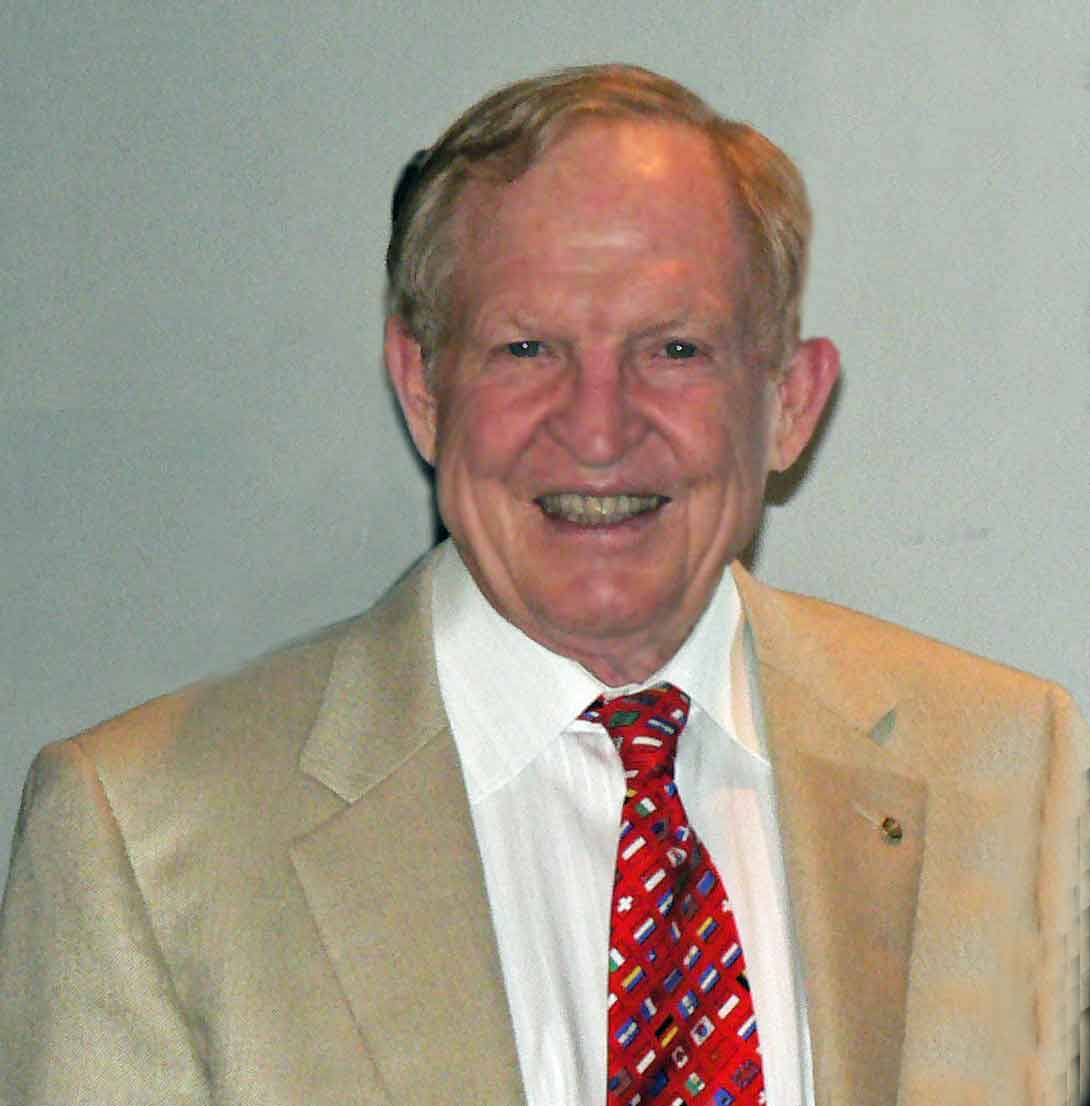
Jacques Naviaux spoke about the Eastern Sierra Wounded Warrior project – which our Club supports. He said that the organization has received a well-earned black eye in terms of how they spend money. However, the Eastern Sierra branch has been doing good work and is currently building a 32-room treatment facility for wounded soldiers.
Jacques also talked about being invited to Camp Pendleton to experience, “A Day in the Life of a Marine.” Despite spending 32 years in the Marine Corps, he accepted the invitation. Jacques stated that he was most impressed by what he described as “the most enthusiastic Marines I have ever seen.” He explained that they go through an “immersion training,” which is a complete Middle East village built in Camp Pendleton.
|
Middle East Situation, Frank Zerunyan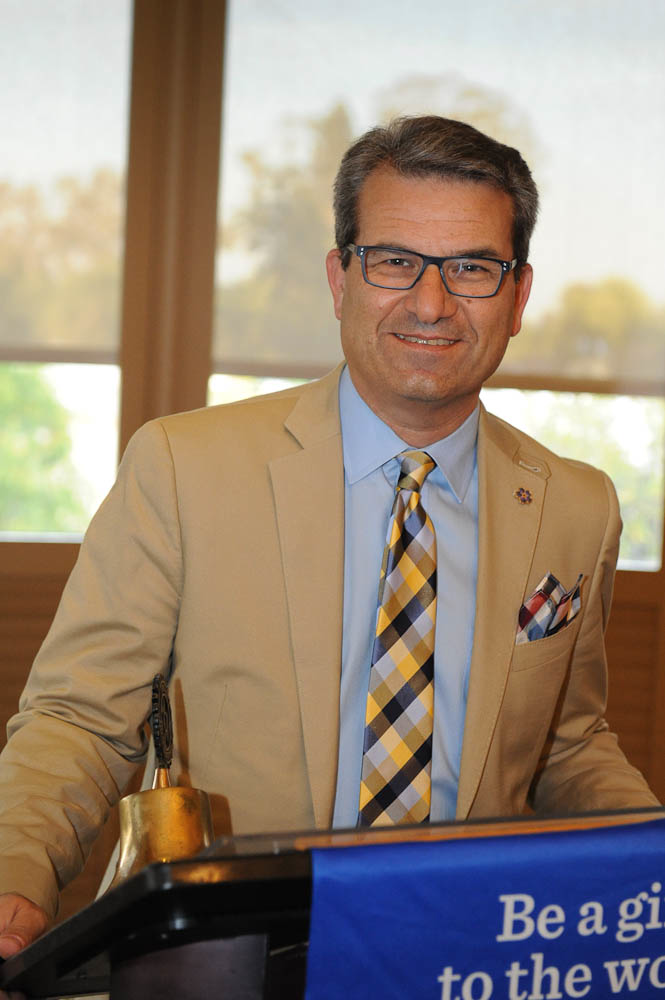
Frank Zerunyan is a longtime resident (and former mayor) of Rolling Hills Estates. He is an attorney and Professor of the Practice of Governance at the Sol Price School of Public Policy.
Frank has spoken to our club in the past about governance and local issues, but at this meeting, his focus was farther afield – the Middle East. It is an area in which he has not only deep expertise, but direct experience, having grown up in Istanbul. He began with an overview of the situation in the Middle East, explaining that the US has made missteps in the area, beginning with getting into the middle of a 1,400 year old fight that doesn’t involve us. The discord is between the two major factions of Islam, the Shias and the Sunnis.
What is of direct concern to us – and will have to be addressed by a future US president – is the situation with ISIS. Frank explained that Muslims are not dangerous; Islamists are, and ISIS is our biggest cause of concern. ISIS is bent on creating a caliphate by taking over land and they need to be stopped.
The solution will require boots on the ground, he explained, but they shouldn’t be our boots. Instead we need to create a strong Sunni force that is capable of taking on the threat.
|
Students of the Year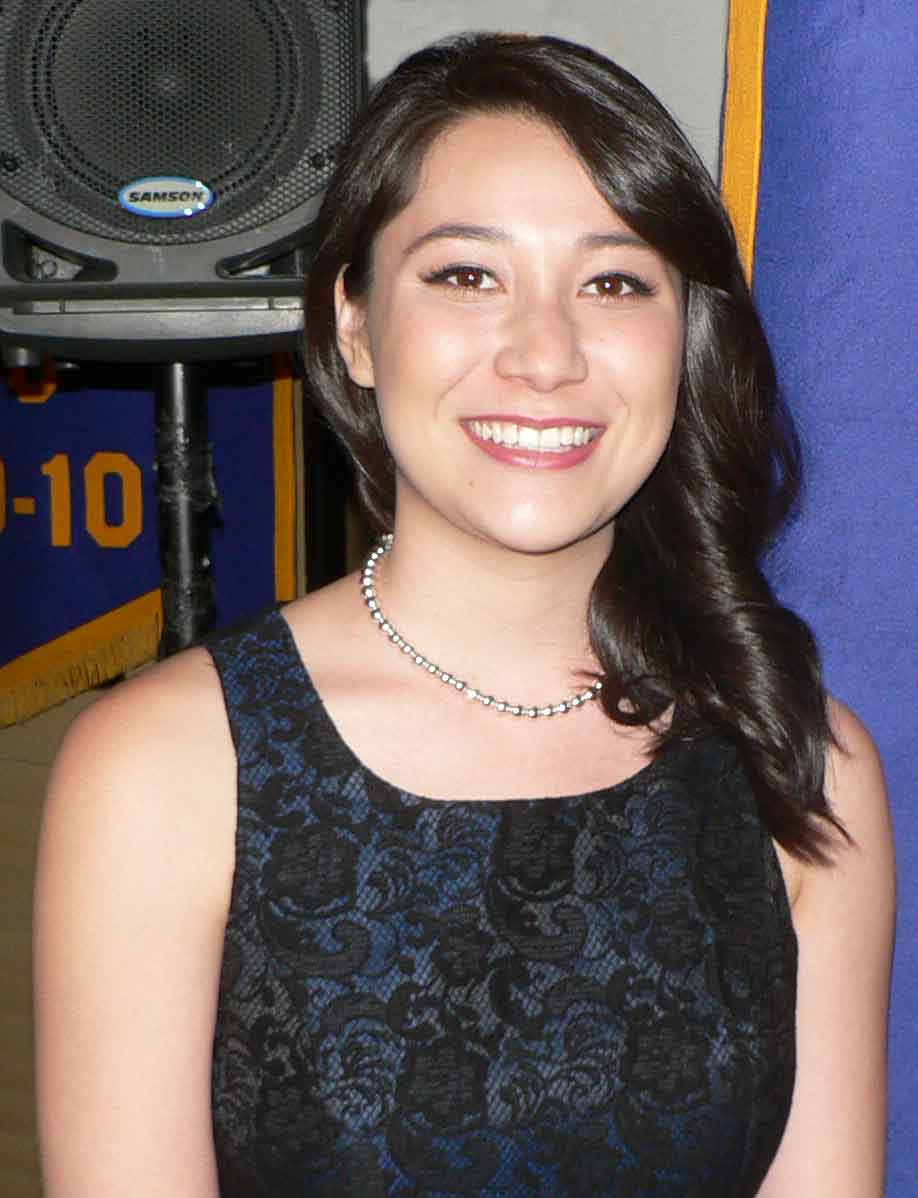 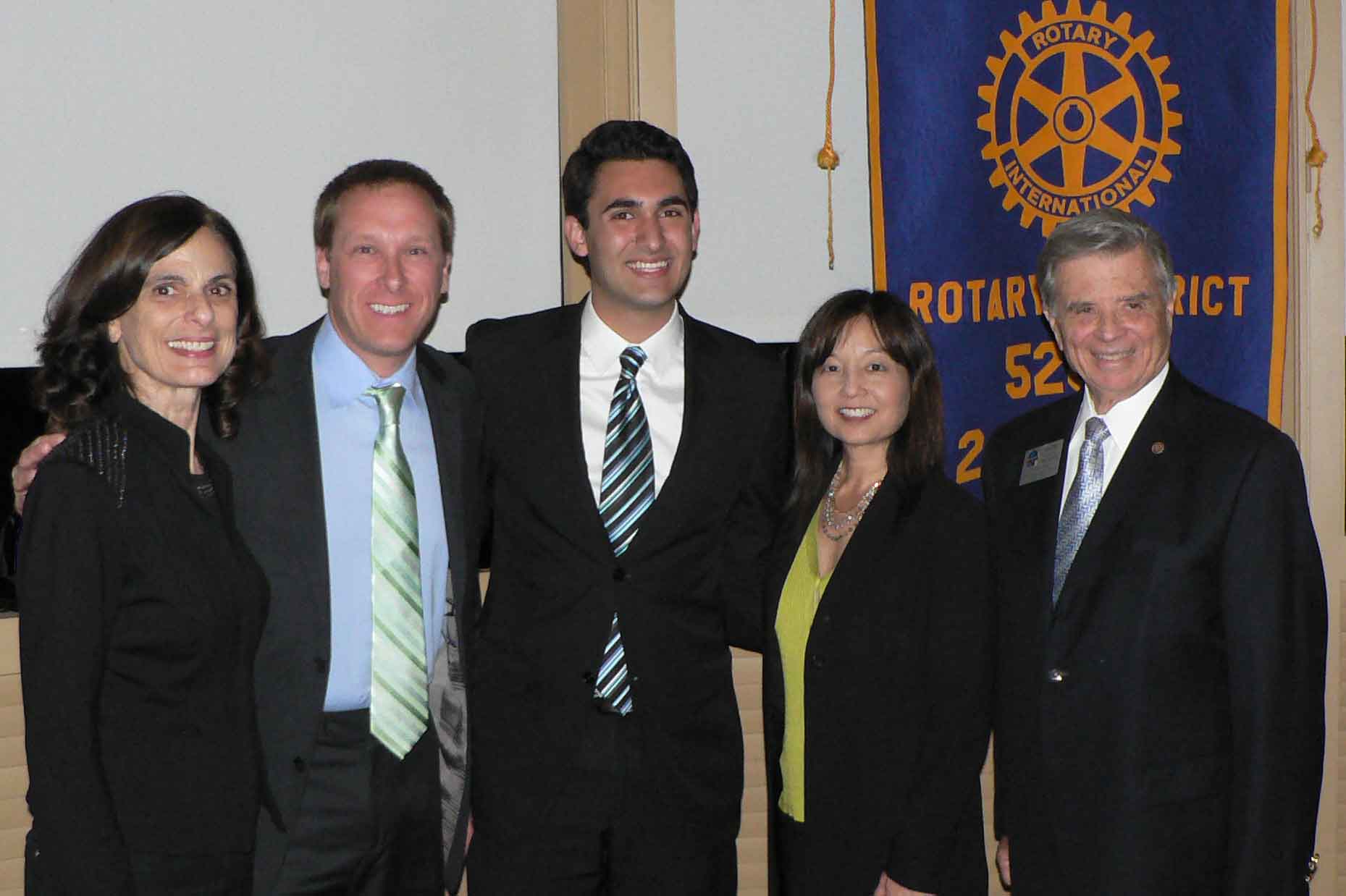 Madelyn Creighton organizes our Club’s annual Students of the Year awards, which are given to students from our local high schools and college. They are nominated by their school officials for academic excellence and contribution to their school activities. Each winning student is awarded a $100 check for future academic purposes, and their family members and school officials are invited with them to our award meeting. Maddy McHugh of Palos Verdes High School (who was unable to attend) received all A’s in junior and senior courses and completed her school work in March. She has a softball scholarship in Texas. Dominique Alvarez of Marymount California University has been active in the award-winning Rotaract Club there, including fundraising to end polio. Arman Ramezani of Palos Verdes Peninsula High School has distinguished himself in math and science. He has been admitted to Brown University. Congratulations to these outstanding students, and thanks to Madelyn Creighton and the school teachers and staff! |
PV Sunset Social Hour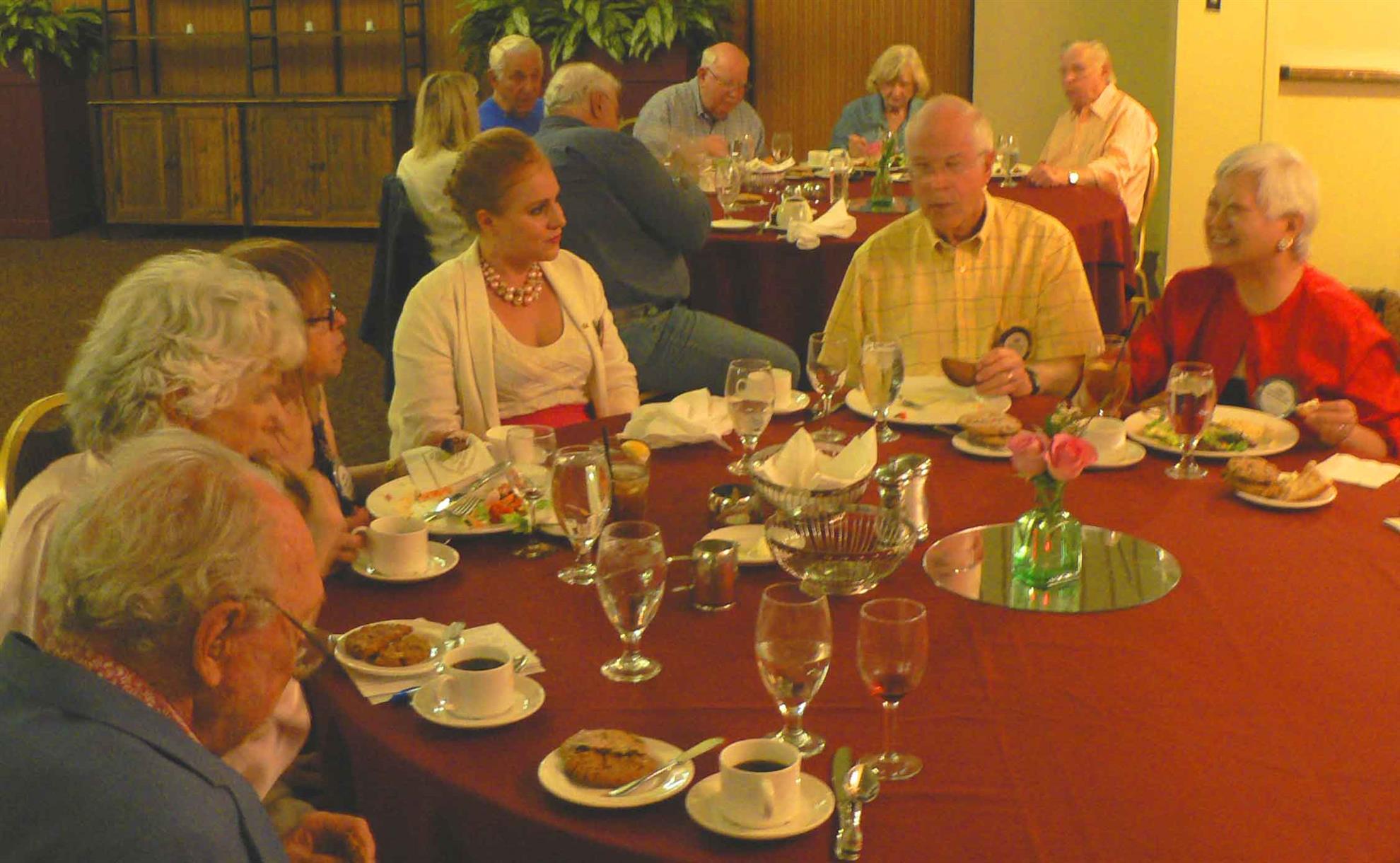 We met for a social hour to renew acquaintances and exchange ideas.
|
District Rotaractors Ethics Forum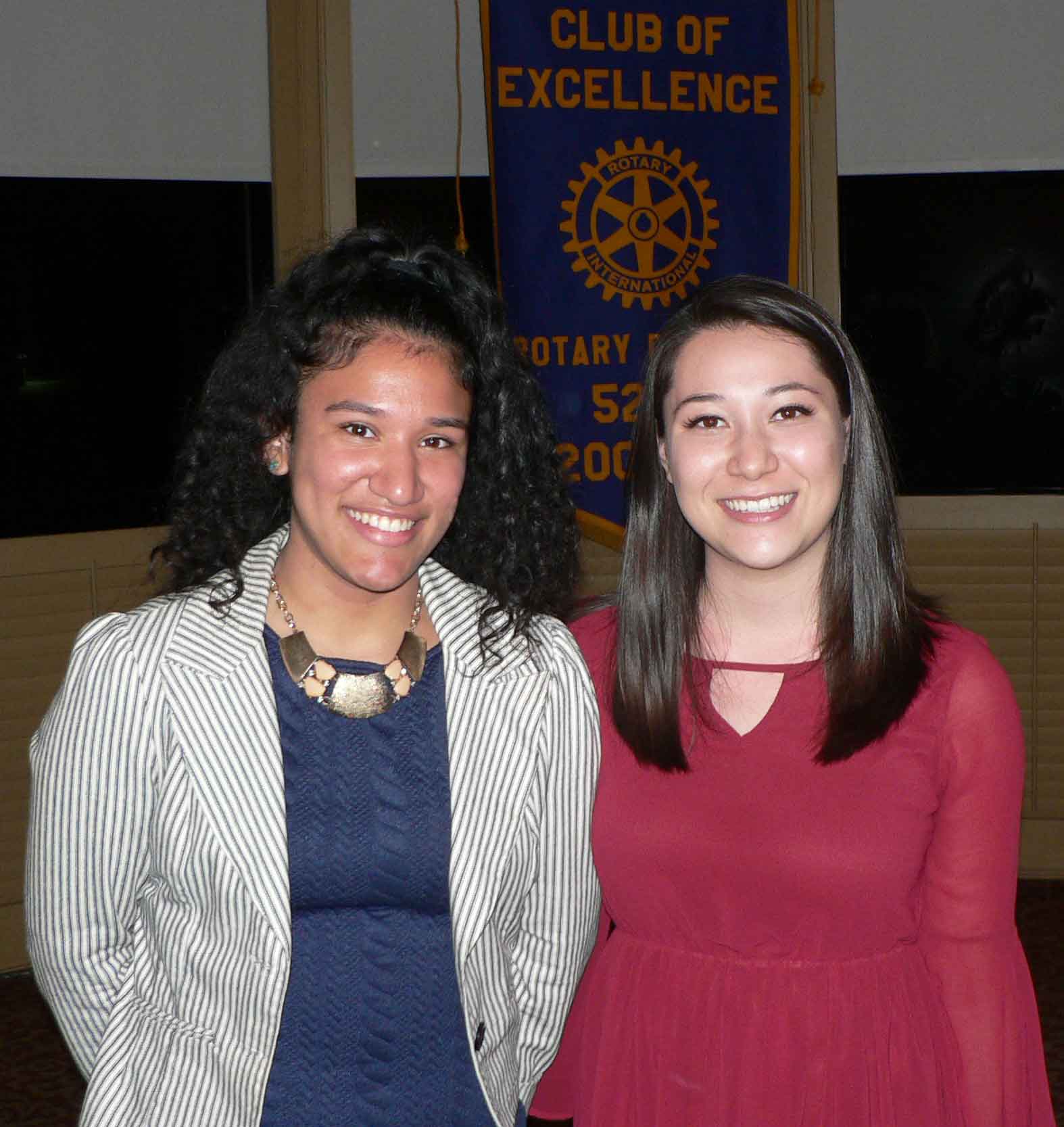
Marymount Rotaractors Cindy Sanchez and Dominique Alvarez spoke about their participation in our District 5280 and 5320 Rotaract Ethics Forum on April 9, at Loyola Marymount University. Rotaract Clubs in our District formed teams of 4 to participate in the 2016 Ethics Forum. (Our president, Lew Bertrand, introduced this annual event during his year as District Governor.) Each team presented discussions on the ethical dimensions of a topic chosen from among a list of 23 proposed. Judging criteria included how well each team communicated why its chosen topic is an ethical issue, the complexity of the topic, preparation, organization, presentation, application of the 4-Way Test, and overall persuasiveness, including whether the solution proposed is legal and ethical. Prizes were given for first, second and third place. The Preliminary First Round was a 10-minute presentation, and the Elimination Second Round was an abbreviated 5-minute presentation, concluding with feedback from the panel of judges. Cindy and Dominique chose the topic of Capital Punishment (death penalty or execution for a specified serious crime). Although it has an ancient history in most societies, Capital Punishment has been abolished by most countries in modern times, with public opinion in many countries increasingly against it. The US is the only country in the Americas still carrying out this penalty. Most other countries utilizing capital punishment are in Southern & Eastern Asia and Northeastern Africa, especially China, India, Pakistan and Indonesia. |
Liz Mills, Craft Talk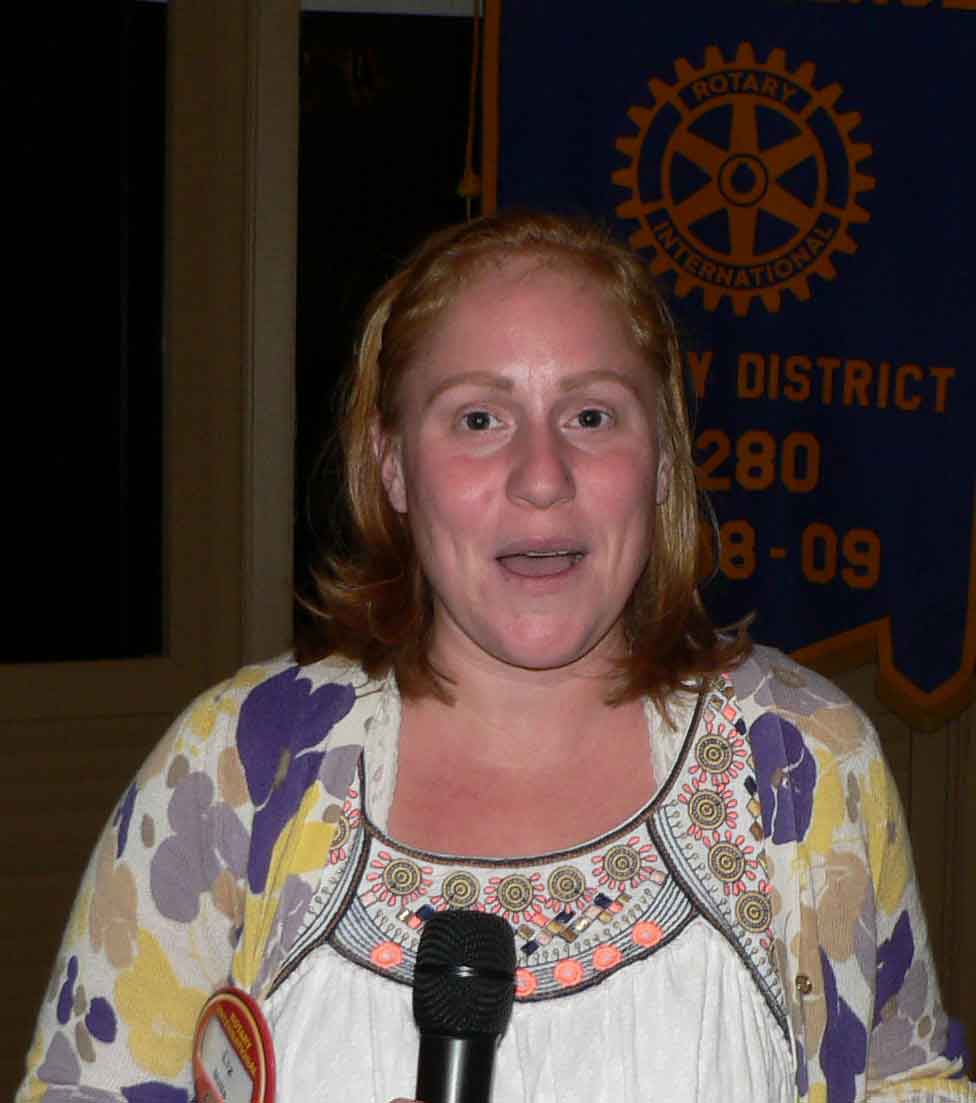
Liz Mills is our newest Young Professionals Member. She grew up in Reseda and was in Rotaract in college, as were most of her friends. She tended the University of San Diego. To pursue a more international experience, she attended the University of Bradford, England (west of London), where she met people from all over the world. Many of them were Muslims, a contrast with her Christian upbringing, and many of them had been born in refugee camps. She has recently begun working at Peninsula high school in Palos Verdes, in the AVID Program (Advancement Via Individual Determination), a nonprofit organization focused on closing the academic achievement gap by preparing underrepresented students for college and other postsecondary opportunities. AVID’s philosophy is to hold students to the highest standards while providing academic and social support, so they can rise to this challenge. The program trains educators in using practices to prepare students for future academic success, using research-based strategies and curriculum. It teaches skills and behaviors for academic success, supported by tutorials and student-teacher relationships, creating positive peer groups, and developing a sense of hope for personal achievement from hard work and determination. Liz has a strong interest in international and intercultural relations. She is interested in participating in a Peace Corps program, to either Samoa or Uganda. |
Project Amigo, Jenna Saldaña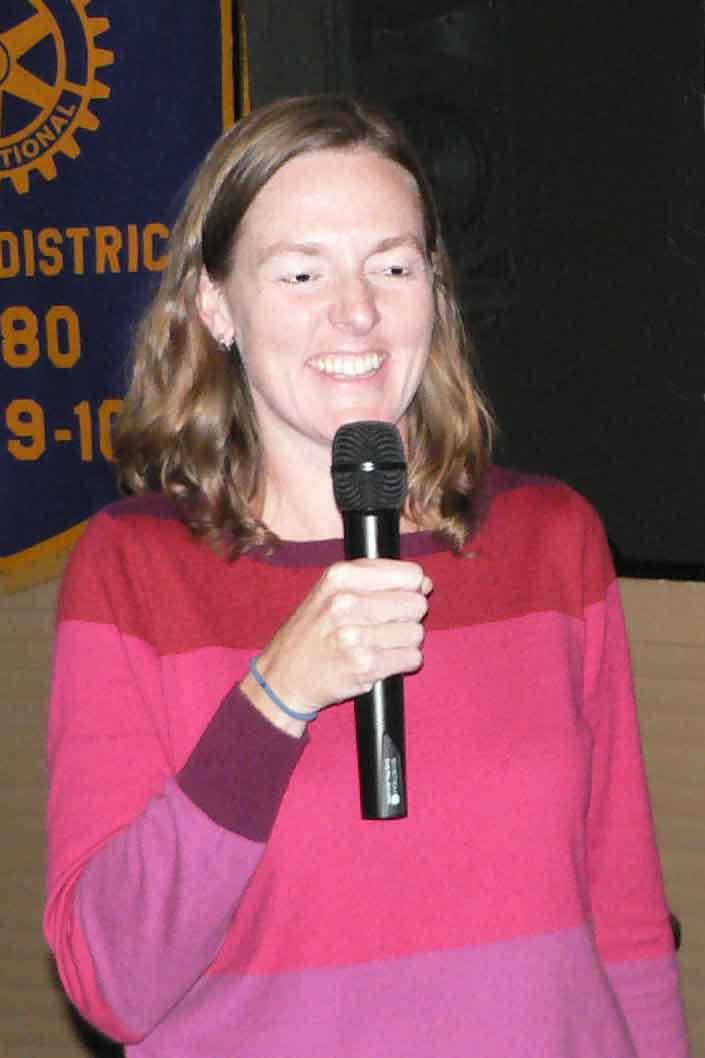
Project Amigo was founded by California businessman Ted Rose, who visited the Mexican state of Colima near Mexico’s Pacific coast in 1984 to climb a volcano, took the wrong bus, and found himself in an impoverished village, Cofradia de Suchitlan. That experience led him and his wife, Susan, to move there to provide a helping hand for poor children to break the bonds of poverty. Project Amigo became a US 501(c)(3) charity in 1996 with headquarters in Novato, California. In 2000, Ted (now a member of the Colima Rotary Club) received Rotary’s Service above Self award. Current Executive Directors are Jenna and Alex Saldaña. She graduated from Eastern Michigan University, and her husband, Alex, graduated from the University of Queretaro. They married in 2006 and have two daughters aged 7 & 5. Project Amigo has 17 staff members, all Mexican citizens and some of them graduates of its educational programs. The students are children of local farmworkers who have few educational opportunities. 119 scholarships were given out in the current year, 49 for Junior High, 31 for High School and 39 for University study. Some have gone on to Law School or Medical School. Each prospective case is reviewed for interest and potential. Volunteers are invited to go there for Humanitarian Service Weeks during the Year: Learning Spanish, Literacy & Environment, Holiday Fiesta, & English Tutoring. (Our member Marylyn Klaus presented a program on Project Amigo to us several years ago; she sponsored a student there who went on to law school and professional practice, and is married.) Project Amigo’s website is http://www.projectamigo.org/. Sponsors and donations are welcomed. |
Polio Eradication, Shirley Giltzow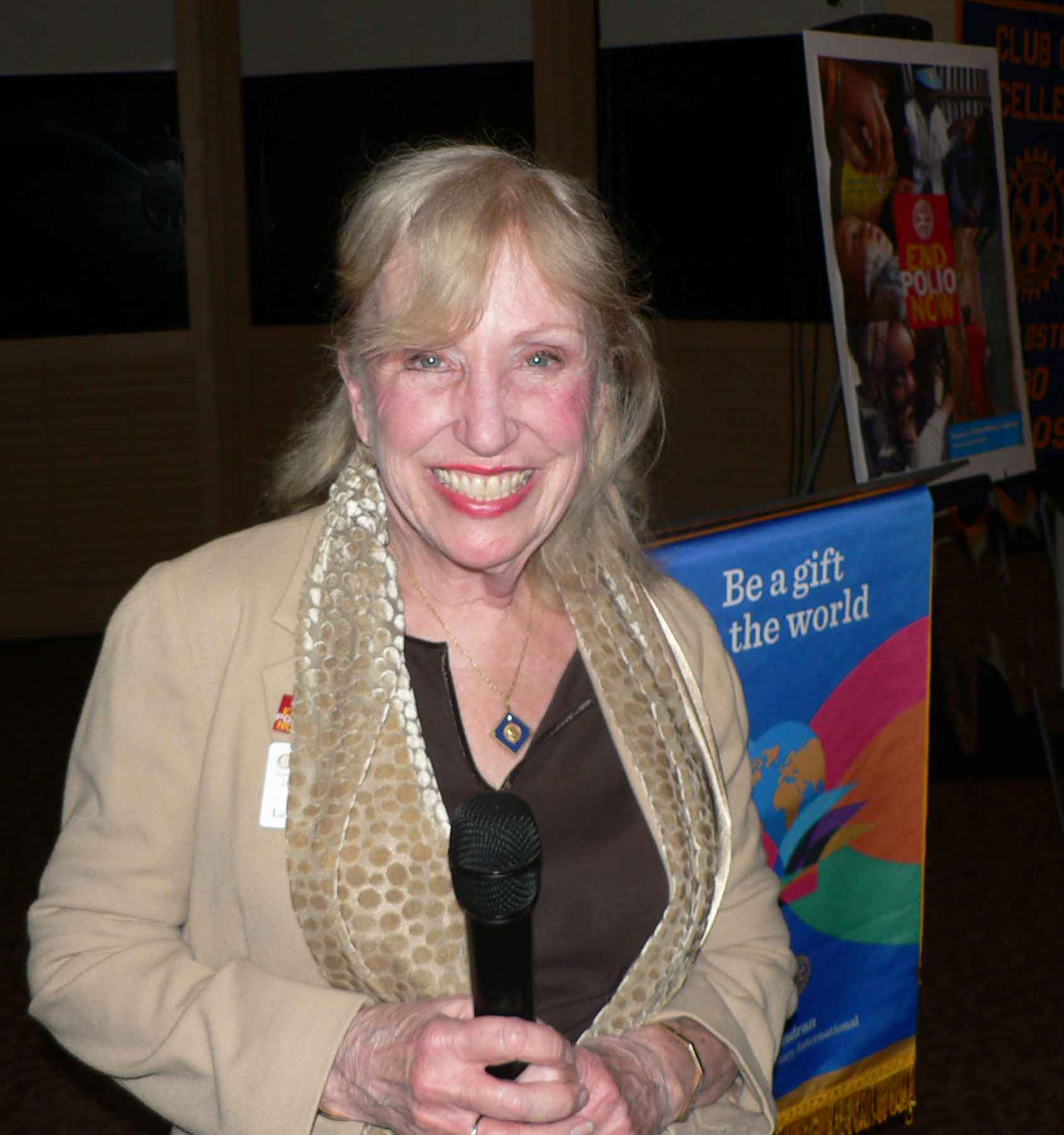
Shirley Giltzow is our District PolioPlus Chair and Past President of the Lawndale Club. She reviewed the progress of our worldwide polio eradication campaign. (Our Club President-Elect John Jaacks noted that his son had gotten polio many years ago, and will be visiting our Club in the near future to present a program on Post-Polio Syndrome.) There were 350,000 polio cases per year in 1985, but now there are less than 100 per year, and they are endemic now only in Afghanistan and Pakistan (not surprisingly, in war areas). However, in January 2016, 16 polio workers in Pakistan were killed, and 65 were killed last year, giving their lives for the goal of polio eradication. The Rotary Foundation has requested a donation of $1/member in our District to honor the memory of those killed in the line of duty. President-Elect John Jaacks presented a check to Shirley Giltzow for the Rotary Foundation for our Club’s contribution. $1.5 billion additional funding will be needed by 2018. The Bill and Melinda Gates Foundation will provide a 2:1 matching Grant for the first $35 million to PolioPlus each year until then to help meet this goal. (Note: Type 3 polio has not been seen in the last 3 years, which means that this particular strain has probably disappeared forever. 2 more strains to go!} The donation website is http://www.endpolio.org/donate. |
America’s Waterways, Capt Harry Jacobs (USCG Aux)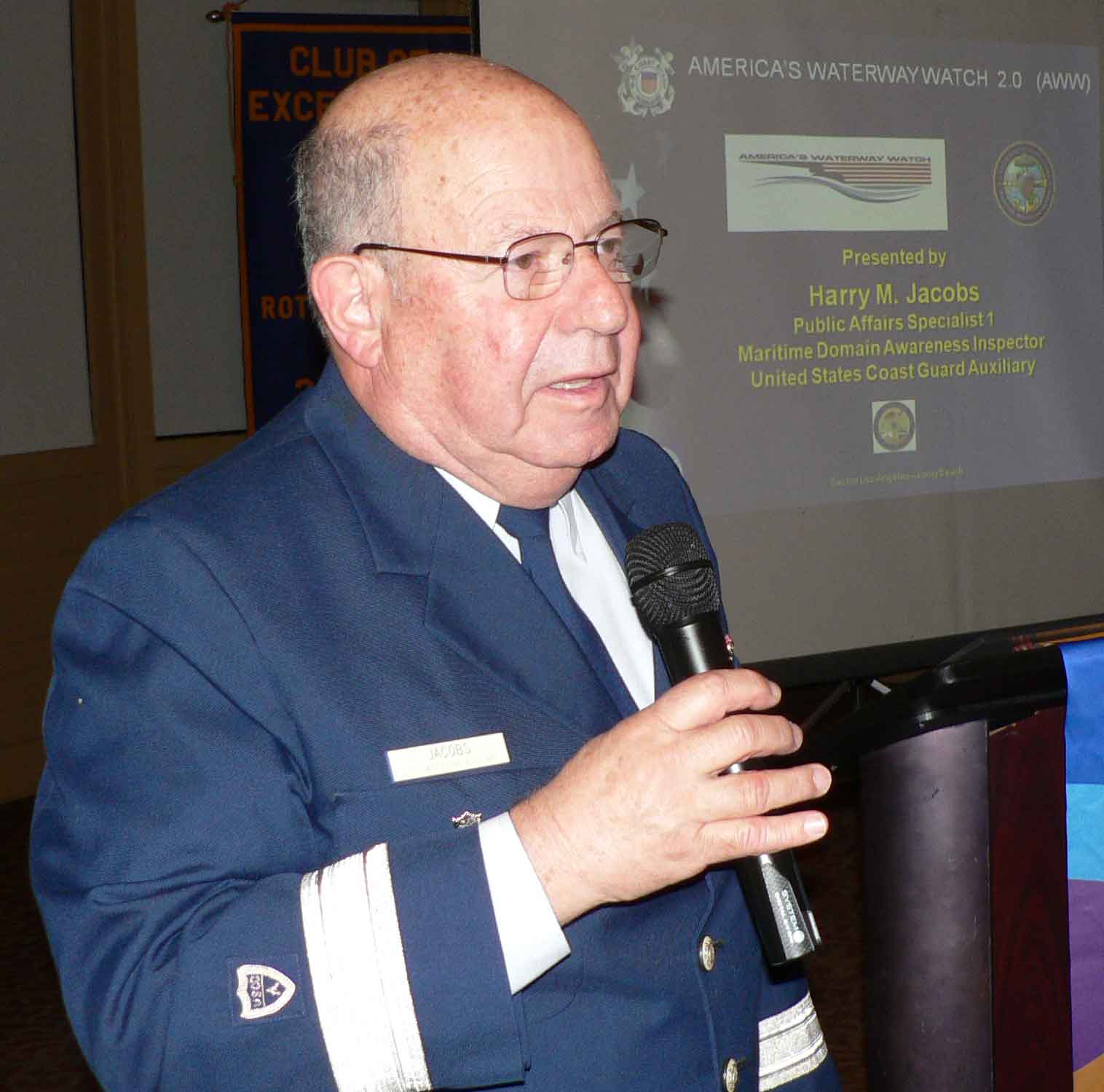
Capt Harry Jacobs is a US Coast Guard Auxiliary volunteer (unpaid). He is Director of Public Affairs and Maritime Domain Awareness Inspector. (His spouse, Victoria Jacobs, is also a volunteer Auxiliary member, who also wears a uniform.) He began by showing 9/11 photos of damaged buildings and injured victims. Is it possible to stop a terrorist attack? The Coast Guard believes it is, with the support of the American people. Terrorism can come here from anywhere in the world, and effective response requires the public’s awareness, knowledge, and constant surveillance. Report what you see (Situational Awareness). Know what is normal (activities, situations, people) and what is not. America’s Waterway Watch is analogous to Neighborhood Watch, but on on a national scale and coordinated by the US Department of Homeland Security. Suspicious activities could include Surveillance (by individuals showing an abnormal interest in security or facilities), Elicitation (of important information without having need to know), Testing Security (studying responses to false alarms), and Suspicious Behavior (any behavior that seems out of place). The US government believes we are getting closer to another “9/11” attack, anywhere in the country including our neighborhood. He urges us to identify, record and report, but don’t be confrontational and don’t take personal risks. (He related the recent report of a motorist reporting to the Highway Patrol about an expensive boat seen coming to a deserted beach north of Los Angeles, that was met by a truck that started loading packages from the boat. The truck was followed and intercepted driving to Los Angeles, large quantities of illegal drugs were recovered, and the participants were arrested. The expensive boat had been abandoned as “a business expense”.) We need to safeguard the safety and security of our communities, infrastructure, ports, and waterways. Don’t stereotype people; people are not suspicious; behavior is. Don’t wait for terrorists to come to our shores. They are already here, and they are not afraid to die and to take others with them. It could happen at any time, anywhere, without warning. |
Chief Ronene Anda, LAC Sheriff’s Dept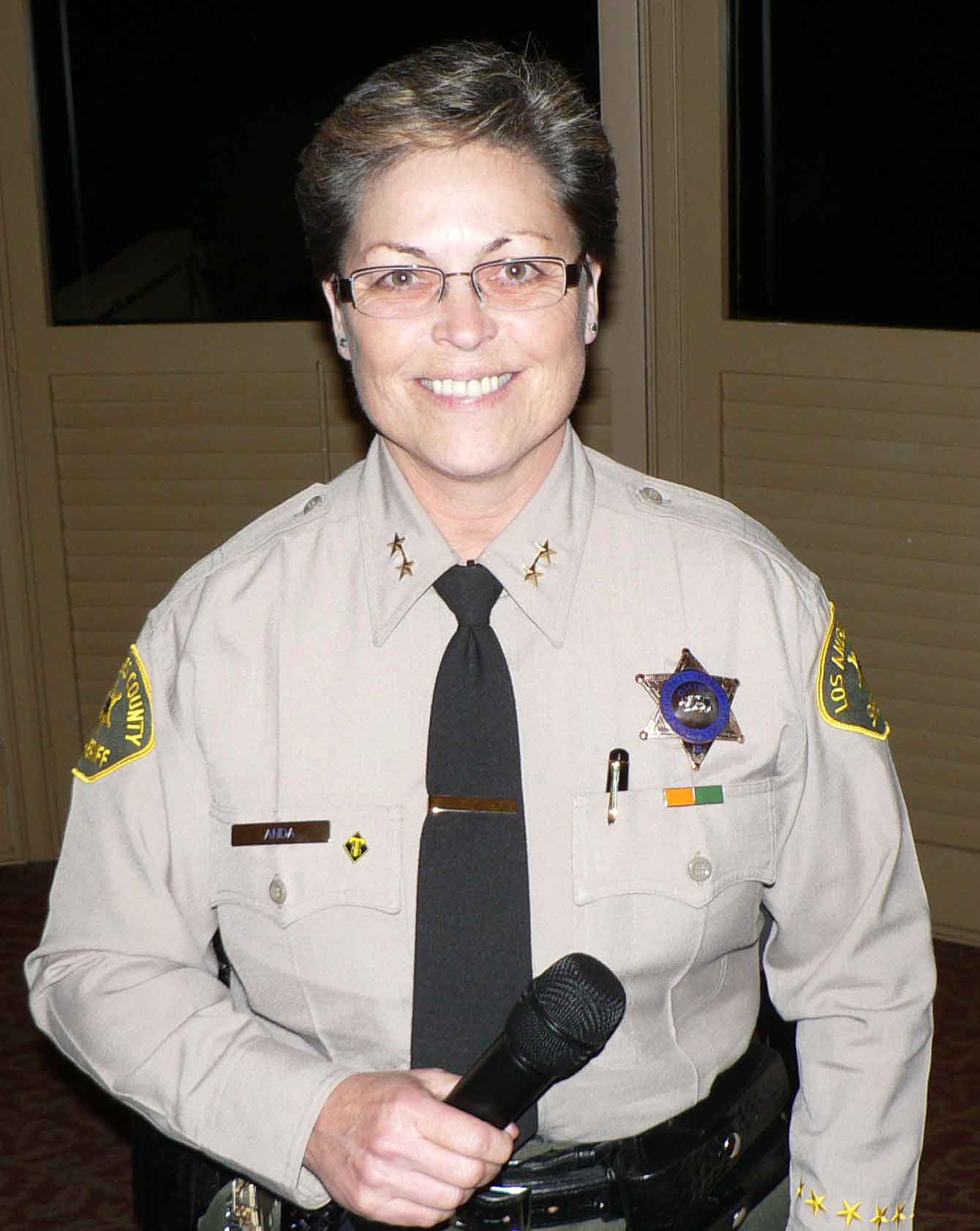
Chief Ronene Anda, the former commander of the Lomita Sheriff’s Station, was transferred to head the newly created Transit Policing Division of the Sheriff’s Department and promoted to Chief (two stars), to provide improved security for the LA Metro train & bus system. This new operation has special challenges different from conventional law enforcement, and works closely with the US Department of Homeland Security. She said she “had a lot to learn” on accepting this new transit policing position. Transit policing includes improving safety and providing surveillance and security against theft, vandalism and assault. Discouraging the bypassing of turnstiles at train stations is a public education focus. An additional focus is watching for vulnerabilities to terrorism activities and being prepared at all times to respond with appropriate force and resources to an unexpected event anywhere in the system. She works closely with the Metro personnel to coordinate operations. Chief Anda also spoke about local crime issues and being prepared to safeguard our homes and businesses, such as keeping home doors, garage doors and car doors closed and locked, and not leaving possible targets of theft in plain sight as temptations to breaking in. Technology cameras are increasingly being used to improve surveillance and identify crime getaway cars. “If you see something suspicious, say something (immediately, to appropriate law enforcement authorities).” |
Rotaractor Victoria Perez, District Humanitarian Trip to Panama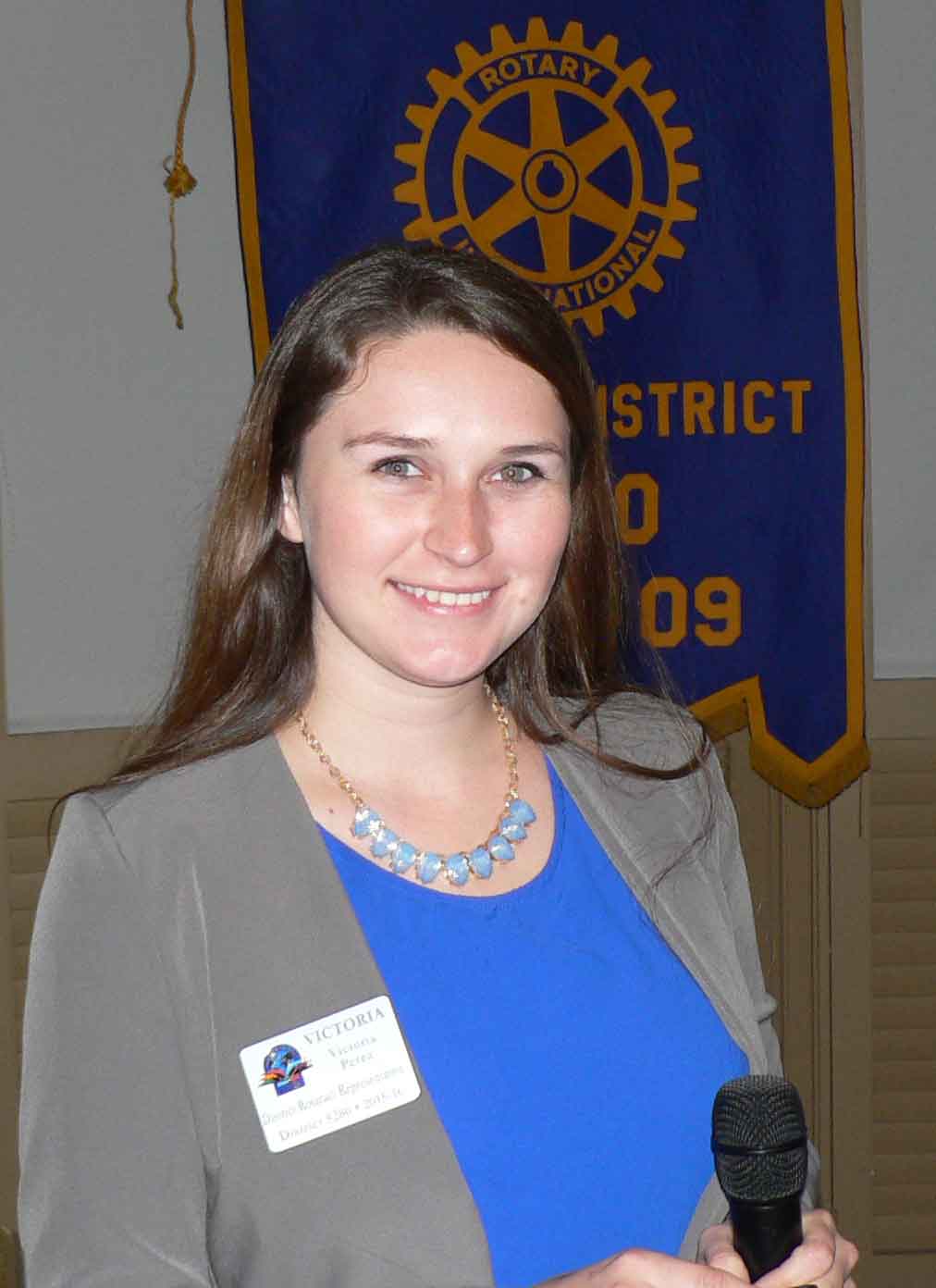
Victoria Perez, a California Marymount University Rotaractor, is the District 5280 Rotaract Representative. With sponsor support from our Club, she participated in the Jan 28-Feb 1 District Humanitarian Trip to Panama.
 The Service Projects visited by our District group included Operation Smile, where they visited the local hospital and saw children prior to their cleft lip/palate surgery; Panama Norte, equipping an E-learning center in Veracruz, NW of Panama city; Playa Coronado, with rehabilitation of bathrooms & sanitation facilities at 2 schools; and El Dorado water system improvements in 2 communities. Victoria showed a slideshow of photos documenting her experiences.
|
Roger Schamp, the Ontario (CA) RI Peace Conference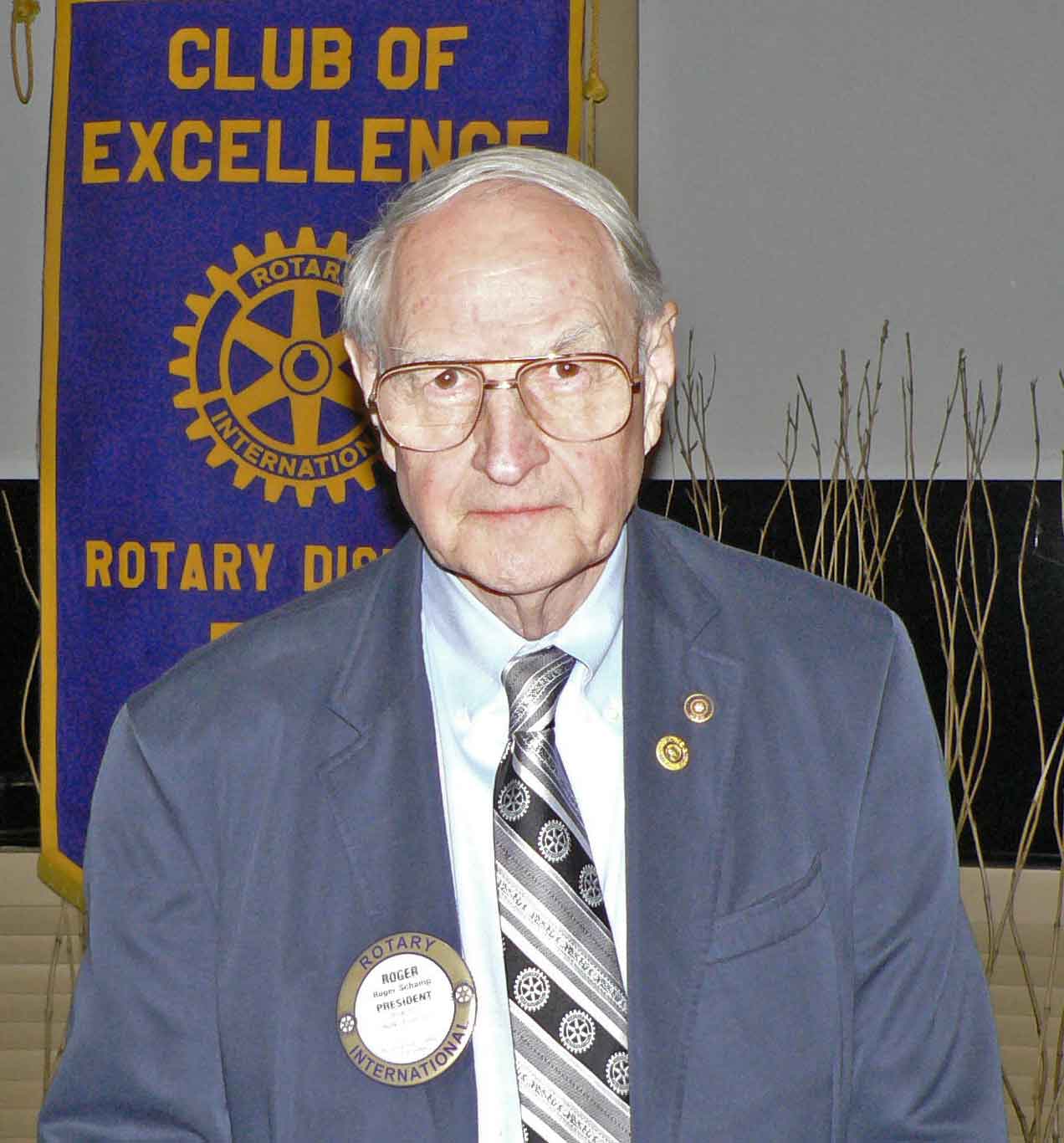
Past President Roger Schamp was our Club’s representative to the Rotary International Peace Conference in Ontario, California, Feb 15-16. There were peace conference tracks with 104 breakout sessions and 150 inspirational speakers on peace-related subjects such as in homes, schools, communities, organizations, religions, news media, the role of technology, and peace advocates working in the world. Roger could attend only 8 of the 104 breakout sessions. Among the speakers were Father Greg Boyle, founder of HomeBoy Industries, and actress Sharon Stone, widely recognized for her humanitarian efforts. Roger attended sessions on Rotary Peace Fellows, the Peace Corps, the Special Tribunal for Lebanon, and Dr Bernd Wohlschlaeger, a World War II Nazi tank commander’s son who converted to Judaism and moved to Israel. Another speaker, Bassel Baz, clandestinely rescues missing children that authorities can’t find, to reunite with their parents. Other sessions dealt with complex water issues, sustainability, and sanitation. Another session was “Developing an Integrated Rotary Peace Plan”, urging Rotarians to maximize pathways to peace, world understanding, and conflict resolution. The final dinner was a tribute to the First Responders of the recent San Bernardino Massacre, some of whom were present. Roger met many DGEs who went to their training in San Diego right after the Peace Conference. Rotary has a long history in peacemaking. In 1921, this concept was incorporated into the Rotary Constitution and Bylaws. In 1940 in Havana, Rotarians adopted a resolution calling for “Freedom, Justice, Truth, and Respect for Human Rights”, which became the framework for the UN Universal Declaration of Human Rights. In 1942, a conference of Rotary Clubs from 21 nations provided the impetus to UNESCO. In the 1945 conference leading to the founding of the United Nations, there were 49 Rotarians (11 from the US) in 29 delegations. Polio Eradication, begun by Rotary, is now promoted by the World Health Organization. |
Cdr Tim Grant, US Coast Guard – The Port of Los Angeles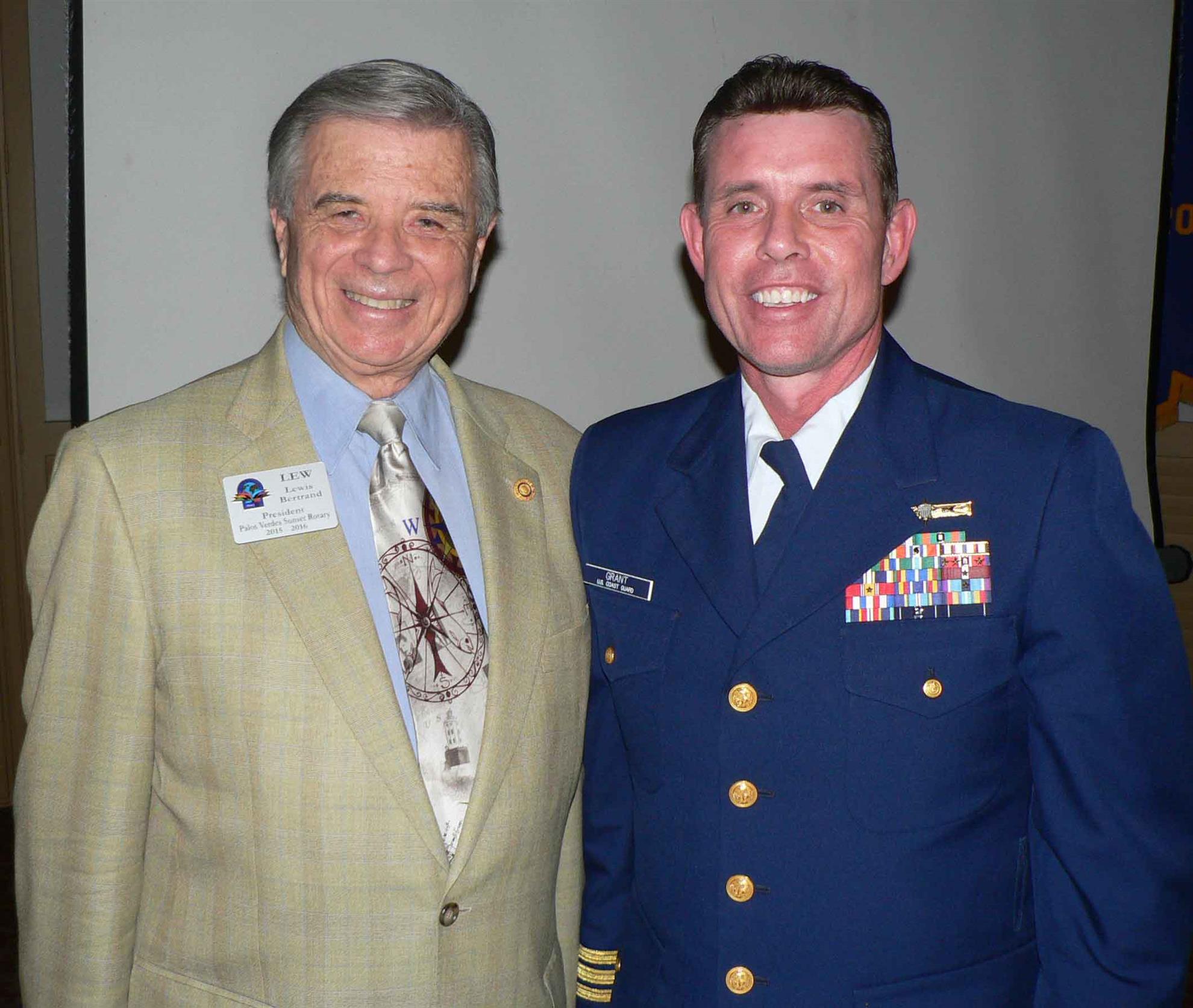
Commander Grant is Chief of Prevention for US Coast Guard Sector Los Angeles-Long Beach, based on Terminal Island in San Pedro. Prior to his appointment in June 2014, he was a Coast Guard cutter commander and held a number of other field assignments on the East Coast and Caribbean. He was born in Hampton, Virginia, and graduated from boot camp in Cape May, New Jersey, in 1989. After Officer Candidate School in Yorktown, Virginia, in 1998, he earned a BS degree from Excelsior College and an MA in Homeland Security with Honors in 2014 from American Military University. He is married and has 4 children. The Coast Guard is under the US Department of Homeland Security. The Los Angeles-Long Beach Sector coordinates maritime operations along the California coast from Morro Bay to San Clemente and out to 200 miles offshore, including the largest US port complex, Los Angeles-Long Beach, which carries 40% of US foreign trade and is the world’s 9th largest port. Prevention-related operations include inspection and examination of domestic and foreign-flagged vessels for compliance with domestic and international safety, security, and environmental standards. The CG also performs inspection of designated waterfront facilities and waterways management. It has a Marine Safety Detachment, a Vessel Traffic Service, and an Aids-to-Navigation Team. Cdr Grant presented a video of examples of Coast Guard port activities and operations involving global trade, security, and rescue. Arriving vessels must provide Notice of Arrival (NOA) to the National Vessel Movement Center (NVMC) 96 hours before arrival, and provide the dates of their 5 previous ports along with other security-related information such as detailed cargo descriptions. 79,000 port calls with 15 million containers were made to the US in 2014, all screened for safety and security. The US Coast Guard also has personnel overseas who visit 150 countries to assess risk levels. Cyber-security is an increasing concern; hackers use cyber-techniques to facilitate their drug smuggling. |
DGE Greg O’Brien, RI International Assembly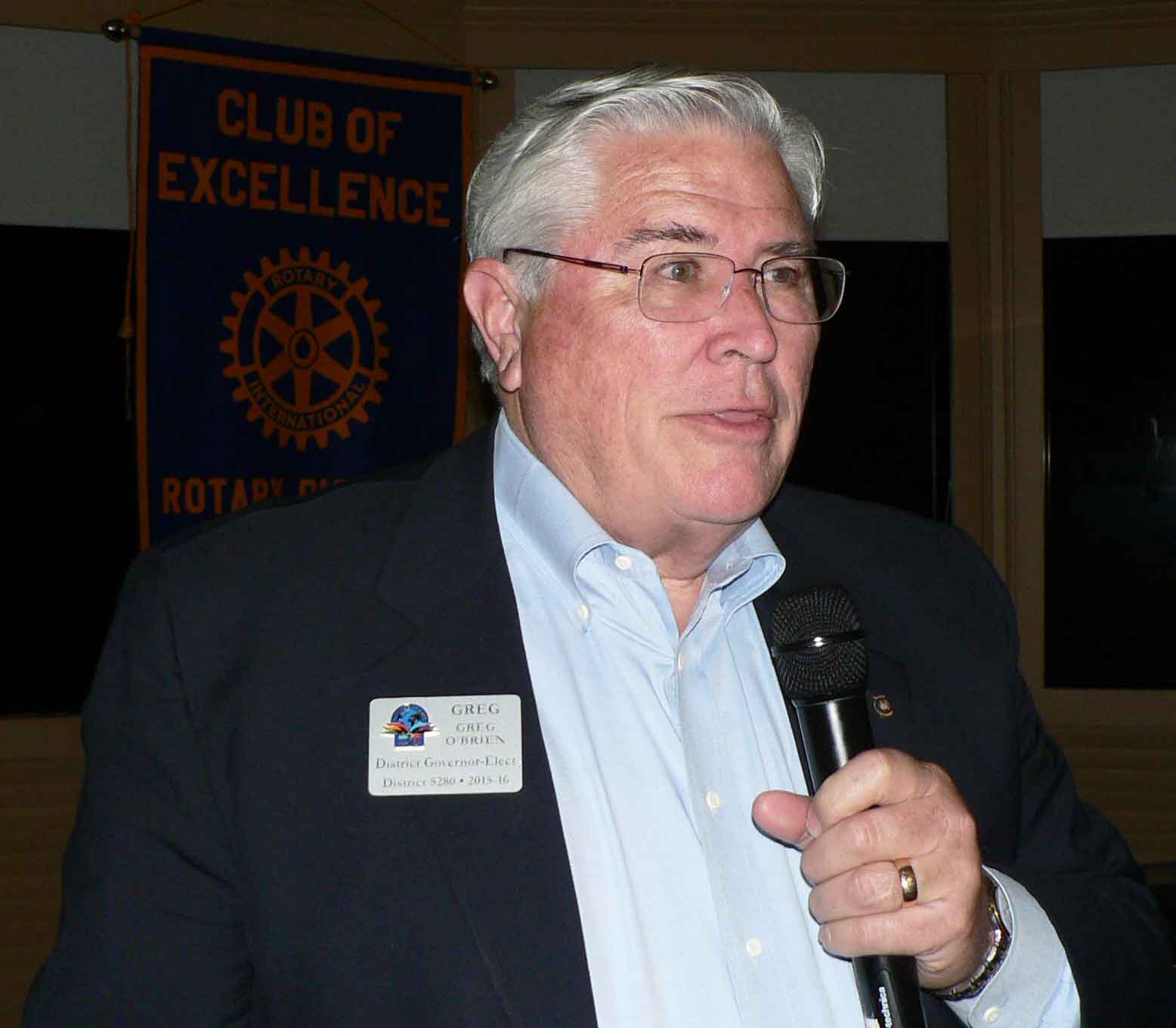
 DGE Greg O’Brien presented a tribute to our late member Don Reeves. Then he discussed his experience on our recent District humanitarian trip to Panama, including going through the Panama Canal. DGE Greg O’Brien presented a tribute to our late member Don Reeves. Then he discussed his experience on our recent District humanitarian trip to Panama, including going through the Panama Canal.As our District Gov-Elect, Greg attended the Rotary International Assembly in San Diego, completing the District Gov training program he had attended in Kauai. He was fired up about the inspirational speakers and meeting DGEs from around the world with fellowship and networking. Rotary’s new motto this year will be “Rotarians Serving Humanity”. The Theme for our President-Elect Training Seminars (PETS) next week will be “Imagine Rotary”.
At age 37, Paul Harris started the first Rotary Club of young professionals in 1906, for business networking and to provide service to the community. Young professionals are the future of Rotary. They are less drawn to structured events such as weekly meetings, and are more oriented towards networking, such as meeting for lunch and flexible schedules. They use social media such as Facebook, Instagram and Twitter. Pins and certificates don’t motivate them, but service with personal impact does. They are not magazine readers, preferring electronic media. They’re looking for friends. The rapid pace of technological changes now mean we have more difficulty mentoring them as new members.
|
Community Helpline, Pam Van Alstyne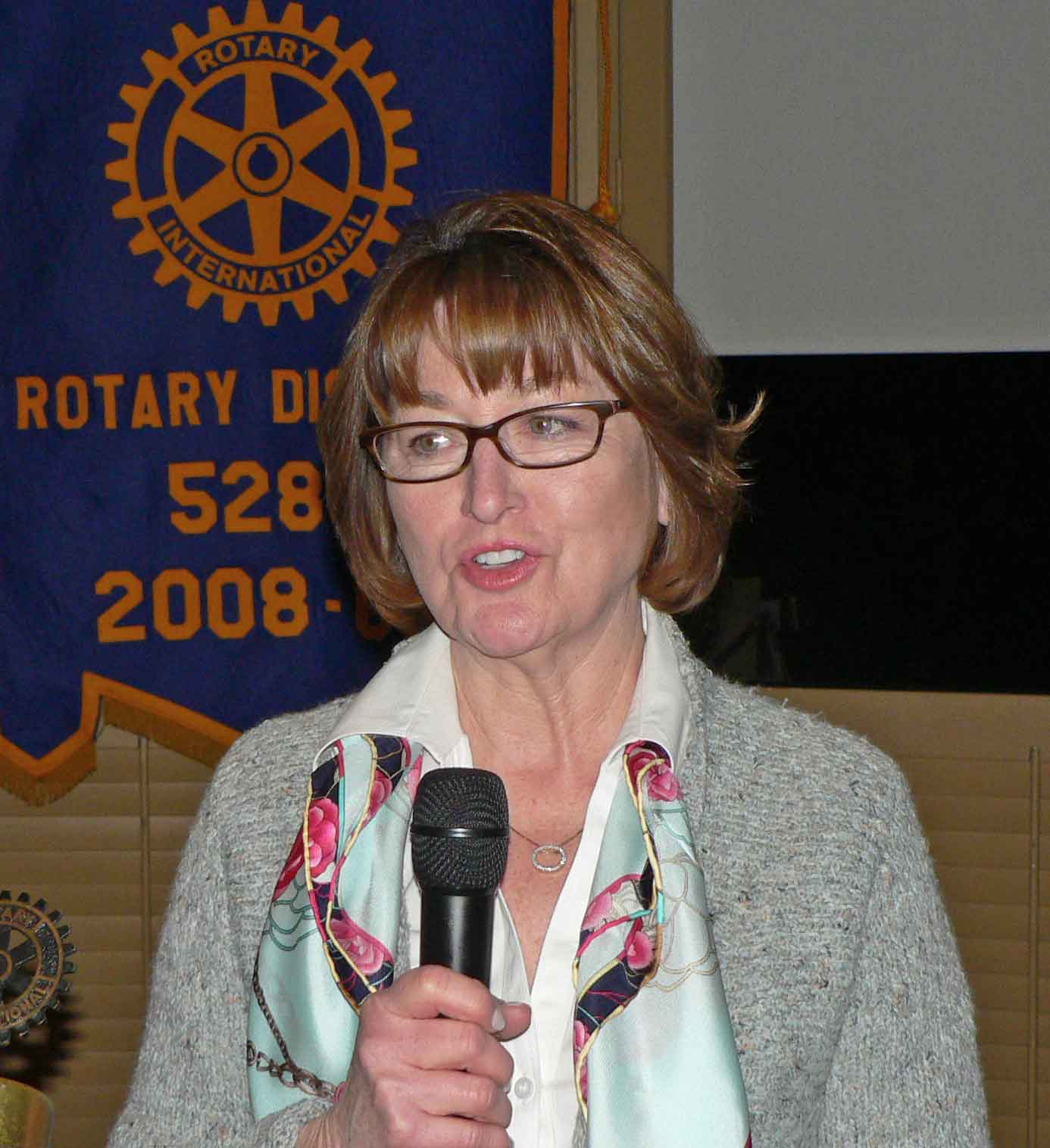 Pam Van Alstyne started with the Community Helpline 15 years ago. It was begun in Palos Verdes in 1957 by a clinical psychologist to help teens with emotional & drug issues. Calls are answered for social service referrals, depression, anxiety, and crisis/suicide calls. The Suicide Prevention Hotline refers callers to the Community Helpline if they need talking support, and the Helpline can refer high-risk callers to the Suicide Prevention Hotline. The Helpline is open 7 days from 7 AM-10 PM. Volunteers are required to attend a 6-week 45-hour "Listening and Communications" training program. They learn empathetic non-judgmental listening. Mental health professionals instruct them about common caller issues like depression, anxiety, substance abuse, domestic violence and suicide. The volunteers are trained to set good boundaries by not giving personal information or opinions. Volunteers are asked to serve 3 shifts of about 3 hours monthly and commit to at least one year of service. Training programs are offered 3 times a year, in spring, summer, and fall, on Tuesday and Thursday from 6-8:30 PM in Redondo Beach. Applications are available at (310) 793-1415 or chelpline.hyc@gmail.com. The Helpline receives about 10,000 calls/day, often from elderly and middle-aged people as well as young adults in college. Volunteers try to focus on what the caller can do to help him/herself. Referrals can be made to psychologists and social services, and if there is serious suicide risk, they can ask the Sheriff's Department to send out an officer. The Palos Verdes Peninsula Directory helps support Community Helpline and Palos Verdes Hills Nursery School. (Sticky notes are put on the covers as reminders of donation envelopes.) The 2016 Palos Verdes Peninsula Directory will be delivered by volunteers on Saturday, February 27th, 7-9:30 AM, from Rancho Vista at 4323 PV Drive North in Rolling Hills Estates. Each driver will transport several student volunteer “runners” to distribute Directories in their designated neighborhoods. Call (310) 793-1415 or (310) 686-0899 by February 20 to volunteer as a driver. |
Fellowship Meeting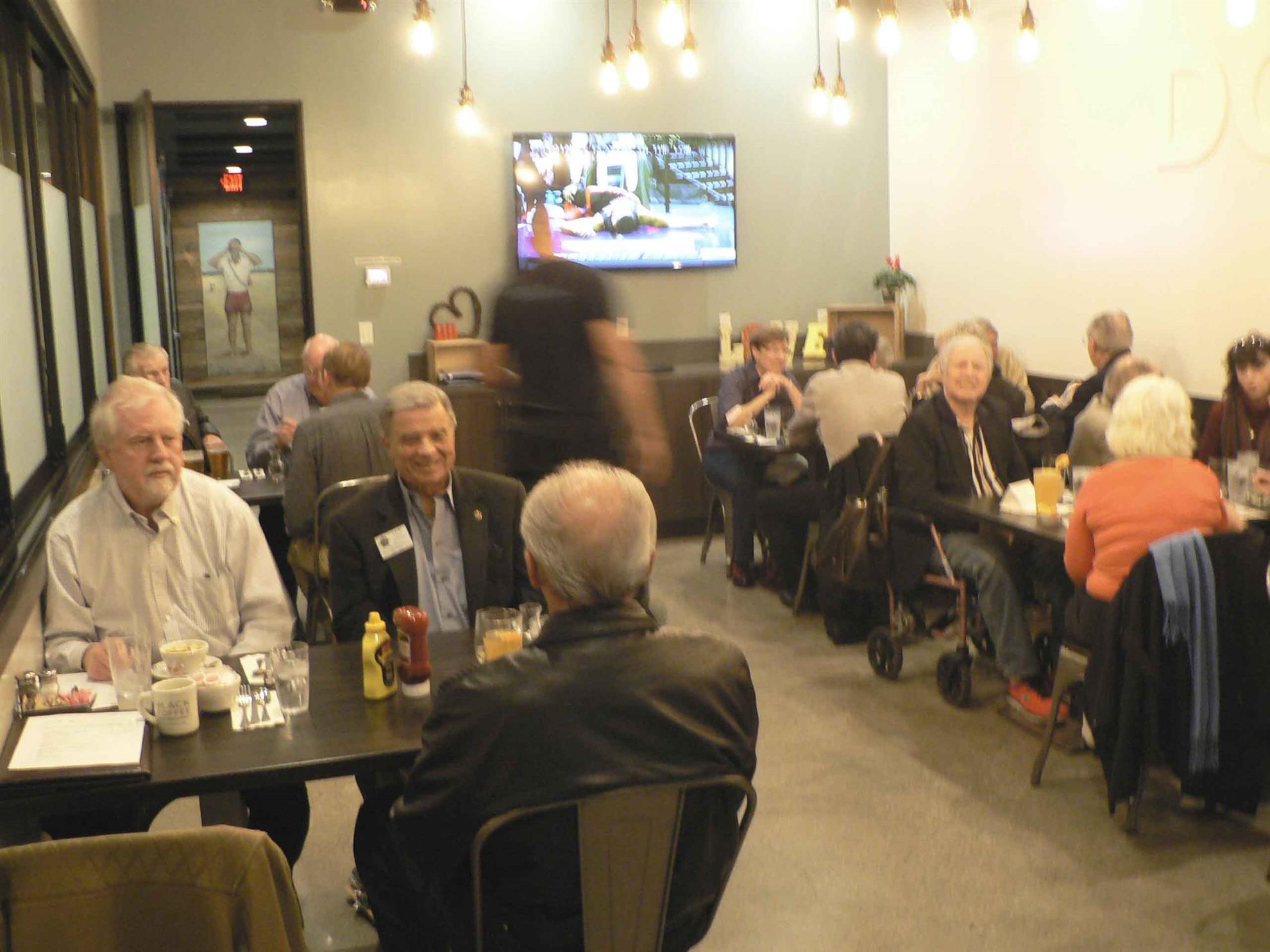 We met offsite at the Good Stuff Restaurant in Rolling Hills Estates, for good Club Fellowship and renewing our friendships. (Our usual venue at RHCC was having its annual membership meeting.)
|
Student Dance Contest, Audrey Dahlgren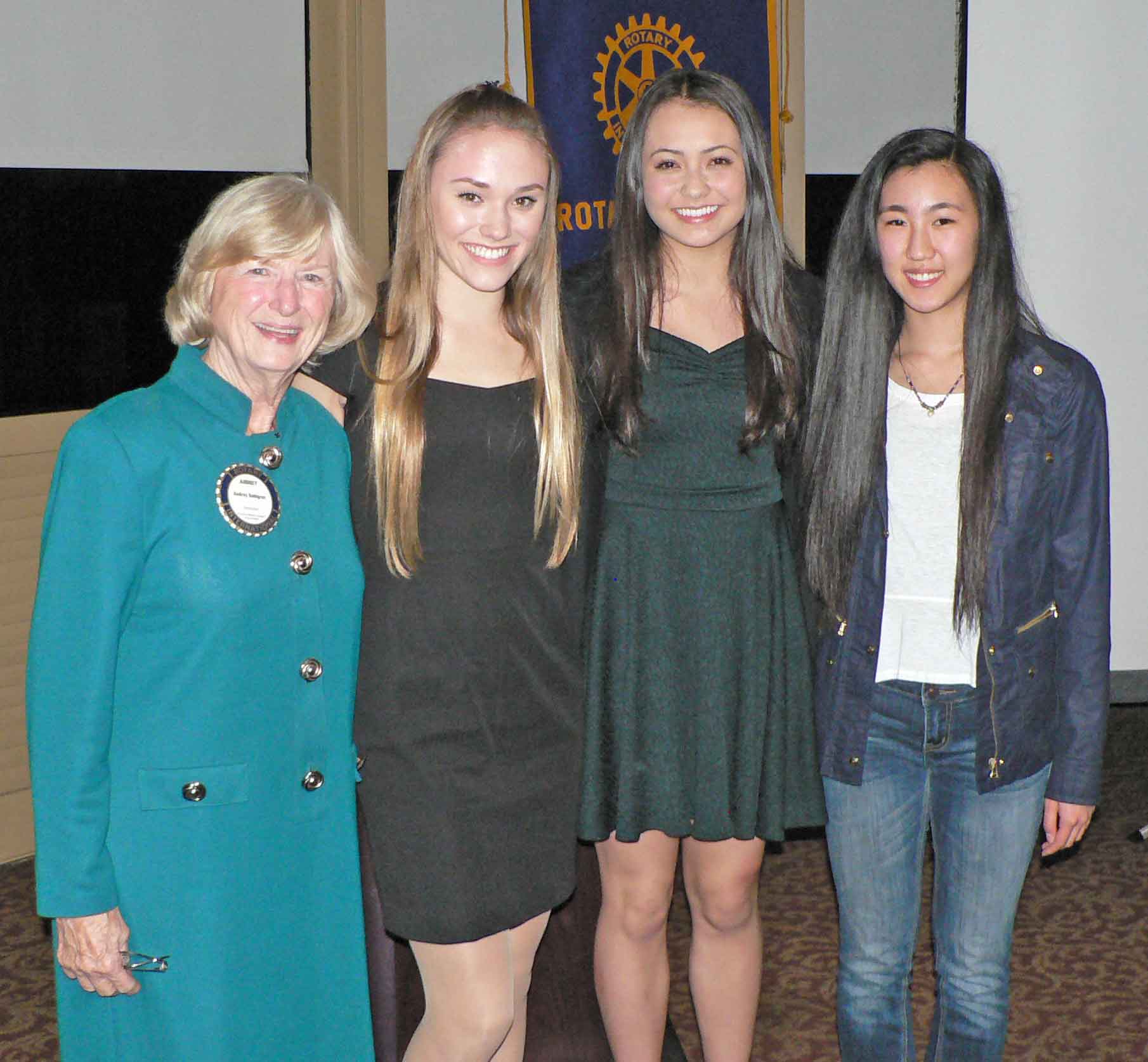
Audrey Dahlgren introduced our Dance Contestants competing to be our representative to the District Student Competitions at Loyola Marymount on March 5: Pictured with Audrey are Tatum Contreras, Amanda Bishop, and Randy Kim. Each one introduced herself and described her history and future plans. Due to lack of adequate space for a dance floor, they presented videos of their performances. (At the District Competition, they will perform live dance.) Each of them presented a very impressive performance. On our panel of judges were Sue Tyree, Betty Reider and Echo Lee, who deliberated on choosing the winner. After careful consideration, the first Place winner was judged to be Tatum Contreras, and the runner-up was Miranda Kim (who will represent our Club at the District Competitions March 5 if the First Place winner is unable to attend). Each was awarded a cash prize and was congratulated for a skillful performance.
|
Rotary Membership - Young Professionals, Ken Chong, LA5 Club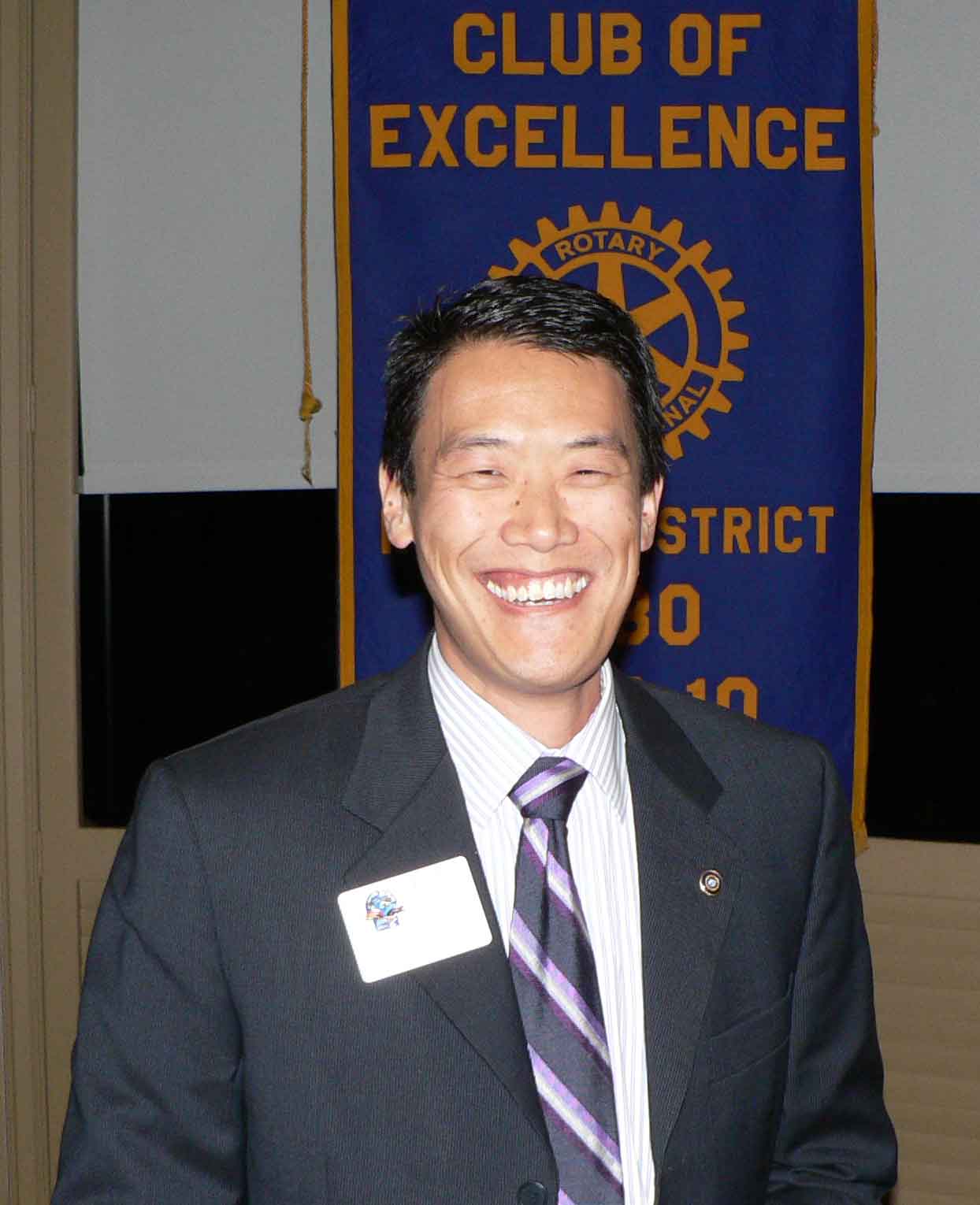
Ken Chong, District 5280 Membership Chair, graduated from UCLA in microbiology and genetics. He joined Rotary in 2004 and was President of the LA5 Rotary Club for 2013-2014. He has sponsored over 30 members to Rotary. He is well known to our current President, PDG Lew Bertrand, and to John Jaacks, a former LA5 member and our President-Elect.
Ken is Executive Vice President of BRC Advisors, a commercial real estate company with 5 Southern California offices, and has experience in real estate syndication, investor relations and commercial brokerage. Previously, he was Advanced Markets Director at the Principal Financial Group for estate planning, compensation packages, retirement programs, taxes, liquidity, yield, and diversification. He has also been a guest lecturer at UCLA Extension on real estate investing.
Ken spoke on Rotary’s need to adapt to social changes in order to attract younger members (under age 40). Rotary is focused on improving the diversity of age, gender and ethnicity in membership. In addressing why people joined Rotary, they often recite business interests (networking) and opportunities for service. We need to show prospective members how Rotary membership can provide value to them for these interests. He illustrated this process by discussing how and why he joined Rotary.
An important factor in recruiting and retaining young members is having a designated person as a mentor to support each new member, to explain our service projects and to promote introductions and friendships for networking within the Club and community. Younger members are more likely to have family responsibilities and financial barriers, which we need to recognize and address. We need to promote active involvement of all of our members to promote member retention. (Rotary also has a goal of 50% of Club members being registered in My Rotary, to promote better communication and to review inquiries from prospective, referred, and relocating or returning members. Ask President Lew about login privileges to our Club website, http://portal.clubrunner.ca/2533.)
|
Frank Zerunyan (City Councilman, Rolling Hills Estates)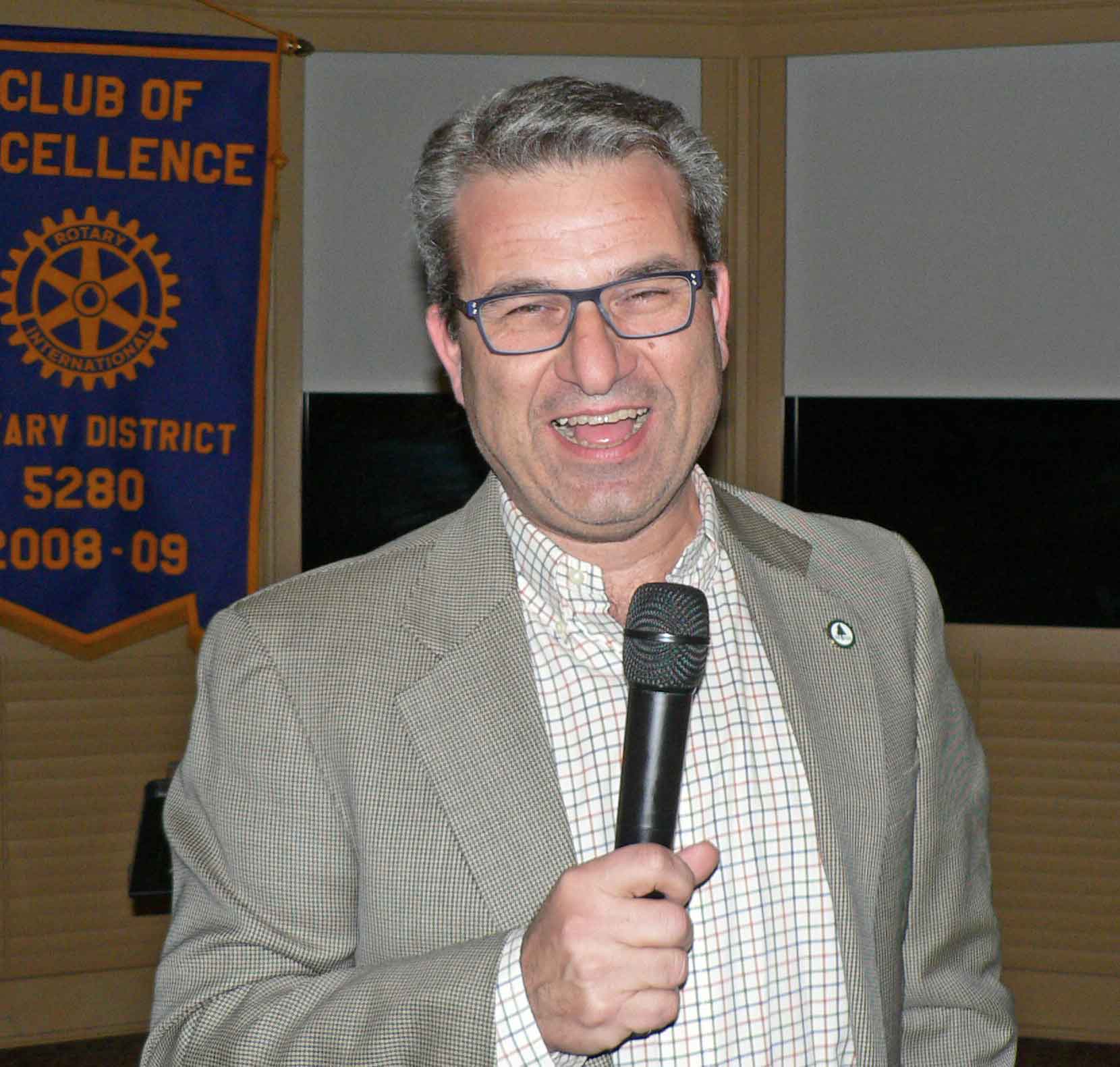
Frank Zerunyan, an attorney, has been a City Councilman in Rolling Hills Estates since 2003 and has served 2 terms as Mayor. He has served on various city government committees and regional public boards, including the Medical Board of California under Governor Schwarzenegger. He is a Professor at the Sol Price School of Public Policy and Director of Executive Education at the USC Price Bedrosian Center on Governance.
Mr Zerunyan started by discussing the Armenian Eastern Orthodox Christmas tomorrow, January 6. Armenia was the first country to adopt Christianity in 301 AD, before the Roman Empire did (and has its own Armenian Quarter in the ancient city of Jerusalem). When the Romans under Emperor Constantine adopted Christianity, they placed Christmas on the winter solstice (feast day of the god Jupiter, which was December 25 in the calendar then in use) in order to co-opt the pagan celebrations. Western and Eastern celebrations of Christmas have been on these different days ever since.
Mr Zerunyan reviewed the current Rolling Hills Estates city government issues and projects, including the current extensive modifications at the Rolling Hills Country Club. There are ongoing commercial and residential permit and code variances processing. Maintenance of riding trails, storm drain improvements, and trash exclusion devices on city catch basins are especially important with the anticipated El Niño rainfall, to prevent property damage from flooding.
Ongoing projects have included an assisted living project at the Village Shopping Center, improvements on the Deep Valley Dr hillside area, expansion of the characteristic 3-rail vinyl fencing along major streets, parking and landscape maintenance, tree trimming, and horse trails. Los Angeles County Sheriff and Fire Departments provide first responders services, and well-trained volunteer civilian groups are ready to assist in an emergency or disaster. The annual June PV Street Fair & Music Festival is supported by the Palos Verdes Chamber of Commerce. Maintaining a profitable mix of commercial properties in the Silver Spur area is an ongoing challenge, but the city is fiscally sound. |
Holiday Party and Dinner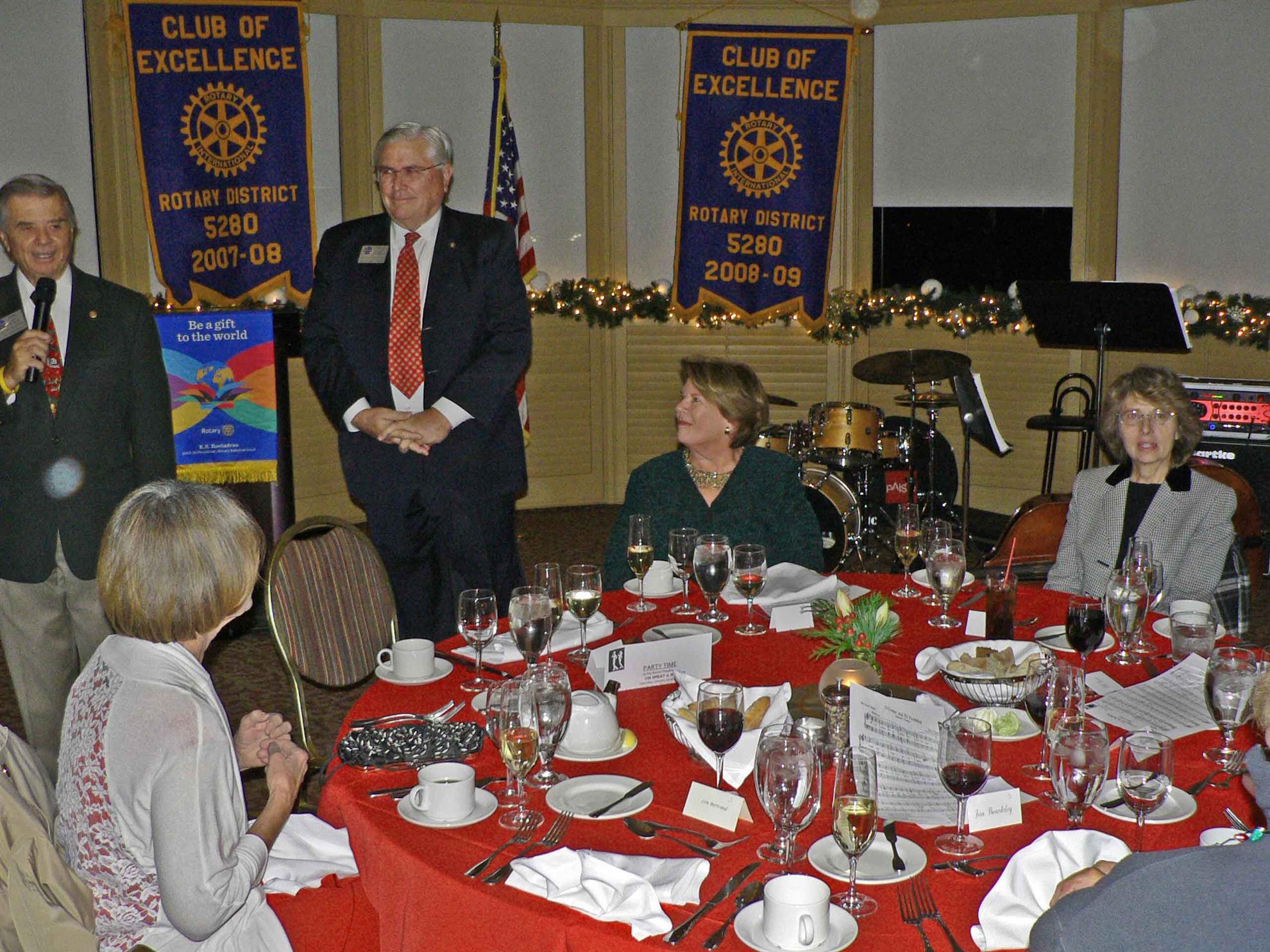 Pres Lew Bertrand introduced DGE Greg O’Brien and other guests.
Thanks to Trixie & Jim Gamble (a Charter Member of our Club) for providing Champagne for a toast!
(Music was by Freedom4U Band)
|
Marymount California University, Ariane Schauer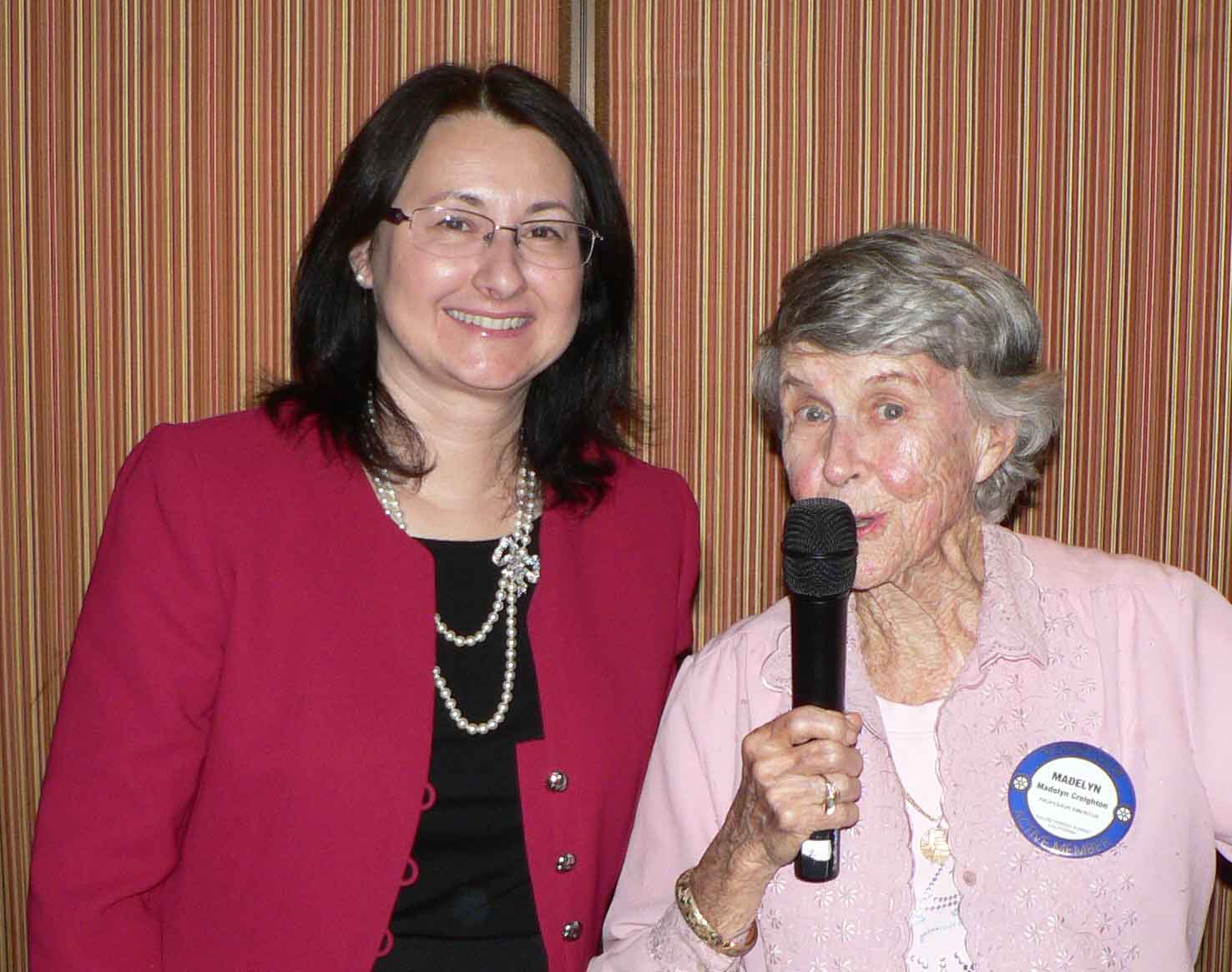
Madelyn Creighton introduced our speaker, Ariane Schauer, PhD in Economics at Marymount, and Interim Co-President and Provost (pending the replacement of Dr Michael Brophy who has accepted another position elsewhere). (James R Reeves, Chief Financial Officer, is the other Co-President.)
During President Brophy’s 9 years, Marymount has expanded to a 4-year university, almost doubled enrollments (to 1100) and revenues, added campuses in San Pedro and in Lake County in Northern California, and added degree programs. There are now 4 undergraduate programs, in Business, Liberal Arts, Media Studies, and Psychology, and 3 graduate programs, in Business Administration, Leadership & Global Development, and Community Psychology. There are 5-year programs for BA-MS and BA-MBA. An undergraduate Criminal Justice program is pending approval. The student-to-instructor ratio is 18:1.
|
Student Speech Contest, Audrey Dahlgren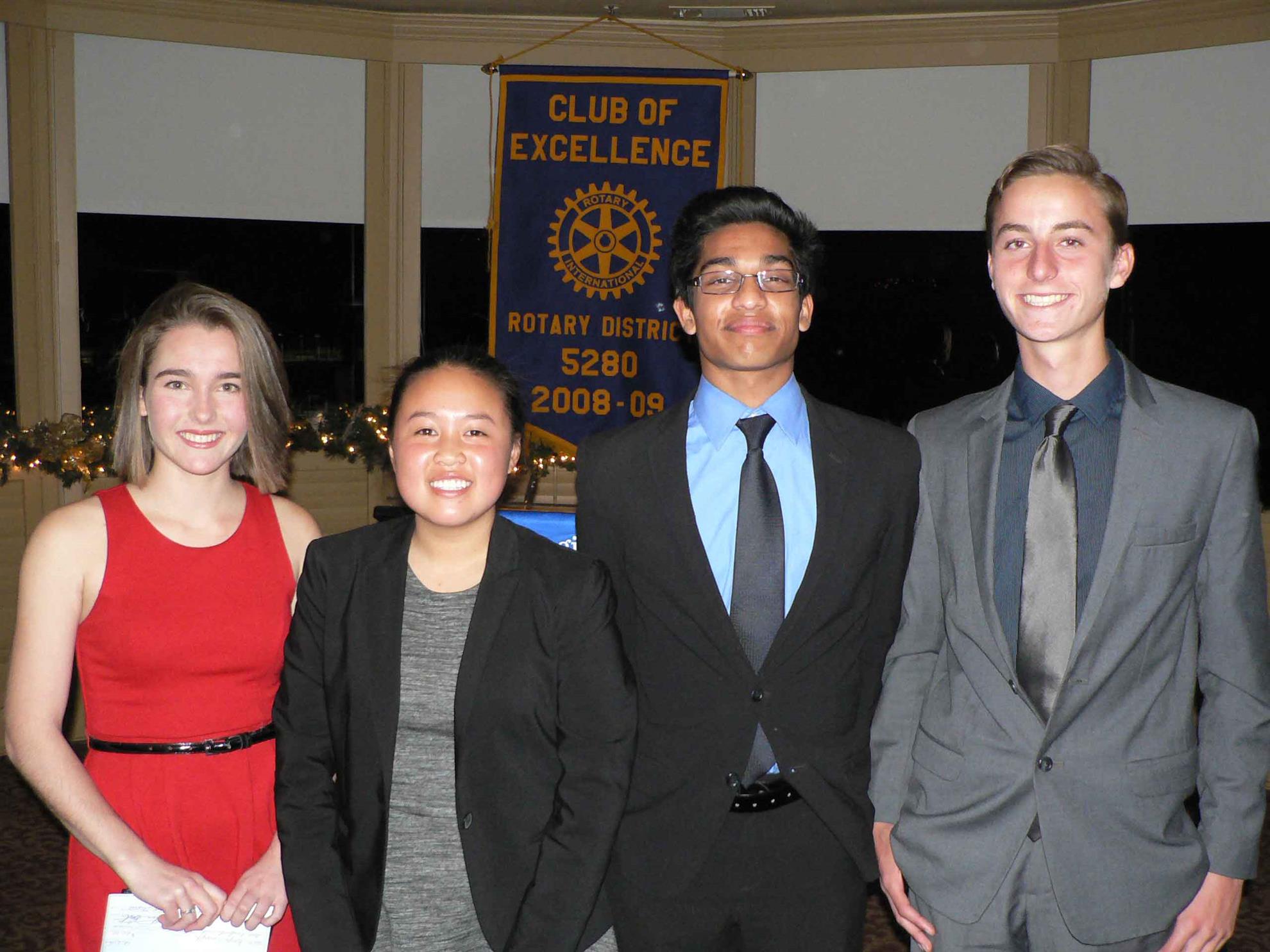 Audrey Dahlgren introduced the student speech contestants, who each spoke briefly on “Be a Gift to the World”, Rotary International’s theme for this year 2015-2016. The students were Katya Forsyth, Kaylen Ng, Samal Senaratna, and Brandon Nash. Audrey Dahlgren introduced the student speech contestants, who each spoke briefly on “Be a Gift to the World”, Rotary International’s theme for this year 2015-2016. The students were Katya Forsyth, Kaylen Ng, Samal Senaratna, and Brandon Nash.The judging committee consisted of Sandy Farrell, Dave Moyers, Chuck Klaus and Charley Ferraro. After much deliberation, Katya Forsyth was chosen the winner (sharing our values with others and being thankful for what we have), and Kaelen Ng was second (mental illness and handicaps in children). Congratulations, and thanks to all for their hard work and talent, and thanks also to the judging committee members. The winner will represent our Club at the District competition at Loyola-Marymount University on Sat, Mar 5.
|
Ken Dyda, RPV City Councilman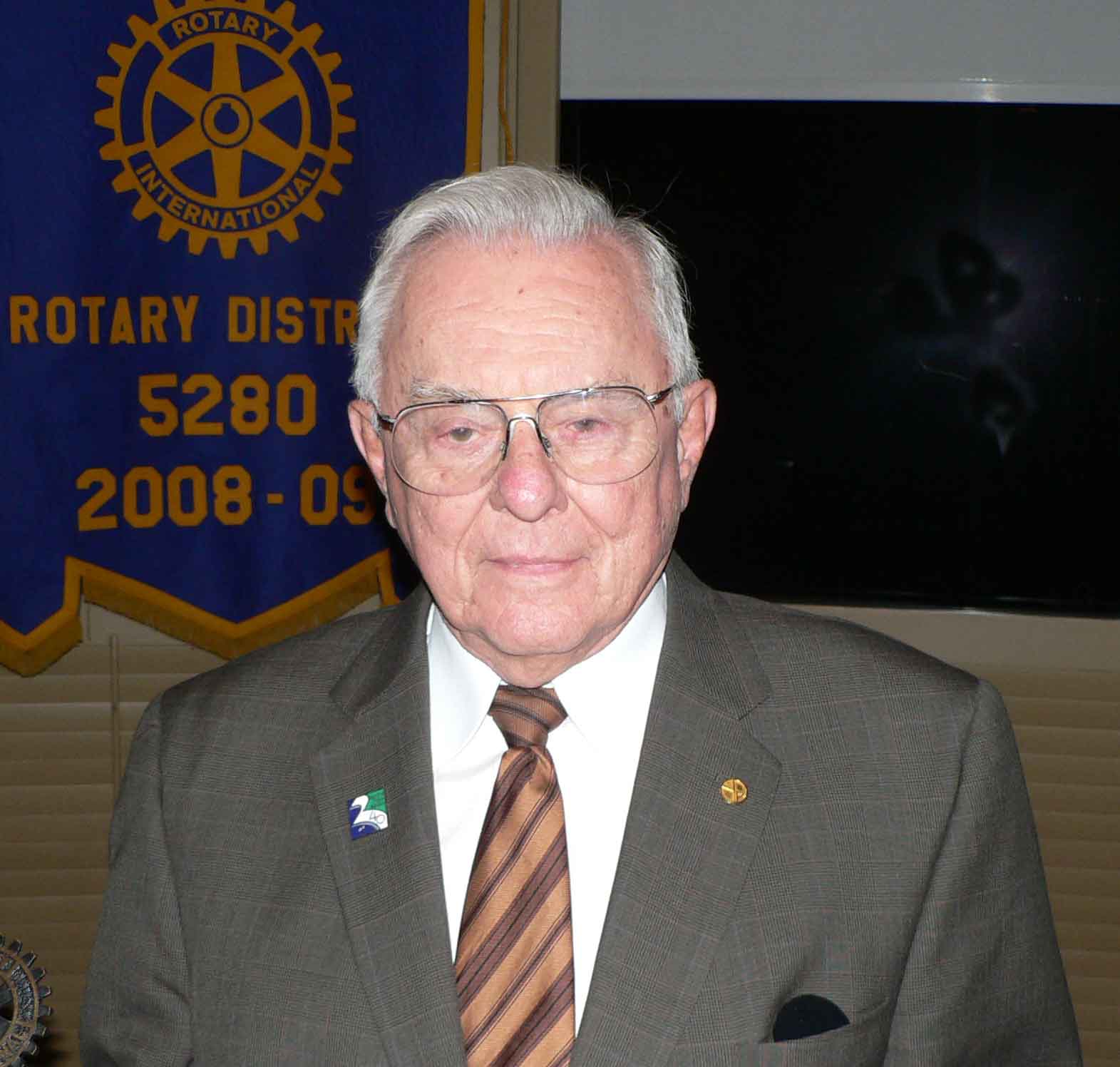
Ken Dyda, a former aerospace engineer, was active in the formation of the City of Rancho Palos Verdes (to preserve the rural atmosphere and coastal views and avoid commercial overdevelopment of the coastal areas). After it was incorporated in 1973, he was elected to 3 RPV City Council terms before retiring from politics. After 32 years, he has now been reelected to the City Council, and he has definite ideas on the future directions for RPV.
His concerns include reestablishing Council oversight over city staff. He has seen many city government mistakes made when poorly supervised staff gets careless, such as the recent controversial mausoleum project at Green Hills, and the ongoing storm drain controversies. Reports to the Council need to have cited references so the Council can make informed decisions. Ken wants more transparency to provide knowledge to both the Council Members and the citizens. He is encouraged by the new City Manager and other new staff.
Currently, reports come out Friday morning for the Council to consider on their following Tuesday evening Council Meeting. He wants more time for a public comment period before the Council takes action. These reports should be published 2 weeks before the next Council Meeting. Everyone should be working from the same knowledge base to produce better decisions. He also wants to have competitive bids for city projects and services.
|
The Long Beach “Nutcracker”, Mariano Sanz & Craig Rexroad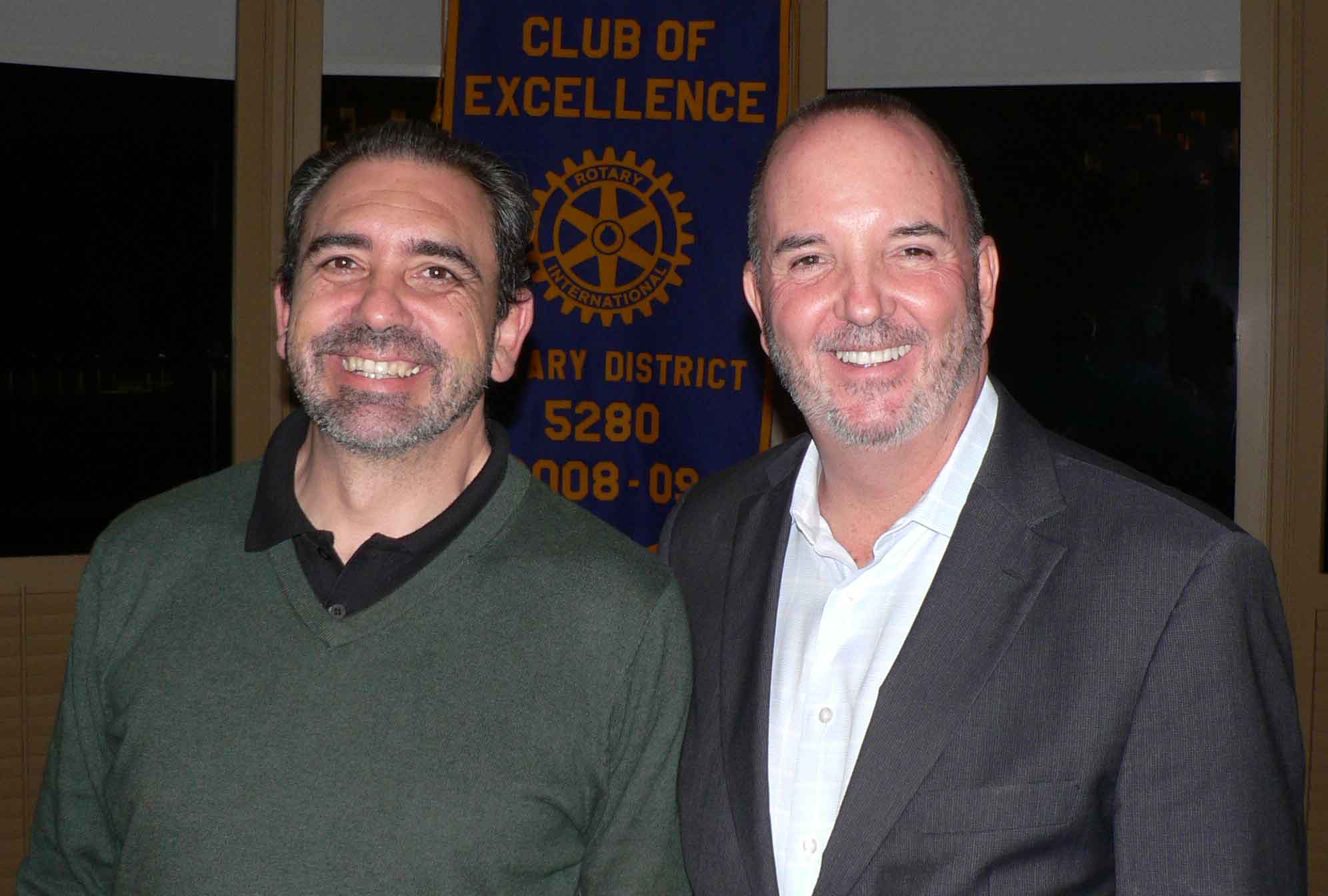
Craig Rexroad has been involved in the Long Beach Ballet Academy for many years and has two daughters in ballet. Mariano Sanz grew up in Spain and moved to California eight years ago, and has worked with Craig in promoting and acting in the annual Long Beach “Nutcracker” production, now in its 33rd year under the same director. They discussed their experiences in performing as well as family participation in the ballet.
|
Student Art Contest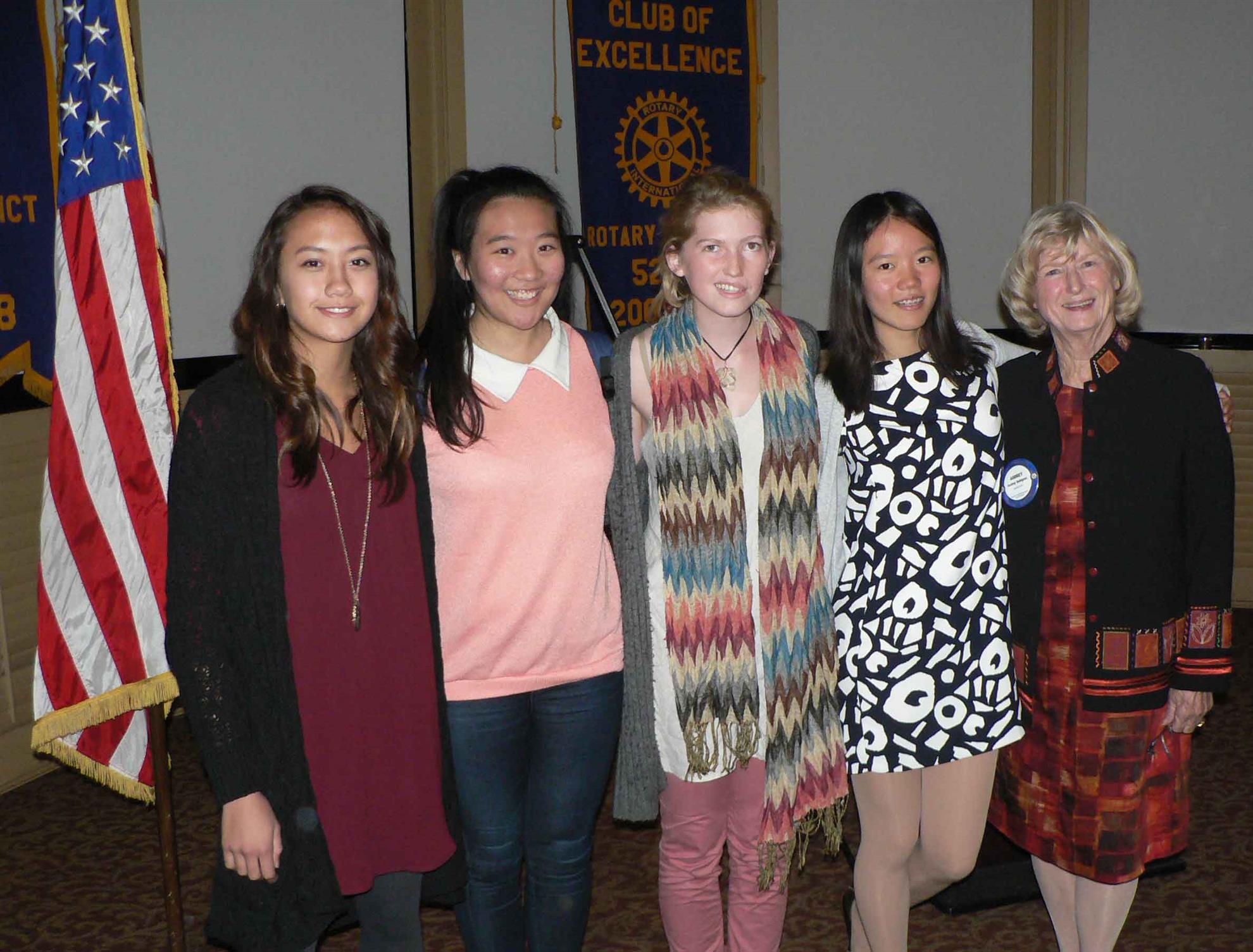
Audrey Dahlgren, our Club’s student talent contest organizer, introduced the student contestants for the District Art Contest, the second of four student competitions: Sophia Boss (PVHS), SoYoun Jeon (PVPHS), Emma Butler (PVHS), and Chelsea Liu (PVPHS). Special thanks and congratulations to all 4 talented student contestants! Thanks also to the Judges Committee (Larry Andrews, Astrid Naviaux and Marilyn Klaus), and especially to Audrey Dahlgren for her work in recruiting and organizing this event. The winner, Emma Butler, will represent our Club at the District Art Contest, whose winner will be asked to display their winning art entry at our District Conference in San Diego April 28-May 1.
|
Christian Maeder, Craft TalkChristian Maeder is a graduate of Loyola Marymont University. He began his carrer eith AIG. After working for a hedge fund, he became a financial advisor for Edward Jones. In that position he was expected to knock on doors making cold calls. After 7 years there he moved to Raymond Jones and now is the owner of Maeder Wealth Management dedicated to provide wealth management and investment advice to individuals, medical professionals, conservators and strategic partners.
|
Pres Lew Bertrand's Family HistoryPresident Lew Bertram shared the fascinating story of his obviously very adventuresome forbears and his grandfather’s immigration from Ireland to South Africa to Australia and subsequently to New York. Weekly letters he had sent to Lew’s grandmother were intercepted, so they lost track of each other until he found Mary in New York City, where his grandparents were married. His family then went to St Louis and on to Porterville. His relatives also went to Alaska in the gold rush.
|
Student Music Contest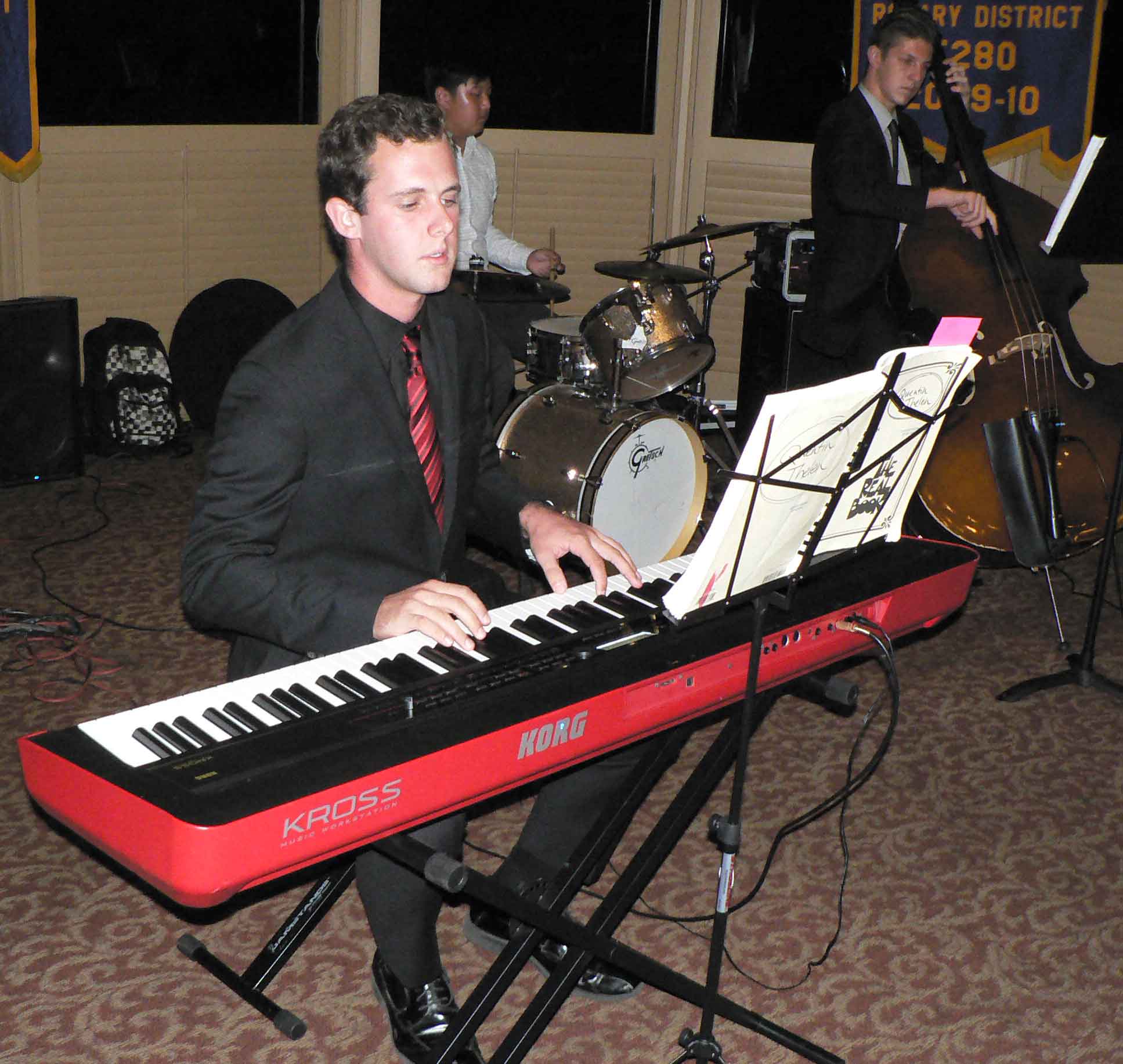
Audrey Dahlgren, our Club’s student talent contest organizer, introduced the student contestants for the District Music Contest, the first of four student competitions.
The four contestants were:
 The judging committee included Dave Moyers, Wally Christmas, John Turner & Chuck Klaus. After intensive discussion and comparison, the winners were determined to be:
|
DG DJ Sun Visit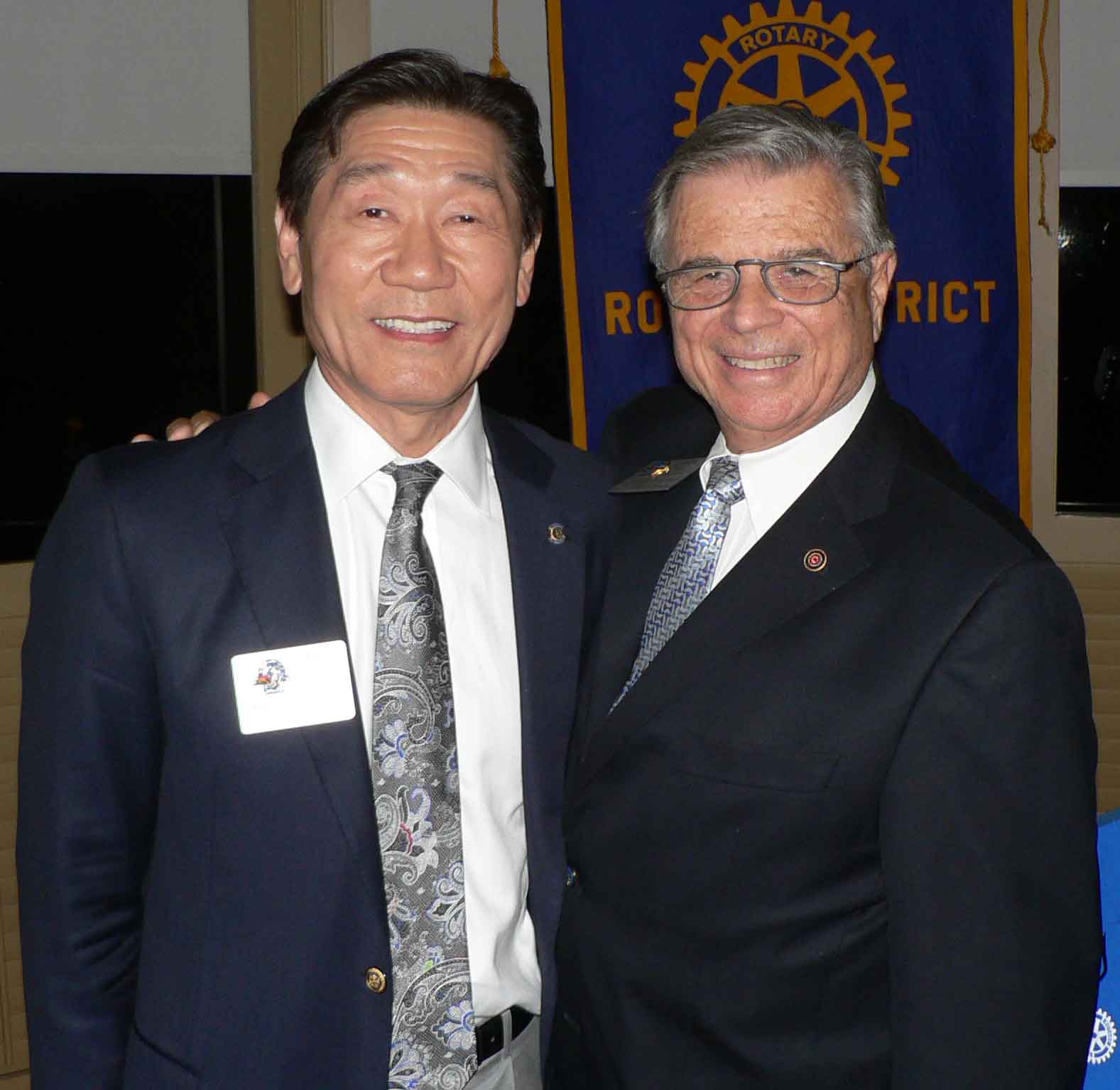 District Governor DJ Sun was born in Seoul, Korea, and came to the US to earn BS & MBA degrees. He met his wife at the university, and they have 3 children. She had been a schoolteacher in Singapore and came to the US to study finance. They moved to Los Angeles in 1989 to work for a real estate brokerage company, and he joined the Koreatown Rotary Club. In 1996 he formed a commercial real estate investment group. He has served in many different leadership positions at the Club and District levels. As Club President in 2008, he participated in a Matching Grant Trip for corrective surgery for cleft-lip and palate children in the Philippines. He has participated in two more international cleft-lip & palate surgery projects in Vietnam. He believes we Rotarians can do bigger, better and bolder projects in our community and worldwide.
|
Jon Caplan, Craft Talk
 Jon Caplan, one of our newest members, grew up in Palos Verdes, attending Malaga Cove Elementary School and Rolling Hills High School. He attended USC and became an English major (to be in class with his girlfriend), and he worked on the student newspaper, The Daily Trojan. He graduated during a recession and was out of work for 6 months before finding a job in Compton. His mother was a Special Ed Teacher, so he decided to become a substitute teacher in Special Ed, which no one else wanted to do. Jon Caplan, one of our newest members, grew up in Palos Verdes, attending Malaga Cove Elementary School and Rolling Hills High School. He attended USC and became an English major (to be in class with his girlfriend), and he worked on the student newspaper, The Daily Trojan. He graduated during a recession and was out of work for 6 months before finding a job in Compton. His mother was a Special Ed Teacher, so he decided to become a substitute teacher in Special Ed, which no one else wanted to do. |
Rotaract Vision, with Victoria Perez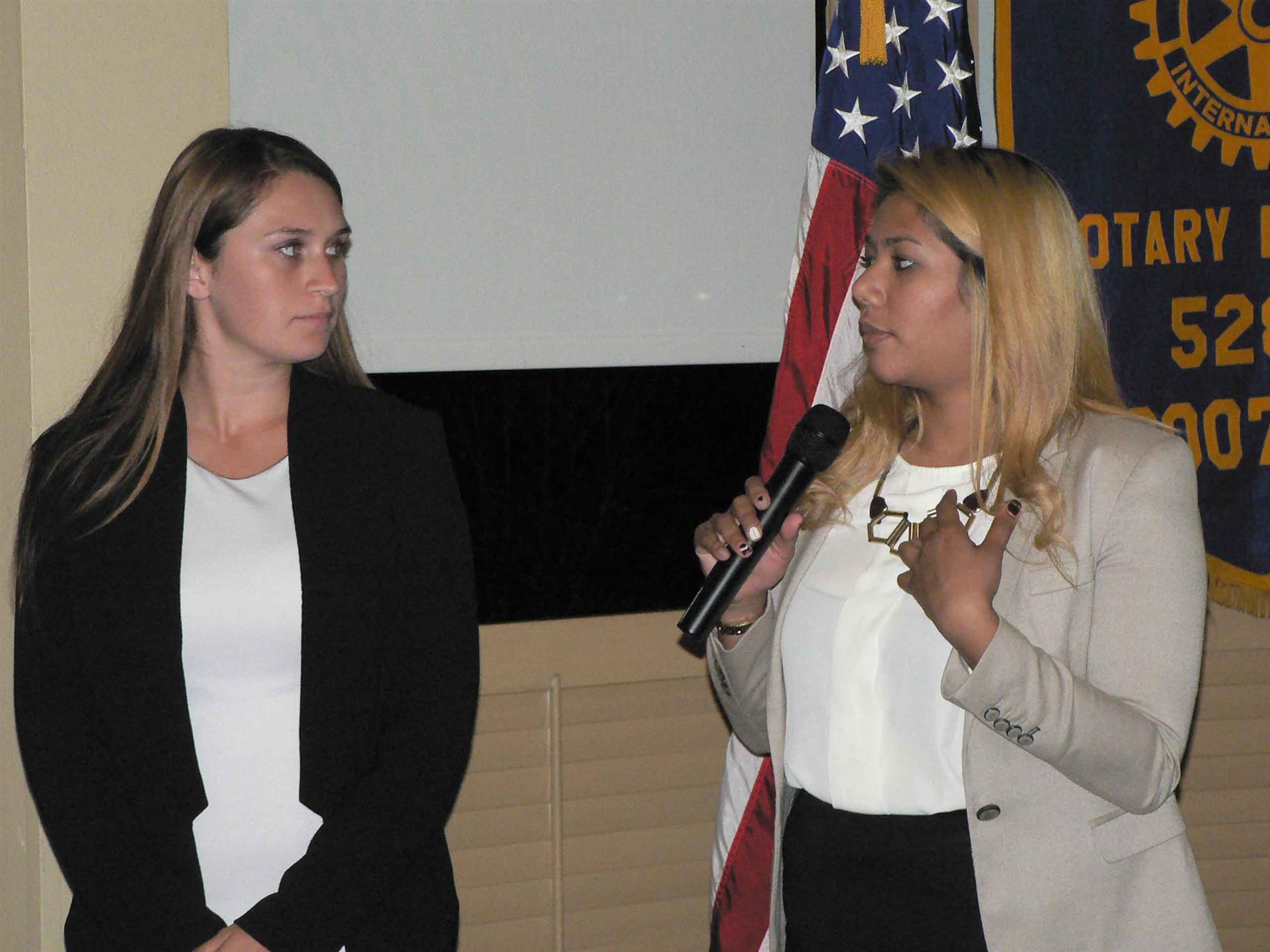 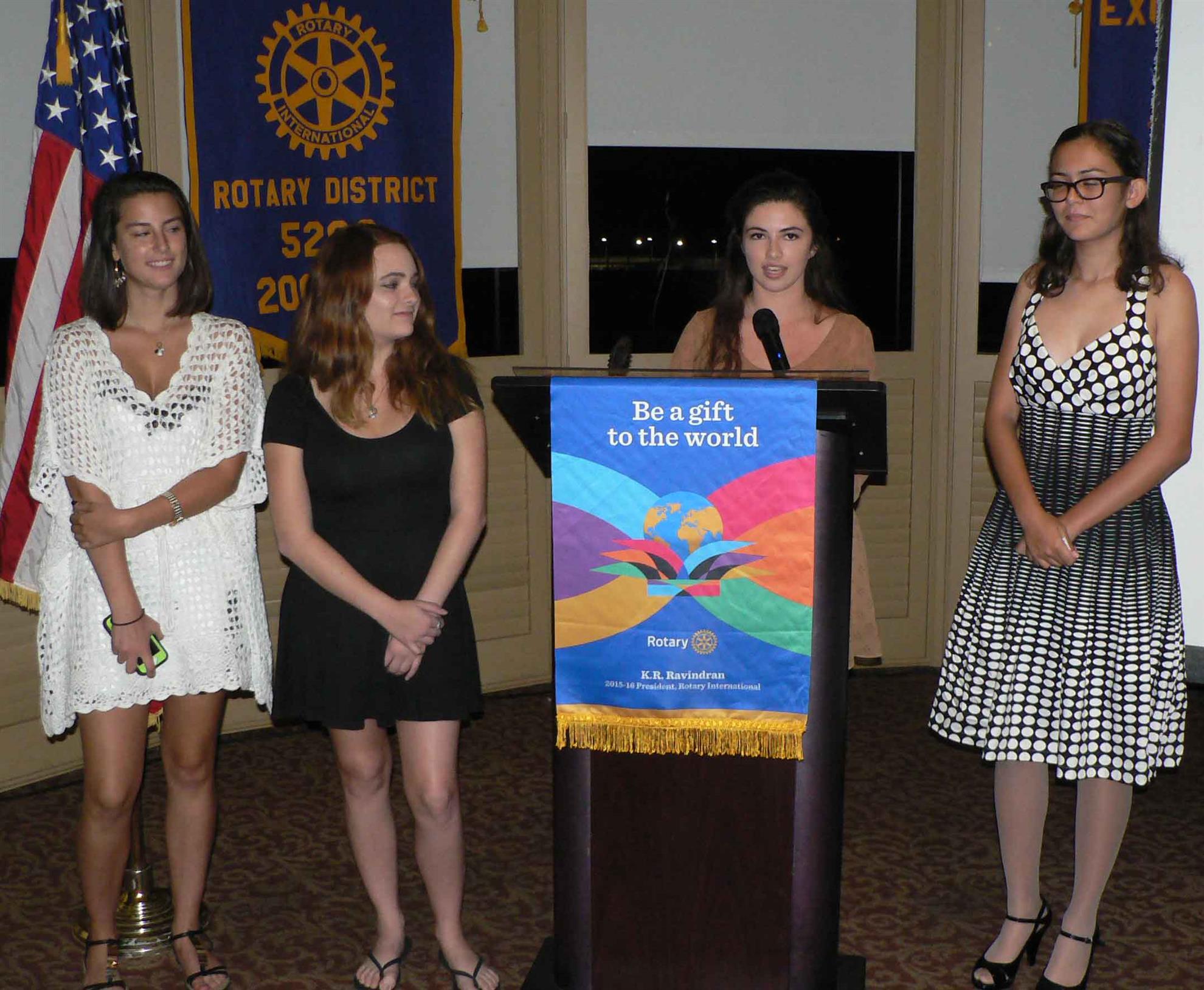 The California Marymount University Rotaractors discussed their new members and their proposed projects. They are organizing a Backpacks & School Supplies collection between now and February for the District’s Panama Humanitarian Project, and will pick up donations at the District Breakfast on October 20.
|
Francisco Homes, by Sister Teresa Groth and David Schwed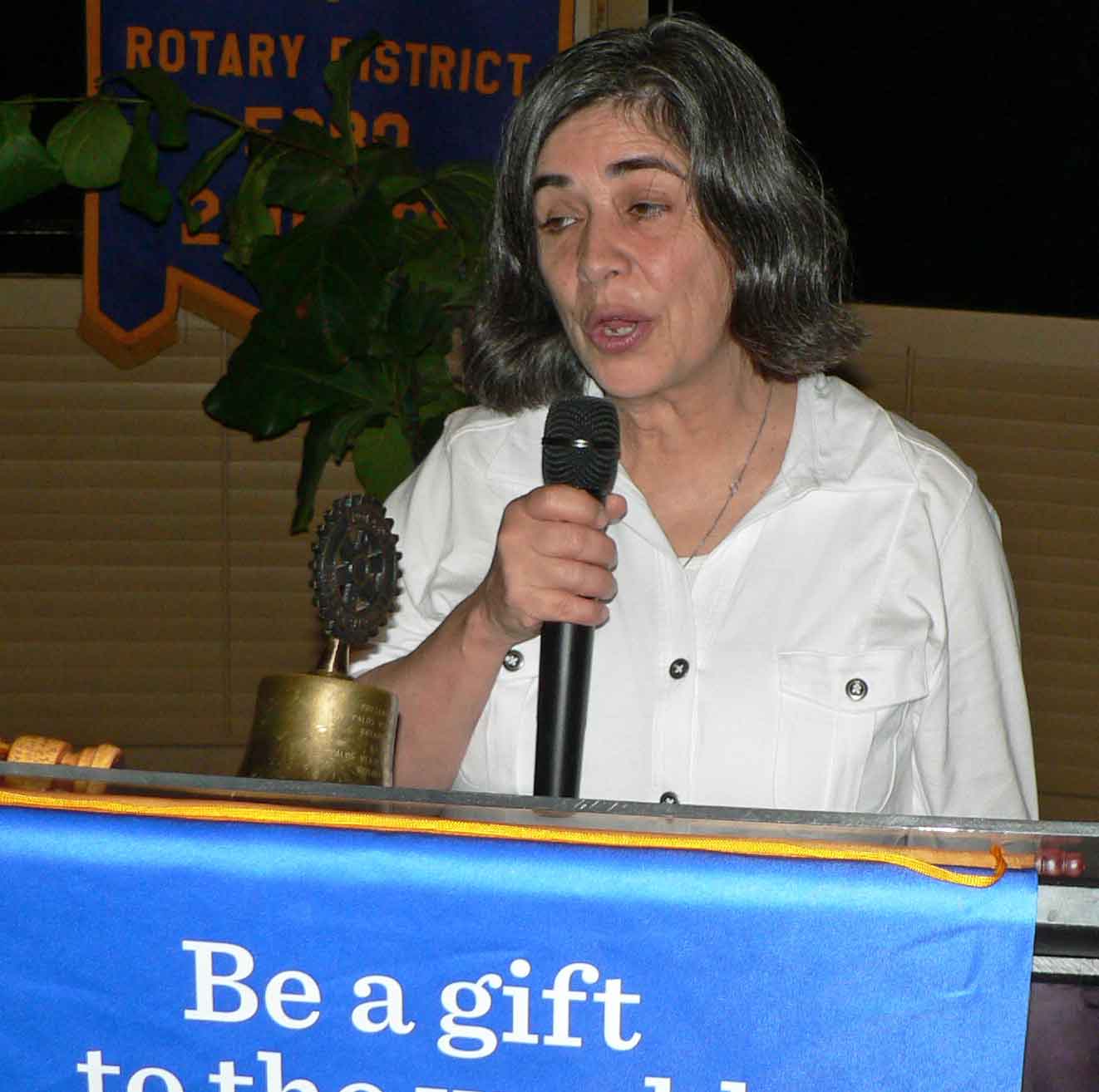 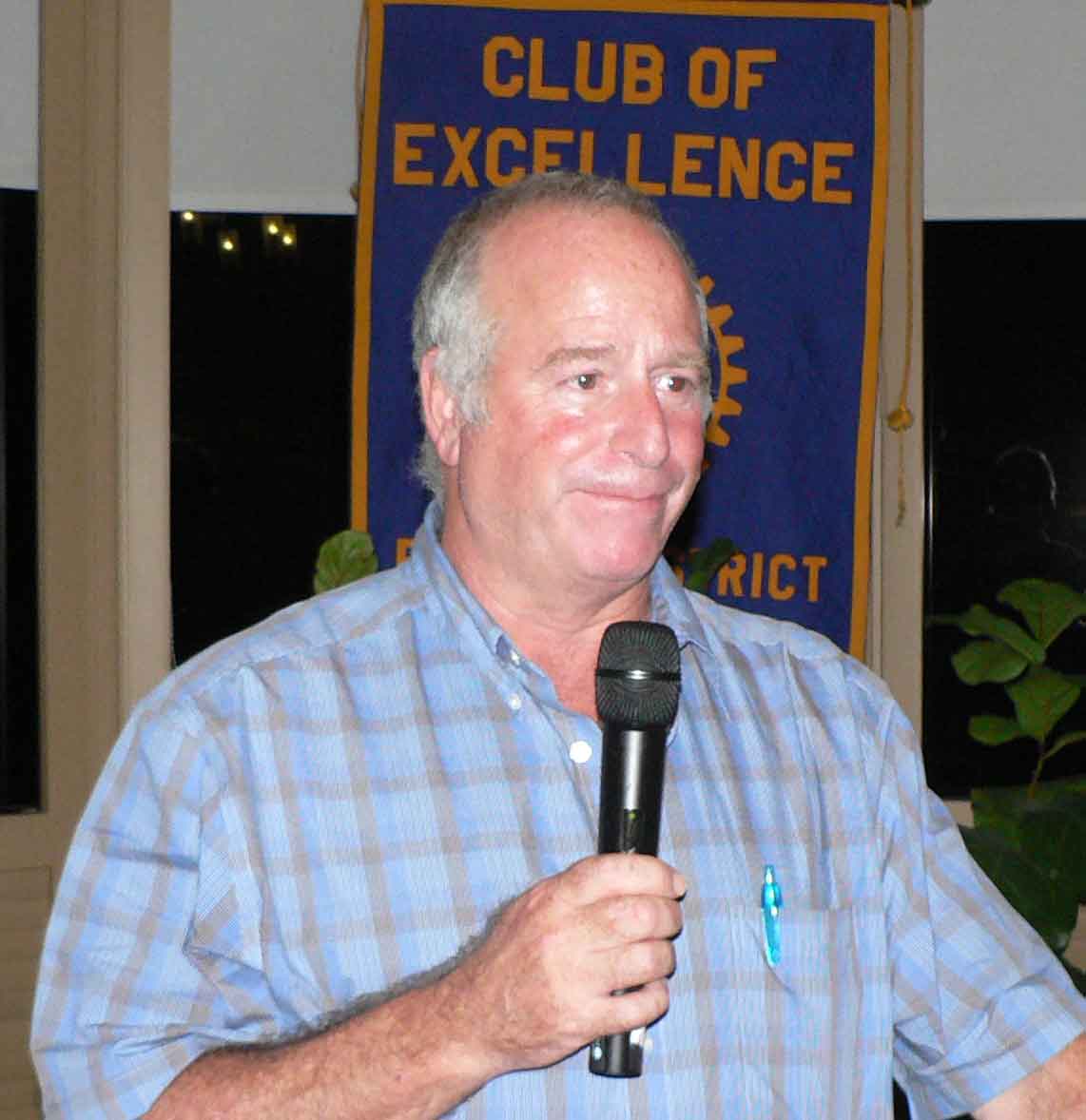
  There are 5 Francisco Homes in the Los Angeles area, providing transitional living for 55 men reentering society from prison, offering them logistical and emotional support and hope for a better future. Many of them have memories of toxic childhood experiences. To be accepted into the program, they must have earned honor status, behavioral credibility and worthiness of release from prison. There are 5 Francisco Homes in the Los Angeles area, providing transitional living for 55 men reentering society from prison, offering them logistical and emotional support and hope for a better future. Many of them have memories of toxic childhood experiences. To be accepted into the program, they must have earned honor status, behavioral credibility and worthiness of release from prison. |
Larry VandenBos, School Board President, PVPUSD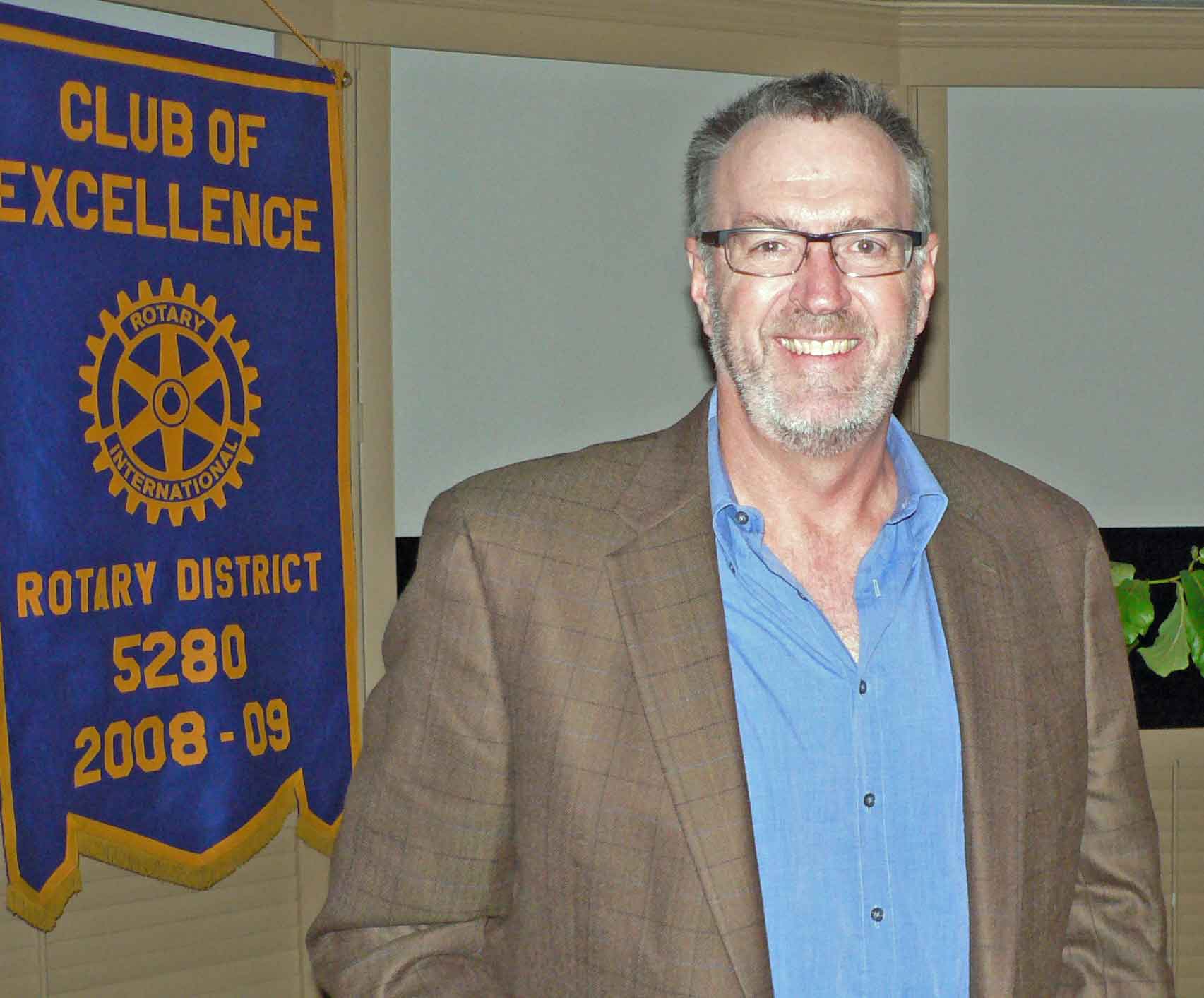
Larry was elected to the School Board in 2007 and is currently serving a second term as Board President. (He says he is not running for reelection next year.) The Palos Verdes Peninsula Unified School District has 1500 employees, and the Board members determine allocation of resources and hiring of the Superintendent & staff. During his first five years on the School Board (during the Recession), there was no extra money and they had to cut back employees and furlough people. In spite of that, the community has continued to support the local schools to help maintain their high quality. Our two High Schools are among the top in the US, and most of the others are private schools with more resources. Fewer students are enrolling at our elementary levels, due to increasing housing costs for most families with young children, so the High School enrollment is also gradually decreasing, which decreases the amount of state financial support provided.
|
History of Spies, by Joe Mardesich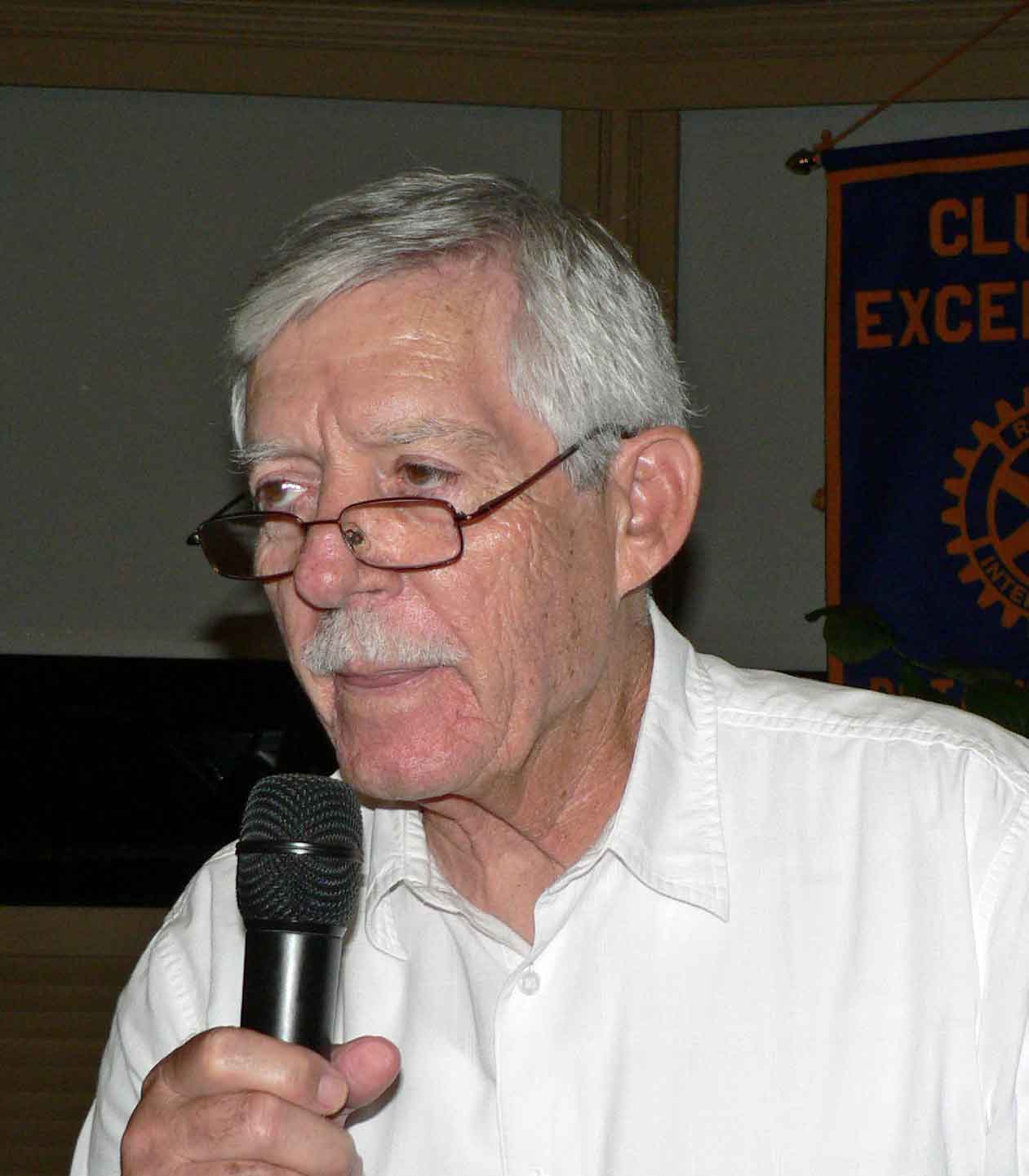
Joe Mardesich was the first college graduate in his family. At Dana Junior High School, he developed a love of teaching as a career. He attended Pepperdine and then CSU Long Beach, majoring in history and obtaining a Secondary-School Teaching Credential. He taught US and world history, government, economics, ESL and English, in Torrance, Los Angeles, Dana Junior High, and San Pedro High. He retired in 1994 but returned the next year as a substitute teacher for a teacher on maternity leave. Over the next 12 years, he filled in for 6 teachers who delivered 8 babies, becoming known as the “grandfather” of San Pedro High. He retired again in 2008. He has been giving presentations at the San Pedro Rotary Club and the Palos Verdes Speakers Forum on historical subjects.
|
Program: Norris Theatre, Jason Sluyter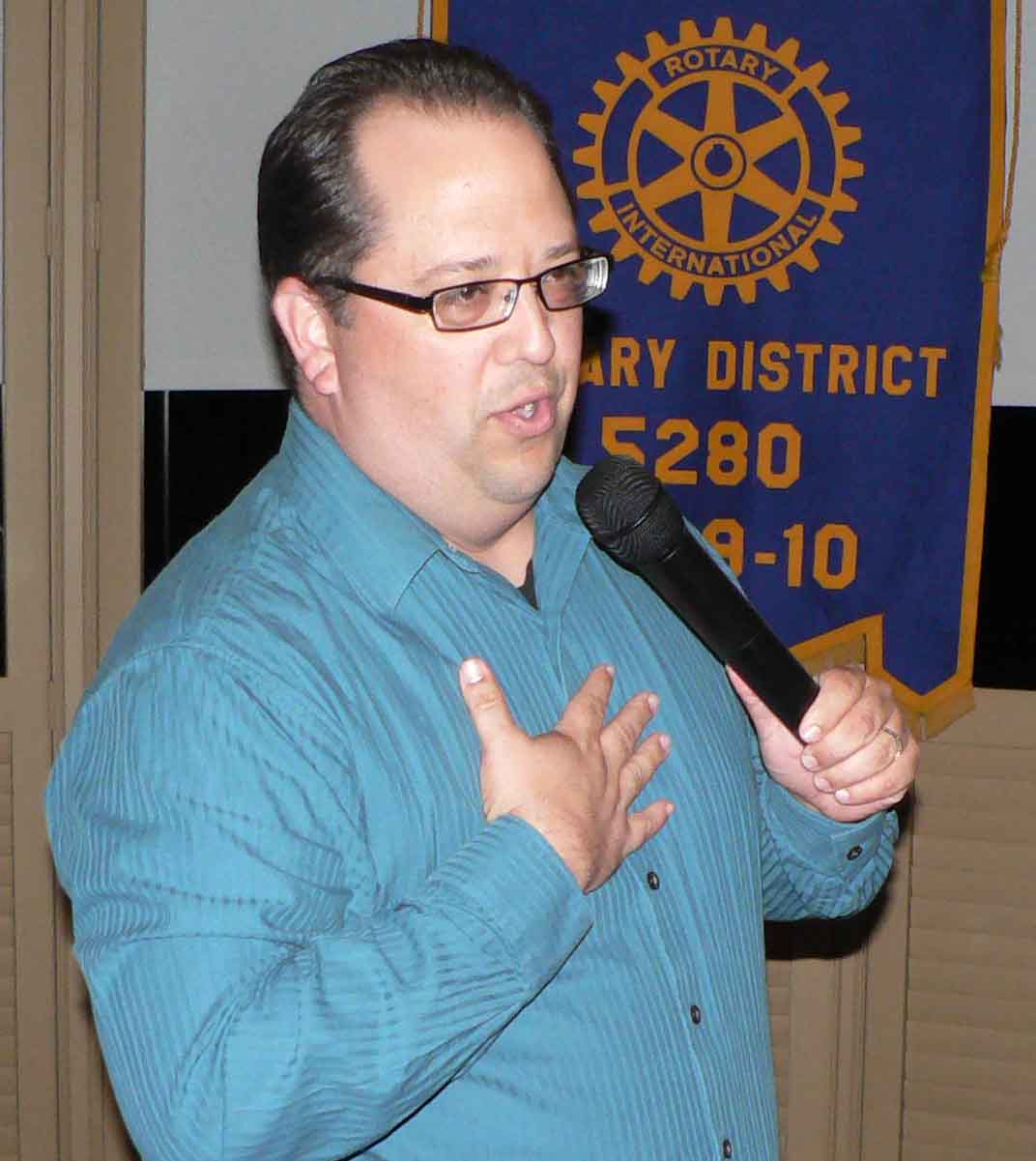
Jason Sluyter is the Box Office & Theatre Rentals Manager at the Norris Center for the Performing Arts in Rolling Hills Estates. He graduated from Grand Canyon University, a private Christian University in Phoenix, Arizona, in 1999. He began as a premed major, but switched to Theater midway through his time on campus, inspired by his participation in theater productions on campus as a performer and in other production roles. He is married and has two children. He
 began at the Norris 6 years ago, starting in the box office, and then became box office manager with involvement in marketing and producing. began at the Norris 6 years ago, starting in the box office, and then became box office manager with involvement in marketing and producing. |
Rancho Palos Verdes City Manager, Doug Willmore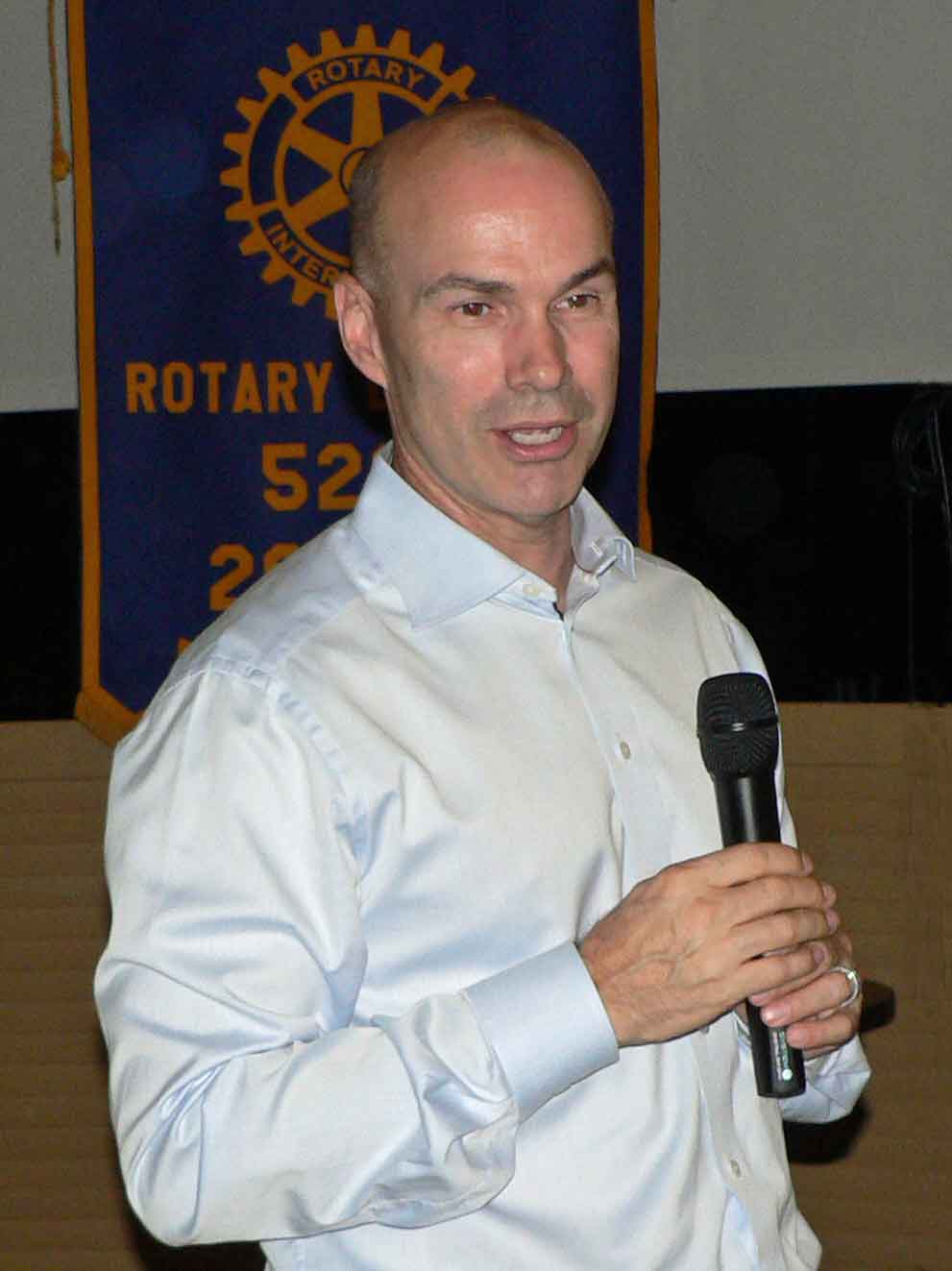
Doug Willmore became City Manager of Rancho Palos Verdes in June 2015. Previously he was chosen in June 2012 to be City Manager leading the turnaround of Bell, California, after their devastating scandal. Before that he was City Manager of El Segundo and Chief Administrative Officer of Salt Lake County, Utah. He graduated from George Mason University and has a Master’s in Public Administration from the University of Utah.
|
Michael Peters, Craft Talk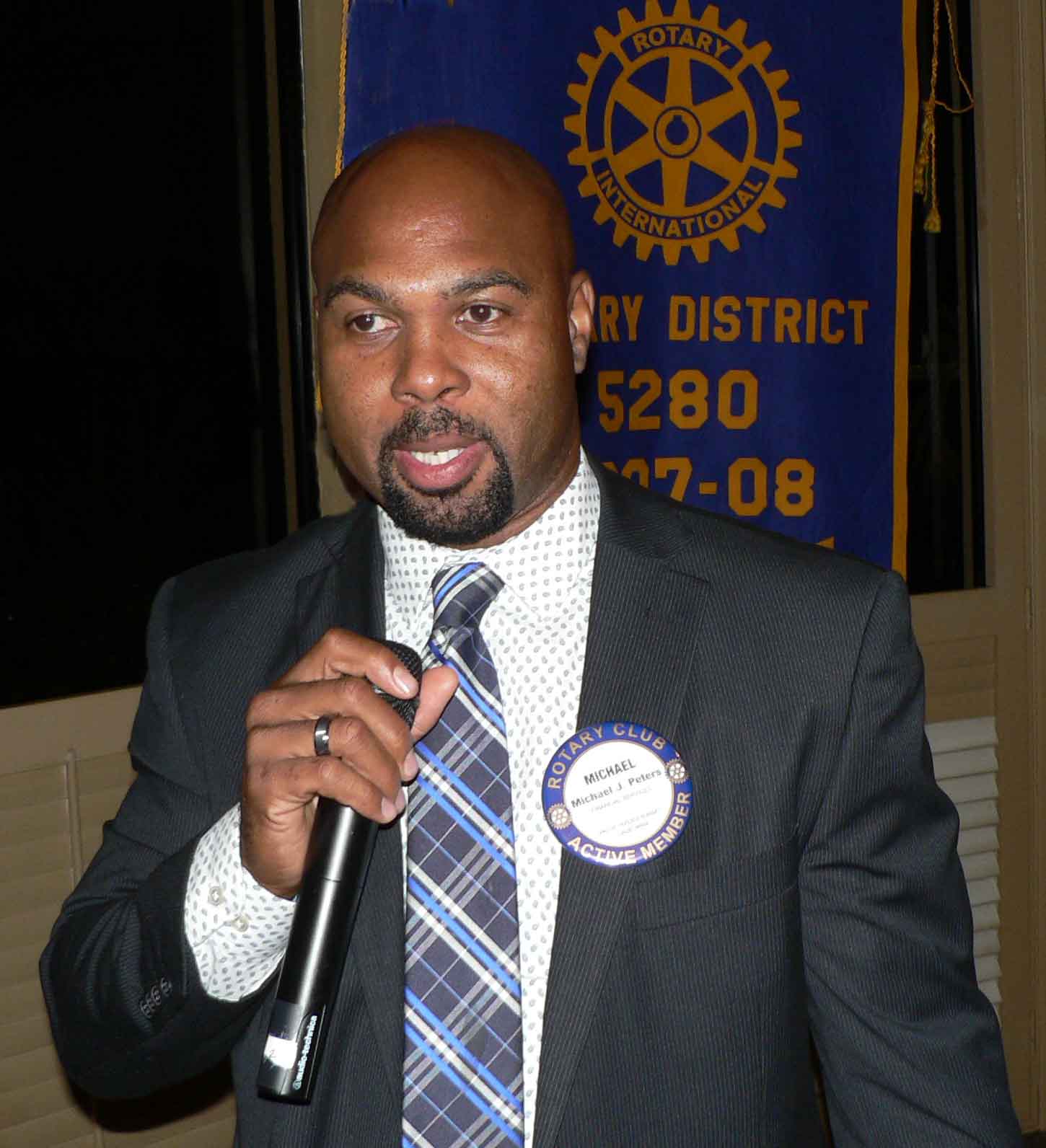
 Mike Peters, our Club’s newest member, was born in Alabama where his mother was an Army Reserve Captain and his father worked for the railroad. He grew up in Lakewood, California, and attended Artesia High School. He started playing football at age 11 and hoped to become a professional football player. After college interviews at the University of Illinois and at Ole Miss, he chose the Ole Miss Rebels to avoid cold weather. (However, one of his favorite places is Alaska, where he loves to go for fishing trips, in summertime, of course.) Mike Peters, our Club’s newest member, was born in Alabama where his mother was an Army Reserve Captain and his father worked for the railroad. He grew up in Lakewood, California, and attended Artesia High School. He started playing football at age 11 and hoped to become a professional football player. After college interviews at the University of Illinois and at Ole Miss, he chose the Ole Miss Rebels to avoid cold weather. (However, one of his favorite places is Alaska, where he loves to go for fishing trips, in summertime, of course.) |
Assemblyman David Hadley, 66th Dist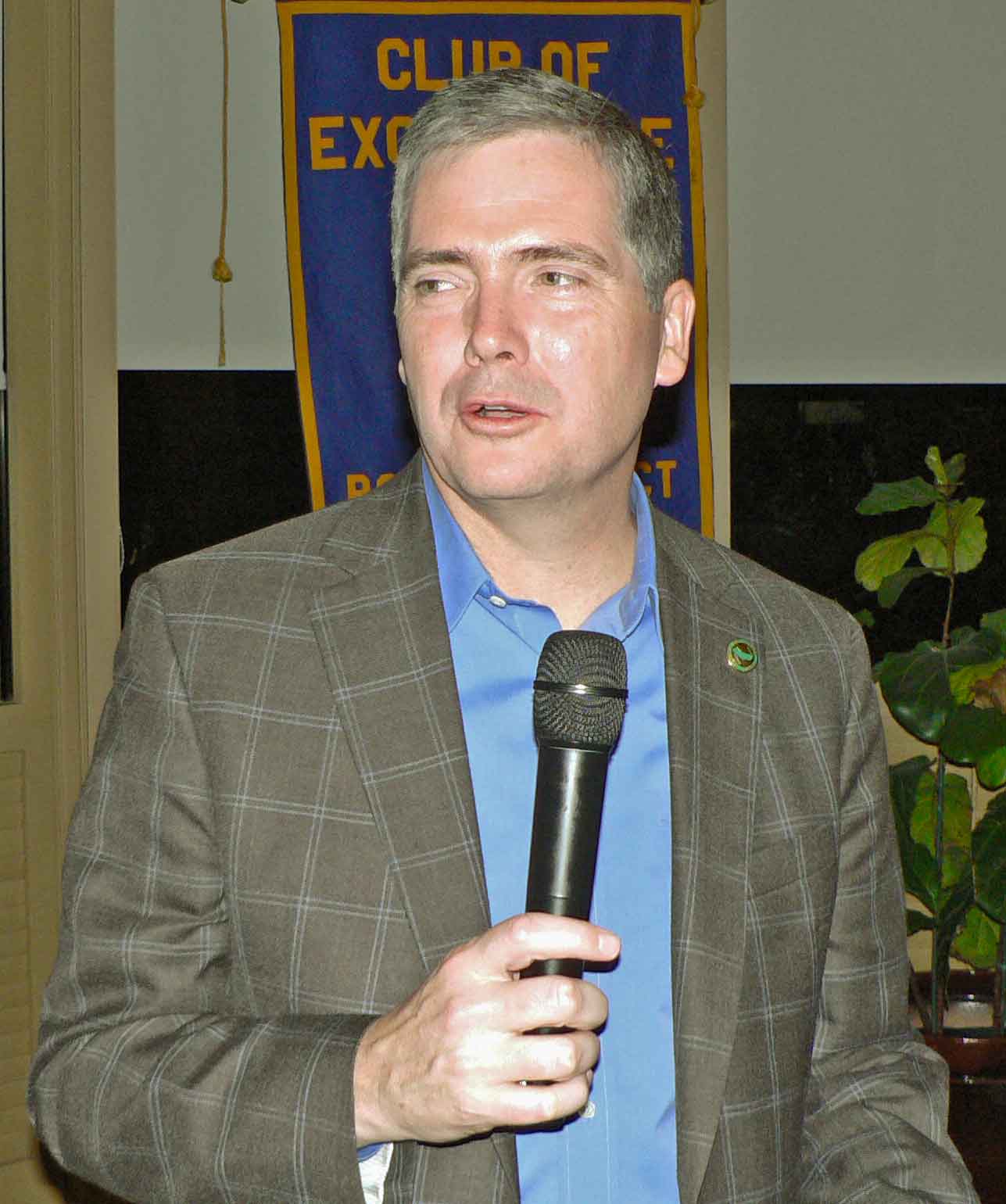
 In 1999, David founded Hadley Partners, Inc, an investment banking firm for helping business owners to finance or sell their companies, and has assisted over 100 entrepreneurial companies. Previously, he was a managing director at investment-banking firm BT Alex Brown for mergers, acquisitions and financing. He was elected to the California Assembly in November 2014. In 1999, David founded Hadley Partners, Inc, an investment banking firm for helping business owners to finance or sell their companies, and has assisted over 100 entrepreneurial companies. Previously, he was a managing director at investment-banking firm BT Alex Brown for mergers, acquisitions and financing. He was elected to the California Assembly in November 2014. |
Early History of Catalina Island, Michael Sanborn.jpg)
Michael Sanborn was born and raised in the Los Angeles Harbor area. He graduated from Humboldt State University (American History) and obtained an MA degree in Historic Preservation/Public History at CSU Dominguez Hills. He became Curator for the Lummis Home in Los Angeles before becoming Director of the Banning Residence Museum (LA Department of Recreation and Parks) in Wilmington.
 The Banning Museum was organized in 1974 to preserve the house built by Gen Phineas Banning in 1864. General Banning was known as the Father of the Los Angeles Harbor, establishing the first communication and transportation network in Southern California. He promoted the Los Angeles Harbor as a potential deep water port (which he dredged and built dock facilities for) as an alternative for the proposed Santa Monica port (which was never built). He established the first mule freight wagons and passenger stagecoach service from the port to the village of Los Angeles. To improve Harbor business, he and his sons decided to develop Catalina Island. The Banning Museum was organized in 1974 to preserve the house built by Gen Phineas Banning in 1864. General Banning was known as the Father of the Los Angeles Harbor, establishing the first communication and transportation network in Southern California. He promoted the Los Angeles Harbor as a potential deep water port (which he dredged and built dock facilities for) as an alternative for the proposed Santa Monica port (which was never built). He established the first mule freight wagons and passenger stagecoach service from the port to the village of Los Angeles. To improve Harbor business, he and his sons decided to develop Catalina Island. |
African Safari Video, Mark Comon (Paul’s Photo)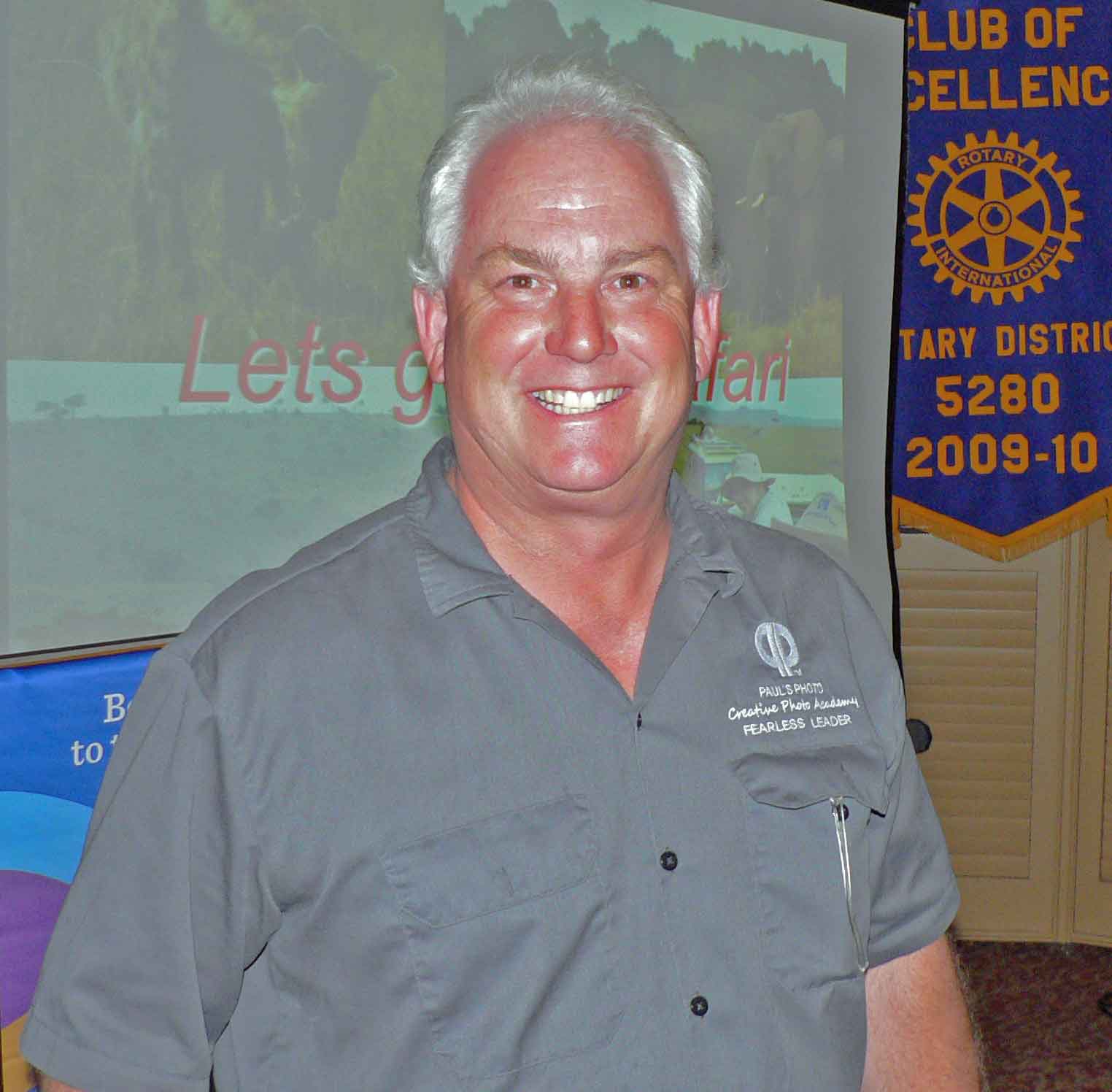
Jon Kaplan introduced our speaker, Mark Comon of Paul’s Photo in Torrance. Paul’s was established in 1961 by Mark's father. His mother and Mark and now the grandchildren have also worked there. It has cameras, binoculars, lenses, photo supplies, and also a variety of photography classes for different ages and skill levels.
|
Capt Blain Bolin, Lomita Sheriff’s Station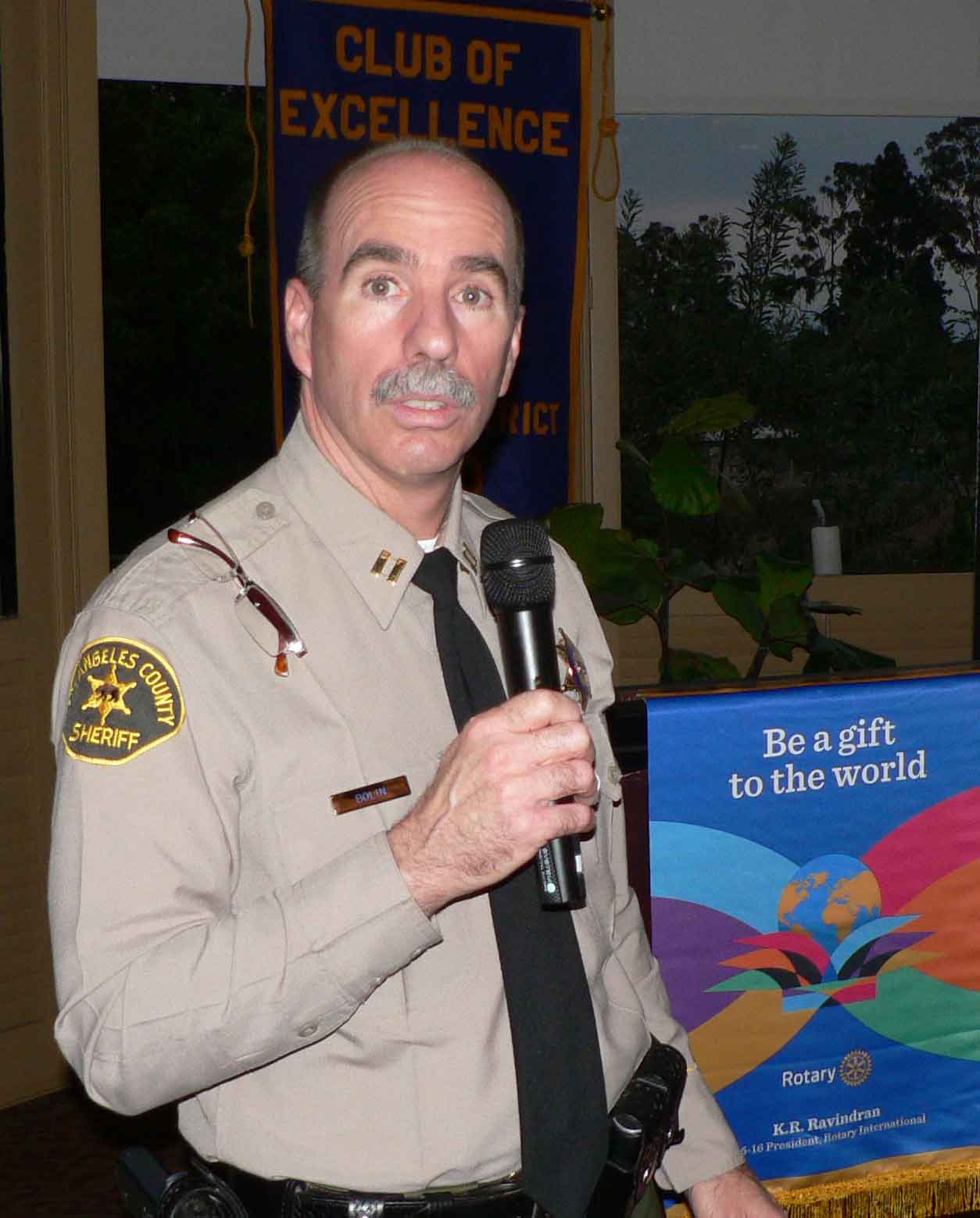
 Capt Bolin joined the Sheriff’s Department in 1985. He was promoted to Lieutenant in 2000 and Captain in 2012. He is now Commander of the Lomita Sheriff’s Station, which is contracted to provide law enforcement services to Lomita, Rancho Palos Verdes, Rolling Hills, and Rolling Hills Estates. (68% of its budget is for RPV.) The Lomita Sheriff’s Station opened in 1975. Capt Bolin joined the Sheriff’s Department in 1985. He was promoted to Lieutenant in 2000 and Captain in 2012. He is now Commander of the Lomita Sheriff’s Station, which is contracted to provide law enforcement services to Lomita, Rancho Palos Verdes, Rolling Hills, and Rolling Hills Estates. (68% of its budget is for RPV.) The Lomita Sheriff’s Station opened in 1975.The Station’s personnel includes administrative staff and volunteers as well as sworn law enforcement officers. Among the specialized units are the Surveillance and Apprehension Team, which can be called out at any time to gather information on suspects and blend into the community with unmarked cars. He reviewed a dramatic case where a dangerous suspect was surreptitiously followed out of a crowded commercial area to a safer area without alarming him, and then was apprehended before he could escape onto the freeway.
|
Dr Don Austin, Superintendent of PVUSD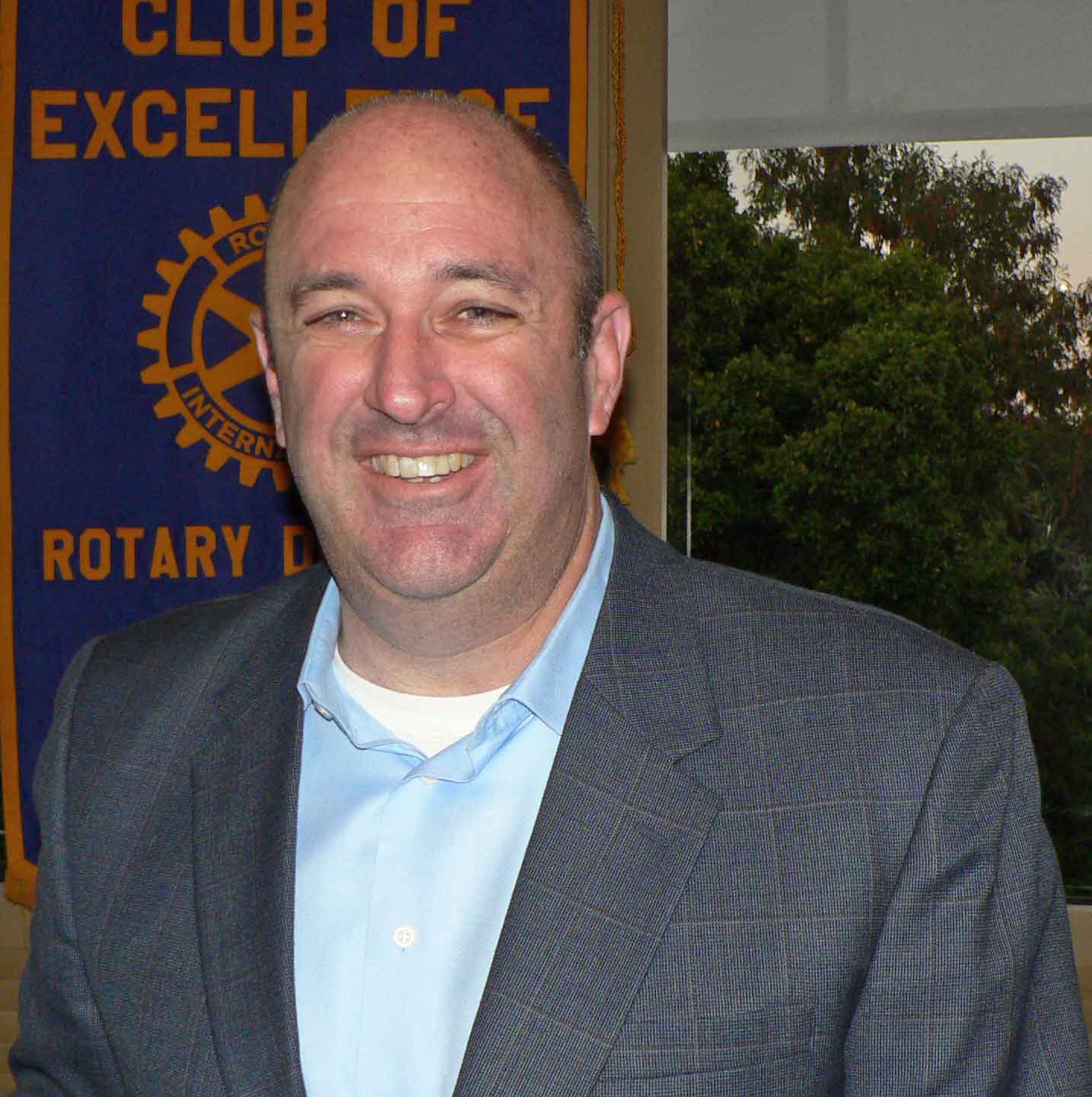
Dr Donald Austin became Superintendent of Schools of the PVPUSD in 2014. He graduated from Baker University in Kansas and has Masters and Doctors degrees in Education from Azusa Pacific University. He taught in Hemet and Moreno Valley before becoming Principal of La Sierra
 High School and then Laguna Beach High School. He became Assistant Superintendent in Huntington Beach in 1911 before his appointment as Superintendent in Palos Verdes. High School and then Laguna Beach High School. He became Assistant Superintendent in Huntington Beach in 1911 before his appointment as Superintendent in Palos Verdes.Dr. Austin’s philosophy is to put people first and make their jobs fun, but don’t celebrate mediocrity. Being happy is more productive.
Our Palos Verdes School District is relatively isolated geographically, because it is not easy to come to (no nearby freeways) and is an increasingly expensive place to live. This has advantages and disadvantages. We have high-quality schools, but the quality should not depend on which side of the Hill people live on. World-class has no finish line; we should always ask what we can do better.
|
Remembering Angi Ma Wong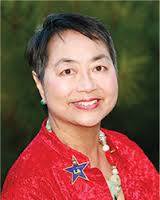
Longtime PV Sunset Rotarian Angi Ma Wong will be remembered at a Memorial Service on Saturday, July 25, 3:30 PM, at All Saints Episcopal Church, 132 N Euclid Ave in Pasadena, with a reception to follow. Please sign up for attendance estimate (a big crowd is expected), or contact Norman Wong at 310-614-7606 or n.wong99@cox.net.
 Charitable donations are invited to The Rotary Foundation (c/o Lew Bertrand), The Chinese Historical Society of Southern California, Sisters of Charity of Rolling Hills, or Friends of Banning Museum. Charitable donations are invited to The Rotary Foundation (c/o Lew Bertrand), The Chinese Historical Society of Southern California, Sisters of Charity of Rolling Hills, or Friends of Banning Museum.Angi will be fondly remembered and greatly missed for her legacy of generous humanitarian service to Palos Verdes Sunset Rotary Club, District 5280 and Service above Self. She was inducted into the Rotary District 5280 Hall of Fame at the District Conference this year.
|
Club Planning for 2015-16 Rotary Year, Pres Lew Bertrand.jpg)
Pres Lew reintroduced his Bertrand Bucks (which he had used to reward members’ services during his first term as Pres). We will bring them to the Demotion Party next year for prizes.
He encouraged us to share our Club with our business customers and friends, and to bring them to one of our projects and to a meeting, to share what we have in Rotary.
|
Demotion of Pres Roger Schamp: "You Stand Relieved!" 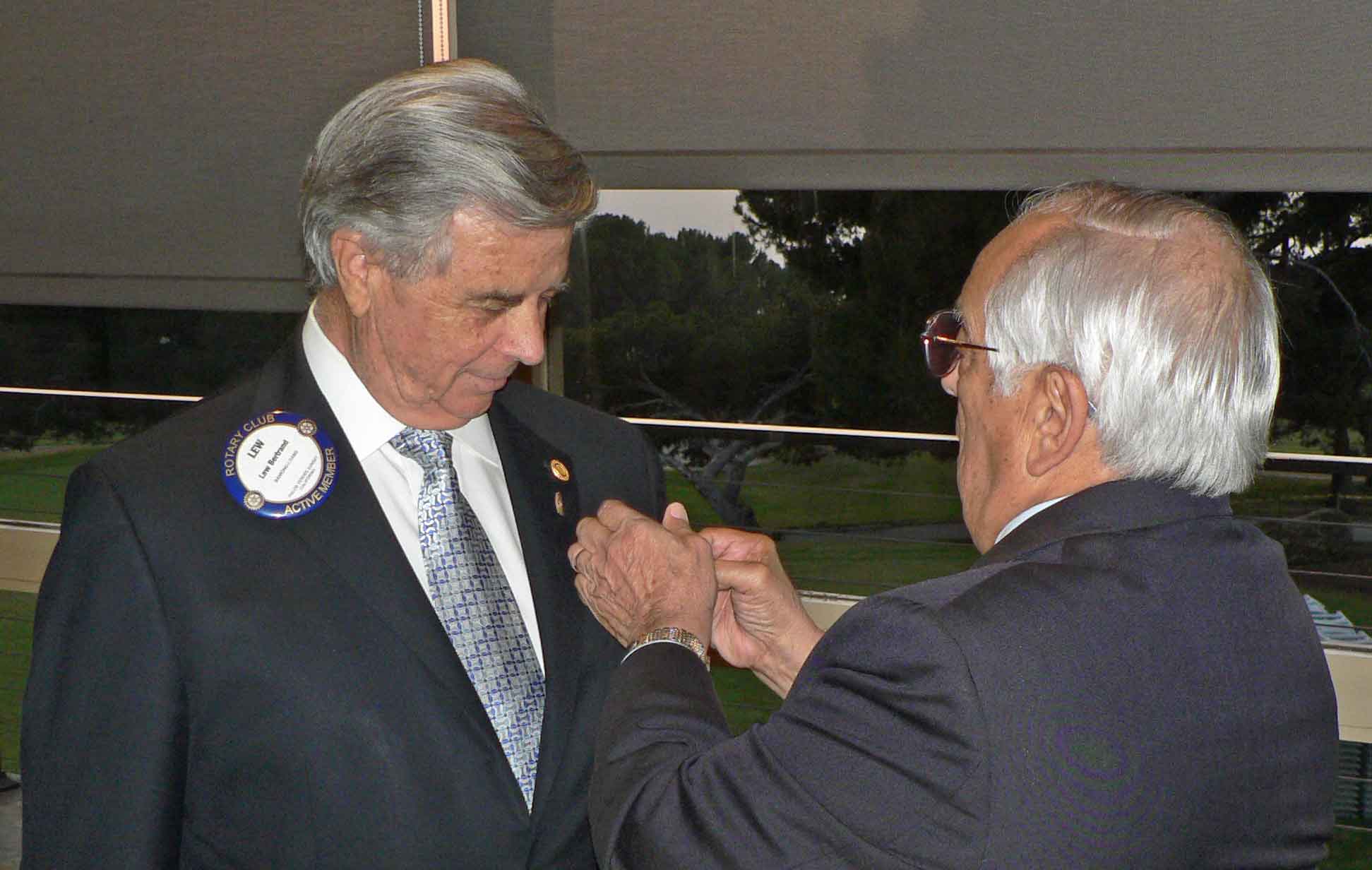
Outgoing Pres Roger Schamp thanked the outgoing club officers and board members for their support during the year, including the difficult planning for our Club’s change of meeting venue. He reviewed our District’s February Humanitarian Trip to Guatemala, and our Club’s Project EGO, as outstanding examples of Rotary service. He thanked Audrey Dahlgren for her exemplary service in recruiting First-Place District Winners in the District’s Student Mu-sic, Dance and Speech Contests. He extended warm appreciation to Angi Ma Wong for her many years of outstanding Rotary service to our Club and District. Roger thanked PDG Lew Bertrand for accepting the duties of Incoming President, and presented outgoing Club Treasurer Chris Kilgore with a plaque for his years of outstanding service.
Dave Moyers reviewed some interesting quotes in Roger Schamp’s Butte, Montana, High School Yearbook. Then Roger’s history was reviewed, going to UC Berkeley where he met his wife, Carol. From there, Roger entered the US Navy where he rose to the rank of Lieutenant Commander.
PDG Rick Mendoza and PDG/Incoming Pres Lew Bertrand presented Roger with the Past President’s Pin. Rick Mendoza expressed appreciation for our Club and Roger Schamp’s service, and declared him Honorably Discharged!
He also noted Lew Bertrand’s District leadership during the year of the merger of the two Districts. PDG Rick Mendoza conducted the installation of Incoming Pres Lew Bertrand and his 2015-16 Board, and Lew made his closing remarks. The party went on while the sun set over the hillside to the west.
|
Membership, by DGN Greg O’Brien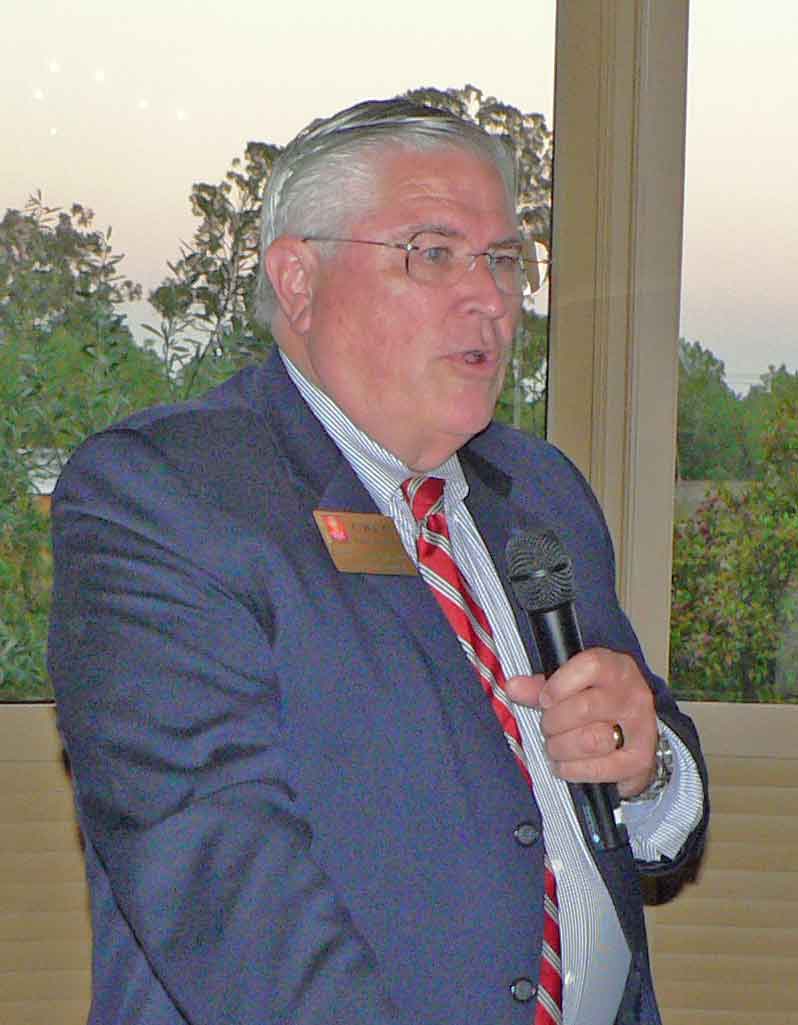  DGN Greg O’Brien, who will be District Governor in 2016-17, was introduced by PDG Lew Bertrand, our incoming Pres. Lew remembers when he was District Governor and speaking to the Palos Verdes Peninsula Rotary Club while Greg O’Brien was its President, when suddenly the entire audience ran over to the window to look out. Lew went over to see what the commotion was, in time to see the Space Shuttle flying over Torrance on its way to its final landing at LAX. This interruption was considered a great salute to the meeting! DGN Greg O’Brien, who will be District Governor in 2016-17, was introduced by PDG Lew Bertrand, our incoming Pres. Lew remembers when he was District Governor and speaking to the Palos Verdes Peninsula Rotary Club while Greg O’Brien was its President, when suddenly the entire audience ran over to the window to look out. Lew went over to see what the commotion was, in time to see the Space Shuttle flying over Torrance on its way to its final landing at LAX. This interruption was considered a great salute to the meeting!
|
Page Jones: His Recovery from Accident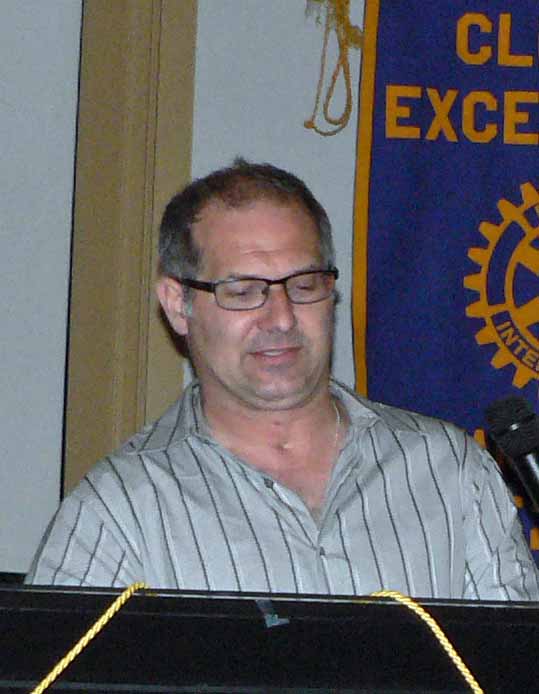 PDG Lew Bertrand introduced Page Jones, whom he has known from many years ago. Page, influenced by his father par Nelly, love to ride motorcycles. In 1994, he was riding in Malibu when a car back into the road in front of him. He awoke in a hospital bed, with a roommate, Bill Richard of the Malibu Rotary Club, also recovering from injury in the next bed. PDG Lew Bertrand introduced Page Jones, whom he has known from many years ago. Page, influenced by his father par Nelly, love to ride motorcycles. In 1994, he was riding in Malibu when a car back into the road in front of him. He awoke in a hospital bed, with a roommate, Bill Richard of the Malibu Rotary Club, also recovering from injury in the next bed. |
Honoring Angi Ma Wong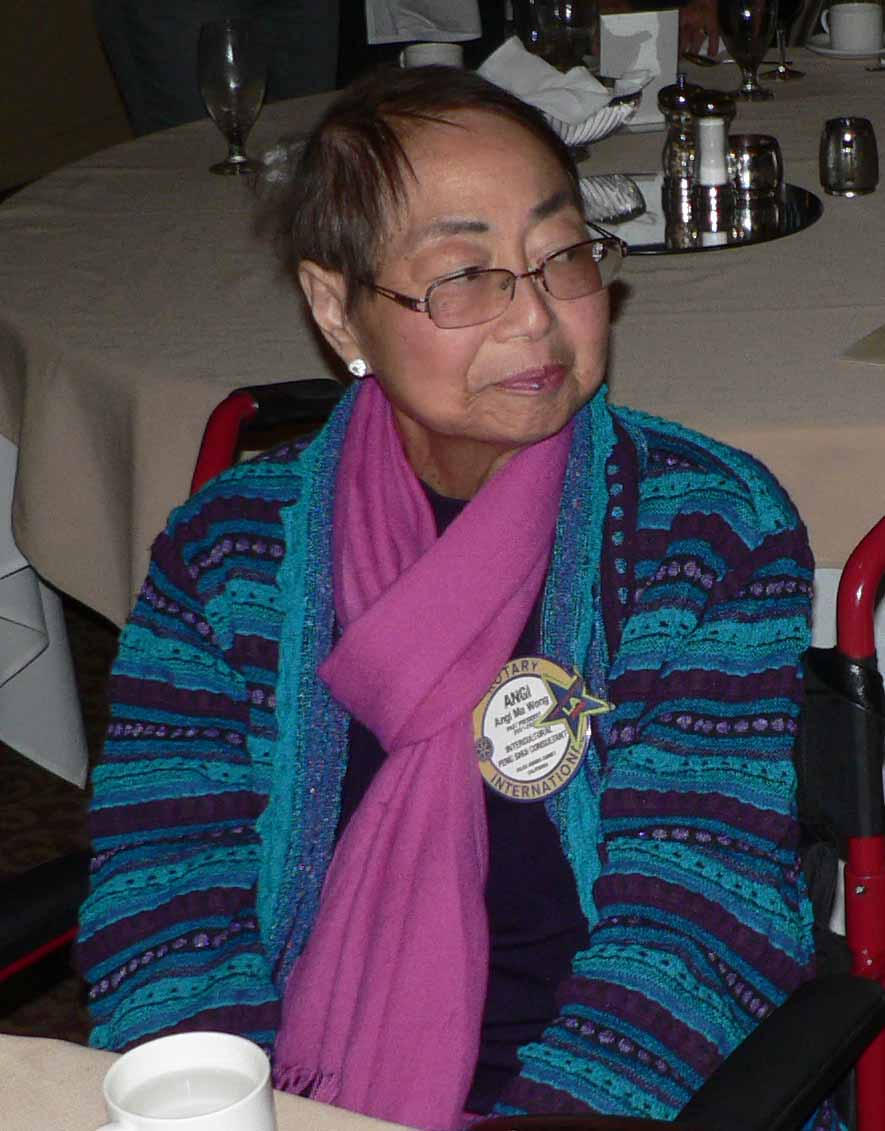
|
The New Torrance Memorial Hospital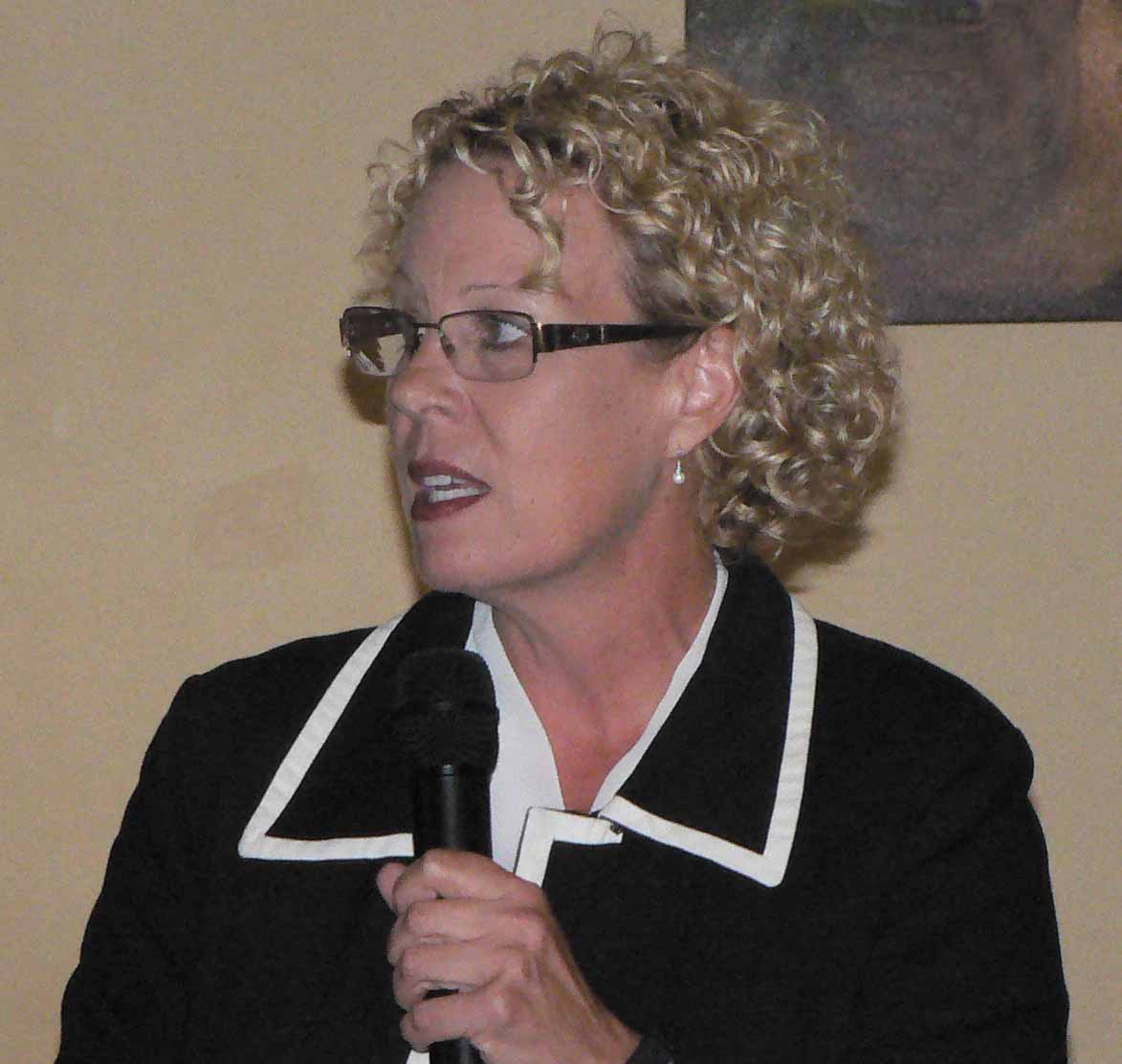  Connie Senner, the Director of Construction at Torrance Memorial Hospital, began in 1991 as Director of Operations for their physician office practice management program. She has managed the 8-year project for the Hospital’s new Lundquist Tower, which opened in Nov 2014. The campus Master Plan has projects outlined through 2018. Connie Senner, the Director of Construction at Torrance Memorial Hospital, began in 1991 as Director of Operations for their physician office practice management program. She has managed the 8-year project for the Hospital’s new Lundquist Tower, which opened in Nov 2014. The campus Master Plan has projects outlined through 2018.
The Lundquist Tower has 390,000 square feet in 7 floors and basement, designed to high seismic standards. There are 256 private patient rooms, 12 Operating Rooms, 4 Catheterization Labs, 12 elevators (4 public), and supportive units. 112 rooms have dialysis facilities. There are Pharmacy services, Imaging Department, a Healing Garden, Chapel, Gift Shop and cafe. Corridors on the 1st and 2nd floors connect to the older hospital, whose space will be modified for other uses.
 Torrance Memorial Hospital is 90 years old, non-profit, and self-supporting with the help of community donors. Its website is www.torrancememorial.org. Torrance Memorial Hospital is 90 years old, non-profit, and self-supporting with the help of community donors. Its website is www.torrancememorial.org.Sally Eberhard is the Hospital’s Sr VP for Planning and Development. She has a Master’s Degree in Health Service and Hospital Administration and a Doctorate in Public Health. She has oversight of the Hospital’s Strategic Planning Activities and various Hospital Departments.
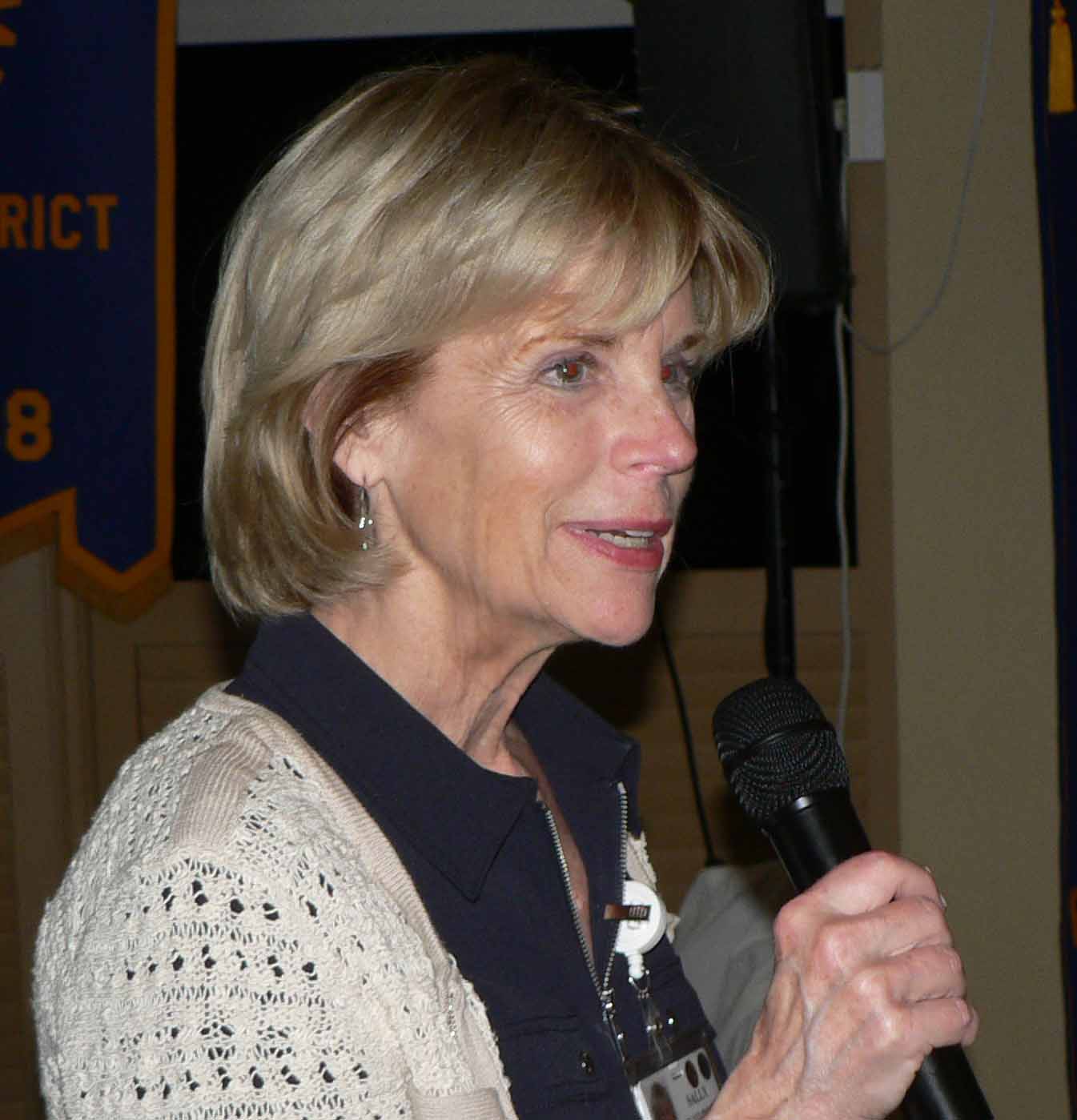 |
Project EGO Banquet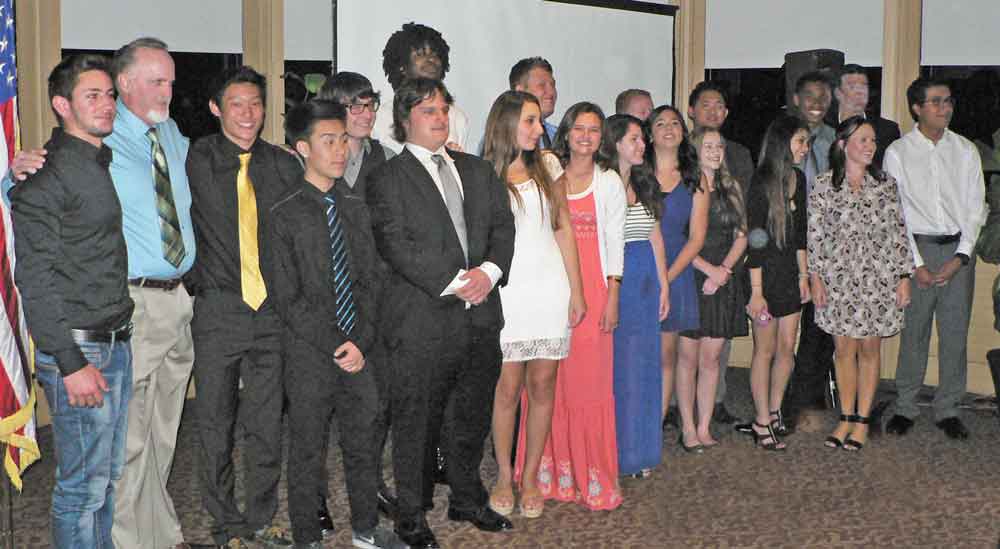
The Project EGO (“Exploring Growth Opportunities”) program is designed to help high school students in danger of not graduating, to succeed in their educational and life goals. Some have financial, emotional, and/or family problems distracting them from achievement. They are recommended by their high school counselors and must attend regular meetings with good attendance and fulfillment of tasks including obtaining recommendations, completing a resume, and demonstrating job-interview skills and ability to speak before a group. They have career counseling and are able to focus on long-term planning and develop their self-confidence. The program is supported by the Norris Foundation and Rowena Schaben and other donors.
 A slideshow was presented of their physical activities on the UC Irvine campus, designed to develop teamwork and self-confidence. They were shown climbing the tower and being suspended by cables, where they overcame their fears and learned to depend on each other for support. One of the students, Joseph Lin, accompanied the presentation with a solo violin performance for us. A slideshow was presented of their physical activities on the UC Irvine campus, designed to develop teamwork and self-confidence. They were shown climbing the tower and being suspended by cables, where they overcame their fears and learned to depend on each other for support. One of the students, Joseph Lin, accompanied the presentation with a solo violin performance for us. |
Special Olympics, by Brian Erickson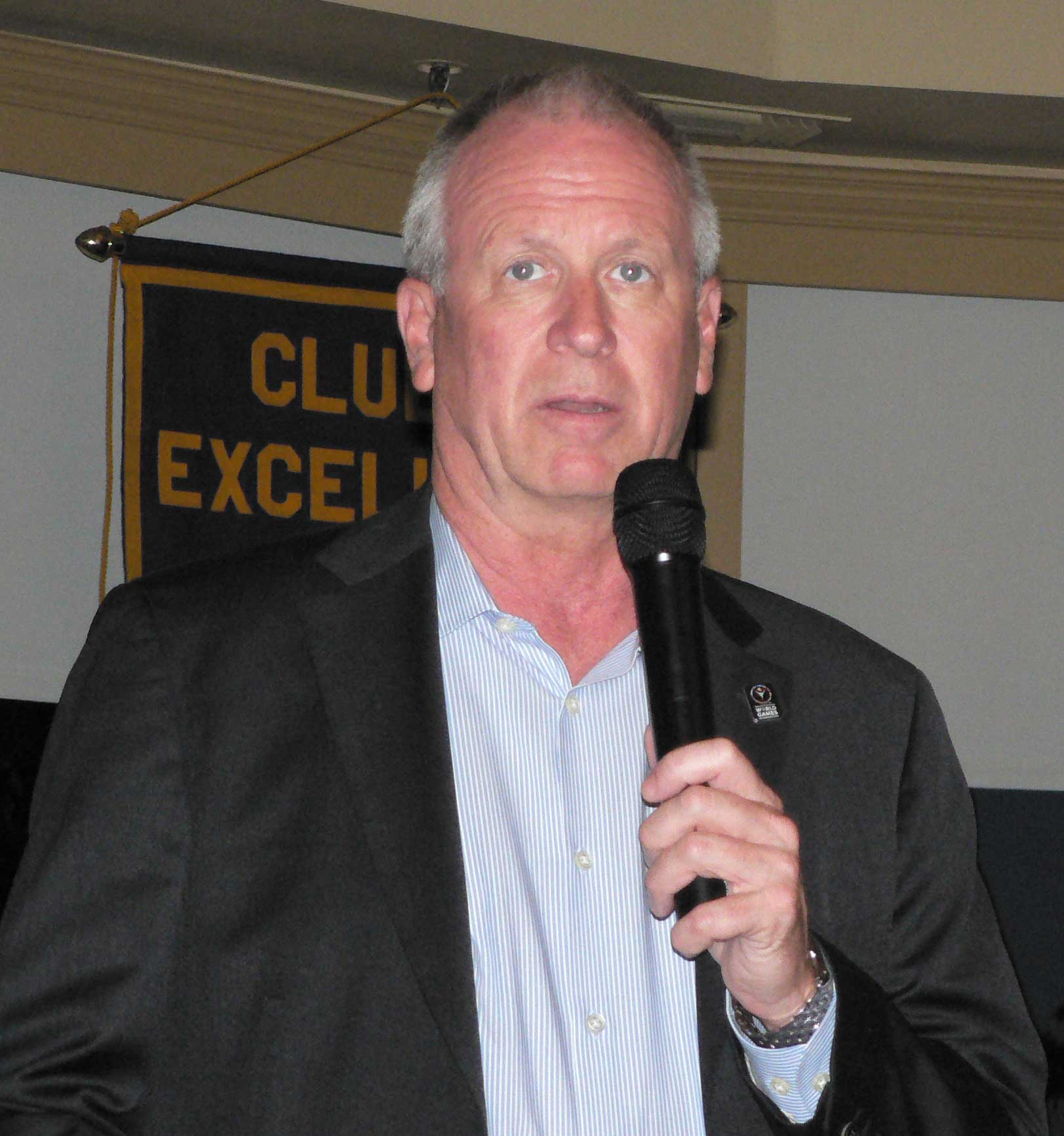
Lew Bertrand introduced his friend Brian Erickson, Senior Vice President for Corporate Partnerships of the LA2015 Special Olympics World Games, to be held in Los Angeles this year. He is on loan from Mattel, where he is VP of Sales. The Games Organizing Committee, Inc. (GOC) is a non-profit 501(c)(3) organization. Brian showed a short video of past Special Olympics events in other countries.
The Special Olympics movement was founded in 1968 by Eunice Kennedy Shriver to promote dignified participation by handicapped participants. It has grown to 4.4 million athletes in 177 countries. With the support of 1.3 million coaches and volunteers, it sponsors 32 Olympic-type sports and more than 81,000 games and competitions worldwide throughout the year.
|
LAX Chief of Police Pat Gannon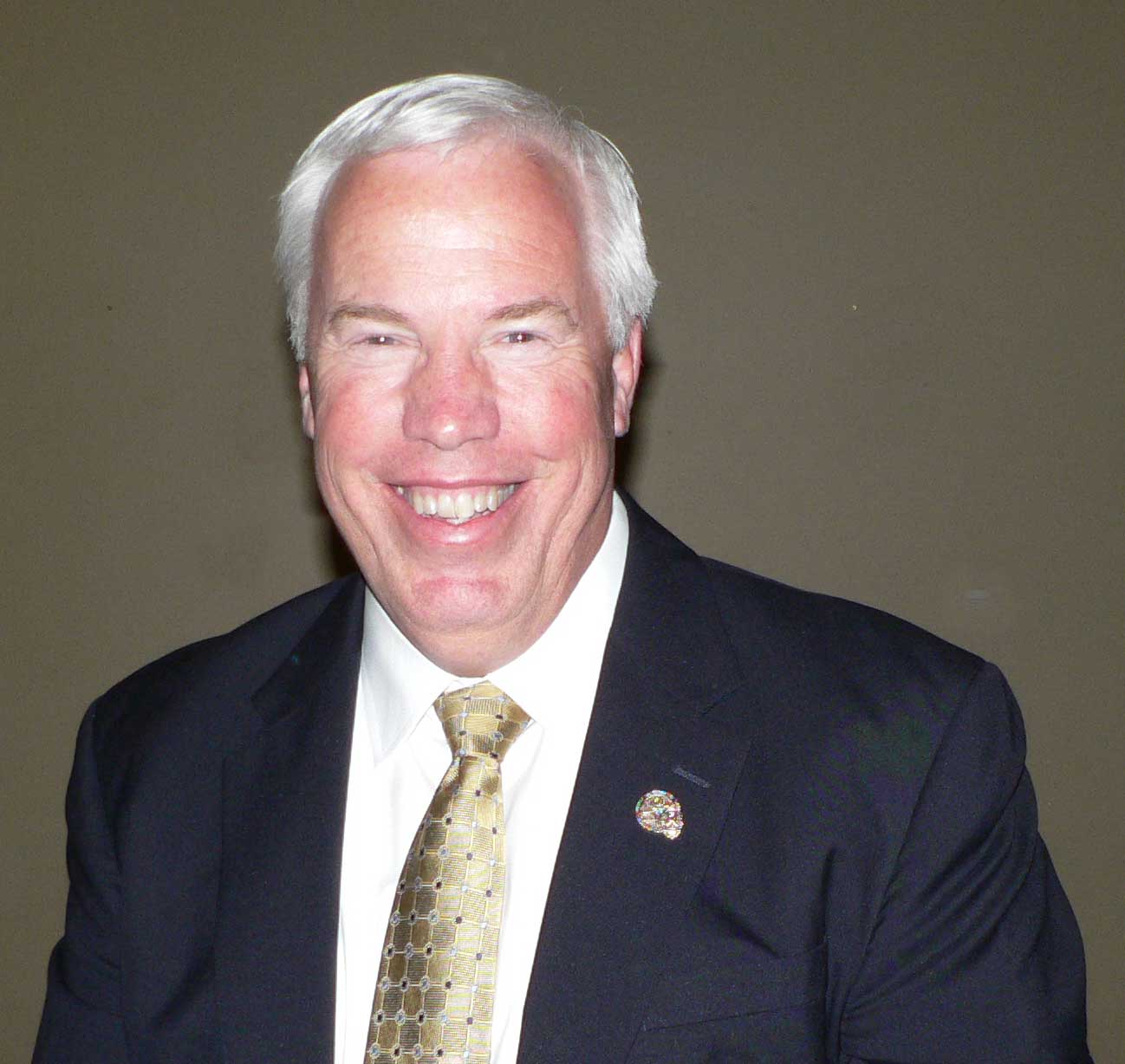
Lew Bertrand introduced his long-time friend, LAX Chief of Police Pat Gannon. LAX has had its own police department for 64 years. Chief Pat reviewed the early history of the Department (life seemed so simple and innocent back then). Now it has 1100 sworn & civilian personnel for LAX, ONT (Ontario) and VNY (Van Nuys). Officers train at the LAPD Academy. There are contingents of the LAPD, Homeland Security, FBI, and several other law-enforcement agencies.
|
Student of the YearRosemary Humphries of Rancho Del Mar described her school’s mission of helping students in danger of not graduating high school, by providing a self-paced program. Her school’s Student of the Year is Dominique Russo, who transferred from PVPHS and has got-ten all A’s and B’s. She is an early graduate with 230 credits. She was awarded a $1000 scholarship check for further education.
Sarah Botkin introduced the Angi Ma Wong Interactor of the Year, Dylan Martins, who has been an outstanding leader in academic and school activities. He was awarded a scholar-ship check for $1000.
Sarah Botkin introduced the Marymount California University Rotaractor of the Year, Melissa Gutierrez. Her Rotaract Club has won campus and district awards for outstanding service projects. She was awarded a scholarship check for $1000.
Mrs Pollock, counselor at PVPHS, introduced her school’s Student of the Year, Ian Sun. He was awarded a scholarship check for $1000.
Congratulations to all of these outstanding students. We wish them academic success in their future careers. We think the hard-working teachers and counselors and our Club members who organized this event.
|
Educating the Poor in Bangladesh, Gem Munro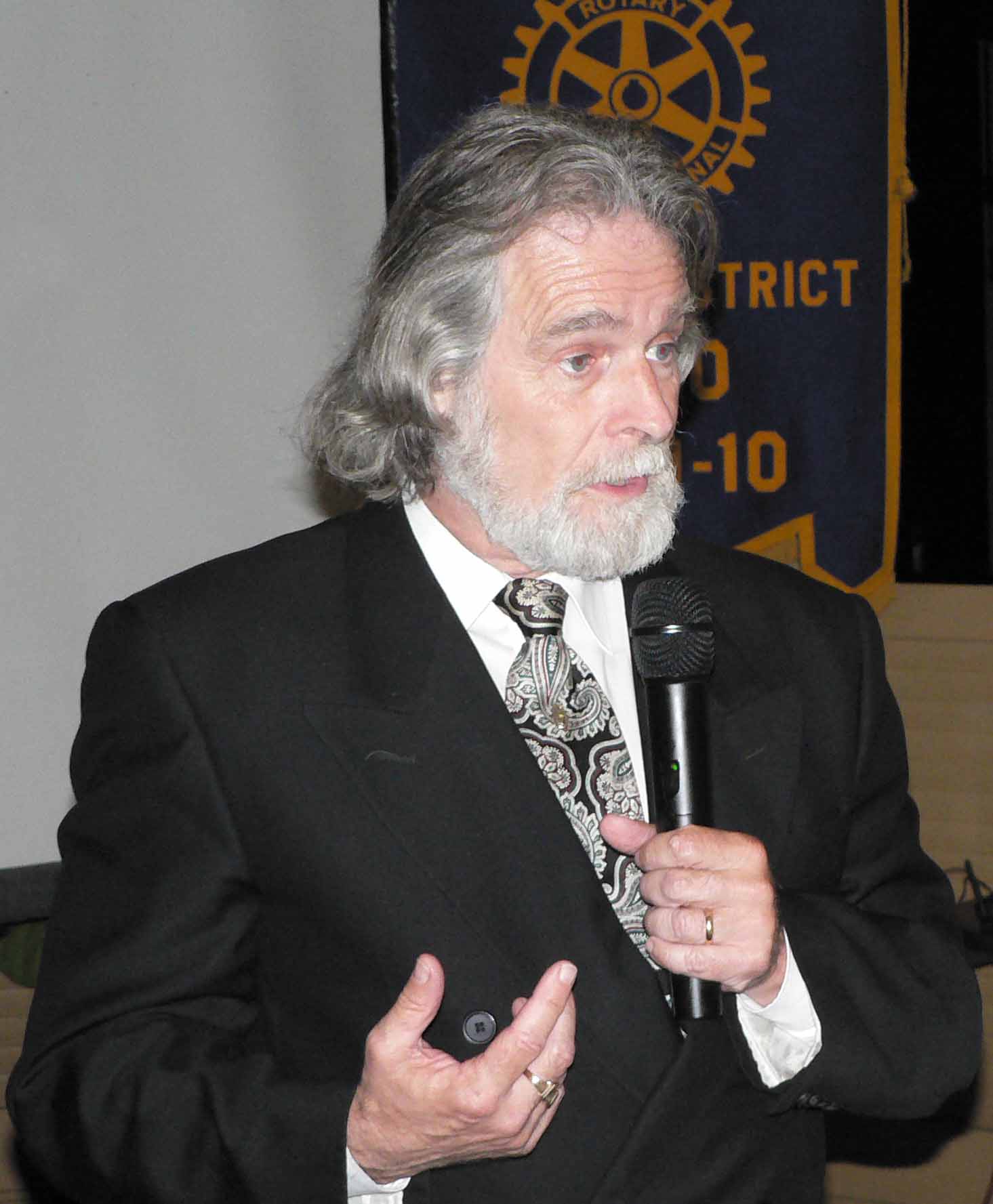 Gem Munro was introduced by Lew Bertrand. Gem, a Canadian, has devoted his life and career to improving educational opportunities for disadvantaged people in Canada and abroad. He is a Founder (with his wife and 4 children) and Director of Amarok Society, a Canadian charity providing educational programs to the very poor in Bangladesh. He has written a book with a collection of stories about some of the extraordinary people he has come to know in the slums of Bangladesh, South Asian Adventures with the Active Poor. (Proceeds from the sales help support the Amarok Society.) Gem and his wife Tanyss Munro have been awarded Queen Elizabeth II Diamond Jubilee Medals for their charitable work. Gem Munro was introduced by Lew Bertrand. Gem, a Canadian, has devoted his life and career to improving educational opportunities for disadvantaged people in Canada and abroad. He is a Founder (with his wife and 4 children) and Director of Amarok Society, a Canadian charity providing educational programs to the very poor in Bangladesh. He has written a book with a collection of stories about some of the extraordinary people he has come to know in the slums of Bangladesh, South Asian Adventures with the Active Poor. (Proceeds from the sales help support the Amarok Society.) Gem and his wife Tanyss Munro have been awarded Queen Elizabeth II Diamond Jubilee Medals for their charitable work.
|
Dave Moyers Presents Community Grants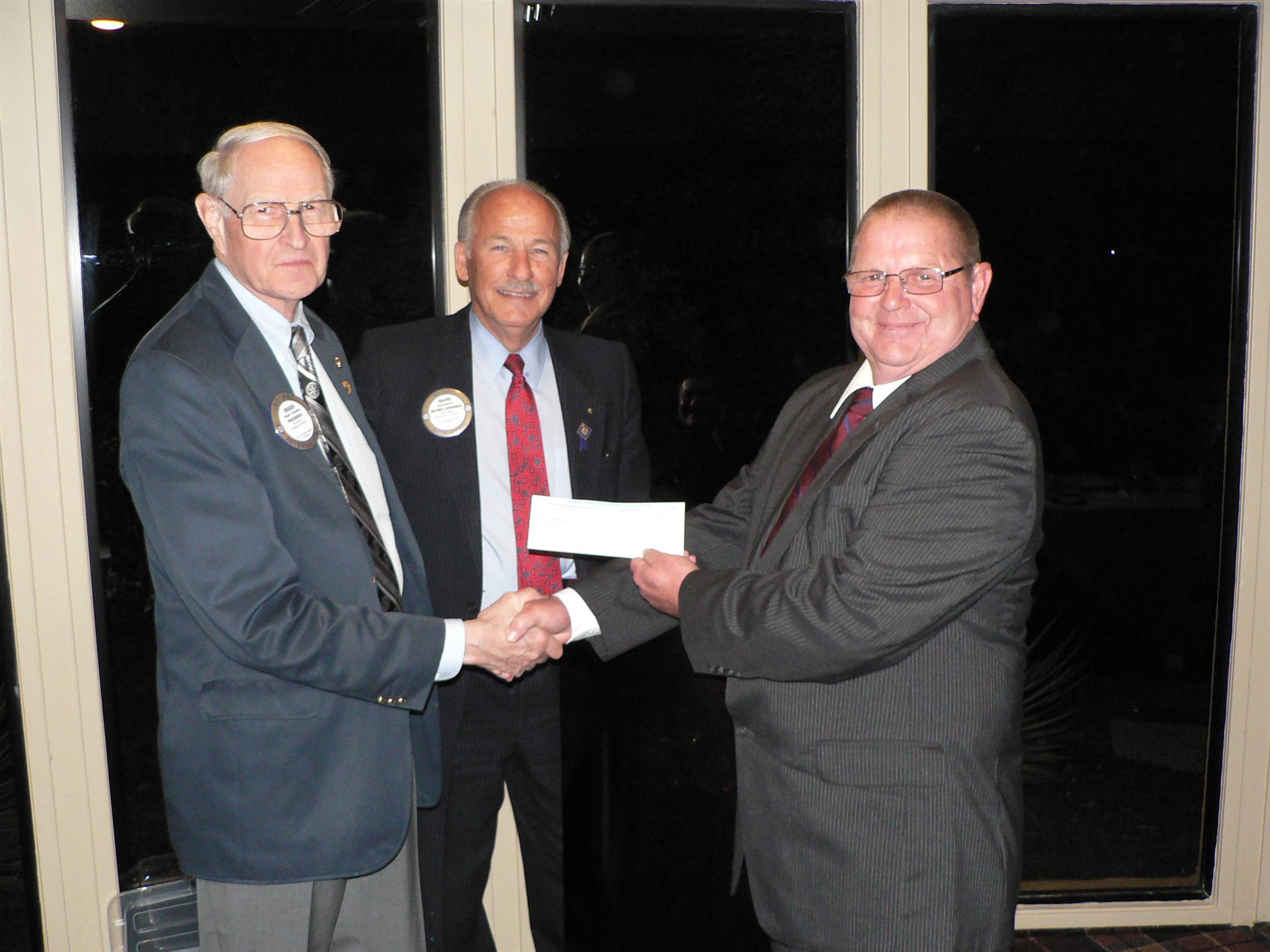
PDG Dave Moyers described the Rotary District Community Grants and the im-portance of giving to the Rotary Foundation. Our Club’s donations last year averaged $300 per member. Our District invested $105,000 in Community Grants this year, growing every year since initiating this program several years ago. (One of our previous grants was $2500 to the Helen Coffey Library at the Harbor Interfaith Center several years ago.)
Dave introduced Don Wrigley, Executive Assistant at the Beacon House in San Pedro. It was founded in 1970 and built on a burned out property on 10th and Beacon Street (originally the home of Los Angeles’ first mayor). It has 115 beds for drug addicted and alcoholic men, to re-acclimate them into the community and help them to go out and work again. It provides food, clothing and shelter, and arranges counseling and vocational training. Its pro-gram is based on the 12 Steps of Alcoholics Anonymous. Their website is http://www.thebeaconhouse.org/. Dave Moyers presented Don Wrigley with a check for $1000 to be used for providing blankets and pillows.
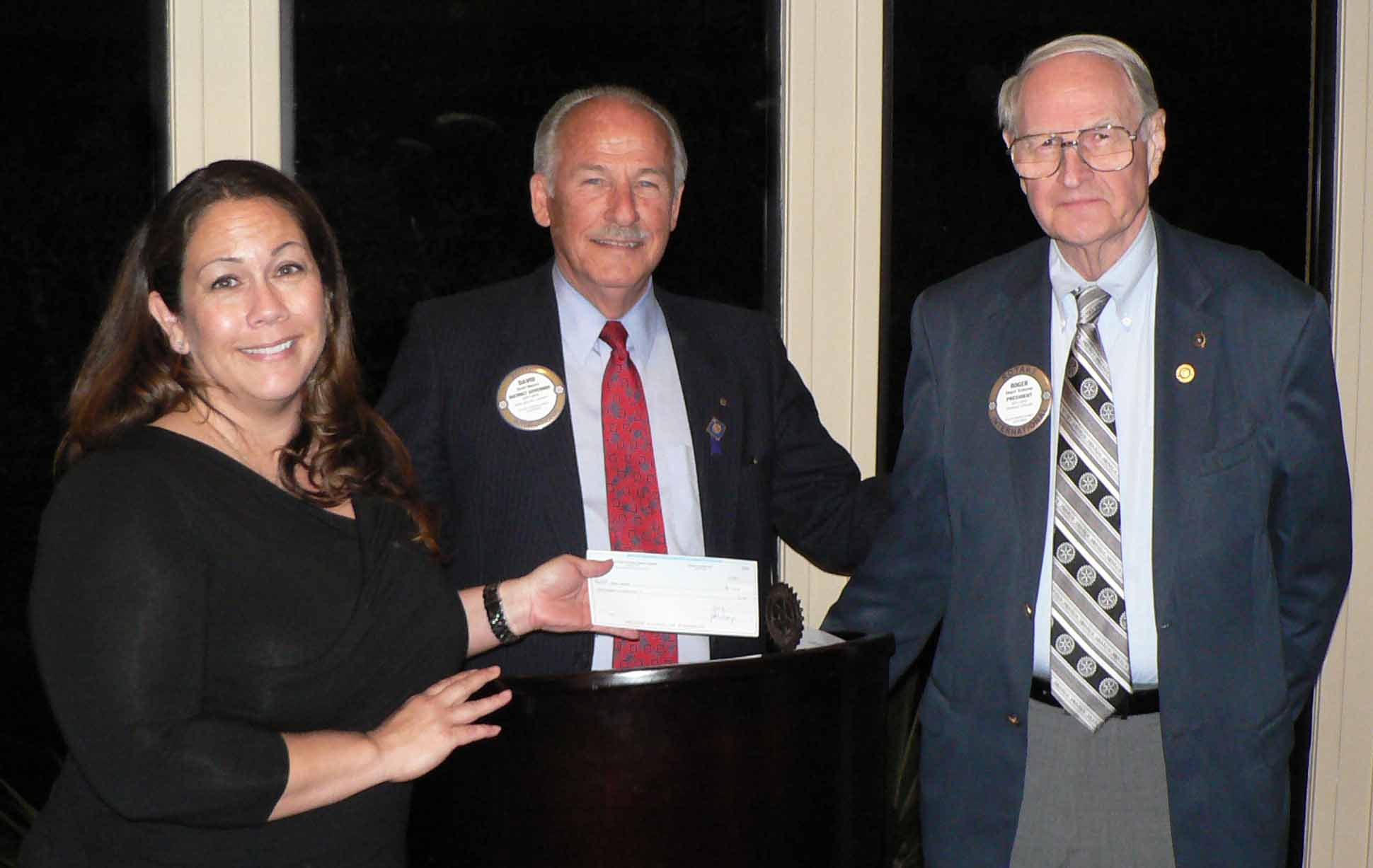 Dave introduced Julie Parrino, Director of Development for Harbor Interfaith Services in San Pedro. It is now 40 years old. It was founded by religious organizations and originally met in a church basement, but has grown and now has a new facility on 9th Street. It provides food and pantry services, emergency shelters, clothing, and educational and mental health services for homeless and working poor people. 31,000 people were served last year, increasing the proportion of children in day care, pre-kindergarten and afterschool programs, increasing income with work and benefits programs, helping student heads of household to reach their educational goals, and helping families to secure permanent housing. Harbor Interfaith helps to connect people to the services they need to become productive, self-sufficient and independent citizens. They welcome volunteers to become mentors, reading partners, sports supervising, tutoring, and providing many other skills. Their website is www.harborinterfaith.org. Dave Moyers presented Julie Parrino with a check for $1500, to be used for 3 new kitchen stoves.
|
Boys & Girls Club, by Mike Lansing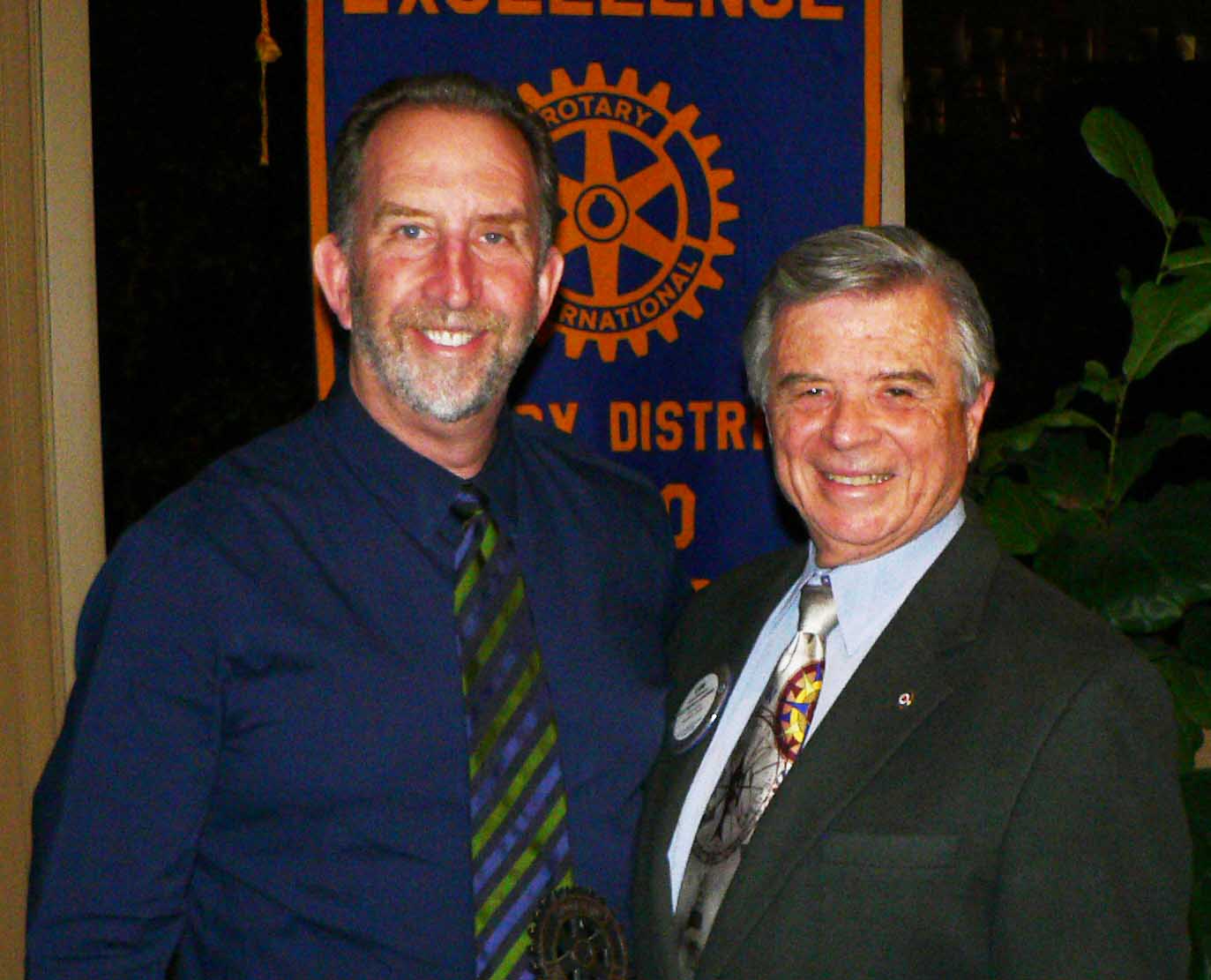
Lew Bertrand introduced his longtime friend, Mike Lansing, Executive Director of the Boys and Girls Club of the Los Angeles Harbor. Mike has worked for them since 1995 and considers it his ideal job. (The B&G Club has won many awards under his leadership.) When Mike was 6-13 years old, with no place to go, he had gone to the San Pedro Boys and Girls Club. It was founded in 1937 by the San Pedro Civitan Club by local business people, to keep kids off the streets and provide educational and cultural enrichment after school, in order to enable those with the most need to reach their potential.
|
Chamber of Commerce “Queen of the Hill”, Teresa Scott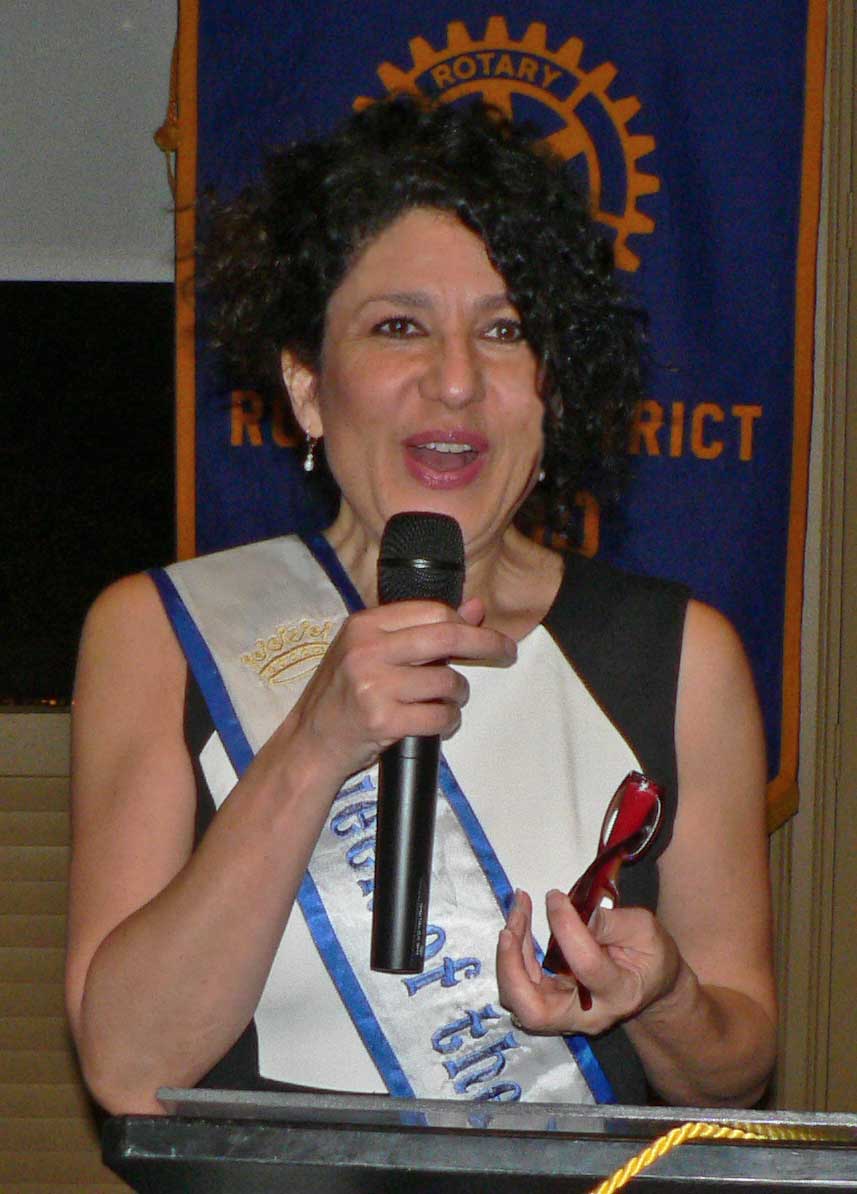
Teresa Scott was crowned “Queen of the Hill” for 2014-15, at a Palos Verdes Chamber of Commerce “Coronation Ceremony” on Nov 22nd at The Promenade on the Peninsula (note white and blue sash). She is on the Chamber’s Board of Directors and serves as Vice Chair of Membership.
This award is given annually by the Chamber to the winner of a 2-month fund-raising contest for a local nonprofit organization. The winner, who is not announced until the ceremony, represents this nonprofit organization and the Peninsula community at local events. Candidates and their sponsoring organizations raise funds and get exposure for the organizations’ programs and services. Each candidate’s net revenue goes 80% to the sponsoring organization and 20% to the Chamber to support its many business programs.
|
District Guatemala Humanitarian Trip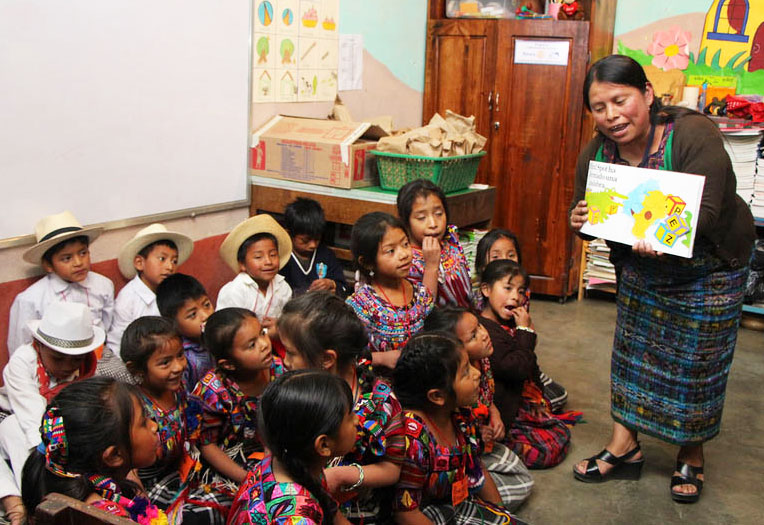 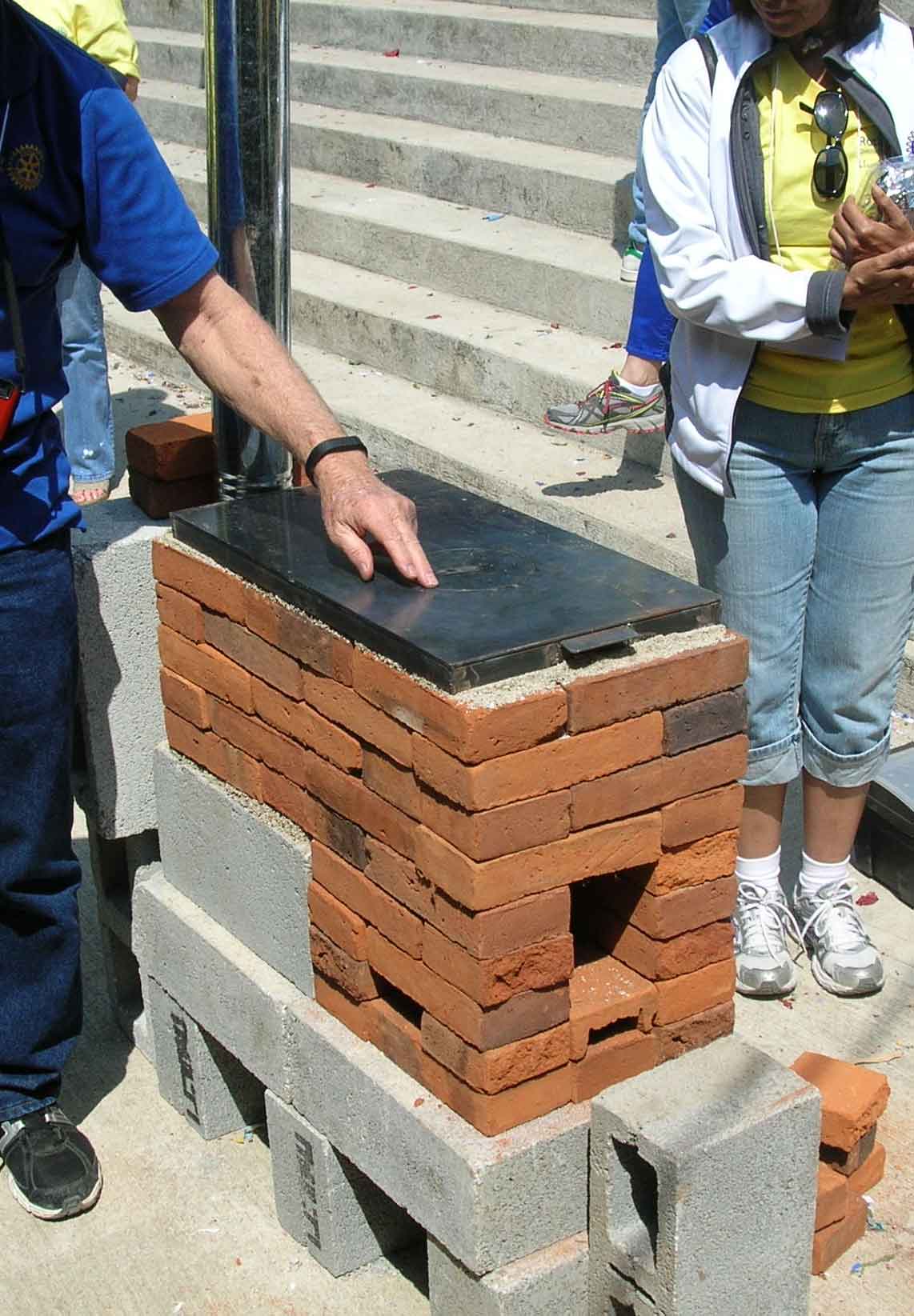 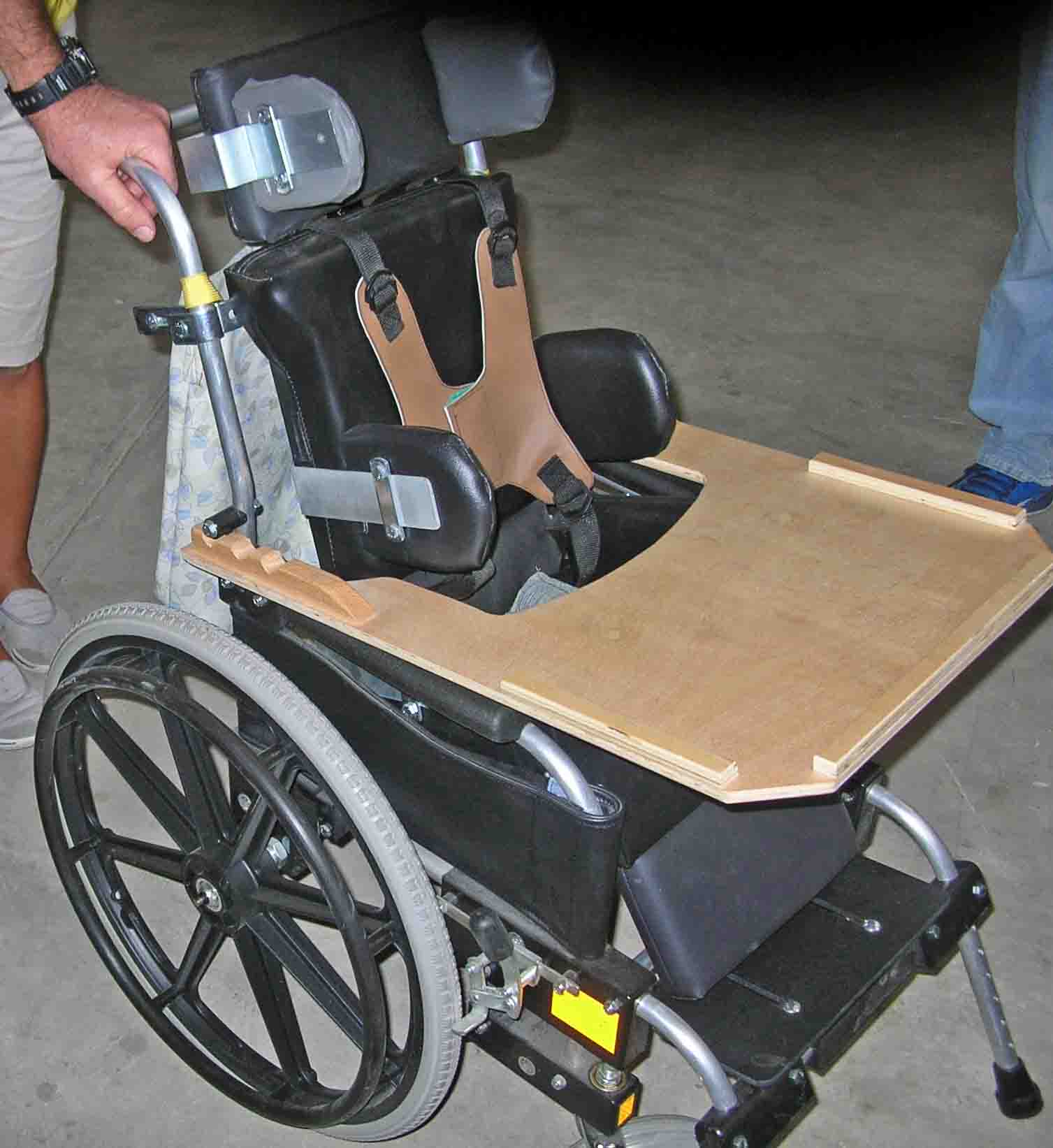
President Roger Schamp and Wes and Judy Bradford presented their experiences in the District 5280 trip to Guatemala District 4250 on February 5-9, in the old colonial capital, Antigua. Roger attended a meeting of Canadian and Washington State Rotarians who were discussing their ongoing projects in Guatemala, including a self-sustaining micro loan system.
Our Rotarian projects there are funded by a Global Grant of $483,000 including funds from both Districts and the Rotary Foundation. The “Guatemala Literacy Project” provides Mayan schools with textbooks. Small charges to the parents each year provide enough money to replace the books in 4-5 years. Teaching without books is especially difficult if the Mayan children are not fluent in Spanish. Many more schools are in need, and Guatemala has one of the lowest literacy rates in the Americas. We brought a carton of wrist bracelets (donated by Trixie and Jim Gamble of our Club) to distribute to eager children. We also delivered school backpacks and supplies, and there never seemed to be enough for everyone.
|
Harmony Concert at Norris Theatre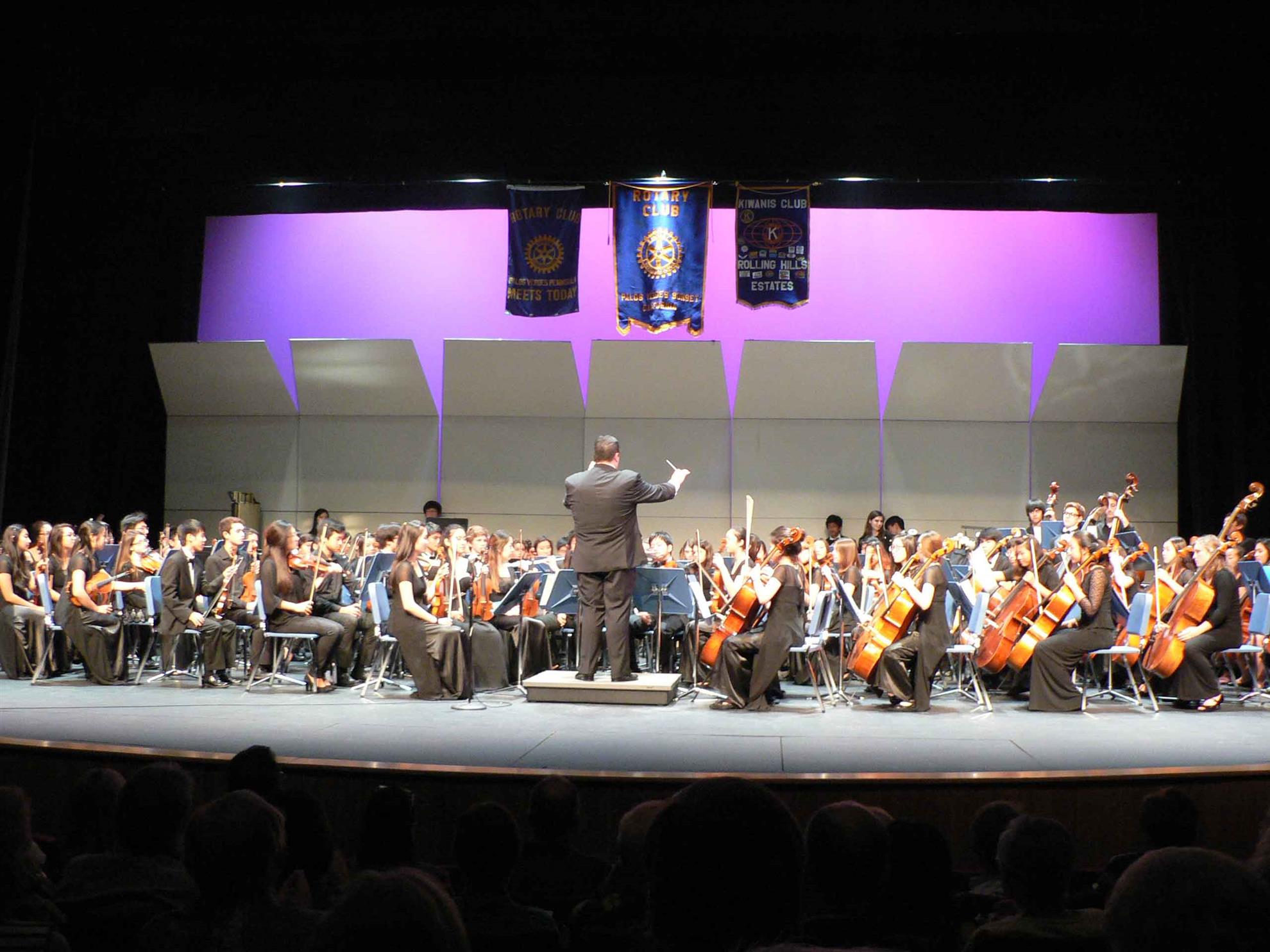 The second annual Harmony Concert by the combined Music Departments of the Palos Verdes Peninsula High School and the Palos Verdes High School was performed at the Norris Theatre on March 17. It is sponsored as a joint community service project by the Palos Verdes Sunset Rotary Club, the Palos Verdes Peninsula Rotary Club, the Palos Verdes Lions Club, and the Kiwanis Club of Rolling Hills Estates. This Concert demonstrates cooperation between two rival high schools and raises funds for their music departments. This event was planned over the past year by the coordinating committee with Jackie Crowley (Palos Verdes Sunset Rotary Club) and representatives of the other three service clubs. The second annual Harmony Concert by the combined Music Departments of the Palos Verdes Peninsula High School and the Palos Verdes High School was performed at the Norris Theatre on March 17. It is sponsored as a joint community service project by the Palos Verdes Sunset Rotary Club, the Palos Verdes Peninsula Rotary Club, the Palos Verdes Lions Club, and the Kiwanis Club of Rolling Hills Estates. This Concert demonstrates cooperation between two rival high schools and raises funds for their music departments. This event was planned over the past year by the coordinating committee with Jackie Crowley (Palos Verdes Sunset Rotary Club) and representatives of the other three service clubs. |
PETS & District Update, by Lew Bertrand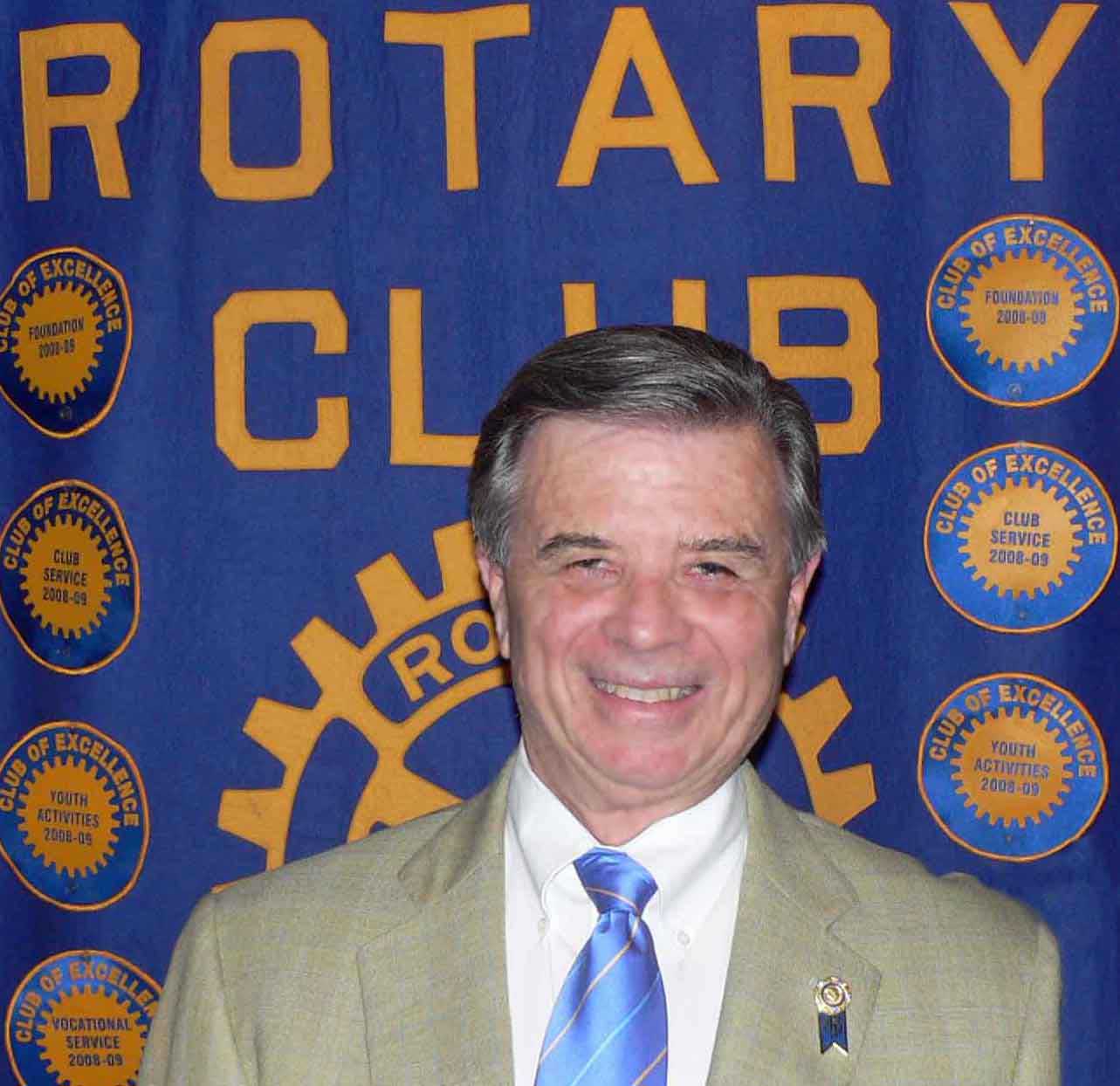
PDG Lew Bertrand, our President-Elect, discussed his experience joining Rotary (rather than Lions Club), because a Rotarian ASKED him! As a banker, he was promoted to various positions in the South Bay area, resulting in his belonging to several nearby Rotary Clubs. He helped to start the 4-Way Test Contest. As banking changed and his bank was sold, he looked for an evening Club, which was Palos Verdes Sunset. He was President of our Club in 2007-8 when Dave Moyers was District Governor and the RI Convention was held in Los Angeles. This began three consecutive years of annual Club of Excellence banners for PV Sunset. When he became District Governor in 2012-13, his activities opened Rotarian friendships to him all over the world. Lew reported on the recent President-Elect Training Seminars (PETS), 2½ days of training (which he probably did not need for himself for his next Presidential term). He was on the committee of PDGs planning it for the past year (as treasurer) and managing its budget. |
Skid Row Housing, by Daniel Rizik-Baer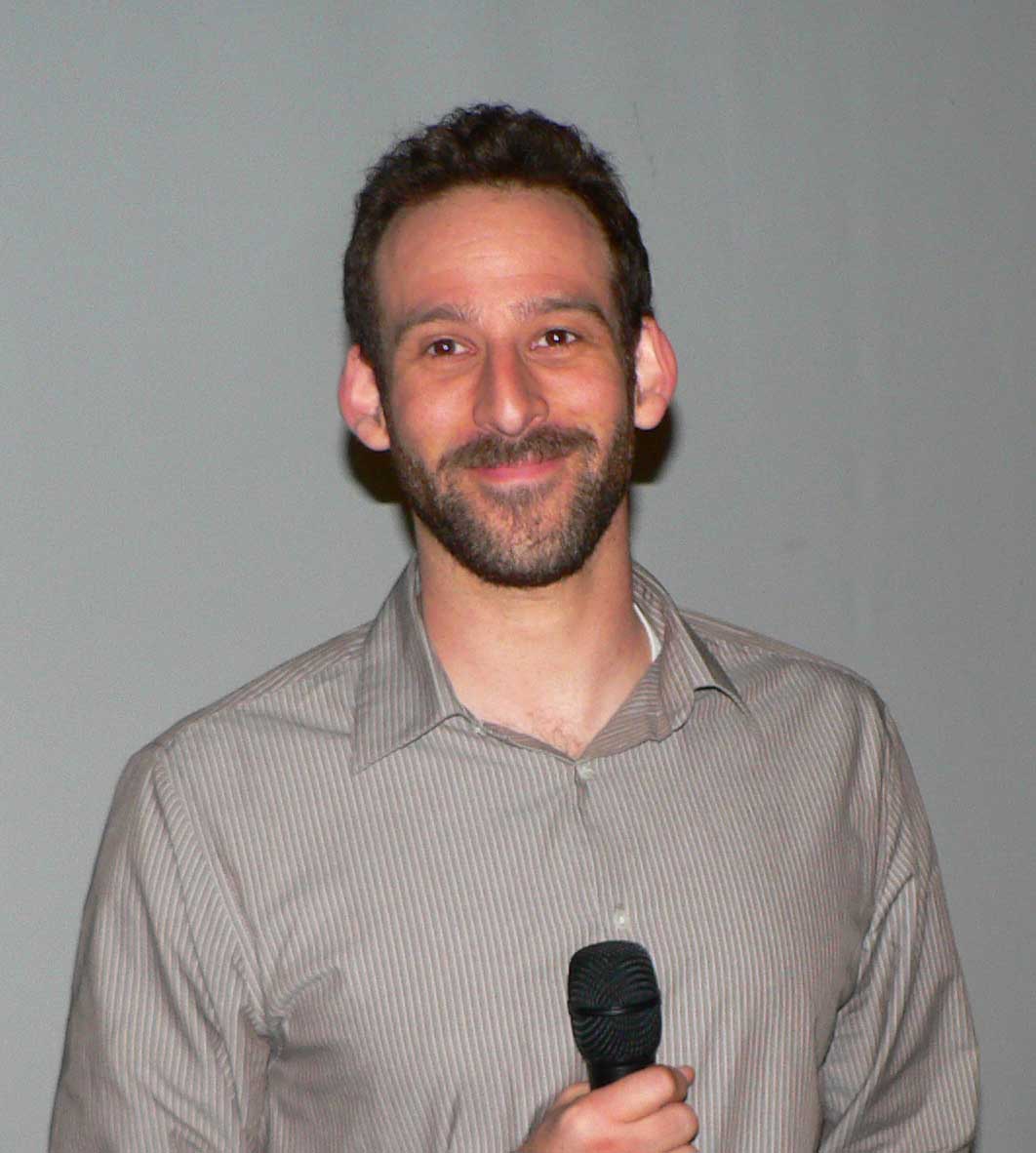
Daniel Rizik-Baer is the Community Relations Manager at the Skid Row Housing Trust in Los Angeles. He has worked with community groups, residents and news media to increase awareness of homelessness and the solutions that the Trust provides — Permanent Supportive Housing. He has a Master’s degree in Social Welfare from the University of California at Berkeley.
|
Student Dance Contest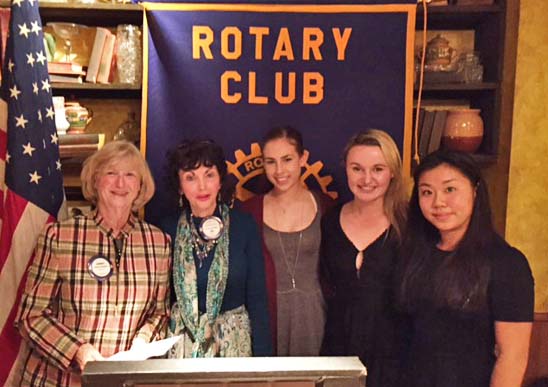
Audrey Dahlgren opened the program by introducing the three dance contestants, who each presented a video selection of her dance performances. The judging committee consisted of Sue Tyree with Chuck Klaus and Jackie Crowley.
Athena Nikolakopulos, a senior at Palos Verdes high school, very impressively danced the classical ballet Nutcracker Grande Pas de Deux (video presented showing her with male partner). The judging committee awarded her with 1st Prize and $200.
Sara Crossman, a senior at Palos Verdes Peninsula High School, presented a video of her solo jazz dance. She was awarded 2nd Prize and $100.
|
Club Assembly
 Roger Schamp opened the program with the Treasurer’s report by Chris Kilgore. Club revenues and expenses were reviewed, with projections over the coming year compared among various venues for our permanent meeting site. Roger Schamp opened the program with the Treasurer’s report by Chris Kilgore. Club revenues and expenses were reviewed, with projections over the coming year compared among various venues for our permanent meeting site.Then there was a discussion by most of the attending members of the possible venues, comparing potential costs and features (location, food service, room size and flexibility, accessibility, parking, and wine sales for cost support).
|
Jacques Naviaux, Gliding in New Zealand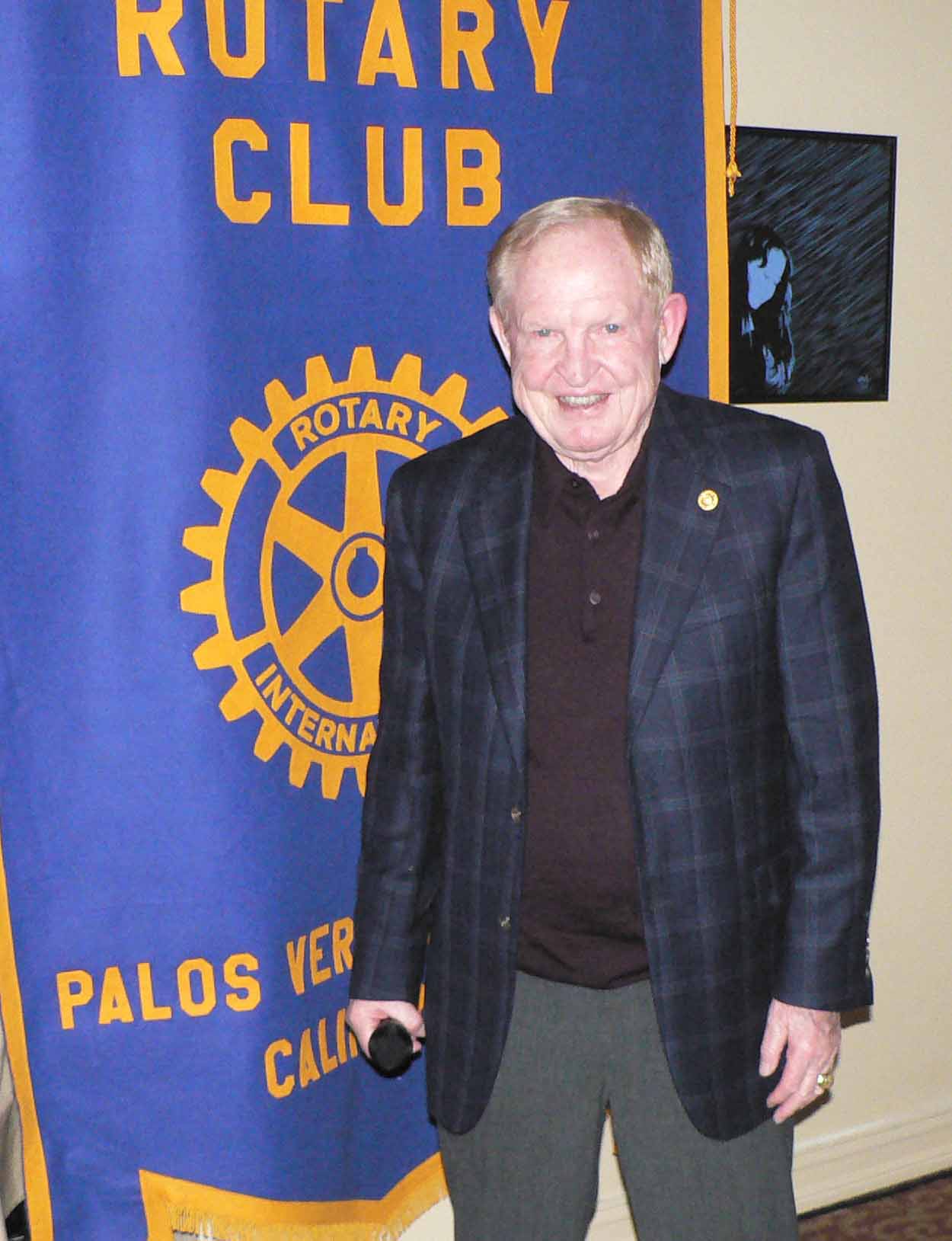
 Jacques Naviaux, a former Marine Corps fighter pilot, presented his gliding (“mountain wave soaring”) experience in New Zealand. The west side of the South Island gets 220 inches of rain per year, with high winds but moderate climate. Jacques Naviaux, a former Marine Corps fighter pilot, presented his gliding (“mountain wave soaring”) experience in New Zealand. The west side of the South Island gets 220 inches of rain per year, with high winds but moderate climate.The wind blowing eastward up the mountain slopes causes a smooth rising air mass that can keep gliders aloft for hours. The air goes up and down following mountain slopes, and tends to rise over sun-heated areas of dark rock surrounded by snow. The gliders follow rising air masses as judged by ground contour and weather conditions. They stay below 15,000 feet, although the glider altitude record is about 50,000 feet.
|
Rotaractors & Interactors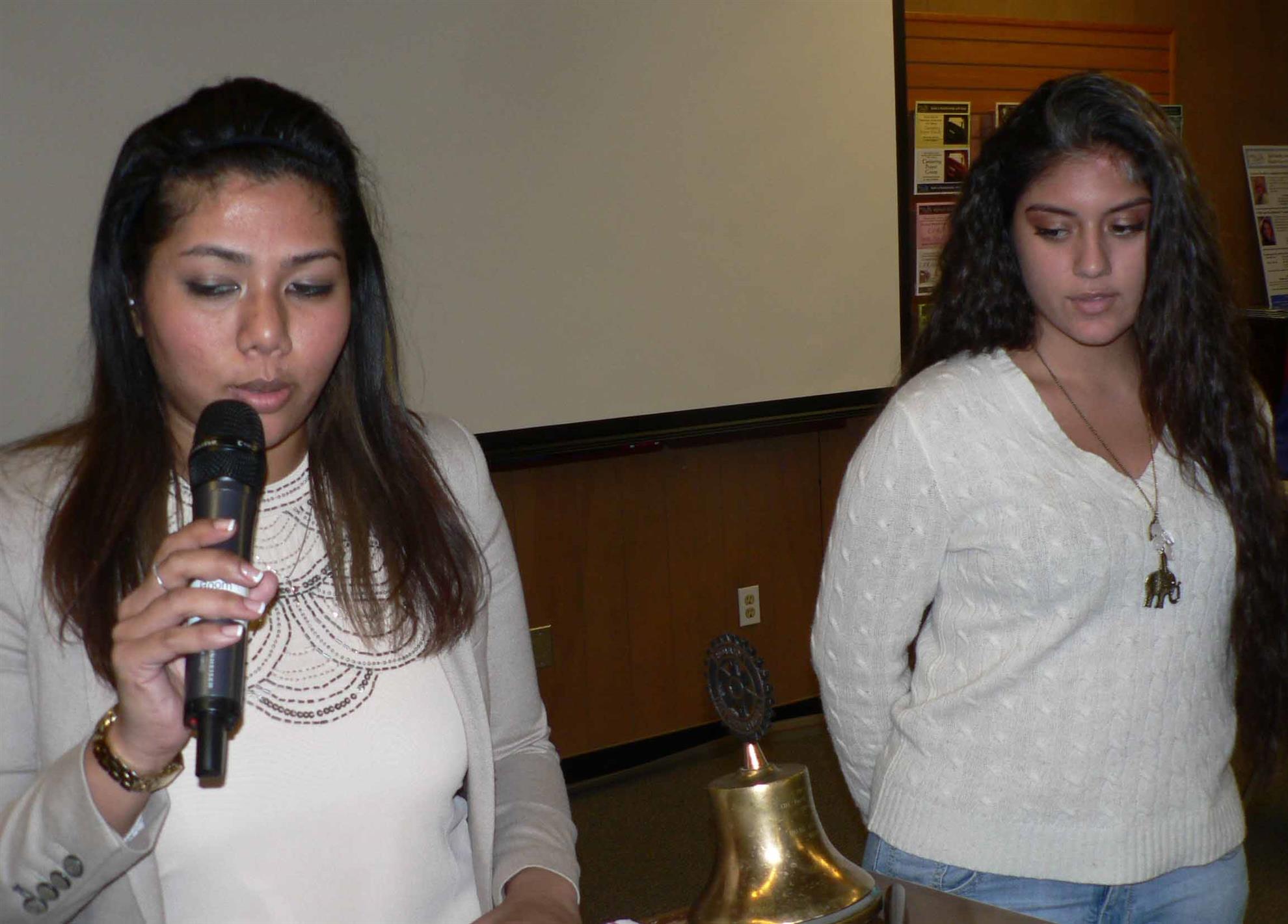 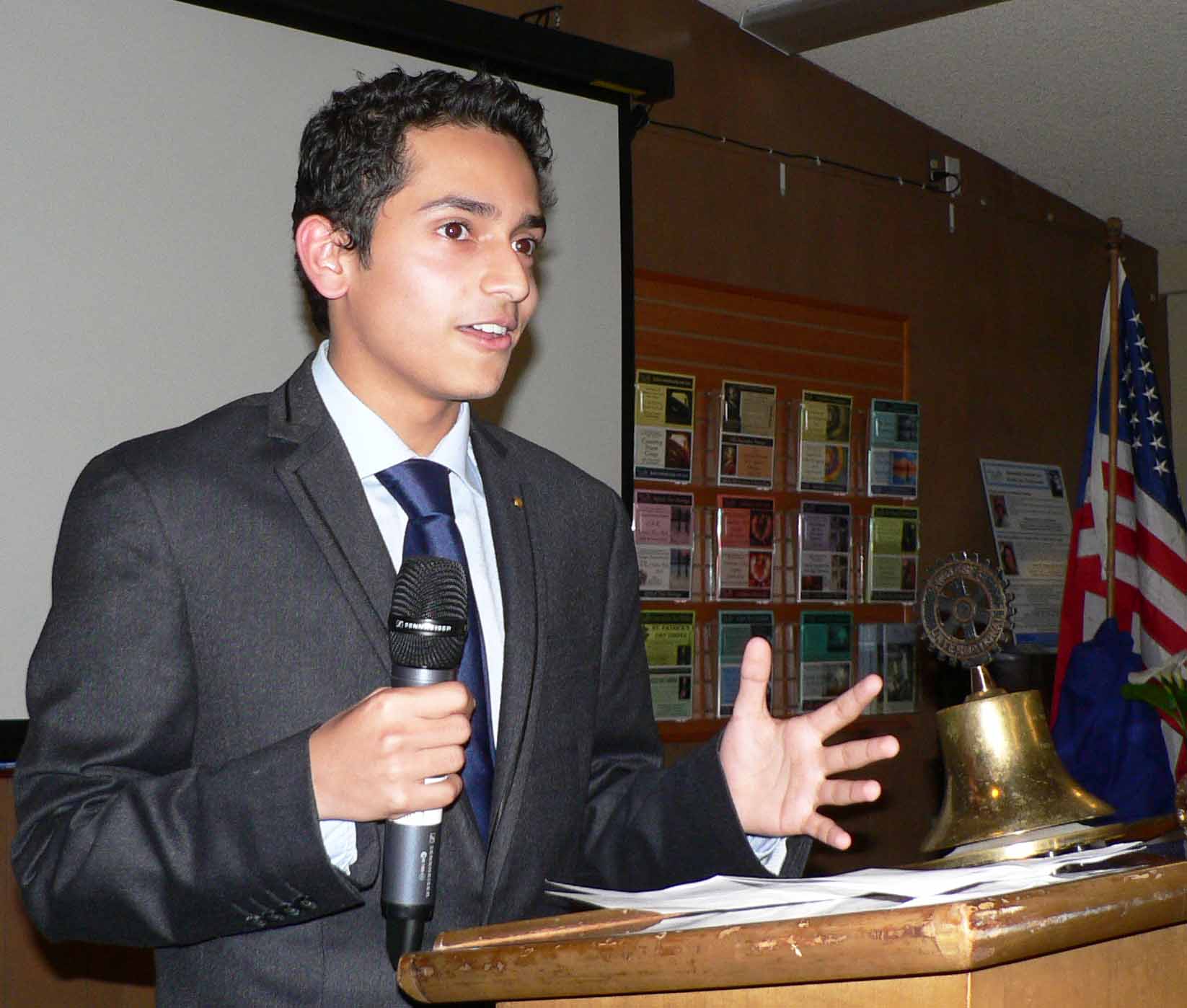 Our student guests reviewed their projects of this year:
Jackie Crowley, Lew Bertrand, and Angi Ma Wong discussed how Rotary experiences have influenced their lives.
|
Student Speech Contest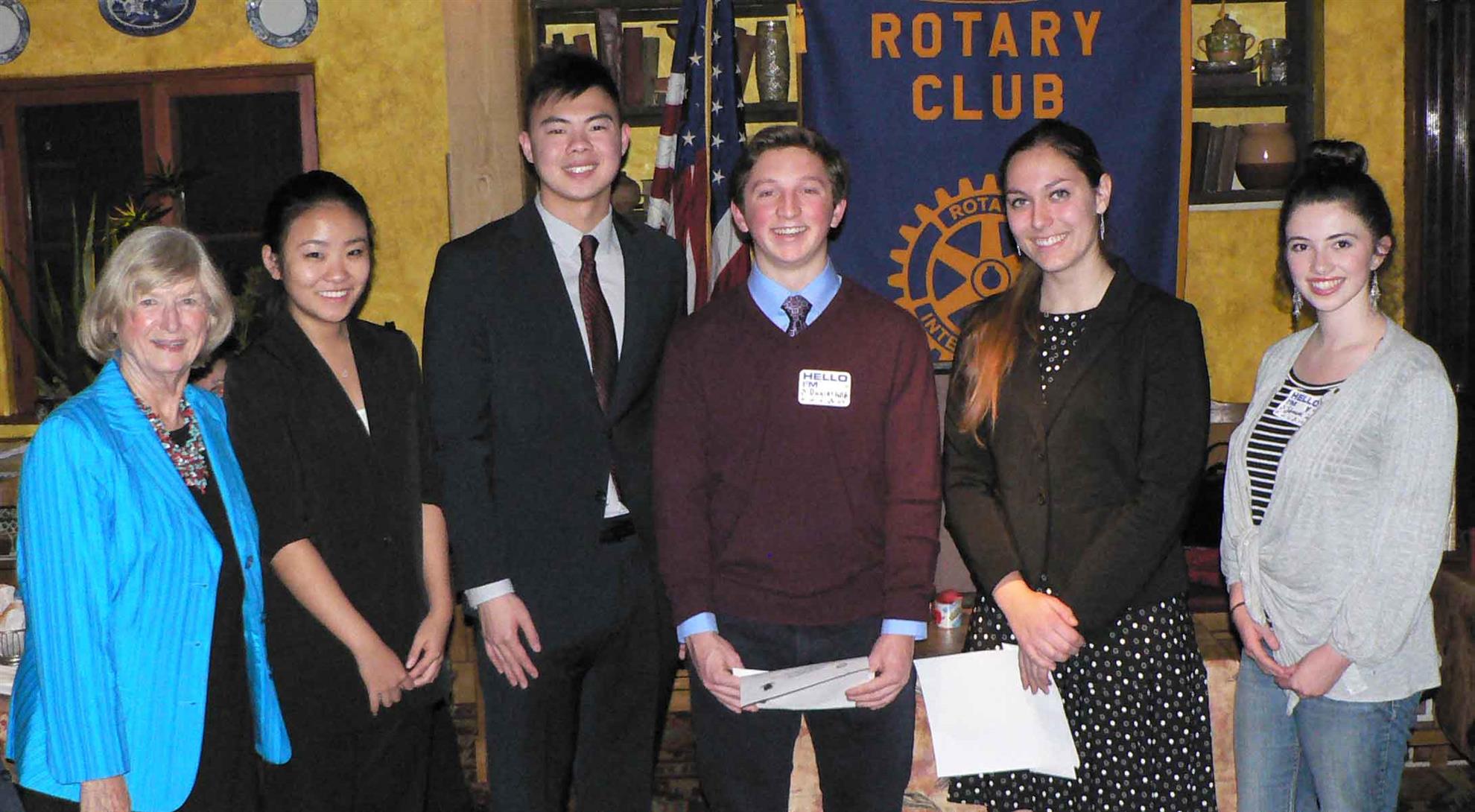 Vocational Service Cochair Audrey Dahlgren introduced the student contestants and reviewed the rules for speaking. The contestants were each given 4-6 minutes to speak, relating their topics to the Rotary Four-Way Test. The judges included Sylvia Benko, Charley Ferraro, Bob Coffey, and Art Delaloza, MMU Professor and Rotaract Advisor. Vocational Service Cochair Audrey Dahlgren introduced the student contestants and reviewed the rules for speaking. The contestants were each given 4-6 minutes to speak, relating their topics to the Rotary Four-Way Test. The judges included Sylvia Benko, Charley Ferraro, Bob Coffey, and Art Delaloza, MMU Professor and Rotaract Advisor.After careful consideration, the judging panel selected as winners Daniel Foltz for First Place (awarded $200) and Annie Benedict for Second Place (awarded $100). The winner will compete in the District Speech Competition at Loyola Marymount University on March 28. Congratulations to the winners, and our sincere thanks to all of the contestants for their hard work, and to Audrey Dahlgren for recruiting such a great cast of contestants!
(Shown with Audrey Dahlgren are Eileen Kim, Kevin Hsu, Daniel Foltz, Annie Benedict and Shannon Cardella)
|
Palos Verdes Art Center, Gale Phinney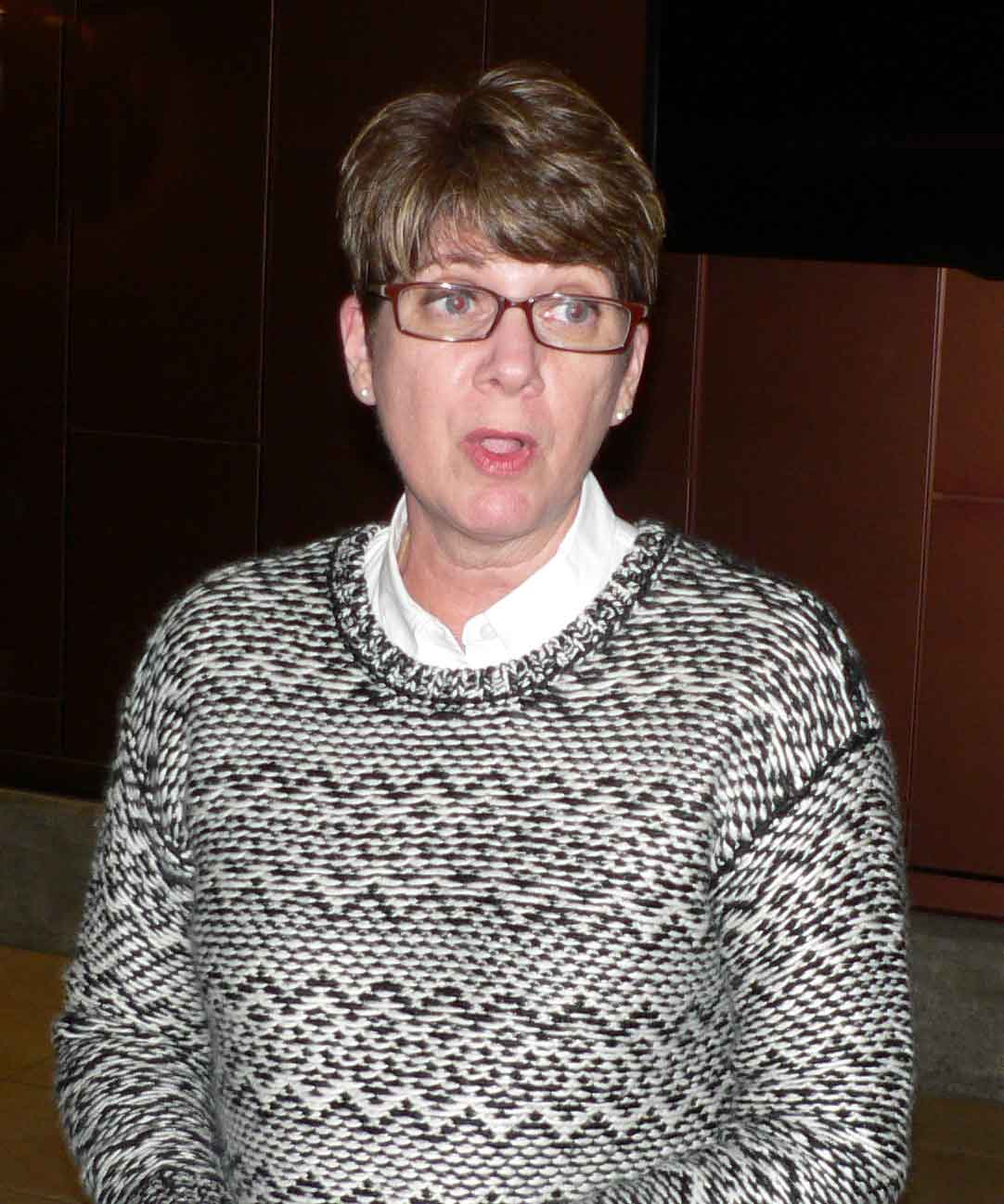
Gale Phinney is the Education Director for the Palos Verdes Art Center, a non-profit community visual arts gallery and school founded in 1931 as a cultural arm of Palos Verdes Estates to make the visual arts available, accessible and affordable to all. She reviewed the history and activities of the Art Center.
|
Wayfarers Chapel, Jim Morgan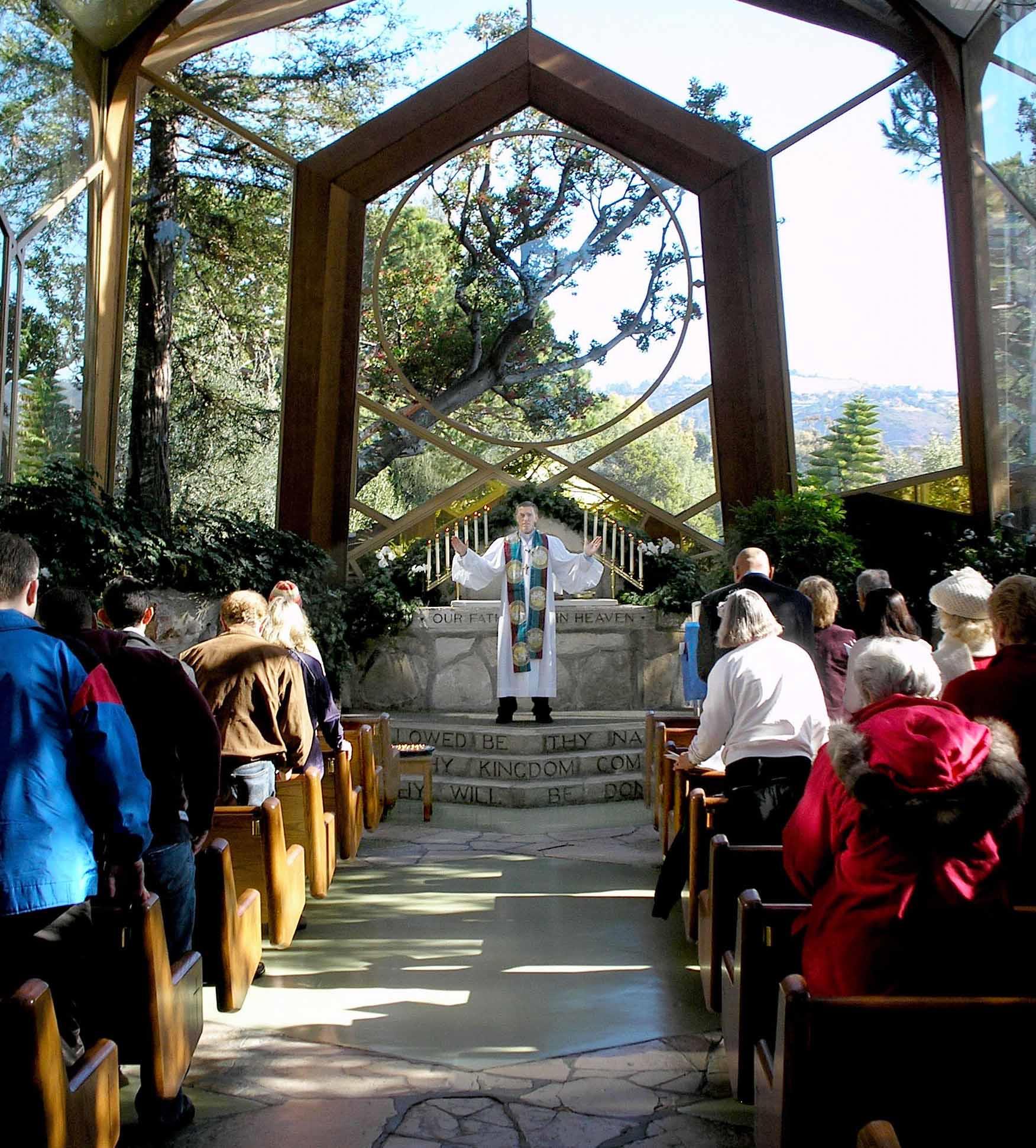 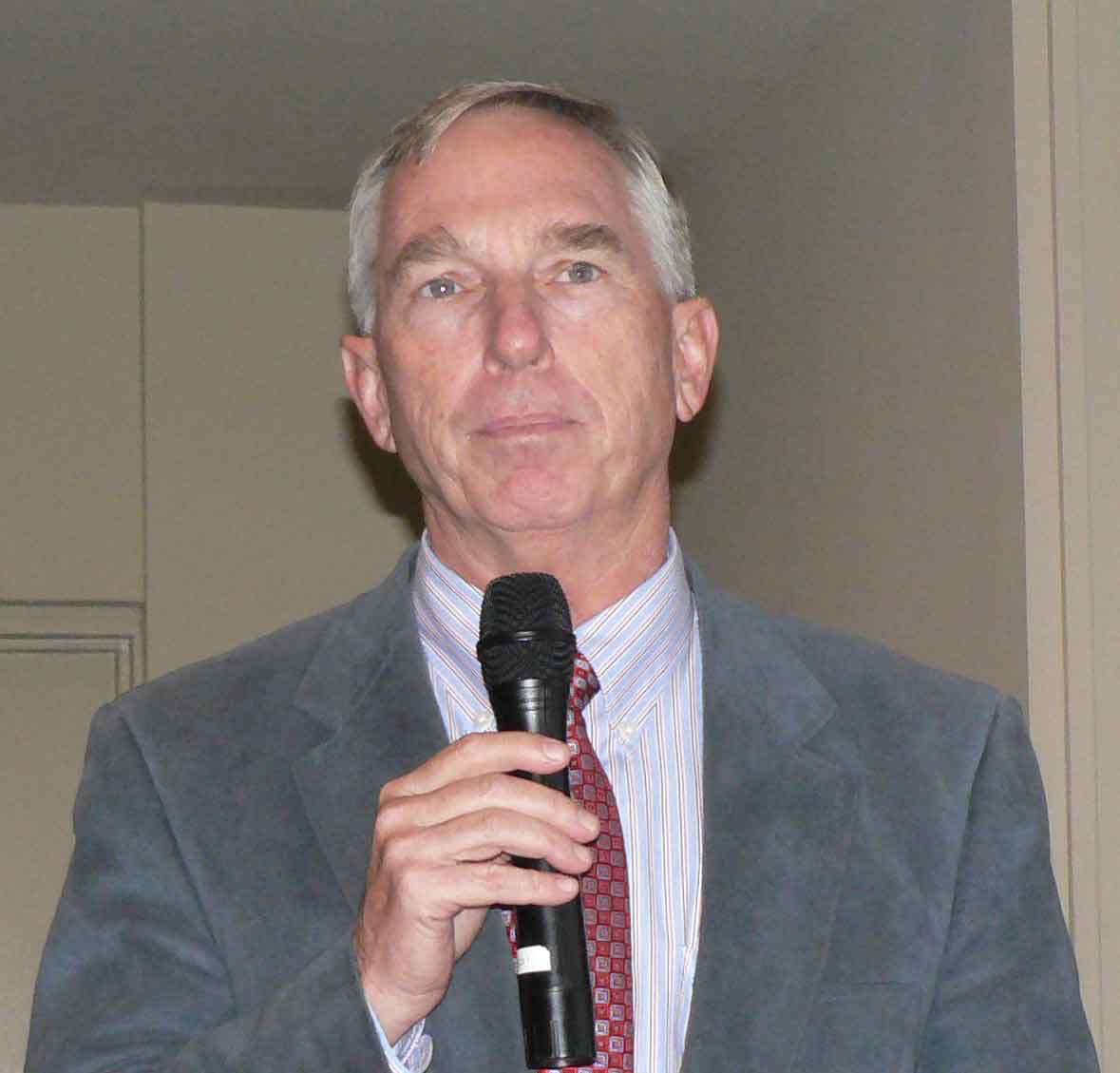
Jim Morgan is a member of the Palos Verdes Peninsula (Noon) Rotary Club, and Director of Operations for the Wayfarers Chapel on Palos Verdes Drive South in Rancho Palos Verdes.
The Wayfarers Chapel (“The Glass Church”) is noted for its unique modern architecture and location on cliffs above the Ocean. It is part of the Swedenborgian Church of North America (founded by Emanuel Swedenborg, theologian and scientist from the 1700′s and noted for his spiritual illumination of the Bible).
|
Water Reliability 2020 (West Basin Municipal Water Dist)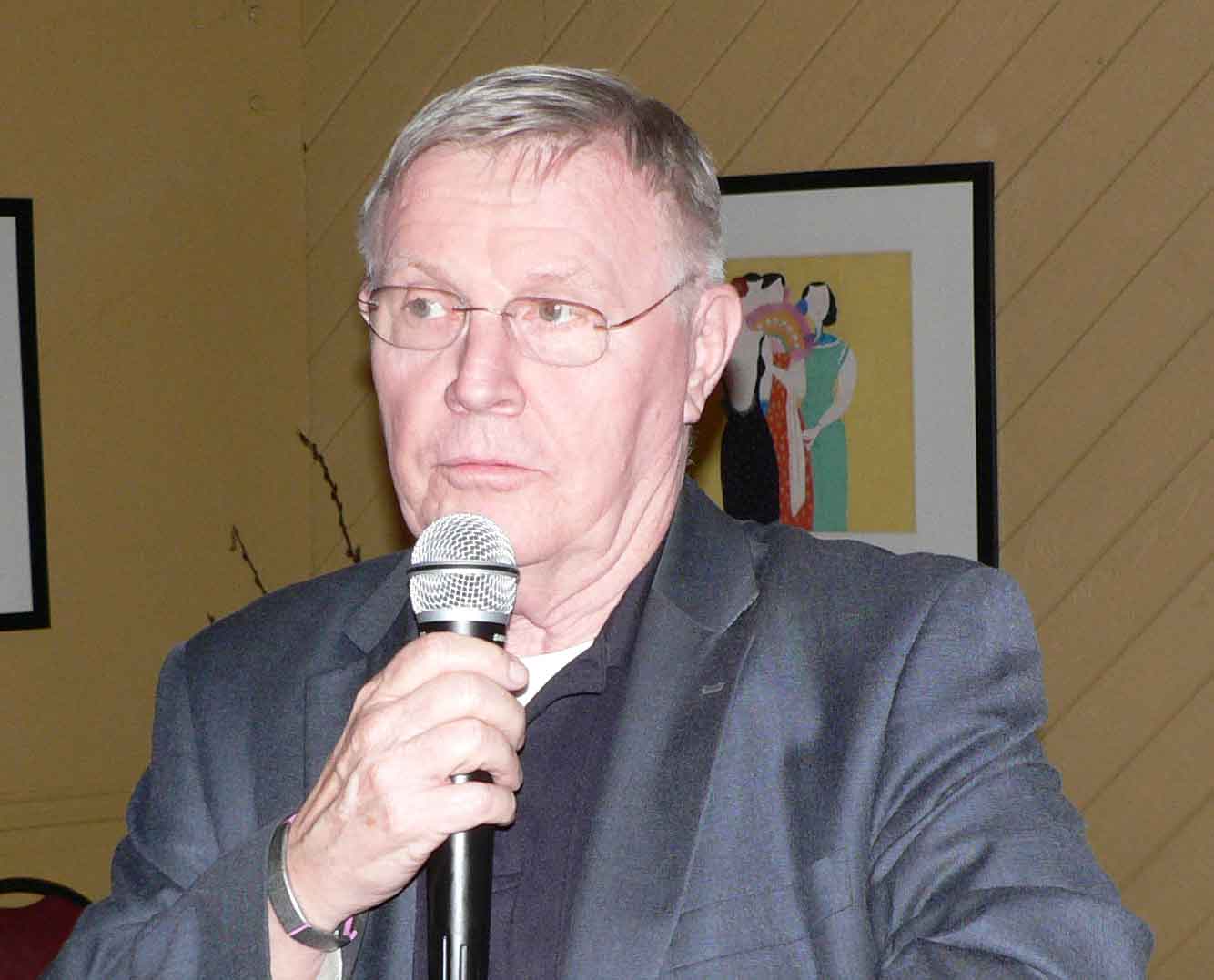
Ron Wildermuth has been a Public Information and Conservation Manager for West Basin Municipal Water District since 2008. He is a retired Navy Captain and was a public relations advisor to Gen Schwarzkopf during the Gulf War, and then worked for the Parsons Corporation and for the Orange County Water District.
The West Basin District was formed in 1947 by local cities to manage a declining water table and overreliance on groundwater. In addition to Palos Verdes, the West Basin’s service area includes Carson and most of the cities south of the Los Angeles Airport (except Torrance), and Inglewood, Culver City, West Hollywood and Malibu. It distributes 220,000 acre-feet of water annually. (An acre foot is 326,000 gallons, the amount used by two average families in one year.) It is a member of the Metropolitan Water District that imports water into Southern California.
|
Christmas Party, OFFSITE at Palos Verdes Golf Club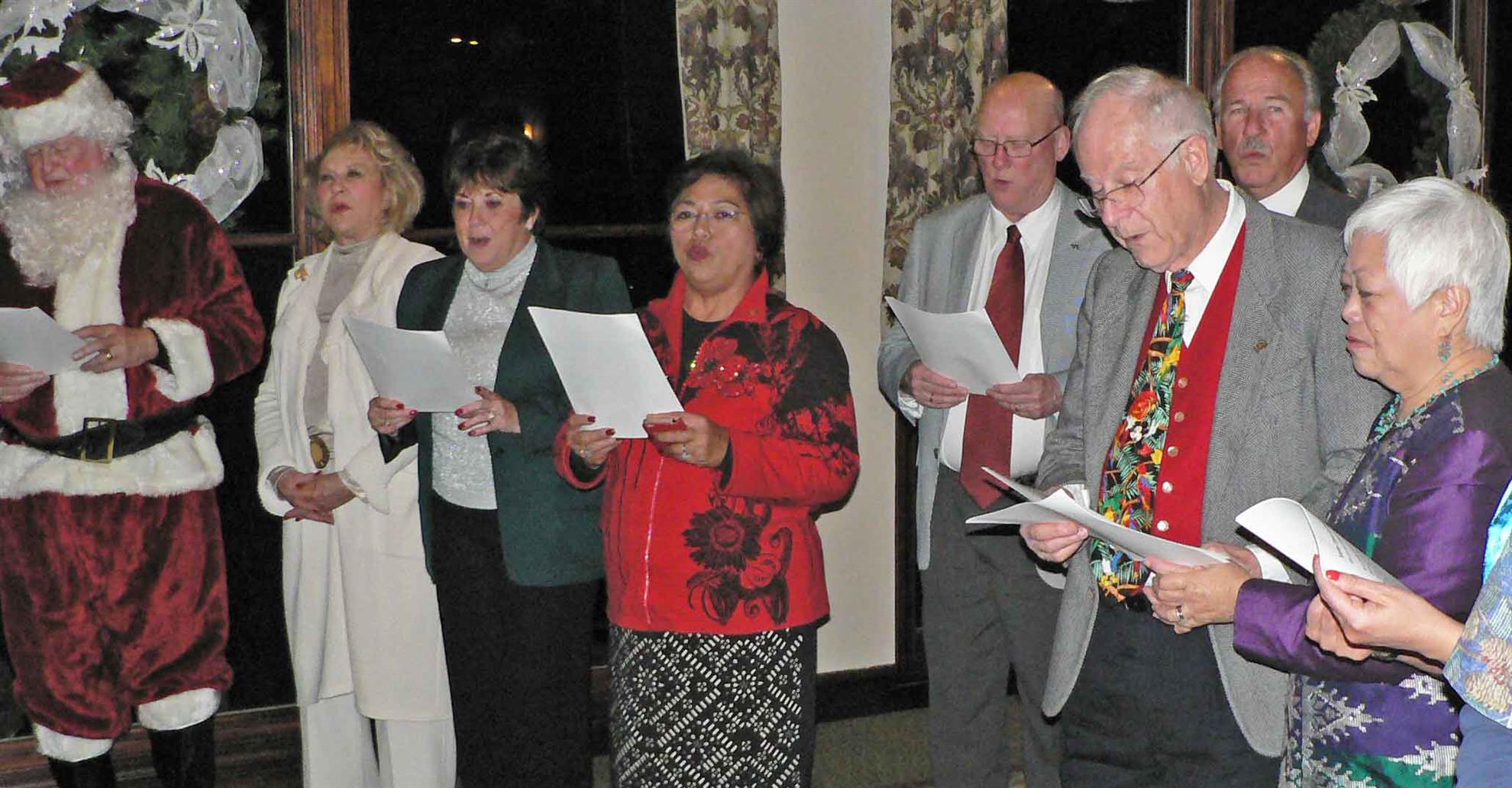
Sandy Farrell & Pres Roger Schamp opened the program & introduced our many guests, including DG Elsa Gilham & Larry Gillham, & her Chief of Staff, Melody St John & Paul St John.
After dinner, PDG & District Rotary Foundation Chair Dave Moyers reviewed the history of the Foundation and its contributions to Rotarian service. Then the following members were recognized with Paul Harris Awards: Paul Harris +2: Chuck & Marylyn Klaus & Sandy Farrell Paul Harris +3: Jackie Crowley & Varda Lancaster Paul Harris +4: Wally Christmas Paul Harris +5: Burt Arnold (not present, but donates every year)
Larry Andrews was recognized for new members brought in to Rotary. Jim Gamble was recognized for his many years of service to Rotary. Marylyn Klaus was recognized for her many years of service to Rotary and her loyal support of the Rotary Foundation. Santa (Chris Kilgore) was presented a map by Jerry Farrell, to help him find the PV Sunset Rotary Club. Betty Reider & Audrey Dahlgren sang a Christmas Carol to Pres Roger (“Roger is Coming to Town”). Then we all sang Christmas Carols to finish the evening events. |
Larry Andrews’ Book, “A Space Oddity” (Offsite at Mary & Joseph Retreat Center)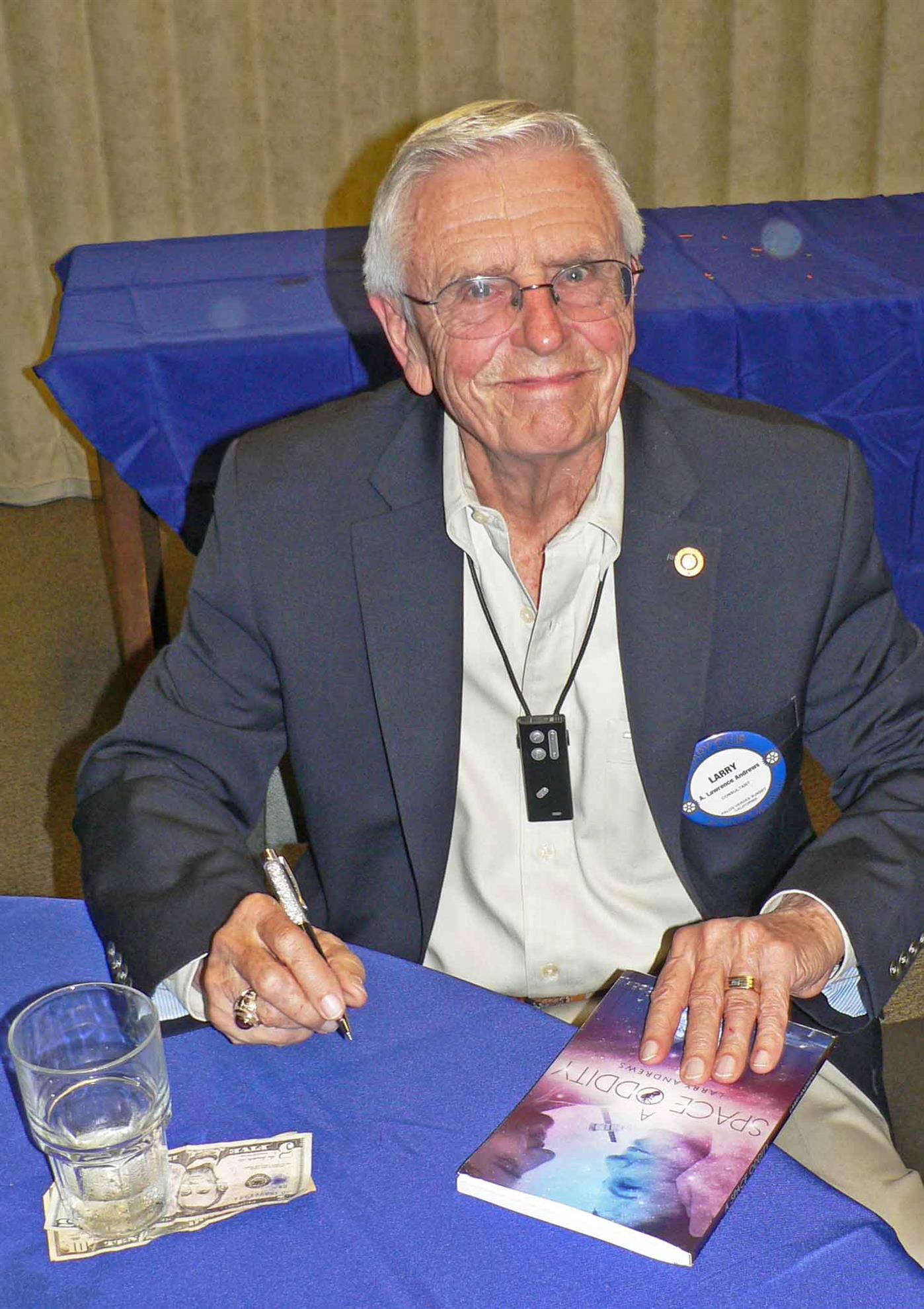
Our Club’s newest novelist, Larry Andrews, is an engineer and aerospace consultant. He loves to read novelists including Tom Clancy, James Michener, Noel Barber, John Grisham and Patricia Cornwell. He likes people, traveling and cultures, and describes himself as emotional, romantic, and with a vivid imagination. He decided to write a novel based on his experiences and places he’s been. |
Student Art Contest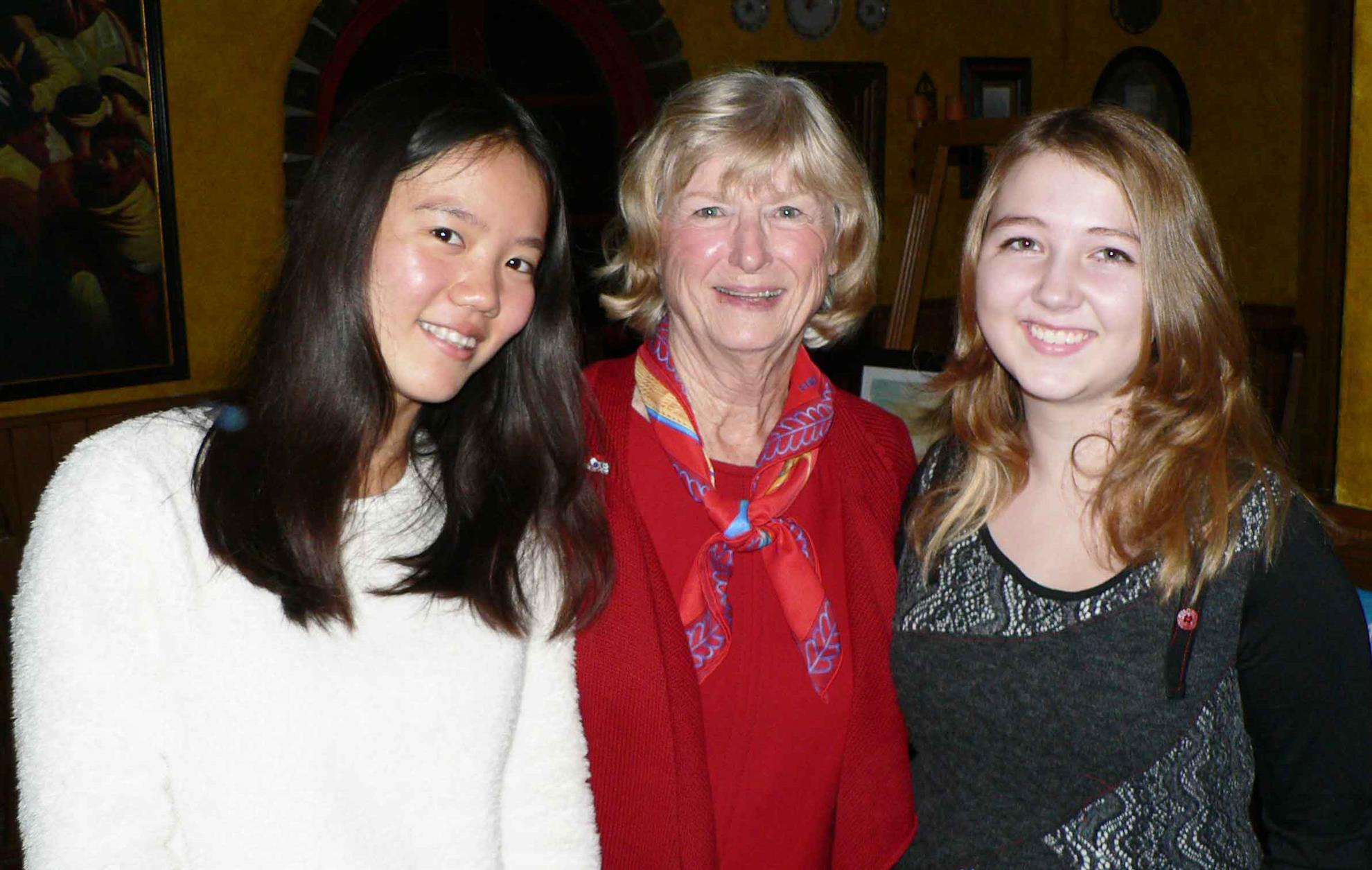
Audrey Dahlgren introduced the student art contestants. The students introduced themselves and presented their artwork, describing their motivations for their choices. The judging committee consisted of Echo Lee, with Larry Andrews, Dave Moyers and Marylyn Klaus. Annie Graziano (Palos Verdes High School) presented a video that she wrote and produced, about her older sister and boyfriend showing “Commitment to a Relationship”. The judging panel reviewed all entries carefully, and finally came up with their winners: Rachel Gundlach, 1st Place and $200 for “Girl in Her Own Universe”, and Chelsea Liu, 2nd place and $100 for her watercolor, “Ocean View at Sunset”. The 1st Place winner will compete in the District Contest at Loyola Marymount University on March 31. |
4-Club Joint Noon Meeting (Rolling Hills Country Club)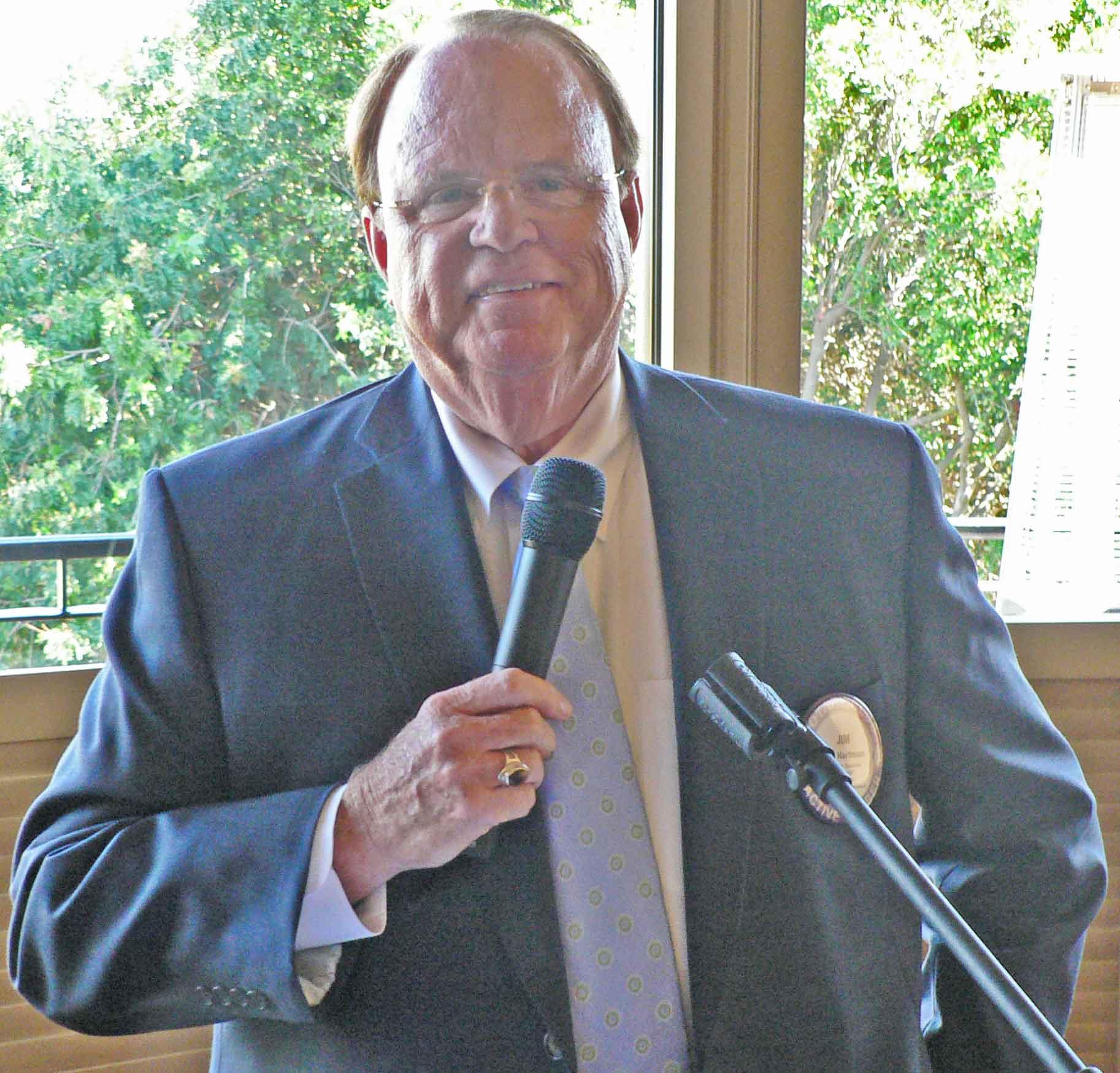
Pres Jim Hartman of the Palos Verdes Peninsula Rotary Club opened the meeting. After the invocation, PV Peninsula new member Megan Lyne led the attendees in singing the “Star-Spangled Banner” in her beautiful soprano voice. After a review of the Harmony Concert Joint Project of the 4 Clubs, he introduced each of the 4 Club presidents in turn, to present overviews of their Clubs’ activities and service projects.
|
Father Anastasi, Abbot of St Antony Coptic Monastery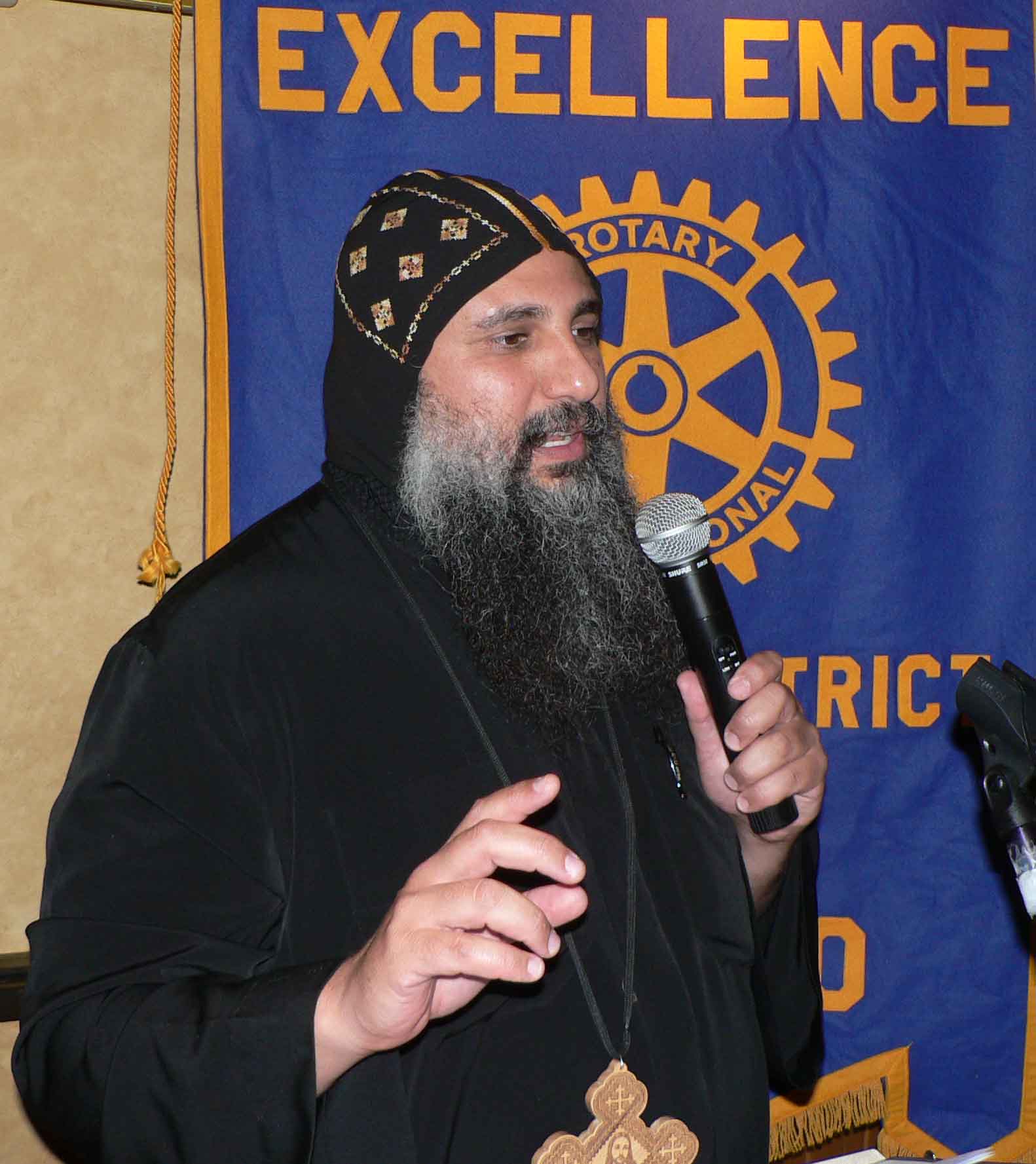
 Father Anastasi became Hegumen (Abbot) of St Antony Monastery in Newberry Springs, near Barstow in California’s Mojave Desert, in 2006. The Monastery was established in 1973, the first Coptic monastery in North America. It serves many Coptic Orthodox congregations in Southern California. The monastery is a U-shaped building on 800 acres with St. Antony’s Church, a row of small cells each containing a bed and chair for the monks, and a refectory (dining room). In spite of their isolated location, they receive many visitors, not all of the Coptic faith. Father Anastasi presented a video on Coptic history in Egypt, including early leaders and martyrs. Father Anastasi became Hegumen (Abbot) of St Antony Monastery in Newberry Springs, near Barstow in California’s Mojave Desert, in 2006. The Monastery was established in 1973, the first Coptic monastery in North America. It serves many Coptic Orthodox congregations in Southern California. The monastery is a U-shaped building on 800 acres with St. Antony’s Church, a row of small cells each containing a bed and chair for the monks, and a refectory (dining room). In spite of their isolated location, they receive many visitors, not all of the Coptic faith. Father Anastasi presented a video on Coptic history in Egypt, including early leaders and martyrs. |
John Williams, Peninsula Symphony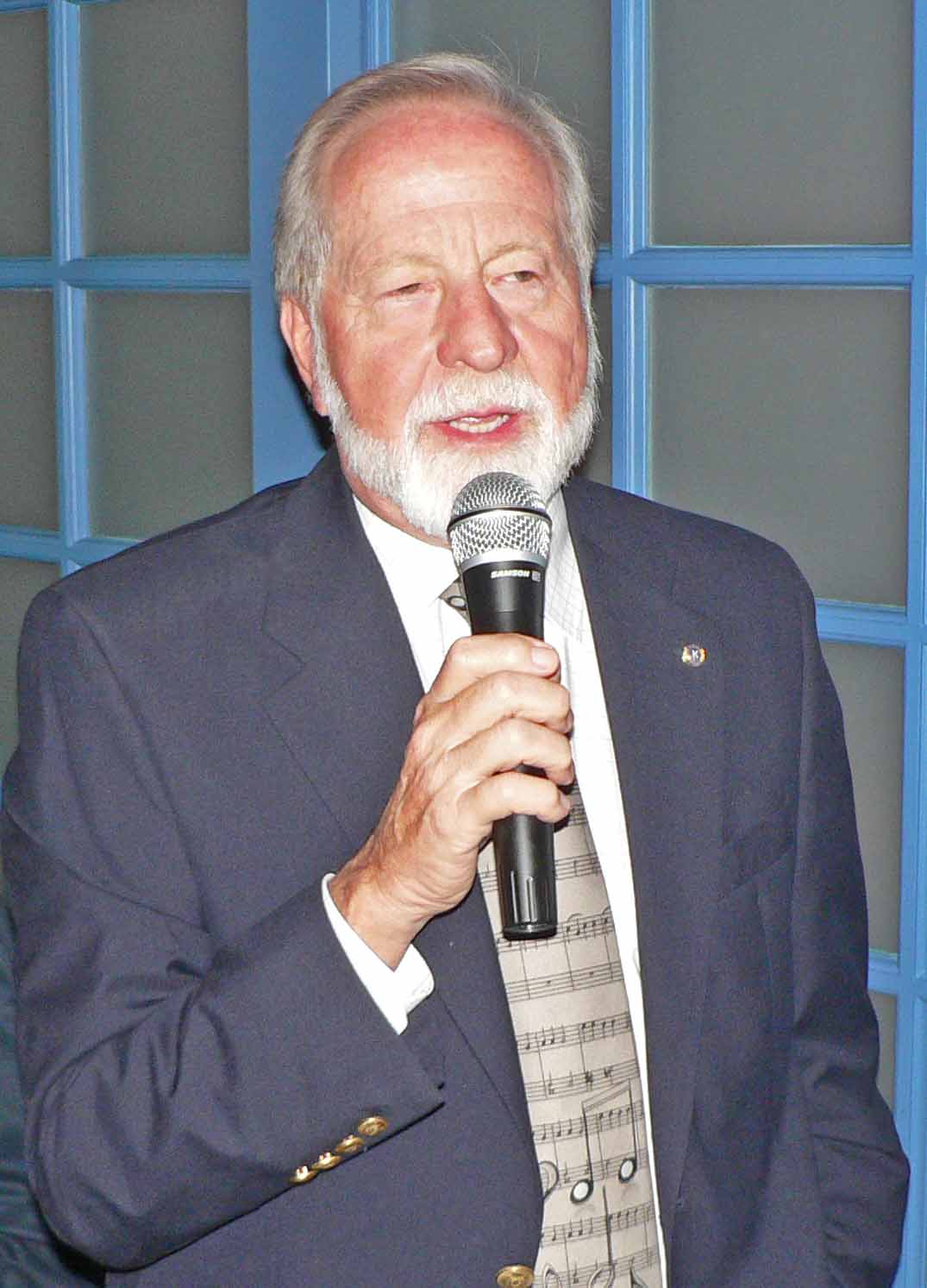
John Williams is the President of the Peninsula Symphony Association. He was born in Illinois north of Chicago and came to California at age 13. He attended USC and became a Navy submariner. He worked for Electra Manufacturing until 1988, and then worked for Morgan Stanley until his retirement in 2013. |
Student Music Contest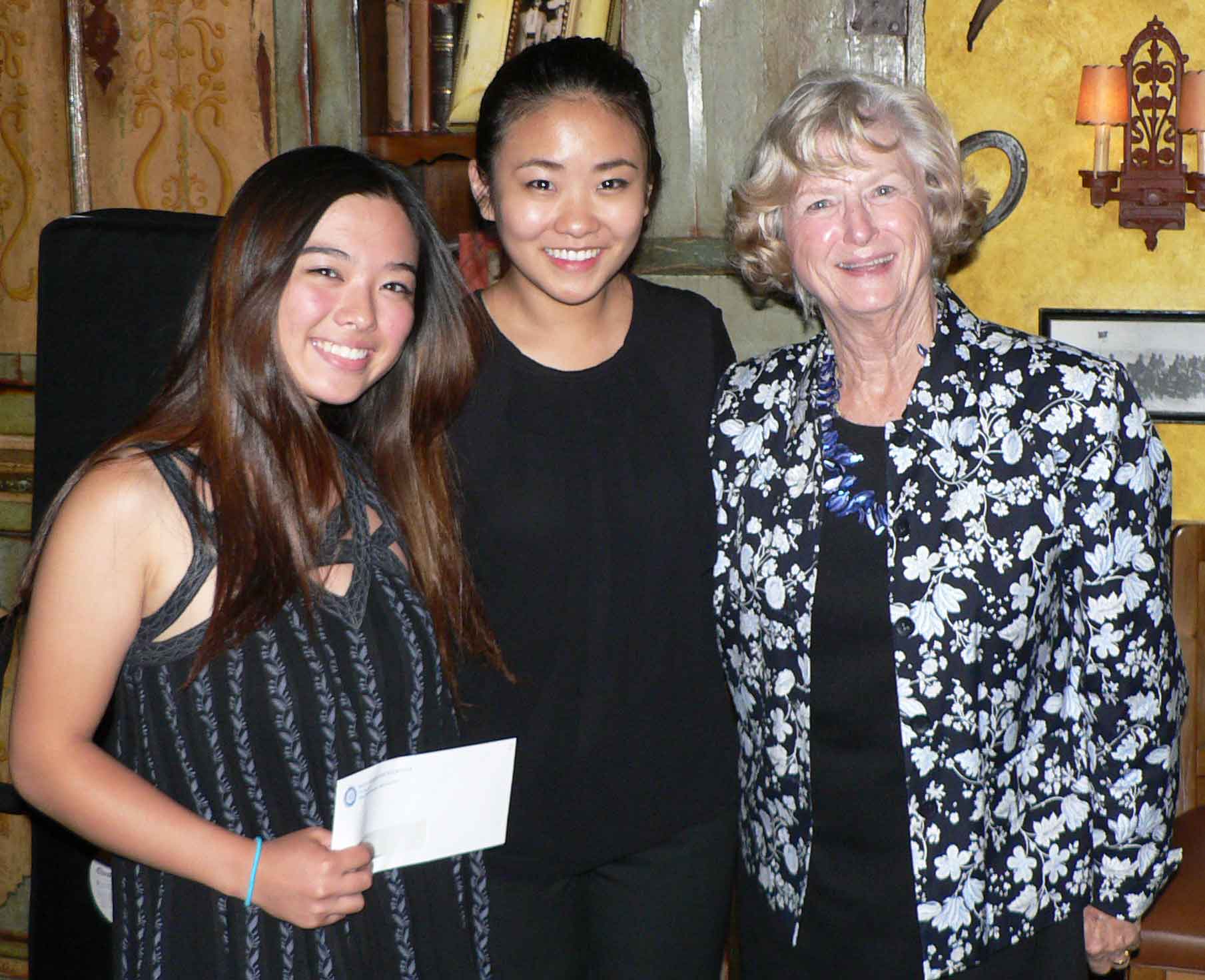 Vocational Service Co-Chair Audrey Dahlgren introduced the students entered into our Club’s Music Contest. The students from Peninsula High School were:
• Chisa Kodaka (violin) • Rishi Gattu (guitar) • Brandon Jolly (keyboard) • Zoe Council (singer with keyboard) The students from Palos Verdes High School were: • Eileen Kim (violin) • Enoch Park (oboe) The Club’s Judging Committee included Ralph Black, Jacques Naviaux and Chuck Klaus. Following intense deliberations, the winners were Chisa Kodaka (Second Place) and Eileen Kim (First Place). Congratulations and thanks to both of them, and to all of the contestants for their talent and hard work! The winner will compete in the District Final contest at Loyola Marymount University on March 31.
Our Club extends our gratitude to Audrey Dahlgren for her hard work recruiting the contestants and organizing this contest. |
DG Elsa Gilham Visit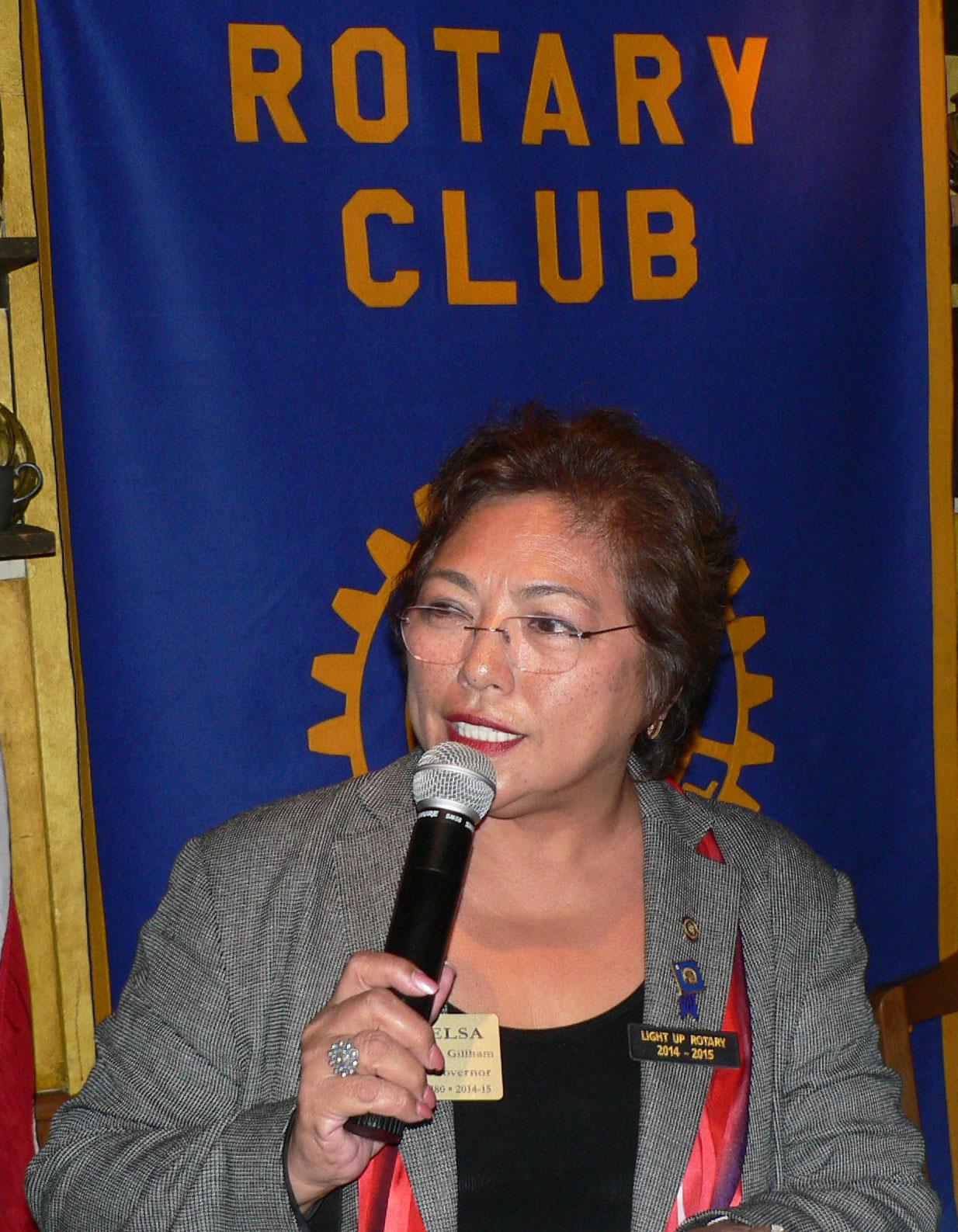
DG Elsa Gillham joined Rotary in 1998 and is Past President of the Wilshire Rotary Club in Los Angeles. She is a Rotary Foundation alumnus and served as team leader of the Group Study Exchange to the Philippines in 2006-7 and was Rotarian of the Year. She helped charter the Rotary Club of Historic Filipinotown. She served in many offices of District 5280 and in community organizations before becoming District Governor.
|
Toberman House, Carter Calhoun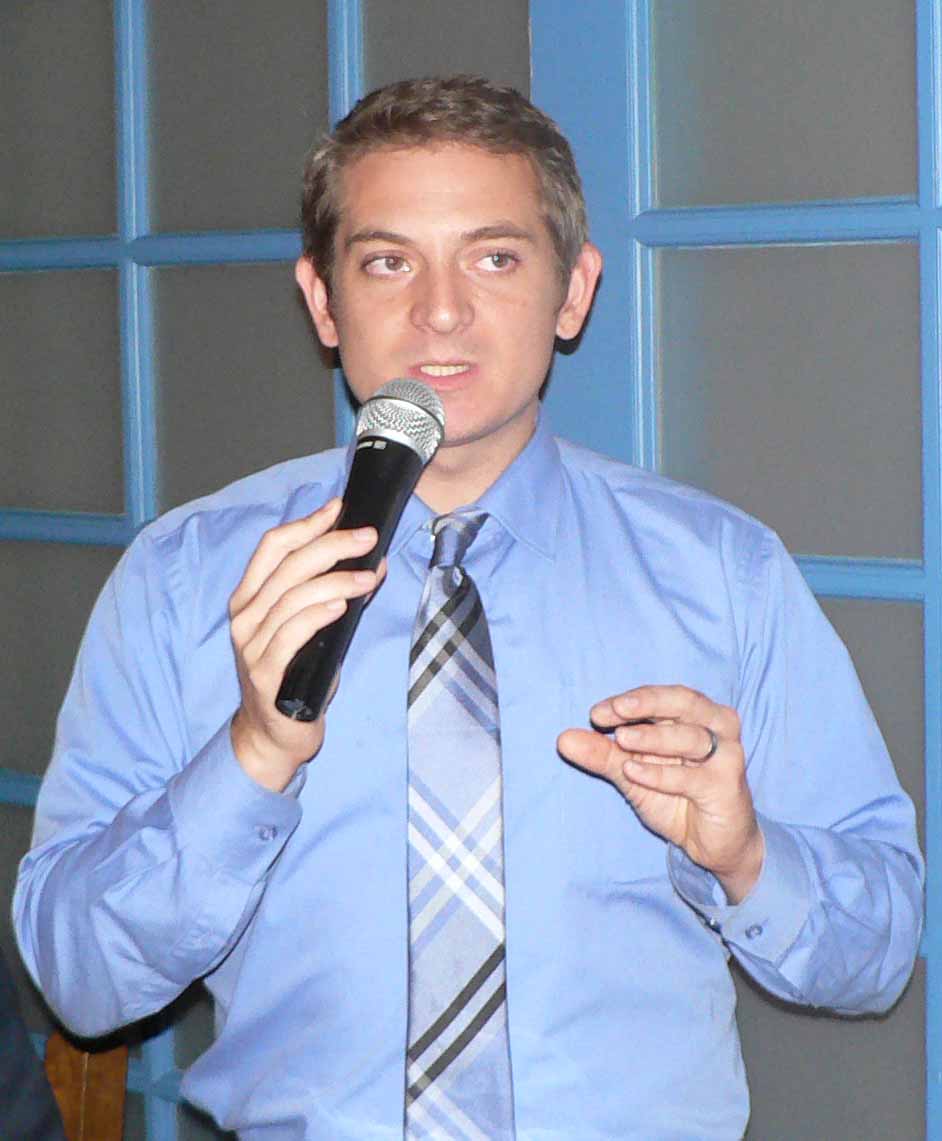
Carter Calhoun is Director of Development of Toberman Neighborhood Center in San Pedro. He grew up in San Pedro and attended local schools. His life passion has been community service. He had a computer business for 5 years and then sold it. He spent one year with the Masai tribe in Kenya, and was fascinated by their rich culture and interesting lifestyle. He met his wife in Palos Verdes and settled down in this area, and has been with Toberman for about 2 years.
|
Kathy Berg, “RX for Life” ProgramThe Vial of Life program, a free, medical record-keeping program for adults and children, was created in the Midwest, and is locally named RX for Life on the PV Peninsula. It is designed to aid Peninsula residents in supplying important, individual medical information to assist first responders in performing emergency first aid in the home.
The RX for Life kit includes: medical history form, pencil, prescription bottle to store your form, refrigerator magnet, and window decal for first responders. Participants keep medical records current on the form, which is rolled up and stored in a plastic pill bottle on the top right hand shelf of one’s refrigerator. A window decal or refrigerator magnet is displayed for paramedics and other emergency personnel to have access to up-to-date information when called to a residence.
|
The Hill, by Don Davis, AuthorDon Davis has been an attorney for 45 years, specializing in corporate, business and securities law and an investment banker for 40 years. (His family arrived in the 1880s in Porterville, from Missouri.) He and his wife have 7 children; the youngest, Julie, is 14 years old and attends Palos Verdes High School.
Don completed his first novel, THE HILL, this year (set in the Palos Verdes area). His second novel, THE ISLAND, set on Catalina Island, is in progress. An author interview that he read in the Los Angeles Times inspired him to write THE HILL. The interviewee spoke about the three components of a story: locale, theme and characters, and how he wrote 3 pages a day.
|
Rolling Hills Estates City Planning Director, David WahbaDavid Wahba has been employed with the City of Rolling Hills Estates for over 24 years and has served as the City’s Planning Director for 12 years, overseeing Planning, Building& Safety and Code Enforcement. Prior to his current position, he was employed by his hometown of San Jose in its Redevelopment Agency.
David has a BS from Cal Poly San Luis Obispo in City and Regional Planning and a MA from Long Beach State in Public Policy and Administration. He lives in the South Bay, is married with two children.
(Notes by Angi Ma Wong)
|
Palos Verdes Chamber of Commerce, Eileen Hupp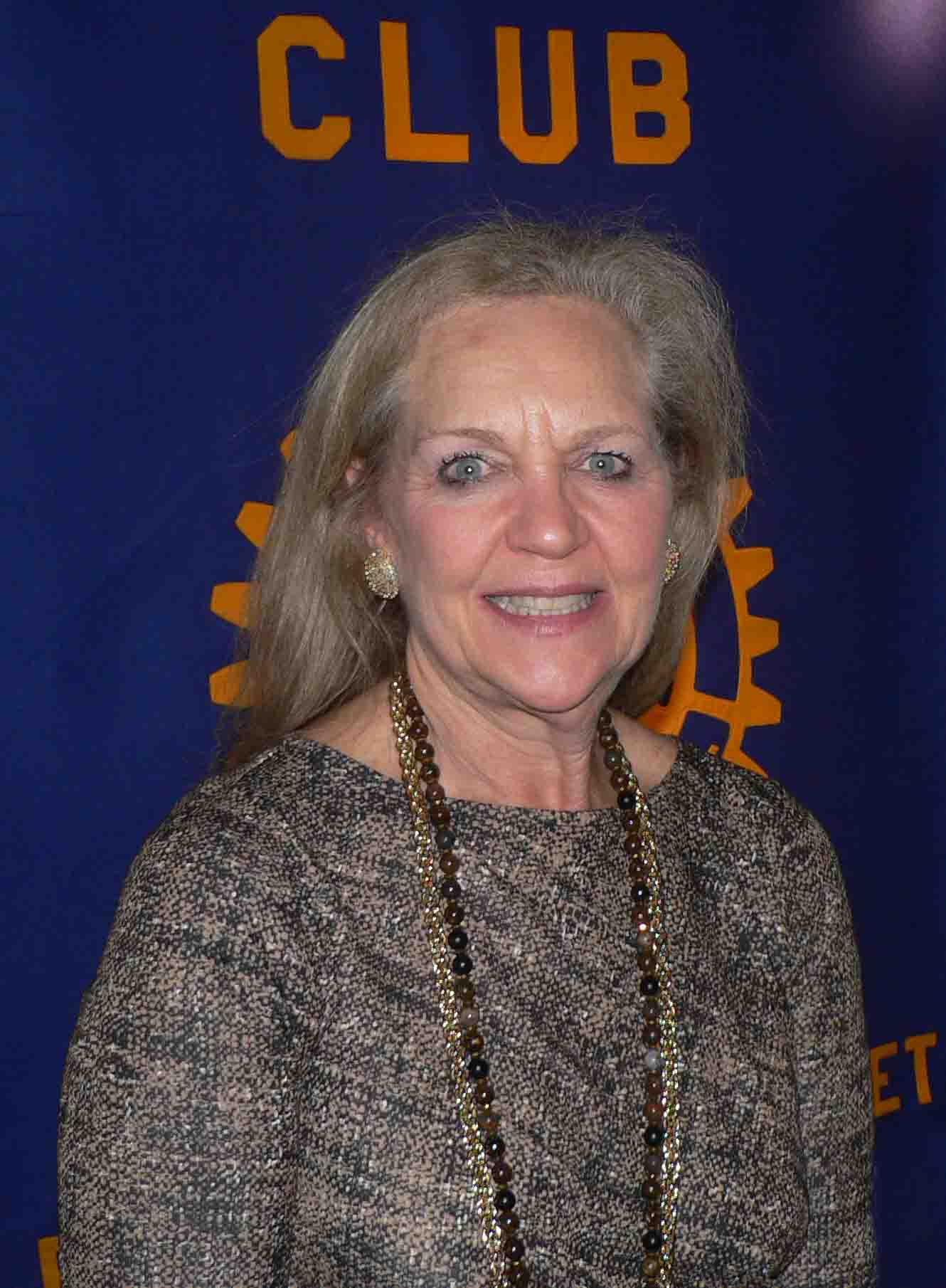
Eileen Hupp, a member of the Palos Verdes Peninsula Rotary Club, has been President & Chief Executive Officer of the Palos Verdes Chamber of Commerce for 3 years. Previously, she was a consultant for business development strategies, and has worked with national retailers for mergers and acquisitions, strategic planning, marketing, advertising and finance. She has Bachelors and Masters degrees from The Johns Hopkins University and an MBA from The University of Chicago. She has been a committed volunteer since high school for a number of community organizations. She lives in Rolling Hills Estates and has three children.
|
Guatemala Humanitarian Trip, Marc Bernard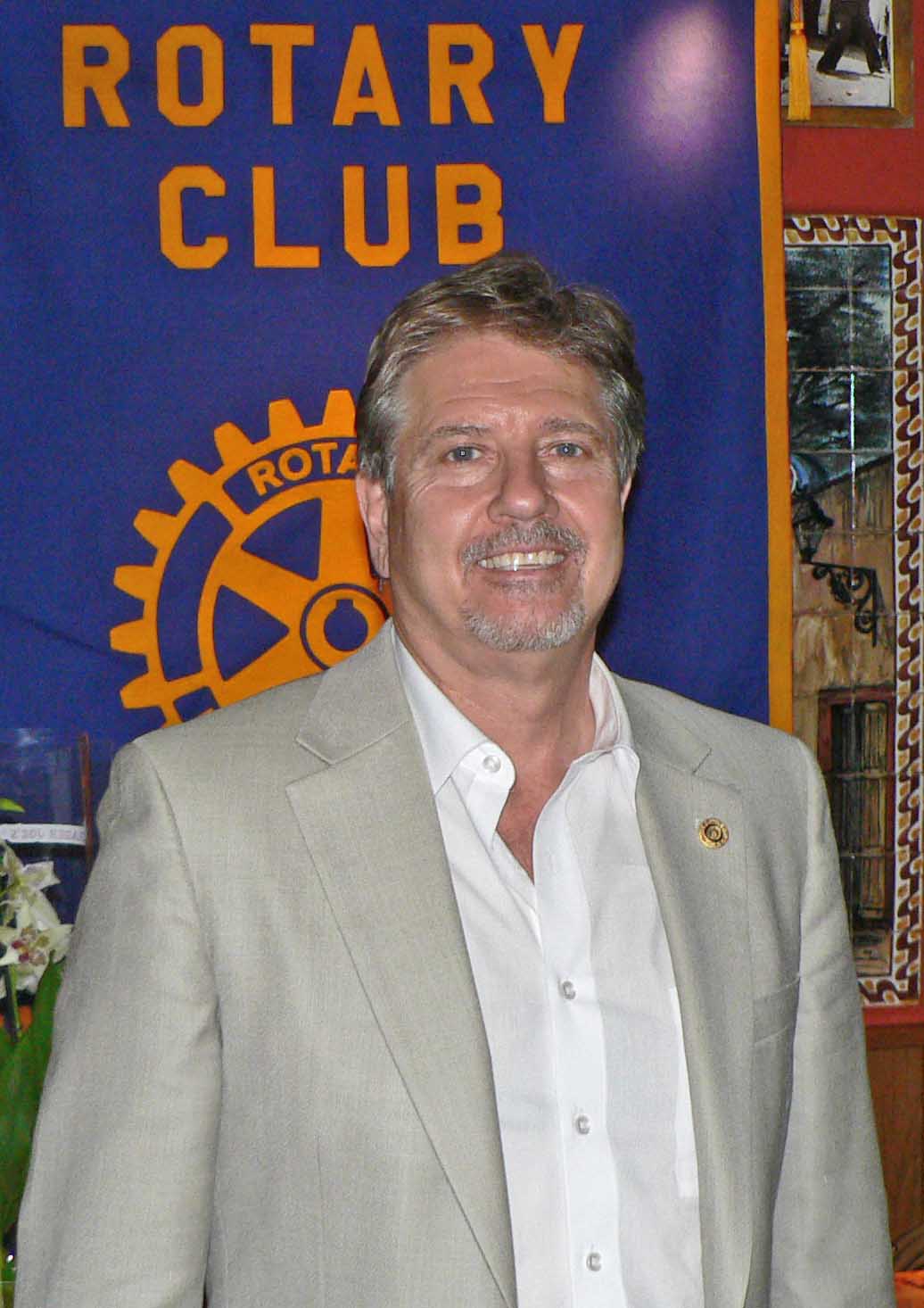
Marc Benard is a member of the Del Amo Torrance Rotary Club, where he is Foundation Chair and Past President. He has been involved in humanitarian projects in Mexico and Central America, where his podiatry group has performed 3000 surgeries on children in the last 37 years.
He reviewed the status of the 6 Global Grants for the pending District trip to Guatemala in February 5-9, totaling about $440,000, assisted by several Rotary Clubs in Guatemala. Some of these grants are not yet fully funded, and the committee is still looking for contributions to allocate as needed.
|
Craft Talk, by Sarah Botkin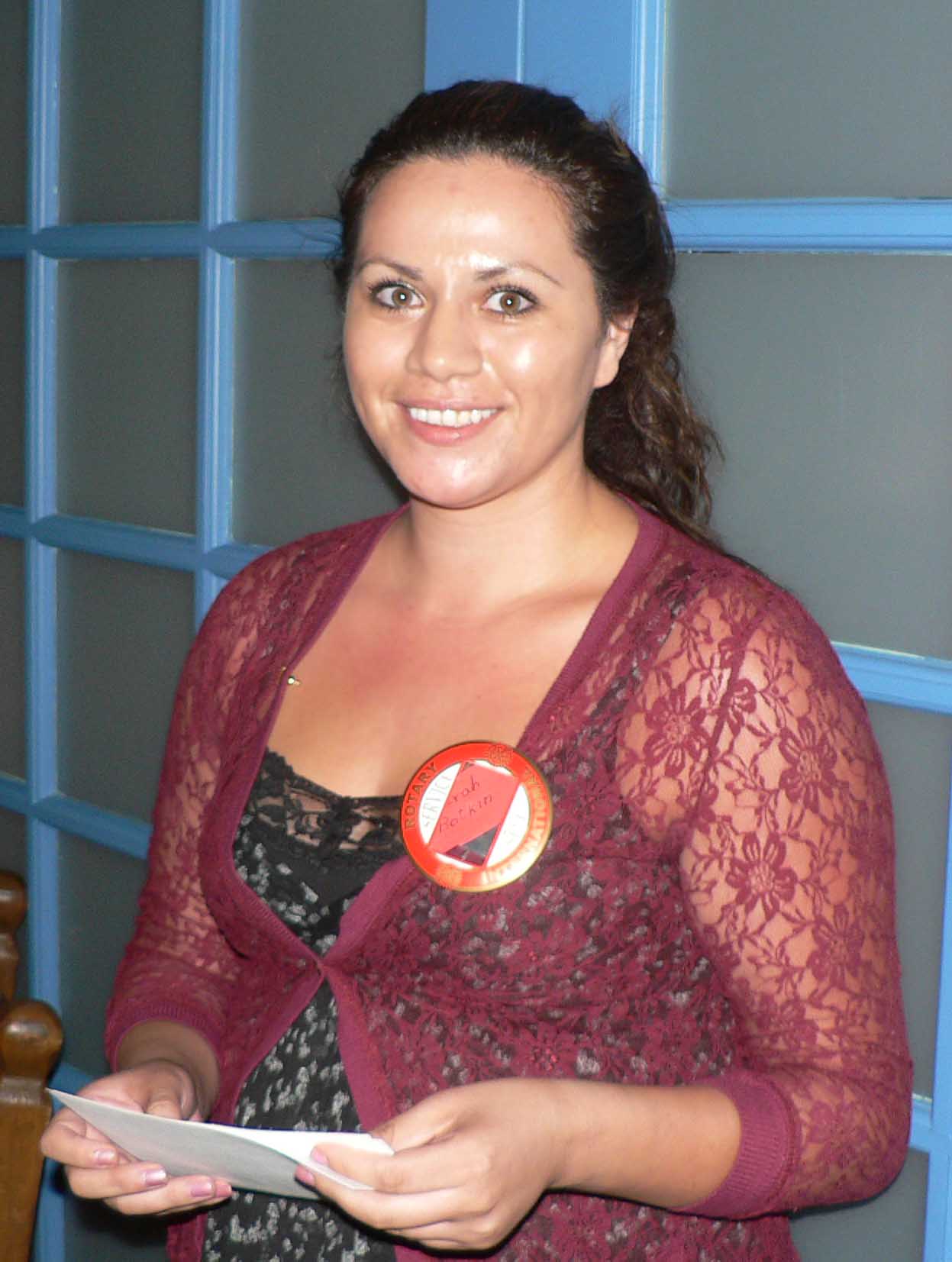
Sarah Botkin, our newest member, was born in Chile and moved with her family to the South Bay where she lived until second grade. Then she moved to Spokane, Washington. She moved again to San Diego, where she attended Torrey Pines High School for two years and then transferred to Mount Carmel High School.
|
Palos Verdes Peninsula Land Conservancy, by Ken Swenson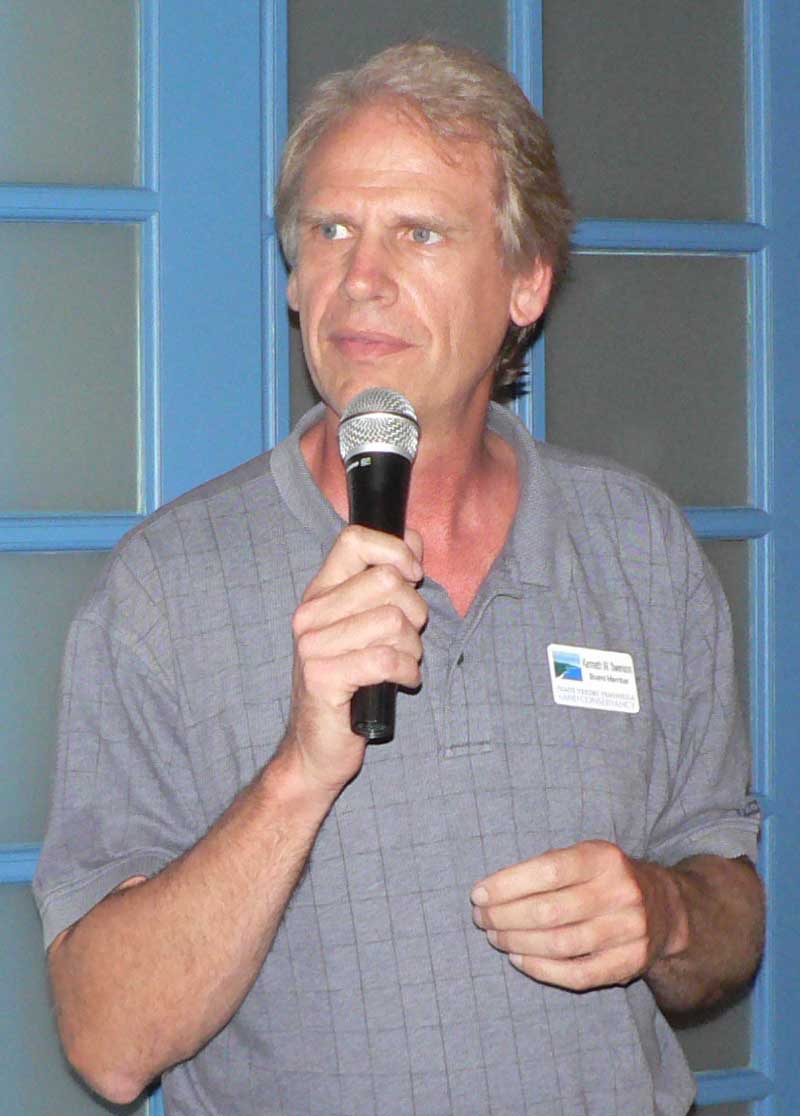
Ken Swenson is the Past Board President of PVPLC. He is a Senior Vice President in the Office of the General Counsel of Bank of America, and has served on the Environmental Law Subsection of the Los Angeles County Bar Association.
The Conservancy was founded in 1988 to preserve undeveloped land as open space on the Palos Verdes Peninsula for historical, educational, ecological, recreational and scenic purposes. Since then it has successfully preserved 1,600 acres. Large blocks of natural open space have been created and maintained for visitors to enjoy peaceful solitude, for children and adults to learn about the natural environment, and for native plants and animals such as the California Gnatcatcher and Palos Verdes Blue butterfly to have opportunity to thrive.
|
Astrid and Jacques Naviaux Recognized as Major Donors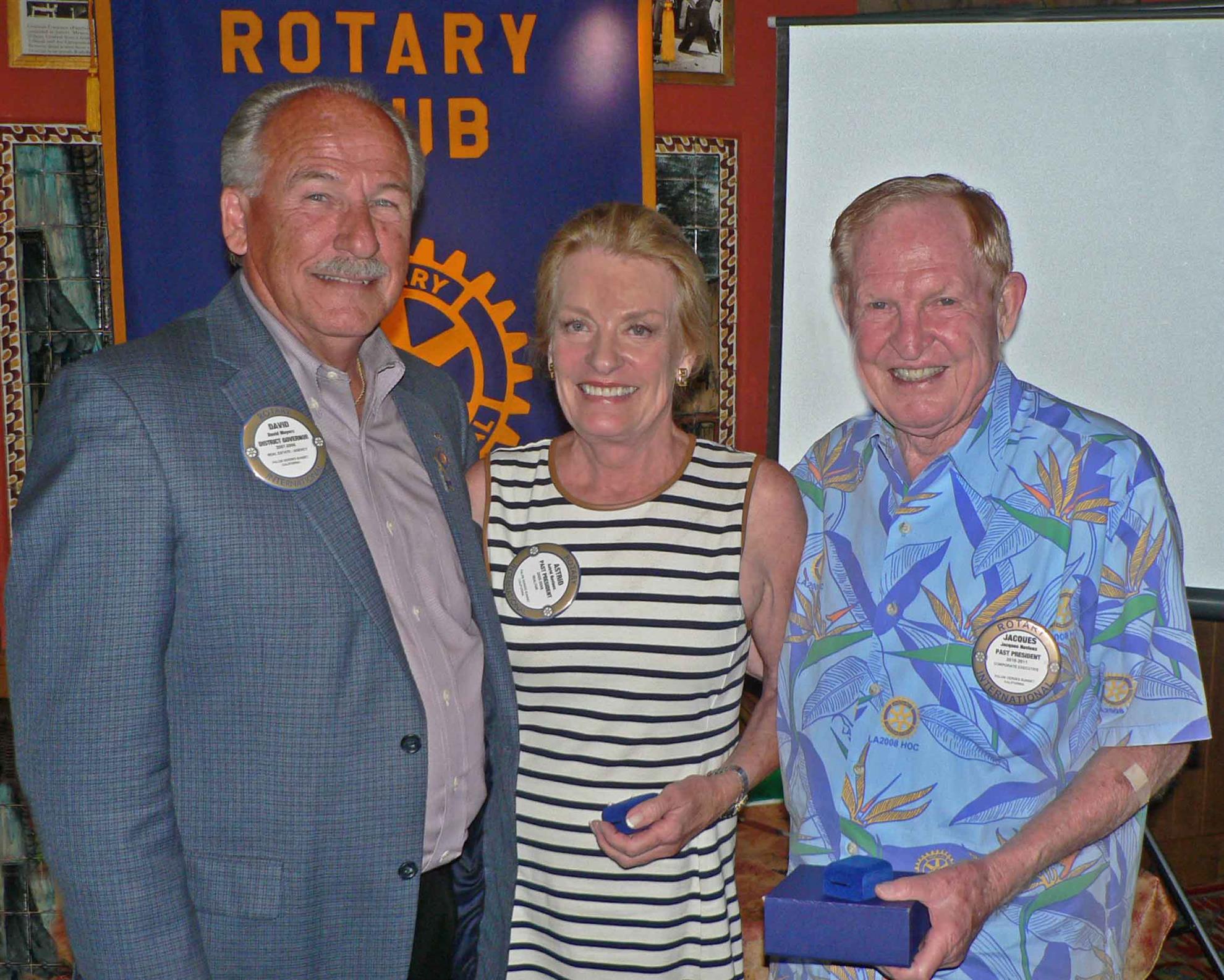 PDG Dave Moyers presented Astrid and Jacques Naviaux with pins with diamonds (First Level Major Donors to the Rotary Foundation), and an engraved crystal memento. Thanks, and congratulations to both of you for your generosity! PDG Dave Moyers presented Astrid and Jacques Naviaux with pins with diamonds (First Level Major Donors to the Rotary Foundation), and an engraved crystal memento. Thanks, and congratulations to both of you for your generosity! |
Peninsula Seniors, by Ann Shaw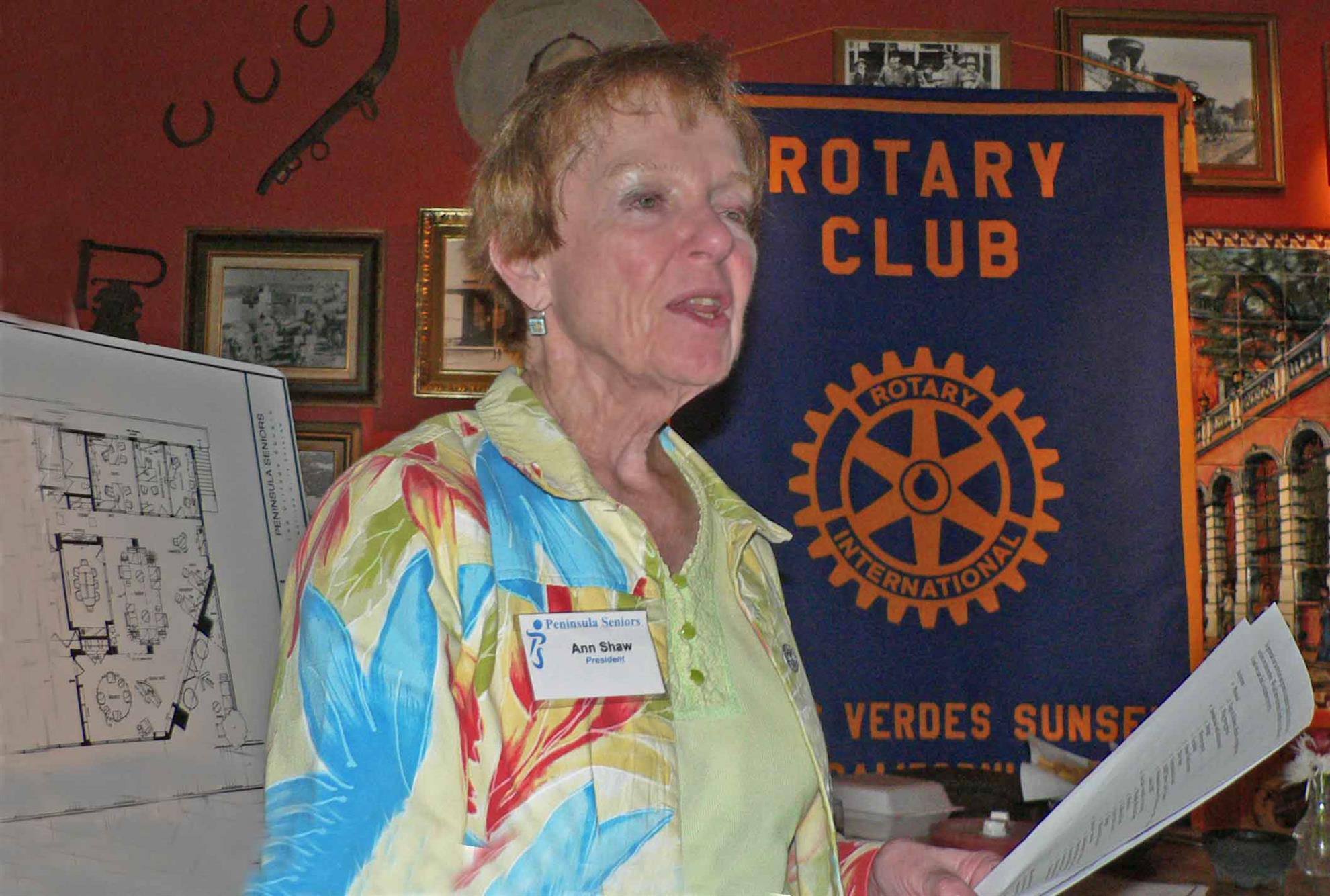
Ann Shaw, Pres of Peninsula Seniors, has been a Member of its Board since 1999. She was a member of the Rancho Palos Verdes incorporation steering committee 1968-1973, and was an RPV Council Member 1977-1983, serving as Mayor 1979-1980. She is affiliated with the League of Women Voters, American Association of University Women, and was a TaxAide coordinator for AARP. She worked on cryptanalysis and computer programming for the National Security Agency 1957-1960, and then worked in private industry until becoming a self-employed Certified Financial Planner in 1994.
|
Senior Scam Awareness Outreach, by John W. Green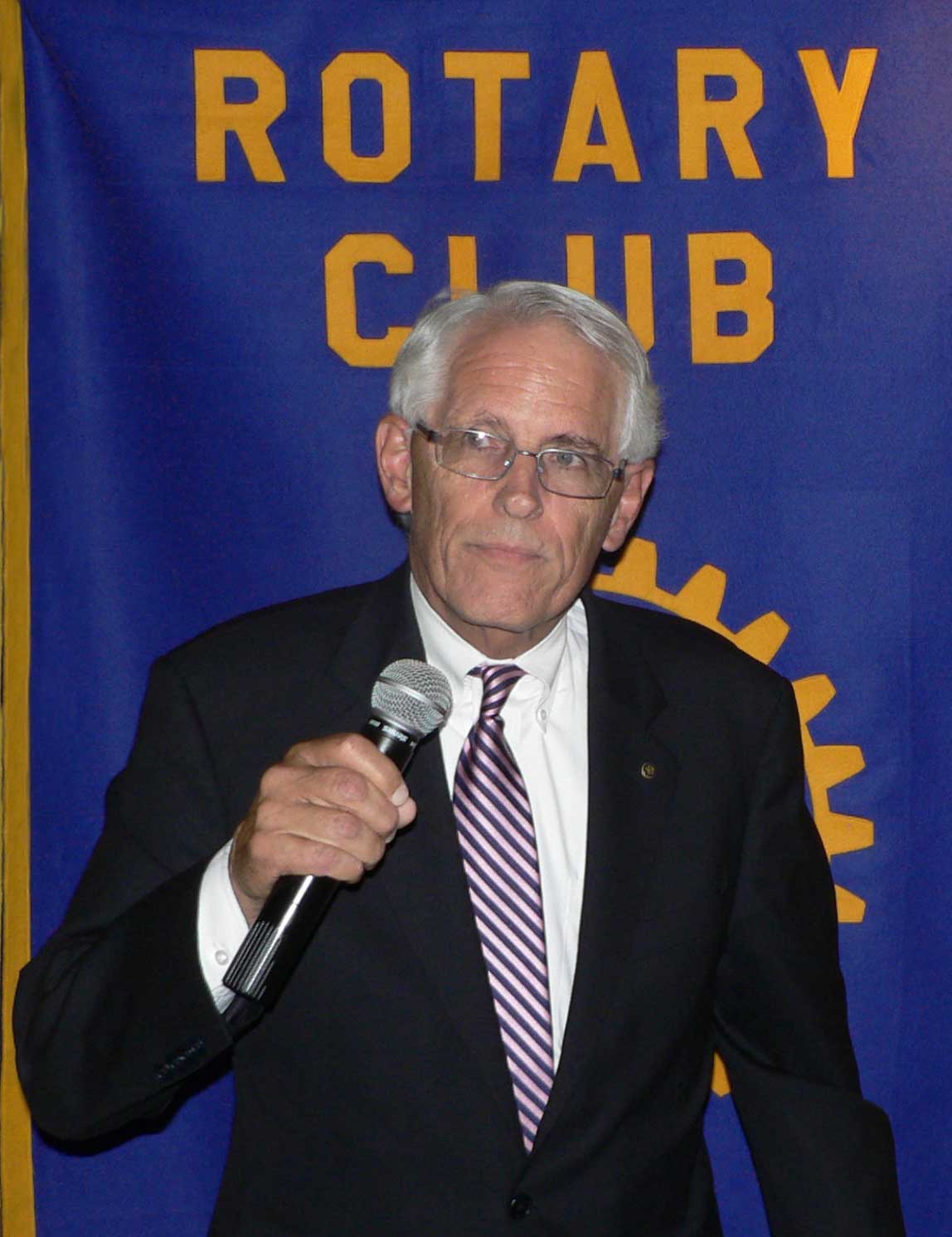
John W Green is a retired Commissioner from the Los Angeles Superior Court. Previously, he worked as a deputy district attorney, did civil litigation, and was an in-house counsel for State Farm insurance. He graduated from Stanford University, served in the Peace Corps in Thailand, and graduated from Santa Clara University School of Law. He works for the Center for Effective Dispute Resolution Services in Los Angeles, and is a member of the LA5 Rotary Club. |
Offsite Beach Party at the Portuguese Bend Club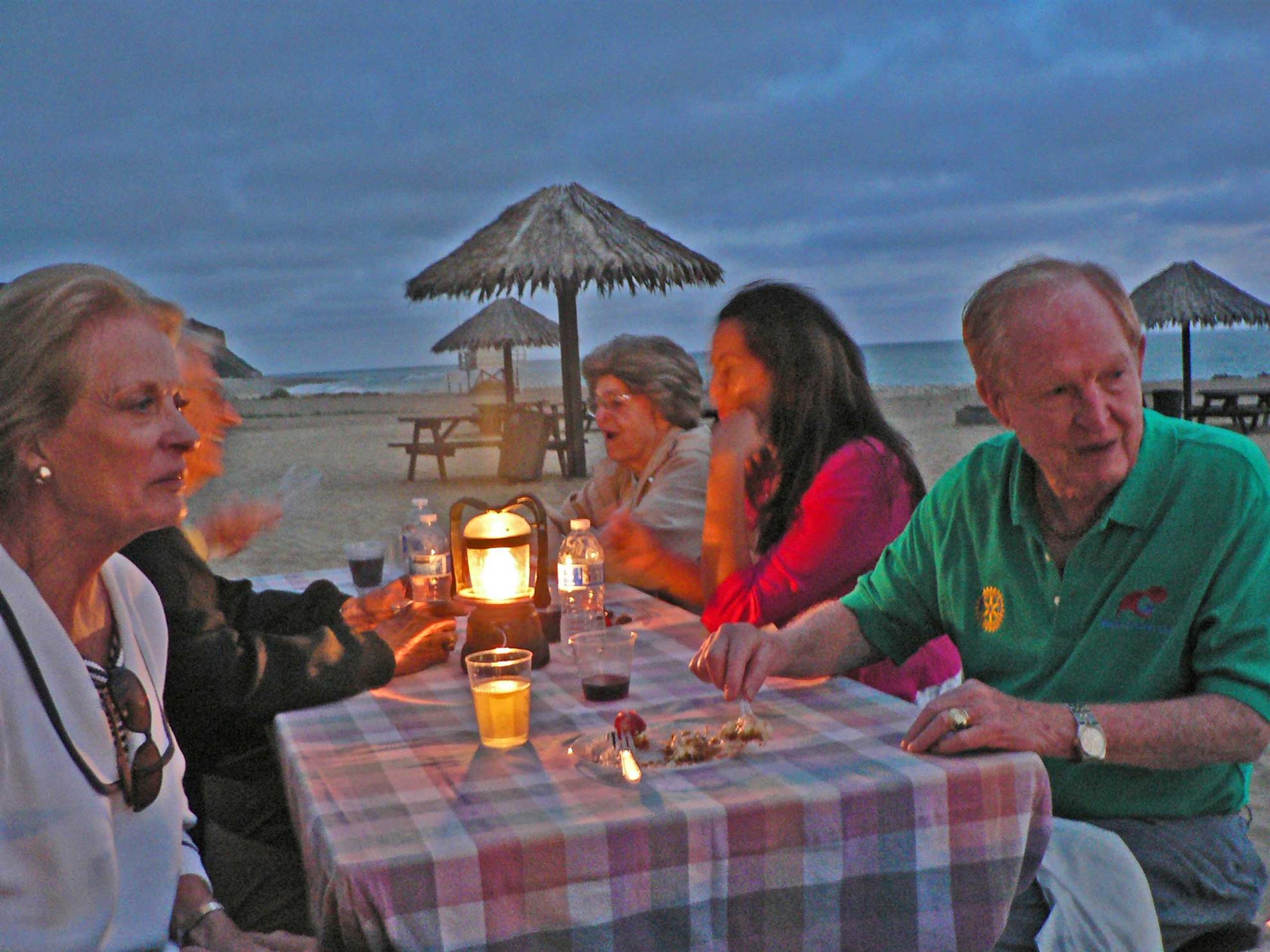 
The pelicans and gulls presented a display of their aviation skills. The pelicans were diving into the water for seafood hors oeuvres. After being shuttled down to the beach by 2 of Ralph Black’s grandchildren, we gathered at the group of palapas for socializing and wine. Jeff and his assistant prepared barbecued dinner, including Frisbee-sized hamburgers, dogs, salad & dessert, as the sun set among low-lying clouds on the horizon.
Our thanks to Ralph Black for arranging our Club’s off-site social evening here. He delivered a brief history of the Portuguese Bend Club and its residents and members. Portuguese Bend gets its name from Portuguese whalemen from the Azores, who built a shore station here in the 1860s to process whale oil from gray whales caught on their annual coastal migration.
|
PDG Rick Mendoza, Scuba Diving Experiences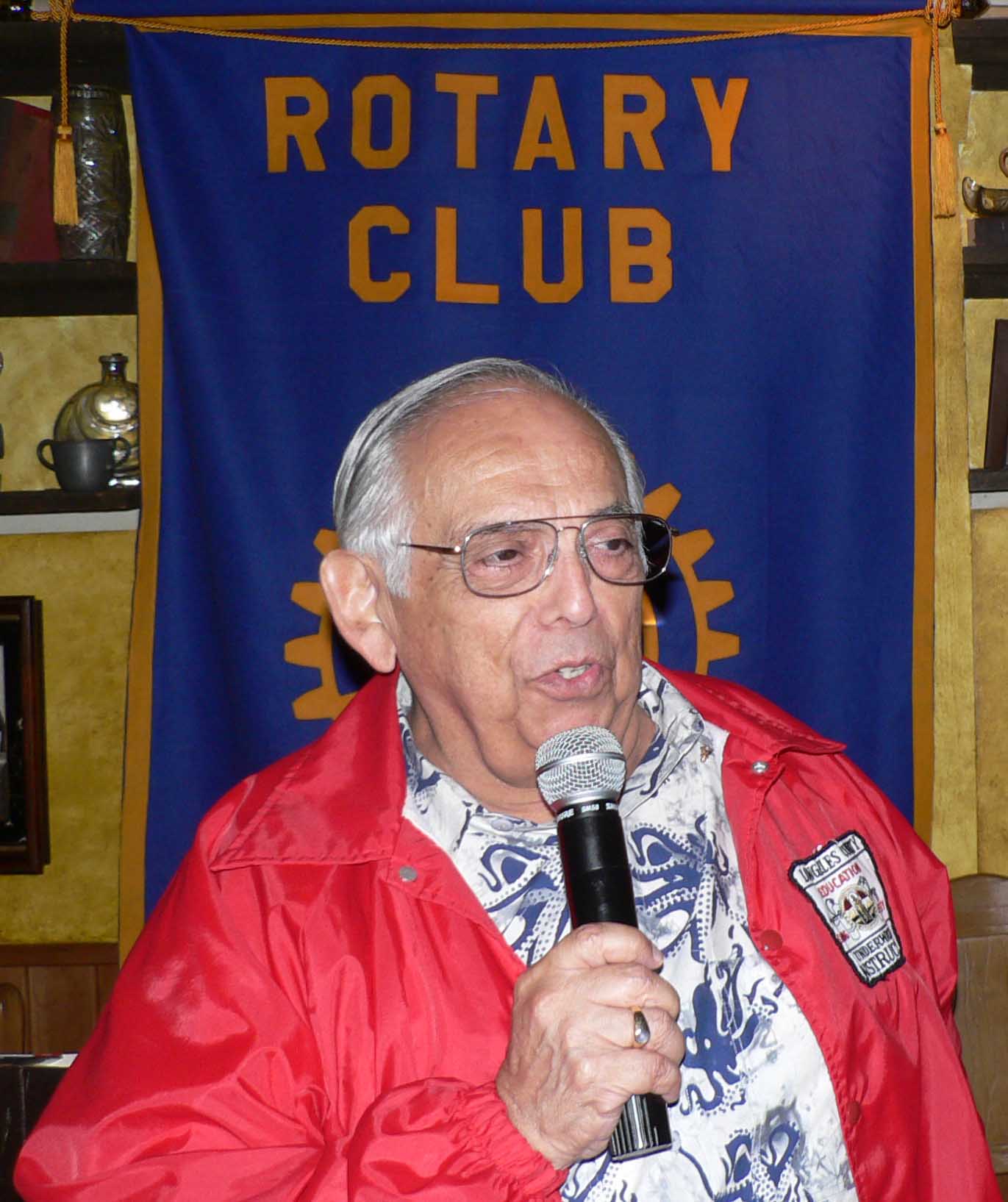
PDG Rick Mendoza (2002-2003), of the Redondo Beach Rotary Club, has been a travel agent for many years, and is also a Certified Underwater Instructor (wearing his red instructor’s jacket). He was introduced tonight by Bob Welbourn, an experienced SCUBA diver in our Club.
Rick showed a series of slides of underwater photos he has taken in the South Pacific and elsewhere. He showed close-up underwater photos of many kinds of tropical fish, lobsters (including an 11-pounder), moray eels, rays, groupers, many kinds of coral, sea squirts, sponges, nudibranchs, urchins, anemones, starfish and a turtle. The clarity of the water was striking.
|
SpaceX, by John Federspiel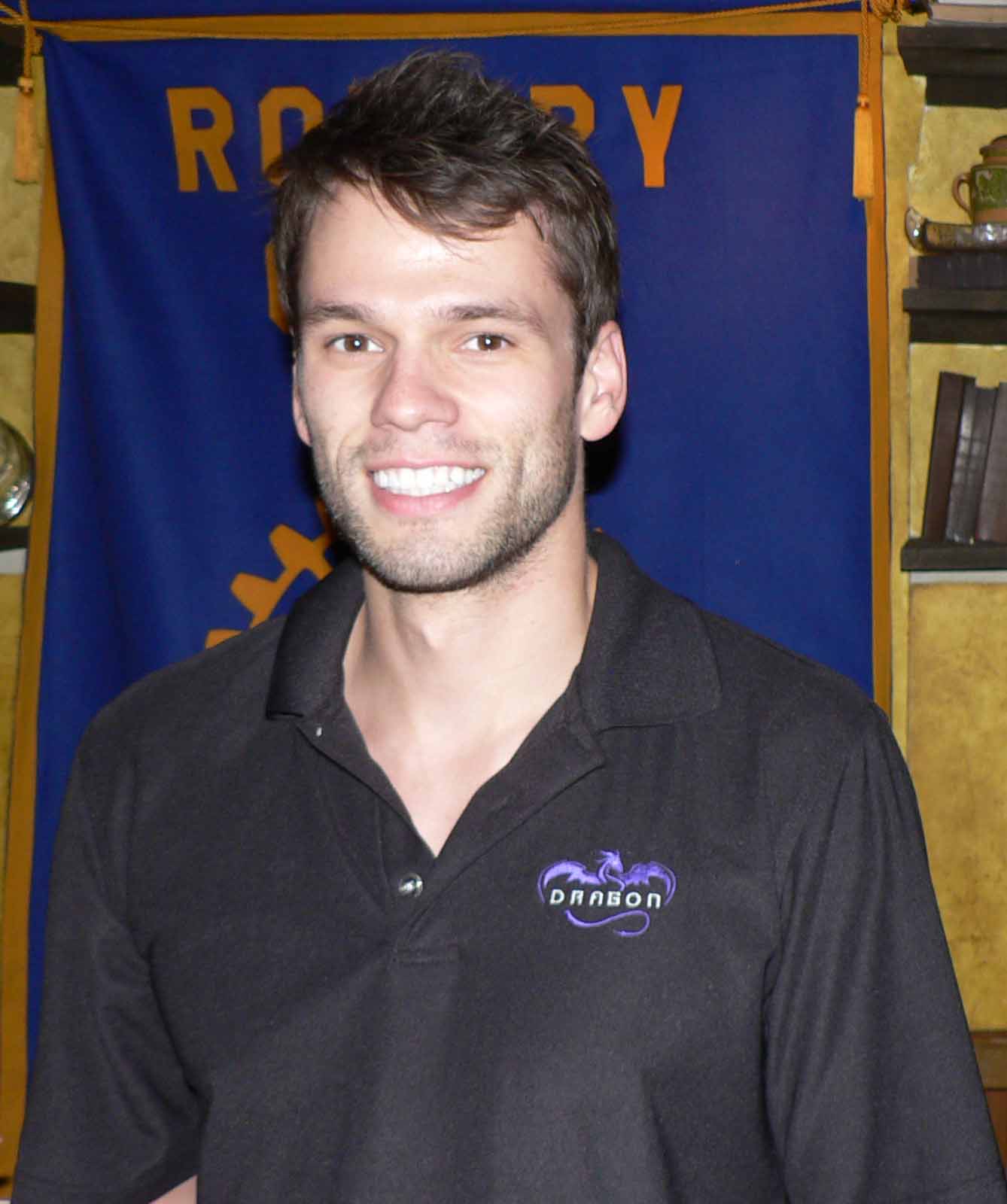
John Federspiel is a lead mechanical engineer for SpaceX (Space Exploration Technologies Corporation). (SpaceX hosted a tour for last year’s 4-H Club Rocketeers.) SpaceX was founded in 2002 by former PayPal entrepreneur and Tesla Motors CEO Elon Musk to design, produce and oper-ate reliable low-cost transportation of cargo and crew to and from low Earth orbit and to enable the colonization of Mars. He invested $100 million and recruited other investors.
Space technology today is about the same as 40 years ago except for better electronics. SpaceX has developed 5 rocket engines, 3 launch vehicles and one reusable multipurpose space-craft. It has contracted with NASA to help support the International Space Station (ISS) so the US does not need to rely only on Russia to do this. SpaceX is the first private company to produce a liquid-fueled rocket (Falcon 1) to reach orbit (2008), to successfully launch (by Falcon 9), orbit and recover a spacecraft (Dragon) (2010), to send a spacecraft (Dragon) to the International Space Station (2012), and to send a satellite into geosynchronous orbit (December 2013).
|
Nigerian Rotary Youth Exchange Student John Jegede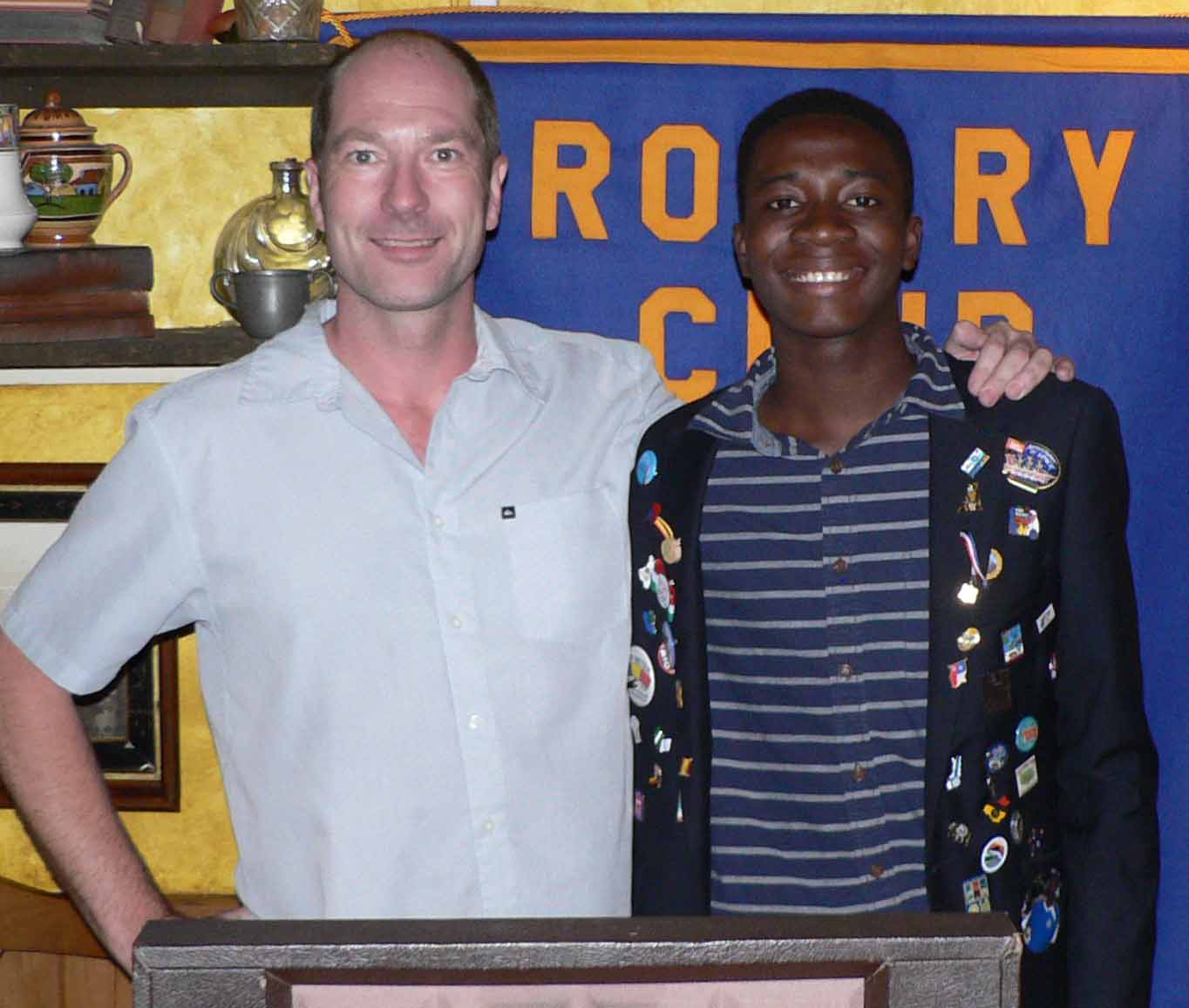
John Jegede was introduced by his sponsor, Roger Cox of the Manhattan Beach Rotary Club. John is nearing the end of his Rotary Youth Exchange in the US, and will be returning to his home in Nigeria this week. John has been attending Mira Costa High School, participated in choir, and attended the prom. He has also been active in soccer and enjoys playing drums.
John presented a slide show outlining his impressions, experiences, and home background and family life. He was sponsored by the Rotary Club of Ewutuntun and District 9110 in Lagos, Nigeria. He attends Livingstone College there, (equivalent to high school), and discussed a typical school day structure there. He enjoys math and biology, and would like to become a physician. He lives in the Yoruba area of Nigeria. The main industry is agriculture, producing cocoa, yams and other food products, as well as oil. He reviewed the history of Nigeria, from British colonial times to independence, wars, and military rule interspersed with democratic government.
|
Sarah Botkin Inducted into Rotary Membership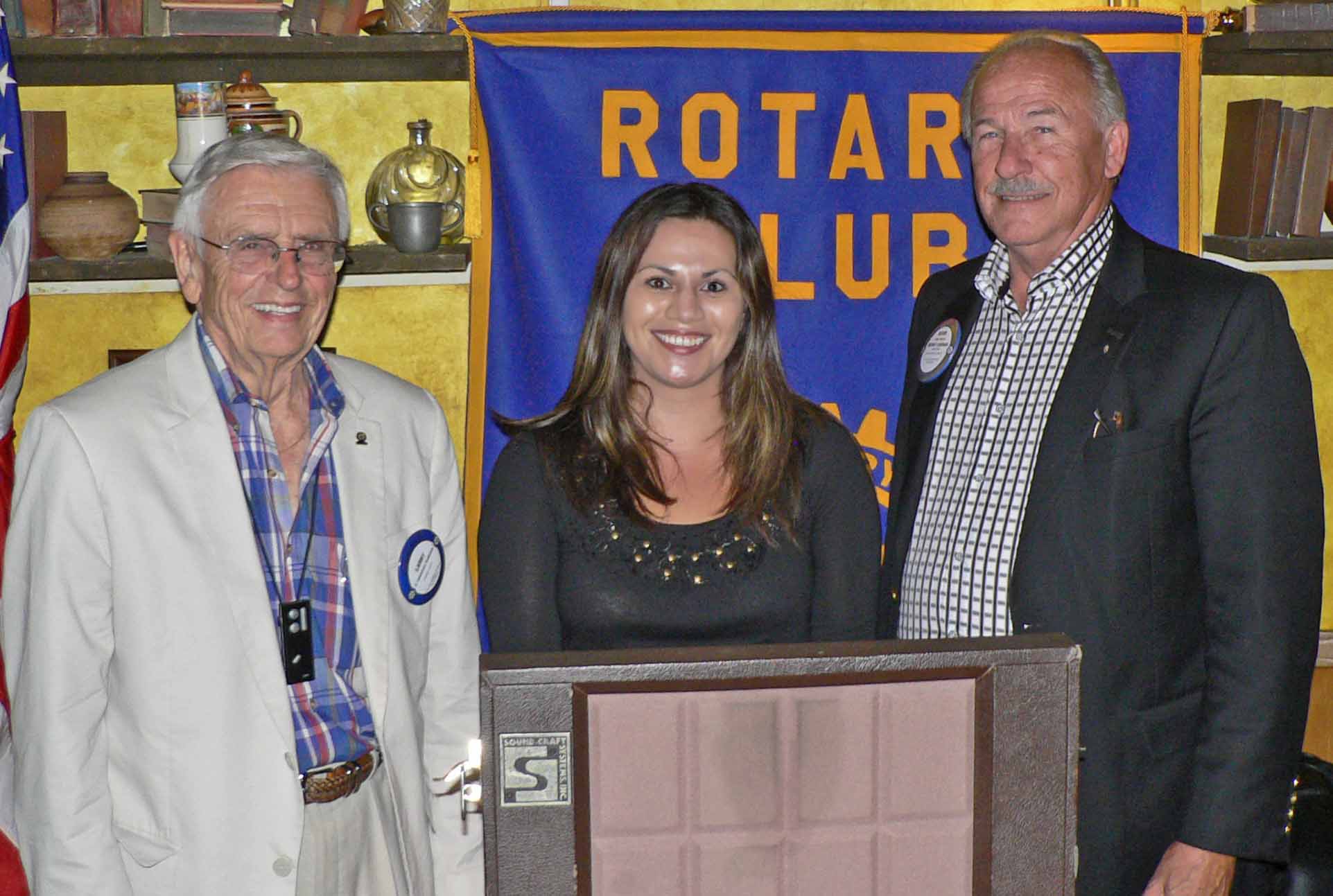 Sarah Botkin was inducted into Rotary membership in our Club, by PDG Dave Moyers. She was sponsored by Membership Chair Larry Andrews. (She has already volunteered for several of our Club service activities.) Congratulations, Sarah, and welcome to our Club! Sarah Botkin was inducted into Rotary membership in our Club, by PDG Dave Moyers. She was sponsored by Membership Chair Larry Andrews. (She has already volunteered for several of our Club service activities.) Congratulations, Sarah, and welcome to our Club! |
Club Assembly (Planning for This Rotary Year)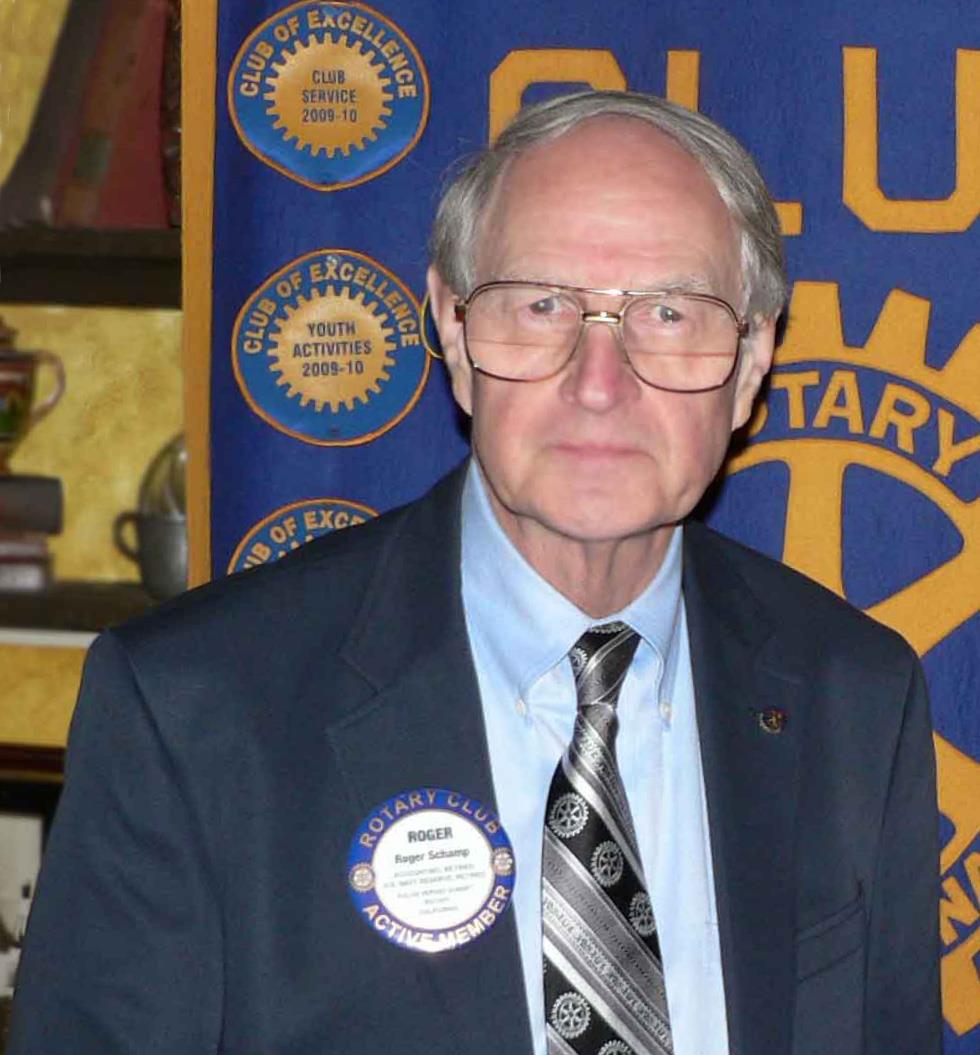
Pres Roger Schamp reviewed the results of the Club member preference survey he conducted recently, and he thanked the members who submitted replies. These included preferences for planning offsite meetings. We will have 2 Club Assemblies this Rotary year.
Ralph Black is arranging for an offsite Beach Party for our Club at the Portuguese Bend Club on Tuesday, August 12. Please sign up for food planning.
Roger suggested several grant opportunities for this year. We may consider being the Lead Club in one of the Humanitarian Grants (we have not led one of these events in the past). He encouraged us again to consider going on the District Global Grant Humanitarian Trip to Guatemala in February, which he and his spouse, Carol, have signed up for.
|
Demotion Dinner at Palos Verdes Golf Club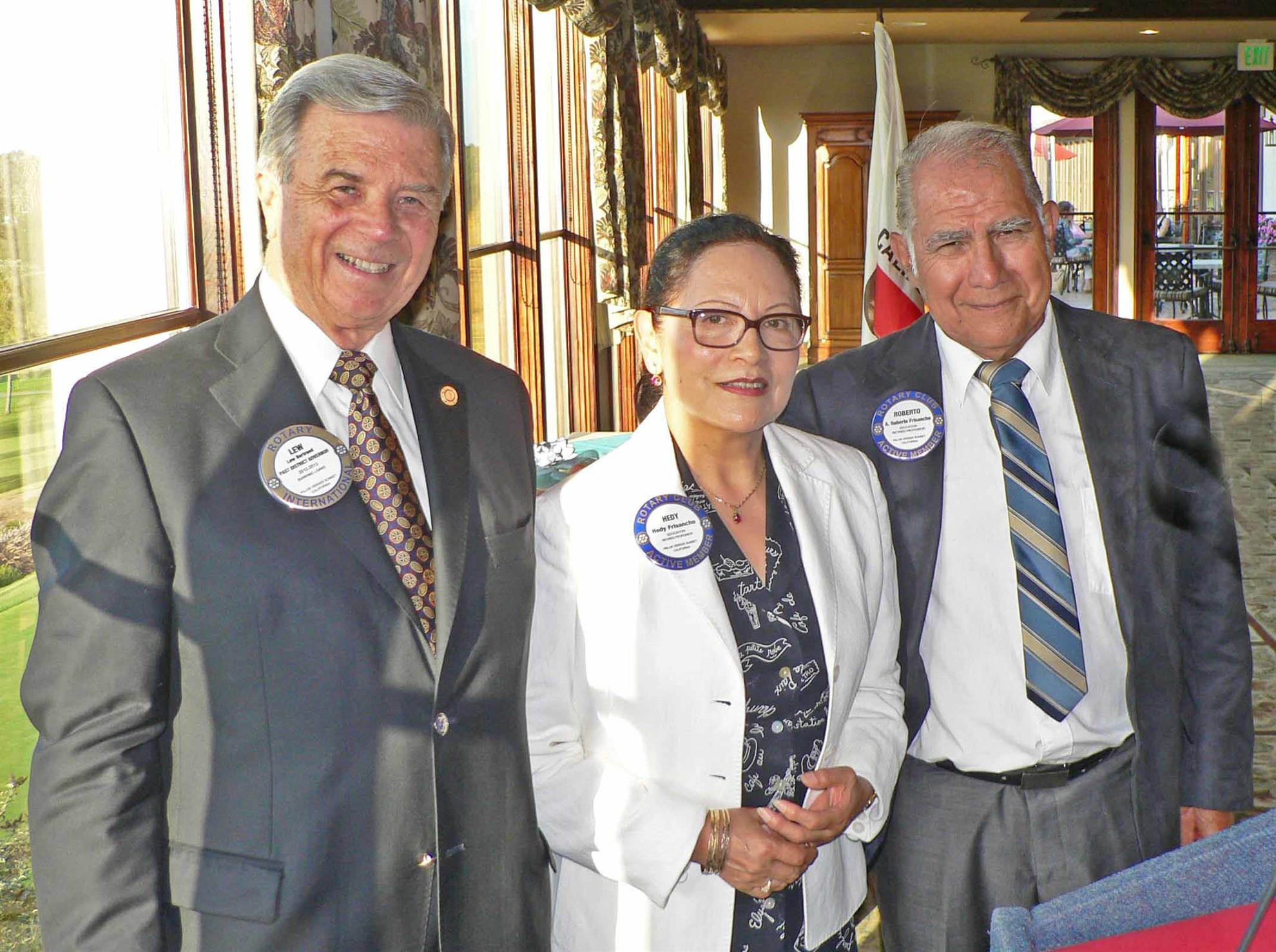 PDG Lew Bertrand conducted an Induction Ceremony for our newest members, Hedy & Roberto Frisancho (former faculty at U of Michigan). Congratulations, and welcome to the Club!
After dinner was served, Past-President John Turner demonstrated (voluntarily, we presume) his mastery on playing the Ukelele. We were so impressed that we may enter him into next year’s Student Music Contest.
Club Service Chair Jerry Farrell Presented PV Sunset’s 2013-14 Ruth Kain Rotarian of the Year Award to Newsletter Editor Wes Bradford, apparently for all those years of publishing the Palos Verdes Sunsetter newsletter that some of us read (“Most of the Truth, Most of the Time!”). After verifying that some mistake had not been made, he expressed his sincere appreciation to the Club members. A $250 donation to the Rotary Foundation was made in his name.
|
Vision to Learn, by Nora MacLellan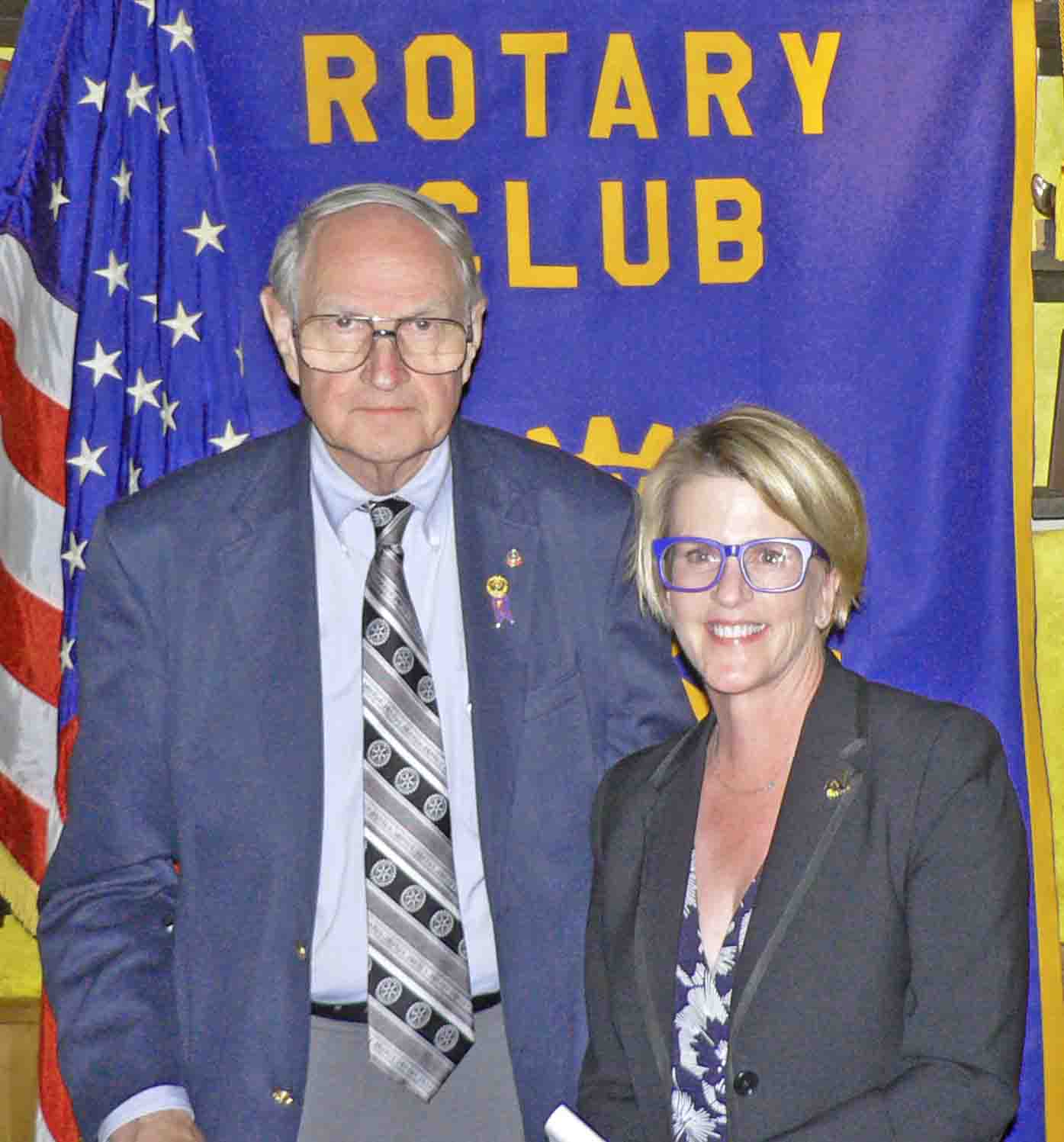 Nora MacLellan is a member of the Westchester Rotary Club, which obtained a Rotary Foundation grant to support this project.
Vision to Learn was founded in 2012 in Los Angeles to address the problem of schoolchildren needing glasses who are unable to see the board, read a book, study math or participate in class. Most of these are low income and minorities who lack access to medical care and vision care. Vision to Learn has screened 120,000 children in Los Angeles and Sacramento, providing 20,000 with eye exams and 16,000 with free glasses and frames. If you can’t see, you can’t learn.
|
Don Reeves, 4-H Club Grant Report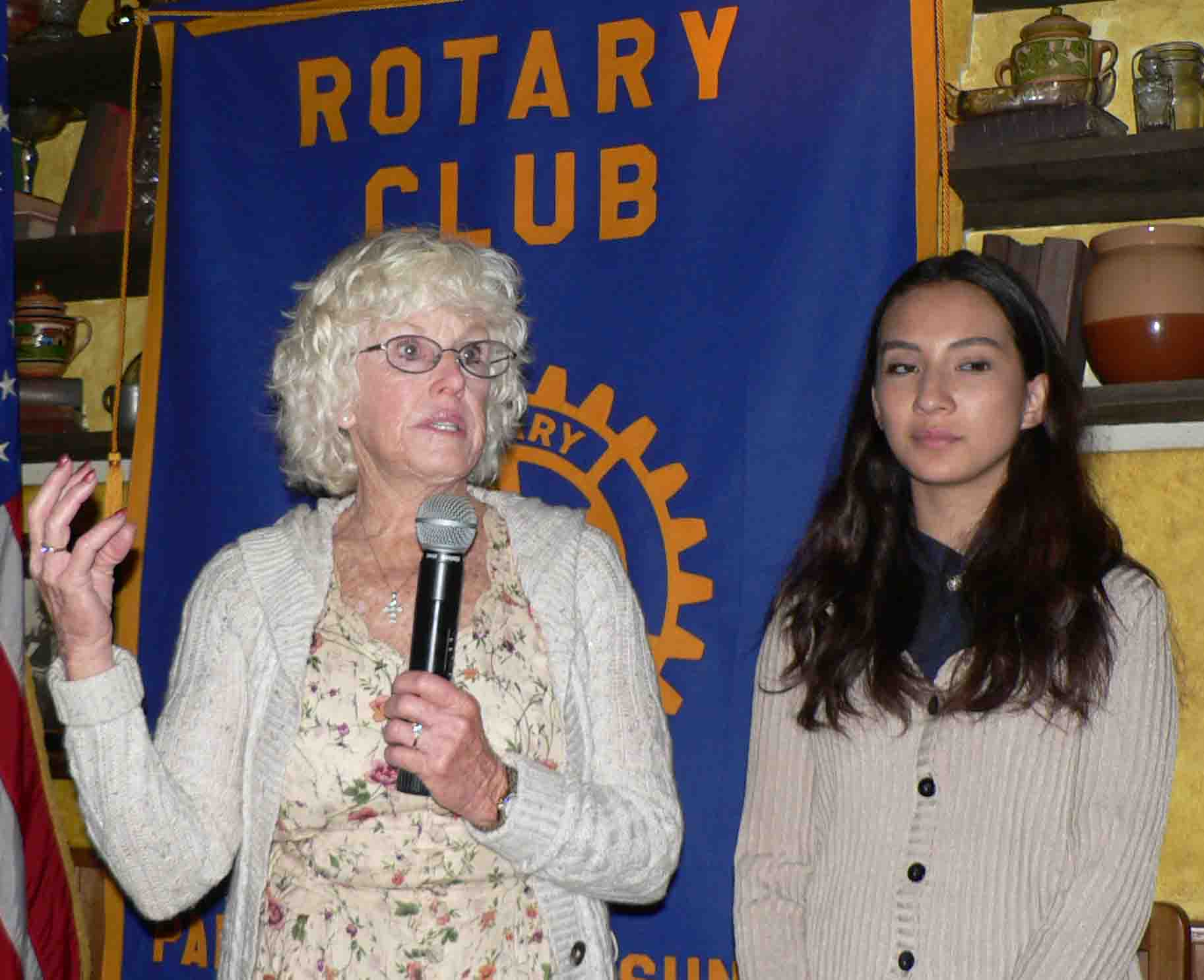 Don Reeves reviewed how our Rotary District Community Grant is helping to fund our Palos Verdes 4-H Club projects. We have participated in 3 of these projects, to be presented tonight.
Dee Keese discussed the history of the 4-H Clubs, the oldest youth organization in the US. They started from the Land Grants to fund new state colleges under the Lincoln administration. Information for agricultural development was presented, but farmers were resistant to trying new ways, such as crop rotation. This concept became a 4-H Club demonstration project, which was successful and influenced a new generation of farmers. Now, there are many more types of projects, not necessarily related to agriculture. The Palos Verdes 4-H Club started in 1953 and has 130 children participating. Over 30 projects were presented at a fair, in which they won 31 out of 37 awards.
|
PV Sunset 25th Anniversary Celebration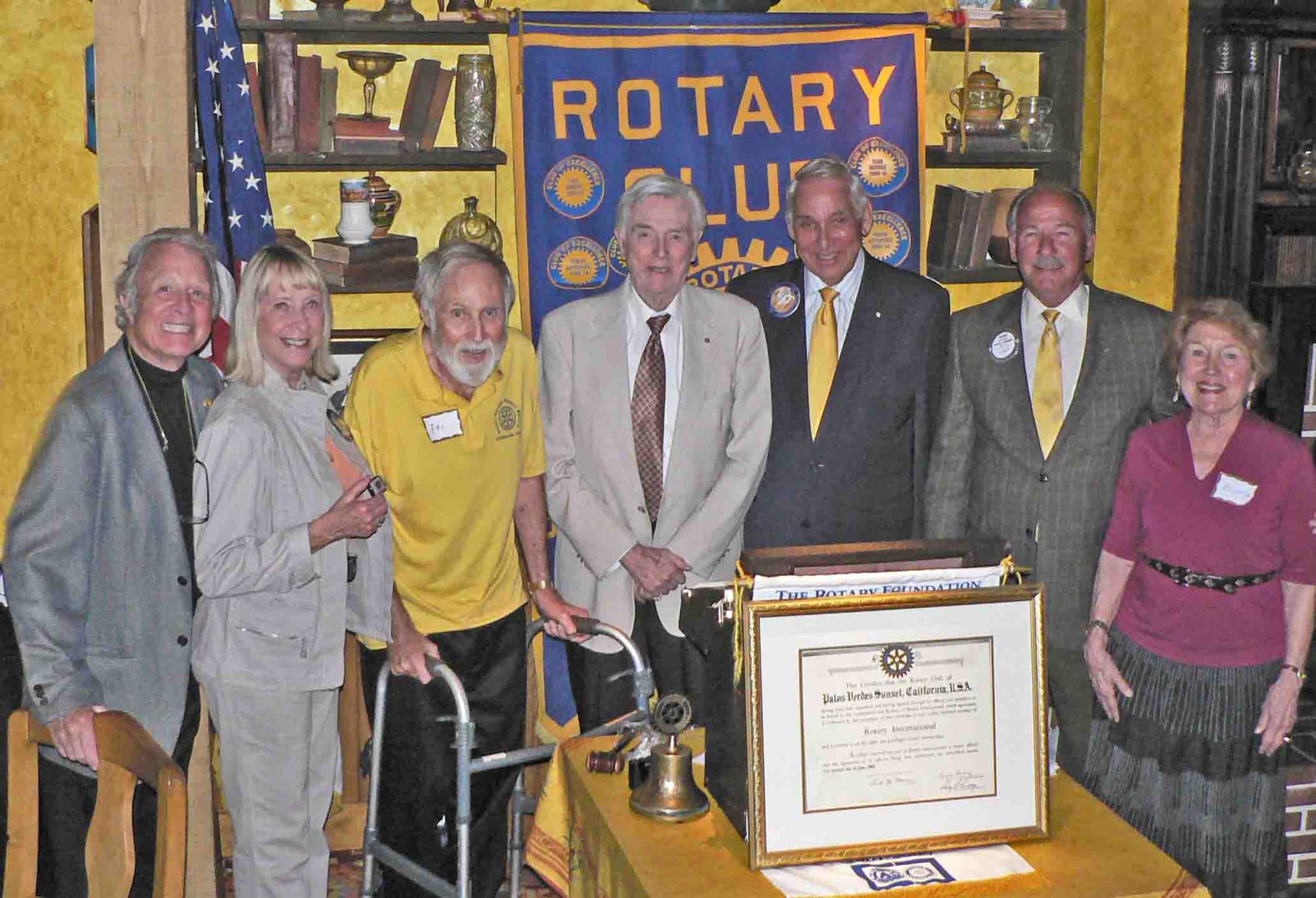
The house was packed with guests & past members for the 25th birthday of our Club (6/7/’89). We socialized, reminisced about old adventures & projects, toasted with champagne, dined, and finished up with the birthday cake after it was displayed precariously for photos by founding member Bob McCaman.
Founding members included the crew below: Jim Gamble, Marylyn Ginsburg Klaus, Erv Samuelson (master member-recruiter), Bob McCaman, Founding President Bob Welbourn, PDG Dave Moyers, and Alberta Samuelson.
|
Medicare Fraud, by Susan Menkes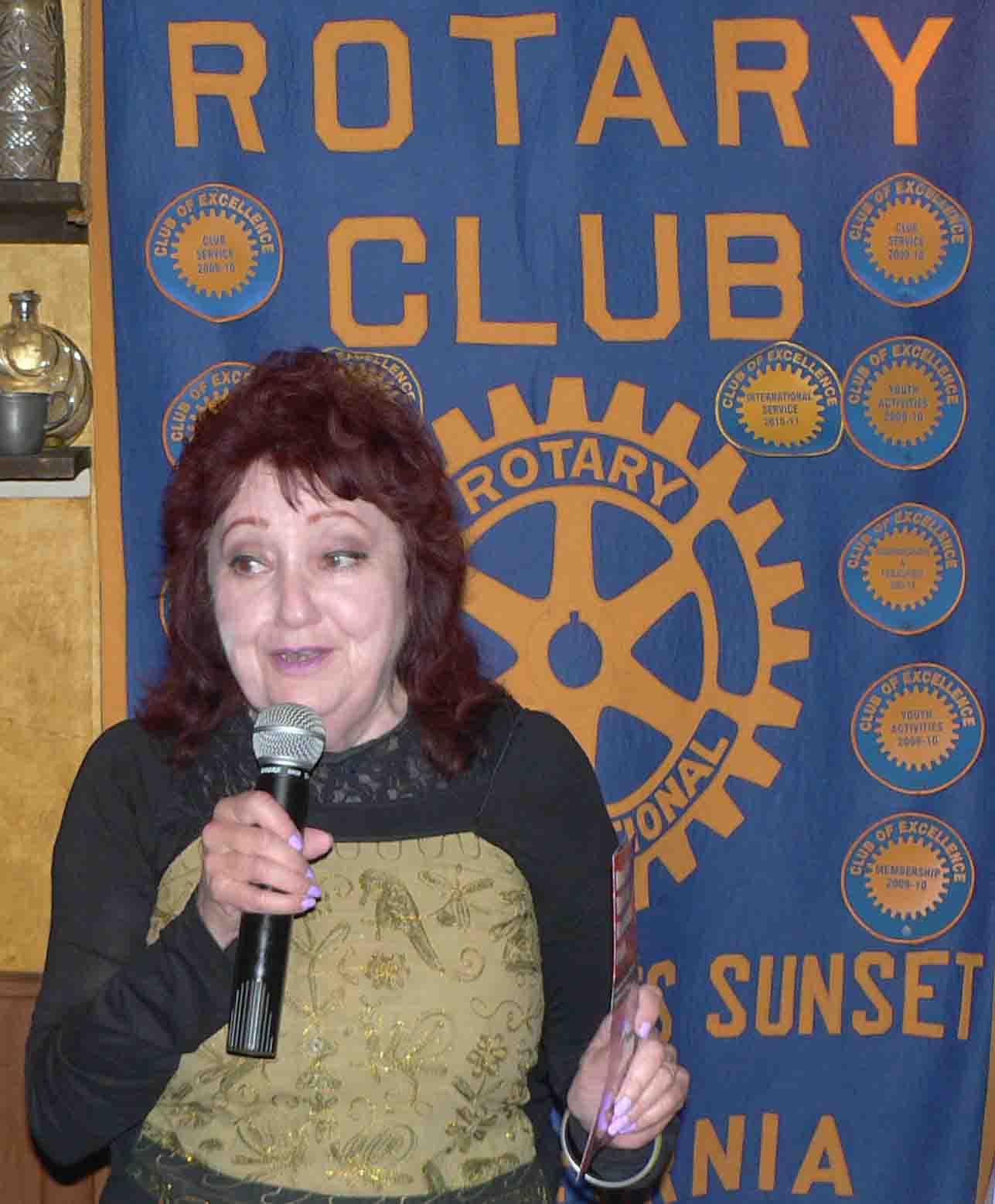
Susan Menkes works with the Senior Medicare Patrol (SMP) programs, staffed by senior volunteers and professionals who help Medicare and Medicaid (MediCal) beneficiaries become better health care consumers. These programs are supported by The National Consumer Protection Technical Resource Center created in 2003 with funding from the US government. Susan discussed the dangers facing seniors from healthcare fraud perpetrated by scam artists purporting to be Medicare representatives.
|
Home Boy Industries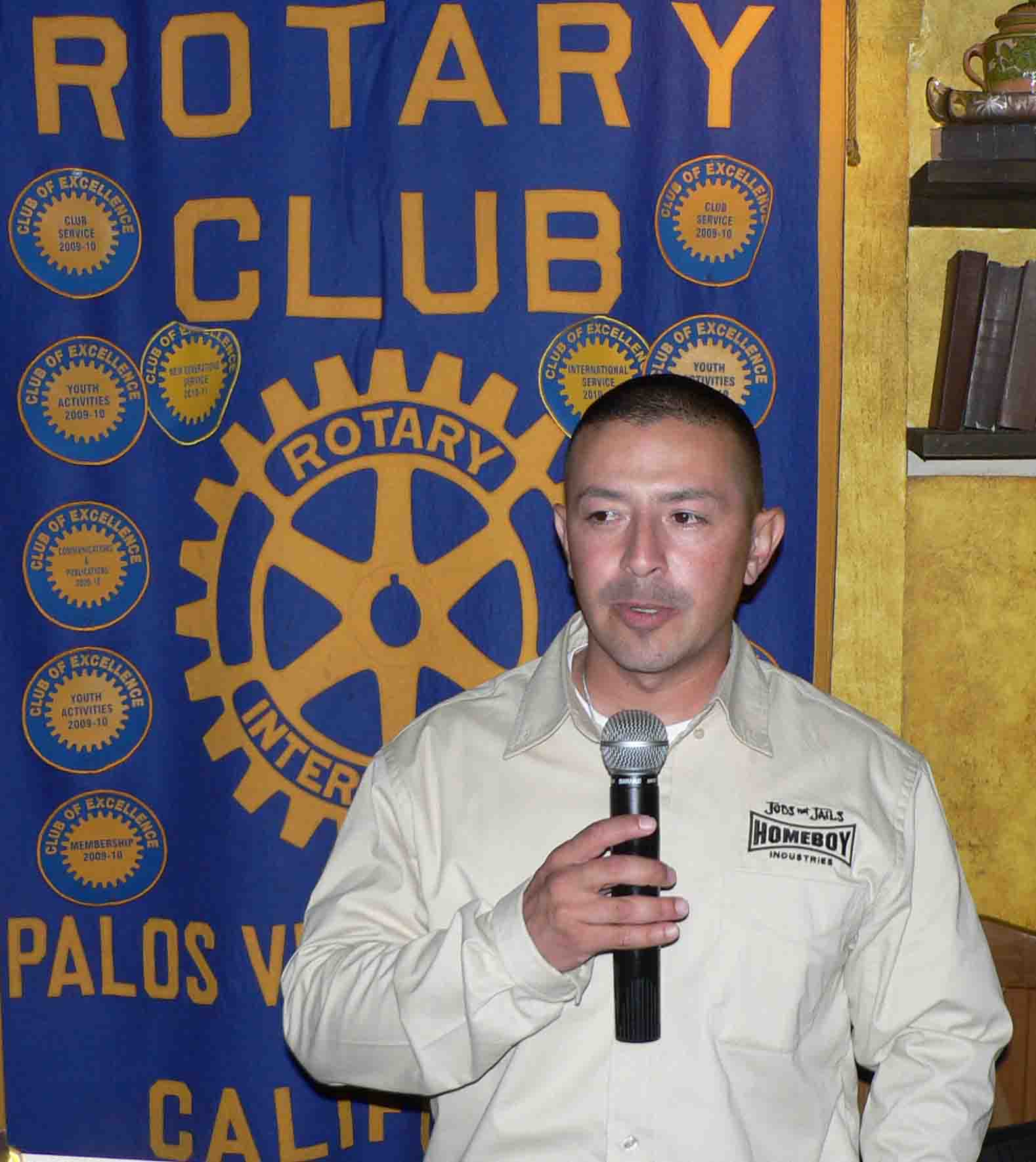
Steve Avalos, of Homeboy Industries, presented its history and its role in rehabilitating people released from incarceration, and training them for productive occupations. Homeboy Industries was begun in 1988 as a job training program by Father Greg Boyle, SJ, of the Dolores Mission Parish in Los Angeles, as an alternative to gang life for high-risk youth. He found sympathetic businesses willing to hire former gang members.
|
Offsite, Project EGO Banquet, Norris Pavilion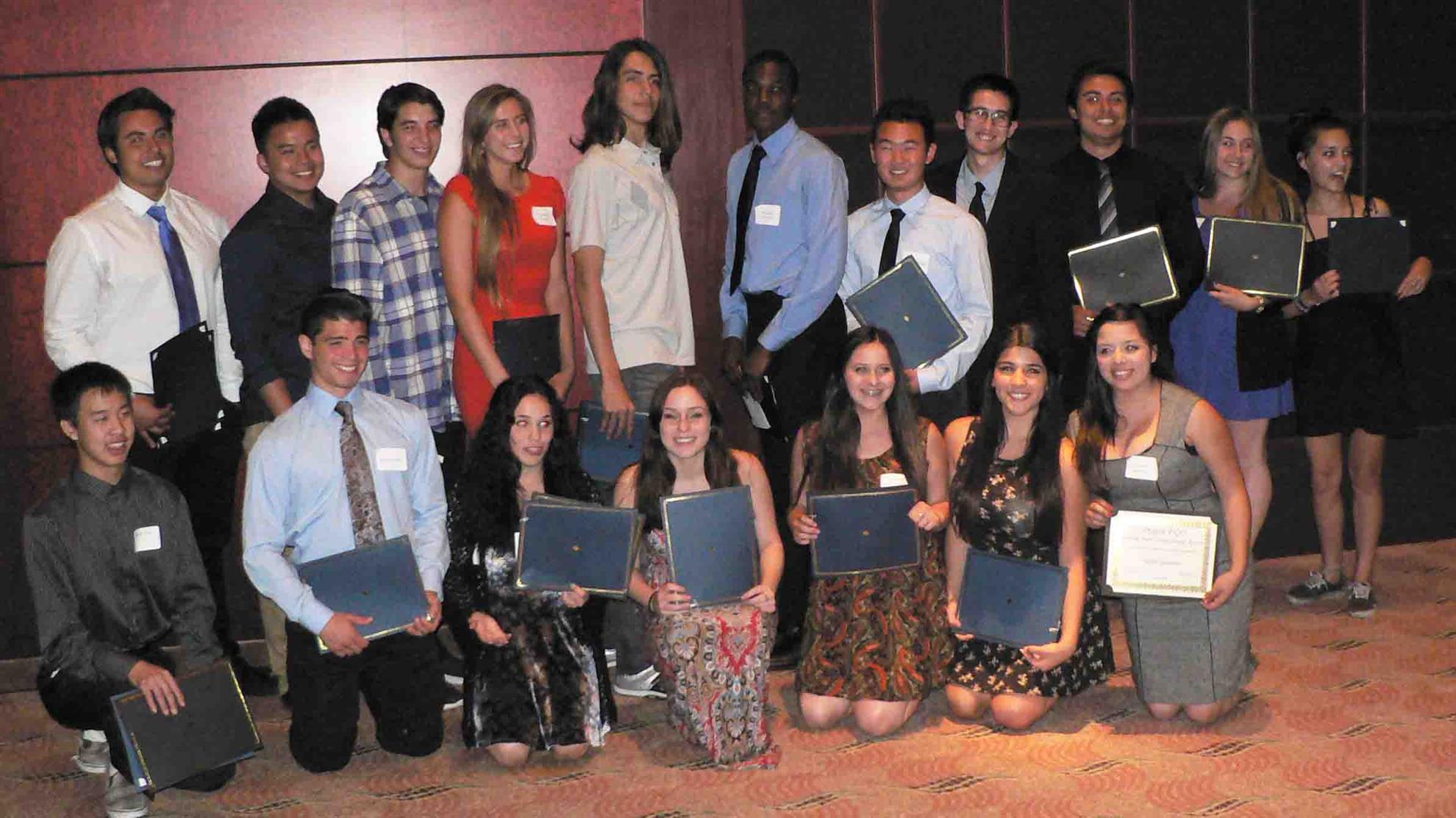
PV Sunset Past Pres and Project ego chair John Turner opened the program and introduced the Project EGO personnel, including Robert Babb, Kelly Baranick, Madeleine Creighton and Principal Rosemary Humphries. Special thanks to Rowena Schaben, whose generous financial support this year and previous years have been important to Project EGO’s success.
|
Recognition of Student District Contest Winners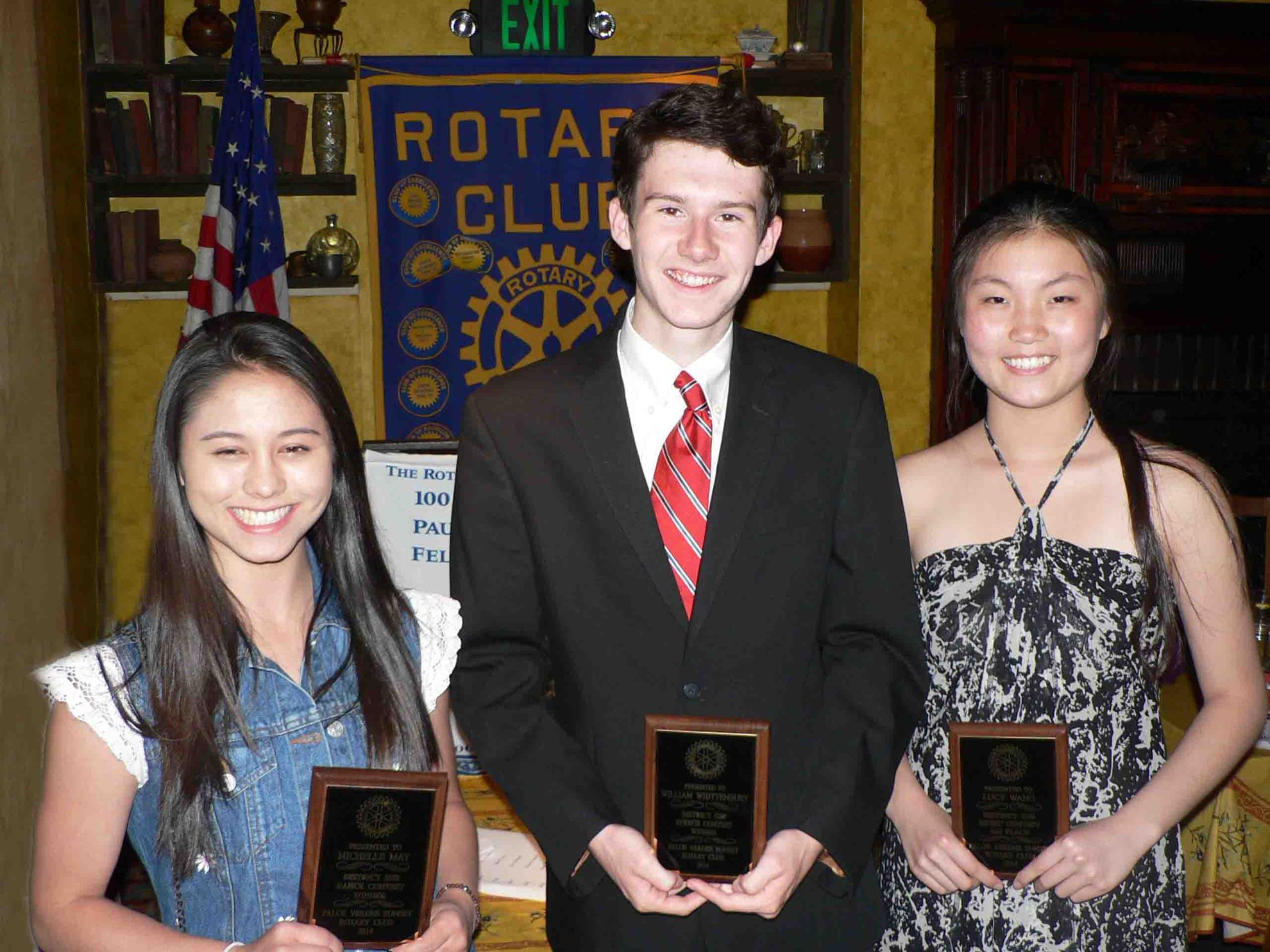 Audrey Dahlgren introduced our successful winners at the recent District 5280 Contests at Loyola Marymount University, and their parents. Audrey Dahlgren introduced our successful winners at the recent District 5280 Contests at Loyola Marymount University, and their parents. Michelle May won the District 5280 Dance Contest.
William Whittenbury won the District 5280 Speech Contest.
Lucy Wang took 2nd Place in the District 5280 Music Contest.
The students described their high school activities and future college plans. We congratulate them for their talent and efforts, and wish them great success. Thanks also to Audrey Dahlgren, who organized, recruited and encouraged them.
|
OFFSITE Social Gathering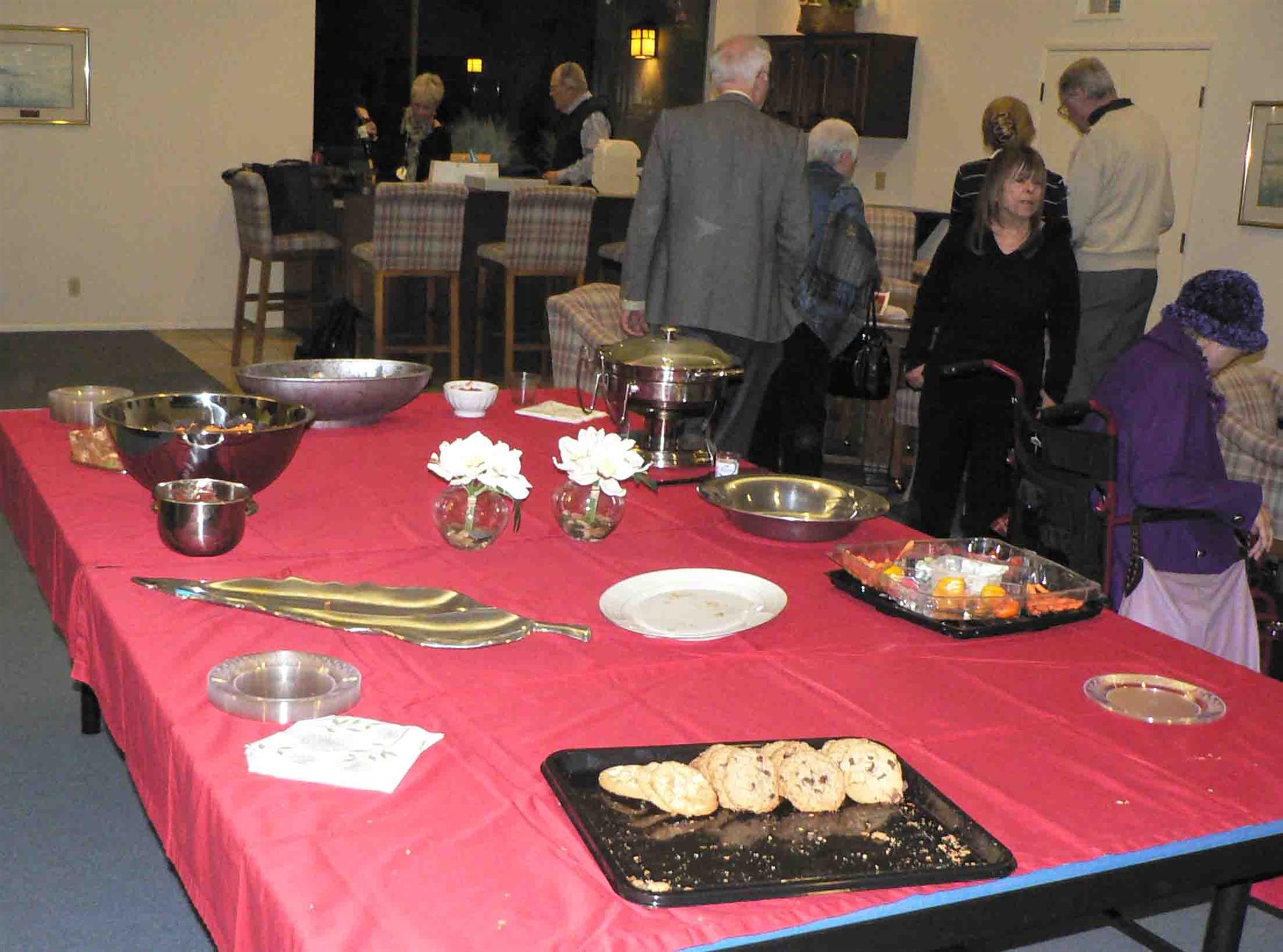 We enjoyed a relaxing break from our usual routine, just socializing and browsing the hors d’oeuvres table. Thanks to Jackie Crowley for arrangements, & to Dave Moyers for bringing wine. Jerry Farrell helped at the bar. We enjoyed a relaxing break from our usual routine, just socializing and browsing the hors d’oeuvres table. Thanks to Jackie Crowley for arrangements, & to Dave Moyers for bringing wine. Jerry Farrell helped at the bar.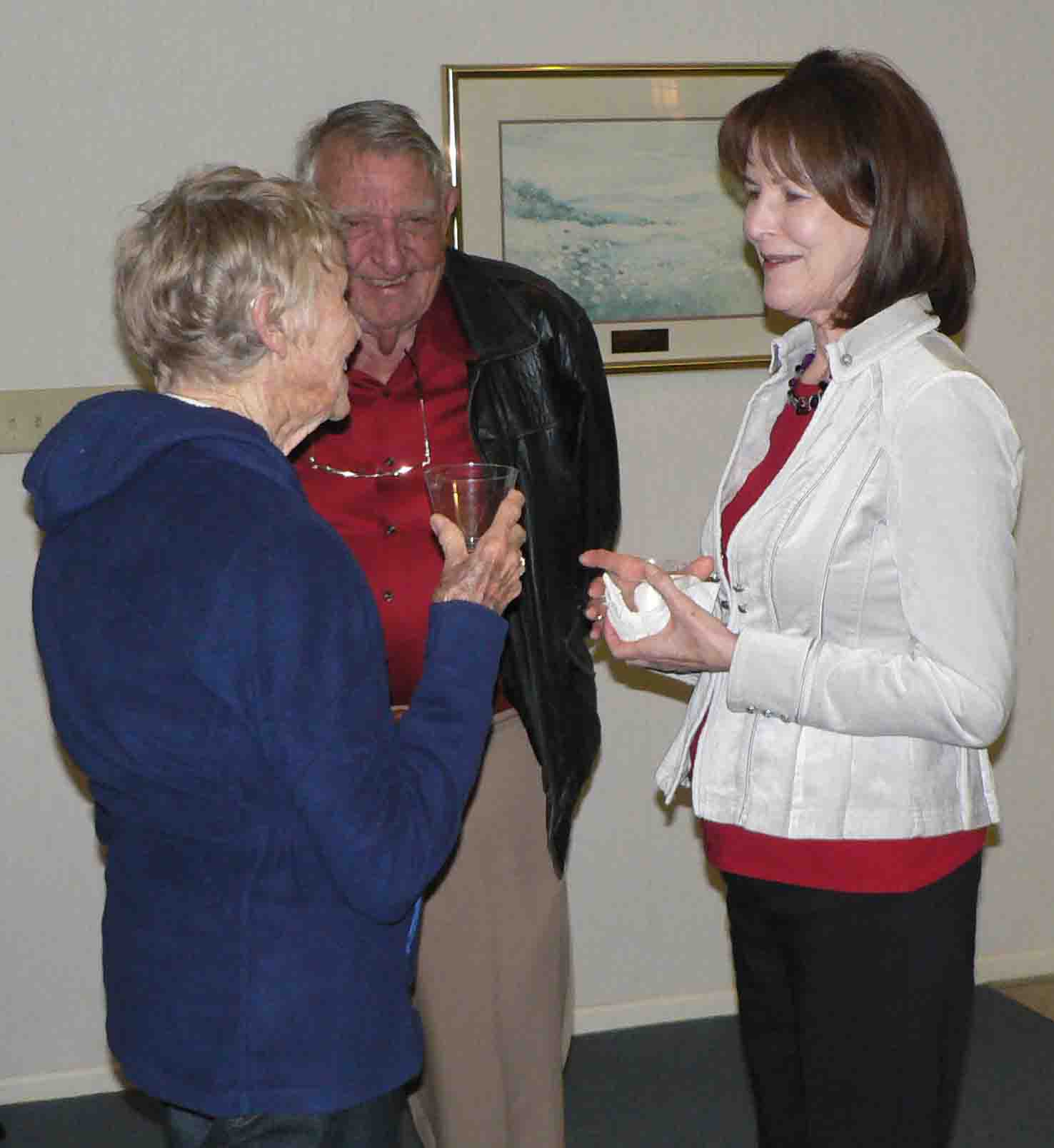 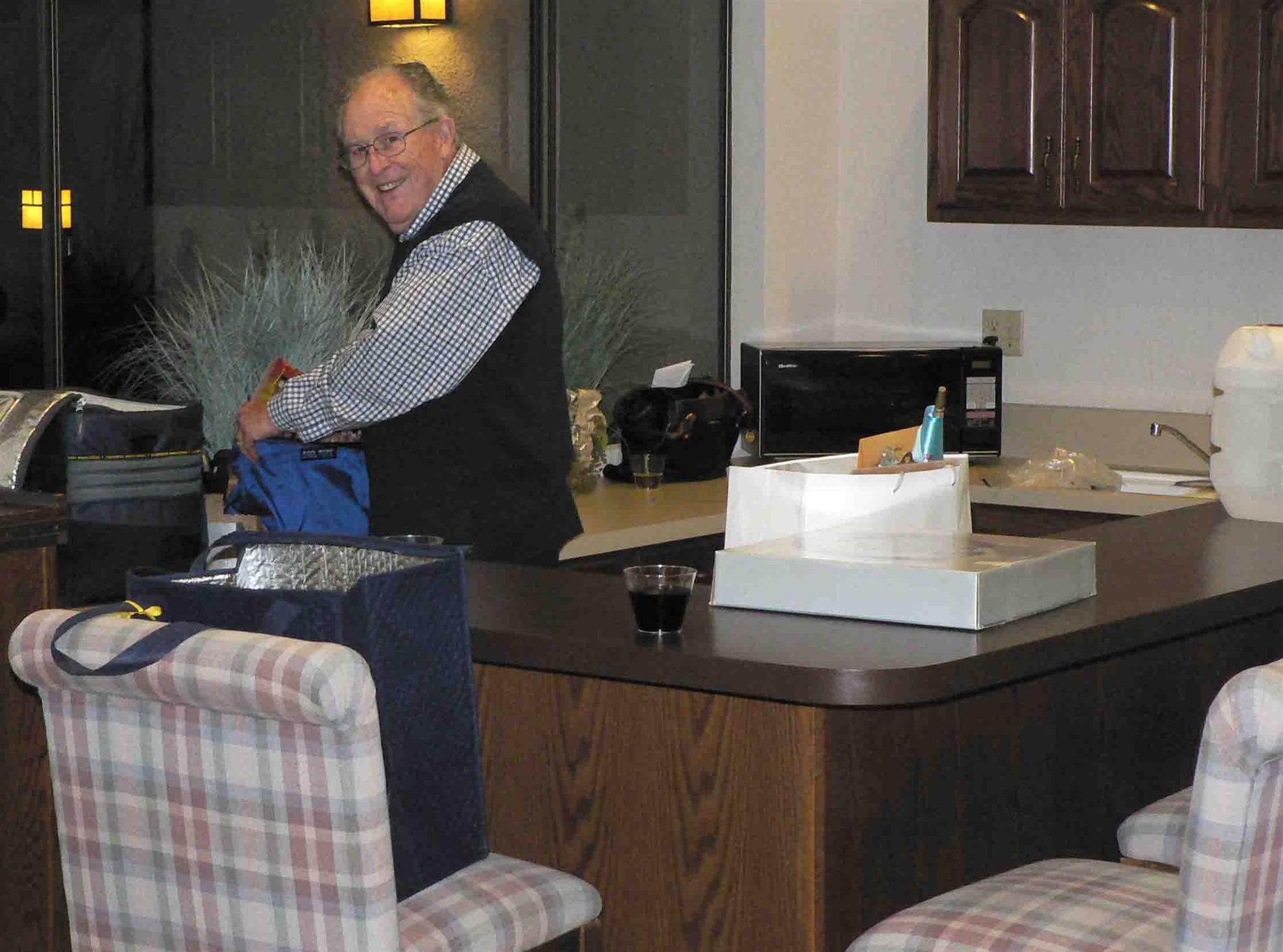 |
Colombia Trip Report & Rotaract Recognition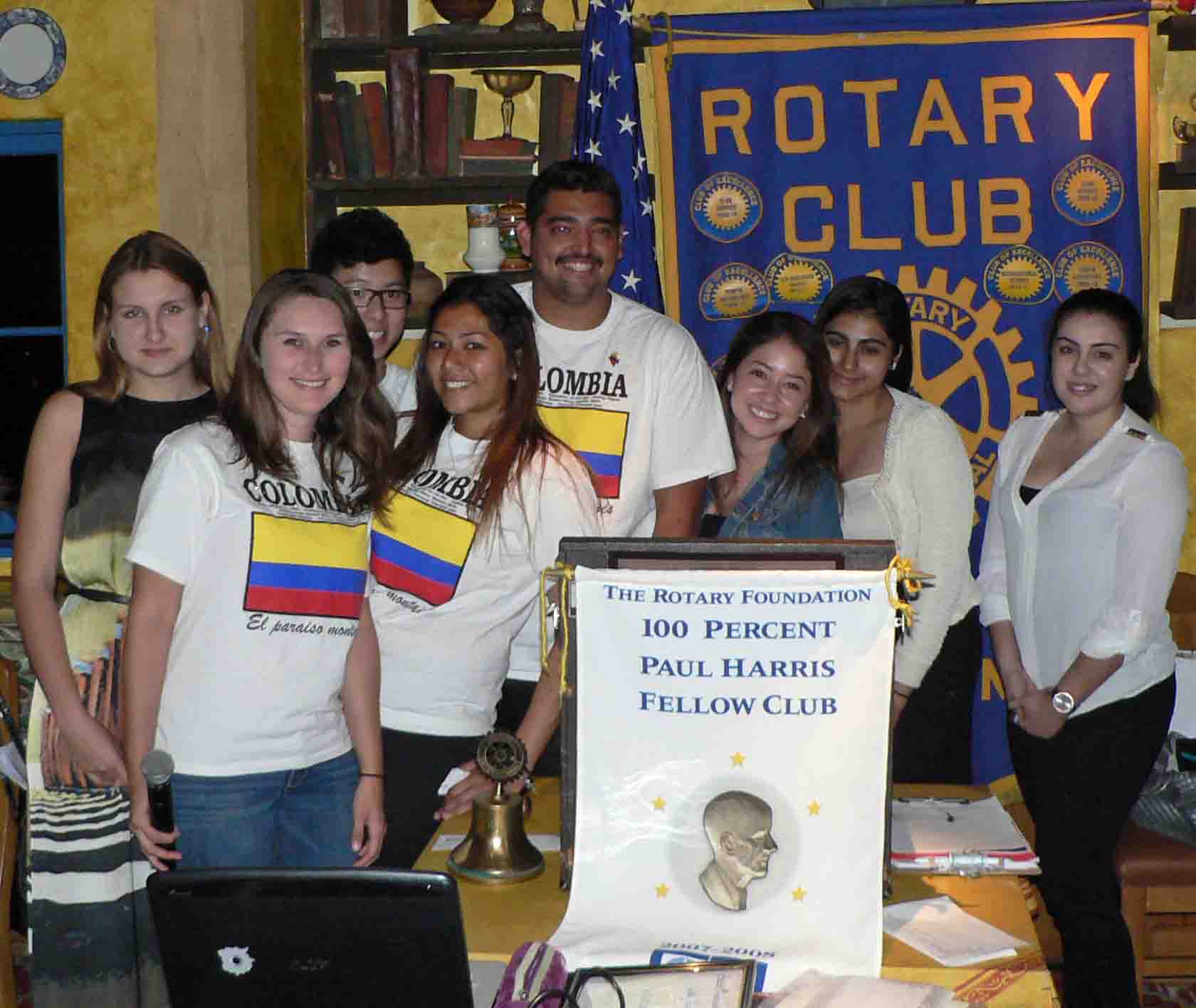 The Rotaract students from Marymount who participated in the District 5280 humanitarian trip to Colombia included Angelina Gorbaseva, Victoria Perez, Kevin Tang, Ruqaya Alloo, Fray Reyes, Amanda Peter, Francisca Cortes and Jazmyn Cano-Casas. They took turns discussing their award-winning Rotaract Club’s activities this year, with a slideshow. The Rotaract students from Marymount who participated in the District 5280 humanitarian trip to Colombia included Angelina Gorbaseva, Victoria Perez, Kevin Tang, Ruqaya Alloo, Fray Reyes, Amanda Peter, Francisca Cortes and Jazmyn Cano-Casas. They took turns discussing their award-winning Rotaract Club’s activities this year, with a slideshow. |
High School Youth RecognitionPalos Verdes Sunset Rotary Club recognized the Students of the Year for each of the local high schools: Palos Verdes, Palos Verdes Peninsula, and Rancho Del Mar. Each student is selected by the school based on volunteer service to the school and community, extracurricular activities, leadership, and academic achievement.
Each student was introduced by a school representative, and then presented a brief summary of school activities and future academic and career plans. Then the students received their award plaques and scholarships.
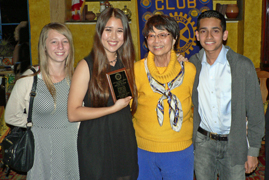 |
Echo Lee, Indonesia Orphanage Report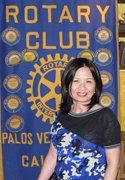
In 2009, Echo Lee saw a TV program called CNN Heroes, about a Singapore Airline pilot, Budi Soehardi, who had seen abandoned children in the streets after the 1999 conflict when East Timor broke away from Indonesia. He began sending food and medical supplies to the refugee camps. In 2002, he started the Roslin Orphanage with his wife, funded by his own salary, to take care of some of these children. Since then, they have raised about 150 children and have 5 full-time staff members.
|
Project Amigo Report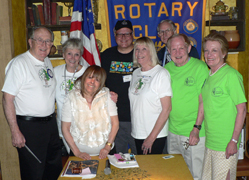
Project Amigo, in the state of Colima, Mexico, is a Rotarian program to promote education for the children of migratory workers there, in cooperation with a local Rotary Club. The parents work very hard cutting sugarcane in the fields, and many don’t speak Spanish, still using their native dialect. The children often live too far from schools or have to help in the fields. This lack of opportunity perpetuates the cycle of poverty.
|
Marymount Ethics Competition Presentation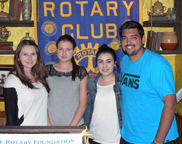
The 4 Marymount Rotaract students who will compete in the 2-District Ethics Form on April 5 gave us a practice presentation. They discussed the ethics of Organ Transplantation in relation to the Rotary 4-Way Test. Victoria Perez spoke on Truth, Jazmyn Cano spoke on Fairness, Angelina Gorbaseva spoke on Goodwill and Better Friendships, and Fray Reyes spoke on Beneficial effects.
|
Mehdi Bozorgzad, Persian New Year (Nowruz)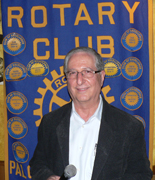
Mehdi began with a video on the origins and history of Nowruz, the Persian New Year. Nowruz (“New Day”) occurs on the spring Equinox or first day of spring (about March 21), at the moment the sun crosses the celestial equator, when day and night are of equal length. Nowruz was the major holiday in the ancient monotheistic Zoroastrian religion of Persia (today’s Iran). It was formalized in the Persian Achaemenid era (550-330 BC, between the times of the Babylonian Empire and the Greek empire of Alexander the Great.
|
ACLU, by Jessica Farris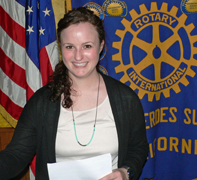 Jessica Farris is Policy and Advocacy Counsel for the American Civil Liberties Union of Southern California, where she works on areas such as privacy/surveillance and criminal justice reform. She graduated from Muhlenberg College (Pennsylvania), has a Masters degree from University College Dublin, and graduated from Drexel Law School. She has previously done pro bono legal work for Innocence Matters, for the Philadelphia Senior Law Center, and for the Drexel Haiti Justice Project for the Haitian population infected with cholera by UN forces stationed there after the major earthquake.
|
Roger Schamp, District PETS Meeting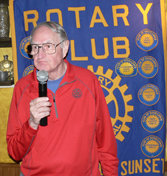
President-Elect Roger Schamp (wearing his new red Rotary shirt) outlined the main themes of his recent President-Elect Training Seminar (PETS) for the 6 Districts in Southern California and Nevada. The 3-day budget at the Marriott Hotel was $300,000. The plenary speakers presented a large amount of information which Roger is still trying to assimilate. He is planning for the next Rotary year 2014-15 and has e-mailed a survey to our Club’s membership, which he wants us each to write in our preferences and return to him at RGSchamp@aol.com.
Rotary leaders want us to recognize both individuals and Clubs for outstanding service. As an example of service recognition, the recent Outstanding Service Award to our Club by the Palos Verdes Chamber of Commerce was for our Club’s community service over the preceding year.
|
Wes Bradford, Nutritional Effects on Health & Disease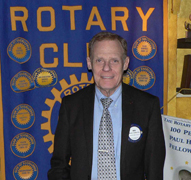
Our Club member Wes Bradford is a Family Physician and Functional Medicine consultant in Torrance (www.dr-bradford.com), and is a member of the Clinical Faculty at Harbor-UCLA Medical Center. He has participated in Rotarian Polio-Corrective Surgery Projects in Uganda and India.
Health problems can be caused by diet, soil mineral depletion, toxic contamination, and differing needs (genetic, environmental, stress, lifestyle and medical differences). However, focused nutritional changes can help a variety of chronic health conditions. Avoid wasting money on nutritional junk, and know which nutritional interventions can help.
|
Chinese New Year Celebration (District 5280 Event) 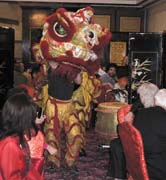 We rode the Club bus from Peninsula Center to the Ocean Seafood Restaurant in Chinatown in Los Angeles, wearing red and enjoying wine en route served by Astrid & Jacques Naviaux.
We arrived to a 10-course Chinese banquet to celebrate the 4712 Year of the Wood Horse, and were escorted to our tables, directed by Angi Ma Wong and assisted by Jennifer Kain and Astrid & Jacques Naviaux. There were New Year gifts for everyone at each place setting.
(Every 12th year of the Chinese Zodiac is a Horse, and every 5th year is Wood, so this cycle repeats every 60 years. The Horse is hard-working, independent, intelligent, friendly, good with the hands [or hooves?], and enjoys entertainment and large crowds.)
We were treated to the magic tricks of David Chen (a Hollywood Magic Castle member), who made doves come out of objects in his hands. The birds were remarkably well-behaved and harmonious, not flying about marking the dinner plates. Then 2 Dragon-Dance teams accompanied by drum & gongs came dancing out among the tables breathing their fiery breath and swallowing monetary tips passed to their mouths (their tongues inside looked remarkably like human hands). A Kung Fu demonstration/dance intimidated any remaining evil spirits lurking about (firecrackers were not allowed inside the restaurant).
We enjoyed talking with other District Rotarians and our many guests, and returned home to begin a successful New Year of the Horse.
|
Cuba Trip, by Marylyn & Chuck Klaus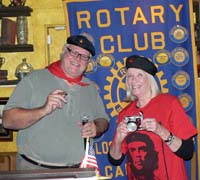
Marylyn and Chuck Klaus had gone to a fundraiser in Long Beach and bid on a trip to Cuba for 2. Surprisingly, they won, and recently enjoyed their trip there. The trip leader, who was born in Cuba, frequently takes groups of visitors there from the US. They began their tour in Havana, known for its “bars, old cars and guitars”. They exhibited their Cuban tourist attire including beret hats and a Ché Guevara T-shirt. Chuck held a Cuban hand-rolled cigar (he didn’t light it, so as not to trigger smoke alarms & building evacuation), and Marilyn showed a beer-can camera (art from necessity). They showed many slide photos of the people, art, street scenes and old buildings, mostly in Havana, and the home/museum of Ernest Hemingway.
|
Solar Cooker Project & Walk to End Genocide, by Susan Brooks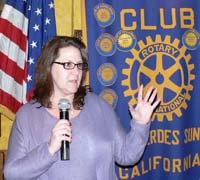
Susan Brooks (not our past local mayor!) lives in Torrance and has been active in the Solar Cooker Project. She discussed what this has to do with genocide.
Jewish World Watch was founded in 2004 by Rabbi Harold Schulweis of Valley Beth Shalom, a Conservative congregation in Encino, out of concern for ongoing areas of genocide in the world today. After the end of the Nazi era in 1945, many people pledged, “Never again!” How can we then stand idly by today when millions of (non-Jewish) people are being threatened with genocide because of their ethnicity?
|
The Molina Foundation (I’Nella Douglass-Scott)
I’Nella, the Outreach Coordinator for the Molina Foundation, reviewed her organization’s history. The first Molina medical clinic was founded by the late Dr C David Molina, to help uninsured, non-English speaking and low income patients. It now has clinics in 16 states.
The Foundation was founded in 2004 by Martha Molina Bernadett, MD, MBA (now a Paul Harris Fellow), after she noted that children in her waiting room wanted to take some of the children’s books home to read. The Foundation’s Mission is to reduce disparities in access to education and health by the underserved. Illiteracy is viewed as a health risk.
|
Remembrance of Fred Korematsu Roger Schamp introduced the story of Fred Korematsu and then showed a video of his life story, which won 2 Emmy Awards.
Fred Korematsu (1919–2005) was one of many Japanese-American citizens living on the West Coast at the onset of World War II. Shortly after the Imperial Japanese Navy attacked Pearl Harbor on December 7, 1941, President Franklin D Roosevelt issued Executive Order 9066, authorizing the Secretary of War and his military commanders to remove everyone of Japanese ancestry from designated “military areas” near the West Coast (where it was feared they would aid the enemy in case of invasion) and place them in internment camps inland.
|
Fundraiser - "Chairs for Charity", by Astrid Naviaux & Sandy FarrellAstrid Naviaux reviewed the status of planning for our fundraiser Sun, June 29, 2-5 PM, at the Norris Pavilion. Instead of “Festival Del Corazon”, they are planning to rename the event “Chairs for Charity”, because it will feature chairs chosen and decorated in any style by local student artists from the Art Departments of Palos Verdes and Peninsula High Schools, Chadwick School, and Marymount California University. Prizes will be given for the best chairs, and then the chairs will be auctioned. Palos Verdes High School will provide its Jazz Combo for musical entertainment. Tickets will be $75, including hors d’oeuvres (provided by Jeff Earle) and wine. Recruit some sponsors. Come, and bring others. |
Student Dance Contest, with Audrey Dahlgren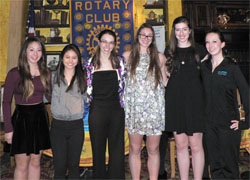 Dance Contestants: Rie Fukushima, Michelle May, Alexa Rogalski, Rose Knight, Mara Conway, and Morah Geist Dance Contestants: Rie Fukushima, Michelle May, Alexa Rogalski, Rose Knight, Mara Conway, and Morah Geist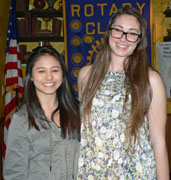 The Winners: Michelle May (First Prize) & Rose Knight (Second Prize)
|
Istanbul Peace-Conference Report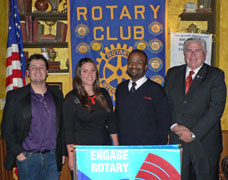 (Shown here are Alejandro Luk Haezaert-Caraveo, Robyn Weinstein, Lt Chris Golden, and Greg O'Brien) (Shown here are Alejandro Luk Haezaert-Caraveo, Robyn Weinstein, Lt Chris Golden, and Greg O'Brien)Greg O'Brien, Past President of Palos Verdes Peninsula Rotary Club and District Governor Nominee for 2016-17, briefly discussed the Future Visions Project in Rotary, with changes including Vocational Training Teams who will go to areas of Rotary focus. He introduced 3 of the 5 Peace and Conflict Resolution team members who attended Rotary’s Istanbul Peace Conference in September and October 2013. On their return, they submitted a written report to our District, and are speaking to Rotary Clubs here.
|
PV Sunset Christmas Event & Citizen of the Year Award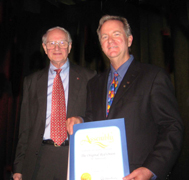
Our members and guests met in the Warner Grand Annex at 6 PM for our “Citizen of the Year” recognition of Jeff Earle. We began with “Heavy Hors d’Ouvres” served by 3 of Jeff Earle’s Red Onion crew, and we were lubricated by the bar services of Jerry Farrell & Jackie Crowley.
Then, Master of Ceremonies Don Reeves began the formal program with introductions of honored guests. Introducing our Citizen of the Year, he spoke of Jeff Earle’s family restaurant business begun 50 years ago, and his early political career (less successful than his outstanding restaurant management). Jeff has contributed his time and resources to many local community activities over the years as well as helping to found a medical clinic with ambulance in the Colima area of rural Mexico where many of his loyal employees came from. Jeff started and ran the Cub Scout Pack at the Harbor Hills housing complex for 11 years. He was also President of our PV Sunset Rotary Club, and helped organize and promote a very successful Cinco de Mayo Rotary fundraiser for the Mexico programs.
|
Al Muratsuchi, Assemblyman 66th AD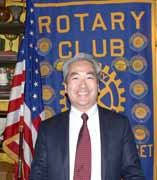
Al Muratsuchi was elected in November 2012 to represent California’s 66th Assembly District, which includes the South Bay Beach Cities, Torrance, Gardena, Palos Verdes and the Harbor City area. He graduated from the University of California, Berkeley, and the UCLA School of Law. He was a prosecutor for Los Angeles County and the city of Santa Ana, and then joined the California Department of Justice in 2001 as a prosecutor and Deputy Attorney General. He was a member of the Torrance Unified School Board for 7 years, and has been an active volunteer in South Bay organizations. He lives in Torrance with his wife and daughter.
|
Student Speech Contest, with Audrey Dahlgren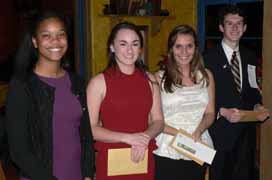 Audrey Dahlgren introduced Peninsula HS Counselor Teri Koyanagi and the 4 speech contestants (L-R): Candace Johnson (PVHS), Natalie Edelstein (PenHS), Liliana Pond (PenHS), and William Whittenbury (PenHS). Audrey Dahlgren introduced Peninsula HS Counselor Teri Koyanagi and the 4 speech contestants (L-R): Candace Johnson (PVHS), Natalie Edelstein (PenHS), Liliana Pond (PenHS), and William Whittenbury (PenHS).Natalie Edelstein gave a spirited and humorous speech on Narcissism in the Millennial Generation. She placed these attitudes in perspective to show that “we are not the center of the universe!”
Liliana Pond spoke on the challenges of Alzheimer’s Disease and the loss of memories of the past that deprive the rest of us of a sense of society’s continuity over time. She used as an example the recent loss of her beloved grandmother after years of Alzheimer’s.
William Whittenbury spoke on the endangered vaquitas (“little cows” in Spanish), the world’s smallest dolphins who live in the Gulf of California. There are only about 100 left, and they could be gone by 2017. They spend most of their time deep underwater and therefore are seldom seen by fishermen. This is a heavy fishing area that the local population depends on. A new SafeNet has been developed that can save these vaquitas from being unintentionally killed during fishing operations, and is more efficient in excluding unwanted catch that would be discarded.
Candace Johnson gave an excellent description of how the Rotary 4-Way Test can help us to make the right decisions as a moral compass for our values. She discussed how Jesus presented these same principles in his teachings on how to apply them to our daily lives. Acts of kindness are contagious.
After carefully evaluating each of these talented contestants, the judging committee chose William Whittenbury as the winner to compete in our District Speech Contest (March 1 at LMU); he was awarded $100. The runner-up was Liliana Pond, who was awarded $50. We thank each of these 4 outstanding students for their efforts, and are happy that we do not need to compete against them!
|
Funds for Disasters in Colorado and Philippines
|
Rotary Youth Exchange, by Warren Bobrow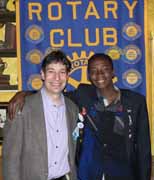 Warren Bobrow (Westchester Rotary Club) is our District Rotary Youth Exchange (RYE) Officer, and owns a consulting company for hiring employees. 8000 students from 80 countries are participating in exchanges, and 2500 students involve US participation. He introduced John Jegede of Nigeria (Yoruba ethnic group), whose father has been involved in Rotary. John is a Junior at Miracosta High School and is enjoying school activities and his year with host families here. Warren Bobrow (Westchester Rotary Club) is our District Rotary Youth Exchange (RYE) Officer, and owns a consulting company for hiring employees. 8000 students from 80 countries are participating in exchanges, and 2500 students involve US participation. He introduced John Jegede of Nigeria (Yoruba ethnic group), whose father has been involved in Rotary. John is a Junior at Miracosta High School and is enjoying school activities and his year with host families here. |
Student Music Contest with Audrey Dahlgren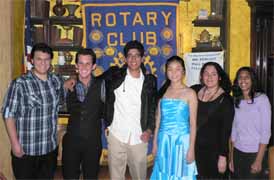
Audrey Dahlgren introduced the 6 music contestants, who introduced their parents and other family members in attendance. Each of the contestants introduced his or her instrument and the piece to be played, and then performed and were evaluated by our judging committee.
Contestants from Palos Verdes High School were Quentin Thelen (Yamaha electric piano), Zachary DiLello (flügelhorn, a trumpet-like instrument with a wider bore, formerly used on the battlefield), and Aris Kare (guitar, jazz ballad).
Contestants from Peninsula High School were Lucy Wang (violin, accompanied on Yamaha electric piano), Nicole Svitanovich (electric piano, Bach’s “Prelude in C Major”), and Omali Senaratha (accordion).
|
Joint Club Meeting (PV Sunset & Noon Clubs, Kiwanis, & Lions Clubs)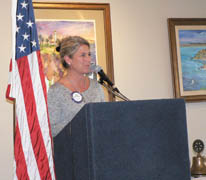
Palos Verdes Peninsula Rotary Club President Suzy Zimmerman opened the meeting and introduced the guests of the 4 Clubs.
Then the Presidents of the 4 Clubs briefly reviewed their Clubs’ service projects.
|
Keeping Youth on Track, by Steve Goldsmith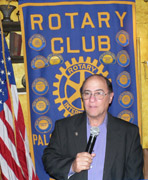 Steve Goldsmith is a former President of the Hawthorne Rotary Club. He was Executive Director of Centinela Youth Services for 14 years and built it to a 10-fold increase providing mediation and conflict resolution services to 6000 youth with 500 trained volunteer mediators and programs in 28 schools. CYS works closely with school districts, juvenile justice system, and the County Dept of Children’s and Family Services. He has won many awards, and was Chair and Director of the recent Rotary-sponsored meeting in Istanbul, Turkey, for mediators and peace builders from over 50 countries.
|
Student Art Contest, with Audrey Dahlgren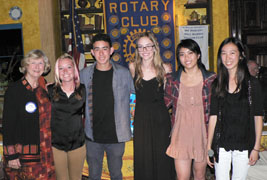  Audrey Dahlgren introduced the 5 art students and their parents & other family members in attendance. Their art presentations were displayed around the room for our Club members to admire.
While the judging panel was deliberating, the students took turns presenting their future educational plans and career hopes, and discussing their art submissions. Pictured above are Audrey Dahlgren with students Elizabeth Applewhite, Alex Mendoza, Noelie Merrihew, Emilie Ren, & Loren Chen.
First Prize was Loren Chen’s “Aftermath” (shown above), depicting a child survivor after a natural disaster, with a very emotional effect on the viewer. Loren will compete for our Club in the District 5280 Art Contest.
|
Dency Nelson, on His Hollywood Life
Dency Nelson, who lives in Hermosa Beach, was introduced by Roger Schamp, who has known him for 10 years as being knowledgeable about environmental issues. In February this year, Roger found out from a front-page Los Angeles Times article that Dency Nelson, who hadn’t discussed his job with Roger, was retiring from a career of several decades as a Stage Manager for television shows.
|
Offsite at the Banning House Museum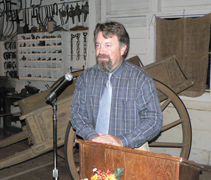
Michael Sanborn, Director and Curator of the Banning House Museum, grew up in the Harbor City area and received a Masters Degree in Fine Arts from
|
Chamber of Commerce Awards Dinner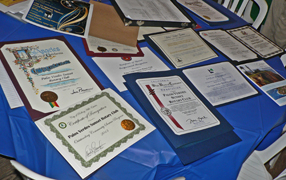 The Chamber of Commerce Awards Dinner at the Terranea Resort on Friday, Oct 11, recognized the PV Sunset and PV Peninsula Rotary Clubs as the Service Organizations of the Year. Our Club had 3 tables. Our President, Sandy Farrell, was presented with our Club recognition certificate by Assemblyman Al Muratsuchi. We received proclamations of recognition by several local and state government organizations (see photo). (NOTE: We will be dark next week, Oct 22 to help subsidize our members attending this event without impacting our budget.) The Chamber of Commerce Awards Dinner at the Terranea Resort on Friday, Oct 11, recognized the PV Sunset and PV Peninsula Rotary Clubs as the Service Organizations of the Year. Our Club had 3 tables. Our President, Sandy Farrell, was presented with our Club recognition certificate by Assemblyman Al Muratsuchi. We received proclamations of recognition by several local and state government organizations (see photo). (NOTE: We will be dark next week, Oct 22 to help subsidize our members attending this event without impacting our budget.) |
First Book, Kellie Cairns – Molina Foundation Literacy ProgramKellie Cairns has always loved books, influenced by her mother, husband, and sister, who are all teachers. In 2002 she founded “Book Buddies”, a literacy program of the Molina Foundation, and is known to thousands of children as “The Book Lady”. She became good friends with Helen Coffey, chair of the Los Angeles First Book chapter, and is currently its chair.
Kellie has personally helped to distribute over 3 million books to children, and built over 125 libraries including the Helen Coffey Reading Room in honor of her dear friend. She has been featured on Oprah Winfrey and recognized by President George W Bush. She receives e-mails from successful college students who were in grade school when she first met them and gave them books.
|
Offsite at The Canterbury, Outside Patio Party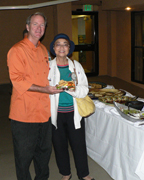
Jeff Earle was helping Angi Ma Wong with the vittles! We had live music, wine, “heavy hors d’oeuvres”, lots of fun (inside and outside). After munching on the patio, we assembled inside for a brief formal meeting and announcements. Then former opera singer Rosemary Welch accompanied our not-quite-operatic Club members in a series of songs from famous American musicals, led by Rev Tom Cooper. As an encore, President Sandy Farrell made him sing a solo to show off his crooning talent, which he did as a real trouper. Bravo! |
Palos Verdes Art Center, by Joe Baker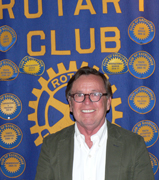
Joe Baker, the Executive Director of the Palos Verdes Art Center, is an artist, curator and educator. He grew up in Oklahoma (where he is a member of the Delaware Tribe) and graduated from the University of Tulsa with Bachelors and Masters Degrees in Fine Arts. He completed a Master of Development Practice from Harvard. He has been involved in issues of health disparity, identity and global cultural equity through music, dance and art exhibitions. He was Director for Community Engagement at Arizona State University and then Executive Director of Longue Vue House and Gardens in New Orleans, before coming to Palos Verdes. He considers the PV Art Center the “best kept secret” in Palos Verdes, and is promoting outreach to the surrounding community. It was founded in 1975 and is involved in many school-based and other programs to serve the South Bay area. Each year there are 5 Art Center projects serving 7000 K-5 students for art education, served by 400 volunteers. The cost is only $1/project/child, serving children from Harbor City, Watts, Hawthorne and other surrounding communities who otherwise have little opportunity for exposure to the arts. Students are brought to the Art Center for classes and exhibits, free of charge to them. This year they are also working with Intermediate School children in Palos Verdes. |
District Governor’s Visit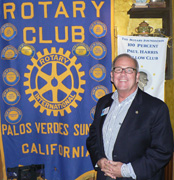 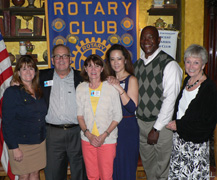
(DG Doug Baker is shown here with AG Carolyn Brady-Sinco, Connie Baker, Executive Aide Jaimee Sul Cantrell & Hampton Cantrell, and President Sandy Farrell.) District Governor Doug Baker opened the program with a Paul Harris award to Roger Schamp, and then reviewed the value of the Rotary Foundation in furthering our Rotarian philosophy. DG Doug said that his wife, Connie (whom we are happy to see present with us tonight), was diagnosed with lung cancer 3 weeks ago. He noted how caring and giving the members of our Rotarian family are to each other when we are faced with such a crisis. Past District Governors have helped to fill in for him on District duties while he has been helping his wife during these difficult days. |
Club AssemblyPresident Sandy Farrell opened the meeting and called on the Club Service Chairs and Club Officers to report on their projects, activities and status for this Rotary Year, in preparation for the annual District Governor’s Visit next week. (We will begin next week with the Board Meeting at 6:30 PM with District officers, before the Club meeting.) Sandy is preparing our Club presentation to the District from the written reports that are being presented orally tonight. |
Portuguese Bend Club Beach Party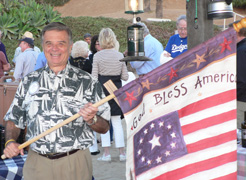 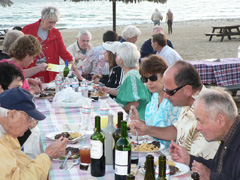 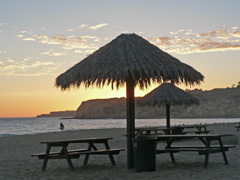 Jeff Earle & his crew served a beach buffet to us (watched hungrily by the gulls & pelicans). We enjoyed conversation with wining & dining on the beach as the sun sank over the horizon. Thanks to Ralph Black for arranging this relaxing event, and to all who helped to set up, provide the wine, shuttle us to and from the parking area, and for inviting our guests and cleaning up afterward. |
Larry Andrews, Membership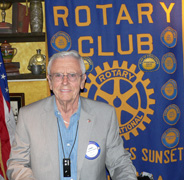
Larry Andrews opened the program with a skit by Jason Sluyter and Megan Lyne (2 actors from the Norris Theatre, whom Larry had provided with dinner in the adjacent room as payment for this work). It began with Russ Schaadt opening the door to the other dining area to let the 2 actors into our meeting. They acted as “uninvited visitors”, with Jason grabbing some taco chips from a table on his way in. They sat down at a front table to eat, and had a dialogue with Larry at the podium about the process of becoming Rotary members. Larry told them, “This is a private dinner meeting. We are a service club and a private organization. You have to be invited to join us; you can’t just barge in here like that!” This dialogue continued as Larry explained to them the requirements of membership and the process of joining Rotary. Then, Larry introduced them as actors, and they made their bows and departed. |
Russ Schaadt, Craft Talk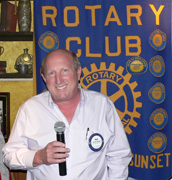
Russ Schaadt, a new member, is president of Gardner Management, a real estate investment firm that acquires and manages large multifamily residential and commercial properties in Southern California. The company was founded by Theodore Gardner in 1968. The company owns and manages 1500 apartments and focuses on quality customer service to its residents while maintaining attractive profitable properties. |
Norris Theatre, Robin Franco, Director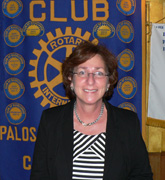
Robin Franco has lived in Palos Verdes since age 10. She graduated from Cal State University Long Beach with a BA in Mathematics and a minor in Computer Science, planning to become a math teacher. Her first job was with Magnavox, designing and installing integrated navigation systems for ships, spending up to 3 months at sea supporting these systems. The company was sold to Leica Geosystems, where she continued working as a systems analyst in GPS navigation. Then she became Director of the South Bay Jewish Federation, working with donors and developing fund-raising activities. She became Executive Director of Temple Menorah in Redondo Beach, running the business side and working with its board of trustees and the congregation. 4 months ago she became Managing Director at the Norris Center for the Performing Arts, consisting of the Theatre and the adjacent Norris Pavilion. The Norris Theatre started in 1977 when Agnes Moss and Joan Moe formed a nonprofit organization for theater arts in the community. The developers of “The Promenade on The Peninsula” shopping mall donated land for the building, and the Ken and Eileen Norris Foundation provided $1 million to start fundraising. The Theatre opened in September 1983. |
Jay Johnstone, Major-League Baseball Player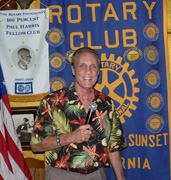
Jay Johnstone, a Rotarian and Paul Harris Fellow and ex-Marine, played major-league baseball as an outfielder for 20 seasons, starting in 1966 for the California Angels. He also played for the Chicago White Sox, Oakland Athletics, Philadelphia Phillies, New York Yankees, San Diego Padres and Los Angeles Dodgers. He has 4 World Series Rings with a World Series batting average of .435. After his playing career, he was a radio commentator for the Yankees and Phillies. He is married to a former actress. |
Cabrillo Marine Aquarium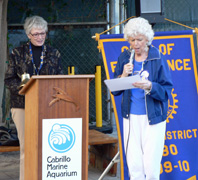 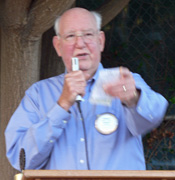
After President Sandy Farrell opened the off-site meeting at the Cabrillo Marine Aquarium, Charley Ferraro (now Executive Director of the Friends of Cabrillo Marine Aquarium) introduced Mike Schaadt (Executive Director of the Cabrillo Marine Aquarium) and his staff. Following the presentation, we had small-group tours of the exhibits, which include plankton raising, rockfish (which can live to 200 years), abalone, seahorses and their pipefish relatives, garibaldi’s (California’s state marine fish, named after the 19th century Italian political and military leader because of its bright orange color), jellyfish, sea mammals and birds, and the great diversity of Southern California marine life caused by upwelling deep colder waters that carry more nutrients up toward the shore, and the influence of El Niño weather conditions when more tropical water and animals come north to our coastline.
|
Ride to Fly, by Gail Grove & Marlin More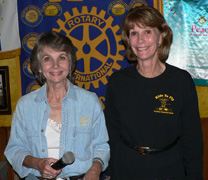
The Ride to Fly Therapeutic Riding Center is a non-profit all-volunteer organization that provides therapeutic horseback riding and its associated learning experiences to children and adults with physical, emotional and learning disabilities in a safe, nurturing environment. It is located in Rancho Palos Verdes (at 50 Narcissa Dr, in a gated community) and has been serving the South Bay area since 1994. Gail Grove is a former dental hygienist who began volunteering for Ride to Fly in 1997 because her husband was a volunteer there, and she often accompanied him to the horse barn and to board meetings. She joined the board in 2000, and 2½ years ago succeeded her husband as the Executive Director. Marlin More was a school librarian with the Los Angeles Unified School District until retiring in 2011. She began volunteering for Ride to Fly in 1996 because of her interest in helping people with health challenges and being with horses. Now she schedules lessons for Ride to Fly clients, no more than 1 or 2 clients with each instructor in a session. All new clients are initially assessed and screened for suitability for the program, because there are a few who would not be able to participate successfully. |
Help Homeless Help Themselves, by Rascha Hall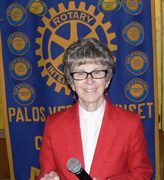
Rascha Hall is the president of “Help the Homeless Help Themselves”. She is a Palos Verdes resident and a former math teacher at Palos Verdes and Peninsula High Schools. She was in a Fulbright Exchange in 1990-91, and taught in Nuneaton, UK. She has worked with HHHT for 25 years. HHHT was founded in 1987 by an East Coast couple who saw homeless people living on the streets. The organization is staffed by volunteers and has no office space; it is run from the homes of the volunteers. 46 families in the South Bay area have been helped this year, with donations up to more than $1000. Funds come from fundraising events, such as a balalaika dancing presentation on April 28 this year, which raised $43,000. Another fundraiser will be held at Rascha Hall’s home this month (flyers were distributed to our members). Grants are also received from foundations, such as the Norris Theater. |
Rotary Foundation Plus, by PDG Dave Moyers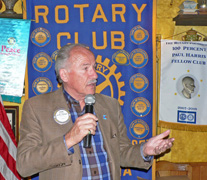
Dave Moyers reviewed the roles of leaders in our District, who volunteer their time and resources to help the individual Clubs with their expertise in areas such as fundraising, financial management and special projects. They are not a hierarchy, but volunteers available to assist individual Clubs as needed. Our merged District 5280 has 2600 members and 63 Clubs now. The Club President is the most important person in Rotary, and needs to know who to ask for assistance, such as the Assistant Governors for Club Service, each responsible for arranging assistance as needed to 3-4 assigned Clubs. The Senior Assistant Governors collect all of these ideas to help all Clubs in each Avenue of Service. This structure helps to organize our volunteer services committed to the ideals of Rotary. |
President Sandy Farrell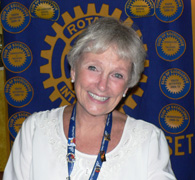
President Sandy opened the program by showing us a YouTube video, “Rotary Now”, illustrating the busy daily lives of active Rotarians showing how they find time to give service to Rotary projects. Participation makes Rotarians’ lives more complete and fulfilling. (No secret handshakes or funny hats!) (http://www.youtube.com/watch?v=_3q0dMjZ_-I) Sandy urged us to think about how our “Rotary Moments” make a difference to others. We join Rotary to make a difference in the world, not just to have a dinner club. Sandy passed out forms to us on “What I can give back…”, listing items or services we can contribute plus blank spaces for additional possibilities, so we have a Club inventory of what we can each contribute. We have tentatively planned offsite meetings for the last Tuesday of each month. Let Sandy know your ideas for potential locations. |
Demotion Dinner at Palos Verdes Interpretive Center
Don Reeves, MC Extraordinaire!
Jackie Crowley, Rotarian of the Year:
The Big Kahuna gets Ukulele Lessons (from Joshua Cahill, 10th grader at Torrance South High, a 6-year Ukulele veteran and alternative rock band member):
Sandy Farrell sworn in by incoming District Governor Doug Baker:
|
Captain Blaine Bolin (Lomita Sheriff's Station)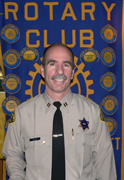
Capt Bolin is a 27 year veteran of the LA County Sheriff’s Dept and has been at the Lomita Sheriff’s Station for 3 years (replacing Capt Ronene Anda, who was promoted to Commander). The Lomita Sheriff’s Station was established in 1975 and has 91 sworn deputies, 24 civilian employees and 69 volunteers. It covers 23 mi² including the Peninsula cities. Capt Bolin discussed the philosophy of Excellence in Policing at the Lomita Sheriff’s Station. It was recently rated 2nd in performance of 23 in the County Sheriff’s Dept, the only Station of its size to rank so high. He described 4 law enforcement incidents to show how striving for perfection (which is unattainable) leads to excellence at his Station. |
The Inner City Check Cashing Industry, by Tom Nix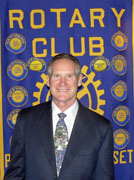
Tom Nix’s family came from San Pedro, and he worked his way up from a rough childhood to found a check-cashing business, a new concept at the time, in South Central Los Angeles. His father had started a small grocery store, and also cashed checks for customers. From helping his father in this business grew his concept of starting a check-cashing business.
Tom finished high school and did well in school, but got into many fights with others his age, about drinking, girls and fighting each other to prove their toughness. He was admitted to USC and soon started to fit in with the more upper-class culture there, playing one year of football under John McKay. After graduating in 1970, he married his high school sweetheart, Pam. |
Francisco Houses, by Tim Stotler, Johnny Florez, Sr Mary Sean Hodges & Sr Teresa Groth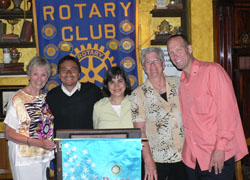
President-Elect Sandy Ferrell is shown at left with speakers Johnny Florez, Sr Teresa Groth, Sr Mary Sean Hodges, and Tim Stottler. Sandy introduced the speakers, beginning with Tim Stottler. Tim announced that he had been in prison for 26 years, for murder, and makes no excuses for what he did. When he was released onto the street, he had just one suit of clothes, no money, no identification, no relatives (his family is in Utah), and difficult employment prospects with a prison record and no recent work references. That day, he felt fear for his limited prospects of taking care of himself outside of prison. He called Sr Teresa Groth, who put him in contact with an intermediate house with space for him. He described the difficulty of getting a job without having identification, a birth certificate or a Social Security card; to get any one of those, he needed one or both of the other 2 of them. It took him 2 frustrating months to overcome these problems so he could even apply for a job. Even then, it’s difficult to compete for even a minimal job with a criminal record and no work references. Although he developed electrician skills in prison, applying for a job in prison is nearly impossible because a job would have to be held open for him for at least 5 months while going through the process of parole approval and finally the Governor’s signature with no release date guaranteed. |
Project EGO Banquet, Offsite at Ridgecrest Intermediate School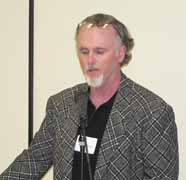 PV Sunset President John Turner opened the meeting and introduced the guests, including PVUSD Superintendent Walker Williams, Rancho Del Mar High School Principal Rosemary Humphrey, and members of the Board of Education. Special thanks were given to the Norris Foundation for its $15,000 grant and to special benefactor Rowena Schaber, who donated $7000 to Project EGO. Clinical Psychologist Robert Babb (pictured) has been with Project EGO (“Exploring Growth Opportunities”) for 19 years and helped to develop its curriculum. It offers career direction and experience to high school juniors and seniors in the Palos Verdes School District who need extra help to qualify for graduation and achieve their potential. The Project EGO program is sponsored by the Community Association of the Peninsula (CAP) in cooperation with the School District, and is supported by the Norris Theater Foundation and the Palos Verdes Sunset Rotary Club.
School counselors refer students to the program. They often start with little belief in themselves due to previous adversities and failures, but the program helps them to think formally about their goals (often for the first time). They can apply for financial grants to help them achieve goals, such as college or trade school or computer training, which helps to motivate them to plan their course schedule and focus on the skills needed to succeed academically to qualify for these goals. After acceptance into the program, they are required to attend evening seminars twice a month by community business professionals and psychology interns, and they also attend some evenings for more work on deficient academic skills. Attendance is required to maintain eligibility to continue in the program. Small groups of these students help each other, facilitating bonding and showing up consistently and on time. Some of them attend occupational training classes at SCROC (Southern California Regional Occupational Center) outside of their regular school schedule.
They start with about 40 students, ending up with about half of that number (15 this year). Students are out if they miss meetings or don’t follow up as expected. They can make up missed time by community service at the rate of 2 hours for every hour missed. Most program dropouts are early in the school year, after which the survivors are determined to succeed.
Different topics are presented every month on careers and appropriate skills development. Students are required to stand up before their peers to speak to them. This feels intimidating at first, but they soon gain confidence in their ability to present themselves to others. They fill out a resume (with coaching assistance), engage in a job interview and write an essay on their future plans and goals.
This banquet dinner at the end of the year, with their parents and sponsors, recognizes their struggles and successes. The students were called to the front individually to describe their achievements and goals and to receive a completion certificate and financial grants of $500-$1750 toward their goals such as college tuition (if they have completed an interview). This year’s students are: Wyatt Adams, Natalie Bruno, Sungduk (Daniel) Cho, Shannon Duke, Joshua Engeln, Kellen Goff, Alexander Gramajo, Krysta Holloman, Isaac Kim, Brittany Kuran, Aida Mahram, Moneeba Malik, Melissa Marsh, Brandon Ojalvo and Hailey Weebe. |
Project Amigo, by Susan Hill & Ted Rose(Notes by Angi Ma Wong) Slide Presentation by Rotarians Susan Hill and Ted Rose, Project Amigo, Colima, Mexico:
I’m going to start by telling you a true story. A neighbor in our village is illiterate. She had two sons, neither of whom could read. One son was disabled and required anti-seizure medication. This woman kept in her refrigerator various food items, the bag with her son’s medication and a similar-looking bag that contained herbicide used in their corn patch. Each bag was clearly labeled. One fateful morning, the mother asked her son to give his brother his anti-seizure medication. Well, you can imagine the outcome. The worst possible outcome. After two days of suffering, the boy died.
One of our favorite slogans about reading that’s displayed on bumper stickers and in car windows around Colima state is this one: Reading is power.
What would your life be like if you couldn’t read? What job would you have? How well could you support your family? How would you check a fact or proposal to learn if it was true? How could you know that you were voting for the candidate who shared your views? Would you even care? What might your view of the world be – compared to what it actually is because you can read? Statistics show that if you couldn’t read, you would most likely be poor.
We think whoever taught you to read is without doubt one of the most important people who ever touched your life. Reading IS power.
In rural Mexico, only 60% of primary school graduates go on to junior high school. Of those who do, only 45% will graduate from high school. Nationwide in Mexico, only 20% of students who finish high school go on to college. The percentage of people living in poverty or extreme poverty in Mexico is estimated at 40%. Is there any doubt in your mind that lack of education and poverty in Mexico are related?
The Palos Verdes Sunset Rotary Club and many of you individually have been supporting Project Amigo’s students since 2002. You’ve sponsored children’s incentive programs and higher education students’ scholarships. Following are some of their success stories: |
Group Study Exchange Team from Japan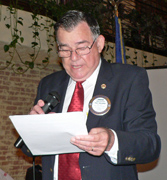 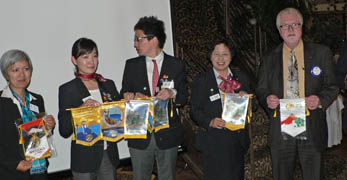 (Joint meeting with Palos Verdes Peninsula, San Pedro and Del Amo Rotary Clubs)
Chuck Hanchett introduced Rotarian officers and guests, and the GSE Team members and their hosts. The participating Club Presidents for this week spoke of their Clubs’ activities.
After dinner, each of the GSE Team members showed a brief photo presentation of their family members and work activities, followed by a banner exchange from their sponsoring Clubs and the 4 Club presidents of our hosting Clubs this week. (This is the 3rd week of their one-month stay in District 5280, from April 13 to May 14, staying with hosts in different parts of our District each week.)
GSE Team Leader Satomi Owata, of the Otsuki Rotary Club in District 2620, is a nursing home owner and is married to a urologist. Hiroki Ogino is a TV program director who films documentary and variety shows. Namiko Ishikawa is a police officer at a railway station. Noriaki Oshimura is a dentist who works in the same dental office as his parents and sister, who are also dentists. Minami Wade is an orthopedic nurse. All of them have enjoyed learning about American culture and meeting with their business and professional counterparts here.
Rotary District 2620 is on the East Coast in central Japan, with a mild climate and great natural beauty, with Mount Fuji (which is of volcanic origin) and many hot springs. Agricultural products include rice, green tea, mandarin oranges, peaches, grapes and wine. Industrial products include automobiles, motorcycles, machine tools, paper, jewelry, electronics and business machines, and commercial fisheries are also important. |
Marymount College Multicampus System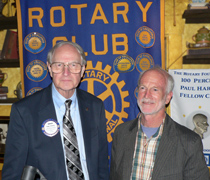 Roger Schamp (above) introduced Prof Allen Franz, who was born in Long Beach to a military family and graduated from Palos Verdes High School and UC Santa Barbara. He received a PhD in Anthropology from the American University in Washington, DC, and has done field work in Mexico, Kenya, Egypt, Spain, Costa Rica, Ecuador and Cuba. He has taught at Marymount College for over 30 years in anthropology, physical geography, ecology and interdisciplinary studies. He also coaches soccer and other sports, and is director of Marymount’s Center for Community Studies. He is on the boards of the Palos Verdes Peninsula Land Conservancy and the Peninsula Heritage School.
Prof Franz recently led a Marymount College Alternative Spring Break March 25-30 in Lake County, 2 hours north of San Francisco, with a group of 18 students for a service project, both on community projects and to help prepare a new Northern California campus (in a former hotel facility) for Marymount. The new campus will open there in autumn 2014 with upper division and graduate studies, complementing the 2 junior colleges in the area since there are no nearby 4-year colleges. (Marymount’s new name will be Marymount California University.) Marymount has had Alternate Spring Breaks for 20 years, with recreational and educational activities to promote a values-based education, real world experience and community service in an academic environment. They have worked with community organizations such as Habitat for Humanity.
During their recent Alternative Spring Break work week, they removed debris from Clear Lake and a tributary stream, tutored local elementary students, helped to rehabilitate habitat for the Lake County Land Trust, learned about tree grafting, pruning, packing and shipping from a commercial pear grower, and worked on green houses and gardens for low income and homeless people and on a playground in a community shelter for victims of domestic violence and drug abuse. They also hiked up Mount Konockti, the volcanic centerpiece of Lake County.
Professor Franz stayed in that area last July through December for preparatory work, and will do some teaching there (although his base will still be at the local Marymount campus here). Lake County has only 65,000 population with an economy based on agriculture and on tourism related to nearby national and state forests and parks. Its average income is only half of the California average, and local community leaders are excited to have Marymount establish a new facility there. |
Offsite at Premier Bank of Palos Verdes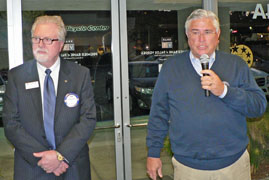 We met with the Palos Verdes Peninsula (Noon) Rotary Club at Premier Bank of Palos Verdes, 4A Peninsula Center in Rolling Hills Estates, Wednesday at 7 PM. Our President John Turner (left above), Senior VP for Corporate Banking at Premier Bank, opened the meeting. PVP Club Pres Greg O’Brien (right above) and DG Lew Bertrand also spoke. A buffet meal and drinks were served by Jeff Earle’s Red Onion crew. We mingled with Rotarians of both Clubs and the bank personnel. |
Pediatric Therapy Network, by Judith Diamond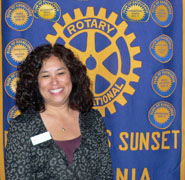 Judith Diamond is the Corporate and Community Relations Manager at Pediatric Therapy Network, since last August. She was a member of its Community Advisory Board for the previous 2 years. Before this, she worked in geriatrics, helping families needing advice on older adult issues, especially housing. She enjoys speaking to community groups and working with organizations, telling people about the Pediatric Therapy Network. She lives in Rancho Palos Verdes with her husband and 2 teenagers.
The Pediatric Therapy Network started 17 years ago, for special-needs children under age 5. It is located near the Depot Restaurant in Torrance, and now has 140 employees, including teachers and therapists for Speech and Language development, Physical Therapy and Occupational Therapy. (Physical Therapy focuses on improving mobility and strength, and Occupational Therapy focuses on improving activities of daily living such as play activities and skills, and on being able to sense body positions in cases of nerve impairment.) Its professionals are affiliated with USC.
There is a clinic for Early Intervention from age 18 months to 3 years, for major developmental disorders such as autism, Down’s Syndrome and cerebral palsy. There is also an Early Head Start program, begun 3 years ago for children in poverty, a major factor in later falling behind in school. PTN works with school districts on developing better social skills.
Programs are family centered, including activities for parents and siblings. There is a Saturday afternoon program for children, to relieve their home caretakers for a few hours. She showed a short video of children in the programs. For the Christmas season they have a toy collection for needy families. There is a summer camp, located last year at Rolling Hills Country Day School. Teenagers volunteer for high school service projects, and enjoy the interaction with handicapped children. Children proposed for admission are evaluated by professionals at the Harbor Regional Center for developmental problems, and are referred to PTN from there.
Volunteers and donations are welcome; see www.pediatrictherapynetwork.org, or call (310) 328-7058. There will be a Cinco de Mayo fund-raiser on Thursday, May 2, 5:30-7:30 PM, at the Marriott Hotel in Torrance, with tickets $20 in advance or $25 at the door, including 2 drinks, tacos, tapas & Spanish music. |
Civil War and the Civil War Trust, by Jeff Dahlgren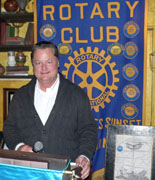 Jeff Dahlgren, Audrey Dahlgren's son, has been interested in history for many years, due to the influence of his teacher mother. He is on the Board of Trustees for the Civil War Trust, and works with the Drum Barracks (named after a Civil War officer) and Banning House in Wilmington. (In his spare time, he is President and CEO of Airtech Advanced Materials Group, producing carbon fiber composites for aerospace and other industries.)
The Civil War Trust, of which he is now a Board Member, is a national organization with 53,000 members, many in California, dedicated to the preservation of Civil War Battlefields and the education of the public about this War. The Board meets 3 times a year. Funds come from private donors and Federal and state governments, and are used to buy selected historical pieces of land from private owners or to obtain historic easements on them, as well as for associated legal services.
Jeff displayed several Civil War artifacts, including a dart-type hand grenade and a ball hand grenade, which were packed with gunpowder and a fuse which was lit before throwing (he said they were warned never to throw it uphill!). He also displayed a long heavy infantry musket and bayonet, and a letter from a captured Confederate soldier. He showed illustrations of numerous examples of battlefields saved from development into shopping malls or residential subdivisions, and also some areas that have not been preserved and were therefore historically lost forever. (The National Park Service manages preserved battlefields.)
On the website, www.CivilWar.org, you can see Google Earth-type images and move them around to feel like you are actually there. The Teacher Institute Series is a two-week curriculum development for classrooms of primary and secondary students. There are apps on smart phones for many of the battlefields. He encourages membership applications at this website, $35 per year.
Tethered balloons for aerial battlefield reconnaissance for military commanders were developed for this war, first by the Union and then by the Confederacy. They were invented by a Prof. Lowe who developed the concept before the war, and none of them were shot down on either side.
He showed pictures of the “Soda Bottle” Cannon, invented by his ancestor, Adm. John Dahlgren, and so called because it was much larger at the breach end to prevent occasional exploding of cannons upon firing (they hate when that happens!). The first rifled cannon (having spiral internal grooves to spin the round during firing for a more accurate trajectory) were developed by the end of the war.
California was intended to be split into North and South, but the Missouri Compromise left it as a single state, associated with the North and non-slave. The San Francisco Presidio and the Drum Barracks in Wilmington were designed as Union Army Headquarters for Northern and Southern California and the then-Arizona Territory. Phineas Banning, a prominent Southern California pioneer and merchant, gave the land in Wilmington to the US government. Army expeditions patrolled the route between Wilmington and Yuma, Arizona (riding dromedary camels, which were well adapted to the desert environment), to protect from an anticipated Confederate invasion from Texas (see www.drumbarracks.org). |
Varda Lancaster Awarded a Paul Harris Sapphire Pin!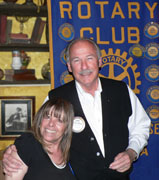
Varda Lancaster was awarded a Sapphire pin for her Paul Harris Society donation ($1000 per year) by PDG Dave Moyers. Thanks, and congratulations!
|
Thinking Outside the Box, by Derek Gable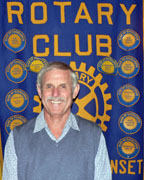 Derek Gable has been a successful inventor and product developer, who has spoken to our Club once before. He has a variety of patents, including one for real estate lock boxes. He was born in England and came to the US in 1968 to work for Mattel. He formed his own company in 1984 to create new concepts and take them to production or sell them.
Among the roadblocks to solving problems are (1) Not wanting to! (2) Stubbornness; (3) Focusing on the wrong problem; (4) Going in circles; (5) Playing a “Yes but.. ” game; (6) Wanting to be right at all costs.
How to be a more creative problem solver: (1) Identify the actual problem; (2) Open your mind to all possibilities; (3) Look for common ground among the group facing the problem; (4) Stop, look, and think; (5) Look for unique approaches; (6) Look beyond the obvious.
He gave the example of his experience many years ago while discussing a problem solution with colleagues in his home. Taking time out to make lunch, he used a salad spinner with a hand crank to dry some lettuce, and realized a possibility for a children’s toy. It became a plastic container with a similar crank for spinning it, and 3 shaped holes on top for a child to put 3 different shapes of blocks matching these holes into the container. The only way to get the blocks out again was to spin this device until the 3 blocks popped out by centrifugal force, allowing the process to be repeated. He sold this idea to Mattel for a large sum of money!
He has provided classes to share his experiences with people who “have this great idea but don’t know what to do with it”. He has spoken to service clubs, social and business groups and on several cruise ships on how to develop more innovative and creative thinking. He encourages us to practice “thinking outside of the box”! |
GSE Program (to Japan), by Eddie Michino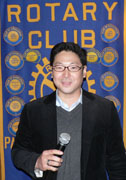
Eddie Michino was a member of the Group Study Exchange from District 5280 to District 26206 in Japan near the famous Mount Fuji, from October 19 to November 20, 2012. The Team Leader was Jewel Price, a member of the Glendale Sunrise Rotary Club and Dean of Student Services at Glendale Community College. The other Team Members were non-Rotarians in their early 30s, including Eddie Michino (our speaker tonight), Angela Kim, Alen Andriassian and Kai Tramiel.
The team members visited businesses and professions of Japanese Rotarians related to their own occupations, in order to share experiences and ideas. They stayed in the homes of Japanese Rotarians and experienced family life and cultural immersion during their 4 weeks. Japanese language lessons were provided to them at Glendale Community College prior to their departure, so they were able to make presentations in Japanese to the Japanese Rotary Club meetings. (5280 DG Lew Bertrand said that the Japanese hosts were so well impressed with the American team and their proficiency in the Japanese language that the Japanese District Governor plans to attend our District 5280 District Conference in May.) Our District is hosting a Japanese GSE team from District 2620 this spring.
Eddie Michino discussed many of their interesting experiences in Japan. The Japanese make very efficient use of natural resources including natural gas, and there are many industries and energy production in this part of Japan. The GSE Team visited the Yamaha musical instrument factory, went to a fish market in the early morning, and saw a Rotarian Buddhist monk in a temple visited by US Commodore Perry on his 1854 Naval Expedition to “open up Japan” to foreign trade. Among other experiences, they visited a tea factory, Mitsubishi Electric Corp, Suzuki Motors, Suntory whiskey production, a sake distillery, educational institutions and the SkyTree tower. They enjoyed a Japanese tea ceremony, listened to a samisen concert (Japanese stringed instrument), and saw many Japanese castles, temples, shrines and museums. |
ShelterBoxes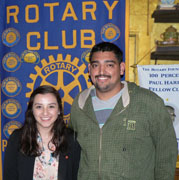
Don Reeves, our New Generations Chair, and 2 Rotaractors, Melissa Gutierrez and Fray Reyes, presented the history of ShelterBox and their Rotaract Club’s fundraising activities at Marymount. (Their Club President, Victoria Perez, was in a lacrosse game at UCLA tonight and could not attend our meeting.) They have a table in the cafeteria with a ShelterBox display and a collection box. Their goal by March 25, with our help, is $1000 for one box (in honor of our late District Governor-Elect Jim Dyer, who was the District ShelterBox Coordinator).
They showed a DVD video of ShelterBox in action around the world. ShelterBox was founded by Rotarians in England in the year 2000 as a partner with Rotary International, to respond to urgent need for disaster relief. ShelterBox USA is in Florida. About 130,000 boxes have been distributed to homeless disaster victims, and our Club, with the help of our Rotaract and Interact Clubs, has raised $7000 for ShelterBox since 2007.
ShelterBoxes were distributed to earthquake victims in Haiti, some of whom are still homeless several years later. Tsunami victims in Japan, Hurricane Katrina victims in the US and war victims in Syria have been among the recipients. ShelterBox personnel are often among the first responders in earthquakes, floods, tsunamis, hurricanes and human conflicts, deploying to 31 different locations last year. (Each donor is notified when/where that box is delivered.)
ShelterBox design has evolved over the years. Each kit, costing $1000, is contained in a sturdy green plastic box that can be carried by 2 people. It contains a durable tent with ground sheet, that can shelter 10 people and is resistant to rain and high winds. There are also a multi-fuel stove, water filtration and storage equipment, blankets, eating and cooking utensils, tools including ax, hammer, wire cutter, pliers and rope, and a children’s activity kit including coloring books and crayons for children who have lost everything. The box itself can be used for secure waterproof storage.
Our Club voted to donate our Happy Bucks and raffle proceeds for this week and next week to this ShelterBox project. To participate or contribute, please contact President Victoria Perez (mmcrotaract@gmail.com) or Don Reeves (dreeves895@aol.com). |
Roger Schamp Receives Paul Harris Society Pin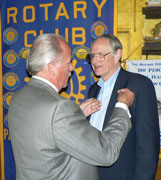
Roger Schamp received his Paul Harris Society pin ($1000 to Rotary Foundation this year) from PDG Dave Moyers. Thanks, and congratulations!
|
District 5280 RCA Camp Pendleton VisitRoger Schamp reported on his March 9 trip to Camp Pendleton with Angi Ma Wong, Ralph Black and Wes Bradford, along with 2 busloads of Rotarians with the District 5280 Rotary Community Alliance (RCA) and hosted by the Camp Pendleton Rotary Club. They brought donations of household items and baby goods for the families of enlisted personnel, and Angi donated a Mongolian Hot Pot and “Reggie” (the “LA Gator”, subject of 2 of her books), plus many copies of her books. They toured the almost-completed Memorial Garden Project (for private memorial services with the families of personnel lost in combat) and the Marine Memorial Wall listing names of Camp Pendleton personnel lost in combat in Afghanistan and Iraq (no ranks mentioned, because we are all equal in death). Both of these were sponsored by the Camp Pendleton Rotary Club, assisted by other Clubs. The group also toured helicopter facilities and heavy weapons, and saw Marines in infantry training. |
Engineers Without Borders — Honduras, Omar Dana, President of USC Chapter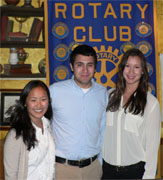
Omar Dana (center in photo), President of the USC chapter, is a Senior Civil Engineering student who is planning a Masters Degree in Construction Engineering. Asia Kane (right) is a Senior Industrial and Systems Engineering student who is Events Chair of EWB and plans a career in Supply Chain Management at Target. Tiffany Kao (left) is a Junior Chemical Engineering student and External Relations Chair for EWB. They described their current clean-water projects in Honduras.
Bob Petak originally put us in contact with the USC Engineers without Borders, and this is their 2nd presentation to us. The concept was started at the University of Colorado in Boulder to address basic human needs such as access to clean water, electrical power, sanitation and education. There are now 250 chapters in 45 countries doing 350 projects. The USC chapter was established in 2006, to provide sustained solutions to real-life engineering problems for those who need it the most. These projects provide them with both practical experience in applying their new engineering knowledge and an appreciation for the social needs of less-fortunate people.
Lack of access to safe clean water affects 1.1 billion people in the world, including one in 5 children. This results in increased infectious diseases, loss of productivity, and children unable to go to school because they are kept busy carrying water for their families from a distant source.
They have finished both of their original projects in Honduras, at La Estanzuela and at Corral de Piedra. They showed a video of their experiences in these communities, where they built small dams and installed pumps driven by waterwheels powered by water flow upstream from where animals drink and wear people are bathing and doing their laundry. They designed and installed pipes over two-thirds of a mile, and holding tanks on concrete foundations, with the help of community volunteers. They also trained community members to operate and maintain the systems to make them sustainable after the students finished.
Their future plans are focused on a nearby community, by enlarging and upgrading the structure of a one-room school which is much too small for its student population, and providing sanitation facilities there. They need interest and support to obtain the equipment and materials they need for this. To offer support, please contact EWB@USC.edu.
|
Avoiding Becoming a Victim of Fraud — John Morris, DA’s Office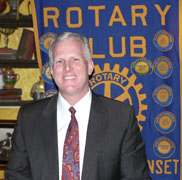
John Morris, a Deputy District Attorney for the Los Angeles County District Attorney’s Office, has worked as a criminal prosecutor for over 22 years. He has prosecuted over 100 jury trials including more than 30 murders. He worked in the Hard-Core Gang Division for 9 years, prosecuting gang homicides. He has also prosecuted robberies, assaults, carjackings and illegal drug sales, and has published 5 articles on legal issues including witness protection. He is now Head Deputy of the Healthcare Fraud Division, going after fraud in Workers Compensation and medical billing.
John spoke to us about protecting ourselves from identity theft, medical record number theft and medical insurance fraud (Los Angeles County is the worst in the US). Criminals use these forms of personal information to steal money from us or from our insurance companies or the government, for which we all pay. These crimes are lucrative because they have lower penalties than violent crimes, and the government budget crunch means nonviolent criminals have to be released sooner and parolees cannot be as well supervised as in the past. Some of these criminals are outside the US jurisdiction, especially in the former Soviet Republics and the Middle East, where some of the money may fund terrorism.
Workers Compensation fraud affects all of us. Contractors must be licensed in California. If they walk away from a project or do not pay claims for construction materials or their workers’ injuries, the property owner may have to pay even if he has already paid the contractor. Contractors are required to have Workers Compensation insurance. You can check their Contractors State License Board (CSLB) license status by contacting (800) 321-CSLB or https://www2.cslb.ca.gov/OnlineServices/CheckLicenseII/checklicense.aspx. You should ask your contractor, painter, plumber, landscaper, gardener, etc, for his Workers Compensation insurance company’s name and policy number, and verify this with the License Board. If the contractor claims he is “exempt” because he is using a subcontractor, obtain the information from the subcontractor. Note: some contractors who have lost their license will manage to find work as a subcontractor to a currently licensed contractor to get around the license restriction.
In Healthcare Fraud, the government assumes the biller is legitimate and typically pays what is billed without verifying the claim. Some criminals do fictitious billing under someone else’s stolen medical record number, which can affect your future insurability and insurance costs. Look at all Explanations of Benefits (EOBs) for any services not provided, or services billed for excessive amounts. Criminals steal information from trash, so never put any personally identifiable information in the trash. Destroy all of your discarded personal information by using a good crosscut shredder, not just strips that can be glued together and reconstructed. Don’t mail cash or checks from your home mailbox, because these can be stolen when no one is watching. Social Security numbers are often stolen for opening fictitious bank accounts.
For your computer information, use a random password with secure PIN numbers and up-to-date security software. Don’t carry your Social Security number or password information in your wallet or smart phone, where they can be used if stolen. Screen incoming phone calls and never give personal information over the phone. One careless mistake can have a high cost in money and inconvenience. Being a victim is embarrassing! |
Student Dance Contest (Recital Videos)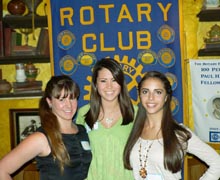
Audrey Dahlgren introduced the 3 dance contestants, Jillian Torres, Marie Bartz & Lauren MacLeod (above). Each student discussed her background and experiences with dance, all starting from a very early age. Each one described how her experiences related to the Rotary 4-Way Test. Then each student presented a video of clips from her past and recent recitals, some solo and some in groups, and in some of them the student had done her own choreography. All of the contestants showed excellent talent and skills, and our Judges Committee had difficulty choosing the winner.
The first presentation was by Marie Bartz, Palos Verdes HS, who started dancing at age 3, participating in ballet, soccer and gymnastics. Last March she was in an auto accident, resulting in back spasms. She is now interested in studying orthopedics for dancers in her future college education.
Lauren MacLeod, Peninsula HS, studied ballet in her early years, stopped for 5 years, and then resumed. She was very shy when younger, but dance has helped her to develop self-esteem and more self-confidence.
Jillian Torres, Palos Verdes HS, described her congenital problem perceiving what people are saying (hearing-perception deficit). Her parents enrolled her in special classes where she was able to learn visually, but she was able to enter regular school by age 6. She became serious about dancing in the 8th grade, and was soon asked to help teach dance to younger dancers. She wants to become an elementary school teacher, and has been accepted to CSU Fullerton.
After the video presentations, the judges announced the winner — Lauren MacLeod, who received a $100 prize and will compete at the District level on March 9 at Loyola Marymount. The 2nd and 3rd place winners received prizes of $50 and $25 respectively. We extended our appreciation to all of these outstanding students and their parents for their hard work. |
Student Art Contest (Paintings and Films)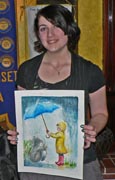 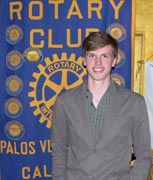
Harriet (Hattie) Pearce, a student at Palos Verdes High School, discussed and displayed 4 of her paintings, and described how they relate to the principles of the Rotary 4-Way Test. She described the importance of providing emotional support to friends in times of sorrow and stress, especially in the context of the recent loss of a classmate. Most of her painting is done outside of school.
Christian Falstrup showed a video of a recent film he has done. He enjoys the collaborative nature of filming, which he started at the age of 11 with 2 friends. This film, “Cards of Time”, showed his life from the past to the present to the future. His younger brother is 11 and looks just like him, so he acted in the past portion. Christian played himself in the present (playing in a band with his friends), and his father, who also looks like him, played the future Christian. He recruits other students for collaboration in the many tasks involved in filmmaking.
Our Club’s Panel of Judges praised the talents of both students. Hattie Pearce was judged the winner. She received a reward and will compete at the District Final competition at Loyola Marymount on March 9. Congratulations to both for their high quality work! |
Chinese New Year's Gala, Saturday, February 9, 2013Angi Ma Wong is coordinating this event (Year 4711 of the Snake), with dinner at the Empress Pavilion in Chinatown at 6 PM on Feb 9, with bus service from Peninsula Center. Wear something red. (The New Year's Day Parade is on Feb 16, but the Empress Pavilion is already fully booked then, and the 9th will be less crowded.)
|
Student Speech ContestAudrey Dahlgren introduced the 4 speakers, the first 2 from Peninsula High School and the 2nd 2 from Palos Verdes High School. Each one spoke about a topic in relation to the Rotary 4-Way Test — “Is it the truth? Is it fair to all concerned? Will it build goodwill and better friendships? Will it be beneficial to all concerned?” The winner will participate at the District level.
Liliana Pond of Peninsula HS discussed her school experiences and her plan to major in nutrition, and then challenged us to think about what we ate in our last meal. One in 6 Americans and one in 4 children would not remember that because of hunger in the US. Poverty and high unemployment in recent years has aggravated this problem. Malnourished children tend to be more aggressive, anxious, and have more illnesses and worse school performance, and higher healthcare costs which we all pay for. They need more access to school breakfast programs. Lower income parents with low educational levels need to be taught how to make more affordable healthy meals at home. She passed out flyers on the issue of ending childhood hunger in America, including access, education and awareness. (See www.nokidhungry.org.)
Henry Zhang of Peninsula HS spoke on the effects and dangers of advancing technology. He called nuclear bomb technology the greatest risk we face in the world today, and called for steps the world community should take to avoid conflict. Past nuclear testing has caused radiation poisoning and deaths in test areas many years later (he gave an example in China). Terrorists are willing to use any means to achieve their objectives, and a nuclear warhead in their hands would be catastrophic. Even one bomb in a major city would cause many deaths and enormous economic dislocations for everyone. With nuclear proliferation, it is increasingly important to prevent these from falling into the wrong hands. We need to create a world not needing conflict to settle differences and misunderstandings.
Alexander Dean of PVHS discussed the differences between arguing and debating. Arguing is conflict, but debate relies on facts and logic to support one’s point. His parents had suggested his going to medical school, but he is more interested in becoming a lawyer, although he would face great competition out there. He discussed his interest in applying law to help others and improve justice to help build a better world.
Arman Madani of PVHS related his experiences participating in the Model UN program, where he learned how to relate to others with different cultures, religious traditions and nationalities (his parents came from Iran). He expressed concern for the decreasing political support for education on the national and state levels, and said the system needs to be changed. Education is only 2% of the Federal budget, much less than Defense and many other government programs, but it is a vital investment in the future strength and prosperity of our country. He discussed issues with standardized testing (teaching rote answers to questions rather than understanding concepts and how to think), and the budgetary loss of many school activities including Model UN. The result is that students are not learning much about the world, impairing their understanding of the future issues and problems that will confront our country.
After the speeches were completed, our Club’s judging committee met to choose a winner for District competition. The members agreed that all speakers were outstanding, and the decision was difficult, but Henry Zhang was declared the winner.
|
PV Sunset Awards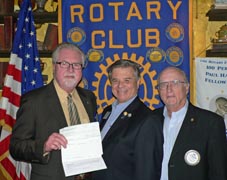 DG Lew Bertrand presented a $7000 District Grant check to President John Turner. Money is used for the Helen Coffey Library at the San Pedro Boys & Girls Club and for reading programs. DG Lew Bertrand presented a $7000 District Grant check to President John Turner. Money is used for the Helen Coffey Library at the San Pedro Boys & Girls Club and for reading programs.
|
Einstein for Everyone! — Robert Piccione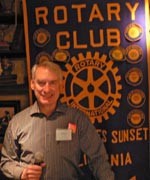
Dr Piccioni has a BS in Physics from Caltech and a PhD in High Energy Physics from Stanford University. He was a faculty member at Harvard University and did research at the Stanford Linear Accelerator in Palo Alto. (His father, Dr Oreste Piccioni, was a prominent high energy physicist.) Dr Piccioni has introduced cutting-edge science to many non-scientific audiences, including service clubs, civic groups, school children, and a National Geographic/Lindblad cruise, making the wonders of our universe accessible to everyone. He has given invited talks at Harvard, Caltech, UCLA, and Stanford University, and is presently giving an 8-week course on Einstein’s theories at the Osher Institute (an adult education program) at California State University Channel Islands and UCLA. His published books include Everyone’s Guide to Atoms, Einstein & the Universe; Can Life Be Merely an Accident? and A World Without Einstein.
Everyone can appreciate music, even if not a musician. The same applies to math, if presented in terms that people can understand. Albert Einstein (1879-1955) was a German-born theoretical physicist who had a slow unpromising start to life. He was slow to talk, and was expelled from the 2nd grade for inattention. He dropped out of high school, but finally got into college on his 2nd attempt. He was the only one of his classmates who couldn’t find a job, so he was supported by relatives. He applied for a job in the Swiss Patent Office, was labeled unqualified after his initial interview, but was later hired anyway thanks to political influence from some friends. In spite of repeated failure, he was persistent and refused to quit. He worked with only paper and pen, never doing any experiment or measurements, but he spent a large amount of time thinking about how the known principles of physics were related.
In 1905, Einstein published 5 revolutionary papers on all major open issues in physics, and in 1907 he got a job as a high school physics teacher. He dealt with problems in statistical mechanics, quantum theory, particle theory, the motion of molecules, and the thermal properties and photon theory of light. He used these ideas to model the structure of the entire universe. One of his papers qualified him for a PhD. In 1913, the prominent German physicist Max Planck stated that there was hardly a major problem in physics to which Einstein had not made a major contribution, and by 1914 he had gotten a university appointment.
Einstein realized that Newtonian mechanics was inadequate to reconcile with the laws of electromagnetic fields, leading to his Special Theory of Relativity. He soon extended this principle to gravitational fields, and in 1916 published his General Theory of Relativity. He was awarded the Nobel Prize in Physics in 1921 for his many contributions.
He provided a definitive proof of the existence of atoms, ending a 2500 year debate. His theory on the photoelectric effect has led to modern technology including solar cells, CCDs for cameras, lasers, DVDs, barcode scanners and telecommunication technology. His Theory of Relativity is used by GPS systems for accurate spatial localization on the surface of the earth. Microelectronics, computers and cell phones benefit from his work. His famous mass-energy equivalence formula E=mc² is the basis for nuclear power and smarter energy (“c” is the speed of light). He showed that mass and energy are different forms of the same thing, and his formula is analogous to using a known currency exchange rate to convert between the values of different currencies.
Dr Piccioni reviewed the enormous amount of energy contained in physical mass. For example, annual US energy use is equal to one ton of mass, which contains energy equivalent to 25 trillion kWh, or 5 billion tons of coal, or 2 billion tons of gasoline, or 133 tons of hydrogen, the latter form producing no pollution from combustion. He discussed the generation of nuclear energy. Energy can come from either making big atomic nuclei smaller (nuclear fission, which is radioactive), or by making small atomic nuclei bigger (nuclear fusion, which is not radioactive). This would be 40 million times more efficient than coal, with no pollution. Nuclear fusion has been under study for decades because of its enormous potential if achievable. A private company in Chicago states that it has found a non--fusion technique for producing nuclear energy that could possibly become a commercial process in 5 years.
Dr Piccioni reviewed his published books (listed above), of which he had samples for purchase after the meeting. His website is: http://www.guidetothecosmos.com/.
|
Reading Intervention Program at Miraleste Intermediate, by Beth Hadley
Beth Hadley grew up in Ohio and attended Syracuse University in New York. She has taught in private and public schools in the Los Angeles area, and joined the Palos Verdes Peninsula Unified School District in 1995. She has been the Principal at Miraleste Intermediate School since 2009, and is married to an educator. Miraleste is a former high school, and has facilities not usually available in an intermediate school, such as art and computer facilities. It has 930 students, some of whom have moved into the Palos Verdes area for the good schools and are not as well prepared as PV students. There is good parental support, which has provided funding for new lockers and other needs to help in times of tight budgets. Mrs Hadley described the new Lexile program at her school. The Lexile Framework for Reading (by MetaMetrics) measures both reading ability and text difficulty on the same scale, in order to match text difficulty-level to the reader’s current ability, rather than arbitrarily by age or grade level. The scale ranges from 200 for beginners to 1700 for advanced. All students in all 3 grades at the school completed this testing 2 months ago. Text difficulty is measured by a formula related to sentence length and word frequency. The large book database can be searched for titles in the student’s Lexile range in the student’s areas of interest, to provide a list of titles for the student to look for in the library or bookstore. Teachers can compare the Lexile level of the classroom textbook with the Lexile levels of students in the class, and parents can also use this measure to provide appropriate reading levels for their children at home. This individualized process of matching reading material to the student’s level provides faster development of good reading skills, avoiding material that is either too simple and boring, or too difficult and frustrating. The Common Core State Standards is a clear set of K-12 standards, adopted by most of the states including California to ensure that all students graduate from high school ready for college and careers. Over the last 50 years, the text complexity of K-12 textbooks has become increasingly easier while the text demands for college and careers have remained constant or even increased. The resulting gap causes deficiencies at the beginning college level, requiring more remedial courses (a current state budget issue). Mrs Hadley is excited about the potential of the Lexile Program to enhance educational performance at Miraleste, which is well-positioned for new state standards coming in 2014. Reading skills are taught in all classes, not just in English. There are also some computer programs for individualized remedial help in math. The school has an adequate number of textbooks, but they are old now due to budget constraints. Replacement is planned in the near future. Among other school activities, the students are developing a musical performance, including both costumes and orchestra. |
Jim Gamble, Puppet Show for Pediatric Cancer Patients (“The Show Must Go On!”)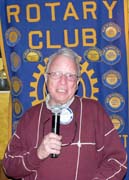
Jim Gamble presented a video of a puppet show he did at Long Beach Memorial Miller Children’s Hospital in about 1994. He had been invited there by a flight attendant to visit Joey, a cancer patient there. Jim created a hand puppet clown, “Ruffles”, who would ask a group of the children about their shots, chemotherapy, and medical procedures they had experienced in the hospital. The children spoke with the puppet with more frankness and confidence than they could have if speaking directly with an adult.
The children listened to the puppet’s chest with a stethoscope, checked his throat with a tongue blade, and described their hospital experiences in their own words. They talked about undergoing bone marrow sampling, lying on a radiation table, or showing him their artificial leg prosthesis. They were remarkably cheerful in spite of their medical problems and the scary feeling of being away from home in a strange hospital.
Joey was older than most of the other children. During the filming, he grabbed the mike and took over the show, stating, “Now I’m in charge, so I’ll interview Ruffles!” The clown asked Joey a (dumb) question, “What’s the smartest thing in the world? A Thermos bottle — it keeps hot things hot and cold things cold!” Joey responded, “But how does it know which it is?”
A few months later, Jim was doing a puppet show at the Jonathan Club in Los Angeles. One of the men recognized him and introduced himself, stating he was the father of Joey. The father stated he had had a hard time letting Joey go (Joey had died), so he often put the video cassette on the player in the evening to help him remember Joey, and fall asleep listening to it. One night before falling asleep, the father heard Joey again responding to that dumb joke, and stating that he was a lucky kid with good parents and excellent care, and that no matter what, he felt that he could handle it! At that point, the father said, he could finally let Joey go. Jim Gamble finally realized the value of that special friendship he had made there in the hospital with Joey; you can’t predict how much your actions can mean to someone! |
San Pedro/South Bay Assistance League, by Marcia Hebert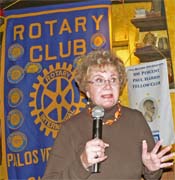
Marcia Hebert has been a longtime member of the San Pedro-South Bay Assistance League. She manages public relations for the League and has served as its president.
The Assistance League was founded in San Pedro in 1936 to provide volunteer services to help needy children, families and seniors in the community. It started during the depression, with a group of women deciding to rent their expensive homes to the movie industry to raise money for assisting the needy. (Other chapters have been founded all over the country since then.) This chapter’s funding is provided by donations as well as from the proceeds from an all-volunteer Post Office (the only one in the US), a Gift Shop and a Consignment Shop. (The Post Office reminds you that postage is going up on January 27, so stop in now!)
The Assistance League has a Dental Center that provides general dental services to children for a $10 fee, and refers orthodontic services out with chapter support. Teddy bears are provided to hospitalized children, with hugs. Layette sets are provided to local hospitals for distribution to needy new parents.
Operation School Bell gave 2 sets of school uniforms to 2000 school children last year, plus backpacks containing school supplies, a book and hygiene supplies. Children are often self-conscious when they lack family resources for school uniforms and supplies. Budget cuts have reduced financial resources available to schools, so they refer them to the Assistance League. Volunteers go to the schools to determine the children’s appropriate sizes for clothing and shoes. These children are very excited to have their “own stuff”.
The Assistance League also provides clothing and support for assault victims seen at emergency departments, because the victims’ clothing must be left there as forensic evidence.
The Assistance League is located at 1441 W 8th Street in San Pedro, (310) 832-8355. More volunteers and donations are always welcome. The website is: |
Christmas Holiday Celebration Warner Grand Theatre & Annex, San Pedro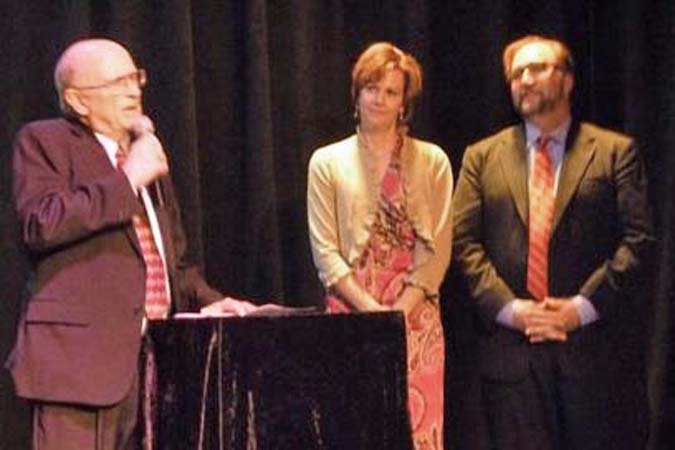
Marymount College President Dr Michael S Brophy and his wife, Tara Brophy, were honored for their community service as a part of our PV Sunset Rotary Club’s Holiday Celebration. Dr Brophy, an Honorary Member of our Club, has been President of Marymount College since 2006. Under his leadership, the College increased its enrollment by 70% and transformed from a two-year into a four-year multi-site educational institution. Tara Brophy, an active community volunteer and member of Vistas, chaired the 2010 Success by the Sea fundraiser for scholarships at Marymount College. Don Reeves, Past President of PV Sunset, introduced them at a VIP Reception and presented them with gifts of a crystal piece and a bouquet.
Jennifer Kain checked in the attendees at the Grand Annex. The Rotarians and guests were served at a buffet line provided by Jeff Earle and his intrepid Original Red Onion crew, and were lubricated by drinks served by bartenders Astrid Naviaux and Angi Ma Wong. At 8 PM, a Holiday Concert of Christmas music was performed in the Warner Grand Theatre by the Golden State Pops Orchestra. |
District Visionary Awards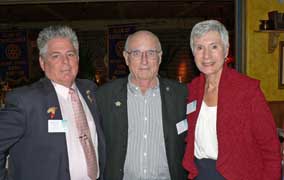 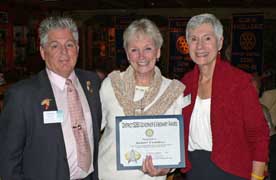 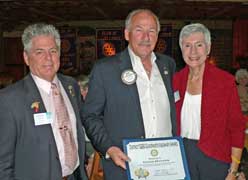
DG Lew Bertrand announced District Visionary Awards for exemplary service to Rotary (presented by Dean Reuter and Elsa Gillham), to Don Reeves, Sandy Farrell and PDG Dave Moyers. Congratulations to all! |
Induction of Russ Schaadt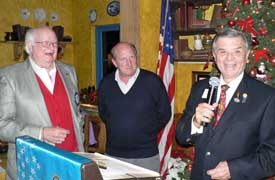
Russ Schaadt was inducted into Rotary by DG Lew Bertrand, accompanied by sponsor Chris Kilgore. Congratulations, and welcome to the Club! |
District Governor Lew Bertrand’s Visit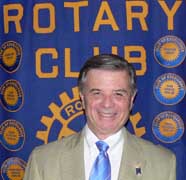
This is DG Lew Bertrand’s 65th (and last) official Club visit in District 5280 (not to mention continued attendance at his home Club), after traveling about 5500 miles. (He’s done so well circulating around this newly expanded District, that he still has time to visit them all again before his term ends in June!)
He quoted Rotary International President Sakuji Tanaka (who grew up in Japan during and after World War II and remembers the aftermath of the atomic bomb), saying the concept of peace differs among different people and cultures, but service to others is a way of life that unites us all. In Myanmar, where Rotary and other service organizations were expelled many years ago by the military government, Rotarian JT Warring of the LA5 Club initiated a clean-water project for orphanages in 2005, after noting on a brief visit that the children were drinking contaminated water. Myanmar’s government is now starting to open up to the outside world again, Rotary will soon become reestablished there, and Mr Warring has received Rotary International’s “Service Above Self” award.
DG Lew related an incident he remembers many years ago, when he was a guest speaker at a Lions Club; he recognized the owner of the facility there and asked him why he wasn’t wearing his Lions pin, and he replied that he was not a member because he had never been asked! Within several weeks, he became a Rotarian under Lew’s sponsorship. The most important principle for promoting Rotary membership is to ask people! All of us know good people who are not Rotarians but could become future Rotarians if asked.
Lew remembers a school classmate who had become sick, was admitted to the hospital, and died of polio the next morning. Parents in the 1950s were fearful of letting their children go to public places, even to school. In the 1970s, Rotarians in the Philippines developed the idea of immunizing some village children against polio, when there were 350,000 cases per year. This was expanded internationally in Rotary, and PolioPlus was formed. In the latest Gates Foundation funding challenge for polio, Rotarians met the $200 million goal by January 2012, 6 months early, and Bill Gates was so impressed that he donated another $50 million check. India is now polio-free, and only 3 more countries have cases. The Rotary Foundation promotes a donation goal of “Every Rotarian Every Year”, to finish the challenge of worldwide eradication of polio.
As an organization, we can leverage our ideas far beyond what an individual can achieve, changing lives by service and making the world a better place. DG Lew closed with some lines from his Noah’s Ark philosophy. We are all in the same boat. Plan ahead. Build on high ground. No matter what storm comes, you can survive it. Noah’s Ark was built by amateurs, and the Titanic was built by professionals! |
Club Assembly & Elections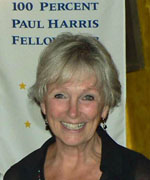 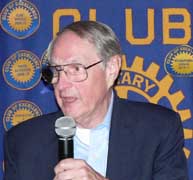
President-Elect Sandy Farrell presented the Nominating Committee’s slate of nominations for our Club’s officers for next year, 2013-2014. The nominations were approved by vote of the members present. The PV Sunset Rotary Board Members for 2013-14 are: Immediate Past President: John TurnerPresident: Sandy Farrell
Non-Board Positions: Greeter: Betty ReiderHappy Bucks: Varda LancasterScrapbook Historian: Sue TyreePhotographer: Pilar HaleCoordinator of the Awards Reports: Lew Bertrand |
PDG Dave Moyers presents Paul Harris Foundation Awards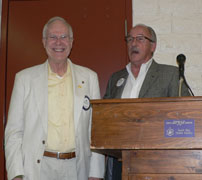 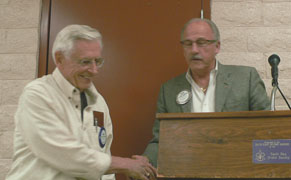
Robert Little (PH+1, ruby), Larry Andrews (PH+, sapphire), Chris Kilgore (PH+5, 5 sapphires), and Astrid Naviaux (PH+8) received Paul Harris Foundation awards. Thanks and Congratulations to all 4 generous donors! |
South Coast Botanic Garden, by Peter Olpe & Adrienne Nakashima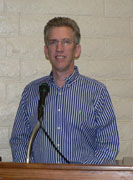 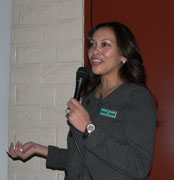
Peter Olpe, Secretary of the Board of Trustees of the South Coast Botanic Garden, is a software engineer with his own company, specializing in creating apps for electronic devices. He began with a discussion of the local area’s history prior to the establishment of the Botanic Garden.
25 million years ago, the Palos Verdes area was under water and populated with sharks, diatoms and other marine species. The microscopic diatoms, with silica shells, grew in abundance and sank to the bottom after dying, creating a thick layer of diatomaceous earth. By 1.5 million years ago the land began rising into an island (similar to the other Channel Islands). 15,000 years ago the Palos Verdes Island joined the mainland as the Los Angeles basin rose out of the ocean.
In 1542, the first Europeans arrived with Juan Cabrillo of Portugal, who named the future harbor area “Bay of Smokes” (because of campfire smoke in the basin during an inversion layer). In 1602, Sebastian Viscaíno arrived on St. Peter’s feast day and renamed it San Pedro. The Tongva (Gabrieliño) Indians controlled the area until the early 1800s. In 1784, Juan José Dominguez received a 75,000 acre Spanish Land Grant in the South Bay & Long Beach areas, called Rancho de los Palos Verdes; these land grants were provisional, and would revert to the Spanish government if its terms were not satisfied. He allowed the Sepulveda family to use half of this land for cattle grazing.
After 1821, when Mexico won its independence, conflicts arose over who owned the land grants, and the 2 families divided this area, with Sepulveda getting the South Bay area and Dominguez getting the Long Beach area. In 1846, the US declared war on Mexico, and California came under US rule. These 2 families litigated over who owned the South Bay land, but in 1880 Sepulveda, now broke, finally received title to this part of the land. His mortgage broker, Bixby, acquired this land and leased some of it to Japanese farmers.
In 1913, Frank Vanderlip, President of the New York National City Bank, bought 16,000 acres (the Palos Verdes Hills) sight-unseen, to build an exclusive coastal residential property for the wealthy. Then the Dicalite Company began mining diatomaceous earth in northern Palos Verdes. (Palos Verdes has the world’s richest collection of diatomaceous earth, which is used for abrasives and many other purposes; the cliff on Hawthorne Boulevard where it enters Torrance shows an existing example of these deposits.) The Great Lakes Carbon Corp leased 300 acres in 1944, including the site of today’s Botanic Garden, for open pit mining (its president was George Skakel, father of Ethel Kennedy). In 1951, he requested more mining area on the top of the hill. Frank Vanderlip sold 7000 acres to Great Lakes, which then closed its mine and went into real estate development, forming the cities of Palos Verdes Estates, Rolling Hills and Rolling Hills Estates. (The city of Rancho Palos Verdes was formed from the remaining areas of the “Hill” in 1973, to protect the coastline from unlimited development.)
Adrienne Nakashima, the SCBG Foundation’s CEO, began as a high school volunteer at the South Coast Botanic Garden, and worked in nonprofit organizations for years before returning here. She now leads the effort to further develop this beautiful and restorative urban oasis on top of what was once a landfill. She discussed the history of how this beautiful facility was founded.
In 1957 the original mining pit was sold to the County of Los Angeles to use as a trash dump, to reduce smog in the Los Angeles basin from burning trash. In 1959, Frances Young convinced the County to create a botanic garden over the dump, and founded the South Coast Botanic Garden. 3 feet of topsoil was eventually layered on top of 3.5 million tons of trash, which originally produced a large amount of underground heat, methane and ground settling (resulting in the uneven surface now seen in the parking lot and entrance drive). 400 volunteers planted 42,000 plants, and the Los Angeles County Supervisors held a dedication ceremony.
The County owns the land, but the SCBG Foundation runs and operates the facility. Soon a Children’s Garden was formed, a greenhouse was built, a tram was obtained, a lake for ducks was created, and the Hall and Administration Building was constructed. A new tram was obtained in the 1990s, and development has continued with a Rose Garden, Gift Shop, educational programs, Japanese Garden, Discovery Garden, and recently a new electronic marquee at the entrance on Hawthorne Boulevard. Many public events are held on site, and annual memberships are available. More volunteers and donations are needed. New renovations are continuing with a design group developing a 25-year plan, with community participation into its goals. The website is http://southcoastbotanicgarden.org/. |
Peninsula Seniors, by Ann Shaw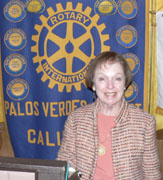
Ann Shaw is the President of Peninsula Seniors and has been a Board Member since 1999. Her community involvement goes back to 1968-1973 when she was a member of the “Save Our Coastline” movement to incorporate Rancho Palos Verdes to save it from pending high-rise residential development, and she served on the first RPV City Planning Commission. She was a Member of the RPV City Council 1977-1983, and was Mayor in 1979-1980. Other activities have included the League of Women Voters and the American Association of University Women. She had been a Computer Programmer for the National Security Agency and for Shell Oil. Then she worked in banking and as a financial planner until 2000.
Peninsula Seniors is a non-profit organization with a volunteer Board of Directors. Its mission is to offer activities and services that enhance and enrich the lives of senior adults living on the Palos Verdes Peninsula and in surrounding areas. It was incorporated in 1982 and is self-supporting. Among its activities are blood pressure monitoring, podiatry care and caregiver support groups. There are educational and informative lectures, games, creative writing classes, and group movie attendance (elderly people are often reluctant to go to movies by themselves). Exercise programs and yoga classes are available. There are day trips to cultural venues, and overnight trips to historical locations and events. Special events include monthly theme parties, Birthday Bashes, and Let’s Do Lunch.
Professional volunteers can provide some financial, tax and legal counseling, advocacy and support groups. There are arts and crafts, transportation arrangements such as Dial-A-Ride, and an AARP Mature Driving program. Potential future programs include group meals, counseling, intergenerational programs, and help with medical and mental health, Social Security and Medicare. They may do Alzheimer’s day care, home-delivered meals to senior housing, in-home supportive services, and respite care. Some activities are open to nonmembers.
These activities are run by volunteers with a variety of skills, and more volunteers including professionals are welcome. Donations and grants are also needed. (The city of RPV has donated $5000.) The current location is at the RPV City Hall site, but a new permanent location is being sought in Peninsula Center, and a new more-stable financial structure is needed. None of the 4 Palos Verdes cities has a Senior Services Department, so these services are especially important with the increasing average age of the community residents. There are about 1000 members now. More information is available at the website, www.pvseniors.org. |
Omnilore (Learning in Retirement), by Linda Jenson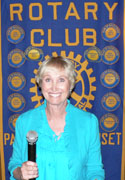
Linda Jenson is Membership Chair for Omnilore, a volunteer organization for study groups for seniors. Linda is a retired Labor and Employment attorney. She graduated from UCLA Law School and taught there for 2 years. After retirement from a law firm, she has done volunteer work for foster children, Meals on Wheels, a community garden, and on the Board of Directors for 2 nonprofit organizations.
Omnilore started in the 1990s and now has 320 members, age 50+. There are 3 trimesters per year, starting in September, January and May. Classes meet for 2 hours twice a month for 4 months, in the morning and afternoon of workdays. Each student in a class prepares and gives a 20-40 minute presentation on the subject related to that course, followed by class discussion. The group meets informally around a table, with no instructor, but one of the group acts as a coordinator. Subject areas for classes can be proposed by students, in areas such as the arts, government/geopolitics, history, literature, philosophy/religion, science/technology, and social sciences. About 20 topics are selected by a committee. At least 8 members must choose the same subject in order to form a group for that topic.
There is also a Lecture Series twice a month during the Fall and Spring Trimesters, held at the CSU Dominguez Hills campus by its professors on a given topic. Omnilore also has Forum Luncheons, field trips associated with a discussion group, hiking, and certain special interest groups such as computers, as well as a newsletter.
Omnilore is run by volunteers and costs $120 per year. It is governed by officers elected by the members and has no paid staff, but is part of Osher Lifelong Learning Institute (OLLI) in the College of Extended and International Education at CSU Dominguez Hills. Prospective members attend a 90-minute orientation meeting. Groups meet at the Franklin Center at 850 Inglewood Ave in Redondo Beach (3 blocks north of 190th St). New members are advised not to start with more than one course per trimester, to see the amount of time required.
Linda Jenson discussed some representative topics from the recent list of classes. One of them was “Greatest Movies” (by various criteria). Another topic was “Book Discussions”, and another was “Why Nations Fail”. Current list of classes and other information is available at (310) 370-9522 or www.omnilore.org. |
South Bay Literacy Council, by Mary Hirsch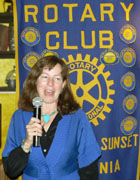
Mary Hirsch serves as a volunteer tutor and is Chair of the Fund-Raising Committee for the South Bay Literacy Council. She graduated from the University of Wisconsin at Madison and has a Masters in Public Administration from CSU Hayward. She has taught K-12 classes and worked as a counselor as well as in human resources, YMCA, and the Recreation and Parks Dept of Rancho Palos Verdes.
She began tutoring when a young Vietnamese woman asked her if she could help teach her mother to read English. Mary has found great fulfillment in seeing how empowering the ability to read is for illiterate adults. She remembers one young man who was doing fairly well in high school, but admitted in class that he was unable to read; he had gotten along by listening carefully in class, dictating what he remembered at home to someone typing out his notes and reading them back to him, and his assignments were always neatly typewritten.
Half of the adults in California are functionally illiterate, unable to read and write at a level required for competent function in modern life. They can’t read ads, manuals, signs, labels, instructions, maps, letters, receipts or menus, or write checks. They cannot fill out employment applications or perform work above menial labor. 70% of prisoners are functionally illiterate, and 75% of unemployed adults have literacy difficulties. Illiteracy results in low productivity, work absenteeism, workplace accidents and poor product quality. Many have dropped out of school because of poor performance and frustration, and some have trouble speaking and reading English because they came from another country speaking a different language; some of them never learned to read and write effectively in their own language.
The South Bay Literacy Council started in 1981 and has students and volunteer tutors in 16 South Bay cities. The Literacy Council is looking for volunteers for tutoring in its office (24564 Hawthorne Blvd at Newton Street in Torrance) or in private study rooms at a public library near the volunteer’s or student’s home. Volunteers receive 18 hours of free training and commit to tutoring at least 4 hours a week for one year. Volunteers need to be able to speak, read and write English well, be sensitive to the needs of adult learners, and respect confidentiality. A teaching background is not required.
Incoming students are evaluated and then placed with a suitable tutor. There are 50 students on the waiting list for English as a 2nd Language, who cannot be placed yet because there are not enough tutors. The Literacy Council produces an Annual Report on the distribution of locations and origins of its students and volunteers, funds raised and budget expenditures. Students are referred by word-of-mouth and, interestingly, from libraries. More volunteers are needed, and donations are always welcome. Please see the website at www.southbayliteracy.org or call the Literacy Council at (310) 373-7003. |
Jacques Naviaux receives his Sapphire Pin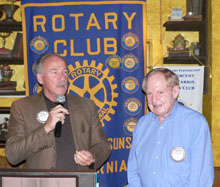 Jacques Naviaux received his Sapphire Pin, the 6th donor level to the Paul Harris Foundation, from PDG Dave Moyers. Congratulations and thanks to Jacques for his generosity! |
Travel Tips and Makeups, by Roger Schamp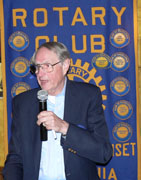
Roger Schamp discussed his July and August 2012 trip to Eastern Europe. He reserves hotels more than 6 months in advance, to save 25-30%, and is already planning a trip for May 2013. Concerts in foreign countries, as well as here, often fill up early and also need to be reserved in advance. However, airline flights are often full nowadays by the time that their fares would be “cheapest”.
His travel tips include planning far ahead, using public transportation, city audio-guides rather than tours, eating with the locals (if you can find where they are), packing light, not over-scheduling, and keeping a log of your photos so you know what they are after you return. He also distinguishes between stopovers (one night, with a simple clean and quiet hotel), and destinations, with a better hotel near what he wants to see. He advises staying 4-5 days in a large city and up to 3 days in a smaller city. Local people are very helpful for managing public transportation, which is usually inexpensive in Europe.
He packs light, including one carry-on and one personal item (a bag on a strap for immediate access). He carries a small notebook computer with Wi-Fi (which is often available free except in some hotels), and carries a small GPS unit which has maps of most of Europe and North America. Take charging equipment for your electronics, and don’t leave it behind anywhere. He brings a few clothespins, to help close the window drapes when he wants to sleep. He has a repair kit for glasses, and brings an extra pair of glasses as a precaution. He also has a small battery ultraviolet light to disinfect hotel-room items like remotes and doorknobs. He has a pocket battery timer/alarm with 5 separate times, as a reminder for events or awakening from a nap. He uses zip lock bags for carrying maps, so they are easy to find. He uses a separate Manila folder for each city, to keep hotel reservations and other information. He takes few clothes and only one pair of comfortable lightweight walking shoes (Rockport).
Roger discussed briefly the main sites he found interesting in each of the 6 cities he visited this year: Krakow, Warsaw, Minsk, Vilnius, Riga and Tallinn. These cities were more modern than he expected, and he enjoyed visiting their museums, parks, old town areas and shopping streets. (He passed around a photo album of his 200 “favorite” travel pictures.) Minsk was very big and modern, with cheap transportation and food but expensive hotels, and few Americans. He found that Minsk has no Rotary meetings in July, but he still managed to meet some Rotarians there. He enjoyed Rotary meetings in other cities and met other Rotarian travelers. These Clubs were all different from each other and from ours (there is of course no “Pledge of Allegiance” in foreign Rotary Clubs). Roger recommends traveling to visit other cultures, and enjoying Rotary as you go.
|
Explanation of Ballot Initiatives II, by Katy Watkins, League of Women Voters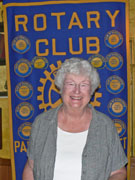 Katy Watkins is a former senior software consultant for large complex computer programs. She has been active in the League of Women Voters, speaking to groups on the pros and cons of the 11 Propositions on the California ballot in November. The League of Women Voters is a nonpartisan organization that does research on government policy positions but takes no partisan stand on Propositions or Candidates (although its government policy review committee occasionally produces advisories on public policy directions). She reviewed the features of 3 of the Propositions tonight. Prop 32 would prohibit unions, corporations, government contractors and state and local government employers from using payroll-deducted funds for political expenditures. It would not limit a corporation’s or union’s ability to spend money on independent expenditures outside of payroll deductions. Supporters say it would protect employees’ paychecks from political donations by either unions or corporations. Opponents say that 99% of California corporations don’t use payroll deductions for their political contributions anyway, so Prop 32 would only affect unions, and it would exempt Business SuperPACs and Independent Expenditure Committees from these controls (unilateral disarmament?). Prop 37 would require labeling of genetically-engineered foods, and prohibit marketing such foods as “natural”. About 40-70% of foods now contain some genetically modified ingredients, designed for purposes such as improving a plant’s resistance to pests or to withstand higher levels of pesticides. Exempted foods would include non-genetically-engineered animals given genetically-engineered feed, foods sold in restaurants, alcoholic beverages, and certified organic foods. Supporters say that consumers deserve the right to know, and that genetic engineering of plants and animals may cause unintended consequences and adverse health and/or environmental effects, some of which may not become evident for many more years (as happened with past interventions such as DDT). They also say that food already has to be labeled, and telling the truth on those labels would cost producers very little. Opponents say this would require extra monitoring of foods and open the door to frivolous lawsuits, potentially making such foods more expensive. Prop 39 would require multistate businesses to pay state income taxes based on the percentage of their sales in California. (The option to avoid state taxes was a result of the 2009 state budget deal allowing out-of-state businesses to base their state taxes on the amount of their payroll and property in California, which creates an incentive for multistate businesses to move their property and jobs out of California to escape taxes while doing business here in competition with local businesses, and costs the state government about $1 billion in revenue annually.) For the first 5 years, one half of this increased revenue would go to improve California energy efficiency and alternative energy projects. About half of the remainder (and half of the entire amount after 5 years) are guaranteed under Prop 98 to go to K-12 schools, which are struggling with budget shortfalls now. Supporters say that large corporations should pay their fair share at a time when there have been drastic state and local budget cuts, and that taxpayers will benefit by funding energy-efficient projects at schools and other public buildings. Opponents say this $1 billion tax increase could cause a loss of jobs (although in-state businesses already pay these taxes). Katy answered numerous questions and stayed after the meeting for more questions (she did not take a stand on any of these issues). |
Festival del Corazon
The Festival del Corazon on Sunday, October 14, at the Norris Pavilion was a great success. PDG Dave Moyers was MC, and we were entertained during dinner (catered by Jeff Earle) by Mariachis and Folklorico Dancers. Chuck Hanchett won the $2000 one-week cruise for 2. Jim Gamble bid $400 for a carpet donated by Mehdi Bozorgzad. One of Jeff Earle’s guests bid $1800 for a dinner for 50, served at home by Jeff Earle. Thanks to our many generous sponsors and to the donors and bidders for our auction and silent auction.
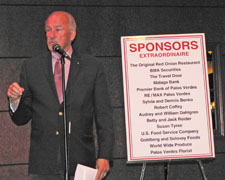 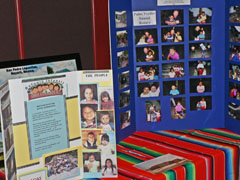 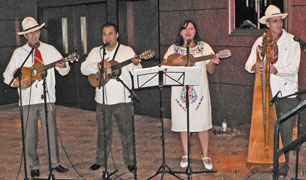 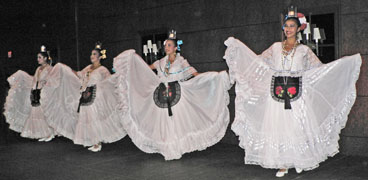 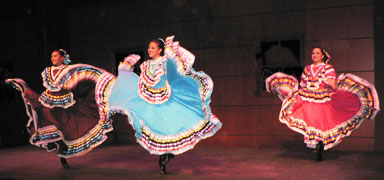
|
Jay Luedde Inducted Back into Rotary by District Governor Lew Bertrand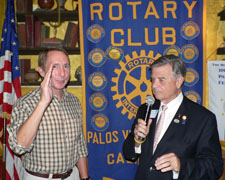 Jay was our Club President when Lew Bertrand joined our Club (November 1998), and Lew reminisced about both of them riding their bicycles from Irvine to San Diego to raise $3500; they took the train back. (Jay, a local dentist, later dropped out of Rotary to spend more time with his growing family, but they are teenagers now and he is ready to take the plunge again.) Welcome back to our Club, Jay! |
Explanation of Ballot Initiatives I, by Jo-Anne Waller, League of Women Voters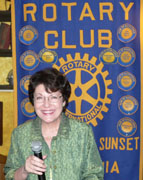 Jo-Anne Waller grew up in Connecticut, obtained an undergraduate degree in Physics and a Masters degree in Math, and then became a high school science teacher. Her family moved to California in the 1970s and has lived in Palos Verdes since 1999. She has been busy recently speaking to many community meetings on behalf of the League of Women Voters to explain the 11 Propositions on the California November ballot. The League explains but does not take partisan sides on political issues. Tonight she covered Propositions 30 and 38, competing temporary tax measures to fund public education. Prop 30, sponsored by the Governor and Legislature, would increase taxes on earnings over $250,000 for the next 7 years, and increase sales taxes by ¼% for the first 4 years, to fund public schools and State Colleges and Universities, increasing revenue by an average of $6 billion per year. (Since the passage of Prop 13 in 1978 limiting local property taxes, much of local school funding has come from the State government to compensate for their revenue loss, but this revenue transfer has been restricted in recent years due to State budget deficits.) If Proposition 30 does not pass, automatic additional spending cuts of $6 billion, much of it to education, will be triggered immediately in order to maintain State budget balance. Prop 38 is a competing tax measure placed on the ballot by petition signatures. It would increase taxes on earnings for the next 12 years using a sliding scale ranging from 0.4% for joint filers’ taxable income over $14,632, to 2.2% for over $5 million, and would increase revenues by about $10 billion per year. For the next 4 years, this revenue would be allocated 60% for Schools, 10% for Early Care and Education, and 30% for State debt payments; for the remaining 8 years, this revenue would be allocated 85% for Schools and 15% for Early Care and Education. There would be no additional revenue for State Colleges and Universities. None of the additional revenue would be discretionary for the State General Fund. If both of these Propositions pass, the one receiving the most votes would be implemented and the tax revenues of the other Proposition would not be implemented. Either Proposition would automatically terminate at its specified sunset date. Jo-Anne answered numerous questions and stayed after the meeting for more questions (she did not take a stand on either of these issues). At our next week’s meeting, some of the remaining nine Propositions will be discussed by Arlene Block, also from the League of Women Voters. |
Writings of Warren Buffet, by Jeff Pierce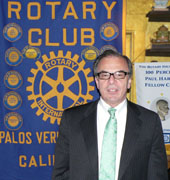 Jeff Pierce is a Financial Advisor at Stifel Nicolaus Financial Services in Newport Beach. He has an MBA from the University of Southern California and is a Certified Financial Planner. He and his partner, Ken Hansen, developed a 4-hour miniseries for clients on the criteria used by the famous successful investor Warren Buffet to identify companies to invest in. (This presentation is a synopsis of that.) He recommends buying a paperback book (or Kindle version) co-authored by Mr. Buffett, The Essays of Warren Buffett: Lessons for Corporate America, 2nd Edition (2008), available at www.Amazon.com. Mr Pierce reviewed the concepts of ETFs, Asset Allocation, Portfolio Rebalancing, Absolute Total Return, and Derivatives. He started by discussing Modern Portfolio Theory, a pioneering work in 1952 by Harry Markowitz, a student at the University of Chicago. Markowitz developed a mathematical way to think about asset risk, return, correlation and diversification on probable investment-portfolio returns, based on the concept of the standard deviation of the market price over a period of time. Greater fluctuation meant increased risk. Balancing a portfolio to allow fluctuations of the different components to cancel each other out would result in less total volatility and therefore lower risk. Mr Pierce contrasted this with the commonly understood concept of risk, as the possibility of loss or injury. Potential loss of money is how Warren Buffett defines risk. The beta of a stock is a measure of its past volatility. A stock is typically considered to be riskier after it has dropped, but Warren Buffett made his money buying good companies when their market price was low! He looks at good companies (whose business he can understand), and tries to buy them at their low points, so more volatility helps him get a better price. He avoids complex new high-tech companies if he does not fully understand their products; although a few are these may do very well, many others crash and burn, an illustration of risk. In real estate, you don’t need frequent reappraisals of a property, and the same goes for stocks (closely following day-to-day fluctuations). Warren Buffett looks for sound businesses with competent and honest management, a good return on shareholders’ equity, and an attractive price. He also looks at cash flow and debt (whether living on borrowed money), in order to know where cash flow is coming from and understand the company’s long-term prospects. He avoids big-growth stocks that he does not understand well. This is a disciplined and consistent philosophy that has served him better than the hot tips and investment fads of others. Mr. Pierce’s office is in Newport Beach, phone 949-252-1324, or pierceja@stifel.com. The company’s website is http://www.stifel.com; look for the Newport Beach branch. |
Panel on Comprehensive Health Care, moderated by Kathy Gordon, RN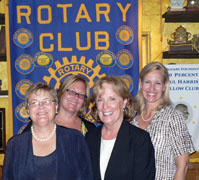 (Pictured L to R: Debrah Wonder, RN; Lisa Kats, RN; Kathy Gordon, RN; Diane Blagojevich, RPT) Sandra Farrell introduced the moderator, Kathy Gordon, RN, who introduced the other Health-Care Panel members. Kathy Gordon, RN, is retired from Providence Little Company of Mary Hospital in San Pedro, where she supervised compliance with State and Federal regulations and Medicare guidelines. She enjoyed teaching and being an advocate for patients and their families after hospital discharge to Home Care and Hospice. Debrah Wonder, RN, described Medicare Fee-For-Service and hospital Diagnosis-Related Groups (which involve a lump sum paid to the hospital for an illness episode), and requirements of the new Health Care Reform in which Managed-Care plans will be required to send in itemized statements to Medicare just like for Fee-For-Service plans, for assessing value received. You can look at the Medicare website (http://www.medicare.gov/) for patient information and resources related to Medicare. You can find patient satisfaction and performance ratings of providers, hospital readmission rates, hospital mortality rates and other parameters. The new Accountable Care Organizations are being organized by providers to more completely coordinate their care, for bundled combined payments to the hospital and doctors. New Medicare plans are becoming available in the market, including high-deductible, self-funding, etc. Diane Blagojevich, RPT, a physical therapist, reviewed Home Healthcare services. An example would be an elderly person injured from falling, going to the hospital for acute care and then receiving Physical Therapy and Occupational Therapy at home rather than going to a nursing home for rehabilitation; this is more comfortable for the patient and has lower cost. There are federal guidelines for Medicare coverage, including admission to the program from a hospital by a doctor’s order and being homebound with limited independent mobility. Coverage is for skilled services (not custodial), and can include wound-care and other nursing services, intravenous medications, and blood draws for lab tests. The goal is to avoid complications (such as pneumonia or blood clots), teaching activities of daily living and using modified utensils as needed, home safety assessment, and social workers for help with completing application forms and obtaining Meals on Wheels. Lisa Kats, RN, discussed Hospice care, a philosophy of care and not just a place. Eligibility includes an expectation of less than 6 months to live (but no one is kicked out for exceeding their predicted time!). Patients and family members are helped with providing physical and emotional comfort in dealing with the complexities of preparation for death, rather than high-tech uncomfortable and frightening medical interventions that would not change the outcome. Palliative Care is an intermediate level of care not requiring terminal illness, but it also helps with comfort care and does not need to be located in the home. Payment for Hospice is by assigning Medicare A benefits to the Hospice for a specific related diagnosis. Patients can still be admitted to the hospital if needed for comfort, such as care for breathing difficulty, nausea or pain. The program also provides help and relief for stressed caregivers at home. |
Community Emergency Response Team (CERT), by Cheryl Dawson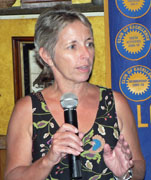 Cheryl Dawson was born in England, lived on Cyprus, and went to high school in Hong Kong and to college in the UK. She returned to Hong Kong for business management work, including trademark protection and anti-counterfeiting, involving some world travel. She moved to the US and started a company in anticounterfeiting. She has also worked on disaster preparedness as a volunteer in the Palos Verdes School District and is currently District Disaster Chair. She is the Executive Chair of the Palos Verdes Peninsula Community Emergency Response Team (CERT), and is a qualified CERT trainer with certificates in several specialized disaster response fields. She presented a video map illustration of a 7.8 magnitude earthquake spreading northward from the Salton Sea along the San Andreas Fault, showing its area spread as a function of time from onset (it would take over a minute to reach the Los Angeles area). Such an earthquake would cause an estimated $213 billion damage including 300,000 buildings and widespread infrastructure damage, with 270,000 people displaced, 50,000 injured and 1800 deaths, half of those from fires. (The 1994 Northridge earthquake was 50 times smaller than this.) There would be many fire disasters, decreased water pressure, and saturated communications, and all emergency-response agencies and hospitals would be vastly overwhelmed as well as sustaining damage themselves. The best preparation is for everyone to be prepared for self-sufficient local response (90% of rescues would be by volunteers). Among home preparations should be strapping the water heater and building foundation, securing furniture and chemicals from movement, assembling an emergency supply kit, checking utilities for leaks and damage, arrange a meeting place in advance with family members and an out-of-state contact (long-distance calls may be more open than local calls). Avoid tying up phone lines if you don’t need to. Don’t rush to school (crowds of others will be trying to do the same thing at the same time). Supplies available should be enough for total maintenance of all household members for at least 3 days (food, water, medications). There is likely to be little or no support by public agencies for at least 5-7 days. Have first aid supplies, rescue equipment, fire extinguishers (including one in the bedroom), crowbar, and copies of all important documents. Keep supplies in a variety of places, such as car, office, and in multiple places in the home. Keep them refreshed periodically. Have an evacuation kit. Emergency water supplies would include draining the hot water tank or toilet tank, having water in drums, fill gallon bottles with water ahead of time, and use water from a pool or spa. You can also take CERT training, 20 hours by the Los Angeles County Fire Dept or School District. The County Fire Dept has a FEMA-developed CERT program in a series of 3 classes on 3 consecutive Saturdays starting October 27, 8:30 AM to 4 PM, at Marymount College (Lower Cecilia Hall). To enroll, e-mail rhenw90274@gmail.com or call (310) 375-8747, giving your name, phone number and e-mail address. Class size is limited. To help your neighborhood, you need to know your neighbors, especially those with special needs and disabilities. Learn how to size up and put out a fire, safely search rooms and remove victims, triage victims to prioritize the order of helping them, learn how to organize teams, understand disaster psychology and anti-terrorism efforts, and understand how to hand over to first responders when they arrive. You should also join Neighborhood Watch. You can learn CPR, and take ham radio classes to enable emergency communications when other means are unavailable. Learn and write down important local phone numbers such as the Lomita Sheriffs Station and the emergency response office for your city. For additional preparation information, you can contact www.pvpcert.org, or www.ready.gov for general FEMA preparedness information, or the Red Cross. |
Disabled Student Services at CSULB, by David Sanfilippo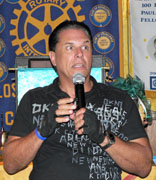 David Sanfilippo, sitting in a wheelchair, was introduced to us by his longtime friend and colleague, Sandy Farrell (who had worked with him years ago in student counseling). His career in disabled student services started with an opportunity to work in a high school program for people with disabilities. He was feeding a man with cerebral palsy, who began drooling on him. Then he began trying to teach the man how to tie his own shoes. That inspiring experience led to a job at a summer camp with children and adults with disabilities, which he continued for a few summers, and then got a job at a community college working with people with disability. Since 1978, he has been the Director of Disabled Student Services at California State University in Long Beach, one of the first University programs of its kind. He develops and coordinates services for disabled students and supervises professional counselors, staff, interns, student assistants and volunteers. He has been a consultant for the federal disability law (ADA) on public accommodations, and has been active in state, city and University activities to help the disabled (or “special needs”, a more polite term). Categories of disability include physical (neuromuscular and orthopedic), physiologic, mental, and psychological. They can be congenital, developmental or traumatic, including the increasing numbers of injured war veterans. David is writing a book, “Where I Sit”, discussing the inspiration he feels from students and others overcoming obstacles. He discussed the relativity of “accommodations”: lighting could be considered an accommodation to sighted people, and high doorways could be an accommodation for walking people. Sports activities can help motivate people to overcome their handicaps. He discussed anecdotes of sports successes, including a champion woman swimmer, a track star, and a football star injured by a bullet followed by a 70-pound weight loss in the hospital, who returned to play football and played for the San Diego Chargers. One man who was born with no arms or legs (phocomelia, from the thalidomide drug during pregnancy), was given up for adoption but grew up to become an advisor to the US Dept of Transportation on disabilities. Another student had a severe neck spinal cord injury, but went on to a law degree and a job in the Orange County DA Office. Over 35 years, he has had 6000 students in his program. Your tax dollars are helping these disabled young people to grow into productive careers and more independent lives. He noted that student loans in the US have gone up to a total of $1 trillion now, a burden that is financially handicapping more students from completing college to enable them to contribute to the US economy with productive careers. He is concerned that decreasing support for public education will endanger his program as well as the future success of other students. (At this point, David got out of his wheelchair and stood up normally, to show the perspective of our expectations of those who appear to be handicapped.) |
PV Library District, by Kathy Gould, Director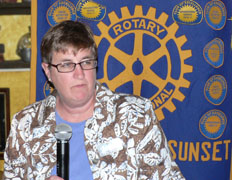 Kathy was born in Santa Barbara but grew up in Manitoba, Canada. She returned to California for a Master of Science in Library and Information Management from USC. Then she worked at the Pasadena Public Library and in the corporate library of a small technology company. She spent 15 years in management in mining and manufacturing companies in New Zealand, Australia and Kentucky. Kathy returned to California and has been Director of the Palos Verdes Library District since 2004. She is responsible for operating all 3 libraries, including financial management, fundraising, facilities and technology management, and supervising 85 employees and 200 volunteers. She has been involved in many other community organizations including the Chamber of Commerce and visitors Bureau, Volunteer Center of the South Bay, California Library Association and other statewide California library activities. Kathy showed a pictorial history of writing and library development starting with the cuneiform writing on clay tablets thousands of years ago in Mesopotamia. She showed illustrations of the famous Alexandria Library in Egypt, the library in Ephesus in Asia Minor (where the apostle Paul preached), the Gutenberg Bible, and the Library of Congress in Washington. Literacy was accompanied by other developments in political systems, the Industrial Revolution and public education. Benjamin Franklin, who came from humble roots, was a highly respected writer and journalist. Now there are many specialty libraries. Public libraries have been developed in our country since the 1850s, many funded by private donors including Andrew Carnegie. Many early public and cultural events were held in libraries. There were bookmobiles during the Great Depression in the 1930s, bringing books to ordinary people. Are public libraries still relevant in the age of the Internet? E-books are proliferating rapidly, but these are licensed, not owned by the reader and not transferable to other types of devices. Libraries also help with preservation of books and other documents. Electronic resources are increasingly stored in a digital cloud, and big book publishers are losing their dominance. Other media are being used for preserving archives. Many old classics are out of their copyrights and downloadable free. The Palos Verdes Library website has a local history webpage which is well worth viewing. Economic development and education in the developing world are highly dependent on library resources. Computer terminals are increasingly going into libraries for readers now. These Internet resources are too costly for some individuals to access themselves, but they can now download e-books and music. The PV library also has interactive foreign language learning, which you can access on the Internet from home. There are monthly book sales. The library has community meeting rooms, provides access to learning for the poor (including homeless people), and computers and training for using them. Job centers can be accessed and there is help for résumé writing. Volunteers do tutoring and the library is a safe place for students to work in groups and to “hang out”. There are activities for people of all ages. Library services have expanded far beyond dusty stacks of books. Kathy urges everyone to get and use a library card and check out the many resources available at http://www.pvld.org/. You can help the Library District in your estate planning, and by spreading word-of-mouth about library services, volunteering, and using the library connection of Amazon.com for your purchases (so that it can get financial credit). Consider joining and supporting the Peninsula Friends of the Library at http://www.pvldfriends.org/. |
IGNITE Rotary Membership, by Mel Powell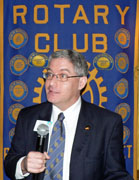  Mel Powell is a member of the District Membership Committee and President of the E-Club of the Greater San Fernando Valley (provisional, growing with 13 members and pending charter). His Club meets twice a month in person and other times online. Most members are from the San Fernando Valley and Burbank and Glendale, and he invites all Rotarians to visit it for online makeups at www.rotaryeclubgreatersfv.org. They had a successful Food Drive on July 1 with the North Hollywood Club to feed 350 local families. They will have a PolioPlus Dance Marathon (not really a marathon!), Dance for the Children, on September 15 in Sherman Oaks (started 2 years ago in a former Club). They recruit sponsors at $20 each, many from outside of Rotary, for 3 hours of dancing on behalf of polio victims who cannot dance. Among his other activities, Mel was appointed a member of the Rotary Zone 26 IGNITE Team for recruiting and orienting new members to Rotary. The torch symbol represents leading the way to discovery and exploration, illuminating the way for others who will invite, unite and ignite new members whose fire and energy, when combined with our current membership, will help overcome the darkness of poverty, illiteracy, hunger and disease. (August is Rotary Membership Month.) Our Club should field a full team for more fun and more ideas for service. The Club is the center of Rotary, and everyone needs to be involved. We need to tell others how much fun we have and invite them to help us with our projects. The 5 rules of Membership are:
New members should be assigned a mentor, in addition to the sponsor who brought in the member. These 2 individuals should help each new member and the established Club members to bond with each other. |
OFFSITE — Portuguese Bend ClubJim Jones (who presented a program for our Oct 18, 2011 Club Meeting), entertained us on the beach with his banjo, singing some old popular songs going back over the last century or so (even older than some of our members), as the sun set over the Pacific (behind a few gray clouds). He started with “This Land is Your Land” and got us singing along with him (no prize-winning chorale). Then we went through Jeff Earle’s chow line on the beach and sat at the picnic tables, washing it down with our own BYOB beverages. Some mellow conversation with our guests followed to complete this relaxing encounter. (Thanks to Ralph Black for arranging this location for us.) |
Club Assembly, Club Goals for the YearPresident John Turner outlined our Club’s Membership and Activities Goals. He challenges us to 100% participation in donating to the Rotary Foundation at $250 per member per year (which is less than $25 per month). Madelyn Creighton outlined Vocational Service goals, including Business with a Rotarian at each meeting, “Commercials” for $2 (free if for someone else), and Vocational Activities for Youth: District Spelling, Art and Music Contests, Outstanding Student in each high school and at Marymount College, Interactor of the Year, and Project EGO Grants. She requests a vocational volunteer about every 2 months, volunteers for tutoring students and for helping them learn to write a resume, fill out a job application and practice for a job interview. Chuck Hanchett reviewed the Rotary Foundation fundraising activities, including our weekly Club Raffle and $100 of raffle tickets for the annual District Foundation Celebration. Half of our funds are returned to our District for community projects (such as Scholarships and District Grants), and the rest goes to worldwide Foundation projects. Jackie Crowley urged us to respond to donation requests for Project Amigo in Mexico (Astrid Naviaux is coordinating this). Don Reeves reviewed the New Generation activities, including our sponsored Interact and Rotaract Clubs whose performance were outstanding last year. They will begin new projects again this year after the new school year starts. He needs more volunteers for this year, because only about 3-4 of our Club members have done most of this work and need more help. He wants to have more joint projects of these student Clubs participating with our Club. Interact has now expanded to elementary schools, to help boost Interact membership in high schools. PDG Dave Moyers bought 2 tickets for Rotaractors at Marymount College for the Dodger Game for PolioPlus September 15. Don Reeves also reviewed the Community Service project where we have an application pending with 2 other Clubs for a District Grant for the Harbor Interfaith Services Helen Coffey Library. Chuck Hanchett discussed our annual Club fundraiser, the Festival del Corazon on October 14. Robert Little discussed his Club Service activities. He will be assigning duties for future Club meetings for both raffle-drawing donations ($20 value, about once a year for each member) and for working at the sign-in desk. (Names with meeting dates will be published in the Newsletter.) |
Point Fermin Lighthouse, by Kristen Heather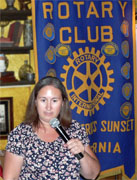 Kristen Heather grew up in Sacramento. After graduating from Pepperdine University, she became the Assistant Curator at the Sutter County History Museum. She received a Masters in Public History from UC Riverside in 2004 and was hired by the City of Los Angeles to serve as Historic Site Curator and Director of the newly restored Point Fermin Lighthouse in San Pedro. She enjoys sharing this piece of local history using this original structure with on-site artifacts and old photos. Point Fermin overlooks the natural entrance to the Los Angeles Harbor with good views. The lighthouse is a wooden house and tower in early Victorian style with handcarved details, built in 1874, and is on the National Register of Historic Places. Its architect, Paul Pelz, designed 6 lighthouses, of which only 3 remain. It was built on an isolated point away from the early community development, when the Los Angeles Harbor was still very primitive compared to today. Its original water supply was a cistern to catch rainwater. The original lantern on the top floor of the tower used a Fresnel lens to focus the beam. The lighthouse keepers had to light the lantern every night and clean the windows, lens and lantern frequently. The lighthouse keepers were federal employees, and the first ones were sisters Mary and Ella Smith, from 1874-82 (an unusual job for women in those times). Kristen told stories about the early keepers. The first controversy occurred when a man was hired to replace the assistant keeper (to work under a woman!), and constantly complained to his superiors about her, until finally they were both replaced to stop the controversy. The port continued to develop as shipping traffic increased. The English ship Respigadera ran aground on a reef outside the harbor in 1888, in fine weather at 1 PM, leading to disciplinary action against the Captain. As the nearby community expanded, Fourth of July picnics, whale watching and other social events became popular at the lighthouse. In 1924, an electric beacon light was installed as the harbor area became increasingly industrialized. The beacon light was turned off after the Pearl Harbor attack in 1941, and the building was painted green to minimize attracting potential attention from the enemy. The tower was redesigned to be a lookout post. The lantern was never lit again after the war, and the building gradually fell into disuse. It was saved from planned destruction in the 1960s, and the lantern room displaying the original Fresnel lens downstairs was restored by John Olguin and Bill Oleson, who were prominent San Pedro preservationists. The restoration was completed in 2003 with funding from a variety of sources, and opened to the public. The Point Fermin Lighthouse is located at 807 W Paseo del Mar in San Pedro, at the southern end of Gaffey Street. It is open 1-4 PM daily except Monday, by guided tours only, available at 1, 2 and 3 o'clock; reservations are not necessary and there is no admission charge (although donations are appreciated). Group tours can be arranged by calling (310) 241-0684. The website is www.pointferminlighthouse.org. |
Upping Your Fun Quotient, by Derek Gable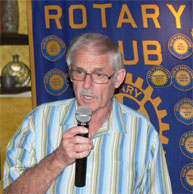 Derek Gable was born in England and worked on many interesting projects in invention and creative fields, including jet engines, projectors, robotic manufacturing and chocolate-making machines (Willy Wonka). He was brought to the US in 1968 by Mattel and worked on projects for Barbie, Hot Wheels and other toys and games. He invented the Real Estate Lock Box system in 1979 and formed a company to market these devices. He formed an invention and market development company (West Coast Innovations) for helping inventors take their concepts to production. He has been a teacher and mentor for many years, running a class called, “I have this great idea but don’t know what to do with it”. He has made presentations to service clubs and other organizations on subject creativity and how it can enhance one’s life. Mr Gable says, “Look at your whole life, and make it more fun. Find out what you have a passion for and make it your work. Get creative.” As an example, he formed a “Cheapskate Club” for inexpensive fun, such as going out to dinner and theater for $18 by looking for discounts and eating earlier during “Happy Hour”. He found GoldStar on the web for buying tickets at half-price, and Ports O’ Call Restaurant which has Happy Hour from 5-7 PM with food. The members meet in their homes and share their ideas about cheap food and entertainment, movies, etc., and discuss their experiences afterward. Mr Gable discussed many inexpensive creative ideas and gags for entertaining grandchildren, including a small rubbery sticky hand on a string, that would grab onto whatever it touches. He showed a cardboard mailing tube stuffed with many small funny items and notes (including a note stating, “Life Is Sexually Transmitted”, presumably intended for mature audiences only). He brought out a plastic inflatable flower and many other party ideas, jokes and gags. For children, you can have a treasure hunt competition with a small amount of money in each item plus a clue to the next location. Another idea is rolled up dollar bills stuffed into a narrow-necked liquor bottle that could not be removed without breaking the glass. He also showed a Sudoku puzzle with removable squares to see numbers behind them. There is no limit to the human imagination! |
Role of the YMCA, by Julie Turner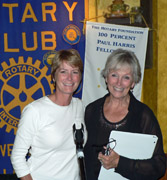 Julie Turner was introduced by Sandy Farrell. Julie is the Executive Director of the San Pedro & Peninsula YMCA, and a member of the San Pedro Rotary Club. She has a husband and 2 children.
The YMCA is focused on strengthening the foundations of community through youth development, healthy living and social responsibility. It has stopped offering childcare, because other organizations are now doing it. Its focus now is more on family enrichment services. Programs include camp, family-centered activities, health, well-being and fitness, social services, sports, recreation and swimming.
The San Pedro area has a higher level of lung disease due to air particulates related to harbor activities. Asthma in school children increases absenteeism and affects grades and school success. Obesity is increasing in children, who are developing Type II Diabetes. These health problems are worse in Wilmington than San Pedro.
“Beyond Rehab” includes follow-up services after rehabilitation from chronic illnesses, to improve physical and social health. A nurse comes in weekly for chronic lung disease. Caregivers for the chronically ill also need help and stress relief. People tend to live longer now, but the quality of life needs improvement.
There is evidence that the aging process can be slowed by decreasing sugar and consuming inflammation-lowering foods such as vegetables, fruit and fish, and having sensible (not excessive) sun exposure. She mentioned resveratrol, an antioxidant in red wine (don't overdo it!), and fish twice a week. Cortisol, a stress hormone from the adrenal glands, in excess promotes belly fat and causes memory deterioration as well as aggravating chronic diseases. She advises meditation for relaxing. Exercise is an antidepressant and helps with cardiac and muscle toning. She demonstrated postural principles including standing and sitting, with strengthening of abdominal, shoulder, gluteal and hip muscles, and practicing the sense of balance.
Julie discussed other programs including high school students going to Sacramento on Presidents’ Day Weekend and the Model UN in junior high. She passed out information on a program, “The Balanced Woman”, at the Trump National Golf Club on Monday, September 10, at 12:30 PM, for $100 donation to “YMCA Kids to Camp”. It will include a lunch nutritionist presentation on “Healing Your Hormones and Reversing the Aging Process”, followed by “Golf for Girls” or “Cooking Tips to Keep Your Hormones Happy”. RSVP to Julie Turner at (310) 832-4211 or JulieTurner@ymcala.org.
The YMCA is always looking for volunteers and donations. It is located at 301 South Bandini Street in San Pedro, http://sanpedro.ymcala.org. You can donate online. |
Nadra Dahdah, Craft Talk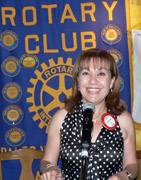 Nadra is one of our newest members. She has a husband and 2 children. She and her husband came to the US in 1979 from Nazareth, in northern Israel. This is a small town where most of the people are related to each other. She still has family members there, but moved after finishing high school there because she wanted to see more of the world and further her education (a joint decision with her future husband). She was told that flying to Los Angeles was cheaper than taking a taxi from Nablus to Tel Aviv (probably fewer checkpoints also). She went to El Camino College and Long Beach State, and began working for Flying Tiger Airlines. With 2 small children, she decided to look for work not requiring so much travel away from her family, so she left the airline to work for RE/MAX after going to real estate school. She talked about her first experiences in Southern California doing what she had heard so much about before coming here, such as going to Disneyland for the first time, and shopping in Los Angeles. She and some friends took a bus to central Los Angeles, but after 45 minutes in city traffic and getting only as far as Compton, they decided to give up and return home. Her hobbies include music, entertaining and cooking, and she wants to learn how to dance. She donates to Children’s Hospital through her company. She enjoys working for charity, especially helping to buy a dialysis machine for a hospital in a small town where kidney disease patients had no local source of specialized care. She has also hosted children for international exchange, one from Switzerland and 2 from China. |
Five Ways to Save the Planet, by Greg Schwartz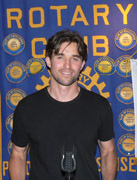 Gregory Schwartz grew up in the Los Angeles area. He graduated from the University of California at Berkeley and played football and baseball there. After playing professional football for one season in Vienna, Austria, he got a graduate degree in Geography at the University of Wisconsin. He began teaching high school Spanish in Los Angeles in 1995. In 2006 he began teaching Geography at California State University Northridge while writing his 2nd book, 5 Ways to Save the Planet (In Your Spare Time). He has traveled to 40 countries, but lives in Manhattan Beach. In his travels, he has seen both abundance and suffering, and kept asking himself, what is the cause of the suffering? He saw starvation, war and environmental degradation. 15,000 children starve to death every day. 30 million gallons of oil spill into the oceans every year. 90,000 acres of rainforest are burned every day (1 acre/second). Our 10 hottest years recorded on this planet have all been in the last 15 years. Meanwhile, there are 10 million cars in Los Angeles. The US generates one and a half billion pounds of trash daily. We use much more energy and water per capita than any other country. 4 million tons of food is thrown away in California every year. There are 10 million millionaires in the US, while millions of people on this planet try to survive on 2 dollars a day. Looking for alternatives, he sees achievable change occurring in small ways by individuals doing what they can. We can each help by increasing renewable energy sources such as solar and wind, and promoting organic farming to reduce the ever-increasing load of pesticides in our food, water and environment. Bill Gates has given $25 billion to world health issues (including many hundreds of millions to help Rotary eradicate polio). There are thousands of nongovernment organizations with dedicated volunteers, who are less prone to corruption and misuse of resources than some government officials. Some solutions already exist. He believes famine is caused more by maldistribution, political conflict, disease and public health problems, and progressing climate change that we have not adequately prepared for. What holds us back is what we believe, not what we have. We focus on what we see, sometimes very shortsightedly, and we miss what is unseen. We waste our abundance and don’t visit or see the hundreds of millions of people for whom every day of life is a grueling struggle for survival. He quoted Stephen Covey’s book (“The 7 Habits of Highly Effective People”): “A major shift in our lives requires a shift in paradigm”, our way of thinking. Mr Schwartz had copies of his new paperback book, “5 Ways to Save the Planet (In Your Spare Time)” available at our meeting. His website is http://www.gregoryjschwartz.com/. |
Palos Verses Sunset Rotary Fourth of July Booths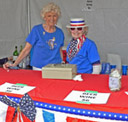 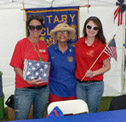 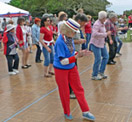 Betty Reider & Jackie Crowley manage our Beer & Wine booth; Jennifer Kain, Angi Ma Wong & Maryount College Rotaractor Victoria Perez do our Flag booth, and Jackie Crowley takes time out to show us her dancing skills. |
Cabrillo Marine Museum, by Larry Fukuhara
Larry Fukuhara is the Program Director for the Cabrillo Marine Aquarium and self-described “beach bum”. He was born and raised in Long Beach and has been living in San Pedro for over 30 years. He received a BS from San Diego State.
Larry began volunteering as a docent at the Aquarium. Now he supervises programs there such as Volunteers and Docents, Whale Watching and free school tours.
He reviewed the architectural changes at the Aquarium, including a tank that children can walk underneath, and the Aquaculture Kitchen. 100,000 children visit the Aquarium every year. The grunion hunt, on the beach during the full moon when they emerge from the water for egg laying, is a popular event.
He showed many interesting marine life photos from the local area and places he has traveled to around the world. Among them were a lobster molting, a Garibaldi (California’s State Marine Fish, protected by law), gray whales in their birthing lagoon on the Pacific coast of the Baja Peninsula in Mexico, dolphins, elephant seals (bigger than walruses!), fur seals, Lions’ Mane jellyfish, the giant “Barn Door” Halibut, the endangered leatherback turtle, and the venomous scorpionfish (a Southern California fish that can inflict painful puncture wounds). He showed photos of swimming in the Amazon River near piranha fish (which are not as dangerous as their reputation, provided you “follow the rules”).
Aquarium hours are Tuesday-Friday 12-5 and Saturday-Sunday 10-5. It is located at 3720 Stephen M White Drive in San Pedro, (310) 548-7562. See the website for more information, http://www.cabrillomarineaquarium.org/.
|
Baja Crippled Children Project, by Marc Benard, DPMMarc Benard is a Podiatrist in Torrance. He attended Penn State University and sang in New York’s Manhattan Light Opera. He has been a Del Amo Rotarian since 1988 and will be involved with our District Art, Speech and Music Competition in 2012-2013. While in his Podiatry Residency at LA County-USC Hospital, a request came from Mexico in 1978 to provide surgeries to polio and neuromuscular patients, and he has been involved in international foot-care programs since then. Many foot deformities are congenital, caused by home births, troubled pregnancies and deliveries, twisted umbilical cords, cerebral palsy, neuro/spinal/muscular problems and genetic predisposition. The most common are clubfeet, upside down/backwards feet and extra toes. The team tries to get to the children within the first month of life, to manipulate and then put the child’s feet in casts. After 6 months, the feet become rigid and more difficult to correct. Delay impacts the ability to walk, making the deformity worse. The procedure can be done in two stages: first get the patient to walk on toes, and then on the entire foot from toes to heel. Without the corrective surgeries, these deformities make the children and adults social outcasts, unemployable and undesirable for marriage because of the disability and stigma. Correcting the foot deformity helps the entire family. The biggest challenge is getting the patients to the doctors. The families often live in remote areas with long difficult travel to the city and hospital. Moreover, if there are other children at home, it is almost impossible for one parent to accompany the patient while leaving the other parent behind to work and leave the other children unattended. Funding goes for surgical equipment and supplies. Donations come from humanitarian organizations such as Rotary grants. $75,000 each year goes to three different projects. To date over 28,000 potential patients have been examined and 2800 procedures done, and the project has expanded to Honduras, El Salvador and now pending in Belize. For all of our complaints in the US, we live in a health care delivery paradise. What health care we cannot buy, we still can get. This is not the case in South and Central America where the unemployed have no opportunity for health care except by international humanitarian efforts such as through Rotary International. |
Craft Talks, by Roger Schamp & William Zhang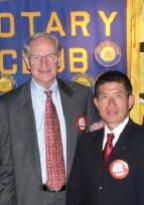 Roger Schamp was born in Denver, Colorado. He is 72, and will celebrate his 49th anniversary with his wife Carol on June 14. He has lived in Rancho Palos Verdes since 1979. Roger retired as Chief Financial Officer of a small manufacturing company and is a retired Captain in the Naval Reserve Supply Corps. His family moved from the Bay Area to South Dakota where his father worked in a gold mine. He remembers the Freedom Train that traveled through Rapid City with copies of the Declaration of Independence, and a tornado that destroyed much of a nearby small town. Later his family moved to Butte, Montana. He attended the University of Denver where he studied business and then got a law degree, but decided instead to concentrate on business and accounting. He remembers receiving a free ticket and press pass from his government professor to attend a speech and press meeting with then Senator John F. Kennedy, who Roger believes was the most charismatic person he has ever met. Other college memories included an unsuccessful effort to name a new dormitory “Alfred E. Neuman Hall” (after the MAD magazine character). He was the successful student campaign manager in a campus election. In 1959, he won an NROTC scholarship to the University of California at Berkeley. Roger met his wife, Carol, on his first day there. He enrolled in horseshoe pitching, and his team was invited to lunch by the retired Fleet Admiral Chester W. Nimitz, who led the Allies’ WWII Pacific campaign. Roger earned both his Bachelors and Masters Degrees at Berkeley and went into cost accounting and financial forecasting. Roger has many more stories to share and tell. His hobbies are travel, trip planning, politics, conversation, and watching sports on TV. When football season arrives, we can expect happy bucks from him when his favorite teams win. William Zhang has two professions, real estate and global business information technology (IT), and he spoke on security. He immigrated from China, is married to Julie and has three sons aged 17, 15 and 9. The older two are both on the debate team and the youngest is on the soccer team. William has been a soccer coach for many years for his sons’ and other teams. Since 9-11, the federal government has spent $13 billion on cyber security. Recently, computers in Iran were hacked, and it may take them years to recover the lost or stolen information. Adware, Spyware, Grayware/Malware and Phishing are all forms of security breach into computers. Hacking can allow malicious virus to corrupt your computer email and programs. Much fraudulent activity requires vigilance; don’t open any email from anyone you don’t know. Even if you know the sender, pay attention to the subject line and do not click to open anything that does not appear legitimate. Watch for messages like “Congratulations, you just won…..” OR “Your click here will increase the speed of your computer…” Don’t be fooled! Good prevention is to get automated updates of Norton or McAfee virus protection. Use private browsing on Firefox which does not expose your personal information. The best and easiest way to protect yourself is not to share your password with anyone, because you are responsible for any activities that occur under your name and password. Change your passwords and security codes every 3-6 months, using better variations, sentences, names from science fiction, literature or television. Identity theft is the fastest growing crime in the world. In 2012, there were 8 million US victims and 4800 businesses affected, with $500 average theft requiring 200-600 hours of consumer time to resolve. The most common involve credit card fraud, utilities/social security/date of birth/address theft, banking, employment fraud, government documents and benefits fraud and loan fraud. If you have to freeze your credit, CALL, do NOT use your computer to request your file from any of the three credit score companies. Every 15 seconds there is spam email so invest in a spam filter. |
PV on the Net, by Ted Vegvari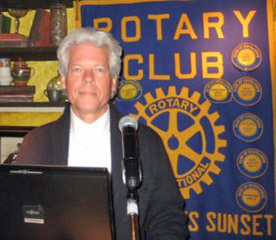 Since 1994 Ted has been the powerhouse behind the non-profit PV on the Net, whose mission is education and training through community service. He wanted to do something with computer training and technology to benefit Peninsula residents, their self-governance, local non-profit organizations, services and emergency preparedness. (He was brought into PV Sunset Rotary by our late Past President John McTaggart, who helped to set up the pilot program 17 years ago.) The program caught the attention of Microsoft founder Bill Gates who, always on the lookout for unique programs, gave PV on the Net unlimited license of his software to PV schools and for home use, and who donated $2.5 million in software. In addition, the City of Rancho Palos Verdes donated the use of a bungalow at the City Hall complex, and then a second one, for the PV on the Net annex. Ted, a hobbyist carpenter, built all the shelves and tables in his garage and then assembled them in the classrooms which seat 16-18 students. Another former PV Sunsetter, Jean Etter, who retired from career counseling at Peninsula High School and has now moved to the San Diego area to be closer to her daughter, has referred hundreds of high school students for low- or no-cost training at the PV on the Net facility. It is an instructor-led system that offers subjects not usually available to all ages, such as animation, media and architectural drawing. Moreover, the organization has been a business incubator by partnering with media companies, teaching how to create business plans and finding mentors in the media industry. With solid instruction and hands-on experience to put on their resumes, many students are consistently first to be hired for openings in these professions. Over 30,000 adults have availed themselves of this training over the years, in addition to every age from 4-year–old to graduate students and older. Classes are free to seniors. PV Net also has loaner computers for emergencies. The organization has achieved many firsts, such as offering the first animation program on the Peninsula (1997), first and only Geographic Information System (GIS) with information about homes sold, building, pavement and curbs, & surroundings; police and fire emergency preparedness, first television channel, computer center, computer animation class. In providing services to many organizations in our four local municipalities, some are valuable in subtle but critical ways. For example, it assisted the PV Horsemen’s Association in creating an up-to-date map of all horse trails on the Hill. Consider that in case of an emergency if paved roads are obstructed, peace and emergency personnel will need access to reach citizens in need. (For our information, we are in Area G in disaster preparedness.) PV on the Net (http://www.pvonthenet.com/) is located at 30940 Hawthorne Blvd, Rancho Palos Verdes; (310) 541-7992. |
New Family Resource Center at Harbor Interfaith Services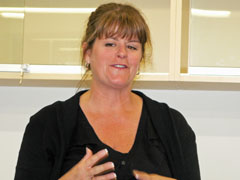 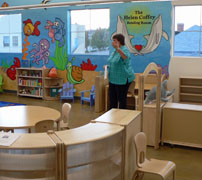 Carolyn Brady-Sinco opened our offsite meeting at Harbor Interfaith Services’ new Family Resource Center (670 W 9th St in San Pedro) by explaining its purpose and features. Construction is ending and the agency will move in by May 31st. A Grand Opening Celebration is scheduled at 4 PM Sunday, June 10. Much of the funding came from a county development grant with matching grants from several private foundations. The new building will allow the organization to serve twice as many children and expand comprehensive services to 17,000 homeless and working poor clients. The entire 2nd floor will be for children’s education from age 6 weeks through high school. The infant-toddler center will serve 20 children aged 6 weeks-2½ years, and the preschool program will serve 32 children 2½-5 years old. The Helen Coffey Reading Room (presented tonight by Kellie Cairns) was established with a $30,000 donation from the Coffey family. Book Buddies donated $5000 in children’s books. A Rotarian District Simplified Grant is being requested to pay for some of the shelves and furnishings in this room, and the agency urges Rotarians to volunteer to read to the children regularly. Helen Coffey (Bob Coffey’s spouse) was a teacher and Director of the Portuguese Bend Cooperative Nursery School, as well as a leader in the League of Women Voters. She was an active child advocate, and in 1999 formed and chaired the South Bay/Los Angeles advisory board for First Book, a national nonprofit organization providing books to underprivileged children. She passed away on September 19, 2008, but the Helen Coffey Reading Room will be a permanent tribute to her and a magical place for children to discover the joy of reading. The after-school program will accommodate 45 students and focus on academics and parent participation for children from kindergarten through grade 12. Volunteer tutors and mentors are planned to supplement the teachers. There will be a computer lab and state-of-the-art learning tools. Workshops and classes on parenting, budgeting and other life skills will be encouraged for all 17,000 clients, who will have access to a conference room, computer lab and expanded job board. A Director of Educational Services has been hired and will recruit several additional teachers. A technology firm will maintain the computer labs and equipment and ensure database support for the outcomes-based educational approach. Operating costs are expected to increase by about 20%, and will be assisted by new grants from private organizations. The Los Angeles Universal Preschool has agreed to support the preschool here with reimbursement funds for all prekindergarten 4 and 5-year-olds. $60,000 has been raised through the Square-Foot Club, private individuals purchasing a square foot of space at $250 each to help complete construction and expand services. The Grand Opening on June 10 will also be a fundraiser with attendees paying $150 each, and the associated auction will have bidders purchase supplies or child sponsorships. Our Club helped provide holiday meals to more than 600 families during this period of transition. Volunteers will be needed for the holidays again this year as well as to work in the pantry all year and to serve as mentors and tutors for the children. Carolyn urged us to bring hotel shampoos and soaps collected on trips, and to consider collections for items like peanut butter, tuna, new packaged socks and underwear, diapers, feminine products, etc. More information is available on the website at www.harborinterfaith.org, or you can call her at 562-208-5407. |
Generous Gift From Rowena Schaber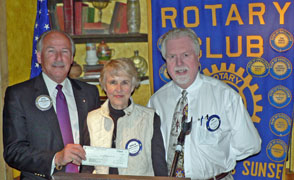 PV Sunset Charities Chair Dave Moyers and Vocational Services Chair Madelyn Creighton accepted a $5030 check tonight from President-Elect John Turner, given by philanthropist Rowena Schaber, to benefit Project EGO. We appreciate her generosity! (The Norris Theater Foundation has already given $15,000 to Project EGO this year to help at-risk high school students to graduate and prepare for productive lives. 15 students are graduating from this program this year.) |
Induction of Nadra Dahdah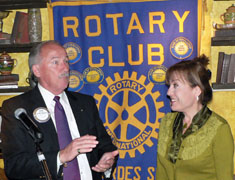 Induction of Nadra Dahdah by PDG Dave Moyers, assisted by her sponsor Sue Tyree and Membership Chair Sandra Farrell. Congratulations, and welcome to our Club! |
Dr Ralph Black, Great Advances in Medicine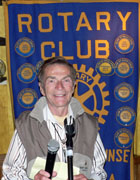 Our Club member Ralph Black was in medical school at the University of Alberta in Edmonton, Canada, when polio eradication began in North America. When he entered in 1951, polio was still prevalent and everyone was concerned about contracting this paralyzing disease. The hospital wards were filled with Iron Lungs, long horizontal tubes supported on legs with wheels. The paralyzed patients’ bodies were sealed inside these containers with airtight seals at the neck so that only the head was outside. The machines had electric motors pumping air in and out of the tube continuously to pump the patients’ lungs by vacuum effect, and the nurses also had to feed the patients and clean and care for them in these machines. In 1952, Jonas Salk announced that he had isolated live polio virus and was making a polio vaccine from it. In that year, all of the medical students in Dr Black’s medical school got polio shots for protection, even though the vaccine was still untested. Over the next several years, the incidence of polio in North America dropped dramatically, and by 1954 the respirators had disappeared from hospital wards. By then, the medical schools were no longer teaching their students how to diagnose polio, because it was assumed to be disappearing. Soon, Albert Sabin developed an oral version of polio vaccine, which is still used today. There was controversy in the medical profession for a number of years after that about which version of polio vaccine was most appropriate for which circumstances. In 1985, HIV virus was noted as a mysterious unknown illness in Los Angeles affecting young males who were getting sick and dying (one of them was the prominent actor Rock Hudson). The Los Angeles County-USC Hospital developed a specialized ward for evaluating and treating these people. Because of the public stigma associated with this devastating disease, a State law was passed mandating total confidentiality for all related diagnostic and treatment services, so that test results could only be reported with a numeric code to identify the patient. Eventually, drugs were developed to stop the multiplication of the virus in the body’s immune cells to provide remission of the infection. In 1992, Dr Black received an accidental needle stick while starting an IV line on an HIV-positive patient; he was immediately given 3 antiviral drugs and was taken off work for one week. Fortunately, he remained HIV-negative. In the past year, only one new medication has been used instead of the previous combination. Research has been conducted for a number of years to develop artificial blood, in hopes of avoiding contaminated donated blood and the need for blood banks. This is still in the future. Propofol is a very effective intravenous anesthetic used on millions of surgery patients. Its activity lasts only about 30-60 minutes, so it wears off quickly when it’s time to awaken the patient. It is safe and effective when used appropriately, but its repeated use on the late celebrity Michael Jackson by his cardiologist to treat his insomnia resulted in murder charges against the cardiologist. |
James Blackman, South Bay Cities Civic Light Opera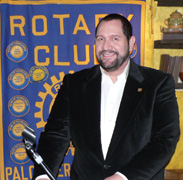 James Blackman is the Executive Director and Producer of the Civic Light Opera of South Bay Cities. He was raised in Los Angeles and has had a very eclectic childhood and career. He lived in poverty as well as at the Doheny Estate Mansion in Beverly Hills in summers (his grandmother was a good friend of actress Marion Davies, a paramour of William Randolph Hearst). Early in his career, he was an elected county official in Maryland, helped with the Capital Children's Museum in Washington DC, and helped to restore the USS Sequoia Presidential Yacht in the Reagan Administration. Then he worked for the Blind Children’s Center in Los Angeles, raising $500,000 in 6 months. He became Managing Director of the California Music Theater at the Pasadena Civic Auditorium, and then Associate Producer at Santa Barbara Civic Light Opera. In 1991, he founded the Civic Light Opera of the South Bay Cities in Redondo Beach, in a converted high school auditorium. He wanted to have the first company in Los Angeles to use a cast like New York’s Broadway instead of just using TV personalities. He started with an audience of only 35 people in a 1500 seat auditorium, but in the audience was Sylvie Drake, theater critic of The Los Angeles Times. She was viewed by some as a “dragon lady”, but she enthusiastically “anointed” the organization and ensured its success. It won an award that year and the 2 following years, an honor that usually went to New York. With recently dwindling city financial support and increasing rent in Redondo Beach, he was forced to look around for a more survivable venue. He recently completed a move from the old Hermosa Beach Playhouse to the newly renovated El Segundo Playhouse. He has now been invited to join with the Warner Grand Theater in San Pedro, and will have the opening Civic Light Opera event there on Sunday afternoon, May 20. This is a special time and place in a very beautiful restored classic old theater, in the midst of San Pedro’s ongoing extensive renovation project that is expected to draw many more local and outside visitors. The Warner Grand has 1510 seats, good free parking, and easier freeway access from the Los Angeles area. The Civic Light Opera will have its offices at 6th and Pacific, near the theater. San Pedro is a unique community that he describes as “San Francisco with better weather”. Mr Blackman is enthusiastic about its future there; he says that people who have supported and bought season tickets to the previous Civic Light Opera will have their tickets validated at its new venue. (He credits our Club’s President-Elect John Turner as having helped keep the Civic Light Opera alive during its darkest days with a line of credit from his bank.) For details, schedule and tickets, see http://civiclightopera.com/. |
Presentation of ScholarshipsNew Generations Co-Chair Angi Ma Wong reviewed the recent successful luggage collection for foster children by the Palos Verdes High School Interact Club, and reminded us to bring our pennies and other loose change to our meeting next week for their Pennies for Polio Project. Palos Verdes High School Interact President Denise Torres introduced PVHS Scholarship Winner John Lewis. He was recognized for his many school and service activities combined with his scholarship. He was presented with a plaque of recognition and a check for $500. He is shown here with his proud parents and Angi Ma Wong. Vocational Service Chair Madelyn Creighton introduced Rosemary Humphrey, Rancho del Mar High School Principal. Rancho del Mar is a public continuation high school for 16-18-year-old students in the Palos Verdes Peninsula Unified School District, providing a structured but flexible individualized alternative setting to meet each student’s academic needs and the opportunity to earn a high school diploma. Students are referred to Rancho del Mar if they are behind on their academic credits or for other reasons need an individualized program in a smaller setting for any reason. Some students enroll in order to graduate early. Principal Humphrey presented Rancho del Mar HS student and scholarship winner Scarlett Hite. Scarlett has done very well on an accelerated academic program, exceeding the number of credits to graduate by March of this year. She plans to attend college at San Francisco State University. She was presented with a recognition plaque and a $500 check. She is shown above with Principal Humphrey, Madelyn Creighton, and President Chuck Hanchett. (The scholarship winner from Palos Verdes Peninsula High School was not able to attend tonight.) (The Marymount College Rotaractor of the Year was Rotaract Club President Antonio Argueta, who was not present; Rotaract Advisor Megan McCormick accepted the award for him.) |
New Members!New members inducted: Roger Schamp, sponsored by Bob Coffey, and William Zhang, sponsored by Sandy Farrell, shown with DGE Lew Bertrand and President Chuck Hanchett. Congratulations, and welcome to our Club! |
Augie Bezmalinovich - Port of LA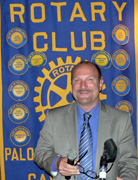 Augie Bezmalinovich grew up in San Pedro and graduated from USC with a degree in Computer Science. However, he is now the Community Affairs Advocate for the Port of Los Angeles. He showed a map and many aerial and ground photos of the San Pedro waterfront area of Los Angeles, starting with old historical photos and progressing to the current pre-and post-development structures and landscaping. One in 7 jobs in the area is linked to port activity. The original port and its connecting railroad were begun by Phineas Banning 1½ centuries ago (he now has a statue there). Croatian and Italian fishermen found the Mediterranean climate similar to their homelands and made their homes there, establishing the local fishing industry. The Star-Kist Cannery had many women workers processing the fish before the advent of automated machinery and then the collapse of the tuna fish stocks. Old cargo unloading was done mostly by hand. During World War II, military ships and land-based activities at Fort MacArthur dominated the port area. Boatbuilding employed tens of thousands of people at peak activity. Now, the Los Angeles Port is the largest container port in the US, but the surrounding industrial facilities have decayed and fallen into disuse. A massive port redevelopment project (Strategic Plan) was released in 2006 but is being continuously improved with community input. The waterfront area is becoming friendlier and more beautiful to attract commercial businesses and visiting tourists, with completion scheduled for 2014. There is now a 30 acre waterfront park in the Wilmington area, and Harry Bridges Boulevard is now tree-lined. N Gaffey St also has a greenway alongside. A Bellagio fountain is synchronized with music. People are increasingly gathering on the promenade and children are playing in the play-fountain area. Many holiday and community events are being scheduled now. Eventually there will be an 8 mile walk along the waterfront. The Catalina Express will have a new terminal. There is a new cruise ship facility. The Maritime Museum has a new coat of paint and looks much better. Downtown San Pedro will be closer to the water, with tall ships docking there in 2014. The USS Iowa will be brought in south of the Vincent Thomas Bridge. There will be a new entrance to the Ports o’ Call area with new parking towards the bluff and a walkway along the waterfront; they are looking for a $400 million developer for this area (volunteers welcome!). Some warehouse facilities will be converted to craft shops inside, up to 500 shops within the next 2 years. Other warehouse space will become marine research facilities for USC and UCLA. Up-to-date information on the port area and the progress of the Strategic Plan is available at www.portoflosangeles.org. |
Foster Children Resource Project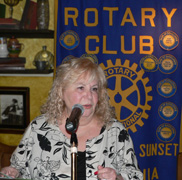 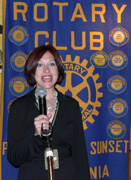 Gina Radocchio Lemor Warzman Gina Radocchio of the California Federation of Women's Clubs (www.cfwc.org) thanked our Club and our Interactor Club for supporting their Foster Children Resource Project by contributing 564 luggage items for Los Angeles foster children. These children often have only a plastic garbage bag to carry their belongings in when they are transferred to a foster home. They also need clothing and personal items. All money donated to her organization goes to help children. There are 68 clubs in the Los Angeles County area working with other nonprofit organizations to make a difference. Supporting the needs of foster children is a major mission for her organization, because these children suffer emotional problems from being uprooted and having no family to belong to, and some of them have also suffered physical, sexual and emotional abuse. They start life with a handicap and are at high risk for future unemployment, homelessness, mental illness, drug abuse and criminal involvement. Lemor Warzman, of the Los Angeles County Department of Children and Family Services (http://dcfs.co.la.ca.us/), discussed the problems of children who have to be removed from their homes and enter a foster home for a variety of reasons. They are eventually either returned home if the situation there is considered safe and healthy for them by social workers, or placed for adoption. These children want to belong and to have dignity and a normal life, like other children. They have independent living programs starting at age 14, to help them learn basic adulthood skills and get job training. Some are able to go on to college. Some of them excel, but others become homeless, mentally ill or criminal. Some cannot function in a normal home and need a more structured environment. The adoption rate is higher for younger children, but all foster children are more difficult to place for adoption because of perceived behavioral problems. Social workers are required to see foster children in their home environment once a month. All foster parents are screened and supervised. Occasionally, serious problems are missed until they get into the news media. The Department keeps statistics on its children over 18 to track their outcomes after its jurisdiction ends. |
Group Study Exchange Team, India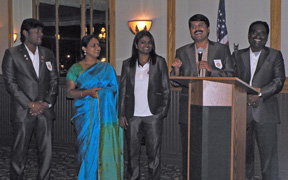
Velayutham Ganesh, Uma Maheswari, R. Chithra Priya, M. Gunasekaran, G. Gnanavelan (leader) (JOINT OFFSITE MEETING with PV Sunset, PV Peninsula, San Pedro, & Del Amo Rotary Clubs at Ports O' Call Restaurant in San Pedro) Chuck Hanchett began the program by introducing the guests, and then calling on the 4 participating Club Presidents to review their Clubs’ accomplishments during this Rotary year, especially their fundraising events (bragging time!). He announced that our District is already looking for a Team Leader and Team Members for the District GSE Team, going to the Mount Fuji area in Japan in November. He recognized the 5 hosting families from the 4 participating Clubs in our part of the District this week. The GSE Team is spending 4 weeks in our District 5280, each week with a small group of Clubs in different parts of the District, ending up at the District Conference in San Diego April 19-22. (Tomorrow’s scheduled activities will be modified due to expected rain, Southern California’s version of monsoons.) GSE Team Leader G. Gnanavelan (Past President of Madras Cosmos Rotary Club and an Assistant Governor of District 3230) presented his team, reviewed the history of his District and country, and showed a video of the Chennai area. India has 1.2 billion people (1/6 of all people on earth) and has 22 official languages and hundreds of dialects, although almost all educated people speak English as a common language, from the heritage of British colonial rule. Chennai (Madras under British rule) is the capital of Tamil Nadu state in the Southeast of the country. The Tamil language is in the ancient Dravidian language family that predates the Indo-European languages related to Hindi that predominate in most of the country. District 3230 Rotarians participated in relief efforts to civilians in the Tamil-speaking northern part of Sri Lanka after the recent end of their 3-decade civil war against the Sinhalese-speaking majority on the island. Rotarian Gnanavelan is a builder of residential apartments in Chennai and Chidambaram. R. Chithra Priya is a Motorcycle Racer (a rare female participant in a male sport) and a Wildlife Photographer. She has competed in many long distance races in India. She is involved in wildlife films and conservation, and also runs an art gallery. Uma Maheswari is a Business Professor and is completing her PhD at the University of Madras. She has traveled widely in Asia and has presented papers on cross-cultural business issues. Her husband is in the leather export business. M. Gunasekaran is a Broadcast Journalist whose parents were uneducated and lived in a remote town. He has worked for top Indian newspapers and is currently a news anchor and talk show moderator for a regional news channel. He is interested in promoting social equality and multicultural understanding. His wife is a software engineer. Velayutham Ganesh is an Entrepreneur and Event Manager. He came from a humble background and is the first Rotaractor to be chosen for his District’s GSE Team. He began as a Web Developer and now has his own graphic design company. We will see these interesting Indian GSE Team members again at the District Conference in San Diego April 19-22, before they return to India. |
Panama Trip, by Helene Pizzini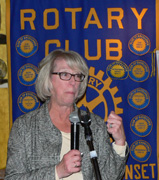 Helene Pizzini has been active in the San Pedro Rotary Club and District 5280 for many years. She reviewed her recent trip with her husband to Panama, and showed slides of their adventures there. They believe in traveling while they are both healthy enough to enjoy it, but they encountered more surprises than anticipated. They found Panama City to be remarkably cosmopolitan. Many retired US citizens are living there, including military personnel. The healthcare there was described as very good. She showed highlights of the city, including the modern well-known opera house, the Church of San José with a fancy gold altar, and the beautiful harbor area. The Panama Canal is undergoing a widening project to accommodate today's new larger ships, and is scheduled to be completed in 2014 for the 100th anniversary of the Canal. She showed photos of the locks in operation for ships and small yachts. Their adventures really began when they attempted to visit the Nassau Indians, a remote tribe of 3500 in the forest, “not far from the urban areas” near the canal. For the first part of that trip, they reserved a ferry boat, which turned out to be a 6-person boat. Then they were taken on a paved road, which turned into a dirt road, which petered out into no road at all. The last part of this journey required crouching in a dugout canoe in the rain. The Indians were not expecting them, but suitable arrangements were finally made. They slept in a bed under mosquito netting, a necessary precaution in that climate. The food was “interesting”, including one item that sounded like “yams” but turned out to be some unfamiliar root plant that was pounded and cooked. The people were friendly and their culture was enjoyable. After leaving this indigenous area, they finished their trip in the beach areas, the civilized concept of “roughing it”. Helene and her husband seem to have survived this adventure well and enjoyed it, ready to try another excursion into the unknown sometime. |
District Puerto Rico Project - David Moyers and Don Reeves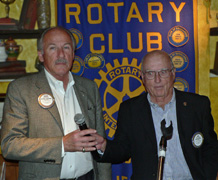 PDG Dave Moyers described the District 5280 humanitarian service trip to Puerto Rico as a personal experience of what Rotary means. Dave and Don showed a series of photos from the trip (taken by Rick Mendoza). There were a total of 13 projects, chosen by leaders of Puerto Rico Rotary District 7000 from local proposals, based on need, practicality, and hands-on participation. In the town of Manatí, they built a modern restroom for special-needs Down Syndrome children (at a public school). These children require assistance for their hygiene needs, and previously had almost no restroom facilities. The Rotarians also built them a special play area with low-impact equipment and flooring, to provide a safe play environment for these children who are very prone to injury because of poor muscle control. The photos showed a welcoming Rotary banner from the local Rotary Club, and gifts of artwork including an exquisitely-painted plate. Another project, cosponsored by the Rotary Club of Santurce, built a hydroponic farm (growing food in water without soil), to help poor people in a housing complex to grow food for themselves with enough additional to sell. The equipment included a system of hundreds of feet of plastic pipes with holes drilled in them for plants to grow from seeds in foam plugs in these holes. Water and fertilizer are circulated through these pipes without soil. A plastic sheet roof was built to provide adequate sunlight and shelter for the facility. The total cost was $19,000, including a matching grant from the Rotary Foundation. Another project was providing wheelchairs for children, elderly and disabled people, many of whom previously had to crawl on the ground for mobility. Their gratitude on receiving this life-transforming gift was heartwarming. This was featured in the major local newspaper. An enjoyable feature for the District 5280 Rotarian visitors was the opportunity for fellowship with each other as members of different Clubs in our District, and with the Puerto Rican Rotarians, as one big family enjoying the feeling of fulfillment by serving the needs of others. They enjoyed touring the sights of this beautiful tropical island, including the Bacardi Distillery, the old fortifications and waterfront of the capital, San Juan, and the beautiful El Yunque Rainforest Park with La Coca (Coconut) Falls. |
Rotary Roundup Club Meeting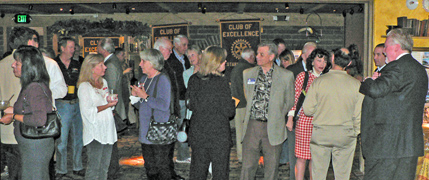 Our meeting tonight was an Open-House Rotary Roundup to show our Club service projects to our many invited visitors. We started at 6:30 PM to introduce ourselves and discuss mutual interests. The dining tables and most of the chairs were removed so we could display our service areas and our hundreds of Club banners from around the world along the walls. After enjoying liquid refreshments and working up good appetites, we opened the buffet line for “heavy” hors d’oeuvres. Raffle tickets awarded to guests and members were drawn for prizes (Astrid Naviaux snagged a bottle of bubbly). |
California Crimefight, by Byron Walls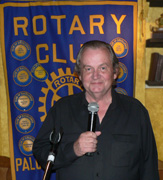 Byron Walls has been speaking on crime safety since 1980 when he began working for Citizens Against Crime in Nashville, Tennessee. He moved to Los Angeles in 1996 and started California Crimefight, which markets personal and family items for self protection against crime, and he speaks to many groups on this. Before then, he worked as a folk singer, comedian and actor since age 20. He gave us an informative and humorous presentation (although he didn't sing for us). He reviewed crime prevention techniques and safety tips for getting to and from your car at the mall, on the street, and in your home, how to avoid looking like a victim, when and how to fight in a rape situation, and how to avoid car jacking. Byron spoke of the importance of safely locking your doors and windows at home and while driving. However, some locks can be broken by home invasion robbers. From his briefcase, he showed a swedge alarm for doors and another model for sliding windows, a wedge-like object which blocks violent opening and sounds a 120 dB alarm when activated. These are also useful in a hotel room when traveling. Another protection would be having a large aggressive dog in the house, or at least a large dog dish visible to discourage entry by strangers, or an aggressive dog recording. He showed a sign stating, “Member National Pit Bull Breeders Association” (looks official), and his brochure showed one stating, “Warning: Pit Bull with AIDS”. Another item is a 4-inch red stop-sign sticker warning of an alarm system. A parking lot is very dangerous, especially while entering or leaving a car; walk with authority and carry your car-key ready in one hand with spray protection in the other. One of his items is a key chain spray containing CS tear gas and pepper spray, which incapacitates for 20 minutes. (These cannot be taken into airports.) A larger model is good for keeping at home inside the front door and near the door of the master bedroom, hung above the reach of children but ready for immediate use. He advises against having a gun, because the burglar who sees one will just shoot first. If stalled on the freeway, keep the doors locked and stay in the car. He advises having a sign in the glove compartment to unfold and display in the back window stating, “Call Police”. This can make the difference between waiting 20 minutes or many hours for help. If confronted by a robber, give him immediately what he wants, but avoid getting into a car with him, and run if you can. If captured, continue talking to the robber to alleviate his tension. Byron passed brochures around listing his devices and kits, and was available for accepting orders at the end of the meeting. His organization’s website is http://www.californiacrimefight.com/. |
Marymount Rotaract Club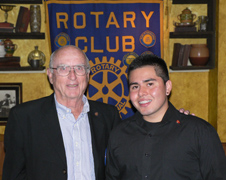 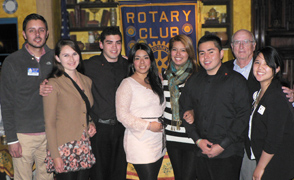 Don Reeves introduced Antonio Argueta, Marymount Rotaract President, and presented him the Rotaract President’s pin. Then Antonio presented Rotaract pins to Marymount Rotaractors Victoria Perez, Jacob Velasco, Danielle (Dani) Trueba and Ashley (Cami) Aguirre. Earning a Rotaract pin requires a member to participate in at least 2 Club projects. (Rotaractors Denise Zamora, Alan (AJ) Johnson, Marissa Montana and Adriana Muñoz, who have also earned pins, were unable to attend.) Rotaract President Argueta opened the program by explaining the Marymount Rotaract Club’s many projects and activities. He showed a photo slide presentation illustrating their projects, explaining each one briefly. The first activity he showed was helping in several locations with the RAT (“Right After Torrance”) Beach Bike Marathon, which had a maximum route distance of 52 miles in the Palos Verdes area, starting from the intersection of Palos Verdes Drive North and East. Other activities the Club participated in included the Norris Theatre Silent Auction-Dinner, Cabrillo Beach Cleanup, Pennies for Polio (they collected $400 on campus in one day), and Toys for Tecate, for which they collected 200 toys, although they took them to the Harbor Interfaith Center in San Pedro instead.nother activity was “Nika Water”, a bottled water program with recyclable bottles for raising money to help alleviate shortages of safe drinking water in other countries. They participated in the “Hope 4 Kids” Christmas Benefit, with assistance from Interact Clubs from 2 high schools. Pending activities include the Canyon Verde Carnival on March 10, with a day of activities, arts and crafts, and helping us with our District Rotary Day of Service on March 17. Other projects include Book Buddies (sponsored by the Molina Foundation) to deliver books to children and become role models to them for reading; Heal the Bay beach cleanup; One Day Without Shoes on April 10 (to go without shoes on one day so kids don't have to, sponsored by TOMS Shoes, www.toms.com, “With every pair of shoes you purchase, TOMS will give a pair of new shoes to a child in need”); and “Flings Bins”, a type of lightweight collapsible biodegradable recycling container to be placed around the Marymount campus through the month of April to raise money from recyclables for donating to local charities. |
Paul Harris Awards
|
Banning House Museum, by Michael Sanborn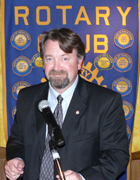 Michael Sanborn is the Director of the Banning House Museum, and the co-author of a 2008 book, Images of America: Wilmington, about the local history including the Banning Museum and the Drum Barracks. He has supervised a recently completed $2.5 million multiyear project to expand the Museum in the unused basement, to document the history of transportation in the Los Angeles Harbor area. Phineas Banning was the founder of Wilmington, which he named after his hometown of Wilmington, Delaware. He had been hired to transport cargo to California in 1851, and on his arrival saw a business opportunity in the potential port, at that time only a mud flat many miles from the isolated town of Los Angeles. He established a business of stagecoach and freight wagons between the port and the town, and extended cargo connections eastward to San Bernardino. As a California state senator, he was instrumental in bringing the first railroad to Los Angeles to connect with his system, ensuring the growth of Los Angeles into a great city. He arranged harbor dredging to build a deepwater port for ships to connect with his freight wagons. He built a 220 acre ranch with a 17,000 ft² home and barn, which he offered to Union troops during the Civil War. His family lived there for many years until 1929 when it became the current Museum on the remaining 19½ acres. Mr Sanborn discussed the fundraising difficulties during government budget limitations, and showed many photos of the Museum expansion project. The unused basement floor is actually the newest part of the house, built about 1900 because the original house was rotting underneath from the high water table. A ballroom was constructed there, but in later years it was closed off. The new construction required trenching up to 9 feet deep to about 3 feet below the foundation to build a concrete water barrier around the house, and an access ramp was constructed. A French drain was installed to gravity-feed ground water into a well. The original mortar was dug out from between the basement wall bricks, analyzed and duplicated to provide the same structural properties. Round windows dating from 1864 were exposed after outside bricks were removed, and some of the glass panels were reproduced to match original materials. No architectural plans were available, so the mahogany front deck and steps were reconstructed from old photos, and the wood was hand cut on site from clear-grain mahogany. The original roads in the park have been dug out and reconstructed. The Rose Garden has been replanted with original varieties. The new basement exhibition (Improbable Gateway: The Los Angeles Transportation Legacy) is now finished, illustrating the evolution of transportation from harbor dredging and roads to rails and the transcontinental railroad. The display panels are arranged in chronological order for smooth flow of visitors. Each panel shows photos and large print describing the major ideas, with more details in smaller print. The project is now completed except for refurbishing the barn with its display of vehicles. 2014 is the 150th anniversary of the site, and a major celebration is planned next year, especially on August 18, Phineas Banning's birthday. Mr Sanborn invites us to experience this exciting new major permanent exhibition at the Banning Museum (http://www.banningmuseum.org/). |
4-Way Test High School Speech Contest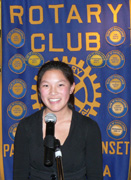 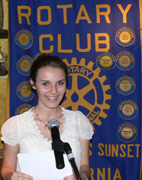 Carol Lam, our first speech contestant, spoke on the issue of declining politeness and respect in society. Increasing rudeness is often viewed as normal, and “nice guys finish late” (if not necessarily last). We can observe others to see how people act around each other. A friendly smile goes a long way to affect people's attitudes around us. However, increasing use of voicemail and text messaging encourages some people to communicate into their devices while ignoring the people around them in a social gathering or even in an audience where silence is expected. She related each of the 4-Way questions to the effects that our behavior and attitudes have on those around us and the harmony in our society.
Liliana Pond, our second speech contestant, spoke of the events that occurred during the year of her mother's birth and the typical social environment when her mother was growing up. Liliana, who is 16 years old now, contrasted the social and financial differences now with when her mother was her age. A study showed that only 45% of Americans are satisfied with their lives. Suicide rates have increased, and there are 10 times this number of attempted suicides. The quality of life seems to have decreased in spite of the greater quantity of things, conveniences and technology now. Liliana spoke of the need for all of us to slow down our lives and learn more about the world around us instead of being wrapped up in our own cocoons. She related each of the 4-Way questions to how we treat others and influence the social environment around us. After the Speech Judging Committee deliberated on the outstanding quality of each of these closely-matched contestants, it was decided to give each of them $100. Our Club thanks each of them, and their parents, for their efforts in participating in this Speech Contest! (Madelyn Creighton has announced that Liliana Pond will enter our District Speech Contest to compete for the $1000 District Speech Award.) |
Paul Harris Awards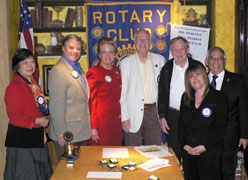 PDG Rick Mendoza & Paul Harris Foundation Chair Linda Little presented Paul Harris Fellow recognition to Linda Little, DGE Lew Bertrand (+7), Astrid Naviaux (+7), Robert Little, Jacques Naviaux (+5), & Varda Lancaster. [Don Reeves & Jim Gamble (+5) were not present.] PDG Rick Mendoza & Paul Harris Foundation Chair Linda Little presented Paul Harris Fellow recognition to Linda Little, DGE Lew Bertrand (+7), Astrid Naviaux (+7), Robert Little, Jacques Naviaux (+5), & Varda Lancaster. [Don Reeves & Jim Gamble (+5) were not present.]
|
Student Theater, by Larry Heimgartner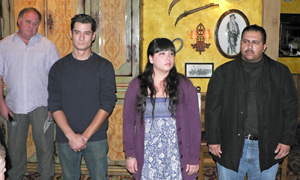 Larry Heimgartner (left) was the Chair of the Theater Dept. at Los Angeles Harbor College since 1973. He retired 2 years ago but continues as Adjunct Professor. He has been involved in community projects with Rotary, and was recognized as Citizen of the Year in 2003 by the Rotary Club of Wilmington. He met President Chuck Hanchett several years ago working with the Glass Children of the Tijuana Dump (who helped support their families collecting recyclable glass instead of going to school). He has been writing plays for his students to dramatize severe socioeconomic problems here and abroad, including one about the Glass Children and another in cooperation with a group in Cornwall in the UK for Africans with HIV. One of his students walked here from Guatemala and is now in his class. Tonight he brought 3 of his students as actors to present 3 of these dramatized stories to us in first person. Prof Heimgartner described a trip to Zanzibar Island off the coast of Tanzania 3 years ago with his UK contacts from Cornwall. He met with them in London first, to work on a play project, then to Zanzibar to perform the play (which was translated into Swahili). This small Muslim island has less HIV than in nearby Tanzania because of conservative sexual traditions, but there is no sex education to help young people protect themselves. |
Wit and Wisdom of Abe Lincoln, by Arnold Kunst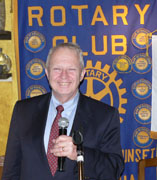 Arnold Kunst, author of Lincoln 365, gave his first Lincoln speech in high school, and has been fascinated by him ever since. He has an MA from Ireland in history and was a teacher and school administrator before doing the speaking circuit. He has been giving a variety of versions of his talks on Lincoln to different audiences. This book is a series of humorous short stories and quotes from Abraham Lincoln, one for each day of the year, along with a similar quote from some other authority for comparison. He began by relating the economic storm raging over our country over the past several years, to the need for strong effective leadership skills now. He believes that Abe Lincoln was the best leader our country has ever had, because of his having overcome personal adversity and then bringing the country out of its severe and seemingly hopeless problems and divisiveness. In 1858, in a series of 7 debates with Sen Douglas, the Senator accused Lincoln of being two-faced; Abe replied, “If I had a face better than this, don't you think I'd be wearing it?” He was very skilled at deflecting attacks against him by using self-deprecating humor. Lincoln won the Illinois Senatorial election by 4000 votes, but Sen Douglas was returned to the Senate. (Senators were appointed by the state legislatures then, with the popular votes being a beauty contest.) Only 2 years later, Lincoln was elected President of a bitterly divided country ready to explode into convulsions of Civil War. Winston Churchill said, “The price of greatness is responsibility.” Mr Kunst urged us to study the life of Abraham Lincoln for learning successful leadership traits. Lincoln wasted no time in self-pity, a trait seen in losers. After his loss to Sen Douglas, he said, “I felt like a boy who stubbed his toe.” (Stuff happens, as they say today.) We don't always get what we want or deserve. Keep your head when all about you are losing theirs, as Rudyard Kipling said. Mr Kunst reviewed the many problems facing Lincoln after he became President. War soon broke out as many Southern states seceded, and there were repeated battlefield reverses as Union generals appeared much more timid than their Confederate counterparts. One entire regiment from Illinois mutinied, as that state itself considered seceding. Money to pay for the war and its preparations was woefully inadequate. Gen Lee moved his forces north and invaded Pennsylvania, where a decisive battle at Gettysburg finally turned in the Union’s favor. On that one day, battlefield deaths on both sides were about as many as US combat deaths in the entire Vietnam War. (Lincoln's brief but memorable Gettysburg Address afterward is still quoted today.) Throughout all of this, President Lincoln kept his vision and his sense of humor. With prevailing economic difficulties, there were many job seekers approaching him. When the death of the Postal Inspector was announced, a man walked up to Lincoln and said, “The Postal Inspector just died; okay if I take his place?” Lincoln replied, “Yes, if it's okay with the undertaker!” |
District 5280 Governor-Elect Lew Bertrand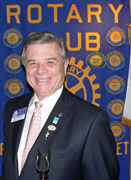 Lew Bertrand, our District Governor for the coming year, has just returned from the 2012 Rotary International Assembly in San Diego, a training event for incoming Rotary District Governors. He showed off his new Rotary Theme pin and banner. RI President-Elect Sakuji Tanaka unveiled his 2012-13 RI Theme, “Peace Through Service”, and will ask the incoming leaders to promote three Rotary Peace Forums, to be held in Hiroshima, Japan; Berlin, Germany; and Honolulu, Hawaii, USA.
Lew reviewed his path through a life of Rotarian service. As a student at Loyola University in Los Angeles (now Loyola-Marymount), he participated in a service project with his fraternity brothers, hand delivering lottery tickets (which could not be sent through the mail then) for a fundraiser for a new addition to a hospital. 2 months later, the university president asked him to attend a University board meeting to thank him for his efforts in this event for raising more money than had been anticipated. After graduation, he entered the banking business and remembers a 1972 lunch with a Rotarian member of the United California bank, who invited him to join Rotary. Later he worked for Security Pacific Bank and served in various branch offices in Southern California.
During this time, he has belonged to the Wilmington, San Pedro and Venice Marina Rotary Clubs and served in a number of District 5280 positions. He was President of our Club in 2007-8 when our member Dave Moyers was District Governor. During Lew’s coming year as Governor, the San Joaquin Valley District, which is down to only 22 Clubs and is too small to continue, will join District 5280.
Lew remembers when the “End Polio Now” project was begun in the Philippines in the 1980s, and soon spread to a worldwide effort sponsored by Rotary International. He urges us each to get involved and make a difference. “If you want your dream to come true, don't oversleep.” |
Club Membership
|
Tom Cooper - Newest Member
Rev Tom Cooper , Chaplain at The Canterbury assisted living community, was inducted into membership in our Club by PDG Dave Moyers, assisted by President Jacques Naviaux and Tom's sponsor, Erv Samuelson. Congratulations, Tom, and welcome to our Club! |